
The Project Gutenberg EBook of A History of the United States, by
Charles Kendall Adams and William P. Trent
This eBook is for the use of anyone anywhere in the United States and most
other parts of the world at no cost and with almost no restrictions
whatsoever. You may copy it, give it away or re-use it under the terms of
the Project Gutenberg License included with this eBook or online at
www.gutenberg.org. If you are not located in the United States, you'll have
to check the laws of the country where you are located before using this ebook.
Title: A History of the United States
Author: Charles Kendall Adams
William P. Trent
Release Date: August 10, 2016 [EBook #52766]
Language: English
Character set encoding: UTF-8
*** START OF THIS PROJECT GUTENBERG EBOOK A HISTORY OF THE UNITED STATES ***
Produced by Larry Harrison, Cindy Beyer and the online
distributed Proofreaders Canada team at
http://www.pgdpcanada.net with images provided by The
Internet Archives-US

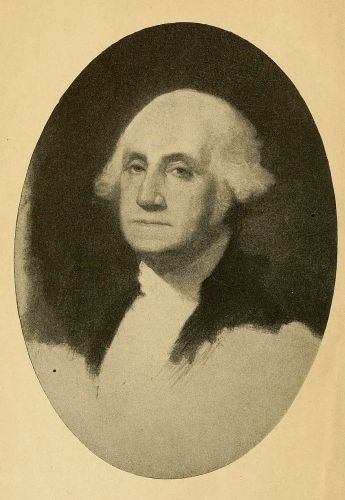
GEORGE WASHINGTON
ALLYN AND BACON’S SERIES OF SCHOOL HISTORIES
A HISTORY OF
THE UNITED STATES
BY
CHARLES KENDALL ADAMS
LATE PRESIDENT OF THE UNIVERSITY OF WISCONSIN
AND
WILLIAM P. TRENT
PROFESSOR OF ENGLISH LITERATURE IN COLUMBIA UNIVERSITY
REVISED EDITION
ALLYN AND BACON
Boston and Chicago
| ALLYN AND BACON’S SERIES OF |
| SCHOOL HISTORIES |
| 12mo, half leather, numerous maps, plans, and illustrations |
| ——————— |
| ANCIENT HISTORY. By Willis M. West of the University of Minnesota. |
| MODERN HISTORY. By Willis M. West. |
| HISTORY OF ENGLAND. By Charles M. Andrews of Bryn Mawr College. |
| HISTORY OF THE UNITED STATES. By Charles K. Adams, and William P. Trent of Columbia University. |
| THE ANCIENT WORLD. By Willis M. West. |
| Also in two volumes: Part I: Greece and the East. Part II: Rome and the West. |
COPYRIGHT, 1903 AND 1909,
BY WILLIAM P. TRENT AND BY JOHN P. FISK,
L. S. HANKS, AND BURR W. JONES, EXECUTORS
OF THE ESTATE OF CHARLES KENDALL ADAMS.
Norwood Press
J. S. Cushing & Co.—Berwick & Smith Co.
Norwood, Mass., U.S.A.
The lamented death of President Adams entails on me the duty of writing the preface to our joint work,—a duty which, had he lived, would naturally have fallen to him, since to his initiative and energy the volume owes its existence. Fortunately, the entire manuscript had the benefit of his wisdom and experience as teacher and investigator, and the proofs of about half the book passed under his watchful supervision.
Five years ago, in a letter to me proposing the book, Dr. Adams gave, among his reasons for wishing to add to the long list of school histories of the United States, three principal objects:—
First, to present fully and with fairness the Southern point of view in the great controversies that long threatened to divide the Union.
Second, to treat the Revolutionary War, and the causes that led to it, impartially and with more regard for British contentions than has been usual among American writers.
Third, to emphasize the importance of the West in the growth and development of the United States.
These objects have been kept constantly in view. We felt, moreover, that the development of institutions and government may justly be considered of great importance, although naturally lacking in picturesqueness, and we have endeavored to set in relief this evolutionary process. How far we have succeeded in accomplishing the objects sought remains for others to judge.
I cannot forbear to place on record here my appreciation of the fortitude with which Dr. Adams bore his protracted sufferings and did his work; of his conscientiousness in matters of minutest detail; of his fairness and sympathy toward those with whom he did not agree, and of the unfailing courtesy that marked every line of his correspondence.
Acknowledgment is due to the highly competent services of Miss May Langdon White of New York, whom Dr. Adams selected to assist in the revision of the work.
W. P. TRENT.
Columbia University,
New York, November, 1902.
| PAGE | ||
| List of Maps | xvi | |
| List of Illustrations | xvii | |
| Chronological Table | xx | |
| PART I.—PERIOD OF DISCOVERY AND | ||
| SETTLEMENT, 1492–1765. | ||
| CHAPTER I.—DISCOVERY. | ||
| SECTION | ||
| 1-3. | The American Indians | 1 |
| 4. | Pre-Columbian Discoverers | 4 |
| 5-13. | Columbus and the Spanish Discoverers | 7 |
| 14-16. | The French Explorers | 18 |
| 17-18. | The English Explorers | 20 |
| 19-20. | Summary of Results | 22 |
| References | 23 | |
| CHAPTER II.—THE FIRST PLANTATIONS AND COLONIES, 1607–1630. | ||
| 21-28. | The Settlement of Virginia | 24 |
| 29-30. | The Settlement of New York | 29 |
| 31-36. | The Pilgrims at Plymouth | 31 |
| 37-38. | The Settlement of Massachusetts | 34 |
| References | 36 | |
| CHAPTER III.—SPREAD OF PLANTATIONS, 1630–1689. | ||
| 39-41. | The Settlement and Growth of Maryland | 37 |
| 42-45. | Development of Virginia | 40 |
| 46-52. | Development of New England | 42 |
| 53-60. | The New England Confederacy | 46 |
| 61-71. | Development of the Middle Colonies | 51 |
| 72-76. | The Southern Colonies | 57 |
| References | 59 | |
| CHAPTER IV.—THE COUNTRY AT THE END OF THE SEVENTEENTH CENTURY. | ||
| 77-78. | General Conditions | 60 |
| 79-84. | Characteristics of New England | 61 |
| 85-86. | Characteristics of the Middle Colonies | 65 |
| 87-90. | Characteristics of the Southern Colonies | 66 |
| References | 68 | |
| CHAPTER V.—DEVELOPMENT OF THE COLONIES, 1690–1765. | ||
| 91-94. | Colonial Disputes | 69 |
| 95-97. | Virginia and Georgia | 71 |
| 98-100. | French Discoveries and Claims | 73 |
| 101-116. | Wars with the French | 75 |
| References | 86 | |
| PART II.—PERIOD OF THE REVOLUTION, 1765–1789. | ||
| CHAPTER VI.—CAUSES OF THE REVOLUTION. | ||
| 117-120. | General Causes | 87 |
| 121-126. | The Question of Taxation | 91 |
| 127-132. | The Resistance of the Colonies | 93 |
| 133-135. | The Tax on Tea | 98 |
| 136-139. | New Legislation and Opposition | 100 |
| 140-143. | The Crisis | 103 |
| References | 106 | |
| CHAPTER VII.—THE CAMPAIGNS OF 1775 AND 1776. | ||
| 144-147. | Early Movements | 107 |
| 148-152. | Washington in Command | 110 |
| 153-158. | The War in New York | 114 |
| 159-160. | General Condition of the Country | 118 |
| 161-162. | Failure of British Expeditions | 119 |
| 163-165. | The Declaration of Independence | 121 |
| 166-176. | The War in New Jersey | 126 |
| CHAPTER VIII.—THE CAMPAIGN OF 1777. | ||
| 177-187. | The Struggle for the Center | 135 |
| CHAPTER IX.—THE FRENCH ALLIANCE AND THE CAMPAIGNS OF 1778 AND 1779. | ||
| 188-193. | A Winter of Discouragement | 144 |
| 194-198. | Prospects Brighten | 149 |
| 199-207. | Conditions West of the Alleghanies | 152 |
| 208-209. | The Conquest of the Northwest | 158 |
| 210-212. | The Victories of Paul Jones | 159 |
| CHAPTER X.—THE CAMPAIGNS OF 1780 AND 1781. | ||
| 213-214. | The War in the South | 162 |
| 215-220. | The Treason of Benedict Arnold | 164 |
| 221-223. | Causes of Discouragement | 167 |
| 224-228. | American Successes in the South | 168 |
| 229-237. | The Close of the War | 172 |
| CHAPTER XI.—THE ARTICLES OF CONFEDERATION AND THE CONSTITUTION. | ||
| 238-243. | Difficulties of Confederation | 178 |
| 244-256. | The Constitution | 181 |
| References | 190 | |
| PART III.—THE ORGANIZATION OF POLITICAL PARTIES, 1789–1825. | ||
| CHAPTER XII.—THE COUNTRY AT THE CLOSE OF THE EIGHTEENTH CENTURY. | ||
| 257-262. | General Conditions | 191 |
| 263-264. | Spirit of the People | 194 |
| References | 195 | |
| CHAPTER XIII.—THE ADMINISTRATIONS OF WASHINGTON, 1789–1797. | ||
| 265-268. | Early Legislation and Parties | 196 |
| 269-274. | Difficulties of Administration | 200 |
| References | 204 | |
| CHAPTER XIV.—THE ADMINISTRATION OF JOHN ADAMS, 1797–1801. | ||
| 275-281. | A Period of Dissensions | 205 |
| References | 210 | |
| CHAPTER XV.—THE ADMINISTRATIONS OF JEFFERSON, 1801–1809. | ||
| 282-284. | Jeffersonian Policy | 211 |
| 285-295. | Measures and Events | 214 |
| 296-297. | Character of Jefferson’s Statesmanship | 222 |
| References | 224 | |
| CHAPTER XVI.—THE ADMINISTRATIONS OF MADISON, 1809–1817. | ||
| 298-303. | Outbreak of War | 225 |
| 304-305. | Exploits of the Navy | 230 |
| 306-310. | Reverses and Successes | 234 |
| 311-312. | End of the War | 238 |
| 313-315. | The Disaffection of New England | 240 |
| 316-319. | Consequences of the War | 242 |
| References | 244 | |
| CHAPTER XVII.—THE ADMINISTRATIONS OF MONROE, 1817–1825. | ||
| 320-322. | Character of the Period | 245 |
| 323-326. | Diplomatic Achievements | 247 |
| 327-331. | Slavery comes to the Front | 250 |
| 332-334. | Factional Politics | 254 |
| References | 256 | |
| PART IV.—SPREAD OF DEMOCRACY AND EXTENSION OF TERRITORY, 1825–1850. | ||
| CHAPTER XVIII.—THE ADMINISTRATION OF JOHN QUINCY ADAMS, 1825—1829. | ||
| 335-339. | Failures of the Administration | 257 |
| 340-342. | The Tariff Question | 260 |
| References | 262 | |
| CHAPTER XIX.—THE JACKSONIAN EPOCH, 1829–1837. | ||
| 343-345. | Political Conditions | 263 |
| 346-350. | Progress of the Nation | 265 |
| CHAPTER XX.—JACKSON’S FIRST ADMINISTRATION, 1829–1833. | ||
| 351-354. | A Popular Autocrat | 271 |
| 355-356. | The Debate over the Nature of the Constitution | 274 |
| 357-358. | The Tariff and Nullification | 278 |
| References | 280 | |
| CHAPTER XXI.—JACKSON’S SECOND ADMINISTRATION, 1833—1837. | ||
| 359-360. | The Abolitionists | 281 |
| 361-367. | Financial Disturbances | 283 |
| References | 287 | |
| CHAPTER XXII.—THE ADMINISTRATIONS OF VAN BUREN AND OF HARRISON AND TYLER, 1837–1845. | ||
| 368-371. | A Period of Confusion | 288 |
| 372-373. | The Embarrassments of the Whigs | 290 |
| 374-376. | Texas and Oregon | 293 |
| References | 295 | |
| CHAPTER XXIII.—THE ADMINISTRATION OF POLK, 1845–1849. | ||
| 377-379. | The Opening of the Mexican War | 296 |
| 380-389. | The Conduct and Results of the War | 299 |
| References | 304 | |
| PART V.—THE EVE OF THE CIVIL WAR, 1850–1861. | ||
| CHAPTER XXIV.—THE ADMINISTRATION OF TAYLOR AND FILLMORE, 1849–1853. | ||
| 390-394. | The Question of California | 305 |
| 395-400. | The Compromise of 1850 | 308 |
| 401-404. | International and Domestic Affairs | 313 |
| CHAPTER XXV.—THE ADMINISTRATION OF PIERCE, 1853–1857. | ||
| 405-410. | The Confusion of Parties | 317 |
| 411-415. | Kansas-Nebraska Legislation | 320 |
| 416-417. | The Republican Party | 323 |
| CHAPTER XXVI.—THE ADMINISTRATION OF BUCHANAN, 1857–1861. | ||
| 418-422. | The Supreme Court and Slavery | 326 |
| 423-427. | Kansas and Utah | 329 |
| 428-431. | The Great Debates | 332 |
| 432-434. | John Brown and Public Opinion | 336 |
| 435-439. | The Presidential Campaign of 1860 | 339 |
| 440-446. | Secession of the South | 342 |
| 447-449. | The Country in 1860–1861 | 348 |
| References | 350 | |
| PART VI.—THE CIVIL WAR AND RECONSTRUCTION, 1861–1869. | ||
| CHAPTER XXVII.—THE BEGINNINGS OF THE CIVIL WAR. | ||
| 450-453. | Opening of Hostilities | 353 |
| 454-458. | Military and Financial Strength of the Combatants | 357 |
| 459-461. | Description of the Seat of War | 360 |
| 462-465. | Domestic and Foreign Complications | 362 |
| 466-471. | Military Movements of 1861 | 365 |
| 472-474. | International Difficulties | 369 |
| CHAPTER XXVIII.—THE CAMPAIGNS OF 1862. | ||
| 475-483. | The War in the West | 372 |
| 484-489. | The Work of the Navy | 381 |
| 490-498. | The War in the East | 387 |
| 499-502. | Public Feeling in the North and Great Britain | 394 |
| 503-506. | The War in the East continued | 397 |
| 507-513. | Domestic and Foreign Effects of the Campaigns of 1862 | 402 |
| References | 406 | |
| CHAPTER XXIX.—THE CAMPAIGNS OF 1863. | ||
| 514-517. | Vicksburg | 408 |
| 518-522. | The Chattanooga Campaign | 411 |
| 523-525. | The Eastern Campaigns | 414 |
| 526-529. | Embarrassment of the Federal Government | 419 |
| References | 421 | |
| CHAPTER XXX.—THE CAMPAIGNS OF 1864. | ||
| 530-533. | Grant and Lee in Virginia | 422 |
| 534-538. | Sherman’s Campaigns | 426 |
| 539-541. | Naval Victories | 430 |
| 542-546. | Political Affairs | 432 |
| References | 435 | |
| CHAPTER XXXI.—END OF THE WAR, 1865. | ||
| 547-551. | Movements of Sherman and Grant | 436 |
| 552-554. | The Death of President Lincoln | 440 |
| 555-561. | The Magnitude of the War | 441 |
| References | 445 | |
| CHAPTER XXXII.—THE ADMINISTRATION OF JOHNSON: RECONSTRUCTION, 1865–1869. | ||
| 562-573. | Different Policies of Reconstruction | 446 |
| 574-576. | Effects of Reconstruction | 452 |
| 577-580. | Johnson and Congress | 454 |
| References | 457 | |
| PART VII.—PERIOD OF NATIONAL DEVELOPMENT, 1869–1902. | ||
| CHAPTER XXXIII.—THE ADMINISTRATIONS OF GRANT, 1869–1877. | ||
| 581-588. | Grant’s First Administration, 1869–1873 | 458 |
| 589-595. | Grant’s Second Administration, 1873–1877 | 463 |
| 596-599. | Party Politics | 468 |
| References | 472 | |
| CHAPTER XXXIV.—THE ADMINISTRATIONS OF HAYES AND OF GARFIELD AND ARTHUR, 1877–1885. | ||
| 600-603. | Industrial Problems | 473 |
| 604-605. | Financial Problems | 475 |
| 606-609. | Political Affairs | 476 |
| 610-613. | Chief Features of Arthur’s Administration | 480 |
| 614-617. | Political Events | 483 |
| 618-619. | The Presidential Campaign of 1884 | 485 |
| References | 487 | |
| CHAPTER XXXV.—FIRST ADMINISTRATION OF CLEVELAND, 1885–1889. | ||
| 620-623. | Important Measures and Reforms | 488 |
| 624-628. | Industrial and Financial Disturbances | 491 |
| References | 494 | |
| CHAPTER XXXVI.—THE ADMINISTRATION OF BENJAMIN HARRISON, 1889–1893. | ||
| 629-638. | Domestic Events and Measures | 495 |
| 639-641. | Foreign Affairs | 500 |
| 642-643. | Political Affairs | 502 |
| CHAPTER XXXVII.—SECOND ADMINISTRATION OF CLEVELAND, 1893–1897. | ||
| 644-649. | Financial Legislation | 504 |
| 650-651. | Foreign Affairs | 507 |
| 652-655. | Domestic Events | 510 |
| References | 513 | |
| CHAPTER XXXVIII.—THE ADMINISTRATIONS OF McKINLEY AND ROOSEVELT, 1897–1902. | ||
| 656-657. | The Beginning of McKinley’s Administration | 514 |
| 658-670. | The War with Spain | 515 |
| 671-676. | Consequences of the War | 524 |
| 677-681. | The Close of McKinley’s First Administration | 527 |
| 682-683. | McKinley’s Second Administration | 531 |
| 684-701. | Roosevelt’s Administration | 532 |
| References | 550 | |
| CHAPTER XXXIX.—PROGRESS OF THE EPOCH. | ||
| 702-705. | Spread and Character of the Population | 551 |
| 706-709. | National Development | 553 |
| APPENDIX. | ||
| A. Declaration of Independence | 559 | |
| B. Constitution of the United States of America | 564 | |
| Amendments to the Constitution | 575 | |
| C. List of Presidents and Vice Presidents, | ||
| with their Terms of Office | 579 | |
| INDEX | 581 | |
| 1000 (circa) | The Northmen reach America. |
| 1492 | Columbus lands at Watling’s Island. |
| 1497 | John Cabot lands near the mouth of the St. Lawrence. |
| 1498 | Voyage of Sebastian Cabot. |
| 1499–1503 | Americus Vespucius makes four voyages to America. |
| 1512 | Ponce de Leon discovers Florida. |
| 1513 | Balboa discovers the Pacific. |
| 1520 | Magellan passes the straits named after him. |
| 1541 | De Soto discovers the Mississippi River. |
| 1562–1564 | Huguenots in South Carolina and Florida. |
| 1565 | St. Augustine, Florida, founded by the Spanish. |
| 1577–1580 | Drake makes his voyage round the world. |
| 1584–1587 | Sir Walter Raleigh sends out colonists. |
| 1607 | Founding of Jamestown, Virginia. |
| 1608 | Champlain founds Quebec. |
| 1609 | Hudson discovers the Hudson River. |
| 1614 | The Dutch settle on Manhattan Island. |
| 1620 | Landing of the Pilgrims at Plymouth. |
| 1626 | The Dutch found New Amsterdam (New York City). |
| 1630 | Winthrop leads Puritan emigration to Massachusetts. |
| 1630 | Boston founded. |
| 1632 | Charter for Maryland granted the second Lord Baltimore. |
| 1634 | St. Mary’s, Maryland, founded. |
| 1635 | Settlements made in Connecticut. |
| 1636 | Roger Williams founds Providence, Rhode Island. |
| 1636 | Harvard College founded. |
| 1638 | New Haven settled. |
| 1638 | Swedes occupy Delaware. |
| 1639 | Constitution of Connecticut framed. |
| 1643 | New England Confederacy established. |
| 1663 | Government organized in North Carolina. |
| 1664 | The English seize New Netherland and settle in New Jersey. |
| 1670 | Settlement in South Carolina. Charleston founded. |
| 1674–1676 | King Philip’s War. |
| 1676 | Bacon’s Rebellion in Virginia. |
| 1682 | La Salle explores Mississippi River. |
| 1682 | Philadelphia founded. |
| 1689–1697 | King William’s War. |
| 1690 | Colonial Congress at New York. |
| 1692 | Salem witchcraft. |
| 1692 | William and Mary College (Virginia) founded. |
| 1697 | Peace of Ryswick. |
| 1701 | Detroit founded. |
| 1701 | Yale College founded. |
| 1702–1703 | Queen Anne’s War. |
| 1713 | Treaty of Utrecht. |
| 1718 | The French found New Orleans. |
| 1730 | Baltimore founded. |
| 1733 | Savannah founded. |
| 1744–1748 | King George’s War. |
| 1745 | Capture of Louisburg. |
| 1746 | Princeton College founded. |
| 1748 | Treaty of Aix-la-Chapelle. |
| 1754 | King’s (Columbia) College founded. |
| 1754 | French and Indian War begins (ends 1763). |
| 1755 | Braddock’s defeat. |
| 1759 | Capture of Quebec. |
| 1763 | Peace of Paris. |
| 1763 | The Conspiracy of Pontiac. |
| 1765 | The Stamp Act passed. |
| 1766 | Repeal of Stamp Act. |
| 1767 | Townshend Acts. |
| 1768 | British troops in Boston. |
| 1770 | Boston Massacre. |
| 1773 | “Boston Tea-party.” |
| 1774 | Boston Port Bill. |
| 1774 | First Continental Congress meets in Philadelphia. |
| 1775 | Battles of Lexington and Concord. Siege of Boston. Battle of Bunker Hill. |
| 1775 | Mecklenburg Resolutions. |
| 1776 | Declaration of Independence. |
| 1777 | Victories of Princeton, Bennington, and Saratoga. Defeats of Brandywine and Germantown. Washington at Valley Forge. |
| 1778 | France becomes an ally of the United States. |
| 1779 | Naval victories of Paul Jones. |
| 1780 | Arnold’s treason. |
| 1781 | Articles of Confederation finally agreed to. |
| 1781 | Battle of Cowpens. Cornwallis surrenders at Yorktown. |
| 1782 | Preliminary treaty with Great Britain. |
| 1783 | Peace of Versailles. |
| 1787 | Federal Convention frames the Constitution. |
| 1787 | Ordinance concerning the Northwest Territory passed by Congress. |
| 1788 | The states ratify the Constitution. |
| 1789 | Washington inaugurated at New York. Organization of Congress and the Departments. |
| 1792 | Formation of Federalist and Democratic-Republican parties. |
| 1793 | Washington’s proclamation of neutrality. |
| 1795 | Jay’s Treaty ratified. |
| 1798 | The Alien and Sedition Laws. |
| 1798 | The Virginia and Kentucky Resolutions. |
| 1800 | The city of Washington becomes the national capital. |
| 1801 | Jefferson elected President by the House of Representatives. |
| 1803 | Purchase of Louisiana. |
| 1804 | Expedition of Lewis and Clark. |
| 1807 | Fulton’s steamboat. |
| 1807 | Passage of the Embargo. |
| 1809 | The Non-intercourse Act. |
| 1812 | War with Great Britain. |
| 1814 | The British capture Washington. |
| 1814 | The Hartford Convention. |
| 1814 | The Treaty of Ghent. |
| 1815 | The battle of New Orleans. |
| 1819 | Florida purchased from Spain. |
| 1820 | First Missouri Compromise. |
| 1823 | Monroe Doctrine. |
| 1825 | Erie Canal opened. |
| 1830 | Hayne-Webster debate. |
| 1830 | Baltimore and Ohio Railroad opened. |
| 1832 | Nullification in South Carolina. |
| 1832 | Rise of the Whig party. |
| 1833 | Chicago founded. |
| 1836 | Independence of Texas. |
| 1840 | Sub-treasury system established. |
| 1840 | Liberty party formed. |
| 1842 | Ashburton Treaty. |
| 1842 | Dorr’s Rebellion in Rhode Island. |
| 1844 | Morse completes the first telegraph line. |
| 1846–1848 | Mexican War. |
| 1846 | Wilmot Proviso. |
| 1846 | Oregon Treaty. |
| 1848 | Treaty of Guadalupe Hidalgo. |
| 1848 | Discovery of gold in California. |
| 1850 | Compromise of 1850. |
| 1850 | Clayton-Bulwer Treaty. |
| 1852 | Rise of Know-Nothing party. |
| 1853 | Gadsden Purchase. |
| 1854 | Kansas-Nebraska Bill. |
| 1854 | Republican party formed. |
| 1855 | Struggle in Kansas. |
| 1857 | Dred Scott Decision. |
| 1858 | First Atlantic cable. |
| 1858 | Lincoln-Douglas debates. |
| 1859 | John Brown’s raid. |
| 1860 | Election of Lincoln. Secession of South Carolina. |
| 1861–1865 | The Civil War. |
| 1862 | Fight between Merrimac and Monitor. |
| 1863 | Proclamation of Emancipation. |
| 1863 | Battle of Gettysburg. Capture of Vicksburg. |
| 1864 | Battle of the Wilderness. |
| 1865 | Surrender of Lee and Johnson. |
| 1865 | Assassination of Lincoln. |
| 1866 | Successful laying of the Atlantic cable. |
| 1867 | Congressional system of reconstruction. |
| 1867 | Purchase of Alaska. |
| 1868 | Impeachment of President Johnson. |
| 1869 | Completion of the Pacific Railroad. |
| 1871 | Treaty of Washington. |
| 1876 | Electoral Commission. |
| 1877 | Troops withdrawn from the South. |
| 1879 | Resumption of specie payments. |
| 1883 | Civil Service Reform Commission. |
| 1892 | Rise of People’s Party. |
| 1898 | War declared with Spain. Treaty of Paris. Acquisition of the Philippines. |
| 1898 | Annexation of Hawaii. |
| 1901 | Hay-Pauncefote Treaty. |
| 1902 | Panama Canal authorized. |
| 1905 | Treaty of Portsmouth. |
| 1907 | Financial crisis. |

Distribution of the Barbarous Tribes
East of the Mississippi
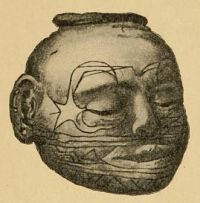
Specimen of Indian Pottery,
from a mound near Pecan Point,
Arkansas. Now in the National
Museum at Washington.
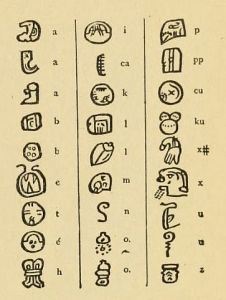
Diego de Landa’s Maya
Alphabet.
1. The Aborigines.—When America became known to Europe at the end of the fifteenth century, it was by no means an uninhabited country. Wherever the discoverers effected a landing, and however far they pushed inland, they found themselves confronted by native inhabitants of varying degrees of savagery. Hence the settlement of both Americas, from first to last, has been dependent upon the supplanting of one race by another or upon their intermixture.
2. Characteristics of the Indians.—The original inhabitants of both continents have been known as Indians, in consequence of a mistake made by Columbus (§§ 5-7). The North American Indians were fiercer foes than the native Mexicans and Peruvians whom the Spaniards, under Cortez and Pizarro, overcame, and with whom they intermarried. We know, however, from linguistic characteristics, that all the aborigines from the Arctic Circle to Cape Horn belonged to the same race. How they first came to America is a matter of dispute; but their main peculiarities are well understood. In Peru and Mexico they had made some progress toward civilization. They constructed good roads, were not unskillful artisans, and had even learned some astronomy. But they lived in large communal groups under their chiefs, and had made slight advance in the art of government; hence they fell an easy prey to small bodies of Spaniards. Similar in character to the Mexicans, but inferior to them, were the Pueblos and Cliff-dwellers of the region of New Mexico, Arizona, and Lower California, as well as the Natchez Indians of the Lower Mississippi Valley. Most of the North American Indian tribes lived in villages of wigwams and had a primitive form of government. In each village there was a communal, or “long,” house, in which clan business was transacted. In a few cases this “long” house gave shelter to a whole tribe. These Indians, except among the Southern tribes mentioned below, were chiefly in what is called the hunter and fisher state, although they frequently practiced a rude form of agriculture. Sometimes, however, as in the case of the Digger Indians, they subsisted mainly on roots.[1]
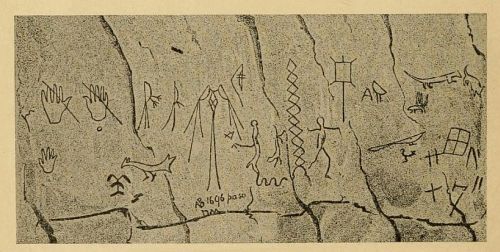
Inscription Rock, New Mexico.
3. The Principal Indian Tribes.—Of the North American Indians with whom our own forefathers came chiefly in contact, there were four principal groups, commonly known as the Algonquins, the Iroquois, the Southern Indians, and the Dakotahs. The Algonquins were the most numerous, although it is doubtful if at any time they numbered ninety thousand. Ranging through the vast forests from Kentucky to Hudson Bay and from the Mississippi to the Atlantic, they were naturally in frequent conflict with the whites. Opposed to these, and wedged into the very center of their territory, were the fierce Iroquois, the craftiest of their race, whose tribal names—Mohawks, Oneidas, Onondagas, Cayugas, and Senecas—are inseparably connected with rivers and lakes in the State of New York. They formed a loose confederacy, called by the whites the “Five Nations.”[2] The Southern Indians showed a milder disposition and were given to agriculture and rude manufactures. Of these the Creeks were the most advanced; beneath them in point of civilization were the Cherokees, Chickasaws, Choctaws, and Seminoles.[3] West of the Mississippi ranged the wandering Dakotahs or Sioux, fierce fighters, whose descendants have given trouble down to our own day. Of the inferior tribes living in the extreme north of the continent, we need take no special account.

Cliff Dwellings on the
Rio Mancos.
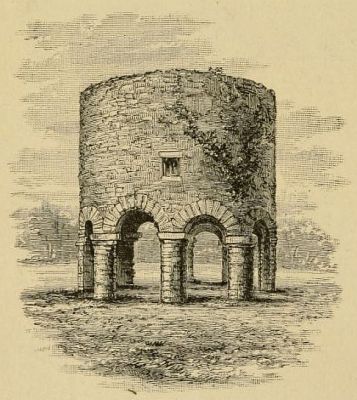
Old Mill at Newport, long
erroneously supposed to have been
built by the Northmen.
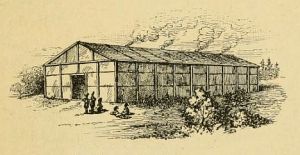
Long House of the Iroquois.
4. The Northmen.—While Columbus and his followers were the real discoverers of America in the sense that they first made it generally known to Europe, it is practically certain that they were not the first Europeans to set foot on the new continent. It is possible that seamen from France and England preceded Columbus, but there is much better reason to believe that Scandinavians from Iceland, having first discovered Greenland, visited the North American mainland as early as the year 1000. Evidence to this effect is found in the so-called Sagas of the Northmen, poetic chronicles based on tradition and dating from about two centuries after the events which they recorded. According to these stories, navigators were driven south from Greenland to a strange shore about the year 985. Fourteen years later, Leif, son of Eric the Red, having introduced Christianity from Norway into Iceland and Greenland, visited the newly discovered land, with thirty-five companions. They wintered in a country which, from its abundance of wild grape vines, they called Vinland, built some houses, and then returned to Greenland with a cargo of timber. Several other voyages were made thither and a temporary colony was established, the latest mention of a voyage dating from about the middle of the fourteenth century. Such is the story of the Sagas. The main features of the account are generally held to be correct, but the location of the Northmen’s Vinland cannot be determined, and no archæological remains have been found on the American continent to corroborate the Sagas.[4]
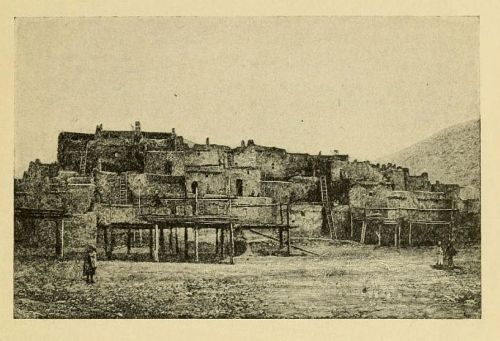
North Pueblo of Taos.
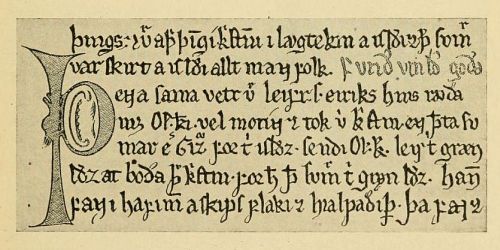
Specimen of Saga Manuscript.
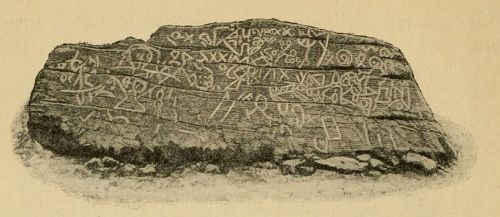
The Dighton Rock in Massachusetts,
long supposed to bear an inscription left by the Northmen.
The figures are now known to be Indian hieroglyphics.

Columbus.[6]
5. Columbus and the Indies.—That Christopher Columbus[5] of Genoa is entitled to the honor of being considered the real discoverer of America is clearly proved by the fact that he was the first person who planned to sail westward over the unknown ocean, and that he never faltered in the prosecution of his heroic design. It is true that he made the mistake of thinking he would come to India rather than to a new continent, and that he underestimated the distance he would have to sail; but such mistakes were natural in view of the lack of geographical knowledge at that time. It was generally believed, by priest and layman alike, that the earth was flat, and good Scripture warrant was produced for the belief. Yet since the days of Aristotle a few scholars had concluded, from the evidences furnished by eclipses and from other reasons, that the earth was spherical in form. Columbus had obtained this idea from some source and seems to have been fascinated by the possibilities it opened. Oriental commerce, especially that from India, was then of great consequence to Italian merchants; and if the recent military successes of the Turks should close the overland routes to the East, it was thought this commerce would be destroyed. But Columbus held that, if the earth were round, India could be reached by sailing westward, and thus trade could be carried on in spite of the Turks.

Toscanelli’s Map (simplified)
6. Motives and Difficulties of Columbus.—Columbus was urged on by patriotism, desire of gain, missionary hopes of Christianizing distant lands, and a natural enthusiasm for heroic enterprise. He corresponded with Toscanelli, a learned Italian, who sent him letters and a map, but underestimated greatly the distance to be traversed. This mistake was fortunate, as Columbus would probably never have secured a hearing had he proposed to take a voyage of ten thousand miles,—the actual distance between Spain and the East Indies. As it was, for a long time he applied in vain to princes and potentates—who alone could sustain the expenses of such an expedition—for permission and means to make a voyage which he believed to be about three thousand miles in length. The record of his hopes and fears, his successes and reverses, reads like a heroic poem. Fortunately for him, the Portuguese had been making voyages down the African coast, with their eyes fixed on the Eastern trade, and the Spaniards, strong through the recent union of Castile and Aragon and the conquest of the Moorish kingdom of Granada, had been aroused to eager rivalry in maritime enterprise. At the court of Ferdinand and Isabella, the Spanish monarchs, Columbus eloquently pleaded his cause. Success at last crowned his efforts. Under the patronage of Isabella he sailed from the port of Palos, with a fleet of three vessels, on the 3d of August, 1492.

Ships of the Time of Columbus.
7. Voyages of Columbus.—Within a month the adventurers had left the Canaries and were traversing the unknown ocean. As the days went by the crews became restless, but the dauntless resolution of Columbus prevented mutiny. Finally, after a fortunate change of course to the southwest, the great navigator saw a light ahead, on the evening of October 11, and the following morning he found that an island had been reached. It was probably Watling’s Island, one of the Bahama group, though the identity of the landing place has been a matter of much dispute.[7] On this first voyage Columbus coasted along the northern side of Cuba, and also discovered the island now known as Hayti. Then, after losing his largest ship and suffering many other trials, he returned to Spain, confident that he had reached islands off the coast of India. The Spanish sovereigns received him with great respect and pomp, and soon sent him back to take possession of his discoveries in the name of Spain. Unfortunately, there was little or no wealth to be obtained from the new possessions except by capable colonists, and Columbus was not fitted to govern dependencies. So great did the opposition to him become that he was arrested some years later, on account of charges of extortion and cruelty brought by his followers, and was sent to Spain in irons. He was soon released, however, and undertook his fourth and last voyage. The results of his last three expeditions were not important. He succeeded in exploring more of Cuba, and in discovering Jamaica. He reached also the mouth of the Orinoco, and was much puzzled to account for its size, which was too great for an island river. On his last voyage he coasted the shores of Central America, in a vain search for a waterway to India. He found no strait, but did find an isthmus; and when he heard reports of a vast body of water lying on the other side of the land, he thought that it must be the Indian Ocean. Thus he was confirmed in his error with regard to the nearness of India, and doubtless cherished his delusion to his death. After his fourth voyage he returned to Spain, and died there in 1506, in poverty and obscurity.

Sebastian Cabot.
8. The Cabots and the English Title.—Almost immediately after Columbus’s first voyage, Pope Alexander VI. issued a bull dividing the non-Christian portion of the world into two parts: Spain to have all that she might discover west of a line to be drawn one hundred leagues west of the Azores; and Portugal all that she might discover east of it. In the following year the rival nations fixed the line at three hundred and seventy leagues west of the Cape Verde Islands. Aroused by these events, Henry VII. of England, who was laying the foundations of Tudor greatness, granted a license of exploration to John Cabot, an Italian then living in Bristol. This seaman landed somewhere near the mouth of the St. Lawrence River, in 1497. Accounts of the voyage are unsatisfactory; and those of the voyage of 1498, supposed to have been made under the command of Cabot’s son Sebastian,[8] are still more vague. That the Cabots did make northerly discoveries on which the English based their right to colonize North America is, however, quite certain.
9. Other Successors of Columbus.—The discovery of the West Indies, as the new islands were named in consequence of Columbus’s mistake, naturally gave a great impetus to exploration. In 1497–98 the Portuguese under Vasco da Gama rounded the Cape of Good Hope and reached the real India, the goal of their desires. In the last year of the same century another Portuguese, Gaspar Cortereal, explored a good deal of the North American coast, and in a few years Newfoundland was much frequented by fishermen, especially from France and England.[9] Little was known, however, about the geography of the new world. Many strange errors were current respecting it, and some years passed before it was given a name. One of the errors was that North America was a projection of Asia, which was not disproved until 1728, when the Russian navigator Vitus Bering sailed from the Pacific into the Arctic Ocean. This error had much to do with the delay in furnishing the two continents with names. By a curious chain of circumstances, too, the name finally settled upon did not do honor to Columbus.

Americus Vespucius.
10. The Name “America.”—Among the early successors of this great explorer was another Italian, Amerigo Vespucci, or, in the Latin form then current, Americas Vespucius.[10] Little is known of him or his voyages, but it is clear that he was one of the first Europeans after Columbus to visit the northern coast of South America, and that in 1504 he wrote an account of his adventures. This account circulated as far as the college town of St. Dié in the Vosges Mountains, and was there printed with an introduction by one of the professors, Martin Waldseemüller by name, who proposed that, since now a fourth division of the earth’s inhabited surface must be named, this should be known as America, in honor of Americus Vespucius, who was supposed to have discovered it. There appears to have been no intention to slight Columbus, whose voyage to the Orinoco was probably not widely known. At any rate, the suggestion was followed, first as regards South America, later with regard to both continents.

Balboa.
11. Balboa’s Discovery of the Pacific.—Geographical knowledge was much advanced by the discovery of the Pacific Ocean by Vasco Nuñez de Balboa[11] in 1513. This brave Spaniard had sought the New World for the sake of wealth, but had met with many difficulties. Lured by tales told by the natives of Panama of a large ocean and lands abounding in gold beyond the mountains, he made his way to the top of the Cordilleras, and thence beheld a great sea to the south of him, which he called the South Sea, a name long retained by English writers. It is the irony of fate that in the best-known reference in English literature to this discovery,—in the famous sonnet by Keats,—the honor of making it should have been transferred to Cortez, who had celebrity enough of his own.

Magellan.
12. The Voyage of Magellan.—The name Pacific was given to the great ocean by the most glorious of Columbus’s successors, the Portuguese Fernãdo de Magalhães,[12] better known as Magellan. In 1519, while in the service of Spain, he followed the coast of South America, hoping to find a strait that might lead into the South Sea. Late in the next year he discovered the strait that bears his name, and sailed into the great ocean to which he gave the name Pacific, on account of its peaceful character. This name was ironical so far as his own career was concerned; for one of his five crews mutinied, one ship was cast away and another abandoned him, and he himself was killed in an encounter with the natives of the Philippine Islands. But he had won a glorious immortality, although it was really the survivors of his crews that finally made their way around the Cape of Good Hope and completed the first circumnavigation of the globe.

Ponce de Leon.

De Soto.
13. Spanish Conquests.—Meanwhile a Spaniard, Ponce de Leon,[13] had discovered Florida in 1512 and had found the perfect climate, but not the gold and silver and fountain of youth he sought. His attempt nine years later to establish a colony there was a complete failure. Success attended, however, the expedition of Hernando Cortez for the conquest of Mexico (1519–1521), and similar good fortune befell that of Francisco Pizarro for the subversion of Peru (1532). The New World was rapidly alluring the Spaniards, who made many explorations. For example, Cabeza de Vaca, an officer in Panfilo de Narvaez’s unfortunate expedition to the Gulf coast, wandered in the interior regions a long while, and finally emerged on the Mexican border, with marvelous tales of what he had seen and heard (1536). These tales caused the Viceroy of Mexico, Mendoza, to send a certain friar to investigate them; and, upon the facts and the numerous errors contained in the friar’s report, hopes were founded that induced the sending out of a large force under Francisco Vasquez Coronado (1540–1542). This expedition conquered many pueblo villages of the Southwest, but obtained no gold or silver, and, after struggling as far north as Kansas, ended in a disconsolate retreat. At about the same time another expedition was moving westward from Florida through the Gulf region, under the command of Hernando de Soto (1539–1542). This gallant man pushed northwest across the mountains and discovered the Tennessee River, and later the Mississippi; but he died soon after, and his followers abandoned their enterprise. Thus by the middle of the century no permanent Spanish settlement had been made in what is now the United States. Nor was Spain long to have things her own way.

Jacques Cartier.
14. French Discoveries.—As we have seen, French fishermen were among the first to reach Newfoundland. A little later the voyage of Giovanni da Verrazano, a native of Florence, under commission of Francis I., showed the dawning interest in the New World taken by the French court. In 1524 Verrazano explored much of the Northern coast as far as Newfoundland. In 1534 and 1535 Jacques Cartier[14] discovered Prince Edward Island, sailed up the Gulf of St. Lawrence, and penetrated the great river as far as the present site of Montreal, fancying most of the time that he was rapidly nearing China.[15] A few years later he came again, bringing colonists with him; but the enterprise did not succeed, and in consequence was soon abandoned.
15. Arrival of Huguenots.—France was now torn with civil and religious discord, and, as a result, Admiral Coligny, the great leader of the Huguenots, determined to found a place of refuge for his co-religionists in a more tempting part of America than Canada. Accordingly, in 1562, Jean Ribaut, under his orders, sailed for the Southern coast and discovered the present St. John’s River in Florida. He left a small colony on Port Royal Sound, but it was soon scattered. Two years later, René de Laudonnière established another settlement on the St. John’s, but the colonists were disorderly. Some of them mutinied and attempted to plunder the Spaniards in the West Indies. Learning thus of the existence of the French settlement, the Spaniards under Menendez organized a strong expedition against it. The French had meanwhile been reënforced by a fleet under Ribaut and by Sir John Hawkins, the English slave-trader and famous fighter. But in spite of these reënforcements the French did not use their opportunities, and their vessels were soon scattered by a storm. Then Menendez, who had just established himself at St. Augustine (1565), destroyed the French fort and killed or captured nearly all the Frenchmen at that time in Florida. St. Augustine, the oldest town in the United States, still stands to record this savage warfare. A little later a French soldier, Dominic de Gourges, partly avenged his countrymen; but St. Augustine was not taken, and the French crown relinquished all claims to Florida.

Champlain.
16. Champlain.—In the progressive reign of Henry IV. of France, attention was once more paid to Canada. After a colony had failed on the Isle of Sable, near Nova Scotia, and another had all but come to grief in Nova Scotia proper, Samuel de Champlain[16] succeeded in establishing a permanent post at Quebec in 1608. In a few years, owing to the zeal of the Jesuit missionaries and the enterprise of the fur-traders, the French had obtained a firm grip upon Canada and were rapidly pushing inland.

Sir Francis Drake.
17. English Explorations during the Reign of Elizabeth.—The English, unlike the French, were at first content with their fisheries in Newfoundland; and it was not until after 1570 that they seriously took part in the affairs of America. Their tardiness was probably at first due to the marriage of Henry VIII. with a Spanish princess, then to their own internal troubles in consequence of the Pope’s condemnation of Henry’s conduct. Finally, in the reign of Elizabeth, a love of geographical knowledge and discovery having sprung up, they turned their attention to exploring for a northwest passage to the East. Martin Frobisher made three voyages (1576–1578), and sought gold in Labrador. Francis Drake,[17] in his voyage round the world (1577–1580), explored part of the Pacific coast of the present United States. Sir Humphrey Gilbert and his half-brother, Sir Walter Raleigh,[18] wished to colonize as well as explore, and after one disastrous attempt Gilbert took possession of Newfoundland in the name of Queen Elizabeth. He was lost on the return voyage, but left behind him an undying reputation for courage and piety.[19]

Sir Walter Raleigh.
18. Raleigh’s Colonies.—Raleigh continued the work of Gilbert by organizing expeditions, in which he took, however, no personal part. The first exploration was made in 1584 by Philip Amadas and Arthur Barlowe. These two leaders visited the coast of North Carolina, and returned bringing favorable accounts of the region, which was named Virginia, after the Virgin Queen. The next year Raleigh fitted out seven ships, and a colony was established on Roanoke Island. This in spite of several reënforcements finally proved a failure, the last colonists having disappeared in a manner never accounted for.[20] Meanwhile the defeat of the Spanish Armada off the coast of England had rendered it quite certain that with England’s sea power established, she would be able to colonize the northern parts of America without great fear of molestation.
19. Colonization in the Sixteenth Century.—As we have just seen, Spain, France, and England made many efforts during the sixteenth century to obtain permanent possessions in the New World. Spain succeeded in Mexico and Peru, and made a mere beginning in Florida. France did not really get a foothold in Canada until the first decade of the next century, and this was likewise the case with the English in Virginia. All three nations had too many things to disturb them at home to be able to put forth their full strength in establishing their claims to the new country. The work of exploration in consequence was hazardous and slow. Then, again, the precise value of the possessions they were striving for was not understood. Men chiefly sought the precious metals, and in the race for these Spain came off victor. But to obtain them she sacrificed the lives of the helpless natives and of imported negro slaves, and thus never laid the foundations for successful, thriving colonies. She injured herself, too, by accustoming her own people to the idea that the mother country ought to be supported by her colonies, and that labor was beneath a Spaniard of good blood.
20. Changes in the Theory of Colonization.—France and England, also, sought for gold and silver, but found none. The lands they occupied could be made productive, but not by the ne’er-do-well adventurers who first came out. When, however, fish and furs, and, later on, tobacco, became far more profitable than the metals would have been, the character of both English and French colonists gradually improved. The value of the new possessions was not to be perceived fully, however, until the eighteenth century, when they played a part in all the important European wars. Nor even then did statesmen at home realize that the mother country’s interests were best served by keeping her colonists prosperous. A colony was at first viewed merely as a source of revenue, and in some cases even as a dumping-ground for criminals. It is only of late that colonies have figured as outlets for superfluous population and as bases for extending commercial operations.
References.—General Works which should be consulted in connection with each of the five chapters of Part I. are: J. Winsor, Narrative and Critical History of America (contains special monographs of great value); G. Bancroft, History of the United States (revised edition); R. Hildreth, History of the United States; J. A. Doyle, The English in America; R. G. Thwaites, The Colonies, chaps. i.–iii. (“Epochs of American History”); G. P. Fisher, The Colonial Era (“American History Series”).
Special Works: J. Fiske, Discovery of America; E. J. Payne, History of the New World called America; W. H. Prescott, Conquest of Mexico and Conquest of Peru; E. Eggleston, The Beginners of a Nation; J. Winsor, Christopher Columbus; also biographies of Columbus by Washington Irving, C. K. Adams, and C. R. Markham; W. Irving, Companions of Columbus; A. Helps, Spanish Conquest of America; F. Parkman, Pioneers of France; J. Winsor, From Cartier to Frontenac; E. J. Payne, Voyages of the Elizabethan Seamen (also various biographies of Drake, Raleigh, etc.); H. H. Bancroft, The Pacific States, Vol. XVIII.
On the Indians, see Fiske and Payne, as above, and the writings of L. H. Morgan and A. F. Bandelier. For full bibliographies, consult Channing and Hart’s Guide to American History. For illustrative material, consult Old South Leaflets and Hart’s American History told by Contemporaries. The first voyage of Columbus is described in Cooper’s Mercedes of Castile; Elizabethan maritime enterprise, in C. Kingsley’s Westward Ho!
|
For a brief but scientific account of the chief characteristics of the aborigines, see article, “Indians,” by D. G. Brinton and J. W. Powell, in Johnson’s Universal Cyclopædia. |
|
“Seminoles” means “wanderers”; the tribe was made up of refugees from other tribes, notably from the Creeks. |
|
No portrait of Columbus has any claim to authenticity. There is no evidence that his likeness was drawn or painted by anyone who ever saw him. |
|
Born about 1474, in Venice or Bristol. Probably accompanied his father John in the latter’s first voyage to America in 1497, and succeeded him in command of the second expedition, in 1498. |
|
In consequence of these discoveries fishing rights on the island have been held by the French to our day. |
|
It is an interesting fact that the first English child born on American soil was Virginia Dare, granddaughter of John White, governor of this colony. |
21. The Virginia Company.—At the beginning of the seventeenth century England undertook in earnest to plant colonies in North America. Her only important rival was France. Efforts were first directed toward the vast unoccupied stretch of country between Canada and Florida. The upper part of this region was explored, with favorable results, by Bartholomew Gosnold in 1602, by Martin Pring in 1603, and by George Weymouth in 1605. These enterprises were encouraged by the new king, James I., and Raleigh was soon out of favor. The work of colonization required coöperation; and the example of the Muscovite and East India companies led certain important citizens to obtain a charter authorizing them, as the Virginia Company, to promote and govern colonies in the unsettled region. It was a favorable time for such an undertaking, since changes in agricultural methods and other economic causes had created a spirit of unrest and filled England with men eager for employment. Besides, the passion for discovery and the energy that marked Elizabeth’s reign had by no means died out, and fortune seemed beckoning from the new shores.
22. The Sub-companies.—The Virginia Company’s charter covered a region extending from the thirty-fourth to the forty-fifth degree of north latitude. This was not to be controlled by one set of men, however, for there were two sub-companies, one consisting of the charter members living in or near London, and the other of those living in or near Plymouth. The Londoners could colonize from the thirty-fourth to the thirty-eighth degree; the Plymouth people from the forty-first to the forty-fifth, while the intervening space was left to whichever company should first colonize it, with the proviso that neither company should settle within one hundred miles of the other. This idea of competition between the companies led to nothing, and indeed the whole scheme of the charter was a cumbrous one that promised little permanent success.
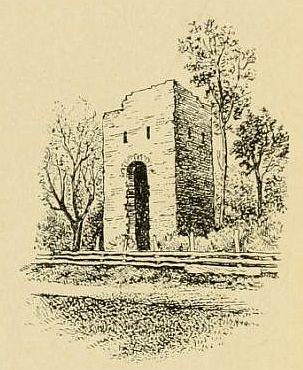
Ruins of the Old
Church at Jamestown.
23. The Settlement at Jamestown.—In 1607 both sub-companies began operations. The Plymouth men sent a fleet to the coast of the present state of Maine, but the colony they tried to plant was a failure. The London Company was more fortunate. Their colonists reached Chesapeake Bay in the spring, and settled about fifty miles above the mouth of a large river, since then known as the James, in honor of the English king. They called their new settlement Jamestown, and at once began to build huts and fortifications.
24. Captain John Smith.[21]—Their leading spirit was Captain John Smith, an adventurous and able man, who in spite of jealousies put himself at the head of affairs and saved the colony. The men sent out were mainly gentlemen adventurers seeking to mend their fortunes, and even some of the real workers followed callings not required in the wilderness. There was consequently much bickering, and soon a scarcity of provisions caused great suffering. The site of the town proved unhealthy, and the Indians encountered had to be watched. Altogether the situation was a wretched one, and but for the energy of Smith and a few others, Christopher Newport, the captain of the fleet, who had gone back to England for supplies, might have found few vestiges of a settlement on his return in 1609. Newport brought stores, but also a number of undesirable colonists. He speedily sailed back to England with a cargo of shining earth, which did not yield the gold it promised to credulous eyes. Smith besought the Company to send out good workmen to cultivate the rich soil; and after a while the promoters of the colony learned not to expect vast discoveries of gold and silver. In October, 1609, owing to an accident to his eyes, Smith left the colony, never to return.

John Smith.
25. Smith’s Character.—Smith’s relations with Virginia have been the subject of much hostile criticism. Discrepancies have been found between his earlier and his later accounts of his exploits, and some historians have been led to regard him as little more than a braggart. This is an untenable view. His management of the refractory colonists, his dealings with the Indian chief Powhatan, his wise and manly remonstrances with the London Company,—all go to show that he was an able and unselfish leader to whom the life of the struggling settlement was mainly due. On the other hand, there can be little doubt, save in the minds of his partisans, that he frequently embellished his accounts of his adventures, and that he is not the most reliable of historians. It is not at all impossible that he was really saved by Pocahontas,[22] yet the story may be as mythical as the coat of arms granted to him by the king of Hungary.

Pocahontas.
26. Annulling of the Virginia Company’s Charter.—In 1609, the year of Smith’s departure, King James gave the Virginia Company a new charter, which defined the limits of its territory in a very vague way and increased its power over its colonists. In 1612 he gave another charter, which took in the Bermuda Islands and allowed the shareholders of the Company to hold general meetings in London. Twelve years later, when the king’s Puritan opponents had got control of these meetings and used them for political purposes, he caused the charter to be annulled by a decree of court, which was a legal though not a justifiable act. The records of the Company were preserved in a romantic way,[23] and are now in the possession of the government at Washington.
27. Growth of Virginia.—Meanwhile the colony had had various ups and downs under several governors,—Lord Delaware, Sir Thomas Dale, the tyrannical Samuel Argall, Sir George Yeardley, and Sir Francis Wyatt,—but had on the whole become firmly established. Dale was strict, but successful in controlling the rougher elements; he also encouraged the policy of allowing settlers to become individual proprietors of land. Argall was speedily recalled for his misconduct. Liberal sentiments then prevailed in the colony, and its inhabitants were allowed, during Yeardley’s administration, to hold a yearly representative assembly, or legislature (1619), the first of its kind in America. This long step toward self-government, together with the increasing importance of the tobacco crop, gave Virginia a decided impetus, which the contemporaneous introduction of slavery, in the persons of twenty blacks landed and sold at Jamestown by a Dutch ship in 1619, did not at first affect. The presence of white slaves in the persons of indentured servants—a class recruited from convicts, vagabonds, and kidnapped children—produced some confusion. But colonists of position and means soon began to exert an influence opposed to disorder, and through Sir Francis Wyatt the Company promised to stand by its grant of free institutions.
28. Charles I. and the Virginia Burgesses.—In 1622 the colonists endured a loss of three hundred settlers, from an attack by the Indians whom they had maltreated. The collapse of the Company (1624) made Virginia a crown colony, dependent on the king, who was succeeded the next year (1625) by his son, Charles I. Charles, needing money in order to be able to govern without his Parliament, tried to get a profit out of a monopoly of the tobacco trade, but the colonial assembly, or Burgesses, as they were called, withstood him (1629). The convening of this assembly to discuss such a matter was an important precedent in the government of the crown colonies; but the assembly, although it could resist the king’s demand, could not prevent a royal governor like Sir John Harvey from making himself obnoxious.[24]
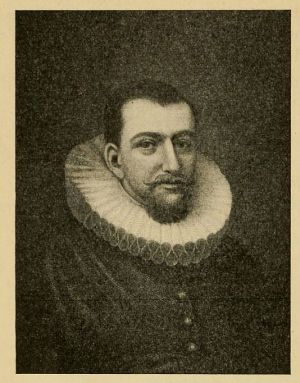
Henry Hudson.
29. Hudson and New Amsterdam.—In the autumn of 1609 Henry Hudson,[25] an English seaman employed by the Dutch East India Company, sailed up the river now called by his name, as far as the site of Albany. He was searching for a northwest passage to India; he found instead a good opportunity to trade with the red men, which the Dutch afterward cultivated. By 1615 houses were built on the site of Albany and of the present New York. The fur trade of New Netherland, as the region was named, was turned over to a corporation organized for that purpose, called the New Netherland Company. Politically no steps were taken at first against the English title to the country. In 1621 the Dutch West India Company took up the rôle of the New Netherland Company, and three years later sent over a number of colonists. These settled mainly near Albany; but there were other centers of population, all of which did a thriving fur trade with the Indians.
30. Organization of the Dutch Colony.—In 1626 Peter Minuit, director for the Dutch West India Company, purchased the Island of Manhattan from the Indians for a trifling amount (about twenty-five dollars), and made the town of New Amsterdam, afterward New York, the center of government. In 1629 the Company obtained a new charter and proceeded to develop a semi-feudal system of land tenure among the colonists. Individuals, styled “Patroons” (patrons), were allowed to buy tracts of land from the Indians and to settle colonists upon them. For every colony of fifty persons the Patroon was granted a large tract for himself; and as he was given political and judicial power over his colonists, New Netherland was soon in the hands of a powerful landed aristocracy, some families of which have retained a certain prestige down to the present time.

New Amsterdam.
31. The Plymouth Colony.—The London Company and the Dutch West India Company had now established promising colonies, but the Plymouth Company had done nothing since their unsuccessful attempt in 1607. Seven years later, Captain John Smith had made a voyage along the northern coast and given the region the name of New England. Other voyages added to geographical knowledge and developed the fisheries, but the more southerly colonies for some time attracted all intending settlers, and the reorganized Plymouth Company of 1620 might have fared poorly had not accident favored them. This accident was nothing less than the landing of the Pilgrim Fathers at Plymouth Rock instead of somewhere within the jurisdiction of the London Company, as they at first intended.
32. The Pilgrims in Holland.—The causes that led the Pilgrims to the New World were briefly as follows. There were large numbers of English Protestants who thought that the Established Church of England had not sufficiently broken away from the Church of Rome, especially in regard to the forms of worship. Such dissatisfied Protestants were called Puritans, and those of their number who refused to commune with the Church of England were further known as Dissenters. Those Dissenters who were ruled by elders, according to the system of Calvin and Knox, were known as Presbyterians. Such as desired each congregation to be independent were called Separatists, or Brownists, or Independents. The Pilgrim Fathers were Separatists who, in order to escape persecution, had fled from the village of Scrooby to Holland. The emigrants, headed by their pastor, John Robinson, and their elder, William Brewster, numbered about one hundred. Settling first at Amsterdam, then at Leyden, they were joined by other refugees, and lived peacefully by their labors.
33. Movement of Pilgrims to America.—These Pilgrims naturally did not wish their children to become Dutchmen; so their minds turned to America. Securing a grant of land from the London Company and financial aid from London capitalists who became partners in the enterprise, they collected their effects and sailed to their new home in the Mayflower.[26] They sighted Cape Cod on November 9, 1620. The captain, for some reason, would not sail farther southward; so after exploring the coast, the emigrants, who had already formed themselves into a body politic under a very liberal written agreement, landed at Plymouth (December 21, 1620).
34. Experiences of the Pilgrims.—Although the winter was mild, the colonists had much difficulty in obtaining shelter and food, and great loss of life was the result, Deacon John Carver, the first governor, being among the victims. William Bradford, one of the finest characters in our history, succeeded him as governor. His courage and that of his people, who believed firmly that they had the support of God, enabled the colony to pull through the crisis. Huts and a fort were built, land was cleared, and provisions and fuel laid in for the next winter. In November, 1621, fifty more of the Leyden people arrived. These were a burden to the colonists for a time, since the supply of food was small; and distribution was made, as at Jamestown, from the common stock. Settlers continued to be sent out by the London partners, but as a rule they came empty handed.
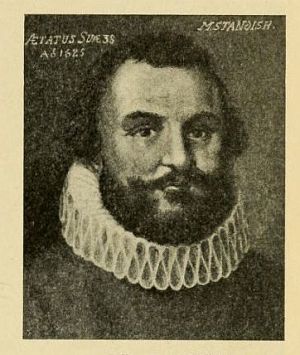
Miles Standish.
35. Success of the Pilgrims.—The colony nevertheless flourished under a patent it had obtained from the Plymouth Company. It owed much of its success to Bradford, who was often elected to the governorship, and to Captain Miles Standish, a brave soldier, not a Separatist, who was especially useful in managing the Indians. Various neighboring settlements of Englishmen who ridiculed the strict customs of the Pilgrims could not be easily dealt with; but finally the chief offenders, Thomas Morton and his associates at Merrymount, who had furnished the Indians with firearms, were put down with a stern hand. Meanwhile the communal system was abandoned for individual allotments of land. At about the same time (1627) the colonists purchased the share of the London capitalists in the enterprise.
36. Government of the Pilgrims.—They governed themselves at first by a primary assembly, then by a general court composed of two delegates from each township, elected by popular vote, together with the governor and representatives, called assistants. In 1636 a special code of laws was adopted; but on the whole the government remained as simple as were the habits of the God-fearing, thrifty people, who in many ways set an example of steadiness and perseverance to all the other colonists. It was, however, a very small settlement, and after various failures to secure its perpetuation through a royal charter, it was finally merged, in 1691, with Massachusetts[27] (§ 60).
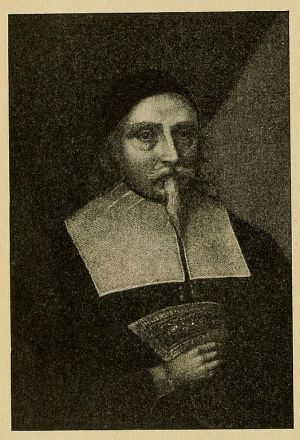
John Endicott.
37. The Puritans and the Founding of Massachusetts.—In 1623 some merchants of Dorchester, England, sent out a colony to the coast of Maine, which for some reason was diverted to the site of the present Gloucester in Massachusetts. Three years later the colony was almost abandoned; but John White, the Puritan rector of Trinity Church, Dorchester, fearing the aggressions of the Crown in ecclesiastical matters, advised the remaining settlers to continue at Salem, whither they had migrated, and immediately laid plans in England for planting a permanent colony. Two years later a patent was obtained from the Plymouth Company for a strip of coast land, and John Endicott[28] led sixty persons to Salem. In 1629 the owners of the patent, who still lived in England, were organized as a Company and given a charter by the king. This charter provided for popular election of the governor and other officers, for a “general court,” or assembly, as well as for the passage of laws not conflicting with those of England.
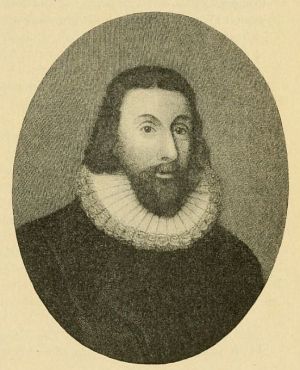
John Winthrop.
38. Government of the Colony of Massachusetts Bay.—The new “Company of the Massachusetts Bay in New England” was ostensibly to engage in trade, but in reality its founders intended to form a religious commonwealth. This could be easily done, since somehow or other no proviso that the Company should have its headquarters in England was inserted in the charter. Thus it was possible to transport the Company bodily to New England, and this a number of prominent Puritans, at a meeting held at Cambridge in 1629, agreed to do. There was to be no violent separation from the Established Church except such as was caused by distance; but uncongenial practices would be avoided, and the heavy hand of Archbishop Laud, then the strenuous Primate of England, would hardly reach across the sea. Thus many men of wealth and education, whose conservatism would naturally have prevented their taking rash steps in their opposition to the Crown, were led to join in the Massachusetts enterprise. In April, 1630, eleven vessels sailed for America, and by the end of the year about a thousand persons had emigrated to the new colony and founded such towns as Boston, Charlestown, and Watertown. They chose as governor a wealthy and highly educated Suffolk gentleman, John Winthrop,[29] and under his able administration the colony began a career of great prosperity and importance.
References.—General Works: To the list already given may be added: Bryant and Gay, Popular History of the United States; H. C. Lodge, Short History of the English Colonies in America; Richard Frothingham, Rise of the Republic of the United States.
Special Works: J. Fiske, Beginnings of New England; J. Fiske, Old Virginia and Her Neighbors; J. G. Palfrey, History of New England; W. B. Weeden, Economic History of New England; P. A. Bruce. Economic History of Virginia; A. Brown, Genesis of the United States; J. E. Cooke, Virginia (“American Commonwealths”); R. C. Winthrop, Life and Letters of John Winthrop; E. Eggleston, Transit of Civilization.
Standard state and colonial histories, such as Hutchinson’s Massachusetts and Belknap’s New Hampshire, may also be used, as well as biographies of colonial worthies. For documents, consult Macdonald’s Select Charters Illustrative of American History, 1606–1775. Illustrative specimens of the earliest historical writings, such as Bradford’s “History of the Plymouth Colony” and Winthrop’s “History of Massachusetts” will be found in Old South Leaflets, Hart’s American History told by Contemporaries, Stedman and Hutchinson’s Library of American Literature, and Trent and Wells’ Colonial Prose and Poetry. See Channing and Hart’s Guide. Many books relating to colonial life and manners have been published recently, but Edward Eggleston’s articles in the Century Magazine (Vols. III.–VIII.) will probably be sufficient for most purposes. Longfellow’s The Courtship of Miles Standish should be read in connection with this chapter.
|
It is worth noting that the Mayflower was not the only vessel of this expedition as it was first arranged. The companion ship, Speedwell, had an accident, and was obliged to return. |
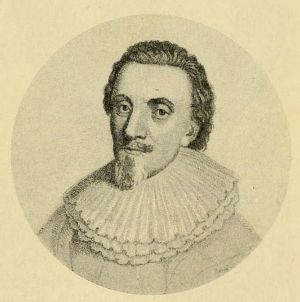
First Lord Baltimore.
39. The First Lord Baltimore.—Among the most important counsellors of James I. was his Secretary of State, George Calvert, the first Lord Baltimore,[30] who had been connected with both the London and Plymouth Companies. His interest in colonial matters was such that he obtained a patent for a colony in Newfoundland; but the enterprise failed in spite of his personal efforts (1621). Later he tried to get a footing in Virginia with some of his fellow-religionists (for he was a stanch Roman Catholic); but the Protestant settlers would not have them (1629). Then he secured a charter from King Charles I. for a tract which, although north of the Potomac River, was within the original bounds of Virginia. The new province was named Maryland, after Queen Henrietta Maria. Lord Baltimore died before he could utilize his grant; but his son, Cecilius Calvert, inherited it and became almost a feudal sovereign in the new region. He could declare war, appoint all officers, and confer titles. The freemen of the colony were to assist him in making laws which required no supervision in England; and the colonists were granted an unprecedented amount of religious liberty.
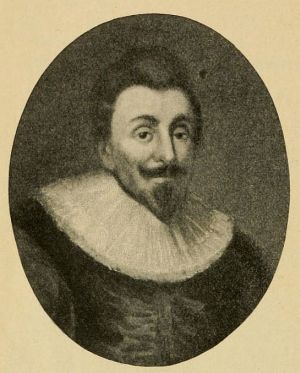
Cecilius Calvert,
Second Lord Baltimore.
40. The Growth of Maryland.—In November, 1633, Leonard Calvert, brother of Cecilius, crossed the ocean with two hundred colonists, and the next year the town of St. Mary’s was founded. Trouble soon arose with a prominent Virginian, William Claiborne, who had previously established a colony on Kent Island, within Baltimore’s jurisdiction. Claiborne was finally expelled, and the colonists, although many of them were Protestants, settled down peacefully. Disputes, however, soon arose with Cecilius Calvert over laws which the freemen insisted on passing; but no serious trouble occurred until the Civil War broke out in England. Then the Protestants gained the upper hand, and in 1645 Leonard Calvert was forced to flee to Virginia. He soon returned, however, and governed until his death, in 1647. After this, considerable confusion ensued; and when Virginia had been secured for the Parliamentarians (§ 42), Claiborne, who had cherished his grievances, compelled Governor Stone of Maryland to renounce his allegiance to Lord Baltimore. When Stone repudiated this agreement, Claiborne, who was a parliamentary commissioner, with the aid of an armed force deposed him, and Maryland passed under the control of the Protestants, who would not allow Roman Catholics to vote or hold office. Cromwell, however, forbade interference with the rights of the Second Lord Baltimore, and Stone, the latter’s legal representative, endeavored to overthrow the Puritan government of the colony, but was defeated in a battle at Providence in 1655. Two years later, Baltimore, through the favor of the English Parliamentarians, recovered his proprietorship and obtained control of Maryland, after a compromise had been made with the Puritan colonists and their Virginia abettors. Greater privileges were granted to the freemen, and there was a general religious toleration. Then followed the excellent administration for fourteen years (1661–1675) of Charles Calvert, the eldest son of Cecilius, who at the end of that period became the third Lord Baltimore. During his governorship many Quakers and foreign immigrants were attracted to the colony, which produced fine crops, notably of tobacco.
41. Revolts of Fendall and Coode.—In 1681 there was a slight revolt, led by a demagogue named Josias Fendall, who had previously been treacherous to the proprietor. He was aided by John Coode, a retired clergyman, and by some Virginians. The uprising was easily put down and would not have made headway had not the people been disturbed by an unpopular local law about the suffrage and by religious and economic legislation in England (§ 43). Another revolt in 1689, led by Coode, was more successful. But in two years the revolutionists were driven from power, and Maryland was made a royal province, the proprietor becoming merely a landlord.[31]
42. Virginia under Berkeley’s First Administration.—We have seen that the royalist governor, Harvey, caused the Virginians at first to regret the gentle rule of the London Company. In 1639, however, Sir Francis Wyatt succeeded Harvey, and affairs began to improve. Three years later, Sir William Berkeley began his long and checkered career as the king’s representative. He was a brave, well-educated gentleman, but full of passions and prejudices that often brought him into conflict with the colonists. His opposition to all efforts to make the colonial government more liberal was intense. He disliked Roman Catholics and hated Puritans; hence such followers of Baltimore and such New Englanders as happened to enter Virginia’s borders, were soon made uncomfortable, as were also the Indians, who were vigorously put down in 1644. Berkeley and most of the Virginians sympathized with Charles I. in his struggle against Parliament to such an extent that after the death of that monarch the governor invited Charles II. to come to America. Charles was too wise to accept, but several thousand cavaliers did come, and thus the colony waxed strong.[32] Parliament did not fail, however, to assert its supremacy. It appointed, as its commissioners, William Claiborne, who had played such a disturbing part in Maryland affairs and was an enterprising trader, and Richard Bennett, a man of prominence and excellent character. It also sent a frigate to the Chesapeake; and with no struggle Berkeley was superseded in 1652 by Bennett, who was elected by the Burgesses. He and his successors ruled well, on the whole, and the colony prospered.
43. Virginia under Berkeley’s Second Administration.—With the Restoration in 1660, Berkeley, who had been living quietly on his estate, was recalled, and then a period of disturbance set in. Severe measures against the Puritans alienated them. Enforcement of the Navigation Act, which compelled colonists to ship tobacco to English ports alone and to receive European goods only from vessels loaded in England, bore heavily on all classes. Then again, Charles II.’s grant of the province to two of his dissolute courtiers, Lords Arlington and Culpepper, naturally caused indignation. At the same time the bad condition of the church in the colony, and the corruption of the public officials, called for correction. The Puritans tried to revolt in 1663, but were suppressed, and matters grew worse. Berkeley became despotic and refused to call a new House of Burgesses, the old House elected in 1660 holding over and actually passing a law restricting the suffrage under which new elections would be held. To crown all, the Indians began to murder frontier settlers; but the governor, who feared printing presses and schools, feared the native militia also, and would not allow them to attack the savages.
44. Bacon’s Rebellion.—At this juncture, Nathaniel Bacon, a young member of the council, brave, honest, and hot-headed, raised, without orders, a private force and defeated the Indians (1676). Berkeley resented this unauthorized action and declared Bacon and his followers rebels. For several months a petty civil war went on, good fortune being with Bacon, who drove Berkeley out of Jamestown, and burned the place. The revolt would not have reached such dimensions had not the general situation been intolerable; but it was bound to be practically local, whatever may have been Bacon’s schemes for a general colonial uprising against the Crown. Even as a local movement it was soon ended, for Bacon’s premature death (October, 1676), whether from poison or fever, left no one to oppose Berkeley. The latter returned to power and continued his tyrannical course, executing no less than twenty-three of the leading rebels. This disgusted Charles II., who had shown much mildness toward his rebellious subjects in Great Britain. So Berkeley was recalled to England in 1677, and died there shortly after in disgrace.
45. Berkeley’s Successors.—The Virginians hailed his departure with bonfires; but in spite of his faults, Berkeley’s career is a pathetic one. He had not moved with the times. His successors in office, on the other hand, moved too fast, for they imitated the corruption of the court at London and overawed the colonists in addition to taking money from them. There were six of these governors in twenty-one years. They quarreled with the Burgesses and kept the colonists in a ferment of riots and hangings; yet the population grew, and some progress was made. A new capital was established at Williamsburg, and the College of William and Mary was founded there in 1692 by Rev. James Blair.

Sir Henry Vane.
46. The Progress of Massachusetts.—Although the colony of Massachusetts Bay had a most vigorous start, it was not without its troubles from the beginning. The governor’s “assistants” soon tried to concentrate power in their own hands, but the freemen (who, by law, must be church members) resisted, and a representative house was inaugurated. Voting by ballot was introduced in 1634, but it was not until ten years later that the administration of affairs was thoroughly organized under a governor and two houses. The migration of such leading Puritans as Sir Henry Vane the younger,[33] and the proposed coming of others, did not serve to put down the democratic tendencies of the colony, which was daily increasing in population and wealth, much of the latter being due to the fisheries and the coasting trade. As a rule, the colonists were of the educated middle class, thoroughly religious and devoted to their pastors, many of whom were very able men. One of these clergymen, John Harvard,[34] by means of a legacy and the gift of his library, assured the founding of the first college in the country, which has since grown into the great university at Cambridge that bears his name.
47. Troubles between Massachusetts and the Crown.—Meanwhile persons who had been driven out for not conforming with the ideas of church and religion held by the majority of the citizens of Massachusetts, had complained to Archbishop Laud, and that prelate and other councilors had passed laws for securing religious uniformity, obviously aimed at Massachusetts. The colony was soon up in arms, but dispatched Edward Winslow to England to try first the force of pleading. The breaking up of the Plymouth Company complicated matters, and after legal proceedings the colony’s charter was declared null and void. The colonists silently refused, however, to surrender their charter, and were saved from further external trouble, for a time, by the civil turmoils in England itself.
48. Domestic Difficulties.—Internal troubles beset them also, for they were as determined as their persecutors to have religious uniformity of their own kind. They drove out the noble pastor of Salem, Roger Williams, because he was opposed to giving political power to church members only. They disliked, moreover, his advocacy of liberal principles of toleration, as well as his theories limiting the king’s power to grant lands in America. Williams escaped in the winter of 1636, thanks partly to the kindness of Indians, to whom he was always a friend; in the spring of the same year he founded Providence Plantation on Narragansett Bay. Then Massachusetts was thrown into a ferment by a Mrs. Anne Hutchinson, who preached certain theological doctrines distasteful to the mass of the Puritans, although agreeable to some of their leading ministers. In 1637 she was banished; whereupon some of her adherents betook themselves to the island of Aquidneck, afterward called Rhode Island, where she subsequently joined them. The affair seems ridiculous now, but it disturbed the colony and marked the beginning of a tyrannical policy of repression that had evil results (§ 55).
49. Foundation of Rhode Island.—This intolerance led, however, to the more rapid settlement of New England, and was thus in part a power for good. The Hutchinsonians founded a town which they called Portsmouth, and thither, as well as to Providence, many discontented people flocked from Massachusetts, both settlements receiving bad names in consequence. In 1639 Newport was founded by Portsmouth people who dissented from Mrs. Hutchinson; but the next year the two towns united to form the colony of Rhode Island. In 1644 all the towns in the region joined to form the colony of Rhode Island and Providence Plantations, under a charter obtained by Roger Williams from the Parliamentarians. A separate charter was later obtained by a faction for Newport and Portsmouth; but finally, in 1654, the single colony was restored under Williams. It was a home of toleration, and as such reflects credit upon Roger Williams, its founder; but it was for a long time a home also of fanatics of all sorts.
50. The Connecticut Settlements.—Meanwhile settlements had been made by Massachusetts men[35] on the Connecticut River (1635), which angered the powerful Pequot Indians and drove them to war. The Narragansetts were kept from the war-path by the entreaties of Roger Williams, but the Pequots were strong enough to harass the Connecticut towns of Hartford, Windsor, Saybrook, and Weathersfield. The Connecticut settlers appealed for aid to Massachusetts and Plymouth. A small army was raised which, under Captains John Mason and John Underhill, stormed the Indian village and almost exterminated the tribe (1637).
51. Free Government in Connecticut.—For a short time Connecticut owed allegiance to Massachusetts, but independence was assured in 1639. The people adopted a written constitution, liberal in its terms. This was the first of its kind in America, and was chiefly the work of Rev. Thomas Hooker of Hartford. In 1638 a colony was founded at New Haven by a congregation of Englishmen under Theophilus Eaton and John Davenport. Other congregations, all ultra-Puritanic, formed towns around, which were at first independent, but afterward united with New Haven. The new colony was weak, however, and was finally joined to Connecticut in 1665.
52. Evolution of New England.—Four years previously Massachusetts had absorbed the last of the towns founded in the colony of Maine, which Sir Ferdinando Gorges, a prominent member of the Plymouth Company, had been endeavoring to develop since 1622. The colony of towns planted on the Piscataqua under the grant made by the Plymouth Company to John Mason in 1629, which afterward became known as New Hampshire, was incorporated with Massachusetts by 1643.[36] Thus one by one the New England colonies were being evolved and developed, Massachusetts, however, retaining her primacy. While local differences were soon to be detected, the people of the entire region were one in their main characteristics. They were religious after the Puritan fashion. They were brave and enterprising in extending their borders and their influence. They were thrifty and resolute in extracting wealth from their rugged soil and their storm-tossed waters.
53. Formation of the Confederacy.—Similarity of habits, union of interests, and contiguity of territory naturally led the New England colonies early to think of establishing some form of political union. In 1637 the Connecticut people, who were menaced by the Dutch on the one hand and by the French Canadians and Indians on the other, made overtures for union to the people of Massachusetts. The latter were indifferent, but the proposition was renewed in 1639 and in 1643, and was acted upon favorably in the latter year. One reason for the final success of the movement for union was the belief that the civil turmoil in England might react on this side of the Atlantic, especially if the illiberal king should win. Accordingly, in 1643 a written constitution bound the colonies of Massachusetts Bay, Plymouth, Connecticut, and New Haven in a “perpetual league of friendship and amity for offense and defense,” under the name of “The United Colonies of New England.” Each colony was independent in local matters, and each contributed two members to a commission which determined such large matters of common interest as declaring war, forming leagues, etc. In case of disagreement among the commissioners, questions were to be decided by the legislatures of the colonies.
54. The Work of the Confederacy.—The Confederacy thus established lasted theoretically forty-one years, but was really efficient only during the first twenty. The chief difficulty it had to contend with was the disproportionate burden laid upon Massachusetts, which had but one vote and yet was more heavily taxed in men and money than any other member of the league. This led to friction, but in the main, Massachusetts, being stronger than the other colonies, succeeded in directing the general policy. This was on the whole exclusive, since the people of Rhode Island and Maine were not allowed to enter the league. There was a curious disregard of England’s wishes in the matter of such a combination of dependent colonies, but at that time England had enough to do in looking after herself. Massachusetts was particularly jealous of English interference, and did not even proclaim the Protectorate of so stanch a Puritan as Cromwell. The Confederacy need not, indeed, have attracted much notice, for the commissioners acted mainly as a committee to look after the general prosperity of the colonies. But Massachusetts showed not a little boldness in passing laws against the raising of troops in the interest of King Charles. There was also, as was to be expected, quite a show of religious independence. The Presbyterians, although for a short time triumphant in England, were not so fortunate in Massachusetts; for in 1648 a synod was held at Cambridge, which defined and established a Congregational system, the principles of which have been strong in New England ever since, and have played an important part in the evolution of American democracy.
55. Trouble with the Dutch.—Meanwhile the settlers in New Haven and Connecticut came into unpleasant relations with the Dutch at New Amsterdam, on account of settlements pushed out in the direction of the latter. When England and Holland went to war in 1652, the Connecticut colonies tried to make the other members of the Confederacy engage in hostilities with the Dutch in America, but Massachusetts resisted. Cromwell sent over a fleet to Boston, which only partially succeeded in coercing Massachusetts; but before the eight hundred New Englanders gathered to attack New Amsterdam could be utilized, news came that England and Holland had made peace. Another instance of local troubles between Connecticut and Massachusetts was due to a war of trade duties between the two colonies, which came near breaking down the union. Still another cause of commotion was the arrival in Massachusetts of a few members of the newly established society of Friends, or Quakers, who astonished the staid citizens by their extravagant opposition to the state religion. Some laws were passed against them, and four were actually hanged on Boston Common. Plymouth and New Haven also treated them harshly, but Connecticut indulged in little persecution, and Rhode Island in none at all.
56. Dissolution of the New England Confederacy.—The practical breaking up of the Confederacy followed the restoration of Charles II., and was due to the fact that the king suspected that the colonies wished to separate completely from England. They had been slow to recognize his supremacy, and had harbored two of the judges that had condemned his father. At first Massachusetts managed to stave off the crisis; but in 1664 the king sent over four royal commissioners to investigate colonial affairs. After conquering the Dutch port of New Amsterdam, with the aid of Connecticut and of the troops they brought over, the commissioners quarreled with the people of Massachusetts with regard to their charter. The General Court of the colony evaded giving an answer to the king’s demands, and his agents returned home, having accomplished little. Connecticut, Rhode Island, and Plymouth were more submissive, and the first named was rewarded with a liberal charter and with the annexation of New Haven. This interference of the king with American affairs greatly weakened the Confederacy; besides, the new generation that was growing up probably did not feel the same alienation from England that their fathers had felt.
57. King Philip’s War.—Meanwhile there had been trouble with the Indians, although the New Englanders had treated them better than any of the other colonists had done—a fact strikingly exemplified in the life work of the Apostle John Eliot, who translated the Bible into a written language rather unskillfully invented for them by himself. Troubles arose in connection with Alexander and Philip, two sons of Massasoit, the friendly chief of the Pokanokets. Alexander died at Plymouth, and Philip thought the colonists had poisoned him; hence he planned a general Indian uprising, making his headquarters on Mount Hope, a peninsula running into Narragansett Bay. After many fiendish outrages had been committed on towns in Plymouth and Massachusetts, the federal commissioners enlisted a volunteer army. In December, 1675, this army attacked a palisaded fort of the Indians at what is now South Kingston, Rhode Island, and slew about one thousand warriors, half the force within the walls. Philip still continued the struggle; but the following August he was killed, to the great rejoicing of the whole of New England; for the two years’ war, since known as King Philip’s War (1675–1676), had been a frightful experience.
58. Loss of Massachusetts’ Charter.—Their own king was now to give the people of Massachusetts further trouble. Massachusetts, by extending her dominion over New Hampshire and Maine, had involved herself in disputes with the proprietors of those colonies; Church of England people were enraged at the fact that she would not tolerate their form of religious service or give them the suffrage; she was also charged with violating the navigation laws. Aggrieved at these things, Charles made New Hampshire a royal province in 1679; but his governor proved a tyrant, the people rebelled, and in six years the sway of Massachusetts was resumed. Control of Maine was lost for three years (1665–1668), but later on Massachusetts shrewdly purchased the rights of the proprietors over it. Charles intended to give Maine to his son, the Duke of Monmouth, so he had an additional pretext for demanding that Massachusetts should make a fair answer to all his complaints—a course of action which the General Court of the colony continued to evade. In 1684, weary of the evasions of Massachusetts, he caused the old trading charter to be annulled.

Sir Edmund Andros.
59. The Tyranny of Andros.—Massachusetts was now a royal colony, and in one year it exchanged masters for the worse. James II. was a devoted Roman Catholic, who had no sympathy with New England Puritans. In 1686 he sent over Sir Edmund Andros,[37] as governor of Massachusetts, Plymouth, New Hampshire, and Maine. Andros was a servant worthy of his master, vexatious and tyrannical. He demanded the charters of Rhode Island and Connecticut; his demand was acceded to in the former colony, but in the latter it is said that the important document was hid at Hartford, in a tree since known as the “Charter Oak.” The governor was not to be foiled, however, for he declared Connecticut to be under his jurisdiction, and took in New York and the Jerseys (§ 68) as well. Thus he had the largest territory ever ruled by a provincial governor in America. He held Episcopal services in Congregational churches, suspended the writ of habeas corpus, levied illegal taxes, and made himself thoroughly obnoxious.
60. Fall of Andros: New Charters.—In the spring of 1689 news came of the accession of William and Mary, and the tyrant of the colonies was driven out, just as James had been from England. The old charters were restored for a time, but in 1691 Plymouth and Acadia (§ 98, note 1) were added to Massachusetts, and in 1692 a new charter was given the colony. By this instrument the people were still permitted to vote for representatives; but the governor was appointed by the Crown, and religious qualifications for the suffrage were abolished. Massachusetts was allowed to keep Maine, but New Hampshire was made a separate colony. Connecticut and Rhode Island recovered their charters, and the century ended with New England comparatively quiet and loyal.
61. The Dutch Settlers.—The Dutch West India Company fared badly at the hands of its own members, the “Patroons,” who shut it out from trading with their estates. It also had trouble, as we have seen, with New Englanders at Hartford, and likewise with the Virginians, who came trading as far north as the Delaware River. With the Indians, too, there were serious disturbances, chiefly with the Algonquins, through the mismanagement of Governor Kieft (1643–1645).
62. Attempts to check the Patroons.—The Company sought to check the power of the “Patroons” by establishing communities more or less independent of them, but the attempt did not thoroughly succeed. Political disturbances were also due in large measure to the overbearing conduct of governors, and to the lack of proper guarantees of popular liberty. In 1641, however, a council of twelve deputies from the settlements was called in to assist the governor, and a little later, under Peter Stuyvesant,[38] this was made a self-perpetuating council. Government was rendered specially difficult on account of the mixture of population in the colony. For example, so many French Huguenots had fled thither that documents were often printed in both French and Dutch.
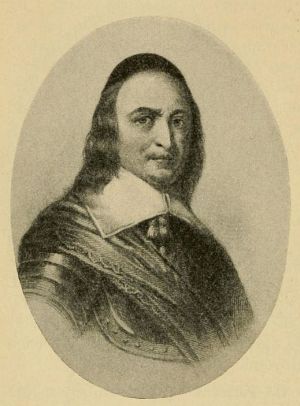
Peter Stuyvesant.
63. Swedish Settlement.—Meanwhile difficulties arose between the Dutch and the Swedes; for in 1638 the South Company of Sweden, which had been chartered under Gustavus Adolphus by an enterprising man, William Usselinx, sent out a former employee of the Dutch Company, Peter Minuit, to found a colony. He erected a fort on the site of what is now Wilmington, Delaware, and called the country New Sweden, under the protests, of course, of the Dutch, whose territorial claims had been invaded. New Englanders tried to establish themselves on the Schuylkill and in the present New Jersey, but were soon driven out. The Swedes persevered until Stuyvesant built a fort near one of theirs, not far from what is now Newcastle, Delaware; and four years later (1655) the Swedish Company was forced to give up its attempt at colonization.
64. New York taken by the English.—These successes of the Dutch, and the fact that their territory cut off New England from Virginia and gave Dutch traders, by means of the Hudson River, the best possible opportunity of reaching the Indians, made it impossible for England long to acquiesce in the continuance of Dutch rule in the New World. There had already been trouble in Connecticut, on Long Island, and on the Schuylkill (§§ 55 and 61), and things came nearly to a crisis in 1654, when Cromwell sent out a fleet to take New Netherland. But peace between England and Holland delayed the crisis for ten years. In 1664 Charles II., as we have seen (§ 56), renewed the English claim to the territory, and acting on his orders Colonel Nicolls menaced New Amsterdam with a small fleet, which carried English regulars and Connecticut volunteers. Governor Stuyvesant wished to hold out, but the townsmen surrendered in haste. The other Dutch settlements yielded rapidly, and the whole Atlantic coast from Maine to Florida thus became English. New Netherland was now called New York, in honor of its proprietor, the Duke of York, Charles’s brother—afterward James II. Nicolls was made governor, and the prosperity of the colony was greatly augmented.
65. Government of New York.—Dutch customs were on the whole little changed, but the form of government was modified in accordance with English precedents. The towns were provided with a local government, under an elected constable and overseers. Several towns formed a “riding,”[39] under the jurisdiction of a sheriff; later, the ridings became counties. Thus New York had an intermediate system between the town government of New England and the county government of Virginia (§§ 82 and 89). The conduct of colonial affairs, however, depended entirely on the governor and his council. The early governors presented much the same contrasts of character as had been seen in the other colonies. Some were excellent, others were tyrannical. On the whole, the colony managed to grow and prosper, although in 1673, when England and Holland were at war, a Dutch fleet captured the town of New York. The next year the province was given back to the English by treaty, and, curiously enough, the first governor under the new English rule—Edmund Andros, the later tyrant of New England—gave the colonists an excellent administration. After a few years the people clamored for greater political privileges. An electoral assembly of deputies and certain reforms were in consequence granted by the Duke of York; but when he came to the throne as James II., he restored the old illiberal system.
66. Leisler’s Insurrection.—Relief was at hand, however; for on the news of the accession of William and Mary a German shopkeeper, Jacob Leisler, put himself at the head of the militia and drove out Francis Nicholson, who was acting as deputy for Andros. Leisler was a rash patriot, who would not give up his irregularly acquired power. Two years later he was forced to surrender, and was executed under circumstances not altogether creditable to the regular authorities. Leisler’s administration is notable for his having issued a call for a colonial congress, which came together at the town of New York, on May 1, 1690, and discussed French and Indian affairs. After Leisler, the people of New York suffered at the hands of a corrupt governor, Benjamin Fletcher, who was in league with the numerous pirates of the period; but at the end of the century his successor, the Earl of Bellomont, put down piracy and corruption, and restored order generally.
67. The Settlement of the Jerseys.—Meanwhile the country south of New York and east of the Delaware River had acquired the name of New Jersey, through the fact that in 1664 the Duke of York granted it to Lord Berkeley and Sir George Carteret, the latter of whom had been governor of the island of Jersey during the English civil war. The region for which Dutch, Swedes, and English had already struggled was still scantily populated; but the proprietors gave it a liberal form of government, and sent out as first governor Philip Carteret, nephew of Sir George, with a body of emigrants who settled at Elizabeth.

William Penn.
68. Disturbances in the Jerseys.—Other settlers came in, and by 1668 a code of laws of remarkable severity was adopted by the delegates of the people. Disturbances arose over the subject of the quit-rents paid by freeholders in discharge of services, and Lord Berkeley was so disgusted that he sold his share in the province to certain Quakers who wished to secure for their co-religionists a place of refuge in the New World. William Penn[40] and some associates shortly afterward acquired this interest. Then a division was made between Carteret and the new proprietors, the Quakers getting less than half, which formed West New Jersey. Here they set up a liberal government, which attracted several hundred immigrants. In 1682, two years after Carteret’s death, William Penn and others purchased his interest in East New Jersey, and established another liberal government. Governor Andros of New York endeavored to assert his jurisdiction over both the Jerseys, but his attempts were defeated until 1686, when James II., by writs of quo warranto,[41] forced the surrender of the patents. The Jerseymen, however, resisted all Andros’s attempts to tax them, and also quarreled with the proprietors, whose land rights had not been affected by the loss of their political powers. Finally, at the beginning of the eighteenth century, the proprietors, worn out with the struggle, surrendered all their rights to the Crown, and the two provinces were united into the royal colony of New Jersey.[42]
69. The Founding of Pennsylvania.—William Penn’s interest in the colonization of West Jersey led to his taking a greater part in American affairs. In 1670 his father, an admiral in the English navy, died, and left him a claim against the government, in compensation for which he induced Charles II. to give him a charter for forty thousand square miles in America (1681). This region was named Pennsylvania in honor of the admiral, against the modest wishes of the proprietor. Penn at once offered liberal terms to colonists, and promised a thoroughly equitable government. Later in 1681, three shiploads of Quakers emigrated, and the next year Penn himself came over and founded Philadelphia. He soon convened an assembly, and a code of laws was drawn up, allowing considerable religious freedom and providing for the humane treatment of the Indians. With these savages Penn, through his shrewdness and kindness, was always successful in his negotiations, and as a result Pennsylvania did not suffer from border warfare.
70. Mixture of Population.—The mixed population for which Pennsylvania has been always noted was present from the beginning. The Dutch had a church within the region now known as Delaware, and settlements of Swedes also existed. This Delaware region came into Penn’s hands through a special grant from the Duke of York. When the whole province was divided into counties, three were made in Pennsylvania proper, and three in the small strip covered by the Duke’s grant, which became known as “The Territories.”
71. Delaware made a Province.—Penn was soon obliged to return to England, and did not come back again till the end of the century, when he paid a two years’ visit. His absence was marked by considerable political disturbance. There were boundary disputes with Maryland, and there was so much trouble in “The Territories” that in 1703 Penn made the latter the separate province of Delaware. Disputes in both provinces continued, however, and lasted, under both him and his heirs, down to the Revolution. Nevertheless, there was a marked and continuous growth in material prosperity.
72. The Settlement of the Carolinas.—As we have seen, attempts had been made to settle in the region between Spanish Florida and Virginia, both by French Huguenots and by Englishmen sent out by Raleigh. But all such efforts had failed. After the founding of Jamestown, hunters and other adventurous spirits wandered through southern Virginia into what Charles I. subsequently granted to Sir Robert Heath as “The Province of Carolina.” This grant was not used, but the Virginia Burgesses authorized exploring expeditions into the new region, and in 1653 some Virginian dissenters who had been harshly treated formed a colony in North Carolina, which they called Albemarle. Other parties, including Quakers and individual settlers, gradually pushed into the section.
73. Grant of the Carolinas to Clarendon and Berkeley.—In 1663 Charles II. turned over the province to a group of favorites, among whom were the famous historian, the Earl of Clarendon, and Sir William Berkeley, the governor of Virginia. The settlers of Albemarle had their land claims recognized, and were given a governor in the person of William Drummond, a Scotchman who had settled in Virginia. South of Albemarle, on the Cape Fear River, a number of emigrants from the island of Barbadoes had planted a colony, known as Clarendon, under the leadership of Sir John Yeamans, who continued as governor under the new proprietors. Thus there were a northern and a southern Carolina almost from the first.
74. Liberality of Proprietors.—The proprietors were very liberal to their colonists. Indeed, in the northern province the first legislature actually felt bold enough to decree that no debts contracted by settlers previous to their coming to Carolina could be collected within its borders,—a proceeding which naturally attracted some not very desirable immigrants.
75. Locke’s Constitutions.—But the proprietors made a great mistake when they intrusted to the celebrated philosopher, John Locke, the task of drawing up a scheme of government for their provinces. He prepared a document known as the “Fundamental Constitutions,” in which he seemed to forget most of the advances toward individual and popular liberty that had been made since the Middle Ages. Various divisions of the territory were to be presided over by orders of nobility known as Landgraves, Caciques, etc. The tenants were called “leetmen,” and could not leave the estate of their lord without his permission, nor could their children be anything but leetmen through all generations. It is needless to say that this scheme for a mediæval aristocracy in a land not yet cleared of forests was doomed to failure, for it at once produced discontent in the settlements, to which that of Charleston (originally Charlestown, founded in 1670) was now added.
76. Progress of the Carolinas.—For some time the proprietors left the settlers of Albemarle, or the North Carolinians, as we may now call them, severely alone, and the people managed to live by means of a rude sort of agriculture and by trade with New England. When governors were appointed for them, troubles at once ensued, and the legislature in 1688 actually drove out Governor Seth Sothel, who by his corruption and tyranny had amply deserved his fate. At Charleston, however, things went much better, and population and trade increased, while the arrival of considerable numbers of French Huguenots added greatly to the moral and intellectual advancement of the settlers. But there were some troubles. For example, the Scotch settlement at Port Royal was completely destroyed by the Spaniards; yet the proprietors would not allow the Carolinians to chastise their enemy. Then, too, the Huguenots were for some time denied political rights, and the numerous dissenters had trouble with the Church of England people. Trade restrictions and the constant presence of pirates in the harbor of Charleston and on the coast were also a source of embarrassment. Finally, there was a series of bad governors, and it was not until 1695, when one of the proprietors, John Archdale, a shrewd and good Quaker, came from England as governor, that things began to improve.
References.—The bibliography is much the same as for Chapter II., with the addition of: David Ramsay, History of South Carolina (2 vols.); Edward McCrady, History of South Carolina (3 vols.); Alexander Johnston, Connecticut (“American Commonwealths”); E. H. Roberts, New York (“American Commonwealths”); W. H. Browne, Maryland (“American Commonwealths”); C. F. Adams, Massachusetts, its Historians and its History; F. L. Hawks, History of North Carolina (2 vols.); J. T. Scharf, History of Delaware (2 vols.); J. T. Scharf, History of Maryland (3 vols.); S. G. Arnold, History of Rhode Island (2 vols.); S. G. Fisher, The True William Penn; W. H. Browne, George Calvert and Cecilius Calvert (“Makers of America”); O. S. Straus, Roger Williams. For both Chapters II. and III., see especially Thwaites, The Colonies, chaps, iv., vi., vii., and ix.
Several interesting novels have their scenes laid in the early colonial period; of these, Hawthorne’s Scarlet Letter is the most famous. Cooper’s Water Witch and Simms’s Cassique of Kiowah describe early New York and Charleston. Irving’s History of New York by Diedrich Knickerbocker is practically a work of fiction and is full of humor. For more recent and other older novels, see Channing and Hart’s Guide, § 36 a.
|
Born, 1582; died, 1632. Graduated at Oxford, 1597; became a Roman Catholic in 1624; obtained a patent (1632) from Charles I. for what is now Delaware and Maryland. |
|
A writ compelling a person or body of persons to show by what authority they hold certain rights or offices. |
77. Population.—We have now learned that of the thirteen original colonies that formed the United States, all except the youngest, Georgia, had attained individual, or semi-individual, existence by the end of the seventeenth century. The population of New England in 1700 was about one hundred and five thousand, Massachusetts, including Maine, leading with about seventy thousand, and Connecticut coming second with about twenty-five thousand. Rhode Island and New Hampshire were much smaller, containing only six thousand and five thousand respectively. Homogeneity, thrift, piety, and love of liberty characterized the population of the New England colonies, and were the presage of the great development the eighteenth century was to see. The population of the Middle colonies in 1700 was about fifty-nine thousand, New York having twenty-five thousand, the Jerseys fourteen thousand, and Pennsylvania and Delaware about twenty thousand. Homogeneity was characteristic of New Jersey alone, both New York and Pennsylvania having very mixed populations. Thrift characterized all the Middle region; but English enterprise was somewhat tempered by Dutch phlegm and Quaker sobriety. In the Southern colonies (if we may estimate from figures of 1688) there were more than twenty-five thousand persons in Maryland, sixty thousand in Virginia, and about five thousand in the Carolinas. The English race was dominant, but the presence of large numbers of black slaves, who were chiefly fit for work in the fields, checked the enterprise of the whites by confining it practically to agriculture.
78. Social Conditions.—With regard to social conditions, the tendency in the South was to form an aristocracy, based on race and the distinction between manual and other forms of labor. In New England, too, there was an aristocracy, based mainly on education and religion, but also on birth and wealth. In the Middle colonies there were traces of an aristocracy in the “Patroons” of New York and in the masters of the fairly numerous negro slaves. But on the whole, manual labor was held in esteem, and the population was democratic in its tendencies.
79. Political Characteristics of New England.—The aristocracy of New England was unlike any other the world has ever seen. Its members were energetic, unusually well-educated, serious, and full of a sense of responsibility. They filled with distinction the public offices and the professions, especially the ministry. Precedence was allowed them by the merchants, farmers, and mechanics through force of custom, not through the presence of a caste system like that of slavery (although a few slaves were owned), or through the force of laws derived from the feudal system. As the masses of the people increased in wealth and culture, and learned to use the opportunities allowed them by the New World, the power of the aristocracy naturally decreased, although it continued to exert considerable influence well into the nineteenth century.
80. Professional Life.—As was to be expected in such religious communities, the clergy formed the most important section of the aristocracy. They led in all public affairs, down to the struggle for independence, and even beyond it, in spite of the loosening of religious ties that began to make itself felt in the eighteenth century. The other learned professions did not at first reach corresponding importance. There were hardly any trained barristers before the beginning of the eighteenth century, although the magistrates were men of good character and general education. The physicians, like their European brethren, used strange drugs, and prescribed heroic remedies which seem very queer to us now; and they frequently combined their profession with that of the gospel or with the trade of the barber.
81. Mechanic Arts and Commerce.—In the mechanical arts, the New Englanders were more independent than the other colonists. They imported elaborate manufactured products, but supplied themselves with the simpler ones in spite of the repressive effects of English laws. Among the most important industries were mining, timber-cutting, tanning, and distilling. Various needful commodities were manufactured in small quantities, while almost every farmer’s family made homespun cloth for its own consumption, as well as nails and similar articles. Fishing was carried on at great profit, and shipbuilding had developed considerably by the middle of the seventeenth century. The whale fisheries were specially important and attracted many adventurous men. The hardy sailors made both coast and ocean voyages, the trade with the West Indies being of great consequence, since from these islands sugar and molasses were brought home and made into rum.
82. Town Life in New England.—Boston and New Haven were the chief towns, and presented a prosperous appearance. There were many well-kept villages, which were centers of active political life, since those local affairs which were far more important to the inhabitants than the more general business of the colony, were settled by the citizens at town meetings. The houses of the people were on the whole comfortable. Each village had a school for the common branches, and soon good Latin schools were provided. Puritan simplicity prevailed in manners and dress, and, what was better, in conduct, crime being rare. There is practically but one stain on New England character during the early colonial period—the stain of persecution. We have already seen its effects in the religious intolerance displayed against churchmen and Quakers and independent thinkers like Roger Williams; but at the end of the seventeenth century it took an even worse form.
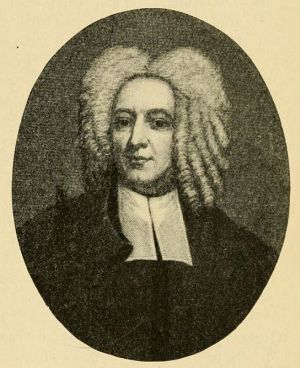
Cotton Mather.
83. The Persecution of the Witches.—Owing to political disturbances, fear of Indians, and the ravages of smallpox epidemics, the inhabitants of Massachusetts, near the end of the seventeenth century, were seized with great despondency. In common with many persons in England and in Germany they believed that the Scriptural injunction, “Thou shalt not suffer a witch to live,” was binding upon a modern Christian community. Under the impulse of this belief they began a persecution of many citizens, chiefly old women, for the supposed crime of witchcraft. Trials were held, presided over by learned magistrates; the testimony of frightened children was taken; and in Salem (1692) nineteen persons were hanged, and one pressed to death. Hundreds of others were arrested on suspicion, and for a time the colony seemed completely to have lost its reason. Even such a distinguished scholar and minister as Cotton Mather[43] shared in the frenzy and defended it. But Judge Samuel Sewall (now known for a famous diary descriptive of the life of the period) made a public recantation in church of his share in the frightful business. It was indeed a terrible time, but New England emerged from it safely, and could point in extenuation to many similar outbreaks of popular frenzy in the Old World.
84. Literature.—It has been held, with much show of truth, that only a people, gifted with imagination could have been stirred into such a frenzied state of mind as characterized the New Englanders during the persecution of the witches. Unfortunately, their imaginative powers were employed too exclusively upon religious and theological themes, with the result that although much was written in New England during the seventeenth century, little truly imaginative literature was produced. Drama and fiction were non-existent, and the verse written hardly rose to the dignity of poetry. Mrs. Anne Bradstreet (1613–1672) and the Rev. Michael Wigglesworth (1631–1705, author of a quaint, grewsome poem entitled The Day of Doom) are almost the only poets worthy of mention, and their works are unread to-day. There were, on the other hand, many learned divines, like Thomas Hooker (1586–1647), John Cotton (1585–1652), Roger Williams (1607–1684), and Increase Mather (1639–1723), whose sermons and religious tracts were widely read by their contemporaries; but oblivion has fallen upon them also, save perhaps in the case of Williams. Next in importance to theology stood history, and among the historians the chief place must be given to Governors William Bradford and John Winthrop, who wrote the early annals of their respective colonies of Plymouth and Massachusetts Bay. But probably the most able and distinguished writer produced in America during the seventeenth century was the celebrated divine already mentioned, Cotton Mather (1663–1728), who was, as scholar, theologian, and historian, an epitome of the learning of the age. His best-known book, Magnalia Christi Americana (1702), is an ecclesiastical history of New England that is of great value to all students of early American annals. There was a little writing done in the Middle and Southern colonies, but it did not differ in quality from that done in New England and does not demand attention here.
85. Social Classes and Occupations.—The Middle colonies, as we have seen, were in the main democratic, but the New York “Patroons” on their estates asserted their privileges as semi-feudal landlords, and in their town houses even lived in comparative luxury. Among the Quakers, too, in the other colonies, there were always some leading families that formed a quasi-aristocracy. The professions, as in New England, commanded the respect of the people, especially in Pennsylvania, which attracted some well-educated settlers. The masses of the people were engaged either in agriculture or in trade. Fur was the most important article of export; but grain and flour were also exported in return for foreign commodities. Manufacturing was carried on in a small way, especially by the Germans at Germantown, Pennsylvania. There was a fair amount of coast and river trade; for the roads were quite bad, except on the main post-line running from New York to Philadelphia through New Jersey, and in consequence the waterways were much used for purposes of transportation of goods and travelers.
86. Social and Political Life.—With regard to social life the Middle colonies were somewhat less sober than New England. Dancing parties, corn-huskings, and the like festivities diverted the country people; while the towns had races, cock-fights, and other similar amusements of the period. In point of elegance and fashion, New York was inferior to Boston, but was superior to Philadelphia. The English predominated in the towns; but the Dutch, with their sobriety, neatness, and narrowness of life, dominated the country districts, which did not extend much farther than Albany, or, indeed, far away from the Hudson River. The settlers of the outlying districts in both New York and Pennsylvania were rude and simple in their manner of living—were, in fact, our first backwoodsmen. Facilities for education were everywhere far inferior to those of New England, although one or two good schools existed in New York and Philadelphia. Religious influences were much mixed, owing to the variety of creeds tolerated; but Quaker sobriety was almost as strong as Puritan rigor in suppressing Sabbath-breaking and other forms of popular license. Politically, the Middle colonies were not so stable and well governed as New England. In New York and Pennsylvania taxes were heavy, and there was considerable discontent against the colonial officials and the mother country. Rioting at elections was frequent in New York. The Quakers were naturally more peaceful; indeed, their reluctance to bear arms partly prevented a complete union of the colonies for self-defense against the Indians. But all things considered, the Middle colonies in 1700 were in a prosperous condition, and had laid a foundation for the immense wealth and population they possess to-day.
87. Mode of Life.—The aristocracy of the Southern colonies was based partly on birth, partly on slavery, and existed chiefly because of the richness of the soil and of the fact that the numerous waterways encouraged a system of practically independent plantations. In many cases ocean-going ships could come up to private wharves, be there loaded with tobacco, indigo, rice, and other commodities, carry these to England, and return laden with manufactured articles required by the planters. It followed that retail trades and manufactures and all save minor handicrafts were practically non-existent in the South. Towns were hardly to be found. Jamestown was the seat of government in Virginia, and was resorted to by the wealthier planters for the purposes of fashion and pleasure, Williamsburg taking its place later; but for a long time Charleston was the only settlement in the South that exhibited real town life. Another result of the independent plantation system was the paucity of schools, as well as the feeble state of the Church. The richer planters employed private tutors, and often sent their sons to English universities. The middle and lower classes got practically no education. The clergy, except in South Carolina, were, as a rule, illiterate and were often immoral in conduct. The other learned professions were at a low ebb also, and education and culture were almost entirely confined to a few privileged persons.
88. Social Classes in the South.—There were four classes of society, separated by sharp distinctions. Lowest of all came the black slaves,[44] who increased rapidly in Virginia after 1650, were numerous in Maryland, and preponderant in South Carolina. They were, on the whole, fairly well treated, though much overworked in South Carolina. Toward the end of the seventeenth century a very severe code of laws with regard to them came into existence; but it is not likely, however, that the cruel punishments allowed were often inflicted. Above the blacks were the indented white servants, who frequently came of the English criminal classes and were treated more or less harshly. Then came the small farmers and mechanics, who had little education, were fond of rough sports, and were somewhat looked down on by the planters. They possessed sturdy English virtues, however, and were jealous of their independence. The highest class, the planters, were often gentlemen of excellent birth, courteous manners, and vigorous qualities of mind and heart. Although keeping up many ties with the mother country, they were by no means subservient to it, and in political matters often resisted the colonial governors. From them were recruited many of the revolutionary leaders.
89. Isolation of the South.—Thus we see that there was nothing in the South to correspond with the town life of New England, with its enterprise, or with its educational and religious solidarity. There was nothing to correspond with the thrift of the Middle colonies. Isolation was the rule, in agriculture, commerce, and even in matters of administration. The administrative unit was the large county, hence local government was always difficult and somewhat inefficient. Society in many respects reproduced feudal aspects; but this lack of social solidarity was not without beneficial results. It fostered a love of independence, a fondness for manly sports, and a self-reliance that were to stand the people in good stead during the trials of the Revolution and of the Civil War.
90. General View of the Colonists.—On the whole, we may conclude that the English colonists at the end of the seventeenth century had made remarkable progress. They had secured firm hold of the Atlantic coast from Maine to Florida, and had absorbed the rival settlements of the Dutch and Swedes. They had pushed the Indians back and laid the foundations of national wealth in agriculture, manufacturing, fishing, and commerce. They had developed a spirit of independence and of moral sobriety, and had not allowed their intellectual powers to decline. They were increasing rapidly in numbers, and only their French and Indian foes remained to dispute their possession of the central portion of the continent.
References.—See especially Thwaites, The Colonies, chaps. v., viii., and x. Add to preceding bibliography: M. C. Tyler, History of American Literature, Vols. I. and II.; C. F. Richardson, History of American Literature; B. Wendell, Cotton Mather (“Makers of America”); B. Wendell, Literary History of America; E. A. and G. L. Duyckinck, Cyclopædia of American Literature, Vol. I.

French Explorations and Settlements
91. Character of the Period.—During the first quarter, or indeed the first half of the eighteenth century, colonial history contains few salient features apart from boundary disputes, quarrels with royal governors, and struggles with the French and Indians. There was a steady growth in numbers, which may be measured by the fact that from the first to the middle of the century New England increased fourfold, the Middle colonies sixfold, and the Southern colonies sevenfold in population. Wealth and general prosperity increased in fair proportion also. During such a period of development historians rarely find events of a startling or romantic nature to chronicle.
92. Charters in Danger.—The people of the various colonies were, however, disturbed from time to time by political events that were of considerable importance to them, as, for instance, by the attacks made in England upon their charters. These were in the main successfully warded off by the colonial agents in London, but they sometimes became serious. For example, it was proposed in 1715 to annex Rhode Island and Connecticut, which had liberal charters, to the royal colony of New Hampshire, which had no charter at all. In the case of the Carolinas, the proprietors, when threatened with a writ of quo warranto on account of popular disturbances in their territories, surrendered their charters to the Crown for a compensation. Thereafter royal governors were sent to both South and North Carolina, the latter province having to that time been under a deputy of the governor of the former.
93. Boundary Disputes.—Boundary disputes were very bitter between the colonies and continued, after they became states, into the nineteenth century. Connecticut especially was involved in frequent quarrels with her neighbors. New York and New Hampshire also had disputes with regard to the territory adjoining Lake Champlain. Some of the settlers of this region revolted just before the Revolution, in order to establish an independent government, which was recognized in 1777 as the state of Vermont. Pennsylvania and Maryland likewise had a dispute, which was settled by the drawing of the famous Mason and Dixon Line (1763–1767). To the south there were boundary disputes with Spain and to the west with France. The latter were to lead to serious results.
94. Quarrels with Governors.—The disputes between the colonies and their governors were numerous and bitter. Frequently the point at issue touched upon the payment of a regular salary to the governor by the colony, the colonists preferring to keep him dependent upon them by voting him supplies at irregular intervals. They argued correctly that fixed payments would be equivalent to a tax levied by the Crown, and they held out bravely, especially in Massachusetts, against all efforts on the part of the English government to force them to submit. We have already seen that some disagreements were based upon the corruption of governors, their dealings with pirates, and their general tendency to tyranny. Sometimes, as in South Carolina after the middle of the century, the governor would oppose a pernicious policy like the rash issuing of paper money, and would thus incur popular displeasure. Or he would become unpopular merely as the instrument through which the English government or the proprietors endeavored to carry out some obnoxious measure. Religious persecution of dissenters, when attempted by the governor, was sure to earn him hatred in all quarters, as in the case of Lord Cornbury in New York and New Jersey (1702–1708). Probably the disputes carried on by the Pennsylvanians against their executives over questions of taxation, etc., were more heated than those of any other colony.
95. A Successful Governor.—There was, however, at least one thoroughly honest and efficient governor. This was Alexander Spotswood, who came out in 1710 to Virginia. He was a bluff, energetic soldier, who had been wounded at Blenheim. His coming was especially gratifying to the Virginians, since he brought them the long-craved privileges of the writ of habeas corpus. But even Spotswood found it difficult to extort money from the Burgesses in order to prepare for defenses against an expected French invasion. He did not, however, allow this opposition to render him indifferent to the interests of the colony. He sought especially to develop its mineral resources, and caused blast furnaces to be erected,—the first in the colonies. He also imported Germans to develop the vineyards, which were necessary to his scheme for making Virginia a wine-producing country. He furthermore showed his interest in the Indians by establishing a school mission.
96. The Crossing of the Blue Ridge Mountains.—The most memorable event connected with Governor Spotswood’s administration is his romantic expedition across the Blue Ridge. Little or nothing was known of the beautiful valley beyond these mountains. Spotswood set out in August, 1716, with a large cavalcade, well furnished with hunting equipments, and, according to the fashion of the times, with a quantity and variety of liquors that would now be thought excessive. It was a good deal of a frolic; but it resulted in the discovery of the splendid valley of the Shenandoah, to which river the governor gave the rather inappropriate name of the Euphrates. This region was destined soon to be settled by thrifty German colonists, and it has ever since been considered the garden spot of Virginia.[45] Spotswood commemorated his expedition by presenting his companions with small golden horseshoes set with jewels. He had to pay for these himself, since King George I. was probably not anxious to encourage even such worthy colonial orders of knighthood as the “Knights of the Golden Horseshoe.” The king thought, perhaps, that his trusty servant did him a better service when two years later he sent out two armed ships, which conquered and rid the colonies of the notorious pirate John Theach, otherwise known as “Blackbeard.”
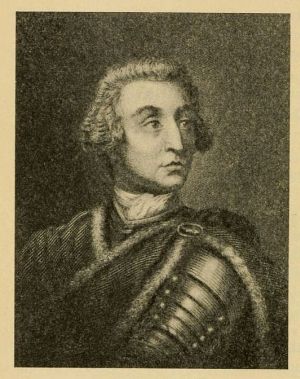
James Oglethorpe.
97. The Colonization of Georgia.—The country between the Savannah River and the St. John’s River in Florida, was claimed by the English; and when the Carolinas became royal provinces, this region was reserved as crown land. It soon attracted the attention of a noble-minded Englishman, James Oglethorpe.[46] He conceived the idea that it would be an excellent place in which to establish a colony to be composed of such persons as needed a new chance in life after having been released from the then crowded debtor prisons of England. He secured the aid of a company in establishing his proposed colony, which was also intended to serve as a bulwark against the Spanish colony of St. Augustine and as an important outpost of the fur trade. The colony was styled Georgia, in honor of King George II. The company of proprietors were very liberal; they prohibited slavery and religious persecution, and provided that none of their own number should hold a salaried office. Oglethorpe came out in November, 1732, and early in the following year founded the town of Savannah. He treated the Indians well and made a firm alliance with them. In 1734 a number of German settlers arrived and added much stability to the colony. This same year Augusta was founded as an armed trading-post, and soon became the center of a large fur traffic. The English debtors, however, were not the best of colonists, and the company was wise enough to induce more Germans and some Scotch Highlanders to seek the colony. After this the growth of Georgia was certain, but very slow; for even so benevolent an enterprise could not escape internal discontent and friction, due largely to the thriftless character of the English beneficiaries.
98. French Exploration of the Mississippi Valley.—From the beginning, the French colonists settled in Acadia[47] and New France[48] succeeded in making friends with the Indians, to an extent rarely equaled by the English. But friendship with the Hurons and Algonquins involved enmity with the enemies of the latter, the Iroquois. This in turn meant that the French would have great difficulty in penetrating New York. It also meant that their explorations would at first penetrate the western region bordered by Lake Superior and Lake Michigan. In this region they heard rumors of the Mississippi River, and in 1673 a Jesuit priest, Père Marquette, and Louis Joliet, a trader, undertook to look for it. With incomparable resolution Marquette surmounted every difficulty, and finally with his companions floated down the Wisconsin River into the mighty Mississippi, which they followed to a point below the Arkansas. Then they made their arduous way back, having accomplished one of the most magnificent voyages of exploration known in history.
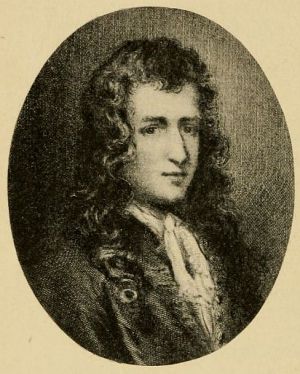
La Salle.
99. The Explorations of La Salle.—Their work was finished ten years later by Robert de la Salle,[49] who with his companions crossed from Lake Erie to the Illinois River and, after enduring many hardships, tracked the Mississippi southward to the Gulf of Mexico. There, taking possession of the region for Louis XIV. of France, La Salle named it Louisiana in his honor. He had been about four years at his work, in which he had shown a courage that has made him memorable. Two years later, in 1684, he sailed from France to plant a colony on the Mississippi; but, missing its mouth, landed on the coast of Texas. Here a fort was built, and from its occupation France got her claim to the territory as far as the Rio Grande. La Salle and his party, after suffering many hardships, determined to separate into two bands. The party led by La Salle murdered their brave commander, and finally reached the Illinois River.
100. French and English Claims.—Thus France, through the labors of her loyal subjects, had established a claim to an enormous region stretching from the mouth of the St. Lawrence, around the English colonies, to the mouth of the Mississippi, and thence to the Rio Grande. East and west the boundaries were practically the Alleghany and the Rocky mountains. But these claims were sure to be resisted, for the charters of the English colonies gave them almost indefinite rights to the westward, and they were growing too fast to be long cooped up between the Alleghanies and the Atlantic. Before the close of the seventeenth century, the struggle for predominance in the Mississippi Valley had begun, and in about seventy-five years France had been stripped of all the possessions which had been secured for her by the intrepidity and foresight of leaders who had often been but ill-supported by their king and government.
101. King William’s War (1690–1697).—The colonial wars against the French for the possession of the region west of the Alleghanies are known by the names of the English sovereigns reigning at the time of hostilities; but they practically coincide with important European wars. For example, the first break in the American struggle corresponded with the famous Peace of Ryswick (1697). Indeed, throughout the eighteenth century colonial questions formed a most important factor in the numerous and destructive wars waged in Europe. The French early began to see that war must soon arise between the English colonists and their own, and about the time of the revolution which brought in William and Mary (1689), they sent over the able Count Frontenac with instructions to overrun New York. At first he had to beat off the Iroquois; but in 1690 he began that long series of horrible raids, conducted by mixed bands of French and Indians, which gives such a bloody tinge to the annals of the times and accounts for the hatred cherished for both their Christian and their savage enemies by the English colonists. First it was Schenectady, New York, that was burned and laid waste; then Salmon Falls, New Hampshire; then Fort Loyal (now Portland, Maine); then Exeter, New Hampshire. No one knew where the blow might fall next. Panic reigned among the colonies, and a meeting of delegates from several of them was held at Albany, in February, 1690, to discuss the situation (§ 66). A threefold attack on the French possessions was planned, but only that against Port Royal in Acadia, led by Sir William Phips, governor of Massachusetts, was successful. Having destroyed Port Royal, he attempted to take Quebec, while another body of troops attacked Montreal. Both expeditions were failures, and, as a result, the French ravages continued until the Peace of Ryswick, in 1697. Neither side had gained ground, but the English had suffered terribly. Massacres of the inhabitants of frontier towns made life a terror to the pioneers, and in 1697 the invaders actually sacked Haverhill, not thirty miles from Boston.
102. Queen Anne’s War (1702–1713).—Peace did not last long, for William III. was resolute in opposing the aggressions of Louis XIV. His policy was carried on after his death (in 1702) by the advisers of his successor, Queen Anne, chief among whom was the famous Duke of Marlborough, the victor of Blenheim. Massacres soon began again in New England. Port Royal was attacked unsuccessfully in 1707 and successfully in 1710, and another expedition to Quebec came to nothing. The Treaty of Utrecht, in 1713, put a stop to hostilities, and this time the English diplomats were sufficiently resolute to retain Acadia. Thenceforth Port Royal, or Annapolis, as it was now named in honor of the queen, was held by the English.
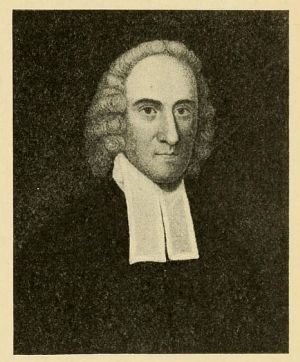
Jonathan Edwards.
103. Colonies at Peace: the “Great Awakening.”—Peace was to last for thirty years, a period which the French improved by exploring expeditions and by the building of forts to secure the great region watered by the Mississippi. Nor did the English lose sight of the vast interests at stake. They did perhaps the best thing to be done under the circumstances—they waited and grew strong in numbers and wealth, filling out as well as possible their more compact territory. They experienced also a spiritual awakening that must have strengthened the popular character in many ways. This was the “Great Awakening” which, beginning early in the century, became especially potent in 1734 under the preaching of the famous Jonathan Edwards[50] at Northampton, Massachusetts. The religious enthusiasm spread far and wide, and after a short lull, began, in 1739–1740, to flame out afresh under the inspiration of the great revivalist, George Whitefield. This eloquent English preacher went to Georgia to join John and Charles Wesley, and there carried on the religious work which the brothers had begun. Whitefield preached throughout the colonies, stirring men everywhere, and undoubtedly producing many good results in spite of the evil consequences which a period of excitement always leaves behind it.
104. Establishment of French Forts.—After the Peace of Ryswick, Pierre le Moyne, Sieur d’Iberville, established a French settlement at Biloxi, in the present state of Mississippi. La Salle had previously built Fort St. Louis on the Illinois River, and it was now the French policy to fill up the territory between these two points with a chain of forts and settlements. Mobile was founded in 1702, New Orleans in 1718. The founder of New Orleans was Iberville’s brother, Bienville. At the other end of the line Detroit was founded in 1701, Fort Niagara was built in 1726, and Crown Point was erected on Lake Champlain in 1731. In order that Acadia might be won back if possible, the strong fortress of Louisburg was erected on Cape Breton Island.
105. King George’s War (1744–1748).—In 1744 the war known in Europe as the War of the Austrian Succession, and in America as King George’s War, was begun by a successful French attack on an English post in Nova Scotia, and by an unsuccessful attempt to take Annapolis. Great efforts were now made by Governor Shirley of Massachusetts to save Nova Scotia. He applied to the English king, but his main reliance was upon Massachusetts and her sister colonies of New England. In the spring of 1745, just one year after the commencement of hostilities, a large expedition set out to capture Louisburg, and after a siege of six weeks took that redoubtable fortress. The victory was celebrated in many long and sincere prayers of thanksgiving and in some remarkably bad poetry. But the English government was so blind to the importance of the interest at stake as to restore Louisburg to the French at the close of the war, in 1748.
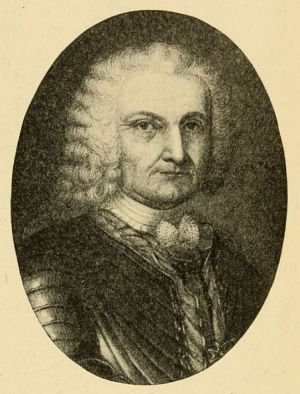
Sieur de Bienville.[51]
106. The French in the Ohio Valley.—The French now turned their attention to the task of securing the region watered by the Ohio River. In 1749 Céloron de Bienville, under orders of the governor of Canada, by means of canoe voyages and portages, reached Chautauqua Lake and thence the Allegheny River, where formal possession of the country was taken in the name of Louis XV. of France. Leaden plates with inscriptions asserting the French claim were interred at various points along the Ohio and its tributaries. Three years later a chain of forts was begun along the route taken by Bienville, the first erected being that of Presque Isle, near the present city of Erie. These movements of the French alarmed the English colonists greatly, and, most of all, Governor Dinwiddie of Virginia. This executive was interested in an American scheme for settling the Ohio region, through the agency of the so-called Ohio Company, and his colony claimed the country now threatened by the French. As soon as he heard of the new fort, he dispatched George Washington to demand the withdrawal of the French. Washington was just twenty-one years old, but he had seen life as a surveyor in the frontier counties of Virginia, and had learned to command men and to understand Indian character.
107. Washington in the West.—Washington, who was already an adjutant general, took with him only a few companions on his winter journey of seven hundred and fifty miles through the perilous wilderness. He braved numerous dangers, which he set down modestly in a journal that is still preserved. His training as a surveyor enabled him to pick out as a proper site for a fort the spot at the junction of the Allegheny and Monongahela rivers where Fort Duquesne was shortly afterward built by the French, and where Pittsburg now stands. He reached Fort Le Bœuf (near the present Waterford, Pennsylvania) and gave his letter to the French commandant. The latter promised to send it on to the governor of Canada, but continued to occupy the fort. On his return journey Washington nearly lost his life while attempting to cross the Monongahela on a raft; but he finally reached Williamsburg in safety, having been absent only eleven weeks.
108. Founding of Fort Duquesne.—Dinwiddie determined to take possession of the Forks of the Ohio at once. William Trent, a trader, and some militia were hurried forward and began the erection of a fort. While the Virginians were thus occupied, and in the absence of their leader, a party of Frenchmen and Indians descended upon them and they were forced to surrender, their conquerors finishing the fort and naming it after Duquesne, the governor of Canada.
109. Washington at Fort Necessity.—Meanwhile great preparations had been made in Virginia. Washington, now lieutenant colonel, set out with a few troops to aid Trent, but heard of the surrender shortly after starting. He would not go back, but pushed on into southwestern Pennsylvania, and there at a place called Great Meadows began a fort. Having been warned of the approach of a party of French, he attacked them suddenly and completely routed them. Then he pushed on to the Ohio, but on learning that the French were advancing in numbers, finally fell back on his stockade, which he had called Fort Necessity. Here the French and Indians attacked him vigorously, and after a brave struggle he surrendered honorably on July 4, 1754.

Central North America
at the Beginning of the French and Indian War, 1755
110. The French and Indian War (1754–1763).—This was practically the beginning of what is generally called the French and Indian War, which nearly coincides with the Seven Years’ War in Europe. Both sides made extensive preparations, for the fate of a continent was now plainly seen to be in the balance. A congress of delegates from the colonies met at Albany to make a treaty with the Iroquois, and here (1754) Benjamin Franklin secured the adoption of a plan for a union of the colonies. The scheme was not approved, however, when submitted to the individual colonies, which were more or less jealous of their privileges. But if the colonists would not join to repel the foe, the English under Pitt were determined to do their best to drive out the French, not foreseeing that as a result the colonists, freed from danger at home, would be likely in a short time to form a union to secure independence. They sent out one of their ablest officers, Major General Edward Braddock, and an elaborate plan of campaign was determined on at a conference of the colonial governors assembled by him at Alexandria, Virginia. Four expeditions were to be made: one to be directed against Fort Crown Point in New York, and thence against Quebec; another, from New England, by water, against the French possessions in the northeast; the third, from Albany against Niagara; the fourth, from Fort Cumberland in Maryland against Fort Duquesne.
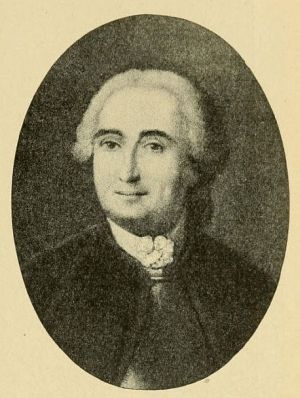
General Montcalm.
111. Braddock’s Defeat.—General Braddock decided to take charge of the last-named expedition. His European training had not qualified him to command in an unsettled country, and in spite of his personal efforts he found great difficulty in moving regular troops and artillery through the wilderness. He could hardly have moved at all if Franklin had not persuaded the Pennsylvania farmers to hire out their horses and wagons. In June, 1755, the army began to cut its way through the forest. All went well, though slowly, until the fort was nearly reached, when suddenly (July 9, 1755) the advanced guard came upon a large body of French and Indians. These wily foes immediately adopted border habits of warfare, and picked off their enemies from behind trees. Braddock, who had all an Englishman’s contempt for colonial ways, pronounced this method of fighting barbarous, and would not allow his men to imitate it. He insisted on using the same tactics in the backwoods of America that he had been accustomed to employ on the battlefields of Europe. There could be but one result. His men offered themselves as targets until so many were killed that a retreat had to be sounded. Even this would have been unavailing but for the fact that Washington, who was present as an aid-de-camp and had vigorously protested against his superior’s hard-headedness, used his Virginians, who had fought their enemies in backwoods fashion, to cover the retreat of the regulars. Washington performed many feats of valor throughout the day, and had several narrow escapes. Braddock, quite as brave, but entirely out of place in such a situation, was wounded just before the retreat, and died a few days later. Thus the most important of the four expeditions was a failure.
112. Acadia, Crown Point, and Niagara.—The second expedition succeeded in dispersing several thousands of the poor inhabitants of Acadia among the colonies;[52] that against Crown Point resulted in a victory over the French on the shores of Lake George, but that against Niagara did not even reach its destination.
113. Effects of Pitt’s Policy.—Although there had been plenty of fighting along the American frontier, war was not formally declared between Great Britain and France until May, 1756. The French sent over a very able soldier, the Marquis of Montcalm,[53] who was quite successful for about two years, and might have been altogether so but for the energy and foresight of that great English statesman, William Pitt.[54] Pitt saw more clearly than any other man of his time how important her colonial empire was to Great Britain, and how it could best be maintained and extended. He supported Frederick the Great on the Continent, and caused renewed efforts to be made in America against the French. The fourfold attack of a few years before was again tried, with almost complete success. In 1758 Louisburg was forced to surrender; Washington captured Fort Duquesne (afterward Fort Pitt), and Fort Frontenac on Lake Ontario was destroyed. Thus the Ohio region was cut off from Quebec; but by resisting an attack on Ticonderoga, Montcalm managed to keep the French forces wedged into New York.
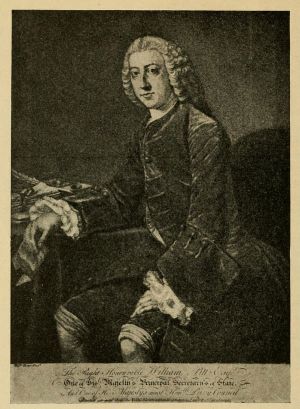
William Pitt, Earl of Chatham.[55]
114. The Fall of Quebec.—The next year saw the practical conclusion of the struggle, in the fall of Quebec. This again was due indirectly to Pitt. He put James Wolfe[56] in command of an expedition against Quebec, by way of the St. Lawrence. Wolfe landed with his troops below the city, which, rising from the summit of its precipitous hill, seemed to be impregnable. But the young general was dauntless. He performed the extraordinary feat of passing up the river under the guns of Montcalm, and landing his troops. During the night they climbed the cliffs, and by dawn were ready to offer battle on the Plains of Abraham (September 13, 1759). The conflict was hotly waged, the British eventually securing the victory, at the cost of their brave general, whose equally brave rival, Montcalm, was also killed. It would be hard to estimate the consequences of this battle.
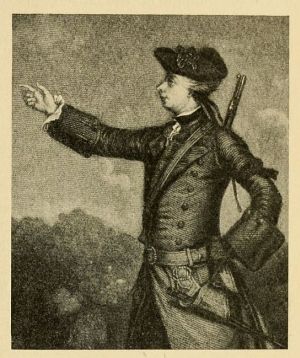
General Wolfe.
115. The Treaty of Paris (1763).—The fall of Quebec had been preceded by the capture of the posts of Crown Point and Ticonderoga held by the French within New York. It was followed the next year by the taking of Montreal. This practically closed the war in America, but peace was not declared until 1763, when the Treaty of Paris was signed. By these victories and the peace which followed them, Great Britain obtained Canada and Cape Breton, nearly all the islands of the St. Lawrence, and all the territory east of a line running down the middle of the Mississippi River to a point just above New Orleans. Spain received all the French possessions west of this line, together with New Orleans. In return for Havana, which had been taken by the English, Spain gave up Florida to Great Britain.
116. The New Provinces.—The newly acquired territory was divided into three provinces. Canada became the Province of Quebec, part of its southern boundary line limiting the present states of New York, Vermont, New Hampshire, and Maine. Florida was divided into two provinces, East and West Florida. A line was also drawn around the head waters of all the Atlantic-flowing rivers in the colonies, and the colonists were forbidden to settle in the reserved territory, which was set apart for the Indians. To defend these new provinces it was resolved to maintain within their borders a force of ten thousand men, who were to be supported partly by the Crown and partly by the colonies. That troops were needed was proved by the harassing though unsuccessful siege of Detroit by the Indians, led by Pontiac, chief of the Ottawas, in the spring and summer of 1763.
References.—See Thwaites, The Colonies, chaps. xiii.–xiv. Add to preceding bibliography: A. V. G. Allen, Jonathan Edwards; C. C. Jones, History of Georgia (2 vols.); C. Gayarré, History of Louisiana (4 vols.); F. Parkman, Frontenac and New France, La Salle and the Discovery of the Great West, A Half Century of Conflict, Montcalm and Wolfe; A. B. Hart, Formation of the Union, chaps. i.–ii. (“Epochs of American History”); W. M. Sloane, The French War and the Revolution, chaps. i.–ix. (“American History Series”); H. C. Lodge, George Washington, Vol. I., chaps. i.–iii. (“American Statesmen Series”); J. Winsor, The Mississippi Basin; B. A. Hinsdale, The Old Northwest; T. Roosevelt, The Winning of the West, Vol. I.; B. Franklin, Autobiography; J. F. Cooper, The Deerslayer, The Last of the Mohicans, and The Pathfinder; Parkman’s Conspiracy of Pontiac contains a résumé of the struggle for Canada.
|
The region along the St. Lawrence of which Montreal and Quebec have always been the two chief centers. |

The British Colonies in 1764
117. Tendencies toward Separation.—From the first there were certain conditions that tended to force the American colonies away from the mother country. The colonists, especially those of New England, had very generally left Great Britain for the purpose of escaping oppression; and, after the new settlements were made, the conduct of the home government was not such as to diminish the sense of wrong. It was less than thirty years after the landing at Plymouth when the first of the “Navigation Acts” marked the beginning of a policy designed to encourage British at the expense of colonial commerce (§ 43), and in 1672 this unwise course of action was carried still further. A law was passed which imposed the same duties on trade between one colony and another as on trade between America and foreign countries; and to enforce this law, custom-houses were established along the border lines between the different colonies. This naturally led to a constant and a growing friction between the royal governors who had to collect the revenue, and the colonists who had to pay it. The seventy-five years immediately before the Seven Years’ War are full of instances of the unfriendly relations between the people and the agents of the home government[57] (§94).
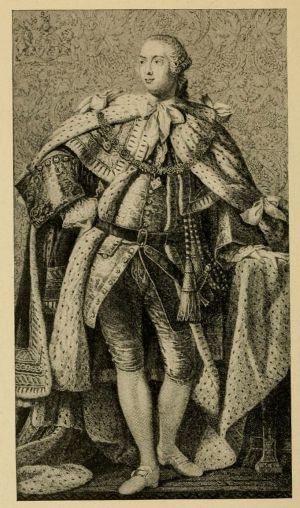
George III.
118. Influence of the Seven Years’ War.—These unfriendly relations were happily interrupted by the war which resulted in the fall of Quebec and the transfer of Canada from the French to the English. The fact that the Americans were united with the English in a common cause against a common enemy drew them nearer and nearer together. In the prosecution of the war the colonists bore a prominent and honorable part, and at its close they everywhere shared in the general rejoicing. In this spirit old Fort Duquesne was given the name Pittsburg, in honor of the great statesman who had accomplished so much for the continent; and the legislature of Massachusetts voted for Westminster Abbey an elaborate monument to Lord Howe, who had fallen at Ticonderoga. It is certain that a new spirit of loyalty and devotion to the mother country had sprung up, when in 1760, one year after the fall of Quebec, George III., then a young man of twenty-two, ascended the throne. He had a great opportunity to conciliate the colonists and to increase their growing affection; but he defiantly took the opposite course.
119. George III.[58]—The young king brought to the throne a very unfortunate mixture of good and bad qualities. He had an unblemished character; he had a strong will and was very conscientious and industrious; but he was possessed with the idea that the power of the throne should be greatly strengthened, and that all opposition to such increase of power should be put down, if need be, by main force. His ambition was to restore to the Crown the power which it had unlawfully exercised before the two English revolutions had made it subordinate to Parliament. For the accomplishment of this purpose he committed the fatal blunder of pushing aside the great statesmen he found in office and of surrounding himself with ministers who would aid him in carrying out his own policy.
120. Independent Spirit among the Colonies.—Another peculiarity of the situation was the prevalence of a decided spirit of independence of one another among the individual colonies. No effort to bring them together for purposes of common action, even against the Indians, had been successful. Even Franklin’s plan in 1754 had failed to unite them (§ 110). On the contrary, they had drawn farther and farther apart, so that a very intelligent traveler, who had visited various parts of the country, wrote in 1760, “Were the colonies left to themselves, there would soon be civil war from one end of the continent to the other.” And James Otis, one of the foremost of American patriots, said in 1765, “Were the colonies left to themselves, to-morrow America would be a mere shambles of blood and confusion before the little petty states could be united.” When George III. ascended the throne, the colonies seemed more afraid of one another than they were of England, and more likely to drift into separate nationalities like those of Europe than they were to unite in a common effort to secure independence of the mother country.
121. Excuse for the Policy.—The energetic and fatal policy of the Crown first showed itself in a determination to impose additional taxes on the Americans. There was some excuse for this policy. The Seven Years’ War had been carried on at heavy expense, and a large debt had been the result. The king claimed that this burden, chiefly incurred in an effort to protect the American colonists, should be borne, in large part, by the colonists themselves. To this claim the colonists might not have objected, if they had themselves been allowed a voice in determining their share of the tax. But the English insisted upon determining it without colonial advice.
122. The British View of the Matter.—In the course of centuries the British people had come to recognize the principle, “No taxation without representation.” But in the time of George III. representation, even in England, was absurdly imperfect. Boroughs of not more than half a dozen voters sometimes sent two members to the British Parliament, while some large towns like Manchester and Birmingham sent no representatives. The people permitted this bad state of affairs to continue, because the doctrine was held that every member of Parliament, no matter by whom he was elected, represented all the people of the kingdom, and not merely those who had chosen him. According to this theory, the colonies were as much represented in Parliament as Manchester and Birmingham; and if those towns could be taxed without direct representation, there appeared no just reason why Massachusetts and Virginia and the other colonies should complain of the same method.
123. The Colonial View of the Case.—But the colonists, and a small but very influential minority in Parliament, took another view of the case. Many of the colonies had been settled by men who had come to America for the purpose of escaping from a system which they regarded as unfair and tyrannical. Two revolutions in England had established the authority of Parliament as against the individual will of the king, but the methods of representation had not been changed. Indeed, they were worse than they had been when the Puritans came to New England, more than a hundred years before. During the intervening period the colonists had been receiving a liberal education in matters of government. In their town meetings and their provincial legislatures they had had to consider and decide a vast number of subjects, until they very naturally came to think they could understand the real requirements of the country far better than could a Parliament three thousand miles away. Some of the colonial writers denied that the British had the legal right to tax the Americans, while others claimed that, even if they had the legal right, an enforcement of that right would be contrary to the whole spirit of English liberty, and ought to be resisted.
124. Folly of the British Government.—If the British government had been wise, these differences might have been reconciled; but George III. and the friends whom he called about him could not see why Boston, New York, and Philadelphia should object to taxation while Birmingham and Manchester did not. The fact remained, however, that the colonies did object, and this important difference any wise government would have seen and taken into account. But George III. stubbornly held that if the colonies resisted the supreme authority of the king and Parliament, they must simply be forced into obedience. This doctrine, for which the king, and the king alone, was responsible, was the fatal error that cost Great Britain the American colonies.
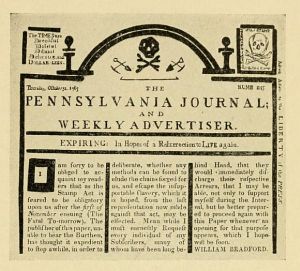
The Pennsylvania Journal
125. Grenville’s Scheme of Taxation.—In 1764 Parliament, under the leadership of Lord Grenville, made a formal declaration that it had a right to tax the colonies, and a year later proposed to raise a tax by what was known as the “Stamp Act.” This provided that all transactions, to be lawful, must be printed, or written, on paper furnished by the government and bearing the government stamp. Even newspapers and almanacs had to be printed on this stamped paper. The cost of the stamps varied from a few cents to fifty or sixty dollars. Grenville thought this form of taxation would afford no chance to evade the custom-house, no temptation to smuggle, and would dispense with all disagreeable prying into warehouses and private dwellings in search of smuggled goods. It was believed that the act would enforce itself and produce a large revenue.
126. Spirit of the Colonies.—This belief shows how generally the spirit of the colonists was misunderstood. Only a few of the greatest and wisest of the British statesmen saw the danger in the policy proposed. These men, of whom Chatham and Burke were the leaders, did not deny the constitutional right of Parliament to tax all British subjects, but they held that it would be madness to try to enforce that right, since such an attempt would probably result in the loss of the colonies. The very thing they feared and predicted took place.
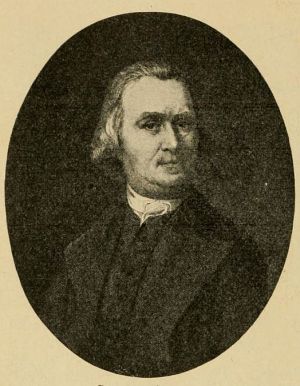
Samuel Adams.
127. Organization for Resistance.—The colonists instantly organized a general resistance to the tax. Samuel Adams[59] and James Otis[60] in Massachusetts, and Patrick Henry[61] in Virginia, were the most active of the colonial leaders. Adams sent letters in every direction denouncing the tax; Otis inflamed the people of Boston and the vicinity with his essays and his oratory; and Henry appealed to the Virginians with overpowering eloquence. A general congress representing the colonies met in New York, October 7, 1765, and passed a series of resolutions denouncing the Stamp Act as a violent encroachment on the principle, “No taxation without representation.” Lawyers agreed not to regard paper as made illegal by the absence of a stamp. Newspapers were issued bearing the sign of a skull and crossbones in place of a stamp, and boxes of stamps, on their arrival, were seized and burned.
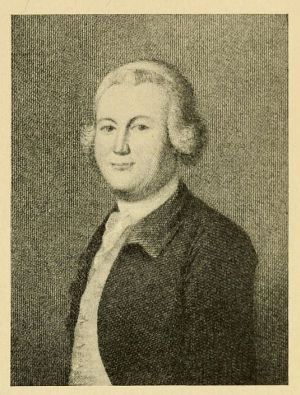
James Otis.
128. Repeal of the Stamp Act.—It was not long before even Grenville was convinced that the Stamp Act was a failure. As it could not be enforced, and as it brought very little revenue, it was repealed the very year after it had become a law. There are, however, two ways of doing an act demanded by the people: to do it with a tact that will convey the largest amount of satisfaction; or to do it with some reservation or qualification that leaves a sting behind it. The latter course was taken by the British government, which said in substance: We repeal the act, because its enforcement will be injurious to our commercial interests, but in doing so we expressly declare “the supreme right of Parliament to make laws and statutes of sufficient force and validity to bind the colonies and the people of America in all ways whatever.”
129. The Townshend Acts.—The “Stamp Act” was followed by the “Townshend Acts” in 1767. One of these acts forbade the colonies to trade with the West Indies and was evidently designed to force the Americans to buy West Indian goods in Great Britain. Another provided for a new duty on all imports of glass, paper, paints, and teas. Still another, and the most obnoxious of the Townshend Acts, was one which legalized “Writs of Assistance.” Such writs had formerly been unlawfully used as a means of enforcing the statute against smuggling. These papers, by being signed in blank, so that names could be inserted at the convenience of the officer, provided a means by which any sheriff or constable could enter any man’s house to search for whatever he wanted to find.
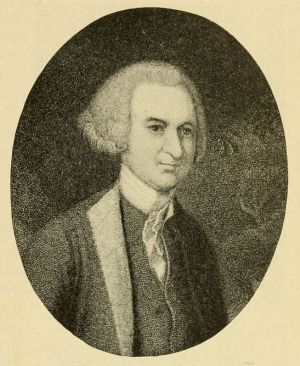
John Dickinson.
130. Opposition to the Townshend Acts.—The Townshend Acts provoked instant opposition. Associations pledged to abstain from using any of the articles taxed, were formed in various parts of the country. The Massachusetts Assembly sent a circular letter to the other colonies, inviting them to concerted resistance; but this letter so provoked the king that he ordered the governor of Massachusetts to demand that the Assembly rescind the vote, on pain of dissolution. The Assembly promptly refused, whereupon Governor Bernard promptly dissolved it. Everywhere a similar spirit of opposition prevailed.
131. The Farmer’s Letters.—The next year, 1768, public feeling was greatly intensified and united by what were known as the Farmer’s Letters—a remarkable series of papers written by John Dickinson,[62] a young lawyer of Philadelphia, endowed with wealth, education, and brilliant talents. He set forth with great skill the claims of the colonies and the dangers to the liberties of the people from a policy of submission. These letters were so widely read that they had a vast influence in shaping the course of the colonies.[63]
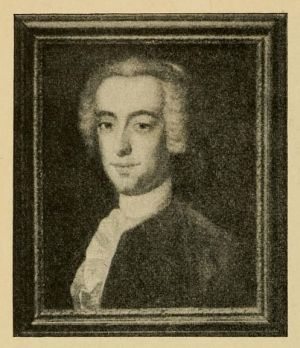
Governor Hutchinson.
132. The Boston Massacre.—In 1768 the king sent over two regiments of soldiers to Boston for the special purpose of enforcing the obnoxious acts. In March, 1770, there was a spirited quarrel between some citizens and the soldiers in one of the streets of Boston, whereupon the troops fired upon the crowd, killing five and wounding seven others. This event, commonly known as the “Boston Massacre,” greatly widened the breach. An immense concourse gathered the next day in the Old South Meetinghouse. Samuel Adams was sent to Governor Hutchinson[64] to demand, in the name of three thousand freemen, the removal of the soldiers from the town. The governor thought it prudent not to refuse, and sent the troops to an island in Boston Harbor.
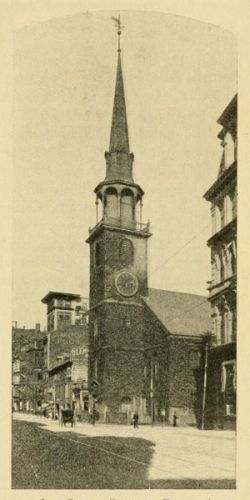
Old South Church, Boston.[65]
133. Partial Repeal of the Townshend Acts.—These events convinced Parliament that the Townshend Acts could not be enforced; but the government only repeated the course taken in repealing the Stamp Act. Instead of annulling the obnoxious provisions outright, they repealed the tax on all the articles except tea, but they held to the duty on this one article in order to maintain the principle. They ingeniously tried to make the tax on tea acceptable by remitting the usual duty which had to be paid on tea sent to America, when in transit it arrived in England. But it was not the cost of the tea that the Americans objected to; it was the principle of taxation.
134. General Treatment of the Tea.—As the British had no doubt the Americans would receive the tea under these conditions, large cargoes were sent to various American ports. The government commissioners appointed to receive this tea soon found that the people everywhere refused it. In Charleston large quantities were stored and afterward sold to the public; at Annapolis the tea was burned; at Philadelphia and at New York, after browbeating the commissioner into resigning, the people compelled the ships to return to England.
135. The Boston “Tea Party.”—It was in Boston, however, that the most vigorous action was taken. A large cargo had arrived in December of 1773, but the people would not allow it to be landed. The vessel no doubt would have returned to England, but the colonial officers refused to give the clearance papers required of all vessels before sailing. If the cargo was not landed within twenty days after its arrival, the custom-house officers were authorized by law to seize and land it by force. It was evident that the tea must be destroyed, or its landing could not be prevented except by open resistance. On the nineteenth day a town meeting of six or seven thousand persons met in and about the Old South Meetinghouse to decide what course to pursue. During the evening, in accordance with a general understanding, a great crowd went down to the wharf to see what would occur. When they were assembled, a small company of men, dressed as Indians, quietly rowed out to the ships, broke open more than three hundred chests of tea, and poured the contents into the harbor.
136. The “Five Acts of 1774.”—This defiant action, though applauded in all parts of the colonies, filled the British government with indignation, and drove the ministers to the “Five Acts of 1774,” which by their unwise energy immediately precipitated the crisis. Four of these were directed against Massachusetts alone; the fifth affected all the colonies. The first of the five acts was the “Boston Port Bill.” It provided that no ships should be allowed to enter or depart from Boston Harbor until the tea that had been destroyed was paid for. This in effect put an end to the commerce of the city, and completely destroyed its prosperity. Gloucester was made the port of entry and Salem the seat of government. The second act was that for the “Impartial Administration of Justice in Massachusetts Bay,” which reflected upon the colony’s tribunals by providing for the trial in England or Nova Scotia of officials accused of murder committed in the discharge of their functions. The third was the “Massachusetts Bill,” which virtually took away the charter by vesting all power of appointment and removal exclusively in the governor appointed by the Crown. The fourth was an act which provided for the quartering of troops on the people, thus establishing the means of enforcing new laws. The fifth was the “Quebec Act,” of which the most offensive feature was the one providing that all the British territory west of the Alleghanies and north of the Ohio should henceforth be regarded as a part of Canada. As this territory was claimed by the colonies, the act was regarded as a gross infringement of their rights. The Quebec Act also gave the Roman Catholic religion throughout Canada the stamp of official recognition.
137. Opposition in Parliament.—The passage of these acts was strenuously opposed by several of the strongest men in Parliament. The opposition of Fox, Burke, Pitt, and Barré was particularly energetic. In the House of Peers, Lord Rockingham and his friends entered a protest on the journal of the House, and the Duke of Richmond declared, in his indignation, “I wish from the bottom of my heart that the Americans may resist and get the better of the forces sent against them.” But the king was determined, and Lord North, who had just been advanced to the position of prime minister, gave his general assent to the measures, though he privately tried to prevent the king from pressing the Transportation Bill.
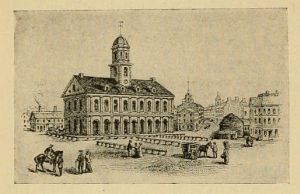
Faneuil Hall, Boston.
138. Effect upon the Colonies.—Upon the colonies the effect of these acts was general and immediate. As soon as the provisions of the Boston Port Bill became known, the colonies all saw that they must act together or be individually crushed. Public opinion rapidly took definite form. This was largely the work of committees of correspondence, organized at Faneuil Hall, Boston, chiefly through the energy and foresight of Samuel Adams. In Virginia a similar mode of procedure was adopted the following year, and an invitation was extended to all the colonies to appoint committees for the same purpose. The work of these committees was to make each colony acquainted with the views of all the others.
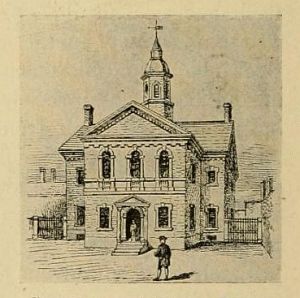
Carpenters’ Hall, Philadelphia.
139. First Continental Congress.—As a result of the agitation that followed, Massachusetts, at the request of New York, called for a meeting of representatives of the various colonies, to be convened early in September, 1774. The governor of Georgia prohibited the appointment of delegates, but representatives of the twelve other colonies met on the 5th of September, in Carpenters’ Hall, in Philadelphia. This body is known as the “First Continental Congress.” It contained a large share of the ablest men in the country. After adopting a Declaration of Colonial Rights, in which the political claims of the colonies were clearly and fully set forth, they named eleven different acts, which they declared had been passed in violation of their rights since the accession of George III. They framed a petition to the king, as well as an address to the people of Great Britain, and then formed what was called “The American Association,” the object of which was to put a stop to all trade with Great Britain until the obnoxious laws should be repealed. After providing for another congress, to be held in the following spring, the meeting adjourned on the 26th of October.
140. General Gage and the Provincial Congress of Massachusetts.—While these actions were taking place in Philadelphia, affairs were drifting to an immediate crisis in Massachusetts. General Gage, now governor of Massachusetts, as well as military commander, was fully inspired with the spirit of his royal master. He promptly sent to Chelsea for military stores and began a system of fortifications. The colonists, easily perceiving the significance of the British general’s action, took similar measures of precaution. In order to be independent of General Gage, they also organized what is known as “The Provincial Congress of Massachusetts”; and this body, on the very day when the First Continental Congress adjourned, authorized the organization of a military force, consisting of all the able-bodied men in the colony. One fourth of these were to be always ready for action, and, hence, were known as minutemen. After making provisions for supplying the army with the necessary equipment and munitions, the Provincial Congress intrusted the conduct of affairs to the general control of a Committee of Safety, of which John Hancock,[66] a wealthy merchant of Boston, was the chairman.
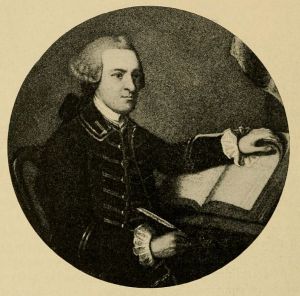
John Hancock.
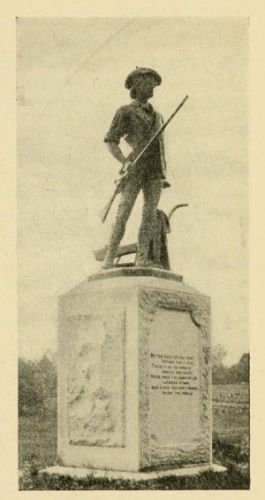
Statue of Minuteman
at Concord.
141. Gage’s Purpose.—It was not long before blood was shed. There were certain military stores at Concord, and General Gage determined to seize them. For this purpose he dispatched very secretly about eight hundred men, under Lieutenant Colonel Smith and Major Pitcairn. The expedition had still another object. The king having ordered the arrest of John Hancock and Samuel Adams, these leaders had withdrawn from Boston and were the guests of a friend in Lexington. Gage had learned where they were and had ordered their seizure by the troops bound for Concord. The British force, after taking the greatest precautions for secrecy, left the city on the night of the 18th of April. But the vigilant eye of a patriot, Dr. Warren, had detected the purpose of the movement.
142. The Ride of Paul Revere.—In spite of Gage’s orders that nobody should leave Boston that night, Paul Revere, a Boston goldsmith, succeeded in crossing the Charles River,—having previously attended to setting an alarm signal in the tower of the Old North Church,—and galloped by the Medford road toward Lexington, shouting at every house that the British were coming.
143. Battles of Lexington and Concord.—The minutemen instantly assembled and drew up on Lexington Common to meet the British when they appeared. Pitcairn ordered them to disperse, but seeing no signs of their moving, first fired his own pistols and then ordered a volley. Eight men were killed and ten wounded. Although the Americans fired in return, they were in no condition to offer battle. Hancock and Adams, having received the necessary warning, made timely escape. The troops pushed on to Concord, but found that the greater part of the stores had been removed. Four hundred Americans then charged across the Concord bridge and drove back the British. The minutemen were by this time streaming in from every direction, and as the British were fired upon from behind trees and fences, they had nothing to do but to beat a retreat. They were saved only by a timely reënforcement of twelve hundred men under Lord Percy. In the course of the expedition the British lost two hundred and seventy-three; the Americans, eighty-eight. The battles of Lexington and Concord, April 19, 1775, proclaimed to everybody that war had begun. The readiness with which the people responded to the call was shown by the fact that among the killed and wounded on that day there were representatives of twenty-three different towns. Within less than a week General Gage found himself surrounded in Boston by a motley force of sixteen thousand Americans armed with such weapons as they could secure.
References for Chapters VI.–VII.—Sir G. O. Trevelyan, American Revolution, Vol. I., contains probably the best account of the Boston campaign; J. Fiske, American Revolution (2 vols.), is a delightful presentation of the whole period; H. C. Lodge, Story of the Revolution (2 vols.); G. Bancroft, History of the United States (revised edition); R. Hildreth, History of the United States, Vol. III.; W. E. H. Lecky, England in the Eighteenth Century, the part relating to the American war is exceedingly thorough, careful, and valuable; Lord Mahon, History of England (7 vols.), more inclined to the British view than Lecky or Trevelyan; M. C. Tyler, Literary History of the American Revolution (2 vols.), an invaluable work on the history of public opinion during the period, and especially noteworthy in showing the power of the Tories; M. C. Tyler, Patrick Henry; H. C. Lodge, George Washington (2 vols.); E. J. Lowell, Hessians; T. Roosevelt, The Winning of the West, Vol. II.; Burke, Speech on Conciliation with America; Channing and Hart, Guide to American History; W. Niles, Principles and Acts of the American Revolution; J. Parton, Life of Franklin, Life of Jefferson; for other biographies, see Channing and Hart’s Guide, §§ 25, 32, 33, and 135; G. C. Eggleston, American War Ballads; W. Sargent, Loyalist Poetry of the Revolution; J. F. Cooper, The Spy, an admirable account of Tories about the Hudson; S. Weir Mitchell, Hugh Wynne, a picture of social conditions about Philadelphia; P. L. Ford, Janice Meredith, a portrayal of life in New Jersey during nearly the whole period of the war; H. Frederic, In the Valley, life on the Mohawk in the Revolutionary period; W. G. Simms, The Partisan, Mellichampe, The Scout, Katharine Walton, The Forayers, Eutaw, all relate to the conflict in the South; J. P. Kennedy, Horse-Shoe Robinson, also deals with the war in the South. For Paul Revere’s ride, see Longfellow’s poem in Tales of a Wayside Inn.
144. Continental Army and Commander in Chief.—When the Second Continental Congress came together in the spring of 1775, one of its first acts was to adopt as a continental army the forces which had enlisted in Massachusetts. It then performed an act of the greatest possible service to the cause by appointing George Washington[67] commander in chief. Washington was forty-three years of age, and the important services he had rendered in Virginia and Pennsylvania (§§ 106-111) had given him such military knowledge and such accuracy of judgment in dealing with men as made him universally respected and admired. He accepted the appointment with a full sense of the greatness of the task, and declared that he would receive no pay, but would rely on Congress to reimburse him for his expenses.
145. Capture of Ticonderoga.—While Congress was taking these preliminary steps, there was great activity in various parts of the country. Ethan Allen and Seth Warner, with a small force from Vermont, assisted by a few men from Connecticut under Benedict Arnold, surprised and captured Fort Ticonderoga. By this success the Americans got possession of an important fort, as well as of many stores and more than two hundred cannon.
146. Fortification of Bunker Hill.—As soon as the news of Lexington and Concord spread through the colonies, troops poured in to the vicinity of Boston from Rhode Island, Connecticut, New York, and Pennsylvania. Before the middle of June, Boston, on the land side, was thoroughly invested. The British had seventeen battalions of infantry and five companies of artillery, and before June their army was joined by three major generals—Howe, Clinton, and Burgoyne. Late in the afternoon of June 16, General Ward, then in command of the Americans, ordered a force to take possession of Bunker Hill, a commanding point in Charlestown, just north of Boston. About twelve hundred troops under Colonel Prescott, a veteran of the French War, went over from Cambridge with spades and picks, which in the course of the night they used so industriously that the British soldiers in the morning saw strong works confronting them. But instead of obeying orders and occupying Bunker Hill, Prescott occupied Breed’s Hill, a point nearer Boston.

Boston and Environs, 1775
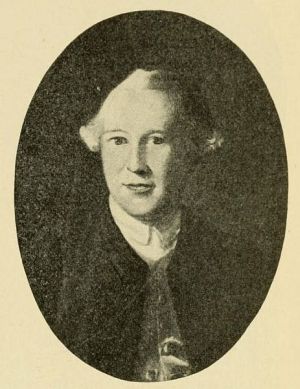
General Joseph Warren.
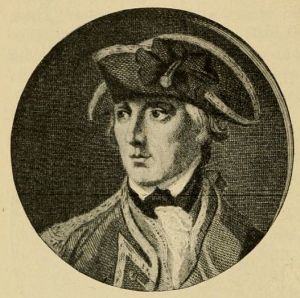
General Howe.
147. The Battle of Bunker Hill.—General Gage, wishing to dislodge the Americans at once, instead of approaching by the Neck (see map), where he could have cut off the whole force, ordered an immediate assault upon the enemy’s front. Meanwhile, in the course of the forenoon (June 17), the Americans were reënforced by about one thousand troops. These newcomers, however, had little ammunition and few bayonets. The British, numbering about three thousand, advanced under the gallant lead of General Howe. The Americans reserved their fire until the front ranks were within about fifty yards, when at the first volley so many of the assaulting force fell that the line staggered back in confusion. The second advance met with a still more disastrous repulse. In several of the companies as many as four out of five had fallen; but when the third assault was made, the ammunition of the Americans gave out, and the British were successful. Among the killed were many officers of rank, including Pitcairn, the British commander who had fired the first shot at Lexington, and General Warren,[68] one of the foremost of the American leaders. The British lost one thousand and fifty-four in killed and wounded; the Americans, four hundred and forty-nine. The forces were relatively small, but, in proportion to the numbers on the field, the battle was one of the bloodiest engagements of modern times. On both sides the men fought with a bravery worthy of the best traditions of English courage. Of Howe’s twelve staff officers every one was either killed or wounded. The battle made it evident that untrained American recruits, when behind only temporary defenses, had no need to be afraid to meet disciplined veterans. The British government, dissatisfied with the conduct of General Gage, recalled him and he was superseded by General William Howe.[69]
148. Difficulties confronting Washington.—Washington soon reached the scene of action, and took command of the American army on July 3, under an elm tree which still stands near Harvard University, in Cambridge, commemorating the event. The difficulties which beset him might well have disheartened a less resolute and skillful commander. His embarrassments were chiefly of three kinds. In the first place, the number of men at his command was at no time greater than the number of the regular British troops confronting him. His force had left their farms in midsummer without having enlisted for any definite period, and when the first burst of enthusiasm died away, it was very difficult to keep the ranks filled. In the second place, each of the provinces had its own laws, and consequently there was no uniformity of method and no subordination to any common authority. Washington dismissed sundry officers for insubordination, and he was obliged persistently to urge the governors of the several states to keep their quotas full.[70] In the third place, he soon discovered that the Americans had very little ammunition. There was not enough for a single battle, and it was plain that if at any time during the fall or winter the British should make a vigorous attack, they would in all probability succeed in breaking up the American army. To supply this deficiency Washington sent messengers in every direction. He dispatched an expedition to seize the British stores at the Bermudas; he had cannon dragged on ox sleds from Ticonderoga; and he gradually collected powder from all the country towns in the region.
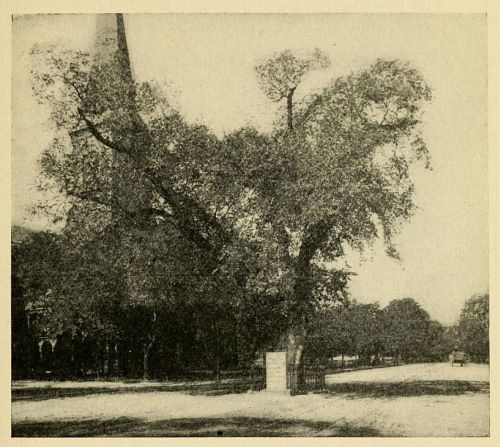
The Washington Elm, Cambridge.

Boston and Environs, 1776
149. The Taking of Dorchester Heights.—Notwithstanding all these discouragements, Washington drilled the army vigorously throughout the fall and winter. Early in March, 1776, he determined upon a movement which was destined to prove decisive. Dorchester Heights, projecting from the mainland south of Boston, commanded the town from this direction, as Charlestown commanded it from the north. Howe committed a fatal blunder in not establishing himself upon this point; and the consequence was, that one morning he discovered that the enterprising enemy had not only occupied the hill, but had thrown up formidable works commanding the city. A few days later, on March 9, the Americans also constructed works on Nook’s Point, which commanded the Neck and brought every part of the city within range.
150. Evacuation of Boston.—Howe, not caring to repeat the experiences of Bunker Hill, saw that he must evacuate the city. With all his troops he withdrew and sailed for Halifax, March 17, 1776, leaving the Americans in full possession. His force of veterans had been besieged for months by an army of raw troops, which did not at any time exceed in number the army of the besieged. More remarkable still, the besieging army had, during this period, been disbanded and reorganized, and during most of the winter had not had ammunition amounting to more than thirty rounds to a man. This great achievement not only inspired the colonies, but convinced the British government that it had undertaken a most formidable task. Washington, without a battle, had, by his superior strategy, maneuvered his enemy out of the city.
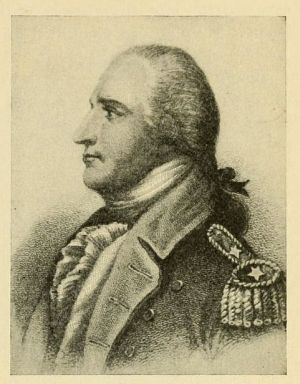
Colonel Benedict Arnold.
151. Expedition into Canada.—While the siege of Boston was going on, Colonel Benedict Arnold[71] suggested that an expedition should be sent for the capture of Montreal and Quebec. Unfortunately, this unwise proposition prevailed. A part of the force under General Montgomery descended Lake Champlain and, after a difficult, brilliant campaign, took Montreal. The other command, under Arnold, after an expedition of almost indescribable hardships through the forests of Maine in the dead of winter, presented itself before Quebec. Montgomery, who had by that time advanced from Montreal, attacked the city from above while Arnold attacked it from below. Montgomery was killed while scaling the heights, and Arnold was severely wounded. Morgan, Arnold’s second in command, pressed forward and would, no doubt, have been successful, if Montgomery’s force had not been thrown into panic by the fall of their leader. Morgan and nearly all his force were taken prisoners, and the expedition was a complete failure.
152. Final Effort of Congress for Peace.—In the course of the same winter (1775–1776), Congress, then in session at Philadelphia, put forth another and a final effort to make terms with the king. A careful and formal statement of grievances was sent to England, but neither the king nor Parliament would receive it, determining instead very greatly to increase the army. This was done, partly by sending additional British troops, and partly by hiring about twenty thousand Germans from some of the lesser German princes. As these mercenaries came very largely from the duchy of Hesse, they were known throughout the war as Hessians. The fact that the British bought the services of foreigners to fight the Americans greatly exasperated the colonists.
153. Washington’s Movements.—After the failure of the Canadian expedition, Washington conjectured that the British would try to get possession of the Hudson by attacking it both from the north and from the south. He had no doubt that Howe’s force would ultimately land at New York. To meet such a movement, he ordered Arnold, as soon as he should recover from his wound, to oppose any approach from the north, while he himself should transfer the greater part of his army to New York. Arriving in April, 1776, he soon found that his conjecture had been correct. Howe, as soon as he had reorganized his forces in Halifax, set sail for the mouth of the Hudson. Here he established headquarters upon Staten Island, where he received reënforcements till he had an army of about thirty thousand men. He soon had the assistance also of a formidable fleet under Admiral Lord Howe, his brother.
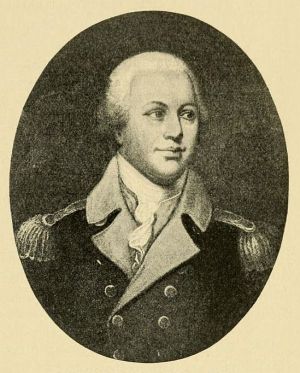
General Nathanael Greene.
154. Occupation of New York and Brooklyn.—Washington had not only taken possession of New York City, but had fortified Governor’s Island, as well as Brooklyn, and the New Jersey shore at Paulus Hook opposite New York. Brooklyn Heights were put in command of General Nathanael Greene,[72] but he was suddenly stricken with fever and the command was transferred to General Israel Putnam,[73] with Generals Sullivan and Stirling as subordinate officers, and a force of about nine thousand men.
155. Battle of Long Island.—As this position commanded the city, the British took the natural course of planning an attack from the east. Landing southeast of Brooklyn with about twenty thousand men, August 22 and 25, Howe pushed one of his divisions by a circuitous route toward the north, for the purpose of turning the flank of the Americans and making their escape in that direction impossible. In the battle of Long Island, which ensued, the Americans, having only about five thousand men in the field, were greatly outnumbered and defeated. Generals Sullivan and Stirling, with about two thousand of their men, were taken prisoners. The remainder of the army fell back and rejoined Putnam within the fortifications. Preparations were at once made for a siege. With the British force surrounding Brooklyn on the land side and with Admiral Howe’s fleet in New York Bay, the escape of the army, which Washington had now reënforced to about twelve thousand men, seemed impossible.
156. Retreat to New York.—Washington well knew that the Brooklyn army must either escape or surrender. He therefore caused all the boats and rafts of every kind that could transport men or ammunition, to be brought together from the various streams and bays in the vicinity. So skillfully was this work done, that in the course of a single foggy night, August 29, the boats were collected on the Brooklyn side of the river, and the whole army, with guns and stores, was taken across to New York. This remarkable exploit might, no doubt, have been prevented had there been greater vigilance on the part of the British fleet.
157. Evacuation of New York.—But this bit of good fortune did not enable Washington to hold New York. The British immediately sailed up the East River and prepared to land their forces, if possible, so as to intercept Washington’s army. They secured a footing, September 15, first at Kipp’s Bay, where the Thirty-fourth Street ferry now is, and later at Throg’s Neck, a few miles above; but the main force of the Americans was able to pass up the west coast of the island before the enemy could cut them off.[74] Washington’s troops were not numerous enough to justify a pitched battle; but while retreating, he retarded and annoyed the enemy at every point. On the 28th of October he fought a slight engagement at White Plains, some thirty miles from New York, to hold the British in check while the main army should pass still farther north. The British now withdrew to Dobb’s Ferry and threatened Fort Washington.
158. Loss of Fort Washington and Fort Lee.—The lower Hudson at that time depended for its defense upon two fortifications: Fort Washington, situated near the upper end of Manhattan Island, on which the city of New York stands, and Fort Lee, on the opposite side of the river. Washington decided to abandon these defenses to the British and to establish strong fortifications some forty-five miles up the river. Congress, however, directed that Fort Washington be held, if possible; and the commander unfortunately yielded his opinion so far as to allow General Greene, who was in command of both the forts, to defend them in case he should deem successful defense possible. The result was the most serious of the early disasters of the war. The British broke through the obstructions that had been placed in the river, and having passed with their fleet above Fort Washington, surrounded it in such a way that escape was impossible. When a vigorous assault was made, nearly three thousand American troops were forced to surrender, November 16. The abandonment of Fort Lee necessarily followed.
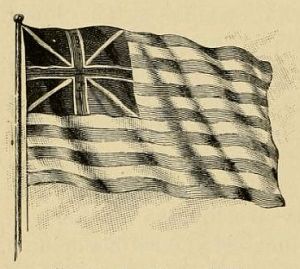
Colonial Flag, 1776.
159. Lack of Union among the Colonies.—The war was not simply a war of separation; it was also in some of its features a civil war. The loss of New York, including Fort Washington, brought out the American opponents of the Revolution in great force. From the very beginning of the agitation which resulted in independence, there had been three somewhat distinct classes of people among the colonists. One class believed that on the whole the British government was the best in existence, and that the colonists would be benefited by showing a constant spirit of loyalty and fidelity to the Crown. Such people were opposed to every form of agitation that would look to the British like insubordination. The second class, while believing that there were abuses which should and would be corrected, acknowledged the supreme power of Parliament. Like the British, they did not see why their lack of representation differed very greatly in principle from the condition of some of the larger towns in England. They thought also that the abuses could in time be removed by a general and friendly agitation. The third class consisted of the out-and-out reformers. Their leaders were such men as Samuel Adams, James Otis, and Patrick Henry, who believed that if the rights of the colonies were not granted when they were pointed out, the proper course was to fight for them. As the agitation went on and the British government made blunder after blunder, the third of these classes, though at first inferior in numbers to the others, became more perfectly organized and so got the upper hand. But it is a great mistake to suppose that the American people at any time were unanimous on the subject of independence, or even of resistance. It is probable that in the second year of the war, even in New England, one fourth of the people were opposed to it; that in the Middle states the proportion was as great as one-third; and in the Southern states nearly, or quite, as great as one half.
160. The Tories.—All those who were opposed to the action of Congress naturally came to be regarded as enemies, and were known as Tories. From the first they made a vast amount of trouble. During the siege of Boston they were numerous, outspoken, and influential. They desired that the Revolutionary cause should fail. They acted as spies and carried information to the British; and whenever the patriot cause suffered any check or disaster, they did whatever they could to show that successful resistance was impossible. In the State of New York the Tories from the first were not only numerous, but very active. Soon after Washington took possession of the city he discovered that Tryon, the Tory governor, was at the bottom of a plot to capture or kill the commander in chief, and turn over the city to the enemy. Tryon escaped, but some of the other leaders were arrested and tried, and one of Washington’s own guards, who had been bribed, was publicly hanged. Though this summary procedure discouraged the Tories, they continued to be of great service to the British and of great annoyance to the Americans. In New York and in the South the struggle was attended with many of the horrors of civil war.
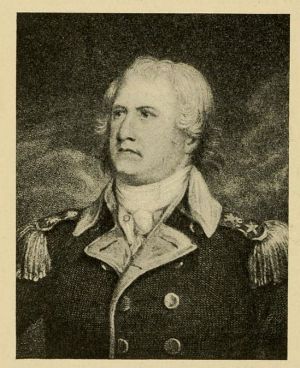
General William Moultrie.
161. Carleton’s Expedition.—While Washington had been unsuccessfully attempting to resist the advances of the British in New York, the Americans had been more fortunate in other parts of the country. An expedition under Sir Guy Carleton, the governor of Canada, was planned to advance up the river St. John, into Lake Champlain, and down the Hudson, but it met so vigorous a resistance from Arnold near Valcour’s Island, that, although Arnold’s fleet was almost destroyed, the British were obliged to return to Montreal for winter quarters.
162. Expedition of Sir Henry Clinton.—In the South the enemy fared no better. Sir Henry Clinton, with about two thousand men, had been sent from Boston, while the siege was going on, to take possession of North Carolina; but the sturdy Scotchmen of that state, who were generally Tories, were defeated by the patriots, who immediately organized so powerful a resistance that Clinton did not attempt even to land. Reënforced a little later by a British fleet of ten ships under Sir Peter Parker, he advanced upon Charleston in South Carolina. Vigorous preparations for resistance had already been made, under the direction of General Lee. General William Moultrie[75] constructed a low fort in Charleston Harbor, chiefly of palmetto logs and sand, which proved an effectual barrier to the British advance. The shots from the fleet sank into the spongy logs without doing much damage, while the shots from the fort were so effective as to disable nine of the ten ships (June 28). The gallantry of this defense has caused the fort ever since to be known as Fort Moultrie, although events of the War between the States have caused the neighboring Fort Sumter to become more famous. Clinton’s land force being held back for lack of suitable boats, the expedition proved a complete failure, and the British with their disabled ships returned to the North.
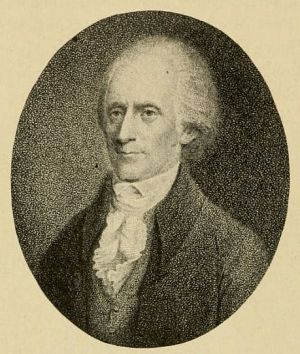
Richard Henry Lee.
163. Growing Spirit of Independence.—Of much greater importance than the events in the field were the events in Congress. At the beginning of the contest public opinion in America very generally attributed the course of Great Britain to bad leaders in Parliament rather than to the king. At first there was a strong feeling of loyalty and even affection toward George III., which would have made it easy for him to heal all differences. One effort after another had been made to induce the king to consider the petitions and remonstrances sent him, but these efforts had all failed. Even as late as the beginning of the war there was very little general thought of independence. But at the end of May, soon after the news of the first conflict at Lexington and Concord reached North Carolina, the people of Mecklenburg County assembled and passed a series of resolutions, declaring that as the mother country had pronounced the Americans rebels, the colonists were absolved from all further allegiance. This declaration seems to have attracted very little attention at the time; but as events progressed, public opinion drifted so rapidly in this direction, that early in the summer of 1776 the leading minds came one after another to the conclusion that independence was inevitable. Final action was not the result of any sudden impulse, but of most careful consideration.

Thomas Jefferson.
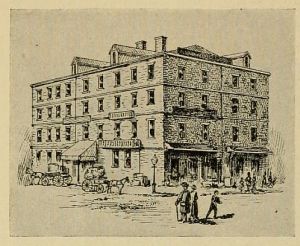
House in which Jefferson wrote the
Declaration of Independence, corner of
Market and Seventh Streets, Philadelphia.
164. Signing of the Declaration.—After much private discussion had revealed the opinions of the members of Congress, Richard Henry Lee,[76] on the 7th of June, offered a resolution that “these united colonies are and ought to be independent states, and they are absolved from all allegiance to the British crown.” The resolution was vigorously opposed by Dickinson of Pennsylvania and Livingston of New York, partly on the ground that a sufficient time had not yet elapsed for an answer from the king, and partly because the individual colonies had not yet authorized such action. But the colonies did not long hesitate. Most of them had already erected independent governments of their own. As early as July, 1775, Massachusetts had formed a government in which the king’s authority was practically set aside, and James Bowdoin was made chief executive officer and John Adams chief justice. Before July, 1776, all the other provinces, with the exception of New York, had taken similar measures, and more than two-thirds of them had voted for independence and had instructed their delegates to vote for Lee’s resolution. This resolution was accordingly adopted by Congress on the 2d of July. A committee, with Thomas Jefferson[77] as chairman, had been appointed in June to draw up a formal declaration in case independence should be agreed upon. Jefferson, then only thirty-three years of age, wrote the paper which, after slight modifications by Franklin and Adams, was adopted as the Declaration of Independence, on the 4th of July, 1776. This immortal document was thus put forth as an expression of the deliberate and firm conviction of the American people that the priceless treasure of human liberty could be preserved in no other manner. As the members one after another, with a solemn sense of the danger of this momentous act, signed the memorable document, Franklin[78] threw a gleam of sunshine upon the occasion by remarking that they must now all hang together, or they would hang separately.
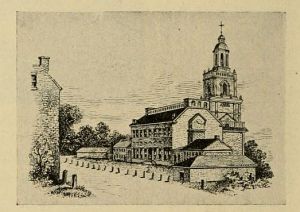
Old Statehouse in Philadelphia, now
known as Independence Hall.
165. Purport and Effect of the Declaration.—The Declaration of Independence was aimed directly at the Crown. It charged the king with “repeated injuries and usurpations, all having in direct object the establishment of an absolute tyranny over these States.” This general indictment was sustained, with some exaggerations but with essential truthfulness, by no less than eighteen accusations, or separate counts, aimed at the king, and the king alone. So far as the purpose of the colonies was defined by the Declaration, it was not a contest against the parliamentary government of Great Britain, but a contest against those unconstitutional usurpations of the Crown to which the colonies would not submit. From this point of view many modern criticisms of the document are seen to be hypercritical. However much the signers may have exaggerated specific charges, they did not exaggerate the general danger to be apprehended from the king’s self-willed conduct.
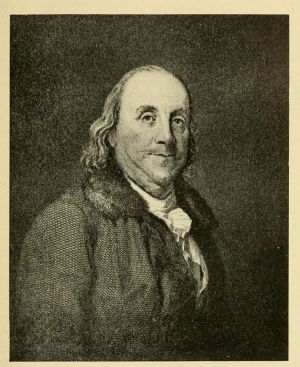
Benjamin Franklin.
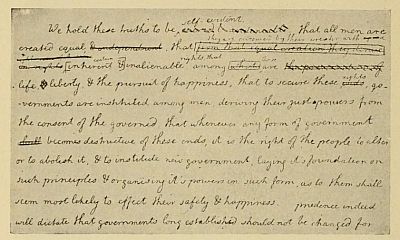
Portion of the Declaration of Independence.
166. Washington’s First Campaign in New Jersey.—After the fall of Fort Washington and the withdrawal from Fort Lee, Washington planned to concentrate the main portion of his army in New Jersey, to prevent the enemy from advancing upon Philadelphia. In crossing to New Jersey he had left General Charles Lee, with seven thousand men, at Northcastle on the east side of the Hudson. Washington now directed General Heath to fortify the Highlands about Peekskill and West Point in the strongest manner possible, and ordered General Lee to join the main army in New Jersey.
167. Disobedience and Capture of Lee.—For reasons which were long unexplained, Lee disobeyed the order of Washington, and chose to remain where he was. Repeated orders were disobeyed, but finally Lee made a show of obedience. He reached Morristown, however, with only three thousand of his seven thousand troops. Scarcely had he posted this fragment of his army on the Morristown Heights when, leaving the immediate command to Sullivan, he took quarters in a small public house some miles away. A Tory, learning of this fact, galloped eighteen miles with the news to the British, and the consequence was that Lee, in dressing gown and slippers, was taken prisoner by a troop of British dragoons. From Lee’s subsequent career (§§ 183, 184) and the discovery of his correspondence, it now seems probable that he already had traitorous designs.
168. Washington’s Difficulties and his Retreat.—The capture of Lee left Sullivan in command of the Northern army, and that officer moved at once to the support of Washington; but the difficulties of the situation seemed overwhelming. Howe and Cornwallis had crossed into New Jersey with a force more than twice as great as that of the Americans. Moreover, as the terms of enlistment expired, Washington found it almost impossible to keep his ranks full. Still worse, Howe, desiring to take advantage of the apparent lack of enthusiasm on the part of the American patriots, now made a final effort to induce them to throw down their arms. This was done under a promise of full pardon and protection to all who should abandon the Continental cause. More than three thousand persons, believing there was no possibility of success for the Americans, yielded to these allurements and deserted to the British. Tories everywhere now emerged from their obscurity and boldly asserted their allegiance to the king. Washington could not venture battle with his inferior force, but, with masterly skill, he slowly withdrew his army, crossing stream after stream with the British close on his heels. Even the broad waters of the Delaware did not baffle him. Pressed hard by superior forces, he threw his army across the river and destroyed all the boats on the opposite bank for nearly one hundred miles. His opponents found it impossible to follow, and decided to wait for the river to freeze over.

Retreat across New Jersey, 1776–1777
169. Washington turns upon his Enemy.—Howe and Cornwallis thought the war practically at an end. Deciding to leave their army east of the Delaware, with its center at Trenton and its wings at Burlington and Princeton, they returned to New York for the festivities of the holidays, where Howe was to celebrate the knighthood conferred upon him for the capture of New York. But Washington had a Christmas surprise in store for them. Including the forces of Gates and Sullivan, he now commanded about six thousand men. The loose disposition of Howe’s troops gave him an opportunity which he immediately turned to account. He decided by a secret movement to strike a hard blow at the British center. His plan was to cross the Delaware in three divisions. The right wing, under Gates and Cadwalader, was to attack the Hessians under Donop at Burlington; Ewing was to cross and attack the center at Trenton; while Washington himself, with the left wing six miles up the river, was to cross at that point and march down on the other side to attack the British flank and rear. Gates had asked and been allowed to go to Philadelphia, where he was already intriguing with Congress in order to supplant Washington. The right wing and the center found the river, filled as it was with floating ice, too difficult to cross, but Washington’s determination and skill at once showed themselves.
170. Battle of Trenton.—Just as he was ready for the advance, news came that his right and center had failed, and yet, without a moment’s hesitation, he decided himself to push on with all the greater energy.[79] Blocks of floating ice made the crossing next to impossible. Colonel Glover, with a force of Marblehead fishermen, was put in charge of the boats. In the course of ten hours he succeeded in taking twenty-five hundred men across with their guns and munitions. They now had six miles to march in a blinding storm. After a night so cold that two men of their number were frozen to death, they reached Trenton at daybreak. Planting their guns so as to rake the streets, they made escape impossible. Colonel Rahl, of the enemy, and seventeen of his men were killed; the others surrendered (December 26). Donop, fearing to be cut off by the advance of Washington, fell back to Princeton. Washington recrossed the river with his prisoners, but on the 29th took up his position once more at Trenton. Thus the center of the British army was destroyed.
171. Advance of Cornwallis.—Howe and Cornwallis, so rudely disturbed in the midst of their Christmas festivities, saw in a moment that a blow must be struck to recover the lost ground. With a force of about eight thousand men, Cornwallis advanced by way of New Brunswick and Princeton, where he established magazines and supplies, with a strong force to guard them. The army, harassed along every mile of the way by sharpshooters, reached Trenton on the 2d of January. Meanwhile Washington had moved in a southern direction, and taken up his position on the left bank of the Assanpink, a small stream flowing into the Delaware on the north side, not far south of Trenton. The crossings were guarded with such care that Cornwallis decided to allow his men, tired from their rapid march, to rest until the following day. His plan was to attack in front and along Washington’s right flank, and so force him back upon the Delaware, where he would be obliged to surrender. After observing the situation, Cornwallis went to bed in high spirits, saying, “At last we have run down the old fox, and will bag him in the morning.”
172. The Battle of Princeton.—But in the morning the “old fox” was gone. Ordering a force of men to keep fires burning along the front of the camp, and to make a show of strengthening the breastworks, Washington, with his main army, crossed the Assanpink, and passing around the left flank of the British, fell upon the force at Princeton at daybreak. The movement, brilliantly conceived and carefully planned, was completely successful. The British force at Princeton, after losing about five hundred men, was cut in two, one part retreating to New Brunswick and the other falling back to Trenton. In this remarkable fight (January 3, 1777) the American loss was less than one hundred.
173. Retreat of Cornwallis.—When Cornwallis found an empty camp before him and heard the sound of cannon in the direction of Princeton, he fell back at once, in order to protect his stores. At Princeton the full meaning of the disaster was revealed. Washington, at no time strong enough to risk a general battle, now contented himself with destroying bridges, harassing the enemy at every point, and finally taking up a commanding position on the heights of Morristown. To support himself on either flank, he ordered Heath to come down from the highlands of the Hudson to Hackensack, and Putnam to advance from Philadelphia to Trenton. Conrwallis, finding himself thus confronted, withdrew to Paulus Hook and New York. Thus, in the dead of winter, Washington, with a greatly inferior force, had fought two successful battles, had taken prisoners numbering more than a third of his whole army, and had practically driven the British out of New Jersey. This campaign saved the Revolution.
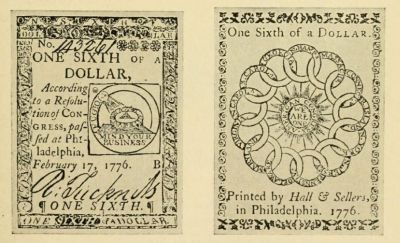
Continental Currency.
174. Influence of Washington’s Success.—The influence of Washington’s success was shown at once in many ways. In the first place it encouraged men to reënlist. The period for which many of the recruits had gone into the army had expired on the 1st of January. They had received very little pay, and the paper money they got had now fallen greatly in value. In the face of a defeat, few would have reëntered the service; but for the payment of those who would reënlist, Washington pledged his own fortune, and thus succeeded in keeping his army intact. Another beneficial effect was shown in the influence exerted upon the British army and the Tories. Large numbers of Hessians now deserted, in order to avail themselves of the offers of land that had been made by Congress; and many men of doubtful loyalty who, a few months before, had accepted the pardon offered by Howe, now made patriotic response to the counter-proclamation of Washington, requiring that they should either retire to the British lines or take the oath of allegiance to the United States.
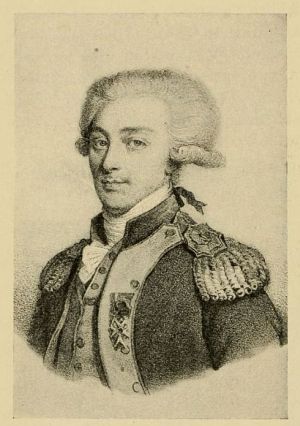
Marquis de Lafayette.
175. Effects of the Campaign in Europe.—But the most important result of this remarkable winter campaign was its influence on the various powers of Europe. Washington’s generalship called out the hearty commendation of Frederick the Great. In France a still greater interest was awakened. In the autumn of 1776 Franklin had been sent to Paris to secure a treaty. The sympathies of Louis XVI. were with George III.; but, on the other hand, the French people had hated England ever since the fall of Quebec. Throughout France there was also beginning to be a widespread revolutionary spirit. The disposition to recognize the independence of the United States greatly increased as soon as there was any probability of success. Though the French government still hesitated, many brave officers, such as Lafayette[80] and De Kalb, privately offered their services to the American cause. Lafayette, not yet twenty years of age and just married, threw himself into the enterprise with unlimited enthusiasm. He fitted out a ship at his own expense, and, leaving wife and friends behind, devoted all his powers to the new cause. Along with ten other officers, he arrived in America in the spring of 1777.
176. Reorganization of the American Army.—Congress now reorganized the army and conferred upon Washington powers that were practically those of a dictator. It also called for an army of seventy-eight thousand men, sixty-six thousand from the states and twelve thousand to be raised by Washington and to be subject only to national control. But as Congress had no power to enforce its laws, the full number of troops called for was never provided. The army was, however, somewhat enlarged in size and greatly improved in quality.
References.—The same as at the end of Chapter VI.
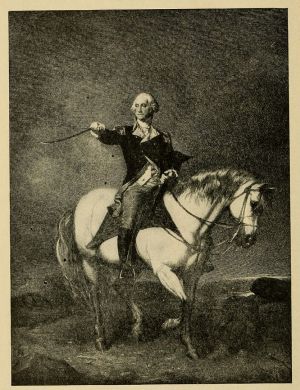
George Washington.
177. Plans of the British for 1777.—The British saw that if the next campaign was to be successful the war must be pushed forward on a much larger scale. They determined on three important movements. General Howe was to be reënforced so that while holding New York he could open the Hudson to Albany. From the north a new and more powerful expedition, under General Burgoyne, was to repeat the attempt of Sir Guy Carleton. A third expedition, under Colonel St. Leger, was to ascend the St. Lawrence into Lake Ontario, and from Oswego, after taking Fort Stanwix and clearing the Valley of the Mohawk, unite with Burgoyne and Howe in the vicinity of Albany. This comprehensive plan, if successful, would not only separate New England from the rest of the colonies, but would restore to the British the State of New York.
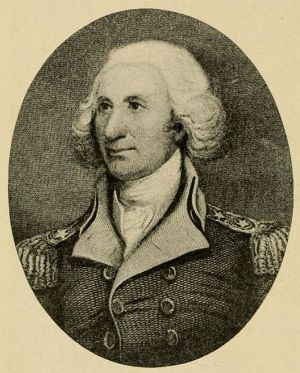
General Philip Schuyler.
178. Burgoyne’s Difficulties and Disappointments.—Burgoyne,[81] ascending the St. Lawrence, entered Lake Champlain with about eight thousand men, consisting partly of British veterans and partly of Hessians. He had no difficulty in taking Fort Ticonderoga, for General Gates in providing for its defense had committed the same blunder that Howe had committed in neglecting Dorchester Heights (§ 149). On a high, rocky point just south of the fort, General Phillips, one of Burgoyne's officers, succeeded in planting siege guns; and Gates saw at once that he must withdraw. But Burgoyne had no further success. He had expected large reënforcements from the Tory inhabitants, but in this he was disappointed. The preparations for meeting the British had been admirably planned by General Philip Schuyler,[82] who was in command of the Northern division of the army, with headquarters at Albany. His policy was to impede the march of the enemy until the Americans had time to gather strength. When Burgoyne began to press his way southward, he found that trees had been felled across every road, and the best he could do was to advance at the rate of only about a mile a day. Meanwhile the inhabitants of the region round about were rising, and sharpshooters began to harass him from every direction. When he reached Whitehall he realized that he was in danger of failing for want of provisions.
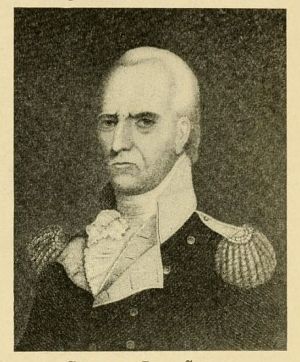
General John Stark.
179. The Bennington Expedition.—Hearing that the Americans had large stores at Bennington, Burgoyne now sent a force of about one thousand men, under two Hessian officers, Baum and Breymann, to capture them. The news of the expedition spread rapidly, and hundreds of patriots flocked to the defense. Among them was “good” Parson Allen, of Pittsfield, Massachusetts, who led an eager company from the Berkshire Hills. They were commanded by General John Stark,[83] who had already distinguished himself in the old French War, and at Bunker Hill, at Trenton, and at Princeton. With his reënforcements, Stark’s command now outnumbered Baum’s by two to one. Baum, seeing that resistance was to be offered, drew up his troops on high ground near the town and awaited an attack. On the morning of August 16, Stark stealthily threw a part of his men into the rear, while in front he led the attack in person. The Germans, thinking the troops in the rear were those “blessed” Tories they had been looking for, were thrown into confusion on the first attack from front and rear, and were soon forced to surrender. Baum was mortally wounded, and Breymann, on his way to the support of Baum, was met and defeated by a force under General Seth Warner. This exploit, one of the most brilliant of the war, cost the British two hundred and seven killed and wounded, and more than seven hundred prisoners, besides four field-pieces and a thousand stand of arms. The loss of the Americans amounted to forty killed and forty-two wounded.
180. General Schuyler Superseded.—There was much jealousy between New England and New York, and much consequent intrigue. General Gates had long been scheming with Congress for his own advancement. He and his friends were now able to point out what the people of New England could do at Bennington, as contrasted with what General Schuyler had been able to do in New York. The result of the intrigue was that General Schuyler was removed and Gates was placed in command in his stead.
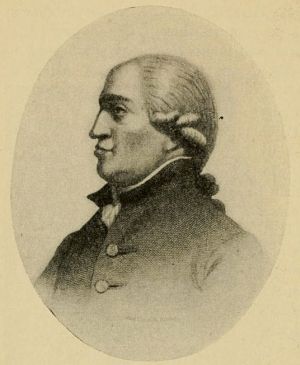
General John Burgoyne.
181. Movements of Burgoyne.—No general change of policy resulted from Schuyler’s removal. Burgoyne, finding himself in danger of being hemmed in at Whitehall, was forced to move toward the west and across the Hudson. Lincoln, with the New England militia, closed in on his rear, while Putnam arrived with a force from the Highlands and Arnold returned from the Valley of the Mohawk, where he had aided in repulsing St. Leger. It became daily more evident that unless relief should arrive from General Howe, Burgoyne must either defeat the Americans or surrender his whole army. No reënforcements came, and two vigorous attempts at Freeman’s Farm and Bemis Heights were frustrated by the skill and vigor of the troops commanded by Arnold and Morgan. The source of supplies for the British was now cut off; and, attempting to retreat by way of Saratoga, Burgoyne found his army completely surrounded by a force more than twice the size of his own. On the 17th of October he was obliged to capitulate, and surrendered with his entire force of more than seven thousand men.
Burgoyne demanded, and Gates consented, that the final act should be deemed a “convention” instead of a surrender or capitulation. Hence British historians are accustomed to refer to the event as the “Convention of Saratoga.” The terms, however, were not essentially different. The troops were allowed to march out with the honors of war, and to march to Boston, where they were to embark for home. An oath was required that they would not again serve in the American war. But a misunderstanding soon ensued, and Congress repudiated the convention, in consequence of which Burgoyne and his army were not sent home, but retained as prisoners. Burgoyne, however, was permitted to go in the following spring. He soon entered Parliament and became a stanch defender of the American cause. The army was transferred to a camp at Charlottesville, Virginia. Before 1783 they had dispersed and many had settled in different parts of the country.
182. St. Leger’s Campaign.—St. Leger fared scarcely better in his Western campaign. Advancing early in the spring from Oswego, he reached, on August 3, Fort Stanwix, an important point in Oneida County, now the city of Rome. He at once began the siege. A few days later a force of about eight hundred militia, gathered in the Mohawk Valley by General Herkimer, a veteran of the French war, advanced for the relief of the fort. Near Oriskany, however, his force fell into an ambuscade prepared by Sir John Johnson, the leader of the Tories, and Brant, the greatest of Mohawk chiefs. The battle was not decisive, but the confidence of the Indians and Tories was completely broken, and the Indians rapidly deserted. General Herkimer, severely wounded, died some days afterward.[84] The panic of the British was increased by the approach of a force under Arnold, which had been sent from Albany by Schuyler. St. Leger, attacked by a vigorous sortie from the fort on the one side, and by the surrounding patriots on the other, saw no chance of success, and accordingly beat a hasty retreat.[85] Thus both the British expeditions in the North were complete failures.
183. Blunder of the British Government.—It had been the design of the British government that General Howe, while holding New York with a part of his force, should ascend the Hudson with the other part for the reënforcement of Burgoyne; but the British minister of war, instead of sending peremptory orders, left much to the discretion of Howe.[86] This gave an opportunity for the scheming designs of General Lee, who was still a prisoner of war in the hands of the British. Lee had formerly been an officer in the British army, and Howe had serious thoughts of hanging him for desertion; but Washington wrote to Howe that he held five Hessian officers, whom he should treat as hostages for Lee. The British, thereupon, not daring to risk the anger of the Hessians that would surely follow an execution, concluded to hold Lee simply as prisoner of war, subject to exchange. But Lee, meantime, hoping to gain the favor of Great Britain, drew up an elaborate plan, advising the British in regard to the best method of assuring success. This treasonable paper, indorsed as “Mr. Lee’s plan, March 29, 1777,” was not discovered until eighty years after the war.
184. General Lee’s Advice.—The advice of Lee was that Howe direct all his energies to an attack upon Philadelphia; and accordingly, as soon as the British commander heard of the success of Burgoyne in taking Ticonderoga, he decided to adopt this plan. His first purpose was, while leaving New York in command of a small force, to advance with the greater part of his army across New Jersey. But Washington, detecting his purpose, threw up strong intrenchments at Middlebrook, directly athwart his path. Howe thought it not prudent either to attack directly, or, by marching around, to leave his opponent in the rear. After nearly two months of unsuccessful effort to bring Washington to battle, he changed his plan, and about the middle of July withdrew his army to Staten Island.
185. Movements of Howe.—It became evident at once to Washington that Howe’s purpose was to put his force upon a fleet and either ascend the Hudson or sail to the south. The American commander was not left very long in doubt. Leaving eighteen hundred men under Sir Henry Clinton in New York, Howe put to sea. Washington at once inferred that Howe had gone south, but it was necessary to guard against the possibility of his turning suddenly northward and advancing up the Hudson. On account of supposed obstacles in the Delaware below Philadelphia, Howe passed on one hundred miles farther, into Chesapeake Bay, and landed his army at Elkton. Hearing of Howe’s arrival, Washington turned south to meet him. In order to prevent a panic in Philadelphia, he marched his army of eleven thousand men through the city.
186. Battle of the Brandywine.—It was evident that Howe would advance upon Philadelphia without delay. Though Washington had only eleven thousand men with whom to meet Howe’s eighteen thousand, he decided to contest the advance in a battle. Accordingly the Americans were posted along the north bank of Brandywine Creek, with their center at Chadd’s Ford. The position was admirably chosen, and the forces were skillfully posted. But the British decided to force the passage by means of a flank movement. On the morning of September 11, Cornwallis, who commanded the British left, marched up the river some eighteen miles by the Lancaster road and crossed at Jeffrey’s Ford, intending to pass around and attack the Americans in the rear. The success of such a movement depended upon its secrecy. Washington, fortunately, learned of the operation in time to order Sullivan to change his front and meet Cornwallis as he approached. But for this discovery the Americans would undoubtedly have been routed and a large part of the army captured. Sullivan fought with great bravery and skill, but he was not able to repulse the enemy. In order to support Sullivan the whole American army fell back, but it fell back in good order, chiefly through the masterly skill of Greene. The Americans lost a little more than a thousand, and the loss of the British was about six hundred. The skill of the Americans in the retreat was shown by the fact that Washington opposed the advance of the British so vigorously that fifteen days were consumed by Howe in a march of twenty-six miles to the city. On September 26 the British moved into Philadelphia. Cornwallis was left in command of the city, while Howe established his headquarters at the adjacent village of Germantown.
187. Needs of the British; Battle of Germantown.—As the American army had not been crippled, it was easy for Washington to cut off the supplies of his enemy on the landward side. The British were therefore dependent upon vessels from the sea. To clear the river of obstructions a force was at once sent from Philadelphia. Washington determined to take advantage of this advance and to attack the main army at Germantown, while the British were thus temporarily weakened. Such extraordinary audacity on the part of an army which had just been defeated seems never to have entered the minds of the British. But on the evening of the 3d of October, Washington began his march, with the purpose of nothing less than the destruction or capture of Howe’s force. The town was to be approached by four roads, the army consisting of two divisions, under Greene and Sullivan. The advance arrived at the outskirts of the village at daybreak, but unfortunately a heavy fog came up, so that it was impossible for the different lines to recognize one another. The Americans advanced successfully in four different columns and seemed likely to push the British back upon the river and completely overwhelm them; but, in the center of the field, one of the brigades of General Greene’s division came into collision with one from that of General Sullivan. Each, supposing the enemy had been met, fired upon the other.[87] A confusion resulted which gave the British time to recover, and the Americans were finally repulsed. This battle is universally considered as one of the boldest fought by the Americans, and it came wonderfully near to complete success. Howe and Cornwallis were now left for the winter in Philadelphia, while Washington took up his winter quarters at Valley Forge, only a few miles away, where he could prevent the British from foraging the country.
References.—The same as at the end of Chapter VI.
|
Stephen, whose brigade fired upon that of Wayne, was tried by court-martial and dismissed from the service. |
188. Change in the Commissariat of the Army.—Nearly a year before the close of the campaigns just described, Congress had very unwisely determined to make a change in the control of the commissariat of the army. Up to this time it had been a part of the military service and had been successfully managed by Colonel Trumbull; but it was now decided to appoint two officers,—one for procuring the supplies, and another for distributing them. This system of divided responsibility caused the greatest discomfort to the army.
189. The Winter at Valley Forge.—Washington’s force, in its winter quarters at Valley Forge, was subjected to terrible suffering. On the 22d of December two brigades became mutinous, because for three days they had gone without bread and for two days without meat. On the following day Washington informed Congress that he had in camp two thousand eight hundred and ninety-eight men “unfit for duty because they are barefooted and otherwise naked.” Even when his army first marched into winter quarters, their route could be traced on the snow by the blood that oozed from their bare and frost-bitten feet; and matters grew worse as the winter advanced. This condition was not owing to any actual want of supplies, for it was afterward found that “hogsheads of shoes, stockings, and clothing were lying at different places on the roads and in the woods, perishing for want of teams or of money to pay the teamsters.” It was in consequence of gross mismanagement on the part of the commissariat, that the winter at Valley Forge was one of such memorable suffering and death.

The Middle Atlantic States
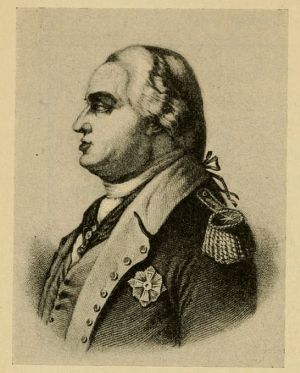
Baron von Steuben.
190. The Coming of Baron von Steuben.—But the winter, sad as it was in most respects, brought one great advantage. Agents in Europe succeeded in persuading one of the most efficient soldiers from the staff of Frederick the Great to offer his experience to the American cause. This was Baron von Steuben.[88] He had gone through every grade of the Prussian service up to the rank of marshal, and his knowledge of military drill caused him to be appointed inspector general of the American armies. It would be difficult to overestimate the value of his services. He found the raw American troops completely unaccustomed to the exact military methods of Europe, and he set himself to teach them all the arts and methods of the regular soldier. Taking a musket in his hand, this Prussian officer of highest rank devoted himself from morning till night to the most elementary, as well as the most intricate, parts of military drill. Thus, in the course of the terrible winter at Valley Forge, Baron von Steuben brought the army into a condition of efficiency it had never known before.
191. General Causes of Discontent.—During this winter there were numerous matters that occasioned great anxiety. It is at the present time easy to see that Washington’s plan of conducting the war was the only one that gave any promise of success. But it was one that could be easily misunderstood and misrepresented. It was possible for unfriendly critics to say that he had been driven from New York; that he had lost Philadelphia; and that he had been defeated in two important battles. It was also easy to overlook the far more important fact that he had kept his army intact, and that he had managed to fight and to avoid fighting in such a way as to keep the enemy occupied at the center so that the great object of the British campaign, the opening of the Hudson, was completely frustrated.
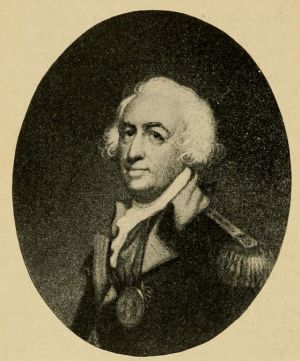
General Horatio Gates.
192. Intrigues of Gates and Others.—The country was not lacking in people who were ready to seize upon opportunities for slander and intrigue. John Hancock, the first president of Congress, had been ambitious for the position of commander in chief, and, as many charged, had, in consequence of his failure to obtain that office, resigned his presidency in disgust. The impetuous Samuel Adams, and even John Adams, had uttered loud complaints over what was called the “Fabian policy,” and had clamored for a short and decisive war. The success of the Northern army had enabled Gates,[89] who was the arch-intriguer of the time, to present his claims with some show of plausibility. By distributing promises throughout the army he created a widespread sentiment in behalf of Washington’s removal and his own appointment. His friends sent letters from every quarter to members of Congress, representing that before Gates had commanded the army of the North, Burgoyne had had uninterrupted success, and that immediately after Gates’s appointment the coils were rapidly thrown about the British commander until he was compelled to surrender. Of course no mention was made of the fact that the victory at Bennington was solely due to Stark and his New England volunteers; that the repulse of St. Leger was due to Herkimer and Arnold; and that the two victories over Burgoyne were due chiefly to the vigor and skill of Arnold and Morgan.
193. The Conway Cabal.—The most conspicuous manager of the intrigue was an Irish-American officer, by the name of Conway, who had not been promoted by Washington as rapidly as he had desired. Congress, notwithstanding the opposition of Washington, was disposed to advance Conway and a number of other subordinate officers. Washington did not hesitate to express his disapproval, and even went so far as to say, “It will be impossible for me to be of any further service if such insuperable difficulties are thrown in my way.” This was very justly interpreted as a threat to resign, and it was effective. But the anger of Conway toward Washington was naturally increased. The intrigues that followed have passed into history as the “Conway Cabal.” The only success of the movement was to induce Congress to reorganize the “Board of War” and make Gates its president. Public sentiment was so overwhelmingly favorable to Washington, that Congress ventured to go no farther. Extracts from some of the letters were published and thus the whole spirit of the intrigue was revealed. The scornful silence of Washington, who never in his life condescended to defend himself, reacted greatly in his favor. In the end, the commander in chief was stronger in his position than ever. Gates resigned in disgust and returned to his plantation in Virginia.
194. Treaty with France.—America had now single-handedly carried on the war for more than two years, but the defeat of Burgoyne and St. Leger in the North, and the vigor with which Washington conducted the campaign in New Jersey and about Philadelphia, convinced the French that the time for recognition had arrived. Treaties were signed on February 6, 1778, between France and the United States, in which France pledged herself to furnish ships, as well as men, and the Americans, on their part, agreed not to cease the conflict until Great Britain acknowledged their independence. Thereafter England was at war with France, as well as with America.
195. Howe succeeded by Sir Henry Clinton.—The French alliance obliged the British to change their plan of action. Howe, who had never believed in the British policy, now resigned and returned to England, and Sir Henry Clinton succeeded him in command. Anticipating the approach of the French fleet, and evidently fearing that the French and Americans together would prove too strong for the British at New York, Clinton decided to evacuate Philadelphia. Washington, whose army, notwithstanding the sufferings at Valley Forge, showed the effects of the careful drilling by Baron von Steuben, determined to attack the British on their northern march.
196. The Battle of Monmouth.—The place chosen was Monmouth, and the battle took place on Sunday, the 28th of June. The northern portion of the American force was ordered to attack the British on their flank, while Washington himself, by closing in upon their rear with the southern division, hoped to overwhelm them. General Charles Lee, whose treason was still unknown to Washington, had been exchanged, and, as senior major general, had command of the northern portion of the army, consisting of about six thousand men. Washington ordered him to attack Clinton’s flank with vigor, while the commander in chief himself, with a still larger force, was to attack at the moment when the enemy had been thrown into confusion. Lee, however, on reaching the British, made only a feeble show of advance and then ordered his troops to withdraw. Washington, informed of the situation by a messenger from Lafayette, rushed forward in furious anger and demanded an explanation. As no satisfactory reason for his retreat could be given, Washington ordered Lee to the rear, and, galloping along the disordered mass of retreating troops, shouted for a halt, and then reformed the lines. The results of the winter’s drill were at once felt, for in the face of the enemy and under a hard fire the American troops fell into order, wheeled about, and rushed forward to a new attack. The British were driven from the ground they had gained; but night came on, and the two armies occupied the positions held before the battle. Before morning the British resumed their way to New York.[90] After the battle, Lee was tried by a court-martial, consisting of several of the most eminent officers in the army, and was dismissed from the service.
197. First Efforts of the French.—The first efforts of the French to assist the Americans were not fortunate. Count D’Estaing, a kinsman of Lafayette, arrived on the 8th of July with a squadron of twelve ships of the line and six frigates, and a land force on board of four thousand men. His fleet was larger than that of Clinton; but as two of his vessels could not cross the New York bar, he was not strong enough to venture an attack. The next movement was an effort to coöperate with the land force of General Sullivan in reducing Newport, Rhode Island. This point had been taken by the British soon after their expulsion from Boston, and had been held to the present time. Sullivan now approached with a large force from the land side, and D’Estaing was to prevent reënforcements by sea. It appeared certain that the post would be taken. But soon Lord Howe approached with his fleet, and D’Estaing moved out for action. In the nick of time one of the most terrific storms ever known came on and dispersed both fleets. D’Estaing felt compelled to put into Boston for repairs. While he was there word came that Clinton had sent five thousand men to relieve the Newport garrison. Lafayette galloped seventy miles in seven hours to obtain aid from D’Estaing, but it was too late. The siege had to be raised, and soon D’Estaing moved off to the West Indies. These movements of the French were very severely criticised by the Americans, and in consequence, at one time the French admiral thought seriously of taking his fleet back to France in disgust. It was only the great tact and skill of Washington that persuaded him to remain. His going to the West Indies was not without importance, for Clinton felt obliged to send five thousand troops for the support of the British in the islands.
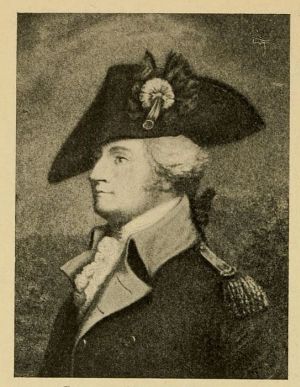
General Anthony Wayne.
198. British Movement on the South.—The efforts thus far made to destroy the revolutionary army by striking at its center having failed, the British determined in the spring of 1779 upon a new policy. It was decided to attack the South, partly for the purpose of bringing the Southern states completely under their control, and partly for the purpose of drawing off a portion of Washington’s army. In the execution of this plan they had no difficulty in overrunning Georgia and South Carolina, but Washington understood perfectly well that the temporary loss of the Southern states would not mean the loss of the cause if the Middle states and New England could be kept together. He therefore refused to weaken his grip upon the Hudson. In July, General Anthony Wayne[91] took by storm the seemingly impregnable position at Stony Point on the Hudson, in one of the most brilliant assaults of the war. His fearless dash, which was made at midnight, caused him to be known as “Mad Anthony.”
199. British Control in the West.—At the outbreak of the war the vast region west of the mountains was already the field of much strife between the Indians and the few settlers that had pushed their way along the valleys into what was then the far West. The territory between the mountains and the Mississippi River, a region twice as large as the German Empire, was still an almost unbroken wilderness. French settlements had been established at Detroit, at Vincennes on the Wabash, and at Natchez, Kaskaskia, and Cahokia on the Mississippi. But these fortified hamlets since the fall of Quebec had been controlled by British garrisons. Though the region was thus under British dominion, it was claimed by Massachusetts, Connecticut, New York, Virginia, Maryland, North and South Carolina, and Georgia by authority of their original charters. The possession of the whole region was therefore involved in the war.
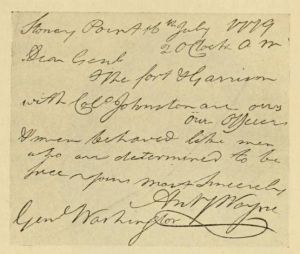
Wayne’s Dispatch to Washington.
200. Settlements in Tennessee and Kentucky.—Virginia and North Carolina were the first to send explorers and settlers into this distant region. Before the outbreak of the war, Daniel Boone[92] had explored the Kentucky Kiver, and Virginia surveyors had gone down the Ohio as far as the present site of Louisville, which was soon after named in honor of our new ally, the reigning king of France, Louis XVI. Virginians entered the country as settlers, and their sympathy with the revolutionary movement was so intense that they named one of their principal towns Lexington, in honor of the village where the first shots had been fired. The pioneers of most influence in Tennessee were James Robertson and John Sevier, who played a part as explorers and organizers much like the parts played by Daniel Boone and James Harrod in Kentucky. In both of these regions laws were enacted and courts instituted, and when the Continental Congress met, delegates were sent to it to represent the interests of the new settlements. The one was called the State of Transylvania and the other the County of Kentucky.
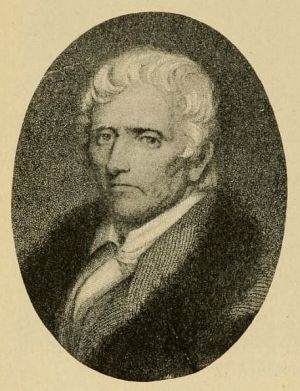
Daniel Boone.
201. Border Warfare.—The early years of these settlements were periods of constant hardship and of strife with the Indians. Even before the Revolutionary War broke out, the Indians organized for systematic resistance. This was the result partly of outrageous treatment by the white settlers, and partly of repeated Indian depredations.
202. Lord Dunmore’s War.—Lord Dunmore, the last royal governor of Virginia, sent out in 1773 an injudicious order which led to an outbreak of hostilities all along the line. The immediate cause of the war was the fiendish act of a wretch by the name of Greathouse, who decoyed the family of the friendly Indian chief, Logan, consisting of nine men, women, and children, into his rum shop, and after getting them intoxicated, butchered them all in cold blood. The justly outraged Indians rushed to arms from all quarters. The war which followed was characterized by the murdering of women and children and the burning of cabins and wigwams, until it was ended by the decisive battle of Point Pleasant on the Great Kanawha, on October 10, 1774. The Indians, commanded by the Shawnee chief, Cornstalk, were utterly defeated by the settlers under Andrew Lewis, and were glad to secure peace by surrendering all their claims to lands south of the Ohio.
203. Warfare in Tennessee.—The westward movement from North Carolina through the Great Smoky Mountains into the country now known as Tennessee was also the occasion of numerous conflicts. In 1770 the settlers had reached the Watauga. Forts were erected, and the settlement soon assumed a thriving condition. But conflicts were not long postponed. The most warlike and powerful of the Southern tribes of Indians were the Cherokees, and on the outbreak of the Revolution they took sides with the British. The Indians even advanced into South Carolina and Georgia; but they were unable to hold their ground, and when in 1776 they attacked the Watauga settlement, they were so completely defeated by the troops of Robertson and Sevier that they soon afterward were willing to make peace. In 1777 they renounced the larger part of their claims to lands between the Tennessee and the Cumberland. Thus Tennessee, as well as Kentucky, was secure for the future Union.
204. Organization of Tories and Indians in the Northwest.—Meanwhile matters of no less importance were occurring on the northwest frontier. Washington fully understood the necessity of taking from the British as much as possible of that vast territory which extends from the Catskills to the Mississippi River, and which had been made a part of Canada by the Quebec Act (§ 136). This was by no means an easy task. The Six Nations (§ 3), constituting the most powerful Indian confederation ever known, were under the immediate leadership of the greatest of all Indian chiefs, Joseph Brant, and under the influence of Sir John Johnson, the most formidable of the Tories. Brant had been liberally educated in Mr. Wheelock’s School, afterward Dartmouth College, and had even visited England and had dined with Burke and Sheridan; but his education seemed only to sharpen his wits and make him the better able to use the characteristics of other Indians. Though he exerted his influence to prevent the killing of women and children, as a strategist he was unequaled among savages, and on the battlefield he could out-yell any other chief. Throughout the West the Indians had generally combined with the Tories and the British. Two forces were now organized, one at Niagara and one at Detroit, for carrying out their designs.
205. The Wyoming and Cherry Valley Massacres.—In the summer of 1778 twelve hundred Tories and Iroquois, led by John Butler, advanced stealthily from Niagara toward the southeast and fell upon the peaceful inhabitants of the Wyoming Valley in Pennsylvania. Hundreds of innocent inhabitants were tortured and scalped, and the horrors of the massacre sent a pang into all parts of the civilized world. Similar outrages occurred at Cherry Valley and elsewhere, and every settlement was in danger. Prisoners who refused to give information were put to torture with ingenious cruelty.
206. Sullivan’s Expedition.—In order to destroy the power of the Six Nations and put an end to this savage method of warfare, Washington decided to send out a strong force in the summer of 1779. The command of the expedition, having been declined by Gates, devolved upon Sullivan,[93] who had orders to lay waste the entire country of the Iroquois. The right wing of his army, under General James Clinton, advanced up the valley of the Mohawk, while Sullivan himself, with a force of about five thousand men, pushed into the valley of the Susquehanna. Both forces destroyed the Indian villages and the growing crops wherever they went. Finally, meeting the united forces of Johnson, Butler, and Brant near Newtown (now Elmira), Sullivan achieved a complete victory, August 29.[94]
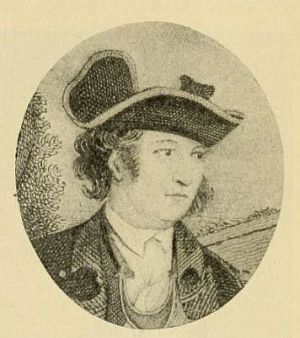
General John Sullivan.
207. Destruction of the Six Nations.—Sullivan’s forces then advanced northward in two divisions, burning villages, cutting down fruit trees, and destroying the growing corn in all directions. After a successful march of more than seven hundred miles, during which he not only temporarily, but permanently, through his destruction of their harvests, broke the power of the Six Nations, Sullivan reached New Jersey in October. The suffering which resulted to the Indians from this expedition was greatly increased by the intense cold of the following winter.[95] The horrors of the period, however, cannot be understood without a study of painful and revolting details. In no part of the country was the suffering greater than in central and eastern New York during this contest of Indians, Tories, and patriots. In Tryon County the population was reduced to one-third of its former number, and among those who remained there are said to have been three hundred widows and two thousand orphans.
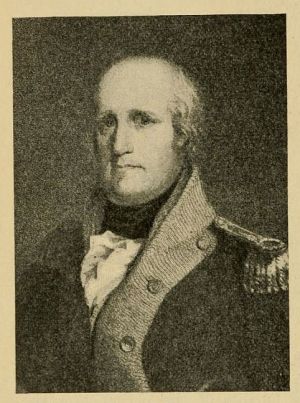
General George Rogers Clark.
208. George Rogers Clark.—An expedition of even greater importance had been undertaken the previous year, still farther west, by George Rogers Clark.[96] Colonel Hamilton, commander of the British at Detroit, had planned a series of movements with the intention of taking possession of the whole western region north of the Ohio. Clark, a Virginian who had settled in Kentucky, had become thoroughly acquainted with frontier manners and methods. In the autumn of 1777, he learned of Burgoyne’s surrender. Divining the importance of the West, he at once sent scouts throughout the region known as the Illinois country. As a result of the information thus received, this adventurous frontiersman, only twenty-five years old, formed the bold project of conquering from the British the whole of the vast region extending from the Alleghanies to the Mississippi.
209. Clark’s Expedition.—Accordingly, having secured permission from the authorities of Virginia, Clark, taking a force of one hundred and eighty men, with boats and artillery, started in the spring of 1778, at Pittsburg, for a voyage down the river to the junction of the Ohio and Mississippi. He had no difficulty in capturing Kaskaskia, a small post not very far north of the modern Cairo. Thence he sent messengers to Vincennes, which agreed to submit to him. Later, however, he learned that the British under Colonel Hamilton had retaken the fort. Sending his cannon on a boat to patrol the Ohio and the Wabash, Clark took his men across Illinois in a winter’s march, often through mud and water knee deep, and appeared before Vincennes. The village at once yielded, and the people united with Clark in assaulting the fort. Hamilton was soon obliged to surrender with his whole force. By this brilliant expedition, the frontier was extended to the Mississippi River. The importance of the movement could hardly be understood at the time, but the history of the next hundred years revealed it in many very interesting ways.
210. Early Condition of the Navy.—Before the war the Americans had no navy, for there was no national government, and the individual colonies, under the Navigation Acts, had no opportunities for the development of foreign trade. Soon after the outbreak of hostilities, however, Congress provided for arming vessels, not so much to fight the British warships as to prey upon British commerce. Franklin, as minister to France after 1778, was authorized by Congress to commission vessels to scour the waters for British prizes.
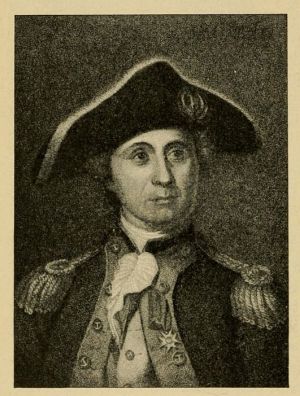
Captain John Paul Jones.
211. The Bon Homme Richard.—The most famous of these cruisers was a merchant ship that had been hastily fitted up for war and given the name of Bon Homme Richard. This vessel, commanded by John Paul Jones,[97] a Scotchman who had renounced his country and lived some years in America, made havoc among the British merchantmen, especially in the British and Irish Channels and off the east coast of Scotland. On the 23d of September, 1779, Jones, with two small accompanying vessels, met the British frigate Serapis, with similar support, convoying a small fleet of merchantmen, off Flamborough Head. The Serapis was slightly more powerful than the Richard, but Jones did not hesitate to attack, and the result was one of the most obstinate and bloody battles in all naval history. Jones received no assistance from his attendant ships, which even fired into the Richard. After both ships had been partially disabled, Jones ran alongside the Serapis and lashed them together. From that moment a terrible battle with canister, musket balls, hand grenades, and cutlasses went on, until more than half of all the men engaged were either killed or disabled. The Serapis finally surrendered, but it was immediately found that the Richard had been so riddled with shot that it was sinking, and Jones therefore was obliged to transfer his men to the other vessel. A few hours later the Richard went down.
212. Importance of Jones’s Victory.—This desperate naval battle was important for two reasons: first, it everywhere gave the Americans a reputation as sailors; and secondly, it led to an important international dispute. Jones took the Serapis into a port in Holland. The British at once demanded that the commander of the Richard should be given up to be tried as a pirate. The Dutch refused, on the ground that Jones had done only what the British had long been doing. This, with some other complications, led to war between Holland and Great Britain. The English, in consequence, were then at war with Holland, as well as with America and France. Spain was also drawn in as the ally of France. Russia had long been apparently on the point of joining in the contest, but the Empress Catherine, before taking a final step, wrote a personal letter of inquiry to Frederick the Great, who advised her to keep out of the trouble. Thus England, left without a single ally, found herself confronted by three of the most powerful naval forces of continental Europe. The united fleets of France and Spain, even without the help of Holland, were scarcely weaker than the British fleet, and they at once threatened, while the English were occupied in America, not only to destroy the commerce of England in the open seas, but also to recover Gibraltar, and to overwhelm all the English possessions in the West Indies. The influence of these alliances on the American war may be inferred from the fact that while in 1779 the British had three hundred and fourteen thousand men under arms, not a tenth of that number were at any time in America.
References.—The same as at the end of Chapter VI.
|
New York Harbor froze over, and cannon and men, as well as supplies, were freely moved on the ice between New York, New Jersey, and Staten Island. |
|
Born, 1752; died, 1818. Went from Virginia to Kentucky in 1775; became a leader against the hostile Indians and the British; gained the Northwest for the Union in 1778. |
213. Clinton’s Success in the South.—Sir Henry Clinton, even without a very large force, found it possible to carry out his designs in the South with energy and success. Leaving Knyphausen a part of his force to defend New York, he started, December 26, 1779, with eight thousand men, for the South. Savannah fell into his hands, and a little later he invested Charleston. General Lincoln made the great mistake of allowing himself with five thousand men to be shut up in that city with no means of escape, and accordingly he was forced to surrender on the 12th of May, 1780, with his whole army. This was the severest blow the Americans had received. Clinton at once put Lord Cornwallis in command, after issuing a proclamation, threatening to deal with all who did not return to allegiance as traitors and rebels. He then went back to New York. South Carolina was soon overrun by the troops of Cornwallis, Tarleton, and Ferguson.
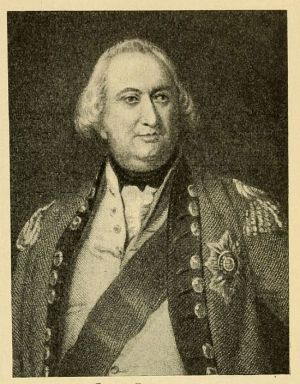
Lord Cornwallis.
214. Northward Movement of the British.—The American standards, however, were kept flying by the heroic deeds of the partisan generals, Marion and Sumter. The British advanced northward, hoping to find very little opposition before reaching Virginia. Washington recommended the appointment of Greene to the command of the Southern army; but the intriguers were successful, and Congress recalled Gates from his retirement, in the hope that the experience of Burgoyne would be repeated by Cornwallis.[98] But in North Carolina there had been no Schuyler to plan the campaign in advance, and there was no Arnold or Morgan to assist in carrying it out. Gates revealed his inefficiency at every step; and when the two armies finally came together, on the 16th of August, 1780, his troops suffered at Camden the most disastrous defeat ever inflicted on an American army. Though the American force was superior to the British, it was routed, driven in utter confusion from the field, and dispersed. Gates himself, after committing a succession of gross blunders, crowned his ignominy by joining in the panic and finally leaving the army to its fate. In four days he reached Hillsborough, some two hundred miles away. Thus the worst fears of Washington were fully realized, and the whole South was practically in the grasp of the British. Clinton might well suppose the end to be near at hand.
215. Growth of Arnold’s Disaffection.—As if to complete a year of disasters, the country received a terrible shock in the treason of one of its foremost officers. Benedict Arnold, who had been one of the most skillful, as well as one of the most energetic of commanders, had been slighted in various ways. Washington had repeatedly recommended that he be advanced from brigadier to major general, but Congress promoted five officers of inferior rank over him. These facts not unnaturally soured his temper, so that he was inclined to find fault with everything. While he was in this mood Washington assigned him to the command in Philadelphia, after the withdrawal of Clinton, where he was noted for luxurious tastes and extravagant methods of life. Meanwhile he became engaged to Margaret Shippen, a beautiful daughter of one of the most prominent Tory families in Philadelphia. Before many months, his views had drifted completely over to those of the moderate Tory party. After the surrender of Burgoyne, the British government had offered the colonies all the constitutional guarantees they had asked for before the Declaration of Independence, and Arnold, as well as the Tories generally, believed that these terms should have been accepted.
216. Charges by Congress against Arnold.—Arnold was seriously contemplating the advisability of resigning his post, owing to the hostility of the Executive Council, when charges of peculation and misconduct were brought against him. Thereupon he promptly demanded an investigation. He was acquitted, not only by a committee of Congress, but afterward by a court-martial, of all the charges excepting two of very trifling importance. But he felt insulted and persecuted. His hatred of Congress became intense, and accordingly, in the course of the six months from January to July, 1780, he devised one of the most infamous schemes in history. He entered into correspondence with the British commander, for the purpose of betraying the American cause. His letters, signed “Gustavus,” were answered by the British adjutant general, Major John André, over the signature “John Anderson.” But nothing definite came of the matter until Arnold determined to ask Washington for the command of West Point, in order that this most important stronghold in the whole country might be turned over to the enemy for a good price. His request was granted, and his nefarious plans came alarmingly near to success.
217. Meeting of Arnold and André.—In September the agreement had advanced so far that a personal interview between the officers in correspondence was thought desirable. The British fleet, temporarily under the command of Admiral Rodney, who had recently come from the West Indies, showed signs of great activity. It was the intention at an opportune moment to sail up the Hudson and make a show of attacking the fort. Arnold was to surrender it, with only a faint appearance of resistance. The American traitor was to sell his country for fifty thousand dollars and a commission in the British army. On the 18th of September, Washington left the fort for a conference with Rochambeau at Hartford; and this absence afforded the coveted opportunity. André, ascending the Hudson in the British ship Vulture to a point near the fort, went ashore and passed the night with Arnold a few miles below the fortress. After some delays the agreement was completed, but in returning André was obliged to cross and go down the river along the eastern shore.
218. Arrest of André.—At Tarrytown, in a strip of neutral territory between the two armies, he was arrested by three young men headed by John Paulding. One of the party had on a Hessian uniform, and when they confronted André, who was clad in citizen’s dress, he accosted them as friends, supposing they were British. They immediately declared themselves to be Americans, however, and roughly ordered him to dismount. Proceeding to search him, they found the fatal articles of agreement in his boots. As, however, they were unsigned, Colonel Jameson, to whom the documents and the prisoner were delivered, decided to forward the papers to Washington, and to send a message concerning the affair to Arnold.
219. Escape of Arnold.—Washington returned to West Point, September 25, and received the papers soon after his arrival. The letter had reached Arnold only in time to enable him to escape by taking a boat and rowing swiftly down to the British ship which was awaiting André. When Washington read the documents he burst into tears, and with choking voice disclosed the affair to Lafayette and Knox and the other officers about him.
220. André’s Execution.—André was put upon trial by a court-martial consisting of fourteen officers, including Greene, Steuben, and Lafayette, and was pronounced guilty. Though every effort was made by Clinton to save his life, Washington was inflexible, and, on the morning of October 2, he died upon the gallows the death of a spy. Though the English have been inclined to dispute the justice of Washington’s action, the latest and most judicious of British historians of this period, Mr. Lecky, after a full examination of the facts, reaches the conclusion that his condemnation was justified by the usages of war. Benedict Arnold’s treason has properly given his name an immortality of infamy.
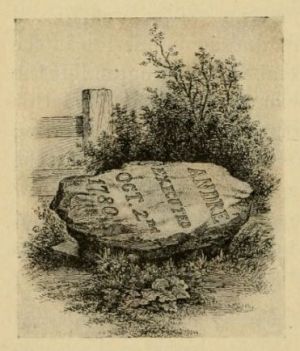
Place of André’s Execution.
221. Discontent in the Army.—The treason of Arnold was followed by events in the army which added to the general distress and anxiety. The best of the troops were those that had enlisted during the hopeful period just after Burgoyne’s surrender, in 1777. The term of enlistment was “three years, or during the war.” The troops claimed that, as the three years would expire at the end of December, they would then be free. The officers interpreted the law as meaning that in case the war should continue more than three years, the soldiers would be bound to service until its close. The army had many causes of complaint. Paper money issued by Congress had now become nearly worthless. With this money Congress was reluctant to pay the troops, but there was no other. At the end of December many of the regiments had received no pay for sixteen months, and supplies of clothing and shoes were so small that when January approached, many soldiers were barefooted and in rags. The winter of 1780–1781 saw scarcely less suffering than did the winter at Valley Forge.
222. Spirit of Mutiny.—On New Year’s Day, 1781, thirteen hundred Pennsylvania troops claimed that their time had expired, and, seizing six field-pieces, set out for Philadelphia to secure their rights from Congress. After much parleying, Congress, through its president, promised to give them certificates of indebtedness and their formal discharge. Thus it was settled that the men who had enlisted on the ambiguous terms might go when the three years had expired. By this decision Washington’s army not only lost its best troops, but was agitated by the mutinous spirit of others who were tempted to try the same method. On the 20th of January a part of the New Jersey troops mutinied without any adequate reason, and were not subdued until they were met by a brigade of troops from Massachusetts. The insurgents were soon brought to order, and two of the ringleaders were shot by Washington’s command. Thus came to a close the most discouraging year of the whole war.
223. Discouragements at the Beginning of 1781.—The disasters that had come to the Americans in 1780 gave the British many reasons to hope for a successful end of the contest in the summer of 1781. After the defeat of Gates at Camden there was a reasonable prospect that Cornwallis, having completely established British authority in the farther South, would be able to overrun Virginia and then unite with Clinton in overwhelming Washington. This feeling received encouragement from the discontented state of the American army, but in their predictions the British greatly underrated the ingenuity and the resources of the American commander in chief. Congress, which had chosen to disregard Washington’s former recommendation by sending Gates to the South, was now, late in 1780, when there was only a forlorn hope of success, quite willing that the commander should designate the general to meet Cornwallis. Washington selected Greene, the man he had recommended the year before. The latter did not reach Charlotte in North Carolina until the 2d of December; but he found that much had already been done by Marion, Sumter, and Morgan to counteract the effects of disaster and to keep alive the patriotic spirit.

Map of Operations in the South, 1780–1781
224. Victory at King’s Mountain.—Soon after the defeat of Gates at Camden, in the summer of 1780, Cornwallis had begun a northward movement. He sent on in advance two divisions: one under Ferguson, with about fourteen hundred men, and one under Tarleton,[99] with about the same number. Ferguson soon found that patriots had arisen on every side. Enterprising hunters and backwoodsmen had come from all parts of the North and West, as well as from the neighboring regions, until nearly three thousand were in the path of his progress. Thwarted at every step, he was finally obliged to look for a way of retreat. His messengers to Cornwallis and his scouts were everywhere shot down as fast as they were sent out. His force was finally brought to bay on the top of King’s Mountain, where after desperate fighting it was compelled to surrender, October 7. As a result of this battle, in which Ferguson was killed and nearly four hundred men were lost, Cornwallis was obliged to fall back to Winnsborough.
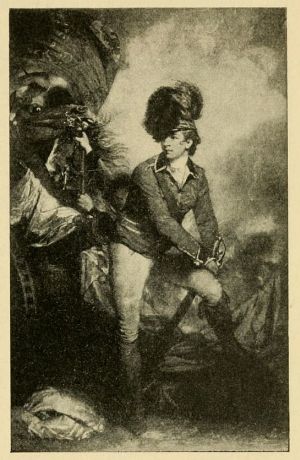
Colonel Tarleton.
225. Victory at Cowpens.—Against the force of Tarleton, Greene sent General Daniel Morgan,[100] who had already shown great ability at Quebec, at Trenton, and at Saratoga. The forces of Tarleton and Morgan were about equal. The American commander chose, as a spot for the battle, an open plain where cattle had been herded, called the “Cowpens.” The British, though wearied after a difficult march of five hours, decided to advance at once to a front attack. The first volleys of the Americans caused the enemy’s line to stagger and fall back. As the British came on a second time to the charge, Colonel Washington, a relative of the commander in chief, who led the cavalry, swept around the American left and struck the British in the flank. At this moment the Continentals rushed forward in a bayonet charge with irresistible force. The British were obliged to give way at every point, losing two hundred and thirty killed and wounded and about six hundred prisoners. Tarleton escaped with difficulty. The Americans lost only twelve killed and sixty-one wounded. The battle of the Cowpens, fought January 17, 1781, was the most brilliant American victory of the war, as Camden had been the most disastrous defeat.
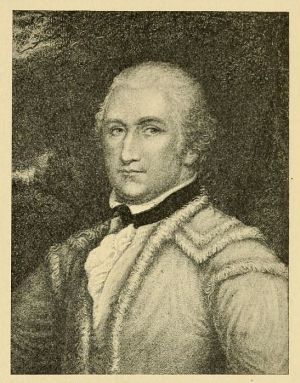
General Daniel Morgan.
226. Morgan’s Race with Cornwallis.—Morgan, having now destroyed Tarleton’s force, at once set out to rejoin Greene, but, in order to do so, he had to run a race with Cornwallis for the fords of the Catawba River. Though the British commander had the shorter course, Morgan pushed on with so much greater speed that he was the first to cross and thus was able to rejoin the main army.
227. Battle of Guilford Court House.—Greene now determined, before fighting a decisive battle, to draw his enemies as far as possible away from their supplies. Sending on a part of his force in advance and placing himself in command of the rear, he kept near enough to Cornwallis to lure him on without giving him an opportunity for a decisive battle. At length, on February 9, the American forces united at Guilford Court House, only about thirty miles south of the Virginia border, and here Greene, after a delay of about one month, during which he received reënforcements, selected ground for a battle. Though the British had a smaller force, they were veterans, while the larger part of Greene’s army was composed of recent recruits. In the battle which occurred on the 15th of March, the British had the advantage, but they lost so heavily that Cornwallis did not dare to pursue the defeated army. In order to reëstablish his communications with supplies, he moved southeast for the port at Wilmington.
228. Greene’s Recovery of the South.—Greene followed him rapidly until they were near the coast. Then Greene struck into the South for the purpose of reëstablishing his authority throughout the Carolinas. His march was not resisted with any success. September 8, after a masterly campaign extending over six months, he fought and won the last battle of the series, at Eutaw Springs, about fifty miles from Charleston. Thus, within little more than a year after the disastrous defeat of Gates at Camden, the brilliant campaign of Greene drove Cornwallis into Wilmington and the remaining British forces in the South into Charleston, and had practically cleared the intervening country of the enemy.
229. Movement of Cornwallis from Wilmington.—Cornwallis, however, did not long remain on the coast. As soon as he had refreshed his army, he attempted, with the help of Arnold, to overrun Virginia. Reaching Petersburg on the 20th of May, he was able, within a short time, to take and pillage the more important towns of Virginia, including Petersburg, Richmond, Charlottesville, Portsmouth, and Williamsburg. To meet these raiders, Washington sent Lafayette with an army of Americans and French, amounting to about five thousand men. The French commander, though only twenty-three years of age, had learned from Washington the art of harassing the enemy without bringing on a general engagement. Cornwallis now had a little more than seven thousand men. After trying in vain to bring Lafayette to battle, and to get reënforcements from Clinton, he followed Clinton’s instructions by withdrawing his force to Yorktown, in order to put himself in communication with the British fleet. This was the fatal move that resulted in the loss of the British cause.
230. Plans of Washington and Rochambeau.—Two days after the British reached Petersburg, Washington had an important conference with Rochambeau at Wethersfield, Connecticut. There, it was decided to send to the West Indies for Commodore de Grasse and such ships of the French fleet as could be spared from that region. The purpose was to combine the French and Americans, either to make a joint attack upon New York, or, by a sudden movement toward the South, to overwhelm Cornwallis. De Grasse was to choose and to report whether he would go to New York, or would stop at the Chesapeake.

Operations at Yorktown
231. Plan of the Yorktown Campaign.—In due time, Washington learned that De Grasse had chosen the Southern destination, and accordingly he began at once to maneuver his force so as to lead Clinton to suppose that the purpose was a general attack on New York. He ordered all preparations to be made in New Jersey as though he intended a siege, even sending misleading dispatches, which he planned to have the British capture. So skillfully was this done, that even when the army began to move from the Hudson, the British believed it was for the purpose of a general attack upon the city from New Jersey and Staten Island. The secret of the movement was confined to the French and American commanders. Washington evidently believed with Franklin, that three persons can keep a secret only when one of them is dead. On the 19th of August, leaving a strong guard along the front line, the French and American armies commenced their Southern march. So skillfully had all plans been arranged, that Clinton learned of the movement only after the Americans had reached Philadelphia, nearly a hundred miles away. He attempted a diversion by an attack upon Connecticut, but it was impossible to retard the march, or distract the attention of Washington. The British could not follow without abandoning New York to Heath, who had been left with four thousand men on the Hudson.
232. Movement of De Grasse.—De Grasse, with a larger fleet even than had been anticipated, reached the Chesapeake on the day when Washington reached Philadelphia. The French admiral at once landed three thousand troops and turned them over to Lafayette, whose army was thus increased to about eight thousand men. The French general, knowing that Washington was not far away, threw his lines boldly across the peninsula, September 7, thus shutting Cornwallis completely in. The British now saw the James on the one side, the York River on the other, with De Grasse in the rear, and Lafayette in front. Their condition was hopeless.
233. Surrender of Cornwallis.—Though a few British ships reached the scene from the north, they were too weak to cope with the fleet of De Grasse, and there was, therefore, no possible escape. To break through the American lines was impossible, as Cornwallis was now confronted by an army more than twice the size of his own. The siege and bombardment began at once. The cannonade was continued for some days with terrific energy, till the British ammunition began to fail. The outworks were carried by an assault in two divisions,—one of Americans and the other of Frenchmen. The Americans, led by Alexander Hamilton, were the first to cross the British ramparts. This was on the 14th of October. On the 17th, just four years after the surrender of Burgoyne, Cornwallis hoisted the white flag. As soon as the preliminaries could be settled, seven thousand two hundred and forty-seven soldiers became prisoners of war.
234. Influence of the Surrender on the British Government.—The surrender of Cornwallis was virtually the end of this long and memorable contest, for it put enthusiastic life into the Americans, while it overwhelmed the British government with confusion. Those English statesmen who had opposed the war from the first so strengthened their following that they were able to sweep the king’s friends out of power and bring in a government that sympathized with their views. The king himself, though driven almost to despair by this stupendous event, was the last to recognize its real significance; but at length even George III. saw that with a war on his hands against France, Spain, and Holland, his American project, so dear to his heart, must now be given up. A new ministry, with Lord Rockingham at its head, was brought in to negotiate terms of peace.
235. Difficulties in making Peace.—There were long delays and many difficulties in arranging terms. These were greatly complicated by the fact that America had France as an ally, and France had to be consulted in regard to all the conditions. Congress had no money with which to pay off the soldiers, and no power to raise money in the individual states. Discontent among the rank and file threatened to end in the most serious revolts. Nothing but the infallible tact and skill of Washington prevented mutiny. The commander in chief, however, was inflexible in his determination that the forces should be kept up until the treaty was finally adopted. That painful period of distress and waiting at length came to an end, but it was not until September 3, 1783, nearly two years after the surrender at Yorktown, that the treaty was signed at Paris. By that act Great Britain acknowledged the independence of the country from Canada to the Floridas, and from the Atlantic to the Mississippi. The conquest of the West was thus admitted, but the northern boundary was left rather vague, owing to defective knowledge of the region.
236. Treatment of Tories.—The Americans made the mistake of refusing to grant amnesty to the adherents of the defeated party, as should always be done in civil war. The patriots, or Whigs, as they were often called, continued to persecute the Tories. Many were put to death, and thousands were obliged to flee into Canada and Nova Scotia, where their descendants still remember with bitterness the treatment of their ancestors.
237. Causes of Success.—The success of the Revolutionary War was mainly due to five causes:—
1. The unfailing courage, wisdom, and ability of Washington. Even in the darkest hours his confidence in the final issue never faltered. By the wisdom and persuasiveness of the letters which he sent to governors, members of Congress, and prominent men in all parts of the country, he inspired others with something of his own confidence and multiplied the friends of independence. His extraordinary military skill in knowing when to fight and when not to fight, enabled him to take advantage of the mistakes of the enemy and to strike a blow whenever he could hurt the cause of the British or inspire his own army with new courage.
2. The alliance and support of the French. Until the Yorktown campaign the active assistance of the French in the field was very slight, but the moral support was most important. While it inspired the Americans with new courage, it had a corresponding effect in disheartening the British, who had to fight the French in other parts of the world. But for De Grasse, the Yorktown campaign would probably not have been attempted; for, if attempted, Cornwallis could easily have been supported and relieved by the British fleet.
3. The weakness of the British commanders in the field. Gage, Howe, Burgoyne, Clinton, and Cornwallis were all greatly inferior to Washington and Greene.
4. The British, toward the end of the conflict, had four very important wars on their hands, so that they found it impossible to send large reënforcements to their armies in America.
5. The persistent spirit of the American patriots. Though often defeated, and sometimes much disheartened, they stubbornly refused to give up. Even in the dark days of 1780, when the South was overwhelmed and overrun, they never regarded the cause as lost. It was this spirit which made it possible for Washington to keep a force in the field large enough to prevent the complete success of the British.
References.—The same as at the end of Chapter VI.

Land Claims of the Thirteen Original States
in 1783
238. Chaotic Condition at the Outbreak of the War.—As soon as the Declaration of Independence was adopted, the members of Congress saw that some form of general government would be necessary to bind the different parts of the country into common methods. Several of the states now had the advantage of regularly constituted governments; but the Continental Congress was without authority from any source whatever. Its members had been sent together by the different states without any mutual understanding or instructions, and consequently it had no power, except that of war, to enforce its acts.
239. Committee to frame Articles of Confederation.—On the day after the committee was appointed to frame the Declaration, a still larger committee was charged with the duty of preparing some plan of confederation. The difficulties met by this committee were almost insurmountable. The colonies were at that moment engaged in the work of framing permanent constitutions for themselves. Nor did the common cause of the war entirely sweep away the jealous differences between the states. The colonies had been settled by people of differing religious and political beliefs, and they had preferences for differing methods. The smaller colonies feared they would be absorbed, and the larger ones feared they would not have proper representation. The same spirit which made them desire to be free from the rule of the mother country made each state unwilling to be subject to the rule of the other states. As the Declaration of Independence had been aimed against the central authority of Great Britain, it was natural that they should distrust a strong central authority in the government they were about to establish. It was in the face of all these difficulties that the “Articles of Confederation and Perpetual Union” were reported by the committee, only eight days after the signing of the Declaration of Independence.
240. Difficulties of Agreement.—But the representatives found so many reasons for desiring changes that a final agreement was not reached by Congress until November of 1777. Then the articles had to go to the several states for ratification. The difficulties now seemed greater than ever before. According to the articles, every state was to have an equal vote with every other state, but to this equality of representation the larger states very strongly objected, while the smaller states stubbornly resisted every other method. There were also grave differences of opinion as to the executive branch of the new government.
241. Western Lands.—The ownership of the Western lands was the occasion of one of the most serious difficulties. The boundaries of some of the states were defined by their charters, while those of others were not. Six of the states claimed to extend as far west as the Mississippi River, while Virginia defined her boundary as extending to the northwest so far as to include the region which afterward formed Ohio, Michigan, and Wisconsin. The other states held that this territory had all been rescued from the British by common effort, and therefore that it should belong to the nation as a whole. This opinion finally prevailed. At length, after long and hot discussion, New York agreed to cede its Western lands to the general government, and this example was soon imitated by the others, although several states still reserved certain portions of their Western territory. After this concession, New Jersey was the first state to ratify the articles. Others followed so slowly that the ratification was not complete until Maryland signed on March 1, 1781, only a few months before the surrender at Yorktown. The delay shows the difficulty of obtaining even so little central authority as the articles provided for.
242. Weaknesses of the Confederation.—It immediately became evident that the confederation had very serious defects. Though a stronger government at the time could not have been adopted, the one obtained was of little value, except to show that a stronger government was demanded. By its provisions no measure could be taken by Congress without the vote of nine of the thirteen states, and even after the adoption of a measure, the confederation had no power to enforce it. The central government relied upon the individual states to carry out its laws, and the states had the option of enforcing obedience, or not, as they chose. Meantime the states themselves were under no restrictions. They passed revenue laws according to their own interests, and custom-houses had to be multiplied along the state borders. Whenever any tax was called for by Congress, to pay off the Continental troops or for any other purpose, some of the states would enforce its collection and others would not.
243. Dangers shown by Shays’ Rebellion and Other Disturbances.—In New Hampshire an armed force assailed the legislature at Exeter and demanded an issue of paper money. In Massachusetts, the collection of debts and taxes was forcibly resisted. The people in the central part of the state, led by Daniel Shays, collected into a motley army, and not only attacked the arsenal, but kept the state in a turmoil for more than six months. At length “Shays’ Rebellion,” as it was called, was put down by Governor Bowditch (1787), but with difficulty. Not one of the insurgents was punished. The states seemed to be growing farther and farther apart and more and more independent. There was really great danger that this tendency would go on till the United States, like Europe, would be made up of many independent nationalities. As if to make improvement impossible, the framers of the Articles of Confederation had provided that no change in them should be adopted unless agreed to by all the states. The consequence was that whenever any change was proposed, some state objected and the proposal was lost. It was a time of such perplexity and danger that it has been aptly called, “The Critical Period in American History.”
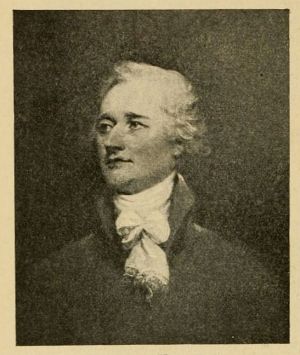
Alexander Hamilton.
244. First Effort for a Convention.—During all this time Washington, Hamilton, and Madison had been writing letters to show that a change was necessary and to devise a means of bringing it about. At length, the legislature of Virginia issued a call in 1786 for a general convention to meet at Annapolis, Maryland. But the smaller states were very shy of committing themselves to any scheme proposed by any of the larger states, and only five states responded to the call. Of course nothing could be done. The very absence of representatives, however, revealed some of the difficulties of the situation.
245. Second Effort toward a Convention.—The next year another course was adopted and with greater success. The call for the convention was issued by Congress. The purpose of the call was not to frame a new constitution, but to modify the old one. Twelve of the states appointed delegates, Rhode Island, the smallest of the commonwealths, alone standing aloof. The convention met at Philadelphia in May, 1787, and unanimously chose Washington as its president.
246. Ability in the Convention.—This convention was fortunate in having prominent representatives of all classes. Every state sent its best. Of the fifty-five members, twenty-nine had been college bred. Jefferson and John Adams were in Europe. Samuel Adams and Patrick Henry opposed the convention and remained at home. With these exceptions the most eminent men of the country were present. Washington and Franklin, by their general wisdom and great experience, represented the practical judgment of men of affairs. There were John Dickinson, whose Farmer’s Letters had done so much to bring on the Revolution (§ 131), and James Wilson, a Scotchman, one of the most learned jurists the country has ever had. Hamilton and Madison, by their varied and profound knowledge of political history, brought to the convention the advantage of the best types of general scholarship. Hamilton,[101] though only thirty years of age, was probably the ablest political thinker in the body. But his power was neutralized by the fact that New York, the state which he represented, had opposed the convention, and had sent two delegates to do what they could to prevent success. Hamilton was further handicapped by the extreme nature of his views, for he believed in a much stronger central government than could at that time be adopted.
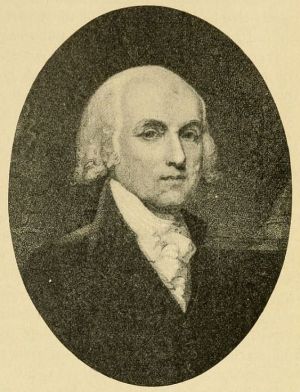
James Madison.
247. James Madison.—For these reasons, the main guidance of the convention fortunately fell upon James Madison,[102] a young man less brilliant than Hamilton, but superior to him in the art of estimating what is possible. A graduate of Princeton College, he had been from his youth a devoted student of history, had made himself thoroughly acquainted with all the best books on political science, and had paid particular attention to the republican organizations of Greece, Rome, Switzerland, and Holland. From the time he was twenty-five he had taken a prominent part in the Virginia legislature and in Congress, and he thoroughly understood the weaknesses and difficulties of the Articles of Confederation. His knowledge and experience, though united with a remarkable firmness of purpose, were presented with a kindness and sweetness of manner that commended his views to all his fellow-members. Madison, therefore, was the most influential of the members in giving the Constitution the form in which it was adopted.
248. General Spirit of the Convention.—The delegates brought together the wisdom and experience gained in framing the state constitutions and from observing the prevailing difficulties. The efforts of the convention to amend the Articles of Confederation were doomed to early failure. It was soon decided to abandon them altogether and to frame an entirely new constitution. Here the smaller states caused the greatest difficulty, for they were determined to give as little power as possible to the general government, in order that they might not be overwhelmed or absorbed. In this determination were enlisted not only New York, which was then one of the less important states, but also New Hampshire, New Jersey, Delaware, and Maryland.
249. Representation of Slaves.—Another very serious obstacle was presented by the slave trade and the question of the representation of slaves in Congress. In the early part of the eighteenth century there were about twelve thousand slaves north of Mason and Dixon’s line, and about forty-eight thousand south of it. But at the time of the Constitutional Convention, there were about fifty thousand in the North, and not far from seven hundred thousand in the South. There had been little or no importation of slaves during the war, and the slave system was generally condemned by the best men of the South as well as by those of the North. In their opinion, it was only a question of time when it would cease altogether. But the greater number of slaves in the South made the Southern delegates determined to have them represented, while the North generally opposed such representation.
250. Strength of Central Government.—Another difficulty in the way of agreement was found in the radical differences of opinion between the members as to whether the new government was to be very weak or very strong. This was by far the most important question of all. One party held that the states should still be left with great powers, and should be practically independent; while the opposite party thought that a general government with the essential attributes of an elective monarchy was most needed. There was, however, a very general and a very natural remembrance of the fact that it was the predominating strength of the executive part of the British government that had caused separation, and there was a general disposition to avoid any similar defect.
251. Discussion of the Difficulties.—These various difficulties taxed all the faculties of the members. It sometimes seemed that not another step of progress could be made, and that the delegates would be obliged to abandon the task and go home. As discussion advanced, it became evident that no agreement could be made except through a general spirit of conciliation and compromise. The convention sat with closed doors, and for four months considered the stupendous difficulties that confronted them. At length, on the 17th day of September, 1787, they agreed upon a constitution and adjourned. It was to go into effect when ratified by the conventions of nine states.
252. Four Great Lines of Compromise.—The Constitution was built upon a basis of four great lines of mutual concession.
First, the smaller states were brought to agreement by being allowed the same representation in the Senate as the larger states; while the larger states were satisfied by being allowed to send to the House of Representatives a number of delegates to be determined by the number of inhabitants.
Second, the question of the representation of slavery in Congress was finally adjusted by providing that for determining the number of representatives of each state, Congress should add to the number of freemen three-fifths of all persons held to service. Congress was also prohibited from abolishing the foreign slave trade before 1808.
Third, the advocates of a strong central government came to an agreement with the advocates of a weak one by allowing the dividing line between the authority of the central government and of the several states to be somewhat vaguely defined, and by leaving such definition to the course of future events. It is probable that if either side had insisted on putting into words a statement authorizing its interpretation, no agreement could have been reached. This uncertainty of interpretation, though apparently necessary to an agreement on the Constitution, might be called the fundamental cause of the Civil War in 1861.
Fourth, while the President, by being made commander in chief of the army and being intrusted with the enforcement of all laws, was given great authority, he was put under rigid constitutional checks in numerous ways. In case he should exceed his authority, he could be impeached by the House of Representatives and tried by the Senate; and in case of conviction, removed from office. It was further provided that in all cases whatsoever involving differences of opinion regarding the Constitution, the Supreme Court should render authoritative decision. This authority of the Supreme Court was the most marked peculiarity of the Constitution.
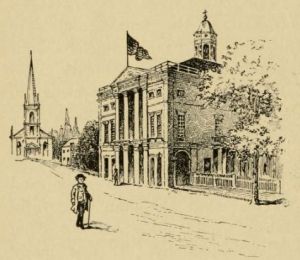
Federal Hall, New York City.
253. Characteristics of the Constitution.—On the basis of these mutual concessions, the Constitution was finally adopted. It provided for three departments of government: the Legislative, to make the laws; the Executive, to execute the laws; and the Judicial, to define the laws in case of dispute. The legislature consisted of the House of Representatives, the members of which were to be chosen for two years by the people of the several states; and the Senate, consisting of two members from each state, who were to be chosen for a term of six years. The executive officer was to be a President, elected for a term of four years, by electors chosen by the people of the several states, each state to have as many electors as it had members in the Senate and the House of Representatives together. To the President was also given legislative influence through the right of veto. The judiciary was to consist of a Supreme Court, and such other courts as Congress might provide for. The judges were to be appointed by the President, with the consent of the Senate, and were to hold office during good behavior. In case of misdemeanor they could be removed by impeachment. The authority given to the Supreme Court to declare acts of Congress contrary to the Constitution, and therefore null and void, was a new element in government and made the court stronger than any other court in existence. Jefferson returned from Europe just after the completion of the work of the convention, and was almost panic stricken by fear that the plan of government, if adopted by the states, would allow, if not even encourage, the establishment of monarchy. It was many years before Jefferson’s fears were allayed. The general wisdom of these provisions, however, has been acknowledged by the whole world.
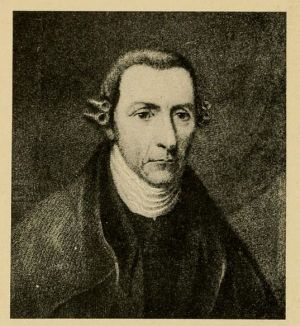
Patrick Henry.
254. Attitude of the States.—After the adoption of the Constitution by the convention, it went to the several states for ratification, and during the winter of 1787–1788 conventions in the respective commonwealths had the question of adoption under consideration. Its ratification was most strenuously opposed in Virginia, in New York, and in Rhode Island. Patrick Henry was the most eloquent of these opponents, his opposition being founded on the belief that the general government would gradually grow so strong as to interfere with the governments of the individual states. Of the states unfavorable to the Constitution, New Hampshire was the first to yield, in June, 1788. New York and Virginia soon followed. Rhode Island and North Carolina held out, and the Constitution went into effect without their consent. In order to satisfy those who thought the Federal government had too much power, ten amendments to the Constitution, embodying a Bill of Rights designed to restrict those powers, were adopted in 1791. The final adoption of the Constitution was brought about very largely through the influence of a remarkable series of letters written by Hamilton, Madison, and Jay, and afterward collected into the volume known as The Federalist.
255. Washington, the First President.—When, soon after the adoption of the Constitution, the first general election was held, it was found that every elector voted for Washington, who was therefore unanimously elected as the first President. John Adams, having the next number of votes, was elected Vice President. On April 30, 1789, they were inaugurated on the balcony of the Federal Building, on Wall Street, New York City, which was then the seat of government.

The Northwest Territory
in 1787
256. Ordinance for governing the Northwest.—While the Constitutional Convention was in session at Philadelphia, the Congress of the Confederation was in session in New York City. On the 30th of July, 1787, Congress passed the memorable “Ordinance for the Organization of Government in the Northwest,” that vast and important territory which now comprises the states of Ohio, Indiana, Illinois, Michigan, Wisconsin, and a part of Minnesota. This ordinance established among others four provisions of fundamental importance, which have contributed immensely to the development of the North Central states. These four fundamental provisions were the following:—
1. “Slavery and involuntary servitude shall forever be excluded.” This provision exempted the region from those perplexing discussions which afterward troubled Missouri, Kansas, and Nebraska.
2. “Religion, morality, and knowledge being necessary for the welfare of mankind, schools and the means of education shall forever be encouraged.” In this provision common schools, high schools, normal schools, and universities found their constitutional justification, and accordingly, in all the states formed from the Northwest Territory, schools of all grades have been supported by taxation. The example thus set has been followed by all the states since admitted to the Union.
3. “The navigable rivers leading into the Mississippi and the St. Lawrence, and the carrying places between them, shall be common highways and forever free.” This provision secured that freedom of communication between the states which has encouraged very rapid material growth.
4. “The inhabitants shall forever enjoy religious freedom, the habeas corpus, trial by jury, and equal civil and political privileges.” This provision not only secured perfect independence of religious thought, but protected all the people, immigrants as well as others, in the enjoyment of political freedom.
Though the binding authority of this ordinance was subsequently declared by the Supreme Court to have been superseded by the adoption of the Constitution, its influence on the development of the Northwest was unquestionably very great.
References.—A. Johnston, American Politics, 3-18; R. Frothingham, Rise of the Republic, 569-610 (of great importance); J. Fiske, Civil Government, 180-260; F. A. Walker, Making of the Nation, 1-75; A. B. Hart, Formation of the Union, 93-140; J. Fiske, Critical Period of American History, 90-101 and 177-186; J. Winsor, Narrative and Critical History of America, Vol. VI., 716, Vol. VII.; H. Von Holst, Constitutional History, Vol. I.; J. Schouler, United States, Vol. I.; H. C. Lodge, Washington, Vol. II. Fiske, Schouler, and Winsor are the most important of the general authorities on almost every point. J. Bryce, The American Commonwealth (abridged edition), chaps. iii., xxv., xxix., important on the various functions of different parts of the government; Elliot, Debates on the Constitution; Hamilton, The Federalist; B. A. Hinsdale, The Old Northwest; W. G. Sumner, The Financier and the Finances of the American Revolution (2 vols.); W. P. Cutler, Ordinance of 1787; American History Leaflets, Nos. 7, 8, 14, 20; Old South Leaflets, XI., 5; T. Roosevelt, The Winning of the West, Vol. II., chaps. i.–iii.

United States in 1789
257. Population and Area.—The country over which Washington began to preside in 1789 was very different from the great nation it has grown to be. Counting about seven hundred and fifty thousand slaves, the population did not quite reach four millions. Eleven years later, by the second census, that of 1800, this population had increased to 5,308,480; but the area of 827,844 square miles was not yet settled at the ratio of six and a half persons to a square mile. It was only along the Atlantic coast from Virginia to Massachusetts that the original wilderness had been fairly conquered by settlements that furnished a population of from twenty-five to ninety inhabitants to the square mile.
258. Boundary Disputes.—The boundaries of this immense and practically unoccupied area were in dispute to the north, northwest, and south. The British still kept garrisons at Detroit, Niagara, and other forts. In the region bordering on the Gulf of Mexico, Spanish claims conflicted with those of the Americans, and Spain denied the inhabitants of the new settlements beyond the Alleghanies any practical use of the lower Mississippi. A treaty with Spain in 1795 helped to mend these matters.
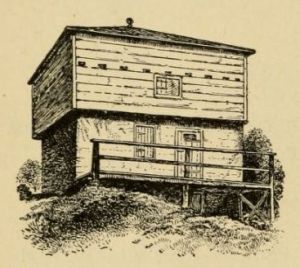
Blockhouse at Mackinaw,
1780.
259. The West.—The Westerners, who were thus deprived of the full use of their great waterway and whom Spanish agents endeavored to detach from the Union, were few in numbers. Kentucky and Tennessee were practically the only organized settlements; but a popular movement toward Ohio and the Northwest was beginning, and by the end of the century the Mississippi Territory had been formed in the region which Georgia claimed north of the Gulf. Most of the settlers in these outlying communities had moved westward from the frontier portions of the adjoining older states. Thus many of the immigrants to Tennessee came from North Carolina. Often they were of Scotch-Irish stock, deeply religious, hardy and frugal. They drove out the Indians, killed the wild beasts, cleared lands for their farms, and raised their large families in a rude independence. On the foundations they laid, great commonwealths have been erected which should not in their present wealth and power forget the bold adventurers who crossed the mountains in wagon trains or floated down the Ohio in large flat-bottomed boats.[103]
260. The Older Commonwealths.—Within the original colonies state lines were much confused. Vermont did not formally succeed in throwing off New York’s claim and becoming a state until 1791. Connecticut still claimed a strip of land along the northern border of the Northwest Territory. Maine continued to constitute a district of Massachusetts. The population of all the states was chiefly of English descent and was, on the whole, homogeneous, although the amount of intercourse between state and state was still small. Virginia was the most populous of the states, Massachusetts ranking next. Each was typical of the region to which it belonged, the presence of slavery more or less retarding the South, and the comparative absence of it favoring New England.
261. Occupations.—Although the country had grown considerably in population and wealth during the eighteenth century, the people had not greatly changed in character or in their pursuits. The confusion engendered by the Revolution was slowly passing away, but the revived industries ran along much the same narrow lines as of old. At Washington’s accession to the Presidency public and private finances were in a bad shape, but speedy improvement followed the reforms of Hamilton, shortly to be described (§ 266). Agriculture was still the main calling—the nation being, on the whole, one of farmers. Commerce, however, was a surer source of wealth, especially in the East, where there was a good deal of shipping. But manufacturing was in its infancy, as we at once perceive when we learn that even in 1800 not quite four per cent of the people lived in towns.
262. The Towns.—The country people had no such incentives to flock to cities as they have to-day. There were no railroads or steamboats to make the journey easy. On the contrary, roads were bad and travel by water was both uncomfortable and dangerous. Nor were the towns, of which Philadelphia with seventy thousand inhabitants, New York with sixty thousand, Baltimore with twenty-six thousand, Boston with twenty-four thousand, and Charleston with twenty thousand, were the chief, especially attractive. Sanitation was little attended to, save in Philadelphia after the terrible yellow fever epidemics of 1793 and 1797. There were few theaters. The newspapers were small and uninfluential sheets. Good colleges and schools and libraries were scarcely to be found. Life was comparatively simple and lacking in interest and brilliancy. Indeed the country gentleman, especially in the South, found his rural sports and his rounds of social visiting more enlivening than the life led by his town friends.

Stagecoach of the time of Washington.
263. Dominance of the Colonial Spirit.—In their mental attitude toward life the American people had changed about as little as in their occupations and customs. Although in Jonathan Edwards and Benjamin Franklin they had produced two great writers, in Franklin and Benjamin Thompson (Count Rumford, 1733–1814) eminent scientists, and in Benjamin West (1738–1820) and J. S. Copley (1737–1815) distinguished painters; although they had developed as great statesmen and political writers as any country could name, they still had no literature, or art, or science worthy of being called national. In other words, though the people of the United States had won their political independence, they were still, in their modes of thought and action, dominated by the spirit of colonial dependence. There were many persons who not merely imitated English manners and dress, read English books, and wrote in the current English style, but who even shared, in the main, English political ideas and prejudices. There were others who were fully as much influenced by French modes of thought and life. Here and there, in great men like Washington or Franklin, we find a sturdy originality that smacks of the soil, and undoubtedly the plainer people were little affected by foreign ideas and customs. But the towns still preserved their colonial attitude of dependence on Europe, and this was in the main true of the prosperous country families as well. In fact, the seaboard colonies were, in a way, outskirts of Europe, just as the Western communities were outskirts of the Atlantic seaboard. There was little of the enterprise and activity which throughout America to-day keep small communities from stagnating. In short, our forefathers of three generations ago were in many ways a very different race of beings from their descendants of to-day.
264. Virtue and Happiness of the People.—Yet it would be a great mistake to suppose that the drawbacks just enumerated were in the main apparent to the American people themselves, or that they are greatly to be insisted upon in a sketch of the civilization of the period. American life might at the close of the eighteenth century seem dull and narrow to travelers from Europe, but we know that a happy, brave, free, religious people inhabited a land that yielded abundant returns to their labors, and we may readily believe that their lives were fully as useful as ours are to-day. Nor should it ever be forgotten that amid these provincial surroundings arose the greatest figure that modern history can show, and that the American people were wise enough to choose electors who would make him President.
References.—J. Schouler, History of the United States, Vol. I., chaps. i.–iii.; J. B. McMaster, History of the American People, Vol. I., chap. i. See also References to the next chapter. The novels of Charles Brockden Brown (1771–1810), the first American who was a successful professional man of letters, may be profitably consulted in connection with this chapter, especially his Arthur Mervyn, and Ormond, which describe life in Philadelphia during the yellow fever epidemics.
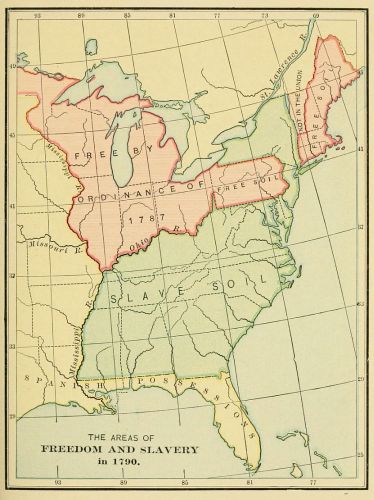
The Areas of Freedom and Slavery in 1790
265. Washington as a Statesman.—When Washington took the oath of office in New York City[104] on April 30, 1789, few people could have foreseen that the elderly, dignified man, dressed in the picturesque costume of the period, would one day rank among the greatest statesmen of the world. His experience had been rather with military than with civil affairs. He was reserved in temper, and liked forms and ceremonies to which the masses were opposed. He had few of the arts of persuasion. His mind was not trained like that of John Adams, for example, nor was it markedly original. But he had had the training of experience, and he had what is essential to statesmanship of the first order—a great character, sobriety, dignity, perfect rectitude of purpose, knowledge of men, and willingness to trust those whom he regarded as competent—in short, wisdom as opposed to mere knowledge made Washington the great statesman we now know him to have been. He held the reins of government firmly and made few or no mistakes. He saw that the new nation should show prudence and by its dignity win the respect of other nations; and in spite of criticism, and often of frantic opposition, he kept his administrations well in line with his ideals. He avoided foreign complications and appeased or put down domestic discontent. He balanced political parties and made their leaders serve the state. When he laid down his office he explained his principles in his “Farewell Address,” which has become one of the political classics of the world. And now, after the lapse of a century, the perspective of time enables us to comprehend, in part at least, the unique grandeur of his position among men.
266. Early Legislation.—The first Congress, which was organized shortly before Washington was inaugurated, contained some eminent men, chief among them perhaps being James Madison of Virginia, in the House of Representatives, and John Adams of Massachusetts, who, as Vice President, presided over the Senate. The members were residents of the districts they represented, and their salary was at first six dollars a day. The most important work they did, after determining the rules of procedure that should govern them, was to organize those portions of the administration and government that had been left vague by the Constitution. They established the three departments of State, Treasury, and War, whose Secretaries, along with the Attorney-General, formed the President’s Cabinet.[105] The Post-Office Department was also organized, but the Postmaster-General was not then included in the Cabinet. Congress furthermore organized the Federal judiciary along the lines of circuit and district courts that it follows at present, the Supreme Court having been authorized by the Constitution, but the number of its justices not having been settled. They also passed a tariff law giving mild protection to manufacturers, as well as a moderate system of internal duties on distilled spirits. They arranged for the payment of the foreign and domestic public debt of the United States, about fifty-four million dollars, mainly incurred to carry on the Revolution, and also, after much discussion, agreed to assume a large part, i.e. twenty-one million five hundred thousand dollars, of the debts of the individual states contracted for the same purpose. The latter measure was carried only by means of an agreement to fix the Federal capital at a point on the Potomac River (afterward Washington), in return for which concession Southern votes were secured.[106] Finally, Congress established a National Bank with a capital of ten million dollars and a charter running twenty years, and also laid before the states twelve amendments to the Constitution which, as we have seen (§ 254), had been suggested during the state debates on the adoption of that instrument.[107]
267. Hamilton and the Federalists.—The financial legislation mentioned in the last paragraph had been outlined in the main by Alexander Hamilton of New York, the first Secretary of the Treasury. This remarkable man had distinguished himself as a soldier and as a contributor to The Federalist in defense of the Constitution (§ 254), before Washington chose him as his chief counselor. As a financier and an administrator working under a chief, he has probably had no equal in America. In his theories of government, however, he favored a strong central administration more than a simple people suspicious of tyranny thought proper. Hence, while he easily dominated all the supporters of the new government, he failed to secure the confidence of the masses and probably would not have been given the Presidency, even if he had not fallen in a duel with Aaron Burr in 1804. He did, however, during his life direct the policy of the Federalists, as the party supporting the Union under the Constitution was called. Washington would have liked to govern without parties, but the unsettled question whether the new central government should be strong or weak necessitated a twofold division of voters. And in the end even Washington was forced more or less to take sides with Hamilton and the Federalists.
268. Jefferson and the Democratic-Republicans.—Hamilton’s rival in the Cabinet was Thomas Jefferson of Virginia, who gave up his post as minister to France to accept the Secretaryship of State. Jefferson had already acquired great fame as the writer of the Declaration of Independence and other state papers. He had been governor of Virginia, and was a good legislator and administrative officer, although plainly Hamilton’s inferior in the latter respect. But he was especially strong in his thorough comprehension of the desires of the people and in his ability to criticise political institutions and measures. He believed in democracy and wished government to be simple in every respect. Being suspicious by nature, he thought that Hamilton and the Federalists were aiming to establish a strong republic that might develop into a monarchy. In order to oppose them, he drew together all the dissatisfied elements in the country, as well as all the advocates of a simple, popular government, into a party soon known as the Democratic-Republicans. Under one name or another, the two parties formed under Hamilton and Jefferson have existed to our own day. The two Secretaries naturally opposed each other in the Cabinet,[108] and Washington had a hard task in forcing them to work together. Finally Jefferson, who had indiscreetly used the newspapers against the administration, desired to resign and return to his home at Monticello,[109] and Washington let him go. After this, as we have just seen, the President allowed Hamilton more and more power, and the administration became practically a Federalist one, although its head was still superior to mere party considerations.
269. Washington’s First Term.—At the appointed time, before the expiration of his first term, Washington was elected unanimously for a second. During his first term, in which North Carolina and Rhode Island were reconciled to the Union, and Vermont and Kentucky added to it, only two events of great importance took place. These were St. Clair’s defeat and the outbreak of the French Revolution. This latter event was destined to complicate domestic politics in America after Washington had begun his second administration.
270. St. Clair’s Defeat.—The Northwestern Indians had been giving trouble since 1786, and in 1791 had destroyed the settlement of Big Bottom, in Ohio. In order to check them, it was determined to construct a line of forts from Cincinnati to Lake Michigan. General Arthur St. Clair, governor of the Northwest Territory, was beginning the work when he was entrapped in ambush, and suffered a crushing defeat (1791). He resigned, and Washington, who was moved to indignation and grief by the catastrophe, appointed “Mad Anthony” Wayne, another Revolutionary veteran, as his successor (§ 198). Wayne, a thorough soldier, proceeded cautiously, and two years later (1793) broke the power of the tribes in a battle near Vincennes. The treaty of Greenville (1795) relieved eastern Ohio from Indian menaces.
271. Genet’s Indiscretions.—Early in 1793 war was declared between France and England, and the Democratic-Republican party wished to involve America in the struggle, directly or indirectly, in the interests of her former ally. We had a treaty binding us to defend French colonies, like those in the West Indies, but this treaty had been concluded with the French monarchy, not with the Republic that had overthrown Louis XVI. After some discussion in the Cabinet, Washington issued a proclamation of strict neutrality, which naturally disappointed the French revolutionists greatly. Their minister to America, Edmond Charles Genet, landed in Charleston and began to fit out privateers and enlist men in plain defiance of the President’s proclamation. He counted on the sympathy of the people with France, and was, indeed, received with enthusiasm by many visionary citizens. But Washington stopped his privateers, and treated all his demands with such firmness that he soon lost ground. He had the insolence to make a public appeal against the administration. This foolhardy act could lead to but one result—his recall, at the request of the United States. Genet, however, though recalled, chose not to run the risk of returning to France, where the guillotine was in full operation.

John Jay.
272. Jay’s Treaty.—One of the chief events of Washington’s second administration was the ratification of the treaty with Great Britain, which bears the name of the statesman who negotiated it—John Jay,[110] then Chief Justice of the Supreme Court. There were various restrictions placed by England upon America’s trade, and the ships of the latter were being captured during the war then in progress between Great Britain and France. Native-born Americans were frequently taken from the decks of their country’s merchant vessels and pressed into the British naval service, on the pretense that they were really British born. As the two nations spoke the same language, it was often difficult to prove that this impressment was illegal. There were other troubles, connected with the failure of the British to abandon frontier posts, with boundary disputes, and with unpaid claims; hence there was much popular feeling against Great Britain. Jay, after great trouble, negotiated in the autumn of 1794 a treaty which removed some grievances, such as the unlawful occupation by the British of military posts upon American soil, but did not much improve the condition of trade, nor abate the impressment nuisance. Washington, although he was disappointed, thought that even such a treaty for twelve years would be better than a war with England. He called an extra session of the Senate in June, 1795, and after a hot debate, the treaty, slightly altered, was confirmed. There was great popular displeasure about the matter, and Jay and Washington were bitterly reviled, but in the end it was seen that they had acted wisely.
273. The Whisky Rebellion.—Another event of importance was an insurrection in western Pennsylvania in the summer and autumn of 1794, commonly known as “The Whisky Rebellion.” The moderate excise tax on whisky had outraged the rough frontiersmen of the district, since they made the liquor easily and could purchase goods in exchange for it.[111] They threatened the tax collectors in mobs, and finally blood was shed, in July, 1794. Great excitement followed, and the government mail was robbed. Then the President called out the militia from Pennsylvania and neighboring states, and fifteen thousand men were marched over the region, encountering no opposition, and making only a few arrests. Two rough fellows were convicted of treason, but Washington pardoned them, and the insurrection was at an end.
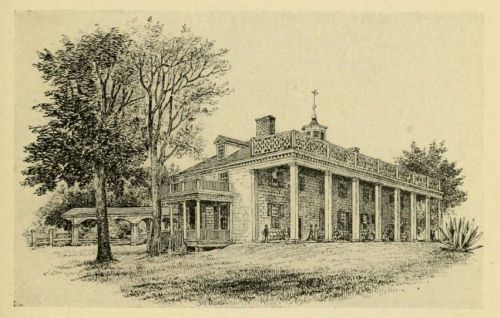
Mount Vernon.
274. Washington Refuses a Third Term.—In 1796, in his famous “Farewell Address,” Washington declined reëlection for a third term, thus setting a precedent which has been followed ever since. He served his country from the spring of 1789 to that of 1797. During his second term his political assailants were especially venomous.[112] As criticism hurt him sorely, he was glad to lay down his office, and retire to Mount Vernon, particularly as it seemed that the new government was now stable enough to be able to exist without him.
References.—General Works which should be consulted in connection with Chapters XIII.–XVII.: W. Macdonald, Select Documents of United States History, 1776–1861; J. Schouler, History of the United States (6 vols.); J. B. McMaster, A History of the People of the United States (to 1830, 5 vols.); J. Winsor, The Narrative and Critical History of America (8 vols.); H. von Holst, The Constitutional History of the United States (8 vols.); G. Tucker, The History of the United States (4 vols.); Bryant and Gay, A Popular History of the United States (4 vols.); R. Hildreth, The History of the United States (1492–1821, 6 vols.); A. B. Hart, Formation of the Union, chaps. vii.–xi.; F. A. Walker, Making of the Union (“American History Series”); J. W. Burgess, The Middle Period, chap. i. (“American History Series”).
Special Works in Connection with Chapter XII.: H. C. Lodge, George Washington, Vol. II., Alexander Hamilton; J. T. Morse, Thomas Jefferson; S. H. Gay, James Madison (these are in the “American Statesmen” series). See also other biographies of these four statesmen and their collected writings, as well as the Messages of the Presidents.
|
New York City was the temporary capital until 1790, when Philadelphia took its place. In 1800 the government was moved to Washington, which at the time contained few houses. |
|
General Henry Knox of Massachusetts was the first Secretary of War and was also intrusted with the charge of naval affairs. The Navy Department was not established until 1798. Edmund Randolph of Virginia was the first Attorney-General. The two most important secretaryships were those of State and of Treasury respectively (§§ 267, 268). The Cabinet officers did not obtain the privilege of appearing before Congress in order to explain and defend the measures advocated by them. Thus an important variation from British parliamentary government was introduced. Another variation has come about through the fact that the Speaker of the House, who was at first an impartial moderator, has become for three quarters of a century the most influential of party leaders through his privilege of appointing all committees. |
|
The internal revenue tax on spirits still produces lawlessness among the mountaineers of the Southern states. |
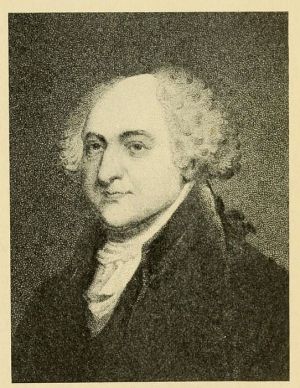
John Adams.
275. The Election of John Adams.—Washington’s refusal of a third term and retirement to Mount Vernon, brought John Adams[113] to the front as the natural choice of the Federalists for President. Hamilton, as we have seen (§ 267), was out of the question, and the services of Massachusetts’ great son during the Revolution ranked next to those of Washington now that Franklin was dead. The Democratic-Republicans naturally favored Jefferson; but there was no such elaborate campaign between the rivals as there is in our day. As the electoral system then stood, the person receiving the highest number of votes in the Electoral College became President, the person receiving the next highest number, Vice President. Hamilton tried by an intrigue to get Thomas Pinckney, of South Carolina, who was the Federalist candidate for Vice President, elected President over Adams. His scheme failed, however, for Pennsylvania and the South voted for Jefferson, who thus secured 69 votes to Adams’s 71. Jefferson, therefore, became Vice President. Congress divided, the Senate continuing Federalist, but both parties being so nearly even in the House that a few moderate Democratic-Republicans held the balance of power.
276. The X. Y. Z. Affair.—Adams took over Washington’s Cabinet, from which Hamilton had retired in 1795. In so doing he made a mistake, since the Secretaries regarded Hamilton as the leader of their party, and indulged in intrigues against their lawful chief. The new President also tried to carry out Washington’s general policy, and found himself hampered, especially with regard to France. The French had not liked the treaty the United States had concluded with their enemies, the British, through the diplomacy of Jay, and they had been imprudently dealt with by the American minister, James Monroe. Monroe’s successor, Charles Cotesworth Pinckney[114] of South Carolina, was not well treated in France, and at once informed Adams that the French Directory would not receive another Minister from the United States until their grievances were redressed. Adams immediately called a special session of Congress, but was wise enough to send over John Marshall of Virginia and Elbridge Gerry of Massachusetts to act with Pinckney as commissioners. Nearly a year later news was received that an attempt had been made to make the commissioners, who had not been officially received, offer money for securing a settlement of the trouble. In other words, American envoys had been told that they must commit the crime of bribery if they wished to serve their country effectively. The names of the persons making these insulting demands were veiled under the letters X. Y. Z.—hence the matter is known as the X. Y. Z. Affair. Adams and the people at large resented this treatment of the commissioners, and a war with France was imminent. Indeed in July, 1798, American vessels of war were authorized to attack French men-of-war, and a French frigate was actually taken in February, 1799. Washington was made commander in chief of the land forces with Hamilton as second in command, but neither had occasion to serve actively.
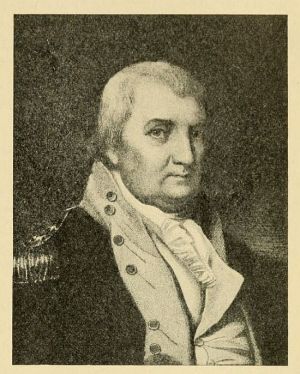
Charles Cotesworth Pinckney.
277. The Alien and Sedition Laws.—Meanwhile Adams and the Federalists, who had the sympathy of the country in the impending war, speedily lost it by passing the famous “Alien and Sedition Laws.” The editors of the Republican press, being in many cases foreign-born, had been friendly to France since the days of the French Revolution and of Genet’s mission, and had attacked Adams and his party violently. The Federalists, believing that the liberties of the country would be destroyed if this license were not checked, not only passed a rigid naturalization law, but also one providing for the removal from the country of dangerous aliens designated by the President.
278. Features of the Sedition Law.—To this act against foreigners, which was tyrannical in theory although not in practice, an even worse law was added relative to sedition. It was designed to punish persons who conspired in order to resist the government’s measures or to intimidate officeholders. It was also aimed at persons guilty of libeling the government, Congress, or the President. Practically this was to gag the press in the interest of the Federalist party. The first conspicuously effective use of the law was made against an obnoxious Republican editor named Callender. But the journalists took shelter behind public opinion, and the Federalists soon found to their sorrow that they had gone too far in their attack on popular liberties.
279. The Virginia and Kentucky Resolutions.—Jefferson led the resistance to the unpopular law, and as he could hope to do nothing with Congress until a new election, he turned to the state legislatures. In those of Virginia and Kentucky, in the fall of 1798, resolutions were adopted, since known as the Virginia and Kentucky Resolutions. These declared that, as the Constitution was a compact between the states, the latter have individually the right to pass judgment upon the enactments of the general government, which derives its power to make laws from the Constitution. In pursuance of this assumed right the legislatures representing the two states pronounced the Alien and Sedition Acts unconstitutional and void and called on other states to do likewise. In 1799 the Kentucky legislature passed a second series, which declared that all acts of the general government unauthorized by the Constitution ought to be nullified by the states. The immediate object and effect of these resolutions was to render the Alien and Sedition Laws unpopular and suspected. The chief effect, however, was seen later to lie in the support given by the names of Madison and Jefferson, authors respectively of the Virginia and Kentucky series, to the theory of the “compact” origin of the government and to the subsequent Carolina doctrine of nullification.
280. Dissensions in the Cabinet.—While the Federalists were defeating themselves by the laws they passed, Adams was dividing them by his policy. In order to conclude a new treaty with France, he nominated a minister to that country without consulting his Cabinet. This not only alienated his Secretaries still more, but also irritated those Federalists who had wished to fight France. Relations became so strained in the Cabinet that Timothy Pickering, a friend of Hamilton’s, had to be replaced, as Secretary of State, by John Marshall. But Adams secured his treaty (1800) through a commission of three, instead of through the Minister he had at first nominated.
281. The Presidential Election of 1800.—As a new election was approaching, Hamilton again tried to oust Adams as leader of the Federalists, but failed. Adams, with C. C. Pinckney for a colleague, received the votes of the Federalist electors but was defeated by Jefferson by eight votes (seventy-three to sixty-five). Unfortunately, however, Aaron Burr, the New York Democratic-Republican, who was supported for Vice President, got the same number of votes as Jefferson, which threw the election into the House of Representatives, where the Federalists had a majority. There was great confusion, and for a time it looked as if Burr, who was thought to be unprincipled, would be chosen. It was even believed by some persons that the Federalists would be able to keep themselves in power on the plea that old officials must hold over until new ones were legally elected. But Hamilton at last supported Jefferson, as the lesser of two evils, and through the votes of moderate Federalist congressmen, like James A. Bayard of Delaware, the Virginia statesman was elected. This solution of the problem was most fortunate, as Jefferson was plainly the choice of the people, and as civil war might have followed a successful plot to deprive him of the Presidency. As a result of the complication, the Twelfth Amendment was adopted in 1804, making it incumbent upon electors to vote specifically for a President and a Vice President. Just before retiring from office, in March, 1801, Adams made a number of appointments to office, known as the “midnight appointments.” These, as we shall see, caused Jefferson much vexation. It was not altogether fair for Adams thus to hamper his successor, nor should the Federalist President have shown his vexation at the result of the election by driving out of Washington early in the morning of March 4 in order not to be obliged to attend Jefferson’s inauguration. Adams and the Federalists generally believed, however, that Jefferson and the Republicans would begin a reign of anarchy, and some allowance must be made for what was, nevertheless, an act of great discourtesy. It is pleasant to add that the strained relations between the two statesmen were entirely mended before their deaths.
References.—General Works: same as for Chapter XIII.
Special Works: same as for Chapter XIII., with the addition of: J. T. Morse, John Adams (“American Statesmen”); C. F. Adams, John Adams. See also the collected writings of John Adams; and E. D. Warfield, Virginia and Kentucky Resolutions.
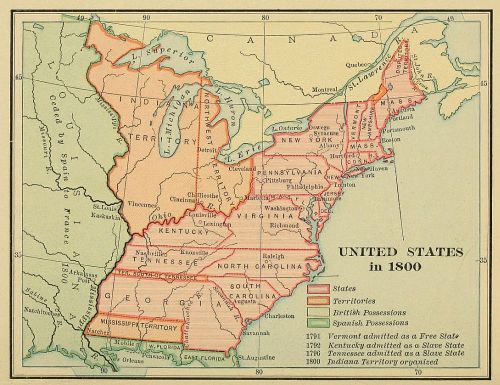
United States in 1800
282. Jefferson’s Character and General Policy.—With the advent of the popular Jefferson as President, the aristocratic Federalists, especially those of New England, thought, as we have just seen, that anarchy would ensue. Jefferson was supposed to be an opponent of all social distinctions, of strong organized government, and even of religious institutions. As a matter of fact, he was a widely cultured country gentleman who had liberal political theories, a sympathy with the masses of the people, especially the agriculturists, and a profound belief in human capacity for progress. He was too suspicious, and he often lacked dignity; he had no great executive ability and preferred rather to manage than to command, but he understood the American people as perhaps no other man has done. Furthermore, he gave in his writings the most subtle and widely current exposition of general republican ideas that has ever been given. He corresponded with leading men throughout the country and by his letters molded public opinion. His accession to power, so far from overthrowing the government, gave it a popular support it could have received in no other way; and the successive elections of his pupils, Madison and Monroe, kept the South and West fairly in the Union until the central government became strong enough under Jackson to crush incipient efforts to divide the nation. None of these three Virginian Presidents was a commanding man, but all were influential, and their policies made for harmony. Hence the period of their administrations had an importance not at first perceived. They helped to hold the agricultural slave-holding South in line with the manufacturing and commercial North and East. They made mistakes, were embarrassed by foreign complications and domestic difficulties, and had to persuade instead of rule. But they represented both the Union and the section that was most masterful and restive of control, and thus their administrations formed a necessary stage in the nation’s evolution.
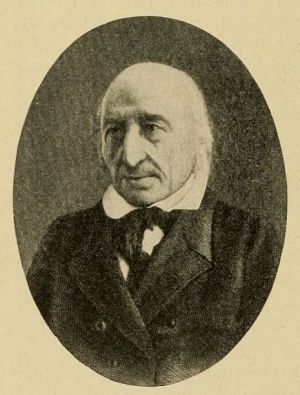
Albert Gallatin.
283. The Revolution of 1801.—Another point to be remembered about these Presidents is the fact that they were all representative of the educated upper classes, and yet were in full sympathy with the common people, who had just obtained political control of the country. If they had been demagogues or as ignorant of the principles of government as many of their supporters, they might indeed have precipitated the reign of anarchy the Federalists feared. On the contrary, they governed as well as their aristocratic opponents could have done, and so the Federalist party, which had succeeded so well in establishing the government, but had unwisely ignored the wishes of the people, sank into insignificance, without any serious detriment to the nation. The Revolution of 1801, as the Democratic-Republican victory has been called, was a beneficent one, chiefly because it took place under the direction and control of trained statesmen.
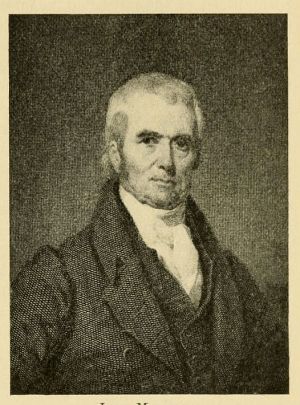
John Marshall.
284. Leading Public Men.—Jefferson made a good beginning by delivering a conciliatory inaugural address[115] and by not making a wholesale removal of Federalist officeholders. Where commissions had not been delivered to Adams’s late appointees, he withheld them, and he removed obnoxious partisans, but on the whole his attitude toward the civil service was fairly conservative. His Cabinet appointments were good, and throughout his two terms he had the cordial support of his subordinates. Madison, who was much under his influence, was a prudent and able statesman, and made a dignified Secretary of State. Albert Gallatin[116] of Pennsylvania, as Secretary of the Treasury, proved himself second only to Hamilton as a financier. Gallatin was by birth a Swiss, and is a striking example of what a foreign-born citizen of integrity and talents can accomplish in free America. The leading man in the House of Representatives was the Virginian, John Randolph of Roanoke, one of the most brilliant and interesting figures in our history. He was too independent and one-sided, however, to work long in harmony with the administration, and became in course of time the most bitter and effective of its opponents. Another Virginian, in the judiciary department, was a formidable opponent of Jefferson. This was John Marshall,[117] whom Adams, shortly before he left office, had made Chief Justice of the Supreme Court. Marshall was a Federalist, and in favor of giving the general government broader powers than Jefferson and his party thought either right or expedient. The President and the great jurist came often into conflict, as, for example, in the Burr trial (§ 290); but on the whole the advantage rested with Marshall, since he remained in office until his death, in 1835, and since his decisions steadily helped to build up the power of the government.
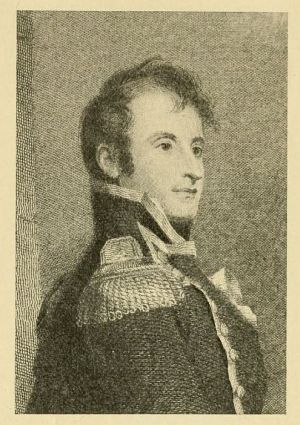
Stephen Decatur.
285. Financial Affairs and War with the Barbary States.—One of the first matters that occupied the new administration was the reduction of taxes and the decrease of the public debt, which had grown rapidly in consequence of the preparations for war with France. The army was greatly reduced,[118] and much less was spent on the navy—a branch of the service which had grown under Adams, but with which Jefferson, as an agriculturist, had little sympathy. He endeavored to economize in other ways, especially by doing away with internal taxes and with the unnecessary judges added by the Federalists, but he naturally found that the demands of a growing country had to be met. Still, the next ten years were distinctly a period of retrenchment, in spite of the cost of Louisiana and of the small war waged against the piratical Barbary States (1801–1806). These “pests of Christendom” had become too impudent in their demands for tribute in return for promised immunity of American shipping in the Mediterranean, and they had to be brought to their senses by the bombardment of Tripoli. The war furnished training to our sailors, and gave Lieutenant Stephen Decatur[119] great fame for his exploit in burning one of our frigates, so that she could be of no use to the enemy.[120]
286. The Louisiana Purchase.—This purchase was the most important feature of either of Jefferson’s administrations. The colony of Louisiana, which comprised a vast stretch of territory west of the Mississippi, had, as we have seen, been ceded by France to Spain in 1763 (§ 115). In 1800 Spain ceded it back to France. As the latter country was far more powerful and dangerous than the former, and as the ambitious Napoleon then ruled France, great alarm was felt in America at the prospect of having a rival nation grow up across the Mississippi. Affairs were made still more serious by the denial of the right of depositing their goods at the port of New Orleans to the inhabitants of our Western country. These citizens were thus unable to transfer their merchandise from river boats to ocean vessels, and were cut off from profitable markets. Even the pacific Jefferson took the alarm,[121] and James Monroe of Virginia was dispatched to France to try to buy a strip of territory including New Orleans. Because of the impending war between Great Britain and France, and the consequent necessity of defending Louisiana, and for other reasons, Napoleon just before Monroe’s arrival made the regular American Minister, R. R. Livingston, an offer to sell the whole Louisiana region. His offer was accepted, and the price was set at fifteen million dollars, less certain claims against the French.
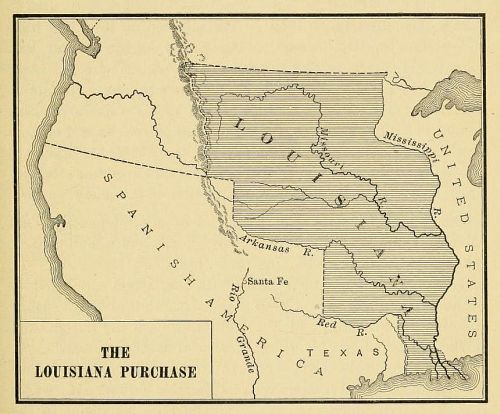
The Louisiana Purchase
287. Controversy over the Purchase.—Jefferson declared, consistently with his own principles, that no power to acquire territory was allowed the general government by the Constitution, and that therefore an amendment must be made to that document in order that the purchase might be valid. But an amendment would take time, and unless the bargain were closed at once the new territory might be lost forever, especially as Spain was indignant on account of Napoleon’s action. So the treaty was ratified, and a strict constructionist President furnished a weighty precedent to his political opponents. The latter, however, did not perceive the value of Louisiana to the Union, and would have been better pleased had Jefferson clung to his principles. Yet it is clear that he was right, and the Federalists wrong. The contiguity of the territory made it necessary that it should belong to the United States, and it was better to buy it than to fight for it at some future day. It is true that the boundaries of the region were unsettled, and were sure to cause trouble, and that a spread of slavery was also involved. But the people were wise when they indorsed Jefferson’s action by reëlecting him in 1804 by an overwhelming majority. Jefferson himself was wise in not speculating whether or not the states formed west of the Mississippi would adhere to the Union,—the Federalists feared they would not,—and in having the new region explored by Lewis and Clark and Lieutenant Pike. So great was the opposition of New England to this acquisition of territory by the nation, that some Federalist leaders actually thought that they might persuade the Eastern states to detach themselves from the Union. Their schemes were abortive, but were destined soon to bear bitter fruit (§§ 313-315).
288. The Election of 1804.—The election of 1804 was held under the Twelfth Amendment (§ 281). Burr, who had endeavored to secure the Presidency through Federalist help, and who was besides, as we have seen, a suspicious character, was not available for reëlection to the Vice Presidency. Jefferson was therefore given George Clinton, of New York, as a colleague. The two Federalist candidates, C. C. Pinckney and Rufus King of New York, received but fourteen electoral votes, so complete was the demoralization of the party.
289. Burr’s Conspiracy.—Burr ran as an independent candidate for the governorship of New York, but was defeated, again chiefly through the instrumentality of Hamilton. In consequence, he picked a quarrel with the latter, which led to a duel. Hamilton was killed at the first shot, and the death of so brilliant a man in such a manner aroused the indignation of the entire country.[122] Burr became almost an outcast. As he was an ambitious schemer, he undertook in 1806 to induce a secession of the Western states from the Union. He seems also to have dreamed of playing the part of Napoleon in the New World, and of establishing an empire in Texas or Mexico. He gained the support of a well-to-do Irish gentleman named Blennerhassett, who helped to gather arms and men in Ohio and Kentucky, and as a consequence ruined himself and family. Burr also tampered with other leading citizens of the West, particularly with General Wilkinson, the American commander at New Orleans, who reported his schemes to Jefferson. After some delay, the President made use of local militia, and Burr’s expedition was reduced to a fiasco, only about one hundred men descending the Mississippi with him. He finally abandoned these, and after some wandering in the almost uninhabited territory that lay to the south of Tennessee, he was captured and sent to Richmond, Virginia, for trial (1807).
290. Burr’s Trial.—Jefferson showed great interest in the case, and almost seemed pitted against Chief Justice Marshall. The latter ordered the President to appear as a witness, but the Executive very properly refused to do anything beyond sending papers. Marshall declared that an overt act of treason must be proved, but as Burr had not yet levied war against the United States or adhered to their enemies,—actions constituting treason according to the Constitution,—and as his mustering of men had not taken place in Virginia, there was little or nothing for the prosecuting attorneys to proceed on, and the case came to an abrupt close. Marshall’s decision has probably done good in making trials for treason practically unknown in the United States. But he can hardly be acquitted of having allowed his feelings against Jefferson to get the better of him. On the other hand, Jefferson had, in his easy-going way, allowed Burr to go too far before interfering with his plans. Burr himself went to England, then returned to New York, and soon passed from public notice.
291. The Impeachment of Justice Chase.—Two years previous to the miscarriage of justice in Burr’s case, another trial of a different nature had failed almost as signally. This was the trial, before the Senate, of Justice Samuel Chase of the Supreme Court. Chase was a violent Federalist, who had been impeached by the Democratic-Republican House of Representatives for partisan conduct on the bench. He was ably defended, while John Randolph, who led the prosecution, completely mismanaged his case. The result was a failure to convict (1805).
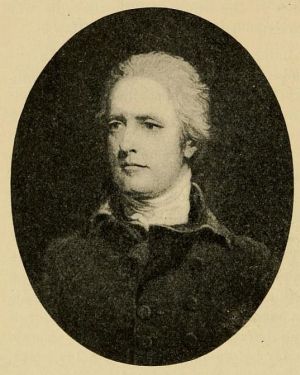
William Pitt the Younger.
292. Troubles with Great Britain and France.—More serious matters now confronted Jefferson. Since the signing of Jay’s Treaty, American shipping had flourished, owing to the fact that being a neutral nation, the United States could convey to France and Spain the produce of their West Indian colonies, the ships of the two European countries not being serviceable on account of the war with Great Britain, whose fleets swept the ocean. By 1805, however, the jealousy of British shipowners had been aroused and the Prime Minister, William Pitt the Younger, applied to American vessels what was known as the “Rule of 1756.” This prevented a neutral from enjoying, in time of war, trading privileges not allowed in time of peace. British men-of-war, therefore, began to seize American ships, and the old impressment abuses were increased. Meanwhile, Jay’s Treaty expired, and a new treaty, signed by Monroe and William Pinkney, a brilliant Maryland lawyer and orator, was not honorable to us and was not even laid before the Senate. One provision of it ran, that Great Britain would not be bound by it unless the United States undertook to resist Napoleon’s Berlin Decree of November 21, 1806. This was a paper blockade of the British Isles, in retaliation for the British blockade of the Continent. In other words, Napoleon, who by that time had humbled most of the sovereigns of Europe, had declared Continental ports closed to British ships, although he had no effective means of keeping them out. Great Britain wished to force America to take sides against France. An Order in Council of November, 1807, actually authorized the seizure of any neutral vessel on a voyage to closed ports, unless it had previously touched at a British port. To this order Napoleon replied by the Milan Decree (December, 1807), authorizing the capture of any vessel that had entered a British port. Thus American neutral trade was practically an impossibility, and an important portion of our population was seriously affected.

Fulton’s Steamboat, the
“Clermont.”
293. The Embargo.—Under these harassing circumstances, Jefferson was forced to adopt a more energetic foreign policy than at all suited his pacific disposition. Diplomatic efforts were wasted on headstrong opponents, who despised a weak, young nation. So the Non-intercourse Act, forbidding the importation of goods from Great Britain or her colonies, was passed in the spring of 1806, but did not go into effect for nearly two years; by 1808 it had been determined that mere non-importation was not a sufficiently drastic remedy, and that an embargo, forbidding all American vessels to leave for foreign ports, was necessary. In the interim, relations with Great Britain had been strained to the point of breaking, through the fact that on June 27, 1807, the British ship Leopard, acting under the orders of an admiral at Halifax, fired on the American frigate Chesapeake, and took from the latter four sailors, three of whom were American citizens.[123] Jefferson at once ordered British warships out of American waters and tried to bring the impressment controversy to an issue, but the British merely disavowed the action of their admiral. This conduct, together with the Order in Council of November, 1807, precipitated the Embargo.
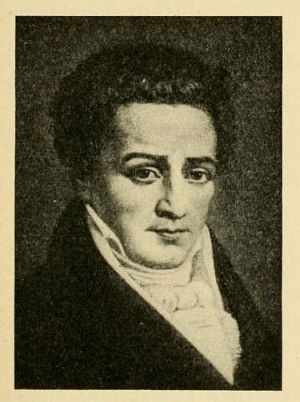
Robert Fulton.
294. Nature and Object of the Embargo.—The Embargo was partly intended to save the lives and property of the Americans—who were, nevertheless, willing to risk both on account of the great profits accruing from trade with Europe—by preventing ships from leaving port and running the risk of being captured by British men-of-war, or of being confiscated in Continental ports. Jefferson, however, had another object in view. He believed that both England and Europe would suffer so much from the loss of the American trade that the combatants would be forced to abandon their repressive measures against the ships of neutrals. He miscalculated the stubbornness and malignity of both parties, and both Non-intercourse and Embargo, instead of proving coercive, proved irritating and mischievous. Nevertheless, there was precedent in favor of the experiment, and from the point of view of general human welfare Jefferson was justified in trying it. From the point of view of politics, the experiment was disastrous, but the fact that he induced Congress to adopt it is a conclusive proof of Jefferson’s capacity to control men.
295. Difficulty of Enforcing the Embargo.—It proved very difficult, however, to enforce such legislation, for the Federalists made capital out of it, while Jefferson’s Southern supporters upheld it against their wills. New England ships rotted at their wharves, and in Virginia the staple tobacco remained unsold. Jefferson was overwhelmed with petitions to change his policy, but held out persistently. The British government also held to its former course and Napoleon to his. Before Jefferson’s second term had expired, it was quite clear that new measures must be tried in order to assert the nation’s dignity abroad and to secure civil peace at home. The pupil Madison, who became President in 1809, had to undo in part, at least, the work of the master.
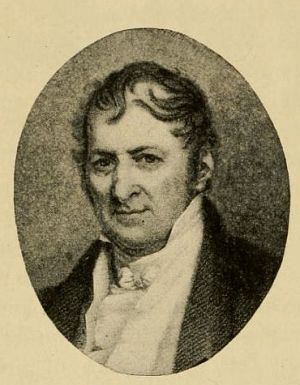
Eli Whitney.
296. General View of Jefferson’s Administrations.—Viewed as a whole, Jefferson’s two administrations do not prove him to have been a great executive. He was a political philosopher rather than a practical statesman. He was more at home with ideas than with facts. But by his purchase of Louisiana he saved the country far more than his ineffective diplomacy and his Embargo cost it, and he proved conclusively that democracy was not contradictory to the idea of union. He proved also that the responsibilities of office are likely always to prevent a theorist from going to extremes; for, although the father of the strict constructionists of the Constitution, he left them the difficult task of explaining at least one very loose construction of his own. Perhaps at another period his weakness might not have been apparent. He was intellectually far in advance of his countrymen, and was thus an object of suspicion to many worthy citizens of a land which had then done little for the cause of letters or of science. On the other hand, he only slowly and partly outgrew the prejudices of the agricultural class to which he belonged. It was not until late in life that he showed sympathy with the manufacturing and commercial enterprise which was destined in a few years to make the country of Robert Fulton[124] and Eli Whitney[125] one of the wealthiest and most prosperous nations in the world.
297. Jefferson an Idealist.—Americans have been right in recognizing in Jefferson their main political spokesman. No other man has ever so thoroughly brought the people to his way of thinking, or so completely held his own with politicians of all degrees of ability and ambition. Congress followed his lead almost blindly, even in military matters, about which he knew little. His popularity speedily recovered from the decline it experienced during the days of the Embargo, and for nearly twenty years his home at Monticello was almost like a pilgrim’s shrine. His fame has suffered at the hands of some historians, but it is not unlikely that posterity will conclude that he was in advance not merely of his age, but of his century.
References.—General Works: same as for Chapter XIII., with the addition of: Henry Adams, History of the United States (1800–1817, 9 vols.).
Special Works: J. Schouler, Thomas Jefferson (“Makers of America”); H. S. Randall, Thomas Jefferson (3 vols.); J. Parton, Thomas Jefferson, Aaron Burr; Henry Adams, Albert Gallatin, John Randolph (“American Statesmen”); A. B. Magruder, John Marshall (“American Statesmen”). See also T. Roosevelt, Winning of the West, Vol. IV.; and the writings of Jefferson, Madison, and Gallatin. E. E. Hale’s Philip Nolan’s Friends deals with Burr’s Conspiracy, and G. W. Cable’s Grandissimes with New Orleans shortly after the American occupation.
|
Born in Maryland, 1779; died, 1820. Began service in the navy, 1798; distinguished himself against Tripoli in 1804; commanded the Atlantic squadron in 1812, and captured the British ship Macedonian; humbled the Barbary States in 1815; was navy commissioner from 1816 to 1820, when he was killed in a duel with Commodore Barron, who had been found by court-martial guilty of negligence in commanding the Chesapeake against the Leopard (§ 293). |
|
The Chesapeake was taken by surprise, and Commodore Barron had no time to make an effective resistance. |
298. Madison’s Perplexities.—Just before Madison’s accession to the Presidency the Embargo was supplanted by a non-intercourse law which permitted trade with nations not controlled by France or Great Britain. This legitimate trade and the large amount of fraudulent shipping that went on brought temporary wealth to American shipowners, and there even seemed to be a prospect of a treaty with Great Britain. People began to say that Madison was a better President than his predecessor, who continued to advise him. As a matter of fact, he was a weaker man, had a poorer Cabinet, and was soon involved in greater difficulties than those encountered by Jefferson. For British statesmanship was at that time at a very low ebb; the concessions agreed to by Erskine, the British envoy, were disavowed at home, and a new envoy actually ventured to insult Madison by accusing him of deception in negotiations relating to the prospective treaty. Yet party politics were at a still lower ebb in this country, as is shown by the fact that the Federalists showered social attentions on James Jackson, the envoy who had so grossly insulted the President. Nevertheless Congress, tired of legislation that seemed to produce no effect either on England or on France, did away with non-intercourse, with the proviso that if one of the two contending powers annulled its vexatious decrees and the other did not, non-intercourse should be maintained with the nation still holding out (“Macon’s Bill,” No. 2, May 1, 1810). Napoleon took advantage of this proviso, although really showing America very little favor. He showed enough, however, to make Great Britain appear most in the wrong, and on November 1, 1810, Madison issued a proclamation declaring trade suspended with that power. This was a sorry commentary on the proclamation of the preceding April renewing trade with Great Britain; for the sole result of the diplomacy of the year had been to let loose more American ships to be captured by the British or confiscated by the French.
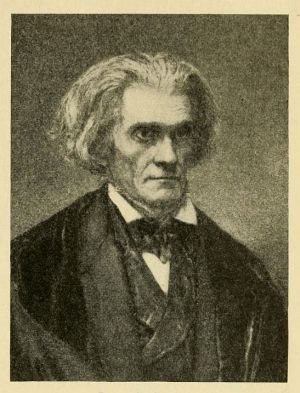
John C. Calhoun.
299. War Advocated.—Madison, who was prudent like Jefferson, and who was more of a student of politics than a vigorous man of affairs, did not desire war with either Great Britain or France any more than Jefferson had done, but he was forced into hostilities with the former power before the close of his first administration. The temper of the American people had been sorely tried by the Embargo and the non-intercourse policy as well as by British arrogance throughout the whole controversy. British statesmen spoke ill of Americans when they should have tried to enlist their sympathies in the war Great Britain was waging against despotism personified in Napoleon. The British were also thought to have stirred up the Western Indians, who were crushed on Tippecanoe River by General William Henry Harrison in 1811. The Western people were thus greatly embittered against Great Britain, and Henry Clay of Kentucky represented their feelings when, as Speaker of the new House of Representatives, he helped to force Madison into consenting to war. With Clay were joined many young, high-spirited men, some of whom, like John C. Calhoun[126] of South Carolina, while adhering to the Jefferson-Madison school of politics, were inclined to be impatient with their more cautious elders. It is said that they threatened Madison with loss of a second term if he would not agree to war with Great Britain.[127] Their policy eventually proved beneficial to the country, since it strengthened the national spirit and showed that the new generation contained men too strong to be bound by the traditions of the Revolutionary period; but it was tardy and lacking in cosmopolitan breadth of view.
300. Outlook for the War of 1812.—Not only was the War of 1812 a political blunder in so far as it helped Napoleon by harassing Great Britain, but also owing to the condition of America at the time of its inception. The national finances were by no means adequate to its cost, and the incompetence of Gallatin’s successor in the Treasury Department made the borrowing that had to be undertaken especially burdensome. The army, too, was small and poorly officered at the first. The volunteers were brave and in the West were very anxious to serve, but they and their leaders absurdly overrated the ease with which Canada could be conquered. Henry Clay actually boasted that his Kentucky constituents could accomplish this exploit without assistance. Besides, the political discontent of New England, where the Federalists were English sympathizers, and where much capital was invested in shipping which would be cooped up during the war, made it difficult to secure militia from the very portion of the country nearest the chief seat of operations. Volunteers were indeed obtained from New England, and after a while both officers and men made a better showing in the field. But when all is said, the land operations of the war, except in the splendid instance of the battle of New Orleans, afford little cause for patriotic gratification. A prediction to this effect might have been made about the navy, for the less than two score American vessels seemed but a bagatelle in comparison with the British navy, which contained about fifty times as many.[128] But in the end the exploits of our seamen formed almost the sole bright spot in an exceedingly gloomy period.
301. Opening of the War.—War was formally declared on June 18, 1812, the majority in neither house being overwhelming. Two days previously the obnoxious Orders in Council had been revoked. Although the news was received on this side of the ocean before hostilities had fairly begun, the government adhered to its tardy determination to fight. This course seemed justifiable since the impressment trouble and the blockade of the coasts still called for redress, and the temper of at least a part of the nation had been inflamed.
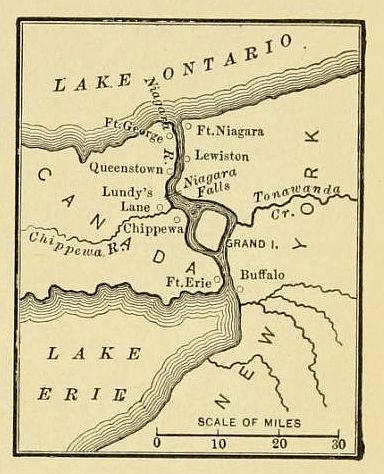
Operations in Canada,
1812–1814.
302. Hull’s Surrender.—It was easy to perceive from the outset that the theater of the war on land would be much the same as in the French and Indian War—that is, it would stretch along our northern boundary from Maine to Lake Michigan. The main attacks by the Americans would be made through Lakes Ontario and Champlain. At first, bodies of troops were moved over the border from Detroit and Buffalo. General William Hull, the governor of Michigan Territory, who led the first advance with over two thousand troops, mainly volunteers from Ohio, was ignominiously repulsed by the Canadians and surrendered Detroit in a cowardly manner (August 16, 1812), for which he was afterward court-martialed and found guilty. Hull had issued a very boastful proclamation on his entry into Canada, and his surrender of an important fortress without firing a gun was almost unpardonable, in view of such high-flown pretensions. Altogether, the Canadians under Isaac Brock, the able governor of Upper Canada, with their allies, the Indians under Tecumseh, a famous warrior and the inveterate foe of the Americans, had outmaneuvered their opponents, and proved conclusively that the volunteers, rapidly gathering in Ohio and Kentucky, would have to be well led in order to secure any success. To get such leaders was not easy, but Madison finally selected the right man in General William Henry Harrison, the victor at Tippecanoe (§ 299). It was late in the year, however, and the country was a very difficult one to penetrate. The impatient public had therefore to wait quietly for the success that was to retrieve the early losses, among which may be mentioned the capture of Fort Dearborn, on the site of the present city of Chicago.
303. Other Defeats.—Meanwhile General Van Rensselaer, of the New York militia, had gathered about six thousand eager men, and on October 13 was forced, by the general impatience for a victory, prematurely to cross the Niagara River from Lewiston to Queenstown. Hull’s surrender had left Brock free to manage the Canadian defense. The American regulars fought well, but the militia crossed only in part, and the result was another surrender. Yet the enemy also suffered heavily, for the brave Brock fell defending the heights of Queenstown, where his tall monument may now be seen. Van Rensselaer, for his part, resigned, and was succeeded by the still less capable General Alexander Smyth, who imitated Hull in bragging and in ineffectiveness, but who dismissed his volunteers to their homes instead of surrendering them. Equally futile were the attempts to reach Canada by way of Lake Champlain; and the year would have ended in complete gloom, so far as land operations were concerned, had not the Americans, in their turn, repulsed an invading force at Ogdensburg. In the latter fight Jacob Brown, a Quaker farmer of New York, showed that he was the coming general for the war in the northeast, if that war were to be carried on seriously and not with manifestoes and ill-directed sallies of raw troops. Another soldier of merit was also discovered in the person of Lieutenant Colonel Winfield Scott, a young Virginian who fought finely at Queenstown Heights.
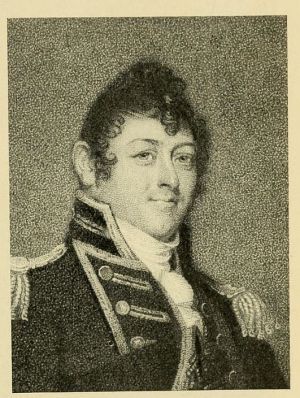
Captain Isaac Hull.
304. The War at Sea.—On the sea, events took a different turn from the first, although the government’s main intention was to use its few ships[129] in guarding the chief ports. On August 19, 1812, Captain Isaac Hull[130] of the frigate Constitution[131] (44 guns), which had previously been chased into Boston by a British squadron, met in the Gulf of St. Lawrence the enemy’s Guerrière (38 guns), which had made an unsavory reputation for itself by searching American vessels. The American ship was somewhat the stronger, but no one could have foreseen that she would overcome her adversary within half an hour. About two months later (October 18), in a very similar contest, the American sloop of war Wasp (18 guns), under Captain Jacob Jones, took the British brig Frolic (20 guns). In consequence of these unexpected victories Great Britain’s naval prestige was greatly shaken and American pride correspondingly stimulated. Analysis has shown that the results were mainly due to the better gunnery of the Americans. Equally fortunate for the younger nation were the fights between the frigate United States (44 guns), under Captain Decatur (§ 285, note 1), and the British frigate Macedonian (38 guns); and between the Constitution, then under Captain Bainbridge, and the British Java. The former contest took place near the Madeiras, on October 25; the latter, off the coast of Brazil, on December 29, 1812. Congress immediately authorized the building of new ships, and while the British were able to sweep American commerce from the seas, the people consoled themselves with the thought of the superb victories of their ships and of the damage American privateers were doing English shipping on every ocean and sea—even within Dublin Bay itself. At last, however, reverses came, when, in 1813, the Chesapeake[132] was captured by the British Shannon, and when our ships were blockaded in our chief harbors. But the privateers continued their exploits until they raised British rates of insurance on trading vessels to a very high percentage.
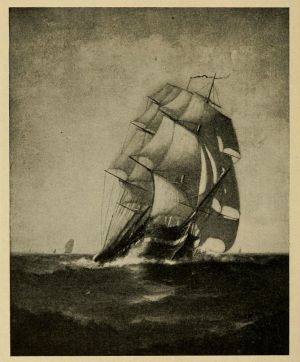
The “Constitution.”
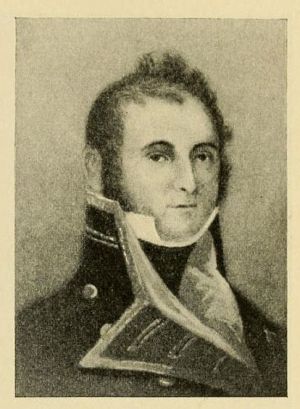
Captain James Lawrence.
305. Victories of Perry and Harrison.—Meanwhile the war was not popular in Great Britain or in New England. The South and West still favored it, however, and Congress helped Madison by allowing him to use twenty new regiments of regulars in place of volunteers. A new Secretary of War, General Armstrong, late minister to France, took the place of Eustis, who was unfitted to cope with the difficulties of the position. But the year was to witness few signal successes beyond an important victory on Lake Erie that led to the retaking of Detroit. Captain Oliver H. Perry[133] had a flotilla constructed at Presque Isle (now Erie), and on September 10 met and defeated the British flotilla under Captain Barclay. The British had more guns, but the Americans, after Perry had been obliged to abandon his flagship, gained a complete victory through their courage and skill. Perry, who was coöperating with Harrison, wrote the latter on the back of an old letter, “We have met the enemy and they are ours.” Harrison’s army, helped by the American ships, then passed to Detroit and afterward landed in Canada, where, at the battle of the Thames River, the British, under Colonel Proctor and their Indian allies, were completely routed (October 5). Tecumseh fell in this fight, and a portion of Upper Canada passed under American control, Michigan having been, of course, regained.[134]
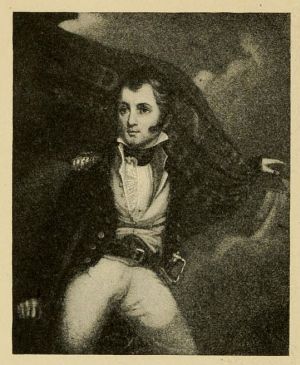
Captain Oliver H. Perry.
306. American Failures.—A great invasion of Canada and the seizure of Montreal had been planned for 1813, but it was partly abandoned, General Dearborn seizing only a few places, including York (now Toronto), which was unnecessarily burned. Brown, Scott, and others showed that American soldiers could be brave, but the campaign was on the whole a failure. General Wilkinson then succeeded Dearborn, but, like the latter, was too old for the work, and was besides at loggerheads with Secretary Armstrong and with his second in command, General Wade Hampton of South Carolina. An attack on Montreal or else on Kingston was planned, but Armstrong mixed matters up by assuming the command. Hampton failed to coöperate with Wilkinson, who had had a hard time descending the St. Lawrence, and the latter general was obliged to put his troops into winter quarters with nothing accomplished. Meanwhile the force on the weakened Niagara frontier had recrossed the river after burning the town of Newark. The British retaliated in kind and with their Indian allies did much damage on the American side of the river.
307. Jackson and the Indians.—While these events had been taking place in the North, the Southwest had not been quiet. British and Spanish emissaries were stirring up the Southern Indians to attack the Americans. The Creeks had also been excited by Tecumseh, who used a comet and an earthquake to work upon their superstitious fears. The savages massacred the white settlers at Fort Mims, Alabama, on August 30, 1813, slaying or roasting to death four hundred persons. Retaliation came swiftly. The Tennesseean volunteers under General Andrew Jackson invaded the Creek country, and with the help of troops from Mississippi completely defeated the Indians at the battle of the Horseshoe, or Tohopeka (March 27, 1814).
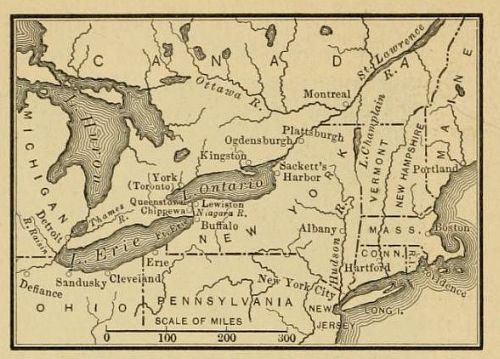
Operations in the East, 1814
308. Outlook for 1814.—The year 1814 opened gloomily in spite of Harrison’s and Perry’s victories. There was still much improvement needed in the methods of raising troops, the War Department was badly managed, and the finances were in a wretched condition. Worst of all, good leaders were lacking. Besides, the British navy was beginning to ravage the Atlantic coast, and Napoleon’s power being on the wane, the strength of the United Kingdom could be more fully employed against America. Russia, however, had proffered her good services as a mediator, and Gallatin and James A. Bayard were sent to St. Petersburg to join John Quincy Adams, minister at that court, in securing this powerful influence. The British government discouraged the Czar’s offers, but as it had great European interests to settle, it was not so much inclined to fight to a finish with the United States as it might otherwise have been.
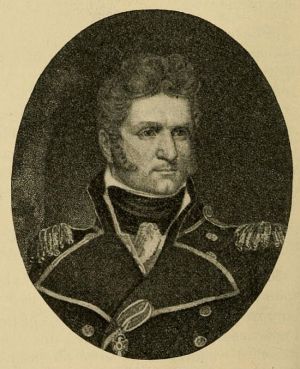
Commodore Thomas Macdonough.
309. The Canadian Campaign of 1814.—Several incompetent generals having been got out of the way for one cause or another, the command on the Canadian frontier fell to the capable Brown. A mistake was made with regard to the scene of operations, but when the fighting began near Niagara Falls, Brown gave a good account of himself. At Chippewa and Lundy’s Lane (July 5 and 25), leaders like Winfield Scott distinguished themselves, and the American troops showed themselves the equals of British regulars, and won honor, if no substantial military gains. Commodore Thomas Macdonough[135] also repeated Perry’s exploit of destroying a British flotilla—this time off Plattsburg on Lake Champlain (September 11). The result of all this fighting was little,—each side practically holding its ground,—but the Americans gained prestige.
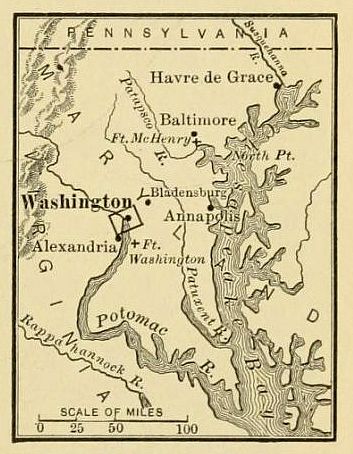
Operations around Washington
in 1814
310. Capture of Washington.—Meanwhile British ships ravaged the Atlantic coast, and by midsummer a large fleet under Admirals Cockburn and Cochrane was collected in Chesapeake Bay. On board was General Ross with several thousand troops. Washington, Virginia, and Maryland were evidently in danger and great efforts were made to meet the invaders—unfortunately to little purpose, on account of the incapacity of Secretary Armstrong. The British landed and began their march to Washington, easily putting the undisciplined American militia to flight at Bladensburg, Maryland (August 24). Our troops evacuated Washington, and the British entered. They retaliated for the burning of York by setting fire to the White House, the unfinished Capitol, and other buildings. It was an act of vandalism that cannot be defended; but fortunately the next city attacked repulsed the invaders courageously. This was Baltimore, before which the British troops were driven back, General Ross being slain, and from which the British fleet retired after a vain bombardment of Fort McHenry (September 12 and 13). The song of “The Star Spangled Banner,” by Francis S. Key, commemorates this American victory.
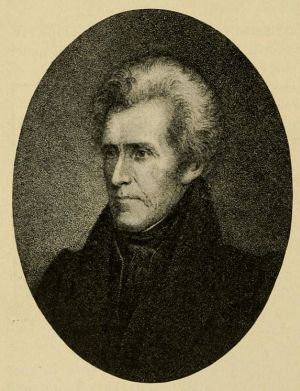
Andrew Jackson.
311. The Battle of New Orleans.—It soon became apparent that the attacks on Washington and Baltimore had been of secondary importance, and that the real object of the British fleet was to capture New Orleans, and snatch the newly acquired Louisiana from the United States. James Monroe, who had succeeded Armstrong as Secretary of War, at once called upon the ablest soldier in the Southwest, Andrew Jackson.[136] The latter gathered his forces, and although he first tried an expedition into Florida against the British and Indians, he set to work at the defenses of New Orleans in good season. The large British fleet effected a landing safely, and by December 23 the troops were only a few miles from the city. The main battle occurred on January 8, 1815, and the backwoodsmen behind their works destroyed the flower of the British army who had the hardihood to make a front attack. Sir Edward Pakenham, the British commander, was killed, after having been for days outgeneralled by Jackson; and at least two thousand veterans, many of whom had followed Wellington in the Spanish Peninsula, lay dead or wounded on the field. The American loss, on the other hand, was almost incredibly slight—about twenty men all told.
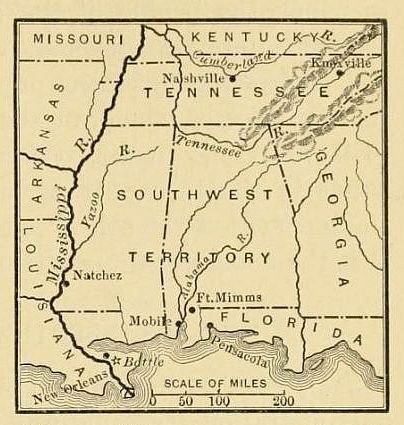
Southwestern Operations,
1813–1815
312. The Treaty of Ghent.—If those had been the days of the telegraph, the battle of New Orleans would not have been fought, and the American people would have had no great land victory to salve the pride that had been touched to the quick by the capture of Washington, Hull’s surrender, and other disgraceful events of the war. On December 24, 1814, American and British commissioners had signed a treaty of peace at Ghent. Adams, Gallatin, and Bayard, who were already abroad, had been joined by Henry Clay and Jonathan Russell; and the five had defended American interests very well. Gallatin was the most influential member and succeeded in curbing the zeal of Clay and Adams, who wished to press matters like the British right to navigate the Mississippi and the fisheries question, in which the people of the West and of New England took a great interest. Curiously enough, the treaty did not touch the impressment abuse, or the right of searching vessels, for the sake of which, in the main, the war had been waged. Still, after her naval victories, America was not likely to suffer in the future from such abuses. Each side restored the territory of the other that it occupied, and both felt relieved that the anomalous war was over.
313. Political Events.—Political events in Madison’s second administration were naturally overshadowed by the war or else connected with it. As we have seen, the finances were badly managed, nor were the affairs of the War Department on a better footing. Congress was scarcely more efficient, especially when its Speaker, Henry Clay, was absent with the commissioners at Ghent. But the disaffection of the New England Federalists was the most serious element in the political problem. With the waning of their party and the assured success of the Democratic-Republicans, they naturally grew more rancorous. They coquetted with the British before and during the war, and they had little or no sympathy with the idea that the United States was a nation. In the debate in 1811 on the admission of Louisiana as a state, one of their leaders, Josiah Quincy of Massachusetts, actually declared that the passage of the bill would be a virtual dissolution of the Union, and that it would be the duty of some of the states, “to prepare for a separation amicably” if they could, “violently if they must.”
314. Reasons for New England’s Attitude.—This attitude seems at first wholly indefensible, but we must remember both at this juncture and in dealing later with the secession of the South, that the idea of national unison was one of very slow growth, and that threats of secession or of violent resistance to the Union had been heard already from Southern, Western, and Middle states. States were still jealous of their prestige, and the language of the Constitution lent itself to interpretations that reduced the power of the nation to a minimum. Besides, New England had suffered greatly from the enforced idleness of its shipping during the Embargo and from the captures made by the British. Consequently, just as men are always inclined to do, they held the national government responsible for matters that often lay beyond its control. Their pro-British sympathies, although certainly carried beyond the bounds of decency, may be partly extenuated for these reasons. When they went farther, and refused to put the state militia at the service of the Union, they took a dangerous step, but one not entirely indefensible on strict constructionist grounds. It was a sure precursor, however, of more determined and less defensible opposition.
315. The Hartford Convention.—Success in state elections gave the political solidarity that was needed, and the increasing pressure of hostilities in the year 1814 gave the needed stimulus, for effective opposition to the war on the part of New England. After speeches and resolutions as strenuous as those that nerved Virginia and Kentucky to their resistance of the Alien and Sedition laws, passed half a generation before by the Federalists themselves, a call was issued by Massachusetts for a convention of the New England States. This met at Hartford, Connecticut, on December 15, 1814. After a few weeks of secret debate its members issued a remarkable report. This document asserted the doctrine of states’ rights in its most naked form, suggested amendments to the Constitution of the United States looking to the protection of the interests of minorities, and demanded for the states the right to claim the customs duties collected within their own borders. This last provision would have been of itself enough to destroy the power of the Union, but fortunately there was no need even to discuss it. The commissioners sent to Washington to propose it to Congress found that peace had been declared and that their chief ground of grievance had been removed. They had, therefore, nothing to do but to hasten home in chagrin. The Federalist party did not survive their last attack upon the general government, and for several years after 1815 there was practically only one party in the country. This fact is not surprising when we remember that accession to power had rendered the leading Republicans as desirous of maintaining a fairly strong government as the moderate Federalists were.
316. Some Results of the War.—With the decline of Federalism came a natural increase of national democratic spirit and a lessening of the dependence on either Great Britain or France, which, as we have before seen, had characterized the generation that grew up just after the Revolution. This was a clear gain from the war. On the other hand, the interests of the sections began more sharply to diverge. The North, during the trouble with England, had taken to manufacturing, and now began to demand a really protective tariff for its “infant industries.” This policy, though encouraged by the West for the sake of certain products like hemp, was soon seen to bear hard on the South. Previous legislation on the subject (§ 266) had paved the way for an effective tariff, and the influx of British goods brought into the country after the close of the war showed that the newly developed industries, especially that of cotton manufacture, which had increased greatly since 1810, would find it hard to subsist without support. So the tariff act of 1816 was passed, in spite of the opposition of Daniel Webster, who represented New England shipping interests, and of John Randolph, who represented the agricultural South and the stricter forms of Republicanism. The rate (about twenty-five per cent), placed on imported cotton and woolen goods, was found practically prohibitive by Southern planters, who needed coarse clothes for their slaves. Thus the Southerners began to be alienated from the Democratic-Republican party, although not a few of them helped to pass the act of 1816. Among these was John C. Calhoun, whose leanings toward a strong government were still pronounced.
317. The National Bank and Internal Improvements.—The year 1816 also saw the passage of another financial measure destined to cause division later. This was the reëstablishment of a national bank, Hamilton’s bank (§ 266) having failed to secure a second charter in 1811. The financial burdens of the war had fallen in consequence upon the state banks, which had not been managed well. Hence the new bank scheme was favored even by cautious Republicans like Madison. Its establishment for twenty years, with a largely increased capital, enabled the country practically to resume a specie basis in less than a year.[137] A fund of a million and a half dollars was paid by it to the government for the privileges granted by the charter, and the problem how to employ this sum to the best advantage brought forward still another question involving conflicting interests.
318. The Question of Internal Improvements.—At first the individual states had attended to their internal needs and had spent considerable sums, especially in improving their water-ways, but a great scheme for a system of national canals had, before the war, attracted leading Republicans. Now Calhoun proposed to use for a similar purpose the money turned in by the bank. His bill passed Congress, but Madison vetoed it, on the ground that although such improvements were desirable, a specific amendment to the Constitution was needed if the general government was to undertake them.
319. The Succession of Monroe.—This veto of Madison’s, which led the people of New York, in default of national aid, to construct their own Erie Canal, through which New York City was enabled soon to outstrip its rivals,[138] was one of his last official acts and showed that he was still faithful to the political creed of Jefferson. He was shortly after (March 4, 1817) succeeded by his Secretary of State, James Monroe, who had proved his claim to the succession by developing the nationalistic ideas that had made Jefferson and Madison safe leaders in a very critical period. Monroe had also rendered very efficient service as temporary Secretary of War, and had endeared himself to the people of every section.
References.—General Works: same as for Chapter XIII.
Special Works: same in the main as for Chapter XV., with the addition of: Henry Adams, History of the United States (1800–1817, 9 vols.); D. C. Gilman, James Monroe (“American Statesmen”); W. G. Sumner, Andrew Jackson (“American Statesmen”); C. Schurz, Henry Clay (2 vols. “American Statesmen”); B. J. Lossing, Field Book of the War of 1812; C. J. Ingersoll, Historical Sketch of the Second War; T. Roosevelt, Naval War of 1812; J. Fenimore Cooper, History of the Navy of the United States, chaps. xiii.–xlix.; E. S. Maclay, History of the United States Navy, Vol. I., 305-577; H. C. Adams, Public Debts, Part II., chap. i.; H. C. Lodge, George Cabot, chaps. x.–xiii.
|
As in the later years of the Revolutionary War, it was fortunate that British ships were so fully occupied on the other side of the Atlantic. |
|
There were so few that there were not enough to go the round of the captains. So the officers took turns in commanding, in order that each might get a chance to distinguish himself. |
|
In the time of the Revolutionary War and for some years later, New York City was not larger than Boston or Newport. |
320. Monroe’s Counselors.—Monroe[139] was fortunate not only in having to preside over a united people, but in being able to secure good advisers. For Secretary of State he chose John Quincy Adams, son of the former President and a diplomatist of tried ability, who had done good work for the country as Minister to Russia and commissioner at Ghent (§ 312). The fact that the son of the great Federalist leader should be serving in the Cabinet of a Republican President was a signal proof of the utter demoralization of the old Federalist party. In the Treasury, Monroe placed William H. Crawford of Georgia, an able though rather intriguing man whose subsequent defeat for the Presidency and withdrawal from national life caused regret to many people. Crawford was more of a politician than a statesman, and his success showed that public leaders were undergoing a change of type. The Cabinet was made preponderatingly Southern by the appointment of Calhoun as Secretary of War and of William Wirt as Attorney-General. Its strength, however, was not decreased, for both made excellent officials, although Wirt was more an advocate and literary man than a statesman.
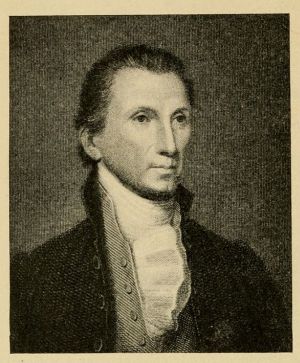
James Monroe.
321. The Era of Good Feeling.—Monroe’s name is chiefly connected to-day with matters of foreign policy, and his administrations have been termed “The Era of Good Feeling,” because domestic affairs wore on the whole so quiet an aspect. Yet, as we shall soon see, the debates on the subject of slavery connected with the admission of Missouri as a state showed that the country was in reality far from united; and the tariff legislation of 1824 brought out the fact still more clearly in a few years. Harmony was also far from the minds of the politicians, however united politically the people might appear to be. Intrigues for the succession to the Presidency occupied the leading statesmen, and in the combinations formed by them a careful observer might have perceived the beginnings of a division into two parties not radically dissimilar to the Federalists and Democratic-Republicans of the preceding generation.
322. The Character of Monroe as President.—Monroe has generally been regarded as the weakest of the early Presidents, although his popularity was widespread. This view is plausible, but hardly just. He certainly behaved with great dignity toward the intriguing politicians who were aiming to succeed him; he showed discretion in adopting from his advisers the foreign policy that bears his name; and he preserved a strict impartiality and adherence to the cause of the Union in the sectional disputes that disturbed his administrations. He was not a commanding man, yet he deserves to be remembered as a statesman who outgrew early rashness, and he was fully entitled to the confidence given him by the masses. For his second term (1821–1825), indeed, he had no opposition. But a solitary vote was cast against him, in order, as the story goes, that Washington should be the only President unanimously chosen.
323. The Oregon Region.—Two boundary disputes with Great Britain and Spain early occupied the attention of Monroe and his advisers. The first was mainly concerned with the so-called Oregon region beyond the Rockies, drained by the Columbia River, which the United States claimed through the discovery of this great stream by Captain Robert Gray in 1792, and through explorations made by Lewis and Clark (§ 287), whom Jefferson had sent out soon after the purchase of Louisiana (1805). In this region the British Hudson Bay Company had, however, established trading posts, and Monroe found that the best thing he could do was to agree upon the forty-ninth parallel as a northern boundary as far as the Rockies and upon joint occupancy for ten years of the disputed territory beyond.
324. The Acquisition of Florida.—Diplomacy with Spain was more definitely successful. Ever since the purchase of Louisiana the United States had claimed that it was entitled to the strip of land along the Gulf known as West Florida; but Spain had refused to admit this, or to sell the territory, in spite of persistent offers to purchase made by Jefferson. In 1810 Madison took possession of the region by proclamation, although it now seems certain that the nation had better claims on Texas. His action, and the invasion of Florida by General Andrew Jackson while he was in pursuit of Indians convinced Spain, however, that she would do well to sell while she could the outlying peninsula of East Florida. Accordingly, on February 22, 1819, Adams negotiated a treaty by which the Floridas were ceded,[140] and the western boundary of Louisiana was settled along the Sabine, Red, and Arkansas rivers to the forty-second parallel, and then along that to the Pacific. This treaty strengthened American claims to the Oregon region, and also helped to settle various Indian and slave troubles connected with East Florida, which had served as a place of refuge for runaway negroes and other bad characters. So much disturbance had indeed been caused by these marauders and by the Seminole Indians, that in 1818 General Andrew Jackson had had to invade Florida, and had actually taken two towns and done other rather high-handed acts which nearly led to his being court-martialed.[141] Spain for two years delayed ratifying the treaty, but finally yielded to the inevitable.
325. The Occasion of the Monroe Doctrine.—A few years later relations with Spain again became important. Revolutionary principles had spread in the Spanish colonies to the south, and by 1822 Spain had lost all her provinces on the mainland. But the so-called “Holy Alliance,” formed by the principal sovereigns of continental Europe after the fall of Napoleon, had for its chief object the repression of revolutionary doctrines and outbreaks, and it seemed not unlikely that a concerted effort might be made by Europe, not to restore her colonies to Spain, but to distribute them among the great powers. This was naturally not to the liking of a people who had themselves revolted, nor was Great Britain anxious to allow the Alliance to gain too much headway. Besides, Russia was endeavoring to establish a colony on the North Pacific, and she and other powers might easily find pretexts to seize upon territory nearer to the United States—perhaps upon California. Hence, while overtures for a joint protest, made by the British statesman, George Canning, to our Minister to England, Richard Rush, were declined, the administration soon found it necessary to take a stand in the matter.
326. The Monroe Doctrine.—Accordingly, Monroe sent in a message to Congress in December, 1823, in which he outlined the policy since known as the “Monroe Doctrine.” This doctrine was none the less important from the fact that it was addressed to Congress instead of to the European powers. Its gist was contained in two assertions: first, that the American continents were not henceforth to be considered as subjects for future colonization by any European power; second, that efforts to coerce the newly established governments would be regarded as proofs of “an unfriendly disposition toward the United States.” These firm utterances, for which Monroe was indebted chiefly to John Quincy Adams, but also to the policy of Washington and other statesmen and to the advice of Jefferson, put an end to all fear of European aggression and rendered Russia reasonable with regard to Alaska. The policy thus outlined has since been effectively maintained, and it may now be regarded as beyond the reach of party action. In fact, it has been extended so as to include more of a guardianship over other American powers than was contemplated by Monroe. It is plain from John Quincy Adams’s attitude in the matter of the Panama Congress (§ 337), that the original “Doctrine” contemplated that each power should guard by its own means against European aggressions.
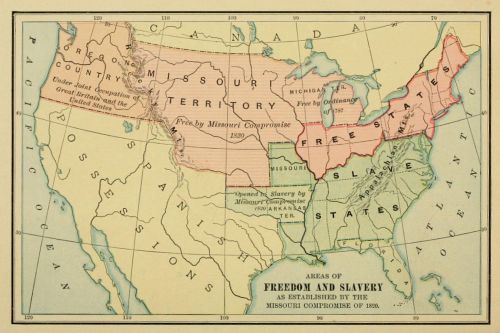
Areas of Freedom and Slavery
as established by the Missouri Compromise of 1820
327. The Slavery Question.—Turning now to domestic matters, we find that during Monroe’s two terms, Chief Justice Marshall delivered many of his most celebrated opinions restraining the powers of the states in favor of the general government. But there was one subject which not even a Marshall could have handled effectively—this was slavery. Slavery had occupied the attention of the first Congress, which had been petitioned by anti-slavery societies to abate the evils of the system. In 1793 an act for restoring slaves who had fled from one state to another was passed. The slave trade had been prohibited in 1808, as soon as the Constitution allowed, and a great effort had been made by the American Colonization Society in 1816, to begin the work of exporting the negroes to Africa; but the invention of the cotton gin, in 1793, had rendered slavery too profitable to the far Southern states to make it probable that they would peaceably consent to the abolishment of the institution. On the other hand, the number of people who thought slavery morally wrong had increased in the North and Northwest, and the way in which new slaveholding and non-slaveholding states had been admitted into the Union by pairs, so as not to disturb the balance of power in the Senate, showed that many Southerners were alive to the dangers of the situation. Yet, after all, so great was the general desire for internal harmony that most persons were startled when the debates concerning the admission of Missouri revealed the fact that the existence of slavery was a menace to the Union.
328. The Missouri Controversy.—The inevitable struggle between slavery and freedom was precipitated by the endeavor to bring in Arkansas as a territory and Missouri as a state. Both were to be carved out of that part of the Louisiana Cession in which slavery had already gained a footing. Northern members of Congress objected to the spread of the institution into the vast territory still to be occupied, while Southern members felt that any limitation of slavery was an infringement on their property rights. If a man could carry his other chattels when he removed to the new region, why, they asked, could he not carry those human chattels known as slaves. Finally Arkansas was organized without mention of slavery, but a stand was made on Missouri. James Tallmadge, a New York representative, offered an amendment to the act admitting Missouri, to the effect that further introduction of slaves into the proposed state should be prohibited, and that the children of slaves born after the state’s admission to the Union should be considered free at the age of twenty-five. The Senate refusing to concur, the matter went over.
329. The First Missouri Compromise.—The close of the year 1819 saw a renewal of the contest in the new Congress, which assembled after the matter had been much discussed in state legislatures and throughout the country. Alabama was admitted to balance Illinois; then bills passed the House admitting Maine[142] and Missouri, but with the anti-slavery proviso made applicable to the latter. The Senate would admit Maine only if Missouri were admitted as a slave state. The House refused to yield, but finally a compromise was effected. A line was drawn across the Louisiana Territory at 36° 30′, i.e. along the northern boundary of Arkansas, and it was agreed that north of this line slavery should not exist save in Missouri. This famous arrangement, which went into effect in March, 1820, became known as the “Missouri Compromise” and was effective until new territory was added to the Union as a result of the Mexican War.
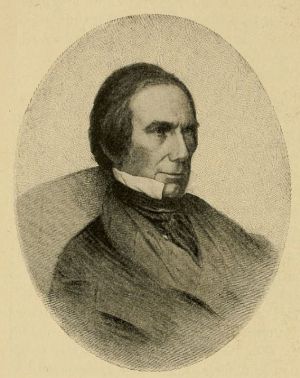
Henry Clay (1832).
330. The Second Missouri Compromise.—Missouri was not, indeed, admitted until 1821, on account of a provision in its Constitution against allowing free colored men to enter its borders. This obstacle was overcome by the address and dexterity of Henry Clay[143] who, as a Virginian by birth and a Kentuckian by residence, was in every way admirably suited to act as mediator between the two sections. He did not like slavery, and had been president of the Colonization Society; but he understood how thoroughly in earnest the Southern men were to defend the institution. He used all the tact and personal charm for which he was conspicuous among his contemporaries, and succeeded in making the people of Missouri agree not to deprive citizens of other states of their rights.
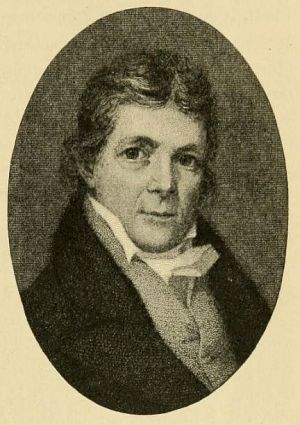
John Randolph.
331. General View of the Compromises.—The Second Compromise was distinctly ambiguous and meant little; the First was a sacrifice of principle which, however, was regarded as necessary at the time. Both sides were in earnest, and the extreme adherents of each stood out to the end for their respective principles. On the whole, the responsibility for the settlement rested largely on the moderate Southerners and on their Northern and Western sympathizers, who were very influential in some states,—for example, in Illinois. Few men saw with John Randolph[144] that the day of settlement was only postponed. Whether it would have been best to fight the question out then and there, will always be a mooted point. Compromise on matters of principle is incapable of satisfying men’s consciences for long; but it is equally true that principles cannot be uncompromisingly maintained with success at all times and seasons. Fighting unyieldingly for them at the wrong time may postpone their final triumph indefinitely. Hence it was, perhaps, best that the forces of freedom were given time to grow strong and that the Union was not hazarded at so early a juncture.
332. Political Factions and the Tariff of 1824.—The fight over Missouri was not the only indication that the Era of Good Feeling was to be of short duration. Politics throughout the country were becoming personal in character and therefore more or less petty. The influence of the Revolutionary statesmen was waning, in spite of the prestige of survivors like John Adams and Jefferson. The right to vote no longer depended in the main upon the possession of property, as had been the case when the Union was formed, but was being extended to all male citizens of the age of twenty-one. This extension of the franchise was largely due to the example set by the new Western states, which were naturally far more democratic than the older commonwealths. As a result, political tricksters were fast controlling the vote of the masses. Offices were being given for political services, and congressional caucuses and state cliques were dictating nominations. The nominating convention, with its opportunities for “wire-pulling” and its aptitude for selecting compromise candidates, was also coming into vogue in state politics, and political clubs, like the “Tammany Society” of New York, were beginning their sinister work. Under these circumstances it is no wonder that, as the tariff of 1816 was not sufficient for their purposes, the manufacturers of the Middle states and New England should have endeavored to obtain legislation of a more decidedly protective character. Aided by the West, which believed with Clay in creating “a home market” and thus adhering to a truly “American policy,” they succeeded, in 1824, against the wishes of the South, in passing a tariff act with higher duties, especially on wool, woolens, cotton goods, iron, and hemp. They had nearly succeeded in 1820 in carrying their point. Now, on the eve of an election, the politicians who were supporting the various Presidential candidates were afraid to risk votes by opposing such strong financial interests, and three sections[145] were in any case stronger than one. But the passage of such an act under such circumstances was sure to give trouble, for although in theory designed for the good of the nation, protection really involved financial loss to one section, the South, which, as a whole, did not yet realize the fact, but was beginning to do so.
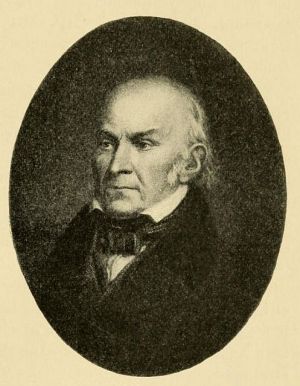
John Quincy Adams.
333. The Presidential Election of 1824.—Meanwhile, the choice of Monroe’s successor seemed more important than the tariff. Each of the candidates was a Democratic-Republican, a fact which perhaps made their struggle all the fiercer. John Quincy Adams,[146] as Secretary of State, had precedents in his favor,—Jefferson, Madison, and Monroe having served in that capacity,—and he had also the support of New England; but his lack of magnetism counted greatly against him. Calhoun, who was still strong in the North on account of his nationalistic views, which, however, he was fast abandoning, soon contented himself with receiving assurance of the Vice Presidency. Crawford, whose health was very poor at the time, was nominated by the regular party caucus of congressmen; but as caucus nominations had grown in disfavor, this fact hurt his chances. Clay had the support of the West, and was popular elsewhere. Andrew Jackson, then a senator, was popular on account of his military record, represented the democratic masses more nearly than any other candidate, and had astute political managers. At the election of 1824, Jackson led with ninety-nine electoral votes; Adams had eighty-four; Crawford, forty-one; and Clay, thirty-seven. The election thus went to the House of Representatives, which had to choose from the three highest names.
334. Choice of John Quincy Adams.—In February, 1825, the House, voting by states, chose Adams, for whom, as the best fitted of the candidates, Clay had used his influence. As Adams subsequently made Clay Secretary of State, a corrupt bargain between them was charged, but upon no real grounds. Some of Jackson’s friends claimed that, as he had received most votes, the House should have respected the popular will and chosen him; yet this was equivalent to maintaining that the Constitution, which had left the House of Representatives full liberty in the matter, had not been properly framed. But, although there was no good reason for the discontent expressed, it remained clear that the Era of Good Feeling was over, and that Adams would find little comfort in the high office he had attained.[147]
References.—General Works: same as for Chapter XIII.
Special Works: same as for Chapter XVI. (see also Chapter XV.), with the addition of: H. C. Lodge, Daniel Webster (“American Statesmen”); H. Von Holst, John C. Calhoun (“American Statesmen”); J. T. Morse, John Quincy Adams (“American Statesmen”); T. H. Benton, Thirty Years View (2 vols.). See also the writings of Monroe and Clay, and of the three statesmen named above, especially J. Q. Adams’s Diary, as well as A. S. Bolles’s, Financial History of the United States; F. W. Taussig’s, Tariff History of the United States.
|
The United States in return agreed to assume claims against Spain held by American citizens amounting to five million dollars. |
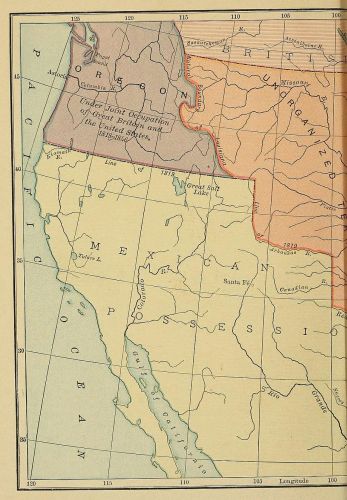
United States in 1825–1830
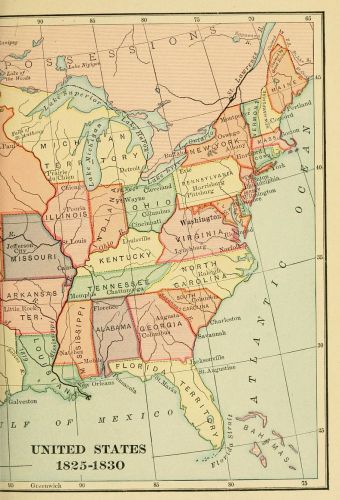
United States in 1825–1830
335. Character of Adams’s Administration.—Adams was a statesman of great ability and experience and of high integrity, but he represented ideas of strong government not pleasing to the masses. He seemed to be a Federalist veneered with Democracy. He did not have the faculty of winning and holding friends. He could not be easy in his manners, and, on the other hand, his dignity lacked grace. Besides, his election had been disputed, his opponents were factious, and events favored him almost as little as they had done his father. The strongest man in his Cabinet, Clay, was really a source of weakness to him, for Jackson’s friends continued to pretend to believe in the corrupt bargain.[148] Adams’s administration was, therefore, on the whole, a failure.
336. Foreign Affairs.—Even in foreign affairs, where, being a trained diplomatist, he had been previously successful, things went against Adams. He secured a number of good commercial treaties, but lost the important trade with the British West Indian ports through the failure to comply in time with certain demands of Great Britain. Perhaps if he had used the tact afterward displayed by Jackson, he would have secured the trade without trouble. But, as it was, the fault lay mainly with Congress, which took delight in humiliating the President.
337. The Panama Congress.—Adams fared as badly or worse when he indorsed the scheme of General Bolivar, the South American patriot hero, for holding at Panama a convention, or congress, of all the American republics. Both Adams and Clay, the latter of whom had long taken interest in South American affairs, believed that through such a congress the influence of the United States would be extended and the Monroe Doctrine be more firmly established. But although commissioners were finally sent to Panama, they arrived too late to participate in the conference, owing to the protracted debates in Congress on the propriety of sending them. Although Adams’s opponents would under any circumstances have delighted to harass him, these debates were mainly due to the fact that Hayti, a republic of revolted negro slaves, was to be represented at Panama. Southern congressmen disliked the social and political recognition involved, and feared that the subject of slavery might come up for discussion. As a matter of course, Adams’s opponents made him bear the brunt of the fiasco.
338. Internal Improvements.—In domestic affairs the President’s policy was still more unsuccessful. In his tactless way he favored internal improvements to an extent unwarranted at the time. He knew of the general prejudice against the government’s undertaking what the states preferred to do themselves, and he should have known also that the vetoes of his two predecessors had carried great weight. Besides, it was almost amusing to counsel the American people, as he did, to build observatories, when they were more interested in finances, public and private, than in astronomy. Some money had indeed been spent on improvements, especially upon the Cumberland Road, a highway running through Maryland, West Virginia, and Ohio, and designed to connect East and West. More money was spent during Adams’s term; but much opposition was aroused, particularly in the South, even Calhoun being now dubious of the constitutionality of such expenditure of the public funds.
339. Georgia and the Indians.—Still more humiliating than anything described yet was Adams’s failure to protect from the aggressions of the governor and legislature of Georgia, the Creeks and Cherokees, who lived in a half-civilized condition within the boundaries of that state. Both tribes had treaty relations with the United States, and neither owed allegiance to Georgia. Yet the state proceeded to survey the lands of the Creeks under a treaty of 1825, before the general government had had time to investigate the matter. When Adams interfered, feeling that the Indians were being imposed upon, Governor Troup used imprudent language, which he reiterated in 1827 under similar circumstances. On the latter occasion he actually called out state militia to meet the United States troops. This was pushing the doctrine of state sovereignty to a very dangerous extreme. As the President got little support from Congress, he had to brook the insult in spite of a splendid speech in his behalf by Daniel Webster. A few years later, as we shall soon see, another state, South Carolina, stood out against another President, Andrew Jackson, with far less impunity, Jackson being a more commanding man than Adams, and his opponents less determined. It must be remembered, too, that although the rash conduct of Georgia’s legislature and governor deserves partial censure, the people of the state were acting but naturally, when they endeavored to supplant by white settlers the Indians within their borders. An Indian state within a commonwealth was not to be tolerated, and the United States had in 1802 promised to get the Indians away as soon as possible.
340. The Tariff of 1828.—Thus far Adams’s conduct had been above reproach, however much he had failed in carrying out his various policies. It is less easy to defend his course in not vetoing the tariff bill of 1828—known in history as the “Tariff of Abominations.” It is natural that men who have once tasted the bounty of government should desire more of it; hence we are not surprised at finding the manufacturers of the country soon demanding more protection. The most clamorous advocates of higher duties were the growers and manufacturers of wool, since English woolens were again being sold in American markets. A bill for the aid of the manufacturers of woolens was defeated in 1827 only by the vote of Vice President Calhoun, who again showed the growth of his anti-protection views. Then followed a convention of protectionists at Harrisburg, Pennsylvania, which advocated very high duties (1827). The adherents of Jackson, whose candidacy was kept shrewdly before the public throughout Adams’s term, now conceived a very subtle plan for helping their hero and still further discrediting Adams. They proposed to levy exorbitant duties on raw products,—a policy which would secure the favor of the Western farmers and sheep-raisers, but would outrage the New England manufacturers. The latter, it was thought, would then join the Southerners in defeating the bill and would owe no gratitude to Adams. Jackson would in consequence keep his Southern votes, yet would also seem friendly to the West and to the protectionists generally. The schemes of Jackson’s partisans to increase his chances of election were unnecessary, since he was already a sufficiently popular candidate. The bill actually passed laid high duties which protected both growers of raw products[149] and manufacturers. Although the gains of the manufacturers were thus neutralized, they thought it best to take their chances under the increased duties. Accordingly the congressmen who represented them voted for the bill, and Adams signed it May 24, 1828. The South was greatly outraged in consequence, although some of her own leaders had with sinister purpose forced the rates up.
341. South Carolina’s Discontent.—South Carolina was especially excited. Her feelings and ideas were well expressed in a document—the celebrated “Exposition and Protest”—drawn up by Calhoun. In this manifesto the Vice President, following the lead of his predecessor Jefferson, pushed the doctrine of state protest, as outlined in the Kentucky and Virginia Resolutions, to the extreme of a separate state veto and nullification of an obnoxious law (§ 279). He went farther than Jefferson, however, his views being derived partly from his own philosophical speculations, partly from the teachings of John Randolph and of other Southern leaders. The consequences of the adoption of his theory were plainly very dangerous, but matters stood still for a while, since all parties were waiting to see what stand the new administration to be inaugurated in 1829 would take with regard to the tariff.
342. Election of 1828.—As might have been foreseen, Adams was defeated in the election of 1828. He had come nearer success than was expected; for the votes of New York and Pennsylvania would have turned the scale. But his opponents, with their scandalous stories, their unnecessary congressional investigations, their general unscrupulousness, had been too much for him. Clay had not been efficient in directing the campaign; while Jackson had secured in his favor what he had not had in the campaign of 1824,—the support of the skillful group of New York politicians known as the “Albany Regency,” at the head of which was the astute Martin Van Buren. Besides, Jackson’s views on disputed questions were a mystery, so that he could be claimed by any faction, while his sympathies and qualities were plainly democratic and thus acceptable to the masses. On the other hand, Adams’s views were so pronounced that he was sure to alienate votes, and his sympathies and qualities were plainly aristocratic.[150] Finally, Jackson was a typical Westerner, and the West then held the balance of power. It is no wonder, therefore, that in the popular vote he distanced his rival.
References.—General Works: W. Macdonald, Select Documents of United States History, 1776–1781; J. Schouler, History of the United States (6 vols.); J. Winsor, The Narrative and Critical History of America (8 vols.); G. Tucker, The History of the United States (4 vols., Winsor and Tucker extend to 1840); H. Von Holst, The Constitutional History of the United States (8 vols.); Bryant and Gay, A Popular History of the United States (4 vols.); T. H. Benton, Thirty Years’ View (2 vols.); E. Ingle, Southern Side Lights; Woodrow Wilson, Division and Reunion (“Epochs of American History”).
Special Works: same as for Chapter XVII.
343. The Meaning of Jackson’s Election.—Andrew Jackson was the first man of plain birth and breeding to sit in the White House. Born on the border between the two Carolinas, he had early made his way to Tennessee and there had risen to leadership through his strength of character and his possession of all the manly qualities most held in repute by the pioneer settlers. The democratic voters gave him whatever political or military offices he wanted, and were thoroughly satisfied with the effective way he discharged his duties. When Indians or British threatened the South or Southwest, he was the man to whom the general government had to turn, and his constant success made him a popular hero throughout the Union. Thus, in reputation as well as in character, he became more than a mere Tennesseean; he became a representative American. He was not a trained statesman, and his opinions on many important subjects were little more than prejudices. But he was thoroughly honest and fearless and precisely the sort of leader fitted to enlist the sympathy and admiration of the democracy. It is true that he could have done little without his shrewd political friends, and that he was likely to be partly their tool. It is true, also, that with all the virtues of the backwoodsmen, he had some of their vices, notably that of vindictiveness. But when all allowances are made, he was a great man, thoroughly representative of the new electorate.
344. The New Democracy.—The new type of politicians controlling the country was but an index of a new electorate. In the East the downfall of the Federalists and the constant extensions of the suffrage had created a party of “the people,” which would have had little chance of making its wishes law under the régime of Washington, or even of Jefferson. But it hailed in Jackson a leader after its own heart. In the West, where aristocracy was practically unknown, no other party had ever existed, and the young communities had long chafed under the conservative methods of the East, which advanced one Secretary of State after another to the Presidential chair. In the South the planters still controlled affairs, but they treated the democracy with consideration, and directed, rather than thwarted, its energies. Of course, in developing this new political force, the teachings of Jefferson and his school had had much influence; but the growth and spread of population, the increase of territory, the development of means of communication, and the opening up of new industries had been more effective. Jefferson had wanted to have the people recognized as the source of power, but he wished to have educated men use the power thus obtained. He thought, moreover, that tyranny would be averted if these picked men represented localities, or states, which would be jealous of their rights, and not the nation at large, which would not be thus jealous. The new democracy, on the other hand, while suspicious of strong government, was national in its sympathies, rather than local, as was soon proved by Jackson. The lately formed states of the West, being all younger than the Union, many of them creations by that Union out of national territory, had less state pride than the older commonwealths which had formed the Union. The new conditions of trade were, moreover, somewhat obliterating state lines in the North and East by inducing travel and correspondence on the part of business men. Thus the local democracy represented by Jefferson was being more and more confined to the South, but it kept up an alliance with the national and more radical democracy represented by Jackson down to the Civil War. Manhood suffrage, dependence of office holders upon the wishes of the electorate, and other principles of the Jacksonian democracy have become the political heritage of Americans, regardless of party.
345. Changes among the People.—The new democracy was strong and honest, but very ignorant. It was controlled by clever politicians, who used the machinery of caucus, primary election, and nominating conventions, and also introduced the ideas of the supreme virtue of party fealty, and of the propriety of distributing the spoils of office to the victors in each successive election. In other words, men were being taught to distrust their individual judgment and to trust that of their party. These ideas were held in all honesty, and few persons had time to consider whither they would lead. Few saw that party loyalty was taking the place of patriotism, that desire for the gains of office was supplanting the spirit of patriotic self-sacrifice. The country had grown tremendously in area, in population, and in wealth. Steamers were running in every direction, and railroads were soon to be built. Religious and educational lethargy had been shaken, and new ideas were in the air. National democracy, with its theories of the right of all to aspire to office, and its businesslike way of rewarding its successful supporters, was itself, therefore, a part of a great transformation of three-fourths of the American people.
346. Growth of the Nation.—It is difficult to realize the extent of this transformation. In 1789 Spain hemmed us in to the South and West and the British had not abandoned fortresses that belonged to us in the Northwest. Just beyond the Alleghanies the Indians were still a menace. Forty years later our domain stretched far beyond the Mississippi, Spain had yielded Florida, and Great Britain respected our rights. The Seminoles in Florida, and other tribes in the far West, were still to give trouble, but everywhere the wigwam was retreating before the log cabin. A generation before, the Atlantic seaboard had dominated the country in population, education, and wealth. Now the West was, not indeed the equal of the East, but a formidable rival. Since the War of 1812, the migration to Northwest and Southwest had been marvelous. The people seemed determined to fill up their more than two million square miles of territory. Emigrants from Europe had not begun to come over in great numbers, but American families were large and always ready to move to a favorable locality, especially from rugged New England to the fertile West. Improved roads, canals, and steamboats facilitated the movement of population, but even in the South, where roads were bad, enterprising families moved by thousands from Virginia and the Carolinas into Alabama and Mississippi, which with their rich lands invited the cotton planter and his slaves. Under these circumstances it is no wonder that by 1830 the population of the country had reached nearly thirteen millions, and that eleven new states had been added to the old thirteen.
347. Material and Moral Progress.—Perhaps the greatest change that had taken place in America was the increased mental and moral energy displayed by its inhabitants. The people were still provincial, but they were no longer sluggish. The War of 1812 had developed their national spirit; their own growth in population, and their acquisitions of territory, out of which wealth in all forms could be easily extracted, had developed their desire to prosper. They were no longer content slowly to grow moderately rich. They fostered manufactures and commerce and agriculture. They became a nation of inventors, and, what was more important, they developed a capacity for pure science which made the name of America honored throughout the world. Out of their midst sprang essayists and novelists and poets who interpreted their life to them. There was a notable growth of the religious spirit; temperance and other reforms were agitated; more attention was paid to education; public charities of all kinds received popular support. Nor were minor things overlooked. Men of all classes began to strive to provide household comforts for their families. Travel was made more comfortable. Good hotels began to replace bad inns. Urban life did not attract country people as it does now, but the towns had grown and prospered. New York was in 1830 a city of two hundred thousand inhabitants. Philadelphia was not far behind. Cincinnati had grown from a mere village to a town of nearly twenty-five thousand people. Throughout the North, East, and West, therefore, the watchword was “Development.” Even in the South, which was rendered conservative and sluggish by the presence of slavery, there were not wanting proofs that many energetic men would like to imitate their more fortunate brothers of other sections. Like the rest of the country, the South hoped for great things from her future railroads and canals, but her industrial future was still far in the distance.
348. Political Conditions.—Although the East and North led the rest of the country in manufacturing and commerce, and although the West was developing agriculture to a great degree, political power had not passed to them as completely as a casual observer might have perhaps expected. The South might be conservative, but it had an immense source of wealth in its cotton; and buying, as it did, many supplies from the North, it was a customer not to be offended. Hence many Northern politicians opposed Southern schemes less violently than they would otherwise have done, and hence the South seemed to have disproportionate power at Washington. Besides, Southern planters had more leisure to think of politics than busier citizens elsewhere, and their emotional temperaments naturally inclined them to political leadership. But they were being more and more outnumbered every year in the House of Representatives, and the Missouri Controversy had shown them how increasingly difficult it would be to keep the Senate balanced between free and slave states. In view of their perilous position, they naturally became all the more domineering and haughty in their demands. This, however, roused the temper of the other sections. Wealthy New England had time and means to develop the philanthropic spirit, and an anti-slavery movement was sure to follow. The Northwest, settled largely by New Englanders, would take this movement up, although hampered by the presence of Southern immigrants in Indiana and Illinois. It was impossible either for the descendants of the Puritans or for the hardy pioneers to tolerate long the domination of an aristocracy based on slavery.
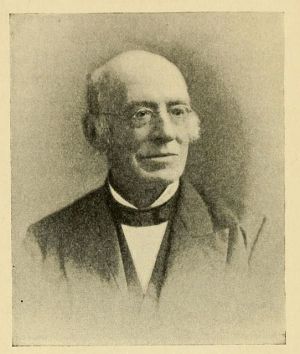
William Lloyd Garrison.
349. The New West.—The Western man, especially, living in his log cabin, pursuing the primitive unconventional life of a farmer, could not sympathize with an aristocracy that did not work with its hands, and must sympathize with slaves that did. The graces of Southern social life counted for little with Puritan or pioneer, and when the fight was begun the moral enthusiasm of the one, and the shrewd sense, plain morality, and superb energy of the other, would insure the victory for freedom. The election of Jackson, who, although partly a Southerner, was more a Westerner, meant, therefore, not merely the triumph of a new democracy, but that the center of political power had crossed the Alleghanies, and that the control which the South had exercised over the Union from the first was passing to stronger hands.
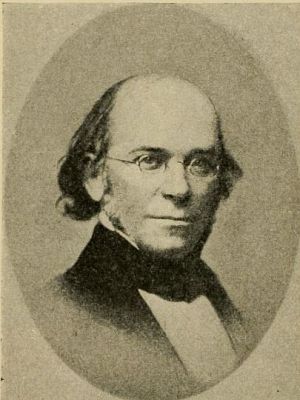
Theodore Parker.
350. Changes in New England.—In New England, also, the spirit of understanding which had long existed with the South on account partly of trade connections, partly of the English homogeneity common to both sections, was rapidly passing away. The old New England of farmers and sailors was now becoming more and more a country of manufacturers and artisans. The old Puritan leaven still fermented,—not as formerly, within the churches, the power of which had conspicuously declined, but in new forms of philanthropy, philosophy, and literature. New England had always been a power in the intellectual life of the nation, but from 1830 to 1860 this power was vastly increased. From her midst came abolitionists like Garrison[151] and others shortly to be mentioned. In Webster she had the greatest of orators and of exponents of the national idea. In Ralph Waldo Emerson (1803–1882) she had a teacher of high morality and a philosopher who, if vague, like his fellow-members of the school known as Transcendental, possessed, nevertheless, an inspiring personality. In the elder William Ellery Channing (1780–1842) and Theodore Parker[152] she had clergymen whose influence was felt far beyond their section. In Henry Wadsworth Longfellow (1807–1882) she had the sweetest and most popular of native poets; and in John Greenleaf Whittier (1807–1892), a sturdy poet-champion of human liberty. James Russell Lowell (1819–1891), too, was a young son of Massachusetts who, as poet and critic, was to do good work for the nation. All these great men were, more or less, forces to be counted against the continued dominance of the South in politics. With the exception of Webster they were not politicians, but they were thinkers who taught others to think. Against them the South, even with the poet and story writer, Edgar Allan Poe (1809–1849), could set no such galaxy of genius, save in the sphere of politics; and with the exception of Calhoun, the Southern statesmen of the new generation were inferior to those of the old. Nor were the Middle states, rich and populous though they were, capable of competing with New England as a factor in the nation’s life. Able politicians and editors were coming to the front, and there were some authors of great power, such as James Fenimore Cooper (1789–1851) and Washington Irving (1783–1859), but none capable of supplying such civic inspiration as writers like Emerson and Whittier. William Cullen Bryant (1794–1878) might be counted in this connection, for he did his main work in New York, but he was New England born. In short, it may be fairly said that New England represented for the generation before the Civil War the progressive, moral sense of the nation in the great question of freedom versus slavery; for that portion of the West which served the cause of liberty was settled chiefly by New England people. Curiously enough, the greatest imaginative genius that New England produced, Nathaniel Hawthorne (1804–1864), the romancer, took little interest in the burning question of the day.
References.—See Chapters XVII. and XVIII.
351. The Spoils System.—Jackson’s inauguration was a signal for crowds of his active supporters to hasten to Washington for their rewards. At the reception at the White House they displayed the rudeness of a mob, and furnished a sharp contrast with the stately levees held by Washington in New York. But worse things were to follow. Through a Tenure of Office Act, due to Crawford (1820), many positions fell vacant every four years. These vacancies enabled the President’s advisers partly to satisfy the demands made upon him, but the politicians also induced him to use his power of removal. In a few months over five times as many changes were made in the civil service as had been made by all Jackson’s predecessors. As a matter of course these wholesale removals from office brought many incompetent men into positions of trust, but it is quite clear that Jackson did not realize what he was doing. He thought he was rewarding faithful friends instead of inflicting a disgrace and an incalculable injury upon his country. He was a kind-hearted man, but some of the official changes that he made on the advice of his political managers could scarcely have been more cruel if he had been really merciless.
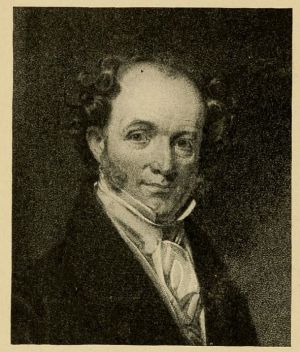
Martin Van Buren.
352. Jackson’s Cabinet.—Jackson’s Cabinet was chosen upon the basis of friendship or service and was mediocre in character. Van Buren,[153] who was made Secretary of State, had ability, it is true, and showed it conspicuously in the way he humored Jackson in order to secure the Presidential succession. Two Secretaries were friends of Calhoun, the Vice President, who had thus far supported Jackson. Within three years, however, the Cabinet was, with one exception, reconstituted. This very unusual and autocratic procedure of Jackson’s was owing partly to the alienation from Calhoun which followed Jackson’s discovery that the South Carolinian had wished to have him punished for his high-handed conduct in Florida (§ 324, note 2), and partly to the unwillingness of the wives of the other Secretaries to call upon the wife of the Secretary of War. This change in the personnel of the Cabinet but slightly affected the character of the administration, since Jackson rarely consulted his constitutional advisers, but preferred to take the advice of a small group of friends known as the “Kitchen Cabinet.” These men, chief among whom were William B. Lewis, an old Tennessee neighbor, and Amos Kendall, later Postmaster-General, acted as “coaches” to the old warrior. But the daring and energy needed for carrying out certain of his policies were furnished by himself.
353. Jackson’s Autocratic Reign.—Jackson, in spite of his theories about the duty of an executive to do the people’s will, was too much accustomed to command to be able to play the part of a constitutional President with any grace. When he had made up his mind to do a thing there was no stopping him. Of all our Presidents he, the most typically democratic, with the exception of Andrew Johnson, was the most typical autocrat. Opponents called him “King Andrew” and his two administrations are often spoken of as the “Reign of Andrew Jackson.” Yet to his credit be it said, that when he was not persuaded to act spitefully, he always acted fairly and for what he believed to be the interests of the nation. He bullied Mexico, but he would not be bullied by South Carolina. He insulted Chief Justice Marshall, was unforgiving to Calhoun, but was loyal to Van Buren. He was stern when his resolution to act was kindled; yet at times he was remarkably gentle. Almost the only time his will was successfully crossed was when the women of Washington refused to receive Secretary Eaton’s wife. But in describing him thus we are evidently dealing with a real man, not with a mere personification of the nation’s dignity. The history of Jackson’s administrations is the biography of Jackson himself—a fact which shows us that republican governments are sometimes as much affected by personal influences as monarchies are. The parallel between his career and that of a typical autocratic ruler is drawn still closer when we remember that an attempt was made to assassinate him. But this parallel must not be pushed too far. No man ever more truly wished to serve the people that elected him than Andrew Jackson.
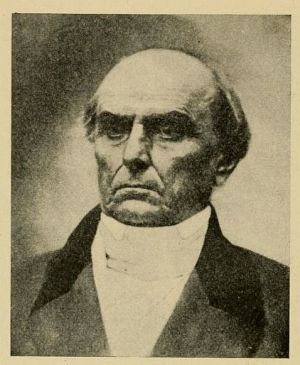
Daniel Webster.
354. Jackson as an Administrator.—Jackson’s administrations form a turning point in our history and are important from almost every point of view. Only their leading features can be treated here, but it may be well to say that whenever he could,—as in the matter of internal improvements,—Jackson played the part of a strict constructionist. When it was agreeable to him, he favored state sovereignty, as when he refused to support Chief Justice Marshall and the Supreme Court in their decisions against Georgia, which state continued to act toward the Cherokees as badly as it had done toward the Creeks. Georgia officials treated Marshall with contempt, and Jackson is reported to have said, “John Marshall has made his law, now let him enforce it.” Such a divorce between the executive and the judiciary, if long continued, would mean anarchy; but it must be remembered that Jackson, an old backwoodsman, would of course sympathize with the white men of Georgia.[154] But he would tolerate no violation of national laws which he thought it right to defend, and he considered the voice of the people sufficient authority for some very loose constructions of the Constitution.
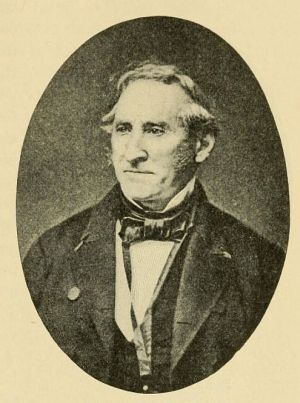
Thomas H. Benton.
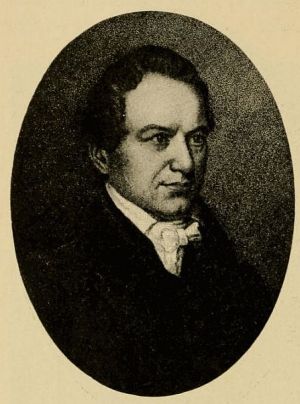
Robert Y. Hayne.
355. The Webster-Hayne Debate.—Probably the most striking event of Jackson’s first administration is the great debate of 1830 between Webster[155] and Hayne. It grew out of some resolutions of Senator Foote of Connecticut with regard to the rapid sales of public lands. The cheapness of land drew population westward, and this raised the price of labor in the older states; hence the interest of New England seemed to lie in opposing the policy of granting portions of the public domain to newcomers on very easy terms. The resolutions were hotly opposed by Senator Thomas H. Benton[156] of Missouri, a leading supporter of Jackson. Benton and all Westerners naturally thought the prevailing policy wise because it brought men and money to the new commonwealths. Senator Robert Y. Hayne[157] of South Carolina came to the help of the Western men, since to most Southerners New England was now obnoxious on account of the Tariff of Abominations (§ 340), and since the West, being comparatively unsettled, might, they thought, possibly be won to slavery’s side. Webster replied to Hayne, and the latter returned to the attack, but on a different line. He discussed the nature of the general government and gave warning that if the South were not relieved of tariff burdens, the remedy of a state veto would have to be resorted to. In other words, he advanced Calhoun’s doctrine of nullification, which, as we have seen, was an extension of the principles enunciated by Virginia and Kentucky in 1798, and by the Hartford Convention in 1814 (§§ 279 and 315). Webster replied in his most famous speech, and as an orator certainly got the better of his opponent, although Hayne’s defense of his own position was masterly. Even Calhoun himself, who, as he was serving his second term as Vice President, could not join in the debate, would hardly have presented his own views more clearly. Whether Webster eclipsed Hayne as a political reasoner, is a point on which the North and the South have never been in perfect agreement. Webster denied Hayne’s postulate that the Union rested on a compact, and affirmed that the Constitution had established a general government with powers sufficient to enforce its rights even against the component states.
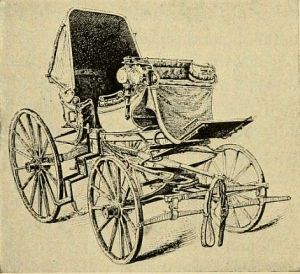
Daniel Webster’s Carriage.
356. The Theoretical and the Historical View.—Few will now deny that Webster was right as a theoretical publicist, for a constitution which admitted the right of secession or of nullification would have framed a farcical government. But whether he was right from the point of view of the constitutional lawyer or of the historical annalist is quite a different matter. There were nationalists from the beginning, but it seems probable that most men in 1789 believed that the Constitution was a compact between the states. By 1830 the North, and much of the West, had been nationalized and had more or less forgotten or abandoned the compact theory. But the South, less changed, adhered to it, especially as on it a minority party could base a constitutional resistance to an obnoxious policy like the tariff. Hence it seems fair to conclude that Webster was right as a publicist, partly unsound as a lawyer and annalist; but that the future was with him, the past with Hayne. That the past was with Hayne is partly at least confirmed by the general historical fact that minority parties, needing all the support they can get, make a careful study of precedents and have every interest in not making mistakes in their procedure. Parties of progress, on the other hand, are rarely careful about their reasoning from precedents. It is to be noted further that much of the political strength the Southerners still possessed lay in the fact that they were on the defensive and could obstruct legislation by strictly construing the Constitution.
357. Jackson and Calhoun.—Shortly after the debate it looked as if South Carolina at least would put Calhoun’s theory in operation. The tariff of 1828 had been reformed in 1830 and in 1832, but the protective idea was still dominant, and against this idea the Southerners were firmly set. They wished to resist in some way, but they soon found that they could not count on Jackson to help them as he had helped Georgia. That old warrior had answered their overtures, when attending a banquet given on Jefferson’s birthday, at which disunion sentiments were openly expressed, by giving, as his contribution to the entertainment, the toast, “Our Federal Union: it must be preserved.” They could count on Calhoun, however, with more certainty than ever, for his break with Jackson took place about this time; and, so far as logical exposition goes, no cause has ever had more remarkable support than Calhoun gave the nullifiers. Jackson, however, received a stronger support. He was reëlected in 1832 by a very large majority and believed that the people meant him to go ahead and preserve the Union, as well as to carry out other important policies.
358. Nullification.—Meanwhile those South Carolinians who thought as Calhoun did, in spite of considerable opposition from their fellow-citizens, caused a State Convention to be assembled in November, 1832. This body declared the tariff acts of 1828 and 1832 null and void so far as South Carolina was concerned, and prohibited payment of duties under them after February 1, 1833. Jackson replied by a strong proclamation, which urged the necessity of every true patriot’s supporting the laws and officers of the Union. Unfortunately many good South Carolinians thought that a patriot ought to support the state first, and the Union afterward. Jackson, however, did not rely on a mere proclamation. He dispatched soldiers and vessels to Charleston, and asked Congress to pass a bill enlarging his powers so that he might legally crush the incipient revolution. Congress in reply passed what is known as the Force Bill, March 1, 1833. No force was needed, however. The other Southern states did not stand by South Carolina, for although most of them believed in the right of secession as a last resort, they had little sympathy with nullification. They did not see how a state could remain in the Union, and yet not obey the latter’s laws. The nullifiers, under their leaders,—Hayne, who was now Governor of South Carolina, and Calhoun, who had taken Hayne’s place in the Senate,—had hoped for concession rather than war, and, pending the action of Congress, suspended the nullification ordinance. The administration, too, while determined to assert itself, had no great interest in the protective system, the cause of the quarrel. At this juncture Clay again played the part of a compromiser, and a tariff act, providing for a gradual return in ten years to the mild duties of 1816, was made law, March 2, 1833, one day after the Force Bill was passed and a day before the obnoxious tariff of 1832 was to have gone into effect. On their side, the South Carolinians held another convention, and repealed their first nullifying ordinance, but nullified the Force Bill. Thus it was practically a drawn battle—neither side abandoning its principles, but both making concessions in a not altogether brave and creditable way. As was to be expected, both parties claimed a victory. In South Carolina Calhoun’s influence grew steadily stronger, and the militia of the state seems to have been kept up with the distinct idea that it might be available in another crisis with the general government. On the other hand, Jackson had maintained the dignity of the Union, and the tariff compromisers, following the Missouri compromisers, had succeeded in putting off the day of reckoning until the Free states were strong enough to crush slavery and still retain the Southern states in the Union.
References.—General Works: see Chapter XVIII.
Special Works: same as for Chapter XVII., with the addition of: George T. Curtis, Daniel Webster; T. Roosevelt, Thomas H. Benton (“American Statesmen”); E. M. Shepard, Martin Van Buren (“American Statesmen”); A. C. McLaughlin, Lewis Cass (“American Statesmen”); W. G. Sumner, Andrew Jackson (“American Statesmen”); J. Parton, Andrew Jackson; W. P. Trent, Calhoun, in Southern Statesmen of the Old Régime; C. W. Loring, Nullification, Secession, etc.; D. F. Houston, Study of Nullification in South Carolina (“Harvard Historical Studies”).
|
The Indian problem was partly solved during Jackson’s administrations by the transfer of some of the tribes to Indian Territory. |
359. Anti-slavery Agitation.—The tariff was not destined to remain the chief grievance of the Southerners. They were soon far more concerned with the growing agitation against slavery which was being waged by determined men and women in the North. At the head of these abolitionists, as they were styled, stood William Lloyd Garrison, who in 1831 established his anti-slavery paper, The Liberator, in Boston. Up to this time many leading Southerners, including Washington and Jefferson, had deplored the existence of slavery without seeing how to get rid of it. Now, feeling outraged by the attacks made upon their section, and fearing other slave insurrections like one incited by Nat Turner in Virginia in 1831, they began to defend their institution as a property right secured to them by law, and a profitable one in view of the increased demand for cotton. Efforts for emancipation, such as those made by representatives of the mountain districts of Virginia, in a convention held in that state in 1829–1830, were abandoned. A pro-slavery literature was produced, which treated slavery not as an evil to be abated, but as a benefit to be spread. Stricter penal laws were enacted with regard to the blacks, and the abolitionists were denounced and threatened. The latter received at first similar treatment in the North, where they were frequently mobbed. They continued to make proselytes, however, and by 1836 had put the nation in a turmoil, as a result of their petitions to Congress for the abolition of slavery in the District of Columbia.
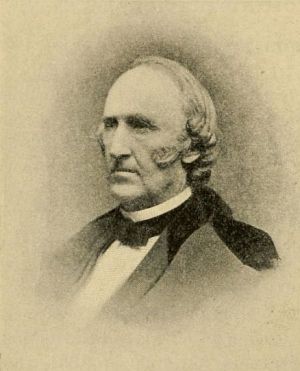
Wendell Phillips.
360. Abolitionist Petitions to Congress.—The Southerners, alarmed at the thought of the bad effects upon their interests that debate on these petitions might have, secured the passage of resolutions tabling them. But they found it hard to silence such an advocate as John Quincy Adams, who had not disdained to serve his country in the House of Representatives after having held the highest office open to a citizen. Adams was not an abolitionist, but he did believe in the right of all citizens to petition Congress, and until his death, in 1848, he championed the cause of liberty in the most eloquent way. Soon, too, the Southerners had the difficult task of disposing of the abolitionist pamphlets sent through the mails. As a result of their efforts to suppress freedom of speech and kindred rights, the cause they were opposing gained in strength. It had its martyr in E. P. Lovejoy, murdered in Alton, Illinois, in 1837, and its fiery orator in Wendell Phillips[158] of Boston. It had the future with it also, but this only the more far-sighted of the Southerners could see. The mass of them saw only that an institution bequeathed to them by their fathers and, as they believed, essential to their comfort and prosperity, was being assailed by men who, as a rule, had had little close contact with it. In consequence, they naturally made the best resistance they could. They would have been more than human if they had not resisted, but it must be confessed that their speeches and actions were often so extreme in character as to defeat their ends. On the other hand, the abolitionists were partly responsible, in their turn, for the extreme stand taken by the Southerners, for they were very intemperate in their strictures. Because they abhorred slavery, they thought it logical to abhor slaveholders and the Constitution of the United States, which permitted slavery. They were opposed to all efforts to settle the slavery question by political action. They upheld every kind of reform, no matter how extreme, and were continually at loggerheads among themselves. In other words, they were impractical, and their methods in the early years of the agitation were abhorrent to the average American citizen. Nevertheless, they aroused the public conscience on the subject of slavery, and, as leaders of a crusade, their most influential members, men and women, have perhaps never been surpassed.
361. Jackson and the Bank.—Meanwhile Jackson, though on the whole a Southern sympathizer, had a battle of his own to fight that interested him far more than the slavery contest. He had an agriculturist’s suspicion of capitalists, and in particular saw in the Bank of the United States a greedy monopoly worked in the interests of his political enemies.[159] Accordingly he early declared war against that institution, which was at that time in good condition. Henry Clay, his chief rival, took up the issue, and in 1832 had a bill passed for rechartering the corporation. Jackson at once vetoed it, and the country sustained him in the campaign of 1832, in which Henry Clay, as candidate of the National Republicans,[160] and William Wirt as candidate of the short-lived party known as the Anti-Masons,[161] were ignominiously defeated.
362. Removal of the Deposits.—Encouraged by the popular support he had received, and believing firmly, and rightly, it would seem, that the bank was a dangerous monopoly, Jackson now resolved to deal it a crushing blow. He secured, after some trouble, a coöperating Secretary of the Treasury in Roger B. Taney of Maryland, and through him had an order given for the withdrawal of the deposits of public money in the bank and its branches.[162] This move might under other circumstances have been a wise one, but it was made in an impolitic manner; and by crippling the bank at a period when the nation was carried away by a craze for speculation, it probably helped to pave the way for the great financial panic of 1837. It also brought upon Jackson a vote of censure by the Senate, which he answered in a vigorous protest, and which his friends later, under the lead of Benton, by a rather farcical procedure succeeded in expunging from the Senate Journal.
363. Censure of Jackson’s Action.—Few actions of an American President have been more harshly criticised than that of Jackson toward the Bank of the United States, but it cost him little of his popularity with the masses, because they, like himself, were suspicious of corporate wealth. The wealthy classes, however, denounced him freely, and with some reason. The changes necessitated in his Cabinet in order that his wishes might be carried out suited rather a self-willed sovereign like Louis XIV. than the constitutional executive of a republic. The vindictiveness with which he pursued his policy was appropriate to a small, rather than a great, man. Besides, the whole matter was one for financiers to manage, and Jackson knew more of fighting than he did of finance. Nor was popular acquiescence in his policy a sure indication of its wisdom. On the other hand, the president of the bank, Nicholas Biddle, of Philadelphia, acted with indiscretion and injured his own cause. Clay also was premature in forcing the issue and had a partisan purpose in doing it. The bank had years before been grossly mismanaged (§ 317, note) and might be so again; and when its existence was threatened, it used money in politics. Moreover, after its charter expired, its career under the laws of Pennsylvania was discreditable. Taking all these facts into consideration, we are perhaps justified in concluding that Jackson’s methods of procedure deserve great censure in spite of his integrity, but that what he actually did was not nearly so detrimental to the interests of the country as some persons have considered it.
364. Banks and Speculation.—But the end was not yet. The funds removed from the Bank of the United States were deposited in state banks, controlled by Democrats, and afterwards known as “Jackson’s Pets.” This governmental favor caused the numbers of such banks to increase, and thus stimulated the universal desire to indulge in financial speculation. The public revenues meanwhile increased through speculation in public lands and through larger imports, and as the national debt had been paid off shortly before, it was hard to decide what to do with the accumulated funds. An outlet for this surplus was found in non-interest-bearing loans to the states in proportion to their representation in Congress. This distribution of the surplus—a favorite project of Clay’s and destined later to complicate the financial situation still more seriously—increased the tendency toward extravagant internal improvements, and thus fed the fever for speculation which, as we have just said, both supported and was supported by a loose system of banking under state control.
365. Wild-cat Banks.—The “Wild-cat Banks,” as the banks established under this system were called, were especially numerous in the South and West, and their paper notes were of such varying values that the public suffered great inconvenience.[163] Journals were published for the special purpose of reporting from day to day the value of the various issues and for the purpose of pointing out how traders could avoid being deceived by the numerous counterfeits. There was a legitimate demand for an increase of the circulating medium, and the government had tried to meet this by enlarging the output of gold and silver coins and by arranging for notes to be issued by the deposit banks on a specie reserve of one-third of their circulation. But these measures were not sufficient. The states chartered banks recklessly, and the banks issued their notes in wild profusion.
366. The “Specie Circular.”—Jackson became alarmed, since the notes of even the specie-paying banks received by the Treasury for the purchase of public lands were declining in value. He therefore issued his famous “Specie Circular,” which announced, against the advice of the Cabinet, that thenceforth only gold and silver would be received in payment for public lands. This order naturally affected the banks in the West disastrously, forced back a mass of notes upon the East, and induced a general want of confidence, which was all the greater on account of the previous speculative want of caution.
367. Election of Van Buren.—Jackson, like Jefferson, however, was fortunate enough to lay down his office in time to leave his successor to meet the impending storm. That successor was Martin Van Buren, who by the irony of fate had helped his chief to secure two of his greatest successes. These were the opening of the ports of the British West Indies to American ships, and the acknowledgment by France of the justice of the French spoliation claims, which were based on depredations committed on American commerce during the Napoleonic régime.[164] Still, Van Buren partly deserved his fate, for he had been subservient to Jackson and had succeeded him on the distinct pledge that he would follow in his footsteps. He was the first real politician to reach the White House, but he had statesmanly qualities also. If he had not bound himself to Jackson so closely that he was often forced to act against his own judgment, he would probably rank among the greatest Presidents. But adherence to Jackson’s policy—for example, in the bullying attitude assumed toward Mexico on account of Texas—undoubtedly hurt his career and perhaps his conscience. Still, Jackson had stood by him after the Senate had unjustifiably failed to confirm his appointment to the English mission; and, first as Vice President, afterward as President, he had great cause to bless “Old Hickory’s” friendship.
References.—General Works: see Chapter XVIII.
Special Works: same as for Chapter XX., except the two books mentioned last. See also lives of leading abolitionists,—Birney, Wendell Phillips, etc., especially the biography of William Lloyd Garrison, written by his children, and A. H. Stephens, War Between the States; Jefferson Davis, The Rise and Fall of the Confederate Government.
|
The former Adams men and the adherents of Clay, who shortly after this time took the name of the patriotic party in the Revolution and called themselves “Whigs.” |
|
This party was formed against the Free Masons, chiefly in consequence of the report, not confirmed, of the killing in 1826 of a man named William Morgan, who had exposed certain secrets of the order. |
|
By law the Secretary had to give the order, and Jackson compelled the resignation of Mr. Duane, who would not give it. |
368. New Parties.—Martin Van Buren won the election of 1836 as a Democrat, for Jackson’s party, as we have seen, had dropped the word “Republican” from their name (§ 361, note 1). His opponent had been William Henry Harrison of Indiana, a man long prominent in his section (§§ 299, 302, 305). Harrison was the nominee of the Whigs, but the real leaders of the latter party were Clay and Webster. The chief bond of union binding the two leaders and their followers together was their desire for a liberal construction of the Constitution and for a strong central government. The Whigs were soon destined to develop strength in every section, even in the South.
369. The Independent Treasury.—Van Buren and the Democrats were destined soon to lose the strength they began with. The panic of 1837 greatly injured business, and then, as they have so often since done, men blamed the central government for a state of things for which it was only partly responsible. Banks failed in every direction and prices went up enormously, flour and corn more than doubling in cost. The President called an extra session of Congress to consider the situation, but had little to propose besides insisting on the policy of the “Specie Circular” and on divorcing the government from the banks. The latter policy, known as the Independent Treasury system or Sub-Treasury, was finally carried through in 1840. With a slight intermission, it has been the policy of the nation ever since. Its main features are the receipt and disbursement of government funds at vaults built in a few of the chief cities.
370. Van Buren’s Failure.—The administration’s policy did little to mend matters, and the people rightly or wrongly attributed most of the financial troubles of the time to Jackson’s meddling with the banks. They accordingly listened to the Whigs, who believed in a national bank in particular and in discrediting the Democrats in general. To make matters worse for Van Buren, the spoils system began to show its seamy side, and he was accused of all its evils, unjustly, on the whole. He was also charged with living in luxury while the poor were starving, and in the midst of the panic was almost menaced by a mob in the White House grounds. Furthermore, he alienated many persons by not siding with the Canadian revolutionists of 1837, and by not encouraging the annexation of Texas, which had revolted from Mexico in 1836. Even the Seminole War,[165] continued for several years against the Indians of Florida, was charged against him; and, in 1840, although he had on the whole governed well, he was overwhelmingly defeated by General Harrison in a campaign conducted on sensational lines.
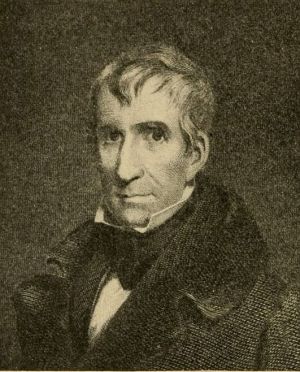
William Henry Harrison.
371. Campaign of 1840.—Although Harrison was a Whig, the candidate for Vice President who was associated with him, John Tyler of Virginia, was chosen chiefly because he had opposed Jackson. He was really a Jeffersonian Democrat, not a Whig. Principles were little in demand, the voters being satisfied with spectacular demonstrations. In their torchlight processions they carried around large, log cabins with men in front drinking cider—visible insignia of the frontiersmen, to which class Harrison was supposed to belong. They also shouted their campaign refrain of “Tippecanoe and Tyler too” (§ 299), and they held monster meetings in the open air. No campaign in American history has been more marked by noisy, unreasoning enthusiasm than this.
372. Tyler’s Position.—General Harrison[166] was an old man, and proved unable to bear the strain of his campaign, the pressure of office seekers, and the ceremonies attending his inauguration. He died exactly one month after taking office, and left his party in great confusion. Vice President John Tyler, his successor, did not believe in the Whig policy of loose construction, and was a Democrat in all except a few particulars. He soon showed his colors by vetoing Clay’s bill for a national bank, and then vetoing a second bill framed on suggestions of his own. He was accused of bad faith, but was doubtless only in a false position and anxious to assert a policy of his own that might put him at the head of a party. His vetoes, however, made the Whigs his deadly enemies and caused all his Cabinet to resign except Webster. The latter, as Secretary of State, remained to settle with the British Minister, Lord Ashburton, in the treaty that bears the latter’s name (1842), the disputed northeastern boundary and certain points connected with the suppression of the African slave trade.[167]
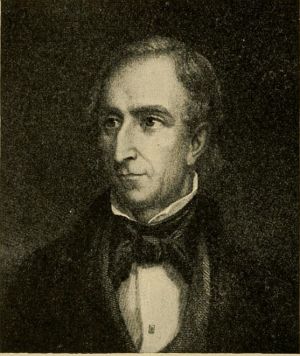
John Tyler.
373. The Lesson of Tyler’s Career.—John Tyler[168] was the first Vice President to reach the White House through the death of his superior. His behavior in the higher office should have taught the people of the United States a lesson as to the necessity of choosing highly qualified candidates for the Vice Presidential office. The career of Andrew Johnson proves that they had not learned this lesson in 1864. The old system by which the candidate receiving the second highest number of electoral votes became Vice President had its drawbacks, but it at least gave the country such Vice Presidents as John Adams and Jefferson. Under the new system the office has been too often given to a candidate possessing political influence or to a good man so old as to be likely to die before the expiration of his term. It follows that Tyler is not so much to blame for his mistakes as the people who put him where he was sure to go astray. He was an honest and amiable man, who by no means lacked capacity. He helped Webster in the Ashburton Treaty. He behaved with discretion during what is known as “Dorr’s Rebellion” in Rhode Island[169] (1841–1842). But, on the whole, Tyler was lacking in discretion and was unable to take the lead in public matters. He did not believe in a national bank and was perhaps right in not doing so; but if he had been wise, he would have said so plainly and thus prevented the Whigs passing bills that he was sure to veto. He vetoed other measures besides the bank bills and perhaps again was in the right; but the main result of his actions was to earn for him the distrust both of the Whigs and of the Democrats. His attempt to form a party of his own was a complete failure.
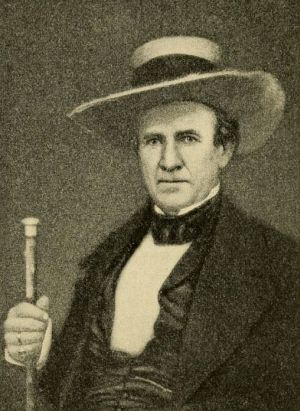
General Samuel Houston.
374. The Texas Question.—The congressional election at the middle of Tyler’s term, while adverse to the Whigs, did not help him. The second half of his administration was therefore even more wanting in harmony and effectiveness than the first. The chief question put forward was the admission of Texas, which the President, as a Southern man and a sympathizer with slavery, naturally favored. Although Mexico had not recognized her independence, Texas had now been a republic ever since General Samuel Houston[170] had defeated the Mexican leader, Santa Anna, at San Jacinto on April 21, 1836. The leading Texans were Americans, however, and desired annexation, but this would mean not only war with Mexico, but also a huge increase of territory for slavery. Accordingly Northern men shrank from allowing the annexation of the sparsely populated region. Anti-slavery sentiments were growing, and such able men as Joshua R. Giddings of Ohio were championing them in Congress. But the Southerners were alert also, especially Calhoun, who became Tyler’s Secretary of State toward the end of his term. Calhoun feared that England was anxious to secure Texas; besides, he felt that slavery must spread or be crushed out. It was not hard to induce Tyler to join in negotiations with the Texans, and in April, 1844, a treaty of annexation, secretly prepared, was announced. It was defeated in the Senate by a large vote, but was taken up as the chief issue of the next campaign.
375. The Campaign of 1844.—The Whigs put up Clay, and the Democrats chose James K. Polk[171] of Tennessee, since Van Buren would not advocate annexation. Polk, although he had been previously Speaker of the House, was not very well known and had aspired only to the Vice Presidency. He was therefore really the first “dark horse” to receive a presidential nomination. Clay, on the other hand, was a veteran statesman, the natural nominee of his party. But Clay unfortunately wrote letters that made his position on the Texas question ambiguous; he therefore lost the support of many anti-slavery men, who, as the “Liberty Party,” put up a candidate of their own. Polk was accordingly elected over a competitor much his superior. But before the newly elected President took his seat, Tyler had secured the annexation of Texas by the passage of a joint resolution through Congress.[172]
376. The Oregon Question.—Along with the Texas question the Democrats had made the question of the occupation of Oregon a cardinal issue in their campaign. Their success led them to claim that the United States must have all the territory lying south of 54° 40′, “or fight.” This demand was in every sense a rash one, and might easily have brought on war with Great Britain, but it fortunately led to no evil results. In 1846 a treaty with Great Britain fixed the American northern line at the 49° parallel, and only Mexico was left to contend against.
References.—General Works: same as for Chapter XVIII.
Special Works: same, in the main, as for Chapters XX. and XXI., with the addition of: J. T. Curtis, James Buchanan; L. G. Tyler, Letters and Times of the Tylers; H. A. Wise, Seven Decades of the Union; B. Wise, The Life of Henry A. Wise of Virginia; H. H. Bancroft, Oregon (“Pacific States,” Vols. XXIV.–XXV.); William Barrows, Oregon (“American Commonwealths”); A. M. Williams, Sam Houston; H. Yoakum, History of Texas.
|
A. P. Upshur of Virginia succeeded Webster as Secretary of State, but was killed, along with several other prominent men, by the bursting of a gun on the Princeton in 1844. |

Territory claimed by Texas
when admitted into the Union,
1845
377. The Issues Involved.—As a Mexican state, Texas had extended on the south and west to the river Nueces; but her inhabitants and the United States insisted on holding to boundaries based on the Louisiana Purchase and on claiming the “country between the Nueces and the Rio Grande.” The Mexicans resisted this claim; and when Polk ordered General Taylor to cross the Nueces, and later to advance to the Rio Grande, they attacked and defeated a small body of the American troops (April 24, 1846). Polk at once sent a message to Congress, in which he declared that war existed, “through the act of Mexico herself.” This statement was, on the whole, unwarranted, although a technical defense was easily made for it. It was really a case of a strong nation’s bullying a weak one; and, as we have seen (§ 353), the bullying had begun under Jackson and had been steadily carried on. But Congress, and a considerable portion of the people, especially in the South, accepted Polk’s proposition, and the war was effectively prosecuted. Its results were probably beneficial, in the main, since the territory was sure to become American some day; but its origin is not a pleasant topic for the patriotic American to dwell upon. Nor is it by any means certain that the Civil War was not in large part precipitated by that against Mexico. The latter contest gave the South a taste for fighting that was not altogether a warrant for the future calm of that section; and the additional territory acquired by the Union opened a new and disastrous phase of the slavery question (§§ 388, 411).
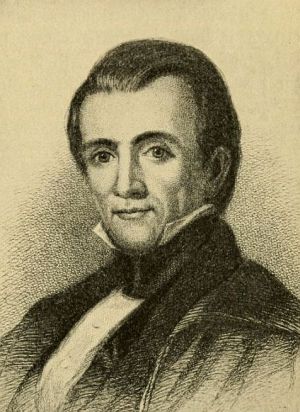
James K. Polk.
378. Conduct of the Administration.—Senator Benton was probably right when he claimed, in his Thirty Years’ View, that there never was a less warlike administration than that of Polk. Polk was thoroughly upright and pious, but was scarcely broad-minded. He took his seat with the intention of carrying out a programme the main feature of which was the acquisition of California. This programme he carried out to the letter, partly because it was a popular one, partly because he had considerable administrative skill. Owing in the main to the discretion of Great Britain, war was averted with that power (§ 376), and Polk could point to a very valuable addition of territory in the extreme Northwest, into which population was already pouring. Tyler had forestalled him with regard to annexing Texas; but Polk could at least see to it that Texas reached the Rio Grande, and that the United States thus recovered territory which some persons believed to have been imprudently abandoned by Monroe in his negotiations with Spain (§ 324). Yet to extend the bounds of Texas and, what was more important, to acquire Upper California, would necessitate a war with Mexico, and for this Polk and his well-chosen Cabinet were prepared. They wanted only a short war, however, and trusted to diplomacy and money to secure them the territory that would give the United States a clear sweep to the Pacific. Hence much of Polk’s warlike attitude was hollow. His main purpose was to obtain money from Congress with which to buy territory, and by diplomatic means to induce Mexico to sell. He actually restored to his native land the exiled Mexican general, Santa Anna, hoping that the latter would, in gratitude, make a speedy peace. But the sly adventurer induced his countrymen to fight the harder; and although California and New Mexico were taken by the Americans without a real struggle, peace with Mexico, and her acquiescence in the results of the war, could be obtained only after long and costly campaigns. Moreover, these campaigns entailed a political result discouraging to Polk and the Democrats.
379. Ambitions of Scott and Taylor.—The leading soldier in the United States was General Winfield Scott, the hero of Lundy’s Lane (§ 309). Military success in a republic generally brings civil honors; and Scott was a Whig, with his eyes already on the Presidency. A Democratic administration could not bring itself to give Scott a chance to distinguish himself, and for some time he was detained at Washington; but his subordinate, General Zachary Taylor,[173] who was at first given command (§ 377), was also Whig in his sympathies. Such being the case, various expedients were suggested; it was even intended to give Senator Benton supreme command, he being a good Democrat and a colonel of the War of 1812. But all schemes failed. Scott was finally sent to the front, and Taylor (§ 389) captured the Whig nomination for the Presidency (1848). Such are some of the intrigues that the historian finds behind the Mexican War. It is little wonder that the Whigs—including old statesmen like Webster, and new statesmen like Abraham Lincoln of Illinois, who was serving his only term as congressman—should have denounced the contest as wrong in itself and as prosecuted in the interests of the slaveholders and land grabbers of the country. It is little wonder, too, as we have seen, that the Mexican War does not live in popular imagination as a heroic struggle (§ 377).
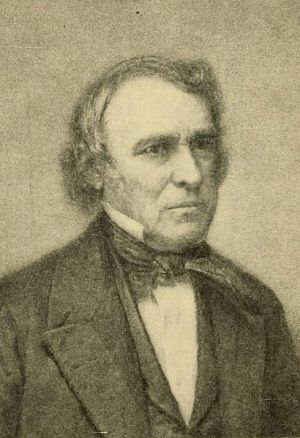
General Zachary Taylor.
380. Taylor’s Victories.—Whatever we may think of the causes of the Mexican War and of the conduct of the American authorities, there can be but one opinion as to the valor with which officers and troops conducted themselves after hostilities had begun. Taylor received notice from the Mexican general, Arista, on April 24, 1846, that his occupation of the northern branch of the Rio Grande meant war. On the same day the first American blood was shed. It was avenged shortly; for, on May 8, Taylor met about six thousand Mexicans at Palo Alto, and defeated them severely with his own small force of about two thousand. The next day he won another complete victory at Resaca de la Palma, and drove the enemy across the Rio Grande. The news of these victories aroused the country and made Taylor a popular hero. He was already much loved by his soldiers, who gave him the nickname of “Rough and Ready,” because of his carelessness of dress and other details and his thorough capability as a commander.
381. Taylor’s Advance toward Mexico.—War was formally declared by the United States on May 13, Congress authorizing the President to call out fifty thousand volunteers and voting ten million dollars for expenses. On May 18, Taylor occupied Matamoras, halting there until September. He then advanced upon Monterey, other officers, military and naval, having meanwhile been occupying New Mexico and Upper California. Monterey fell, after a short siege, on September 24. But Mexico would not yield, although Colonel Doniphan, after a long, hard march, had taken Chihuahua and gained control of the important surrounding region, and although victory had crowned every effort of the Americans.
382. Capture of Vera Cruz.—As a speedy peace was much desired by the administration, it now seemed necessary to send General Scott[174] to the front. It was determined that his forces should sail early in the spring to Vera Cruz, and from that place begin a march to the City of Mexico. He landed at Vera Cruz on March 9, 1847, and after a bombardment took the town twenty days later.
383. Battle of Buena Vista.—Meanwhile Santa Anna, in full command once more, hearing in January that Scott had taken ten thousand troops from Taylor, and believing that Vera Cruz could hold out for some time, determined to make a swift march northward and crush Taylor. It was a daring and probably a good plan, but it failed. Taylor, then some distance from Monterey, was not a whit daunted when, on February 20, he discovered about twelve thousand Mexicans in front of his own five thousand troops. He retired and took up a good position near Buena Vista, refusing Santa Anna’s demand for surrender three days later, and inflicting a severe defeat upon his enemy before the day closed (February 23, 1847). The American loss was about eight hundred, the Mexican over twice as many. The battle settled the fate of the territory that America craved, and, moreover, determined who should be the next President of the United States. Curiously enough, the future President of the Confederate States, who was Taylor’s own son-in-law, also won great distinction at Buena Vista. Jefferson Davis fought with conspicuous bravery, showed much tactical ingenuity, and was severely wounded in this remarkable battle.
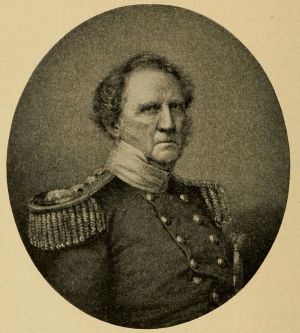
General Winfield Scott.
384. Scott’s Great March.—If Taylor’s career had been brilliant, Scott’s was now to be more so. Unfortunately for the latter’s Presidential aspirations, however, Taylor had already caught the attention of the public. Besides, Scott, who was strict with regard to discipline and fond of display,—qualities that earned him the nickname of “Fuss and Feathers,”—was not the man to secure popularity. Before his brilliant campaign was over, he had several unpleasant difficulties with subordinate officers. But, as a general, he showed himself to be fully Taylor’s equal, perhaps his superior. Leaving Vera Cruz, he forced, on April 18, the mountain pass of Cerro Gordo, which had been fortified. It was defended by fifteen thousand Mexicans under Santa Anna, whose courage had not been lessened by his defeat at Buena Vista. Here again the Mexican losses far exceeded the American. Three thousand prisoners were captured, along with a great store of arms and artillery, and three towns were taken. At one of these, Puebla, the army halted for a rest of two months. At the beginning of August the march on the capital was renewed, about eleven thousand men moving forward. By August 18, they were within ten miles of the city, where the enemy made a determined stand. The next day and the day after saw three battles,—Contreras, San Antonio, and Churubusco,—all fought with splendid courage and great success against much larger forces of Mexicans, who fought quite as desperately, but with less skill.
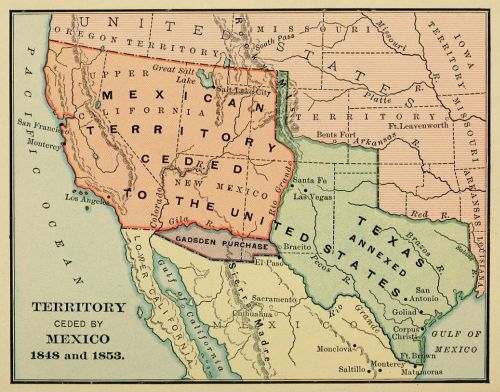
Territory ceded by Mexico,
1848 and 1853
385. The Capture of Mexico.—The Mexicans being dispersed, Scott might have entered the capital, but Polk wished to render negotiations easy, and an armistice was granted in order that terms of peace might be discussed. The American envoy, N. P. Trist, was instructed to ask for New Mexico, the Californias, and the region between the Nueces and the Rio Grande; although he was authorized to drop the demand for Lower California if necessary, and also to offer money for the other territory. The Mexican commissioners would not agree to these proposals, and in their turn offered less than Polk desired. So the armistice was terminated. Then, on September 8, Scott won the brilliant victory of Molino del Rey (“Mill of the King”). Five days later, the heights of Chapultepec, as well as two of the city’s gates, were stormed with great gallantry. On the next day (September 14, 1847) a triumphal entry was made into the Mexican capital, in the defense of which so many gallant men had perished.
386. The Best Feature of the War.—The best feature of the Mexican War was not the splendid territorial booty obtained, nor the remarkable leadership displayed by Scott, Taylor, and their subordinates, but the superior morale of the American troops. As these were in the main volunteers, the conduct of the war was all the more a credit to the nation, especially to the Southern and Southwestern states, where the struggle had been popular. These brave volunteers wiped out whatever disgrace attached to the country from the shameful lack of efficiency shown by the troops of 1812. The war was also important for the training it furnished young officers who were destined to play important parts in the Civil War. “Stonewall” Jackson, McClellan, Grant, Lee, and other generals here first showed the stuff that was in them.
387. Results of the War.—The unequal contest was settled by the treaty of Guadalupe Hidalgo (February 2, 1848). Mexico had to agree to relinquish all her territory north of the Rio Grande and Gila rivers. In compensation for Upper California and New Mexico, the United States allowed her the sum of fifteen million dollars, and undertook to pay some of its own citizens who had claims against Mexico. The territory thus acquired soon threw the country into great political confusion; for certain Northern politicians were determined to prevent, if possible, any extension of slavery in the domain obtained by purchase, even though it lay south of 36° 30′ (§ 329).
388. The Wilmot Proviso.—As early as 1846, Representative David A. Wilmot of Pennsylvania had proposed an amendment to a bill pending, stipulating that no money should be appropriated to purchase territory unless slavery were prohibited therein; and though this amendment, known as the Wilmot Proviso, had failed, the principle involved in it was made the chief feature of the campaign of 1848.
389. Election of 1848.—In this struggle five parties were engaged. Certain disaffected Democrats of New York, known as Barn-burners,[175] a party known as the Free Soilers, and the old Liberty Party of the abolitionists,—all being opposed to the extension of slavery,—finally nominated Van Buren. The Democrats nominated Lewis Cass of Michigan, who advocated what was afterward famous as Popular or Squatter Sovereignty,—that is, the right of the people of each territory to choose whether they would have slavery or not. The Whigs nominated General Zachary Taylor of Louisiana, and placed on the ticket with him Millard Fillmore of New York. Their principles were not pronounced; but Taylor was a Southerner and carried a large part of his section with him, while Van Buren’s vote lost New York to the Democrats. Thus Taylor and Fillmore were elected; but the South soon regretted the fact, for the new President showed himself friendly to the anti-slavery men by urging the admission of California as a free state.
References.—General Works: same as for Chapter XIX.
Special Works: same as for Chapters XXII. and XXIII., with the addition of: H. Wilson, History of the Rise and Fall of the Slave Power in America, Vol. II., chaps. ii.–iii.; H. H. Bancroft, Pacific States, Vol. VIII.; Winfield Scott, Memoirs; U. S. Grant, Personal Memoirs, Vol. I., chaps, iii.–xiii.
|
An uncomplimentary name given them by their opponents on account of their supposed revolutionary opinions on political matters. |
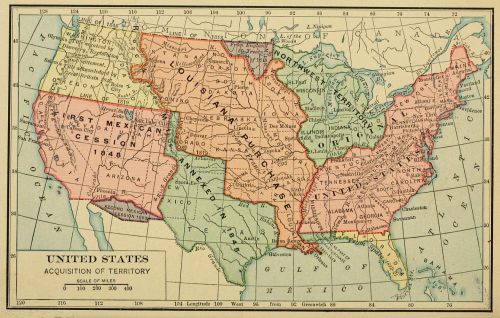
United States—Acquisition of Territory
390. General Conditions.—The period of controversy upon which we are about to enter, was caused by the opposing interests and feelings of the North and South on the subject of slavery. In the early history of the country, the balance of power had been kept even by the alternate admission of free and slave states. But the admission of Texas, and still more, the results of the Mexican War, enlivened the hopes of the South, while the Wilmot Proviso (§ 388) showed that the North was fully aware of the great interests involved in the annexation of any new territory capable of supporting slavery.
391. Claims of the South.—The people of the South, especially those of South Carolina and Mississippi, which had perhaps become the most influential states in political matters, asserted that the Fugitive Slave Law, provided for by the Constitution and enacted into a statute by Congress in 1793, had not been fairly carried out by the people of the North. Southerners also charged the North with a growing tendency to misrepresent, interfere with, and overthrow the institution of slavery, which had been so carefully protected by the Constitution. They saw that the North was growing much more rapidly than the South, and that the time was not far away when the South might be outvoted in Congress, with the result that, by a change of the Constitution, slavery would perhaps be swept entirely away. The circulation of anti-slavery newspapers, especially William Lloyd Garrison’s Liberator, continued to give great offense to the South, and caused laws to be passed by the Southern states prohibiting the distribution of such journals. The feelings thus aroused were further excited by repeated efforts to secure the abolition of slavery in the District of Columbia.
392. Claims of the North.—In the North, on the other hand, the feeling was constantly growing that slavery was a moral wrong and a national disgrace. While the people generally disavowed the right to interfere with the institution where it already existed, they were determined to resist legislation which would introduce it into any of the new territories. They also claimed the right to the free expression of their opinion and to the free publication of their views. It was evident that only a definite occasion was needed to bring the sections to a rupture which might precipitate a civil war. This occasion soon came.
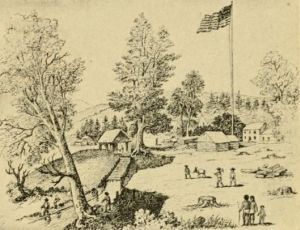
Sutter’s Mill, California, where gold was
first discovered.—From an old print.
393. California opens a New Question.—In spite of the growing estrangement of the sections, even the admission of Texas furnished no definite ground for a positive clash. But the acquisition of California introduced a new element into the political situation. Part of the territory was south of the Missouri Compromise line of 36° 30′, and part was north of it. The inhabitants demanded admission to the Union as a state, and the question at once arose whether California should be admitted as a free or a slave state. The Californians asked to be admitted as a free and undivided state. Their demands were all the more weighty because of the newly acquired importance of California in the eyes of the world.
394. California and the Discovery of Gold.—California was a beautiful region which offered many advantages besides that of rounding out American territory on the Pacific. Its climate was delightful; its soil fertile and capable of varied productions; its forests were valuable. But a greater source of wealth was soon discovered. In January, 1848, an American mechanic named Marshall, in the employ of a Swiss named Sutter, found gold in a mill-race near the Sacramento River. The secret was not kept, and soon every industry in the region was abandoned and thousands of men were washing sand and digging gold out of the cliffs. The news reached Washington late in 1848, and the next year saw a rush for California, the like of which had never been known before. Some adventurers made the long journey overland in caravans formed of vehicles of every sort. Others tried the dangerous voyage around Cape Horn. Others went by ship to Panama, crossed the Isthmus, and took their chances of getting a vessel on the Pacific side. Arrived in California, these “Forty-niners,” as they have since been called, plunged into the wild, exciting life described so well by Bret Harte. Soon a population large enough to demand statehood was assembled, and California began to play its great part in national affairs.[176]
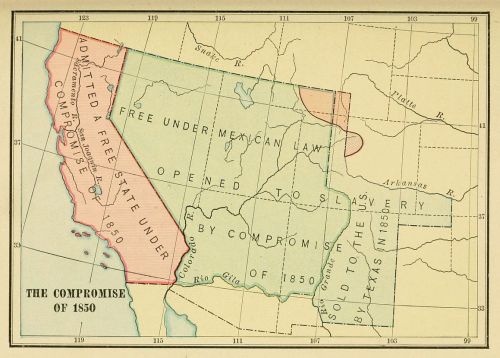
The Compromise of 1850
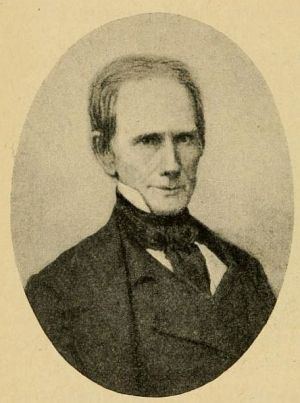
Henry Clay (1847).
395. Doctrines of Clay, Webster, and Calhoun.—There was naturally much excitement over the demand of the Californians, and declarations of a purpose to secede were often heard in Southern conventions. It was for the purpose of bringing the North and the South nearer together, and preventing such a catastrophe, that Henry Clay, the author of the Second Missouri Compromise, now came forward with the famous Compromise of 1850. Before introducing it, he had an interview with Daniel Webster and secured the promise of the latter’s support. The debate on the subject was one of the most memorable in the history of Congress. Clay, in one of the greatest of his speeches, described the dangers of the situation and pointed out that national disaster could be averted only by a reasonable yielding on both sides. Calhoun, nearing his grave, and too feeble even to read his speech, was brought into the Senate in a chair to hear his speech read by a colleague. Reiterating his doctrine of the constitutional right of secession, he maintained that a continuance of the present conditions was impossible. But the greatest interest was concentrated upon Webster. He was universally regarded as the foremost statesman in the North. Though he had often deplored the existence of slavery, and always opposed its extension, his views on the matter of the Compromise now presented were not generally known, and the declaration of his position was awaited with intense anxiety. His speech on Clay’s measure, since commonly referred to as the “Seventh of March Speech,” cast the great weight of his powerful influence in favor of the Compromise. His act was much criticised in the North, and he was freely accused of seeking favor with the Southerners in order to secure their help in the approaching Presidential election, when he expected to be a candidate. But Webster had always been a stanch advocate of the Union, and there was nothing in his present course that was inconsistent with the positions he had uniformly held. The feeling against him, however, became, in many quarters of the North, intensely bitter.
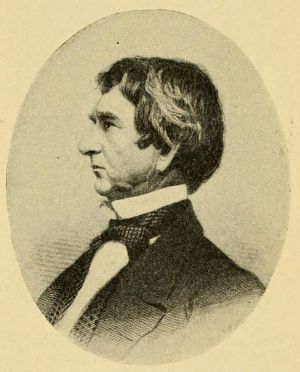
William H. Seward.
[By courtesy of G. P. Putnam’s Sons.]
396. Presidential Policy changed by Death of Taylor.—Before the final passage of the Compromise measures, President Taylor died, July 9, 1850, and was succeeded by the Vice President, Millard Fillmore. Taylor, although a Southerner, had been very largely influenced by William H. Seward,[177] a senator from New York, who had led with great ability the opposition to the Compromise. Taylor did not have a strong Cabinet, and was untrained as a statesman, but he showed, in his short administration, great common sense and firmness, and, had he lived, might have prevailed on Congress to adopt a policy toward California less tortuous than that involved in Clay’s Compromise. Fillmore,[178] who succeeded to the Presidency, although a good man, was not a strong one, and had not been on friendly terms with his fellow New Yorker, Seward. In making up his Cabinet, he made Webster Secretary of State in place of Clayton, of Delaware, and leaned upon the former for advice. The policy of the administration was thus so completely changed that the weight of its influence was at once thrown in favor of the adoption and rigid enforcement of the Compromise legislation.
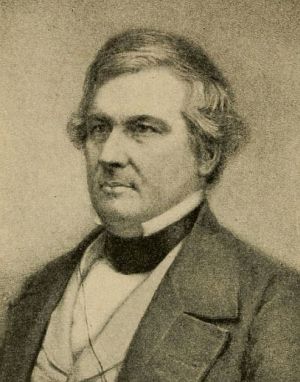
Millard Fillmore.
397. The Compromise of 1850.—The resolutions introduced by Clay were much amended in the course of their consideration, but in final form, as adopted in September, 1850, they covered the following provisions:—
1. California was to be admitted as a free state.
2. New Mexico and Utah were to be organized as territories without any restriction or condition in regard to slavery.
3. The slave trade was to be abolished within the District of Columbia.
4. A Fugitive Slave Law, stringent enough to satisfy the South, was to be passed.
5. Texas was to receive the price she demanded for the land ceded to New Mexico (§ 394, note).
398. New Fugitive Slave Law.—That part of the Compromise which provided for a Fugitive Slave Law was so stringent in its provisions that it defeated its own end, by arousing so vigorous an opposition in the North that it could not be enforced. It had been made retroactive, in order that slaves who had taken refuge in the North before the passage of the act might be seized by United States marshals, and, without trial by jury, forcibly taken to their old masters. This feature of the law had an instantaneous effect on public opinion. It soon came to be seen that the people would not permit men and women who, as they said, had become free by living in a free state, to be taken back into slavery. The law was frustrated in many ways, the framers having overlooked one special weakness in it. Though fugitives were not to be entitled to trial by jury, the right of such a trial was not taken from the rescuers. Many a fugitive was seized from the United States marshals, and the rescuers, when tried, were acquitted by jury.[179] New laws, known as Personal Safety Acts, designed to protect fugitives and frustrate the operation of the Fugitive Slave Law, were passed by the New England states and by New York, Pennsylvania, Indiana, Illinois, Michigan, Wisconsin, and Iowa. These were specially referred to as a cause of complaint in the South Carolina Act of Secession. For these various reasons, the number of slaves actually returned was very small, and both sections were dissatisfied with the result.
399. “The Underground Railroad.”—There was also organized a system to assist fugitives to escape to Canada, where they could not be arrested. Stations were established, generally at private houses, where runaway slaves could be concealed in the daytime and helped forward to the next station in the night. The founder of this system was Levi Coffin, a Quaker living near Philadelphia, who for several years helped into freedom as many as one hundred slaves a year. This system, known as the “Underground Railroad,” gradually extended from the East as far west as the Missouri river. Thus, while the Fugitive Slave Law greatly inflamed the North, the ways in which it was frustrated greatly inflamed the South.
400. New Leaders.—Soon after the passage of this obnoxious law, Calhoun, Clay, and Webster died. They were succeeded in influence by younger men, of more strenuous beliefs and methods. Of these William H. Seward of New York, Charles Sumner of Massachusetts, and Salmon P. Chase of Ohio were prominent representatives of the anti-slavery element, while Stephen A. Douglas of Illinois, Jefferson Davis of Mississippi, William L. Yancey of Alabama, and Alexander H. Stephens of Georgia were the most influential leaders on the other side.
401. The Clayton-Bulwer Treaty.—Although the Compromise of 1850 overshadows every other event of the period covered by this chapter, it should not absorb the student’s entire attention. Early in General Taylor’s administration, certain international affairs of importance became pressing. In 1826, the matter of a ship canal across Nicaragua or Panama had been advocated by Henry Clay. “The benefits of such a canal,” Clay wrote, “ought not to be exclusively appropriated to any one nation, but should be extended to all parts of the globe.” In the course of the following twenty years, Jackson and Polk often reverted to the subject in the same general spirit. When John M. Clayton of Delaware entered upon his duties as Taylor’s Secretary of State, he found that the question demanded immediate consideration, for the reason that two capitalists, one American and one British, were contemplating the construction of such a canal across Nicaragua. The result was that on April 19, 1850, what is known as the “Clayton-Bulwer Treaty” was signed in Washington by Secretary Clayton and Sir Henry Lytton Bulwer, the British Minister. The treaty provided that the two powers should guarantee the neutrality and security of the canal when completed, and they invited all friendly states to enter into similar stipulations with them, “for the benefit of mankind, on equal terms to all.” This treaty was afterward to be the subject of not a little embarrassment (§ 680).
402. Railways and Steamships.—The passage of the Compromise of 1850 seemed to promise peace with regard to slavery; but the aid given by the South to attempts to conquer Cuba, especially those of Narciso Lopez,[180] proved to thoughtful minds that sectional strife had been allayed, not completely suppressed. Yet even then American industry and enterprise were forging links of union against which sectional strife could not long prevail. Before 1852, over ten thousand miles of railway track had been laid in the United States, mainly in New England, the Middle states, and the Northwest. The New York and Erie road became a rival of the famous Erie Canal, and its completion in the spring of 1851 was the occasion of a Railway Jubilee, which was attended by Fillmore and his Cabinet. Later in the year, a similar celebration was held in Boston. On the ocean, also, speedier transportation was obtained. The British Cunard Line and the American Collins Line ran races for Europe, and travel was considerably stimulated. On the inland waters navigation increased rapidly; but, owing to a lack of proper inspection, many steamers took fire and great loss of life ensued. The spread of the telegraph over the country also brought distant points into contact in a way that would have been deemed incredible a generation before.
403. Kossuth’s Visit.—The great growth in population, the acquisition of vast territories, the surprising industrial and commercial development, were not only uniting the people of America, but were stimulating their emotional nature. The quiet, staid country of two generations before no longer existed. Popular furores became possible and a love of the spectacular was developed. Barnum, the showman, laid the foundations of his fortune. Newspapers rivaled one another in securing news quickly. International yacht races were begun. Distinguished men went on lecture tours through the country. Great authors and actors came from abroad to receive American hospitality and applause. There were women’s rights conventions and agitations in behalf of temperance.[181] But all these elements of excitement were thrown into the shade by the visit of Louis Kossuth, the great Hungarian orator who had vainly attempted to secure the independence of his native land and was now an exile. Invited by Congress, Kossuth late in 1851 reached the United States, on the man-of-war Mississippi. He was received with an enthusiasm unequaled in our history, save on the occasion of Lafayette’s visit. Receptions were given him in all the chief cities, and he astonished his hearers by the ease and power with which he spoke English. But he made the mistake of trying to persuade the people that the policy of non-interference in European affairs, established by Washington, was an erroneous one. A few politicians, for party purposes, seconded his proposal that the United States should intervene in behalf of Hungary. But the nation at large held aloof from him; the novelty of his visit wore off; and the great orator returned to Europe a disappointed man.
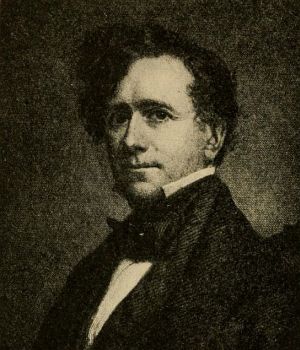
Franklin Pierce.
404. The Campaign of 1852.—The next excitement was caused by the Presidential campaign. The Democratic convention held at Baltimore,—the most convenient convention city in those days,—after much balloting, set aside the chief candidates, Cass of Michigan, Douglas of Illinois, Buchanan of Pennsylvania, and Marcy of New York, and chose General Franklin Pierce[182] of New Hampshire, a man who hitherto had attracted little attention. He had served in the Mexican War, and was upright in character; but he possessed a mind little capable of guiding the country in the great crisis that was approaching. His friendship with Jefferson Davis and other Southern leaders foretold his alliance with the advocates of slavery; but as people thought the slavery question settled by the Compromise of 1850, this did not interfere with his chances at the polls. William R. King of Alabama was nominated for Vice President, and the Democrats went into the campaign with great hopes of success. On the other hand, the Whigs were divided and depressed. After a hard struggle, Fillmore—who had made many enemies by signing the Fugitive Slave Law—and Daniel Webster had to yield the nomination to General Winfield Scott, who was far from popular. Shortly afterward, the deaths of Clay and Webster (who was bitterly disappointed and hostile to Scott) robbed the party of its real leaders; important Southern Whigs held aloof from Scott; the Free Soil party put up candidates of its own; and the hero of the march to Mexico was badly beaten by a younger and inferior man. Pierce had two hundred and fifty-four electoral votes to Scott’s forty-two. The ambiguous attitude of the Whigs toward the slavery question had hopelessly split the party asunder. Scott’s personal unpopularity also partly accounts for the overwhelming character of the defeat suffered by the Whigs; and doubtless there was a general desire to give the Compromise a fair chance under the Democrats, who heartily favored it.
References.—See end of Chapter XXVI.
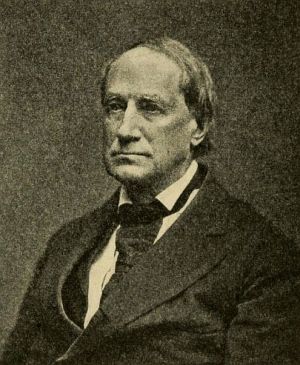
Caleb Cushing.
405. Character of Pierce’s Administration.—The passage of the Kansas-Nebraska Bill and the war in Kansas are the most important features of Pierce’s administration (§§ 411-414). The new President, being amiable and weak, yielded to the counsels of Jefferson Davis and Caleb Cushing[183] of his Cabinet, and took a strong pro-slavery position, with the result that he speedily lost his popularity, save in the South. At first, however, he pleased most of his fellow-citizens, especially on such occasions as his visit to the World’s Fair at New York in 1853, where he made a glowing speech. But although Pierce himself is almost forgotten, his administration is of great importance to the student, since its leading events and measures were most instrumental in bringing on the Civil War.
406. The Know-Nothings.—Pierce’s administration was distinguished by the rise of a new, short-lived party, which for a time caused apprehension in the older organizations, and had much to do with the overthrow of the Whigs. This was the American party, which became prominent in 1852. Its members were popularly known as “Know-Nothings,” because, being bound by oath to reveal nothing concerning their organization, they always answered inquiries in this negative fashion. It had “lodges,” which sent delegates to secret nominating conventions, and its strength could not be gauged before an election. Its chief object was to prevent foreigners from being too easily and speedily naturalized and to elect native-born Americans to office. Similar organizations had existed before and have been developed since; but the American people have never long tolerated illiberal and secret parties. The Know-Nothings carried some state elections and put candidates in the field for the campaign of 1856, but they soon after disappeared from the political stage. The party furnished a refuge to many Whigs, particularly from the South, for it was neutral on the slavery question. Its growth was accelerated by the bad influence on local politics, especially in New York City, exerted by the crowds of ignorant foreigners who sought our shores after the Revolution of 1848 and the great Irish famine. Nothing could have been more disgraceful than the corrupt municipal government of New York City about this time, and many citizens feared that the rest of the country would be contaminated.
407. Attempts to Secure Cuba.—Attempts to seize territory to the south in the interests of slavery, continued during Pierce’s administration. In 1853, a bold adventurer named William Walker gathered rash followers and made an attack on Lower California, which completely failed. The next year, leading Southerners like General Quitman, an adopted citizen of Mississippi and a distinguished soldier in the Mexican War, tried to secure Cuba by forcing the United States into a war with Spain on account of the confiscation of an American steamer, The Black Warrior. This attempt was merged in the intrigues that produced the Ostend Manifesto.
408. The Ostend Manifesto.—On the 16th of August, 1854, William L. Marcy, Pierce’s Secretary of State, wrote to Pierre Soulé, the American minister at Madrid, that “much advantage might accrue from an interchange of views between himself, Buchanan, and Mason” (the Ministers to Great Britain and France) “in regard to the acquisition of Cuba.” Accordingly, these three Ministers met at Ostend, Belgium, and after a conference of a few days, promulgated the paper known as the “Ostend Manifesto” (October 18, 1854). They declared, first, that Cuba should belong to the United States; second, that the government might well offer for the island the sum of one hundred and twenty million dollars; and third, that if Spain would not accept this sum, the matter of conquest ought to be considered. The manifesto was generally well received in the South, but in the North it was characterized as “the manifesto of brigands.”
409. Filibustering.—Soon Central America attracted the filibusters, as these adventurous invaders of peaceable states were called. In 1854 a little place named Greytown, on the Mosquito coast, was bombarded by an American ship for no very good reason. The next year, Walker interfered in a revolution in Nicaragua, and for a while got control of the state by making a creature of his, named Rivas, president. The new government was recognized by Pierce, but was shortly after overthrown.[184]
410. Perry’s Expedition.—Although the disgraceful actions of the filibusters and the war in Kansas seem to mark Pierce’s administration as a thoroughly discreditable one, it was not without bright features. In 1854 a commercial treaty with Japan was secured as the result of a naval expedition which had been sent out in 1852 under Commodore Matthew C. Perry. This treaty, which was promulgated in 1855, is memorable as opening a place for Japan among the great nations of the world.
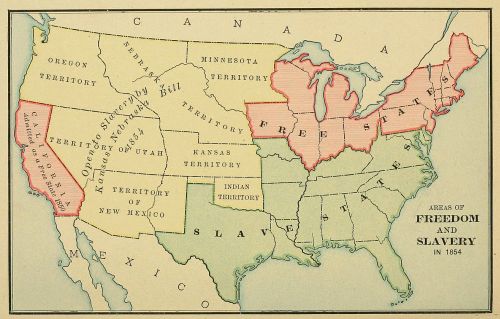
Areas of Freedom and Slavery in 1854
411. Disappointment of the South: Kansas-Nebraska Bill.—The South was not only unable to secure Cuba and other slave territory, but could not help seeing that the advantage it had anticipated from the Fugitive Slave Law could never be realized. Some new measure was necessary, or all the benefits of the Compromise would go to the North. Such a measure presented itself in the Kansas-Nebraska Bill, put forward by Senator Douglas of Illinois. This bill was framed on the untenable theory that the Missouri Compromise had been overthrown by the Compromise of 1850, and that the provision that slavery could not exist north of 36° 30′ was no longer binding. In accordance with this theory, the author of the bill proposed that the Missouri Compromise should be declared “inoperative and void as being inconsistent with the principle of non-intervention by Congress with slavery in the states and territories.” It was also proposed that all the lands of the Louisiana Purchase north of 36° 30′ should be organized as territories and in due time should be admitted as states, either free or slave, as the voters of each territory might determine. The great question was thus to be settled, not by United States law, but by what came to be called “Popular Sovereignty.”
412. Indignation of the North.—The bill aroused the greatest political agitation the country had ever known, for the opponents of the measure took the ground that it turned over to possible slavery a vast tract that had forever been dedicated to freedom. They said it was an outrageous violation of contract to take away half of the Missouri Compromise, when the advocates of slavery had enjoyed the advantage of the other half, as they had in the admission of Missouri as a slave state above the line of 36° 30′. The bill was opposed with the utmost vigor by Seward, Sumner, and other anti-slavery leaders, but it was passed and became a law, May 30, 1854.
413. Occupation of Kansas.—Now began a race for the settlement of the new territory, as the only possible way in which freedom could be protected. As Kansas bordered on Missouri, it was evident that here was to be the battle ground. Slave owners from Missouri rushed in to take possession of the soil, but the people of the North were not slow to see the danger. An Emigrant Aid Society was quickly organized in Massachusetts, by Eli Thayer, to encourage and fit out emigrants to the new territory. Though the slaveholders were first in the field, people from the North soon followed in ever increasing numbers. Party spirit ran so high that collisions were inevitable. There was universal disorder and some bloodshed. Guerrilla bands of both parties wandered over the country and fought wherever they met. On the 21st of May, 1856, the town of Lawrence, the headquarters of the anti-slavery party, was attacked by marauders from Missouri, popularly known as “Border Ruffians,” and several of the most important buildings were sacked and burned. Three days later, a deliberately planned massacre of slave owners was perpetrated in retaliation, at Pottawatomie, by an anti-slavery band led by John Brown.
414. Advantages of the North in the Contest.—The anti-slavery cause was helped by the unusual severity of the winter of 1855–1856, which made it evident that slavery could not prosper in Kansas. The largest slaveholder in the territory was obliged, with his own hands, to cut and haul wood to keep his negroes warm, and even then one of them froze to death in his bed. Meanwhile, the Free State men increased rapidly in numbers.
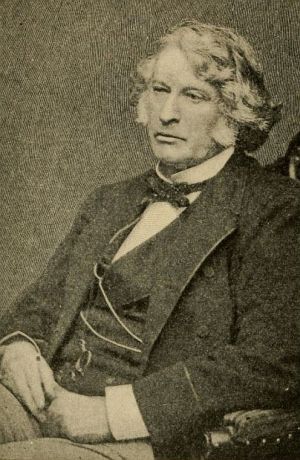
Charles Sumner.
415. Assault upon Sumner.—While the Kansas question was raising to a white heat all sections of the country, an event occurred to intensify the excitement. In the course of the long debate in Congress on the Kansas troubles, Charles Sumner,[185] on the 19th and 20th of May, 1856, delivered his celebrated speech, “The Crime against Kansas.” It was the most terrible philippic ever uttered in the Senate, and it exasperated the men of the South beyond measure. Particularly severe was Sumner’s attack on Senator Butler, of South Carolina. Two days after the delivery of this speech, Sumner was writing a letter at his desk, after the Senate had adjourned, when he was approached by Preston S. Brooks, from South Carolina, a nephew of Butler and a member of the House of Representatives. Brooks struck Sumner repeated blows on the head with a cane and felled him to the floor. The injuries Sumner received affected his spine and were so serious that it was more than three years before he could be restored to a fair amount of vigor. While, in the South, a few persons deprecated the assault, Brooks was welcomed by the masses as a hero. In the North the attack was universally condemned, and stirred the deepest indignation. An effort was made in the House of Representatives to expel Brooks, but only one Southerner voted for his expulsion, and the motion failed to receive the necessary two-thirds majority. A severe vote of censure, however, was passed by a large majority; whereupon Brooks resigned his place, and appealed to his constituents for indorsement and reëlection. In the election that followed, only six votes were cast against him. The speech, the assault, and the indorsement of Brooks inflamed every part of the country.
416. Origin of the Republican Party.—It was during the excitement that followed the assault on Sumner that politicians prepared for the coming Presidential election of 1856. The overwhelming defeat of the Whigs at the election in 1852 seemed at the time to give the Democrats a long lease of power. In reality, they soon found themselves confronted by political foes more determined than the Whigs. The old Whig party had been shattered by differences on the question of slavery. Evidently there was call for a new party on the great questions now at issue, and the Republican party was the result. At a political meeting held at Ripon, Wisconsin, in May, 1854, it was resolved that another party should be formed and that it should be called “Republican.” It is generally admitted that the first formal adoption of the name, which was probably due to a suggestion of Horace Greeley, and the publication of an elaborate platform were the work of a convention held at Jackson, Michigan, on the 6th of July following. The new party designation was immediately adopted by state conventions in Maine, Ohio, Indiana, Illinois, Wisconsin, and Iowa. So extremely vigorous was the organization of the Republicans, that, in the fall of 1854, they elected enough members to control the House of Representatives and chose as Speaker, Nathaniel P. Banks, of Massachusetts. The first National Convention of the party was held at Pittsburgh on February 22, 1856; but it was not until June 17, at Philadelphia, that a platform was adopted and candidates for the Presidency and Vice Presidency were chosen. The platform declared that “the Constitution confers upon Congress sovereign power over the Territories of the United States for their government, and that in the exercise of this power, it is both the right and the imperative duty of Congress to prohibit in the Territories those twin relics of barbarism, polygamy and slavery.” Upon the stand thus taken, the Republicans soon secured political supremacy in the North and West.
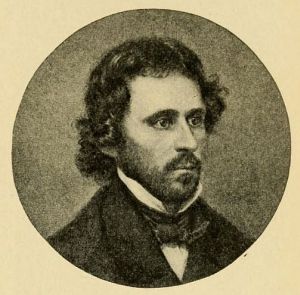
John C. Frémont.
417. The Campaign of 1856.—The Republicans nominated John C. Frémont[186] of California, a famous explorer of the West, for President, and William L. Dayton of New Jersey for Vice President. The Democrats, shelving the now unpopular Pierce, nominated James Buchanan,[187]—a weak character, far past the prime of life, but a man who had held high positions and was likely to carry the important state of Pennsylvania. John C. Breckinridge of Kentucky was chosen as Buchanan’s running mate. Buchanan won at the polls, securing one hundred and seventy-four electoral votes to Frémont’s one hundred and fourteen. But the Republicans had made a better fight than any new party had ever done before and had carried most of the Northern and some of the Western states. It was evident that the country was being divided sectionally in politics,—the North and West being destined to become more and more anti-slavery, or Republican, the South to be overwhelmingly pro-slavery, or Democratic. Many persons, especially in the South, argued that this state of things would warrant a dissolution of the Union, since the North and West combined might be strong enough to interfere with slavery in the states.
References.—See end of Chapter XXVI.
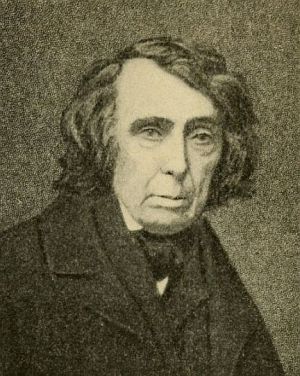
Roger B. Taney.
418. Dred Scott Decision.—Two days after Buchanan’s inauguration, the Supreme Court rendered a decision that had a tremendous influence on public opinion with regard to the question of slavery. A colored man, Dred Scott by name, was held as a slave in Missouri, but having been taken by his master into Illinois and Minnesota, he brought suit in a United States court to establish his freedom. The question finally reached the Supreme Court, where a decision was rendered March 6, 1857. The court held:—
1. That negroes had not been regarded as citizens by the framers of the Constitution, and that, therefore, they could not bring suit in a United States court.
2. That the Constitution recognizes the right of property in slaves, and recognizes no difference between such property and any other, and that therefore Congress could not limit the right of property in slaves, even in the territories.
3. That the Missouri Compromise, limiting the right of property in slaves, was unconstitutional, and therefore null and void; and that, therefore, slave owners could carry their slaves into any part of the territories, and hold them as such without regard to the line established by the Missouri Compromise.
The opinion was rendered by Chief Justice Taney,[188] and was assented to by a majority of the court. Justices McLean and Curtis, however, dissented, and Curtis presented an elaborate dissenting opinion. The importance of the decision lay in the fact that it was an authoritative approval by the Supreme Court of views advanced by Calhoun, and generally indorsed by the South.
419. The Dissenting Opinion.—The North, naturally, accepted the views of the dissenting opinion, which held:—
1. That free negroes had been citizens before the adoption of the Constitution.
2. That the Constitution had not limited the rights of such negroes as citizens.
3. That as many as seven Acts had been passed by Congress limiting slavery in the territories, and that these Acts had been assented to by Presidents who had been in the Constitutional Convention.
4. That the constitutionality of these Acts had never been questioned.
5. That the validity of the Missouri Compromise was not before the court, and that the dissenting Justices did “not hold any opinion of this court, or any court, binding when expressed on a question not legitimately before it.”
420. Influence of the Decision.—The far-reaching effects of this decision were at once apparent. The Republican party had been organized on the fundamental avowal that it was the duty of Congress to keep slavery out of the territories (§ 416). But if Congress had no constitutional right to interfere with slavery in the territories, the Republican party could have no right to exist. The decision also shattered Douglas’s doctrine of Popular Sovereignty; for, if Congress had no right to exclude slavery, it could not confer such a right upon the territorial legislature. The South asked, “What are you going to do about it?” The North virtually replied that it adopted the view of Justice Curtis and rejected the decision as of no binding force. Many persons in the North accepted a doctrine that had some time before been promulgated by Mr. Seward,—that there is a “higher law” of right and morality than that of the Constitution.
421. Abolition Orators.—Public feeling during these years was much intensified in the North by the political speeches delivered by accomplished orators in various parts of the country. The most prominent of these speakers was Wendell Phillips of Boston, who gave his life chiefly to anti-slavery agitation and exerted a vast influence. His work was supplemented effectively by the speeches of Theodore Parker, George William Curtis, Theodore Tilton, Anna Dickinson, and others.
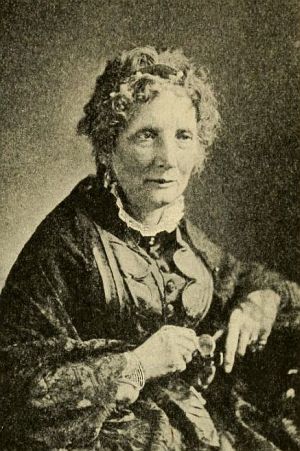
Harriet Beecher Stowe.[189]
422. Two Important Books.—In the course of this agitation, public opinion was greatly affected by the appearance of two very important books on the subject of slavery. Mrs. Harriet Beecher Stowe’s Uncle Tom’s Cabin appeared in 1852. Its object was to represent the horrors of slavery, and it proved to be one of the most influential novels ever published. Though it was intended to represent slavery in the strongest possible light, the picture was somewhat relieved for the people of the South by the fact that the worst characters in the book were “renegades” from the North. Over three hundred thousand copies were sold within a year of its publication, and in the course of five years it had powerfully inflamed the feelings of all the Northern people. In 1857, appeared H. R. Helper’s Impending Crisis of the South. It was written by a representative of the “poor white” class of North Carolina, whose purpose was to arraign slavery from the point of view of the Southern free white laborer. The author described Southern society, and showed how slavery had reduced the poorer white people to a condition of abject misery. The book did much to arouse the fears of the Southern slave owners.
423. Buchanan’s Weakness.—Meanwhile, President Buchanan had been showing in many ways that he did not realize the gravity of the situation. He was an old man and inclined to rely on Democratic leaders of strong pro-slavery proclivities. Thus, although himself a Northerner, he had little support from his own section. His Cabinet contained four Southerners, while the Secretary of State, General Cass, was a sympathizer with the Southern attitude toward the slavery question. Eventually this Cabinet was broken up and a stronger one obtained (§ 441), but not before many of the departments, especially those of War and of the Treasury, were reduced to a state of great disorganization. Indeed, so badly were the finances of the nation managed, that treasury notes had to be issued in order that national insolvency might be avoided. Yet more than once President Buchanan proposed to Congress that Cuba should be purchased, and recommended other rash legislation, which, if carried out, would probably have led to a war with Mexico and the states of Central America.
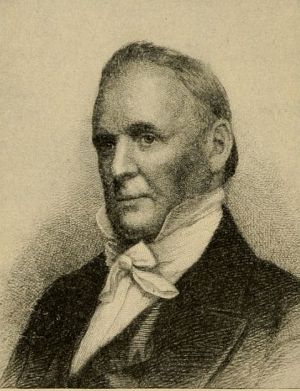
James Buchanan.
424. Affairs in Kansas.—One of Buchanan’s most important appointments was that of Robert J. Walker of Mississippi, who had been Secretary of the Treasury under Polk, as governor of Kansas. Walker understood that he was to cease trying to force slavery upon the Kansas settlers, but was rather to attempt to make the territory a state favorable to the Democrats. On this understanding he succeeded in inducing the friends of freedom to vote for members of the territorial legislature, with the result that they obtained a clear majority in that body. But the slavery advocates, at a convention held at Lecompton, adopted a constitution favoring slavery, with a proviso that the article relating to the institution was the only one that should be submitted to the people for ratification. Fearing some trick, the Free State people stayed away from the polls, and the Lecompton constitution was easily carried by a partisan vote. Walker then went to Washington in order to protest against conduct which, it was believed, was connived at by the administration. He found that Buchanan and his advisers were hearty advocates of the Lecompton constitution, whereupon he resigned his governorship.
425. Failure of the Lecompton Scheme.—Meanwhile, the Free State legislature of Kansas had submitted the whole Lecompton constitution to the people, and it had been rejected by over eleven thousand majority. Yet Buchanan, in a special message to Congress, urged the admission of Kansas as a state under the obnoxious instrument. A long and fierce debate was the result, Senator Douglas, to his credit, standing out against the majority of his party. The pro-slavery Democrats were obstinate, in spite of many warnings, and pushed matters to a vote. The administration’s measure for making Kansas a slave state passed the Senate, but failed in the House. Later a discreditable bill attempting to bribe Kansas to come in under the pro-slavery constitution passed Congress; but the Kansas people refused by a large majority to enter the Union hampered by slavery, even if they could thereby acquire a large grant of public lands. The bill which offered Kansas this bribe was popularly known as “Lecompton Junior.” After it was rejected by the Kansans, affairs in the region became comparatively quiet. The territory was not finally admitted as a state until 1861.
426. The Mormons.—Buchanan was more successful in his dealings with the Mormons of Utah. This religious sect was founded in 1830 by their Prophet, Joseph Smith, and was forced to move steadily westward from the State of New York. They settled first in Ohio, then in Illinois, where in 1840 they founded the town of Nauvoo. These Latter-Day Saints, as they were called, soon had troubles, without great fault of their own, with the authorities of Illinois, in the course of which Smith was arrested. Shortly after he was shot by a mob (June 21, 1844). Brigham Young was chosen leader of the new church in the Prophet’s place, and the next year the Mormons left Illinois. After many vicissitudes, a settlement was made in Utah, and Salt Lake City was founded in 1848. The next year, Young was elected governor of Deseret, as the territory was first named. In 1850 Congress established the Territory of Utah, and, in 1851, Young became its authorized governor. In 1852 he proclaimed polygamy to be a tenet of the Mormon church. This and other causes led to difficulties with judges and other officers of the United States, who in consequence left Utah.
427. Buchanan’s Management of the Mormon Difficulty.—Affairs soon reached such a pass as to require the removal of Brigham Young from his position as territorial governor, the Mormon desperadoes, under the name of Danites, or “destroying angels,” having inaugurated a small reign of terror. Buchanan supported the newly appointed governor, Alfred Cumming, with forces under General Albert Sidney Johnston, who was much harassed, however, by the destruction of his supply trains. Congress hesitated to give the President all the troops needed, for fear he might use them in Kansas; but he managed the affair well, notwithstanding, and with augmented forces and judicious pardons secured comparative tranquillity in Utah before the summer of 1858. But Congress still refused to give so strange a sect the right either to form a state or to elect their own officers.[190]
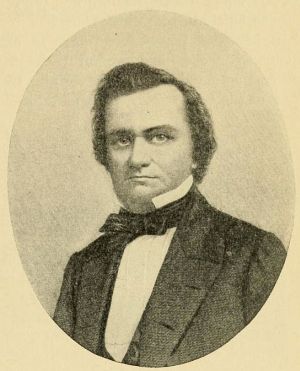
Stephen A. Douglas.
428. Lincoln and Douglas.—The people of the settled portions of the country were more interested in a picturesque political campaign than in the pacification of a far-off territory. The term of Senator Douglas was to expire in 1859, and he appealed to public opinion in Illinois for reëlection. The Republicans put forward Abraham Lincoln as their representative to oppose him. The men were unlike in almost every respect. Douglas[191] in early life had come from Vermont to Illinois, where he had risen to distinction as a lawyer and a debater. In public speech he was keen, ingenious, and powerful, and his leadership of the movement in behalf of Popular Sovereignty had given him a national reputation. Lincoln,[192] on the other hand, had been born to the most abject poverty in Kentucky, and in early life had moved with his parents to Indiana, and then to Illinois. In his boyhood he had lived in a log hut, and had picked up almost the whole of his education by reading and study at odd moments. At length he studied law, and, though never a learned lawyer, he early showed remarkable power in discovering the turning point of a case, and presenting it with such clearness and force that he was very successful. By a careful study of a few of the best writers, he made himself a master of accurate and powerful English speech. He also became very skillful as a judge of human nature and in the art of persuading an audience. To these great qualities he added the still greater one of an honesty and integrity of thought and character so pronounced and transparent that he was generally respected and loved. At the time of this senatorial contest, Lincoln was forty-nine years of age; Douglas was forty-five.
429. The Lincoln-Douglas Debates.—In the spring of 1858, Lincoln challenged Douglas to a series of public debates on the great questions of the day. They arranged for seven meetings in different parts of Illinois, and those meetings are memorable for the thoroughness with which questions then agitating the nation were discussed. Lincoln at the outset announced the Republican doctrine that slavery was entitled to the protection of Congress where it existed, but that it could and ought to be prevented from going into the territories where it did not already exist. Douglas, throughout the discussion, held that the Dred Scott Decision was binding, and tried to reconcile it with the notion of Popular Sovereignty. Lincoln very shrewdly saw the impossibility of reconciling these two views, and used his advantage with great skill and vigor.
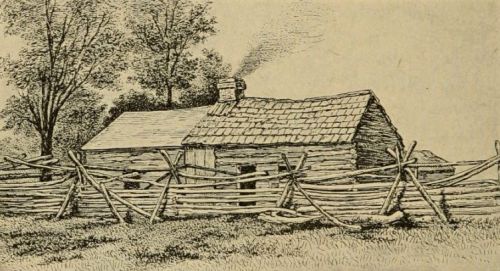
A Typical Pioneer’s Cabin.
Built by Lincoln’s father when he moved to Illinois.
430. The Freeport Doctrine.—The turning point in the debates was at Freeport, where Lincoln put to Douglas this question: “Can the people of a United States territory, in any legal way, against the will of any citizen of the United States, exclude slavery from its limits prior to the formation of a state constitution?” The Republican committee managing the campaign, urged Lincoln not to ask Douglas the question. They said, “If Douglas answers ‘yes,’ he will surely be elected, because the people of Illinois believe in Squatter Sovereignty.” Lincoln’s reply was in substance: “Very well, if he answers ‘no,’ he cannot be elected senator in Illinois. If he answers ‘yes,’ as from his Squatter Sovereignty doctrine he will be obliged to do, he will offend the South in such a way that he cannot be elected President in 1860. I am looking for the larger game.” Lincoln insisted upon asking the question, and his prediction proved true. Douglas answered “yes,” and tried to reconcile Squatter Sovereignty with the Dred Scott Decision, in what came to be known as the “Freeport Doctrine”; but Lincoln pointed out with great power that such a reconciliation was absolutely impossible. Though Douglas was reëlected to the Senate, as the Republican committee predicted he would be if the question were asked, the rift in the Democratic party soon made it apparent that its Northern and Southern sections could not unite on any one candidate for President. Lincoln had accomplished his object, though he had lost the senatorship.
431. Other Speeches of Lincoln and Douglas.—In 1859, Douglas spoke and wrote much, in order to define his position on the relations of the Federal power and the power of the individual states. In all his utterances he often referred to the positions held by Lincoln, and, especially in the South, he tried to recover what he had lost in the discussion of what was known as the “Freeport Doctrine.” Lincoln delivered, at Columbus and Cincinnati, speeches which pointed out with merciless logic the impossibility of Douglas’s contention. These speeches tersely reproduced the arguments he had used in Illinois, and in print they had an enormous circulation. Lincoln’s prominence, moreover, was greatly increased by a masterly speech on February 27, 1860, at the Cooper Institute, in New York City. Taking as his subject, “The Crisis,” he analyzed the situation, and presented it with a logical force and clearness which placed the speech in the highest rank of argumentative orations. This speech, and those he immediately afterward made in New England, caused Lincoln to be better known throughout the East; he was already very popular in the West.
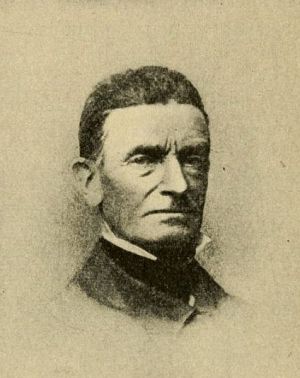
John Brown.
432. John Brown’s Raid.—In the later months of 1859 the country in all its parts was greatly moved by a fanatical attempt to induce the slaves of Virginia to revolt and insist upon freedom. John Brown,[193] who, as we have seen, played a conspicuous part in the Kansas difficulties, held the views of the abolitionists with all the stern severity of a seventeenth century Puritan. He believed that slavery was the “sum of all abominations,” and that he must devote himself to its overthrow. In July, 1859, he rented two houses on the Maryland side of the Potomac, about four miles from Harper’s Ferry. Here arms were collected, and on the 16th of October Brown mustered eighteen men, five of whom were negroes, for his intended attack. They cut the telegraph wires, and seized the watchman on the bridge; then, crossing to the Virginia side, Brown and two followers broke into the United States armory, and, binding the watchman, remained on guard. Before midnight he was master of Harper’s Ferry. But the inevitable result followed. The negroes refused to revolt, and soon the raiders were surrounded by an overwhelming force. They fought desperately, and did not surrender until, of the nineteen, ten had been killed. Four escaped and five were taken prisoners. Brown himself, after receiving several wounds in the head and body, was cut down and captured. Notwithstanding his wounds, he was brought to trial eight days after his arrest and, after a fair examination, was condemned to be hanged on the 2d of December. He died in the unwavering belief that he had contributed to a great cause. Almost the whole nation was thrown into an uproar. Republicans generally disavowed and condemned the act, but the people of the South had their fears multiplied.
433. Resolutions of Jefferson Davis.—On February 2, 1860, Jefferson Davis, who had already come to be recognized as the ablest leader of the Southern Democrats, submitted to the Senate a series of resolutions designed to formulate the Southern party doctrine. The most significant and important of these resolutions was the fourth, which declared that “neither Congress, nor a Territorial Legislature, whether by direct legislation or by legislation of an indirect and unfriendly character, possesses power to annul or impair the constitutional right of any citizen of the United States to take his slave property into the common territories, and there hold and enjoy the same while the territorial condition remains.” This resolution was no doubt intended not only to formulate a doctrine for the guidance of the South, but also to inflict a fatal stab upon Douglas, for the Illinois Senator had taken the ground, in the “Freeport Doctrine,” that notwithstanding the Dred Scott Decision, the people of a territory could make slavery impossible by what he called “unfriendly legislation.”
434. Movements of Public Opinion in the South.—While these discussions were going on in the North, public opinion was also taking form in the South. In various conventions, notably the one held at Nashville in 1850, much had been done to foster disunion sentiments. Secession seemed on the point of immediate accomplishment, and would very probably have taken place, but for the opposition of some of the leading Whigs of the South and the adoption of the Compromise of 1850. Although the crisis in that year was tided over, the South did not cease to proclaim that if ever a President should be elected by a sectional vote secession would inevitably follow. Alexander H. Stephens, of Georgia, and some of the other leading Whigs attempted to oppose the movement as impolitic and unlikely to succeed, but they were swept away by an irresistible tide of public opinion, led by the more strenuous of the politicians. This movement increased in violence from 1850 to 1860. The fact that the reopening of the foreign slave trade was boldly advocated in various trade conventions, shows plainly how far the extreme pro-slavery men were willing to go.
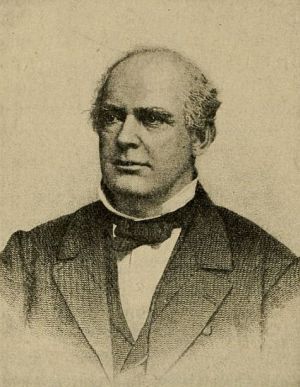
Salmon P. Chase.
435. Democratic Nominating Conventions.—The first outbreak of the coming storm occurred in the Democratic National Convention of 1860. This was held in Charleston, South Carolina, and lasted from April 23 to April 30. The delegates of the South were marshaled by William L. Yancey of Alabama; those of the North by Senator George H. Pugh of Ohio. The main contest was over the majority and minority reports of the Committee on Platform. While the Southern delegates demanded a declaration in accordance with Davis’s resolution that neither Congress nor any territorial government had the right to legislate in regard to slavery in any territory, the delegates of the North planted themselves firmly on the “Freeport Doctrine” of Popular Sovereignty. The storm raged with the utmost fury, in the midst of which Yancey declared that if the Popular Sovereignty doctrine were adopted, the Southern delegation would withdraw from the Convention. The followers of Douglas secured a majority, whereupon Yancey and his followers made good their threat, and marched out. This was the beginning of practical secession. Though the remaining delegates were a majority, they were not two-thirds of the Convention, and, therefore, no nomination under the rule of Democratic conventions could be made. The seceding faction adjourned to meet at Richmond, June 11, the others at Baltimore, June 18. An attempt was made to unite them at Baltimore, but both sides were firm, and the effort was fruitless. The consequence was that the Democrats finally made three nominations. John C. Breckinridge, of Kentucky, was the candidate of the Southern wing; Stephen A. Douglas, of Illinois, of the Northern; and John Bell, of Tennessee, of the Conservatives, who vainly hoped still to bring the factions together. Thus the predictions of Lincoln were abundantly fulfilled.
436. The Republican Nominating Convention.—The Republican Convention met on the 16th of May, in Chicago. Seward was the most prominent candidate, but the names of Chase[194] of Ohio, Cameron of Pennsylvania, Dayton of New Jersey, and Bates of Missouri were all presented by the delegates of their respective states. Lincoln’s name showed great strength, as he was supported not only by Illinois, but also by many votes from Indiana, Kentucky, Ohio, and New England. The platform adopted was in strict accordance with all Lincoln’s private and public utterances. It advocated no interference with slavery where it existed, no extension of slavery into the territories, and no reopening of the slave trade. On the first ballot, Seward had one hundred and seventy-three and one-half votes, and Lincoln followed with one hundred and two. On the second, Seward had one hundred and eighty-four and a half, and Lincoln one hundred and eighty-one. The excitement was tremendous. The number necessary for a choice was two hundred and thirty-three. On the third ballot, Lincoln had two hundred and thirty-one and a half, while Seward had fallen back to one hundred and eighty. There was no resisting the tide. Before the figures were removed, a delegate from Ohio sprang upon his chair, and reported a change of four votes from Chase to Lincoln. In an instant, one of the tellers shouted, “Lincoln!” whereupon it seemed as if the ten thousand persons present had become insane with enthusiasm. A cannon on the roof of the hall announced the result to the city in accordance with a preconcerted understanding. The chairman of the New York delegation, William M. Evarts, then moved that the nomination be made unanimous. This harmonious result was welcomed by Republicans in all parts of the country.
437. The Presidential Canvass.—The campaign was conducted with a vigor and an enthusiasm that had not been known since 1840. Lincoln made no speeches and wrote no letters for publication, but made himself accessible at Springfield to all callers who might care to meet him. But such a course was not followed by the Democrats. No progress was made toward reunion. On the contrary, the Breckinridge, or Southern wing, waged unrelenting war on Douglas, both in discussion and in the promise of distribution of patronage. Douglas was not slow to retaliate. He entered at once on an extensive campaigning tour and made speeches in many states, both North and South.
438. The Position of Douglas.—The most important utterance of all the campaign was one made by Douglas at Norfolk, Virginia. He was asked in writing whether he was in favor of maintaining the Union by force. He declared, without a moment’s hesitation: “I answer emphatically that it is the duty of the President of the United States, and all others in authority under him, to enforce the laws, and I, as in duty bound by my oath of fidelity to the Constitution, would do all in my power to aid the Government of the United States in maintaining the laws against all resistance to them, come from what quarter it might. In other words, I think the President, whoever he may be, should treat all attempts to break up the Union, by resistance to the laws, as Old Hickory treated the nullifiers in 1832.” The South made the fatal mistake of supposing that this view was not held by a large majority of the Democrats of the North. In reality, it was this view, so frankly expressed by Douglas, that finally united an overwhelming majority of the Northern Democrats in supporting, with more or less heartiness, the Republicans in the great war that was at hand.
439. Result of the Election.—In the election, Lincoln received one hundred and eighty electoral votes; Breckinridge, seventy-two; Bell, thirty-nine; and Douglas, twelve. Lincoln received the vote of every free state except New Jersey, whose vote was divided, four electors voting for Lincoln, and three for Douglas. Douglas, in addition to the three votes from New Jersey, received nine from Missouri; those of the other Southern states were divided between Breckinridge and Bell.
440. Secession of South Carolina and Other States.—At the time of the election, the legislature of South Carolina was in session. As soon as the result was known, that body called a State Convention to meet and consider the situation. The Convention met, and on the 20th of December, repealed the Act ratifying the Constitution, and declared that the union between South Carolina and the other states was dissolved. Before Lincoln’s inauguration, Georgia, Alabama, Mississippi, Louisiana, Texas, and Florida had followed the example of South Carolina. They seized all the military posts of the United States within their territory, a procedure that had been made easy by the strange doctrine of Buchanan that, although a state had no right to secede, the United States had no right to prevent it from seceding and carrying United States property with it.
441. Opposition to the Seceders.—The first step in opposition to the seceders was taken by Major Robert Anderson of Kentucky, who abandoned the untenable Fort Moultrie of which he was in charge, and posted himself in Fort Sumter, which, being on an island, could be more easily held for the Union if succor were speedily provided by the authorities in Washington. The latter were vacillating, however, or else were in open sympathy with the secessionists. The President was at least strong enough to resist the demand of the South Carolina Commissioners that Anderson should be ordered to evacuate Fort Sumter, and he also refused to receive further communications from the commissioners. Finally, too, he surrounded himself with a loyal Cabinet, through resignations which were voluntary, but should have been demanded. Chief among his new advisers were Jeremiah S. Black of Pennsylvania, Secretary of State; Edwin M. Stanton of Pennsylvania, Attorney-General; Joseph Holt of Kentucky, Secretary of War; and John A. Dix[195] of New York, Secretary of the Treasury.
442. The Star of the West.—The reorganized Cabinet insisted on reënforcing Anderson at Fort Sumter, but the attempt was made only with a merchant steamer, the Star of the West, which turned back at the fire of the Carolinian batteries (January 9, 1861). This rather weak step served the Southerners with matter for indignation and for charges that the North was bent on war. It also led to the discovery that Jacob Thompson of Mississippi, the Secretary of the Interior, had warned the South Carolinians of the intended reënforcement. Thompson at once resigned, and Buchanan arranged a sort of armistice with the Southerners still in Congress, by which he was to be allowed to finish his administration in peace, it being understood that the forts should be neither reënforced nor captured.
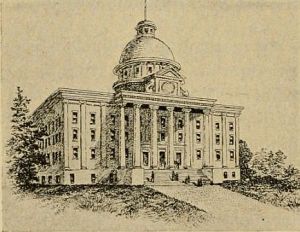
Confederate Capitol,
Montgomery, Alabama.
443. Last Attempts at Compromise.—In the course of 1860 and the early part of 1861, several attempts were made to reach a compromise. The most famous of these was the one introduced by Senator Crittenden, of Kentucky, December 18, 1860. He proposed a constitutional amendment in which the main clauses should prohibit slavery north of 36° 30′, but protect it, as other property is protected, in all territory south of that line, and should arrange for admitting states north or south of that line, with or without slavery, as their constitutions might provide. While the Compromise was before a committee of thirteen, of which Seward was the most prominent Republican and Jefferson Davis the most prominent Democrat, Seward was offered by Lincoln the Secretaryship of State. Lincoln wrote, “On the territorial question, I am inflexible.” In further explanation he said that the adoption of the Compromise would only postpone the difficulties that then confronted the nation. In the committee, the Republicans voted against the Compromise, and Davis of Mississippi, and Toombs of Georgia, voted with them. The Republicans were responsible for its defeat. On January 3, 1861, Crittenden proposed that the whole subject of his Compromise be submitted to a direct vote of the people. Douglas powerfully supported the proposition; but Davis, in an elaborate speech in behalf of the South, made it apparent that compromise was now impossible. Other minor attempts met with similar failure.
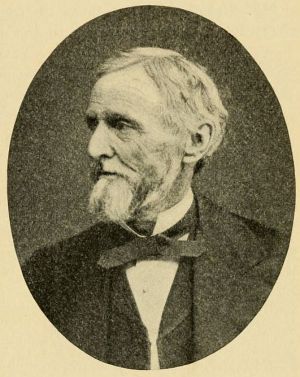
Jefferson Davis.
444. Southern Confederacy Formed.—Soon after the Ordinances of Secession were passed by the several Southern states, their representatives, with only two exceptions, withdrew, one by one, from Congress. The Secession Conventions appointed delegates in number equal to their former senators and representatives at Washington, and the members so appointed met at Montgomery, Alabama, February 4, 1861, to form a Southern Confederacy. President Buchanan offered no opposition to this movement. The body was soon organized by the choice of Howell Cobb, of Georgia, as chairman. A provisional government for one year, under the name, “The Confederate States of America,” was adopted February 8, and the following day Jefferson Davis[196] was chosen President of the Confederacy, and Alexander H. Stephens,[197] of Georgia, Vice President. The Constitution, as elaborated and completed, was adopted on the 11th of March. Stephens, as Vice President, was formally inaugurated on the 10th of February, and Davis, as President, on the 18th. Thus the Confederate government was fully installed two weeks before the inauguration of Lincoln.
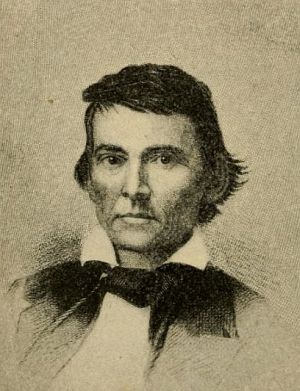
Alexander H. Stephens.
445. Stephens and Lincoln on the Causes of the War.—Soon after the inaugural ceremonies in the South, the newly chosen Vice President, in a speech at Savannah, explained the grounds of secession. After referring to Thomas Jefferson, he said: “The prevailing ideas entertained by him and most of the leading statesmen of the time of the formation of the old Constitution, were that the enslavement of the African was in violation of the laws of nature; that it was wrong in principle, socially, morally, and politically. . . . Our government is founded upon exactly the opposite idea; its foundations are laid, its corner-stone rests upon the great truth that the negro is not equal to the white man; that slavery—subordination to the superior race—is his natural and normal condition. This, our new government, is the first, in the history of the world, based upon this great physical, philosophical, and moral truth.”[198] For the purpose of reducing the causes of the war to a nutshell, this utterance may be placed in contrast with the summary of the Northern views by Lincoln: “Slavery is wrong and must not be extended. No state can in any way get out of the Union without the consent of the others. It is the duty of the President and of the other public functionaries to run the machine as it is.” At about the same time, in answer to an inquiry, Lincoln wrote to Stephens: “You think slavery is right, and ought to be extended, while we think it is wrong, and ought to be restricted. That, I suppose, is the rub. It certainly is the only substantial difference between us.”
446. Misunderstandings and Mistakes.—While the South believed, as had so often been claimed by Calhoun and Davis, that it had a right to secede and that the North had no right to oppose secession with force, each side was deceived in regard to the strength and real purpose of the other. The South made the mistake of believing that the Douglas Democrats would not unite with the Republicans, and the North greatly underestimated the determination and the readiness for war on the part of the South. Neither side seems to have more than half believed that the other side would fight. As the South was far more ready than the North, it was certain that, in case of war, the South would gain the first victories. But as the North had far greater resources, it was also certain that, with equal skill and determination, the North would in the end be successful. Each side held that its own strength would prevent the other side from entering upon war. Seward was so optimistic as to believe that as soon as the North showed its determination, the South would yield, and war would be “over in ninety days.” If each side had thoroughly understood the other, probably no war would have occurred. But, not understanding each other, “one side,” as Lincoln once said, “would make war rather than let the nation survive, and the other would accept war rather than let it perish.”
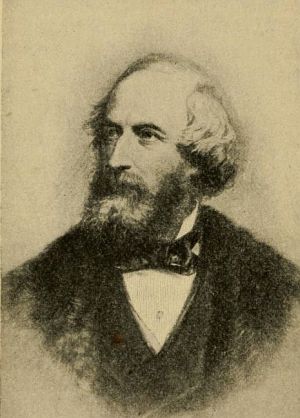
Cyrus W. Field.
447. The Sections on the Eve of the Civil War.—If the South had been in a condition to reason calmly, the laying of the Atlantic cable, through the efforts of Cyrus W. Field,[199] might have convinced its leaders that it was useless to uphold past ideals of government and a belated institution like slavery in the face of advancing civilization. The same lesson might have been taught them by the immense growth of the North and West since 1830. The increase in area, due to the settlement of the Oregon dispute and to the territory acquired from Mexico by war and purchase, had helped freedom rather than slavery. Of the 31,443,321 inhabitants of the whole country in 1860, only a little over 12,250,000 resided in the slaveholding states, including Missouri and Delaware, and of these twelve millions slightly over a third were negroes, who were in the main slaves. Over 3,500,000 persons lived in border states which did not join the Confederacy; so that when the crisis came, only about 8,700,000 whites in the South were to be matched against the 19,000,000 whites of the North and West. The advantage on the side of freedom was not really so great as these figures would make it; for the Southerners could leave their slaves at work and could flock to the front, while the Northern people had to keep their farms and factories going as well as fight. But when all allowances are made, the balance in favor of freedom was very great. The contrast between the sections is rendered all the more striking when we observe the great urban growth in the North and West. New York City in 1860 had about eight hundred thousand inhabitants; the South contained only two fairly large cities,—New Orleans and Baltimore. The foreign immigrants, nearly five million of whom had entered the country since 1830, when immigration practically began, saw even more clearly than many Americans the differences between the sections, and settled mainly in the North and West.
448. Wealth of the Country.—We have seen that in Jackson’s day the character of the average American became more energetic, and that the country entered upon an era of commercial expansion which even the panic of 1837 could not permanently check. The growth of manufacturing and of railroads had been enormous, chiefly in the North and West. In 1860 one billion dollars were invested in manufacturing, six billion five hundred million in farming. In the latter form of wealth the South, of course, had its share, since its cotton crops were very valuable. But the cotton was shipped in northern vessels and was exchanged for products not manufactured in the South. In the matter of railroads, a great gain had been made since 1850, twenty of the thirty thousand miles operated in 1860 having been laid within the decade.
449. Inventions.—It is almost needless to say that American inventiveness kept pace with the country’s growth in population and wealth. Between 1830 and 1860, Cyrus H. McCormick (1809–1884) invented his reaper, which revolutionized farming; S. F. B. Morse (1791–1872) made the telegraph an effective means of communication; Charles Goodyear (1800–1860) succeeded in vulcanizing india rubber; and Elias Howe (1819–1867) patented his sewing machine. The same epoch was marked by the growth of express companies, the first use of postage stamps, the perfection of the daguerreotyping process, the use of anæsthetics, and the employment of steam fire engines. When we remember further that this was the era of such great scientists as Asa Gray (1810–1888) the botanist, J. D. Dana (1813–1895) the mineralogist, Joseph Henry (1797–1878) the physicist, and Louis Agassiz (1807–1873) the naturalist, as well as of the great historians, William H. Prescott (1796–1859), George Bancroft (1800–1891), and John Lothrop Motley (1814–1877), and of Emerson, Hawthorne, Longfellow, and other writers already mentioned, we can perceive that the intellectual growth of the nation had kept pace with its material development. Yet, with the exception of Commodore Matthew F. Maury (18061—1873),—who won fame for his work in physical geography, especially of the sea,—and of Edgar Allan Poe, nearly every one of these scientists and authors was a Northern man. From all points of view, therefore, the odds were against the South at the beginning of the great struggle.
References.—Rhodes’s History of the United States from the Compromise of 1850 is the most thorough, impartial, and authoritative of all general works on the subject; the first two volumes are devoted to the years from 1850 to 1860, and by means of the full table of contents and the index, the student may obtain a fair presentation of the causes of the War, without reading the whole. Schouler’s United States, Vol. V., is also full and valuable. Wilson, Division and Reunion, 204-216; Johnson, American Politics, 188-196; Goldwin Smith, United States; Morse, Abraham Lincoln (2 vols. “American Statesmen”); Tarbell’s Abraham Lincoln, Vol. II., 1-150, contains much interesting material not before published; Sanborn, Life and Letters of John Brown; Stephens, War between the States, Vol. I., probably presents the ablest Southern view; Pollard, Lost Cause; Davis, The Rise and Fall of the Confederate Government, Vol. I.; Greeley, American Conflict, Vol. I.; Grant, Personal Memoirs, Vol. I.; Sherman, Memoirs; Nicolay and Hay, Abraham Lincoln (10 vols.); Johnston, American Orations; Garrison, Life of William Lloyd Garrison, Vols. I. and II.; Buchanan, Buchanan’s Administration; Dabney, Defence of Virginia; Longstreet, From Manassas to Appomattox; F. Bancroft, Life of William H. Seward (2 vols.); Lothrop, William H. Seward (“American Statesmen”); Storey, Charles Sumner (“American Statesmen”); T. N. Page, The Old South; H. A. Wise, Seven Decades; Trent, W. G. Simms (“American Men of Letters”); Trent, Southern Statesmen of the Old Régime; Channing and Hart, Guide to American History.
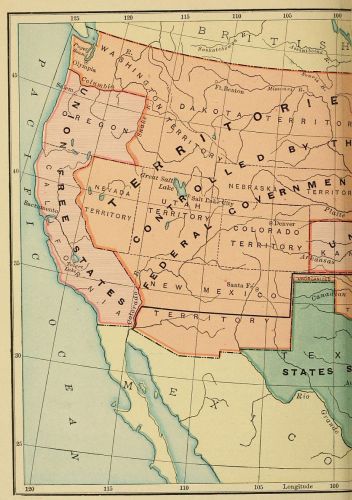
United States in 1861
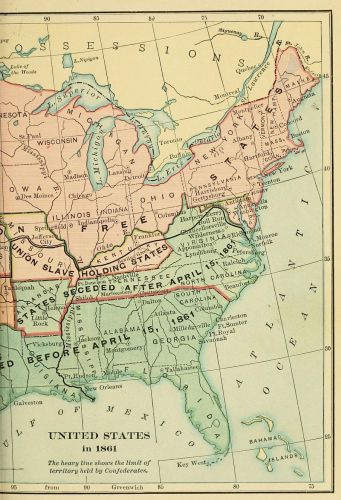
United States in 1861
The heavy line shows the limit of territory held by Confederates.
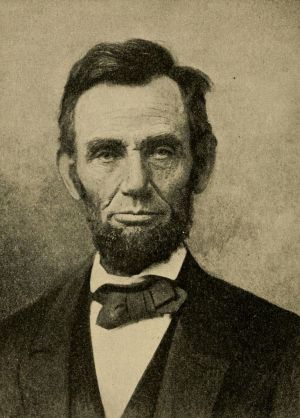
Abraham Lincoln.
450. From the Election to the Inauguration.—While the South, during the months between the election and the inauguration of Lincoln, was setting up its new government and preparing for war, the North could do nothing. President Buchanan, as we have already seen, scarcely lifted a finger to prevent the secession of the Southern states. There is even reason for thinking that he encouraged it,[200] although in the main he was loyal. Howell Cobb of Georgia, Buchanan’s Secretary of the Treasury, John B. Floyd of Virginia, Secretary of War, as well as Secretary Thompson, actively and openly sympathized with the Southern leaders and gave them constant advice and assistance. Floyd even received Thomas F. Drayton, the agent of South Carolina, and negotiated with him for the sale of arms; and W. H. Trescott, the Assistant Secretary of State, was in constant correspondence with Governor Gist, of South Carolina, in regard to all plans for secession.[201] This activity at the South gave great alarm to the North. Lincoln remained at Springfield until it was time to start for Washington for the inauguration, but he was beset with demands for an explanation of the policy which he would pursue. Though he wrote numerous private letters, he positively refused to give out a word for publication. His letters, since published, show that he never wavered from his purpose to defend the property of the United States government in the South. In the course of his journey to Washington, he made several speeches that showed remarkable firmness, united with a deep sense of responsibility. Hearing in Philadelphia, from two independent sources, of a plot to assassinate him in Baltimore, he reluctantly yielded to the urgent advice of his friends, and secretly boarded a special train in order to elude possible assassins by passing through Baltimore in the night.
451. Selection of the Cabinet, and the Inauguration.—Lincoln had the matter of choosing a Cabinet long under consideration, but its membership was not fully settled till the day before his inauguration. His chief rivals for the Presidency were given leading positions. The Secretary of State was W. H. Seward of New York; Salmon P. Chase of Ohio became Secretary of the Treasury; Simon Cameron of Pennsylvania, Secretary of War; Gideon P. Welles of Connecticut, Secretary of the Navy. In his inaugural address, the President spoke with a pathetic sense of his responsibility, but with great clearness of conviction as to the nature of his duty. He declared that he had “no purpose directly or indirectly to interfere with the institution of slavery in the states” where it existed, and that there would be “no bloodshed or violence unless” it were “forced upon the national authority.” His purpose he defined by saying, “The power confided to me will be used to hold, occupy, and possess the property and places belonging to the government and to collect the duties and imposts.” Appealing to his dissatisfied fellow countrymen, he said, “You have no oath registered in heaven to destroy the government, while I shall have the most solemn one to preserve, protect, and defend it.”
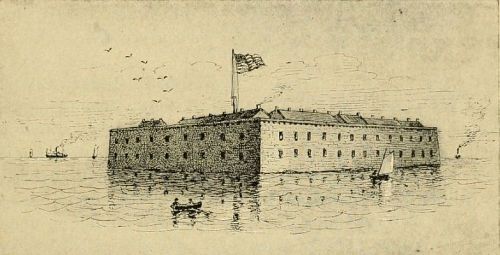
Fort Sumter.
452. The Fall of Sumter.—One after another, the military posts in the South were taken possession of by the local authorities. At Charleston, the Federal garrisons of two of the other forts withdrew to Fort Sumter, in order to defend it. But, even thus reënforced, it was short of ammunition and provisions. Buchanan, in January, had ordered relief sent; but as we have seen (§ 442), the Star of the West was fired upon, and turned back to New York. Lincoln, in accordance with his firm but conciliatory policy, sent word to Governor Pickens, of South Carolina, that he had made provision to send supplies to Fort Sumter. The Governor decided at once to take the fort before the supplies could arrive, and, under his orders, General Beauregard opened fire upon it about four o’clock on the morning of the 12th of April. Two days later, the commander of the fort, Major Anderson, having exhausted food and ammunition, was obliged to take down his flag and withdraw from his post. No lives were lost on either side. This action of the South was a strategic blunder, for it enabled the North to enter upon the war with an enthusiasm which could otherwise hardly have been secured.
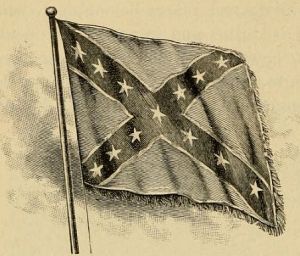
Palmetto Flag (Confederate).
453. First Call for Troops.—The firing upon Sumter sent a thrill of patriotic determination throughout the North. On the 15th of April, Lincoln issued a proclamation, declaring that a combination against the Union had been formed, and calling for an enlistment of seventy-five thousand men for three months, “in order to suppress said combination and to cause the laws to be duly executed.” He also called upon all loyal citizens to aid and facilitate “this effort to maintain the honor, the integrity, and the existence of our National Union.” The response was immediate and overwhelming. Douglas, then upon his dying bed, dictated a letter, declaring that the only course left for patriotic men was to sustain the Union “against all assailants.” The course of Douglas unquestionably did much to unite all parties in the North. In every city and town mass meetings were instantly held and companies and regiments were formed. Senator Chandler telegraphed: “Michigan will send you fifty thousand men, if you desire.” Indiana, whose quota was five thousand, telegraphed that ten thousand were ready. So it was from every quarter of the North. Men came in such numbers that instead of seventy-five thousand, the War Department accepted more than ninety-one thousand. In the South, the people were likewise fired with enthusiasm and drawn nearer together. There was, at first, an opposition to secession in Virginia, but reluctance to allow troops to pass over her soil and the demand that she should furnish her quota against the South, turned the scale. Four of the border states, as they were then called,—North Carolina, Virginia, Tennessee, and Arkansas,—now passed Ordinances of Secession. Shortly after Virginia seceded, April 17, the capital of the Confederacy was transferred from Montgomery to Richmond.
454. Comparative Numerical Strength.—As we have seen (§ 447), the population of the seceded states was a little less than nine millions, of whom about five and one-half millions were whites; while the population of the other states was about twenty-two millions. At the beginning of the war a large proportion of the white adult males in the South was brought into action through public opinion, and a little later, a rigid conscription law, including all able-bodied men between fifteen and fifty, was rigorously enforced. Old men, women, boys, and slaves were left at home to furnish the necessary supplies. Thus the South put forth almost its entire strength early in the war, and the capture of territory and prisoners continually lessened its resources; while the very opposite was the case with the North. While the war was going on, the productive industries of the Union states never flagged, and the population continued to increase so that it was possible to have a larger army at the end of the war than at the beginning. However, all figures comparing the armies and the numbers present in individual battles are somewhat misleading, from the fact that in the Southern army teamsters and laborers on the supply trains were generally slaves, not enumerated. Slaves were also employed in the trenches. In the Northern armies, on the other hand, these forms of service were generally rendered by enlisted men.
455. Comparative Industries.—The South was essentially an agricultural region, depending for its income chiefly upon its exports of cotton and tobacco. If a blockade could be stringently enforced, this source of revenue must necessarily be cut off. But that was not all. The supplies which the South had been in the habit of importing could not now be procured except at enormous prices and in very small quantities. A few facts will show the significance of this condition. In 1860, the exports of cotton amounted in value to about two hundred millions of dollars, but before the end of the war, the annual income from that source was not more than four million dollars. The inducement to run the blockade may be inferred from the fact that the best cotton could be bought in Charleston at four or five cents a pound, while in Liverpool, where the American supply had been cut off, the price per pound was no less than two dollars and a half. Prospect of profit led to the most daring risks. Insurance on blockade running vessels rose nearly a thousand per cent, and the wages of sea captains plying between Nassau and Southern ports increased from thirty to one thousand pounds sterling per month. As we shall hereafter see, prices rose enormously in the South, and the suffering on the part of many became almost intolerable. This condition of affairs might have been prevented, if the South before the war had given itself to the development of varied industries. But, with all the able-bodied men in the field, the sudden establishment of industrial activity was plainly out of the question. In the North, on the other hand, the conditions were very different. At the beginning of the war, a high protective tariff was established, partly to provide an increased revenue, and partly to encourage the rapid spread of home industries. The consequence was great industrial activity throughout the entire period of the war. As the Northern ports were all open, intercourse with foreign markets was easy, and the rise of prices was not so great anywhere as to cause considerable inconvenience. In fact, the North grew steadily in wealth during the war.
456. Financial Methods in the North.—The cost of a great war is always so enormous that all the resources of taxation and credit must be resorted to. The necessities of the North were peculiarly stringent in 1861, owing to the fact that during Buchanan’s administration the Treasury was nearly bankrupt (§ 423). As soon as the war began, the financial pressure was felt throughout the country, and before the end of 1861, the banks everywhere were obliged to suspend specie payment. A few months later, Congress authorized an issue of $150,000,000 of paper currency, and made it legal tender for the payment of all debts. In 1863, the amount of such notes was increased to $450,000,000; and from the color of the ink used, they came to be known as “greenbacks.” As they were not redeemable in gold at any specific time, the price of gold began to rise as soon as the first issue was made, and increased as the war progressed, until, in 1864, the premium on gold reached its highest point,—two hundred and eighty-five per cent. Of course, this premium was not an increase in the value of gold, but a decrease in the value of paper currency. As the current money became cheap, the prices of commodities naturally rose. It has been ascertained that the average increase in the prices of real estate, rents, and goods was about ninety per cent, while the increase in the price of labor was only about sixty per cent. Thus it is evident that the men of means profited most, or suffered least, by the inflation, while the laborer suffered most. Another source of income was the issue of government bonds at a high rate of interest. These amounted before the end of the war to $2,850,000,000. As during the first years of the contest the success of the North, and consequently the ability of the government to pay, appeared uncertain, it was difficult to sell the bonds except at a considerable discount.
457. National Banks.—An ingenious method of disposing of a large part of the bonds was devised. A law was enacted in February, 1863, authorizing any five persons to organize a National Bank on easy conditions. Except in very small places, such a bank was required to have a capital of at least one hundred thousand dollars and to deposit, with the Treasury at Washington, bonds to the amount of one-third of its capital. The government would then issue notes to the bank to the amount of ninety per cent of such deposit, such notes to be used by the bank for the purposes of circulating currency, and to be redeemable by the government in greenbacks. The response was at first slow; but in 1864 a new impulse was given to the movement by an act levying a tax of ten per cent on the circulation of state banks—a law designed to compel state banks to become national. By these measures, a safe and abundant currency was provided. In addition to these devices, a high internal revenue was levied, an income tax was provided, and tariff duties, as the war went on, were greatly increased.
458. Finances in the South.—No such fertile devices were possible in the South. Bonds were issued, but, as there was little or no capital seeking investment, no market at home could be found, and foreign capitalists would not run great risks till the issue of the war could be predicted with some confidence. The government then issued notes payable six months after the close of the war. With the diminishing prospects of the South, these notes rapidly declined in value, till they became practically worthless. Then the Confederate Congress authorized the army to seize provisions and supplies wherever they could find them, and to offer in payment bonds or notes at prices to be fixed every ninety days. Under this financial régime, prices rose enormously, and the consequent suffering of those who did not occupy their own estates or were not in the army or the service of the government, was well-nigh indescribable.
459. General Features of the War.—Without some knowledge of the physical characteristics of the country, it will not be easy to understand why the war progressed so slowly as it did in the East and so rapidly in the West. As the South had broken away from the Union, and the North was trying to bring the seceded states back under national authority, the North was, necessarily, the attacking party, while the South had merely to act on the defensive. Though two important efforts were made by the South to transfer the field of operations to the North, these were both unsuccessful, and therefore the war, in all its larger features, was fought in the South. This fact makes it necessary to look for a moment at the physiographic features of the field of action.
460. Physical Features in the East.—The Alleghany Mountains and the Mississippi River divided the Confederacy into three somewhat distinct parts. The eastern portion, which lies between the Alleghanies and the Atlantic, is characterized by a succession of rivers that rise in the mountains and flow in a southeasterly direction nearly parallel with the Potomac and James. To advance through Virginia to Richmond, it was possible for the Union forces to go by water to the mouth of the James and then ascend along the river, or to cross the Rappahannock, the Rapidan, the York, and the Chickahominy, besides a large number of smaller streams which were sometimes swollen to the volume of navigable rivers. Much of the intervening region, moreover, was swampy, and at times almost impassable. East of the Alleghanies, the subordinate range known as the Blue Ridge provides a fertile, intervening valley, through which the Shenandoah flows northward into the Potomac at Harper’s Ferry. This Valley of Virginia, however, near the northern end, is subdivided by a low range of mountains in such a way as to enable an army driven down one side to retreat up the other. Across the Blue Ridge at Manassas Gap, a railroad connects the Valley with the eastern portion of Virginia and makes it possible to transfer troops rapidly from one side to the other. At Manassas, this railroad crosses an important Southern line which runs from Washington to Richmond and Lynchburg, and to the far South. This crossing, therefore, was of the first strategic importance in the war, and was naturally the first point of collision.
461. Physical Features of the West.—West of the Alleghanies the water courses, in some respects, were of even more importance than in the East. The Cumberland River, which rises in the mountains of the same name, flows southwest, and then, turning sharply to the north, empties into the Ohio some miles above Cairo. The Tennessee flows in the same general direction, but bends so far south as to reach Alabama and Mississippi, and then, turning northward and flowing through Tennessee and Kentucky in a course nearly parallel with the Mississippi, though in an opposite direction, discharges its waters into the Ohio. As railroads were few and other roads were poor, these navigable waters were of the utmost importance to the side that should be able to command them. Both antagonists recognized this fact, and, therefore, the first contest in this region was for command of these rivers. Soon after the war began, the Unionists took Cairo, at the mouth of the Ohio, and the Confederates constructed Forts Henry and Donelson, on the Tennessee and Cumberland rivers, at points not far from the Ohio, where the rivers were so near each other that either fort could easily reënforce the other. In this way each side hoped to gain command of the rivers for purposes of transportation. The Mississippi also was strongly fortified by the Confederates at Memphis, at Island Number 10, at Vicksburg, and at other points of less importance. West of the Mississippi, the physical features of the country were of less military consequence.
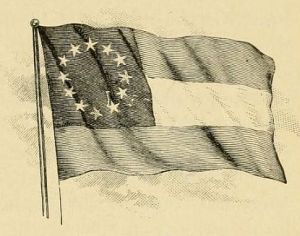
Confederate Flag.
462. First Bloodshed.—Among those in the North who had foreseen the conflict, one of the foremost was Governor John A. Andrew, of Massachusetts. Inaugurated early in January, 1861, he had set about preparing for hostilities by organizing the state militia and by purchasing arms in Europe. Only four days after the call for troops, therefore, the 6th Massachusetts Regiment was ready to move to Washington. While passing through Baltimore, the regiment was attacked by a mob and several men were killed. This was the first bloodshed of the war. The road through Baltimore was closed, and all trains with men and supplies were for several months obliged to pass around the city by way of Annapolis. But this was not the worst. The railroad from Annapolis to Washington was torn up and every telegraph line from Washington to the North was cut. Exit from the capital in any direction was, for a time, made impossible. With the news that Virginia had seceded, came the rumor that a large Southern force was on the march to take Washington. General Winfield Scott, then in command as general in chief of the United States armies, placed barricades about all the public buildings, and distributed the few guns he had at the various approaches to the city. There were only twenty-five hundred troops at his disposal. But officers and men in the departments were brought into service, and many citizens enlisted. The women and children were ordered out of town. During all this terrible excitement and anxiety, a committee from Baltimore appeared before the President and protested that the soil of Maryland should not be “polluted” by troops designed to invade the South. Lincoln replied, “We must have troops, and, as they can neither crawl under Maryland nor fly over it, they must come across it.” The alarming rumor proved to have no foundation. The South was not ready for an attack upon the capital.
463. The Border States.—The great fears naturally felt with regard to the secession of other border states besides Virginia were gradually relieved. This was caused partly by the wise management of Lincoln, partly by the unexpected enthusiasm throughout the North in responding to the call for troops, and partly by the firmness of the Union sympathizers in those states. Maryland, Delaware, Kentucky, and Missouri did not secede; but while these states thus remained in the Union, the people were divided in their sympathies, some going into one army, and some into the other. Though Tennessee seceded and joined the Confederacy, many of her people, especially in the Cumberland Mountains, were stanch supporters of the Union throughout the war. On the other hand, in southern Indiana and Illinois there were many sympathizers with the South, and nothing but the ability and the energy of the governors of those states and the intense loyalty of the Unionists kept up the full quota of their troops. In Virginia, while the people in the eastern part of the state were generally Secessionists, a majority of those west of the mountains were adherents of the Union. When, therefore, Virginia withdrew, the people of the western portion voted to break away from the rest of the state, and on December 31, 1862, Congress, with apparently more regard to necessity than to the Constitution, admitted the region to the Union as West Virginia.
464. Foreign Recognition.—On May 13, 1861, Great Britain issued a “Proclamation of Neutrality,” which, in effect, recognized the Confederates as belligerents, and this example was soon imitated by the other European states. Thus the Confederates obtained the right to have war vessels, and to take refuge for repairs and needed supplies in foreign harbors. The consular agents of the United States reported that Southern agents were buying arms wherever they could be obtained in Europe.
465. Equipment and Further Preparation.—In the beginning of the war, though enlistments were rapid, preparations for an advance were necessarily slow. The Southern ports were declared blockaded, but the North had not enough ships on hand with which to make the blockade effective. Coasting vessels of all kinds were rapidly brought into the service, supplies had to be collected, and troops had to be equipped and drilled. The Confederates were more rapidly organized, because their preparations for war had been much more advanced when the war began, although they, too, were short of arms and powder. Before the North was ready to move, the Confederacy had formed a strong line across Virginia from Harper’s Ferry to Norfolk. It had also placed strong fortifications along the Mississippi River, the Mexican border, and about the Atlantic ports. A little later the construction of Forts Henry and Donelson, on the Tennessee and Cumberland rivers, protected the northern frontiers. Thus the Confederacy was nearly surrounded with a line of defenses. Early in May, when the Northern troops reached the line of action, skirmishing began, but no important engagement occurred before July. On the 4th of July, Congress met in special session. Lincoln, in his message, after reviewing the situation, said: “This issue embraces more than the fate of these United States. It presents to the whole family of man the question whether a constitutional republic or democracy—a government of the people by the same people—can or cannot maintain its territorial integrity against its own domestic foes.” Congress at once authorized the President, at his discretion, to call out five hundred thousand volunteers, and gave him all the powers necessary to carry on the war.
466. Movements in West Virginia.—Early in the summer of 1861, General George B. McClellan advanced from Ohio into western Virginia, and in less than a month succeeded in driving the Confederates out of that mountainous region. A little later, General Robert E. Lee, in command of an insufficient Confederate force, and in an inclement season, attempted to recover the ground lost, but he was successfully resisted by General Rosecrans, and the district remained in the hands of the Union.
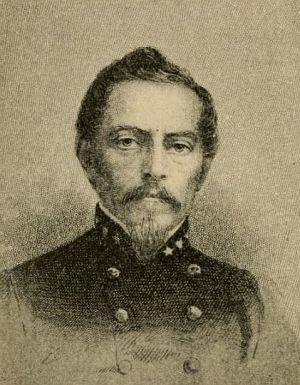
General Beauregard.
467. The Battle of Bull Run, or Manassas.—Largely in consequence of McClellan’s successes in West Virginia, there was a great popular outcry in the North for an advance. “On to Richmond!” was the watchword of many of the influential newspapers. General Scott at length reluctantly consented to a forward movement. About thirty-five miles south of Washington, the railroad from the Shenandoah Valley, passing through the mountains, crosses the road which runs from Richmond to Washington. The point, therefore, was one of such strategic importance that it enabled the army holding it to move rapidly to the East or West, as well as to the North or South. It was here, at Manassas Junction, that the Confederate force was concentrated under Gen. P. G. T. Beauregard.[202] The Union army, under General McDowell, on July 21, crossed Bull Run, a small stream near Manassas, and advanced to an attack. At the beginning of the battle, McDowell had some success; but, in the afternoon, the Union army, made up chiefly of raw recruits, was thrown into a panic, owing to a reënforcement of the Confederates, and fled in great disorder towards Washington. About eighteen thousand men were engaged on each side. The Confederates lost about two thousand, while the loss of the Unionists was nearly three thousand.[203] Both armies were temporarily disorganized by the battle. On the following day, McClellan was called from West Virginia and put in command of all the forces from the mountains to the sea. In November, General Scott was compelled by age to give up his post, and McClellan succeeded him as general in chief of all the Union forces. Neither army was yet in condition to make an advance.
468. Ball’s Bluff.—The Confederates, however, strengthened their line in the vicinity of Harper’s Ferry, and in October a Union force of about two thousand men was defeated at Ball’s Bluff, and its commander, the brilliant Colonel Baker of Oregon, was killed. Before the end of the season the Union army was increased by additional enlistments to nearly two hundred thousand men, and the autumn and winter months were passed in fortifying the lines, drilling the recruits, and bringing together supplies.
469. Lincoln’s Strategic Plans.—Lincoln said at the very beginning of the war that four things were essential to ultimate success, and all his plans were directed accordingly. First, the army must defend Washington, and, if possible, press on and take Richmond. Second, the border states must, at all hazards, be prevented from seceding. Third, the Mississippi River must be opened, in order to give the West communication with the sea and to cut off the Confederates from western supplies. And fourth, the blockade must be made as effective as possible, to prevent European supplies from reaching the South.
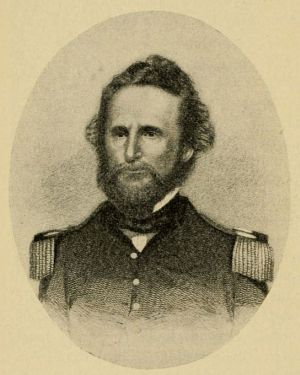
General Nathaniel Lyon.
470. The Contest in Missouri.—In the West special efforts were made by the Union forces to hold Missouri. Sentiment in the state was divided. General John C. Frémont (§ 417) was early appointed to the command of the Western Department. He entered upon his duties July 25, with headquarters at St. Louis; but great frauds were soon developed in his department, and he was unable to furnish the necessary supplies to the army. His department was further discredited by an unauthorized order freeing the slaves, which President Lincoln promptly rescinded. But notwithstanding the confusion at headquarters, General Nathaniel Lyon,[204] one of the most promising of Union officers, conducted affairs in the field with great energy and skill. He pushed the Confederates out of the northern and central parts of the state; but near the southern line, they received reënforcements from Arkansas and Texas, and advanced under General Price. The forces met, August 10, at Wilson’s Creek, near Springfield. Price had 10,175 men, with fifteen guns, while Lyon had 5400, with sixteen guns. Lyon’s left was commanded by General Franz Sigel,[205] who passed around the right flank of the enemy and attacked in the rear. Lyon, at the head of the main army, led the advance with great gallantry, swinging his hat as he went. After being twice wounded, he still pressed on, but soon fell from a third wound, which proved mortal. Sigel’s force was cut off and routed. Lyon’s main army held its ground, but, in the night, the Union force was obliged to retire to Springfield. The Unionists lost about twelve hundred, the Confederates about a thousand.[206] A major part of the Union force now retreated to Raleigh, where they remained for the winter. Meanwhile, early in September, the “Irish Brigade,” under Colonel J. A. Mulligan, distinguished itself at Lexington, with about 2780 men, against General Price, with a besieging army of about 18,000 men and sixteen cannon. Though Mulligan and his followers were obliged finally to surrender, it was not till after three days of most desperate fighting.
471. Halleck succeeds Frémont.—In October, Missouri was visited by the Secretary of War and the Adjutant General, for the purpose of investigating the condition of affairs, of which many complaints had reached Washington. Everything was found to be in dire confusion, owing to the inability of Frémont to administer successfully so large a field. General Frémont was consequently superseded by General Henry W. Halleck, who, before the end of the year, without fighting a battle, gained possession of the entire state.
472. The Trent Affair.—Toward the close of the year 1861, an event occurred which nearly involved the Union in a war with Great Britain. In November, Captain Wilkes, a United States officer, in command of the San Jacinto, boarded a British mail steamer, The Trent, and took from her James M. Mason of Virginia and John Slidell of Louisiana, who were bound for Europe as Confederate commissioners. The right to stop and search the vessels of neutrals in time of war had long been maintained by Great Britain. The “Right of Search,” as we have seen, had been one of the causes of the War of 1812. Though often protested against, it had been generally maintained, but at the close of the Crimean War the Great Powers of Europe agreed, at the Peace of Paris, in 1856, to abandon it. To this agreement the United States, not being a member of the Congress, had not been a party, and was, therefore, not bound by it. The British government, however, insisted that the European agreement should be binding upon the United States, and immediately demanded the surrender of Mason and Slidell. Troops and vessels of war were at once sent over to Canada, and great excitement was the result. The officials of the United States replied that, although not a party to the agreement of 1856, their government had always been opposed to the “Right of Search,” and in accordance with its own principles would give up the prisoners.
473. Feeling engendered by the Trent Affair.—The incident left an angry feeling in the North toward Great Britain, for it was universally felt that the British government had shown an unmistakable partiality for the South. This feeling was further aggravated by the habitual attitude of that important newspaper, the London Times. Its offensive editorial utterances, which were generally thought to be inspired by Lord Palmerston, the Prime Minister, were the source of a vast amount of ill feeling for more than a generation.
474. Results of the First Year.—The outcome of the first year in the field was favorable to the Confederates. The Union side had lost Fort Sumter, Big Bethel, Bull Run, Ball’s Bluff, Carthage, Wilson’s Creek, and Belmont. With the exception of some small successes in West Virginia, there had been disasters in every quarter. To a superficial observer, therefore, success seemed to favor the South, and the attitude of England was easily accounted for. But there were other considerations to be taken into account. The tactful diplomacy of Lincoln and the irresistible energy of the Union sentiment had saved the states of Delaware, Maryland, Kentucky, Missouri, and a part of Virginia from secession, and these results ought, perhaps, to be regarded as more than equivalent to the Confederate successes in the field. Not less important were the Union successes in closing the Confederate ports. The blockade was growing to be so complete as to prevent the exportation of cotton and tobacco, and thus to cut off the most important source of Confederate income. Meanwhile, there was great commercial activity between the Union states and Europe, and the government was easily and amply supplied with men and money.
For References, see end of Chapter XXV.
|
See Letters from the Confederate Archives, given in Nicolay and Hay’s Life of Lincoln, Vol. II., pp. 316-327. |
|
Born in Baden, 1824. General Sigel died in New York in 1902, and at the time of his death his services for the Union were highly eulogized. |
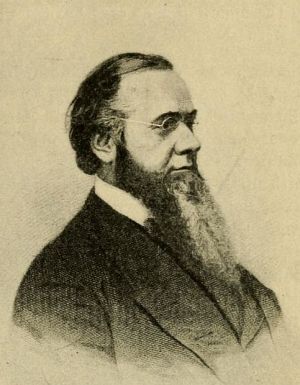
Edwin M. Stanton.
475. Secretary Edwin M. Stanton.—The first very important event of the year 1862 was the substitution of Edwin M. Stanton[207] for Simon Cameron, as Secretary of War, January 13. Cameron, who had been a candidate for the Presidential nomination, had been taken into the Cabinet under the policy already referred to (§ 451), but the duties soon proved too severe for his energy and his years. He was appointed Minister to Russia; and the vacant position was given to Stanton, who, as a War Democrat, had shown his ability and his spirit as Attorney-General in Buchanan’s reorganized Cabinet. Stanton at once put new life into the War Department. He was, at times, exceedingly disagreeable in his methods, but he was the terror of evil doers; and to the end of the war his marvelous energy and remarkable administrative ability made themselves felt in every branch of the service. It is doubtful if there has been any greater Minister of War in modern times.
476. Military Organization in the West.—Activities in the field began with very vigorous movements in the West. The Confederates, under General Albert Sidney Johnston (§ 478), had established a strong line in southern Kentucky, extending from Columbus to Mill Spring. They had also constructed, as already described (§ 461), two strong forts in Tennessee, just south of the Kentucky line,—Fort Henry on the Tennessee River, and Fort Donelson on the Cumberland. The organization of the Northern army in the West introduced a change in the spring of 1862. The Department of the Mississippi, which included Missouri, Arkansas, and so much of Kentucky as was west of the Cumberland River, under Major General H. W. Halleck, and the Department of the Ohio, which included the eastern parts of Kentucky and Tennessee, under Major General Don Carlos Buell, were consolidated on the 11th of March, 1862, into one department, and placed under Halleck, who thus received command of all the forces throughout the West, consisting of somewhat more than one hundred thousand men. Ulysses S. Grant,[208] who began his distinguished career in this war as colonel, had been advanced to brigadier general in consequence of a prompt and successful seizure of Cairo, and was now, though under the direction of Halleck, in command of the middle branch of the army, while Buell commanded the eastern section.
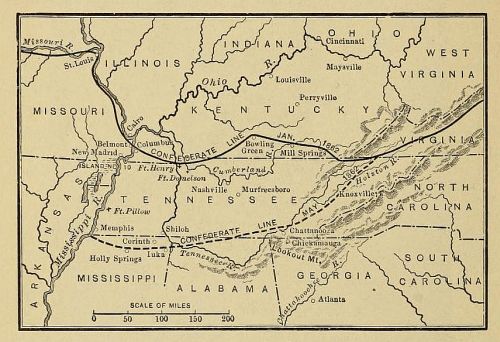
Operations in the West, 1862
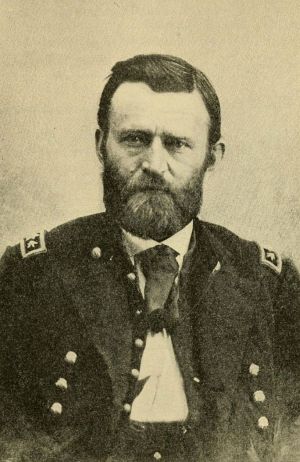
General Ulysses S. Grant.
477. First Advances.—The first advance in Kentucky was made by one of Buell’s divisions under General George H. Thomas, who, on the 19th of January, defeated a force of about equal numbers under General Zollicoffer at Mill Spring and drove it back into Tennessee. Rear Admiral A. H. Foote, with a fleet of gunboats, in February advanced up the Tennessee River, and, after a severe engagement, took Fort Henry, with the commanding general and a part of the garrison as prisoners. Grant, who arrived with his army at about the same time, marched rapidly across the country and surrounded Fort Donelson, on the Cumberland. After making rapid preparations for a siege, he carried the outer works of the fort by storm, and then refused to accept any terms but “unconditional surrender.” He took some fifteen thousand prisoners (February 16), including two generals, and about twenty thousand stand of arms. This was the first great victory for the North, and the skill and vigor shown attracted the attention of the whole country. The Confederate line was in consequence so broken that the troops of the Confederacy were obliged to draw back into southern Tennessee. The Union forces soon occupied Nashville, and President Lincoln appointed Andrew Johnson, a prominent Tennessee Unionist, as military governor. Grant advanced to Nashville without waiting for orders, or even reporting the nature of his movement to Halleck. The consequence was a formal complaint of Halleck to McClellan, who had now taken the place of Scott as commanding general of all the armies of the United States. McClellan, in reply, authorized Halleck to “arrest Grant and put C. F. Smith in command.” Halleck, however, realizing the immense popularity which the “unconditional surrender” order and the success of Grant had given the latter in the North, decided not to exercise this authority, but ordered Grant back to Fort Henry, and placed C. F. Smith in charge of the expedition up the Tennessee. Grant was offended, and twice asked to be relieved of further duty in that department. But when at length Grant’s reports were received, they were so completely satisfactory that Halleck telegraphed, expressing his confidence, and Grant was satisfied. Grant’s aversion to sending detailed reports of all his movements was such that the Department at Washington sent to his headquarters a special agent, Charles A. Dana, assistant editor of the New York Tribune (afterward editor of the Sun), whose duty it was to send a daily telegraphic report. Thereafter the government was kept fully informed of Grant’s movements.
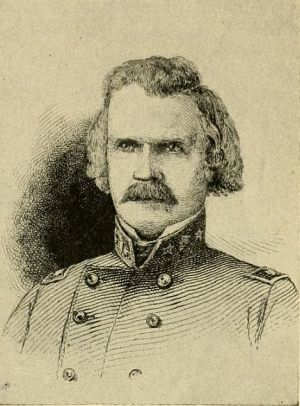
General Albert Sidney Johnston.
478. Shiloh, or Pittsburg Landing.—Grant’s army, now reënforced to about forty thousand men, crossed back to the Tennessee River, and advanced southward as far as Pittsburg Landing, near the border of Mississippi. This point and Corinth, not far below it, were of great strategic importance, because of the facility with which troops and freight could here be exchanged between the Mississippi and Tennessee rivers, and because they commanded the Memphis and Charleston Railroad, which was one of the Confederacy’s chief means of transportation from the Mississippi River to the Atlantic. To seize and hold these points was to prevent the transfer of troops and supplies. Buell’s army was hurried forward to join Grant, but the general in command of the Confederate force, Albert Sidney Johnston,[209] hastened to strike the army of Grant before Buell could arrive. Grant’s advance extended a little west of Pittsburg Landing, where the attack was first made. Early on the morning of April 6, the Confederates, led by Johnston in person, attacked with great vigor and drove the Union force back upon the river. Sherman, who commanded this part of the army, still held to the old notion that intrenchment in the field made men cowardly, and, consequently, his force came near being utterly routed. The progress of the Confederates, however, was stubbornly resisted, not only by the troops, but by the gunboats, which threw shells over the Union army into the Confederate ranks. In the afternoon of the first day the Confederates met with an irreparable loss in the death of their very able leader, Johnston, who was killed on the field. General Beauregard succeeded to the command. In the evening Buell arrived with strong reënforcements, and at the dawn of day on the 7th, Grant advanced to the attack. The Confederates made a stout resistance, but were finally driven back and forced to retreat to Corinth. The Unionists lost between thirteen and fourteen thousand, and the Confederates between ten and eleven thousand.[210] The general notion prevailed in the North that this greatest battle that had as yet been fought in America, was saved only by the arrival of Buell. Grant’s confidence in the outcome, even after the first day’s repulse, amounted to a calmness that was interpreted by many as stolid indifference.[211]
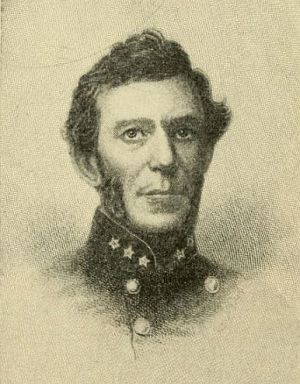
General Braxton Bragg.
479. Capture of Corinth and Memphis.—After the defeat of the Confederates at Pittsburg Landing, or, as it is more frequently called in the South, at Shiloh, the Union force pressed on and took possession of Corinth. In March, a fleet of gunboats, supported by an army under Major General John Pope, after surmounting many and great difficulties, succeeded in opening the Mississippi River from Cairo to Memphis. In June, Memphis was taken, after one of the most remarkable naval engagements of the war. The river was soon afterward opened as far south as Vicksburg. The lower Mississippi had been opened by the taking of New Orleans in April (§ 488).
480. The Battle of Pea Ridge.—While Grant had been pushing south in Kentucky and Tennessee, General S. R. Curtis had also been successful in the farther West. The Confederates, under General Van Dorn, organized in the beginning of the year a force of about sixteen thousand, including thirty-five hundred Indians, for the purpose of recovering Missouri. General Curtis, supported by General Sigel, advanced across the Arkansas line with ten thousand five hundred Union troops. The forces met at Pea Ridge (March 6). The Confederates were defeated; and after that time no very important battle occurred west of the Mississippi River.
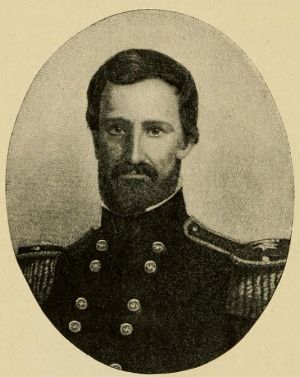
General W. S. Rosecrans.
481. Bragg’s Raid into Kentucky.—After the losses of Shiloh and Corinth, General Beauregard’s impaired health caused him to be superseded by General Braxton Bragg,[212] a capable commander, who now determined to break through the Union lines, and, if possible, recover Tennessee and Kentucky for the Confederacy. Advancing to the eastern part of Tennessee, early in September, he turned suddenly north in the hope of marching across Kentucky and taking Louisville; but Buell advanced along a shorter line and reached Louisville before the Confederates, thus saving the principal city of the state. After much maneuvering, an indecisive battle was fought at Perryville, October 8; but the Confederates were checked. They were obliged to abandon their attempt to secure a permanent foothold and had to content themselves with carrying south long trains of supplies. Though Buell’s pursuit was not vigorous, he drove Bragg out of Kentucky. At the end of the raid, the Confederates set up defenses at Chattanooga, while the headquarters of the Union army were at Nashville.
482. Battle of Murfreesborough, or Stone River.—After securing his stores at Chattanooga, Bragg moved northwestward and erected strong works at Murfreesborough. Major General William S. Rosecrans,[213] who had now superseded Buell, advanced from Nashville with the purpose of dislodging his opponent. The armies met in a great battle on Stone River, a shallow stream which flowed between the armies, near Murfreesborough. During the first day, December 31, the Unionists were driven back, but during the second and third days, they recovered their ground. On the night of January 2, 1863, the Confederates were obliged to withdraw from the field, but the Unionists were too much crippled to follow. The battle was a costly one to both sides, the Union loss having been about thirteen thousand, and the Confederate about ten thousand. Both armies soon went into winter quarters. The battle left the control of central Tennessee in the hands of the Unionists.
483. Results in the West.—The results of the campaigns in the West were highly encouraging to the North. The Union forces had kept possession of Missouri and had got control of the larger part of Tennessee and of the Mississippi River as far south as Vicksburg. The Confederates still had the advantage of being strongly intrenched at Chattanooga, the point in eastern Tennessee through which the railroads pass from Virginia to the Southwestern states. The armies had fought with equal bravery, but the balance of success was on the side of the North.
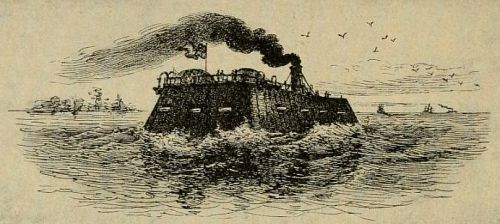
Confederate Ram.
484. Ironclads.—In the East, the war was prosecuted, during 1862, partly by the navy and partly by the army. Before the outbreak of hostilities, ironclad vessels had played practically no part in naval warfare anywhere in the world. Experiments in protecting vessels with iron had, indeed, been made by the British and the French, but without much success. In the latter part of 1861, however, an event occurred which effected a complete revolution in the construction of war ships. The Confederates had secured at Norfolk the abandoned and partly destroyed frigate Merrimac. They decided to cut off the top of the vessel and build upon it a sort of Mansard roof so heavily plated with iron and so sloping that it could throw off the heaviest cannon shot. They also fitted up the ship with an iron prow, or beak, put in powerful engines, and filled the space within the roof with heavy guns. At about the same time, Brigadier General A. W. Ellet, an engineer in the Union army, devised and built in the West a fleet of steam rams of similar construction, which did great execution at the battle of Memphis.
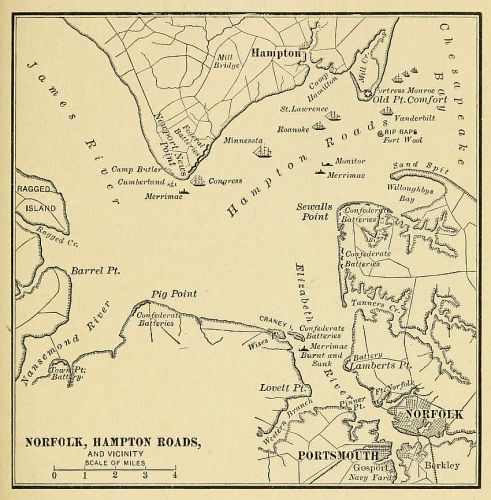
Norfolk, Hampton Roads
485. First Success of the Merrimac.—On the 8th of March, 1862, the Merrimac sailed out from Norfolk into Hampton Roads. She there met a Union fleet, consisting of five of the largest ships and a number of smaller vessels. The battle was one-sided, and was soon over. The Merrimac with its prow sank the Cumberland and then drove the other vessels ashore and set several of them on fire. The whole fleet would have been destroyed had not darkness come on. The guns of the wooden ships made no impression whatever on the Merrimac. At night this destructive Confederate boat withdrew to Norfolk, intending to finish its work the next morning.
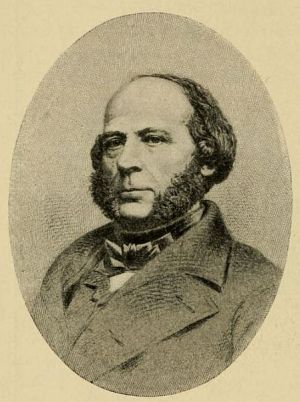
John Ericsson.
486. The Merrimac and the Monitor.—Fortunately for the North, when the Merrimac came out on the second day, she was confronted by a craft still stranger in appearance than herself. In the course of the winter, John Ericsson,[214] a great Swedish engineer, then in New York, had constructed a gunboat which he called the Monitor. It consisted of the hull of a vessel with a top as low and flat as a raft. Rising only a few inches above the water, it was made enormously strong, in order that it might carry very powerful engines, as well as its very heavy armor of iron. On its deck was a low, broad iron tower, thick enough to resist the heaviest shot, and large enough to hold two of the most powerful guns. This tower, which was said to resemble a cheese box on a raft, was revolved by machinery within the hull of the vessel. Though the tonnage of the Monitor was only nine hundred, while that of the Merrimac, owing to her heavy guns, was thirty-five hundred, the advantage was decidedly with the Monitor. When the two vessels came together, they fought for four hours with the utmost desperation. Then the Merrimac withdrew to Norfolk and soon after was destroyed by the Confederates themselves. The terror that had been felt in all the seaboard cities at the end of the first day’s victories of the Merrimac was thus relieved, and a new era in naval construction began.[215]
487. Capture of Confederate Ports.—Elsewhere on the coast, several important events took place. Commodore Goldsborough and Major General A. E. Burnside captured Roanoke Island in February, and, a little later, Fort Pulaski on the Savannah River. Several places in Florida also fell into Union hands. By these captures, the blockade was made much easier and more effective.
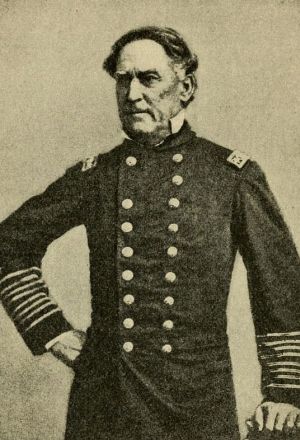
Admiral D. G. Farragut.
488. Capture of New Orleans.—The great event in the extreme South was the capture of New Orleans. This city was of much importance to the Confederacy, for it not only controlled the mouth of the Mississippi River, but also protected the passage from Texas to the Eastern states. A naval expedition designed to attempt the capture of the place was fitted out under Commodore D. G. Farragut,[216] with auxiliary military forces under Major General B. F. Butler. The expedition set out from Hampton Roads in February. The troops, some fifteen thousand in number, landed at Ship Island, and remained there until the fleet opened the river. The city was protected by Fort Jackson and Fort St. Philip, with very heavy guns, on opposite sides of the river. From one side to the other, six massive chains were stretched; and connected with these was a huge raft of logs, extending from shore to shore and completely closing the passage. Above the raft was a fleet of thirteen Confederate gunboats and an ironclad floating battery. There were also several fire rafts, designed to burn the Union ships in case they forced a passage. Farragut bombarded the forts for a week without much effect, and then determined to force his way through the obstructions. One dark night several of the gunboats ran up to the raft and succeeded in cutting the chains so as to open a passage. A very desperate combat ensued. Farragut pushed forward with fourteen vessels, protected with chains and sand bags against the enemy’s fire. The movement of the ships was made plain by bonfires lighted along the shore. The cannonading from the works and the opposing ships was terrific; but the Confederate fleet was finally destroyed and Farragut found himself above the forts. The city was now at his mercy, and it surrendered on April 25.
489. General Butler in New Orleans.—General Benjamin F. Butler took command of New Orleans as military governor, and Farragut’s fleet passed on and soon opened the river to the vicinity of Vicksburg. The war governor with great difficulty wrought order out of chaos by a policy that was much criticised for its severity. One of the citizens defiantly pulled down the American flag, whereupon the general, after the offender had been duly convicted of the act, ordered him to be hanged. In other ways, he made it evident that the authority of the United States was not to be trifled with; but some of his orders naturally gave much offense to the people of the South. His services to the city from the point of view of sanitation are, however, generally acknowledged to have been very noteworthy.
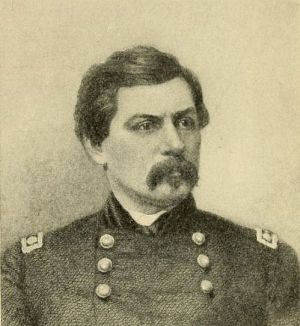
General George B. McClellan.
490. McClellan and the Army of the Potomac.—In the East, the campaigns of 1862 were far less successful for the Union than were those in the West. McClellan,[217] whose successes in West Virginia had brought him rapidly forward, succeeded Scott, in November, 1861, as general in chief of all the armies. While, during the winter, he was successfully organizing the forces of the East, his direction of the Western armies was confusing and unsatisfactory. For this reason, and also because of his attitude toward the President, which seemed to be characterized by insubordination, his authority was limited to the Army of the Potomac. The number of parallel rivers and the swampy nature of much of the ground between Washington and Richmond, as already described (§ 460), gave excellent opportunities for defensive warfare, but made an offensive campaign, especially in the vicinity of Richmond, exceedingly difficult. The Federal government was in favor of a direct advance, such as was afterwards made by Grant; but McClellan strongly recommended a transfer of his army to the Peninsula between the York and the James rivers, and an advance upon Richmond from the southeast. Lincoln very reluctantly yielded to this plan, which had the disadvantage of separating McClellan from the forces that were to protect Washington.
491. Unfortunate Division of Forces.—Unfortunately, also, this arrangement resulted in the Union’s having in the field in the East four separate armies, under independent commanders: that under McClellan in the Peninsula; that under McDowell for the immediate protection of Washington; that under Banks in the Shenandoah Valley, to prevent the Confederates from crossing the Potomac; and that under Frémont in the passes leading to West Virginia. By reason of the ease with which the Confederates could move on interior lines from one point to another, it was possible to strike either of the Union armies with a large Confederate force before a Federal combination could be formed. Hence, though the Confederates were really much inferior in numbers, they were generally able, in the battles that ensued, to attack with a superior force. The Confederates had the further advantage of being in their own country, where every movement of the Federals was easily ascertained. In the early spring, the Union force numbered about two hundred thousand, while the Confederates had scarcely one hundred thousand; but the latter, by the conscription act of April 15, increased their forces considerably.
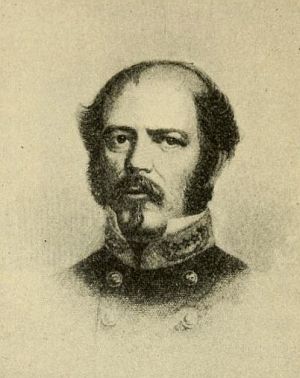
General Joseph E. Johnston.
492. McClellan’s Peninsula Campaign.—McClellan, with an army one hundred thousand strong, reached the lower Peninsula, between the York and the James, early in March. Here he found himself confronted by General Joseph E. Johnston[218] at Yorktown, and later at Williamsburg. Johnston’s force was less than a third of McClellan’s, yet McClellan decided not to attack, but to employ an engineer’s slow methods of siege. If a resolute attack had been made, Johnston would probably have been defeated, and McClellan would have been free to advance up the James. Johnston watched his adversary closely, well knowing that when McClellan’s siege works were ready they could not be resisted. Meanwhile the Confederate force was constantly increasing, and a precious month was gained for drilling their new recruits. On May 3, three days before McClellan was to attack, the Confederates evacuated Yorktown. McClellan ordered Hooker to pursue. Overtaking Johnston at Williamsburg, Hooker was repulsed, after which Johnston retreated rapidly towards Richmond. McClellan followed with such slowness that fourteen days were consumed in marching less than fifty miles. During the whole of these two months, he enormously overestimated the force by which he was confronted and continually asked for reënforcements. On the 17th of May, Lincoln ordered McDowell to join McClellan, but the order was not carried out, for reasons that will now be given.
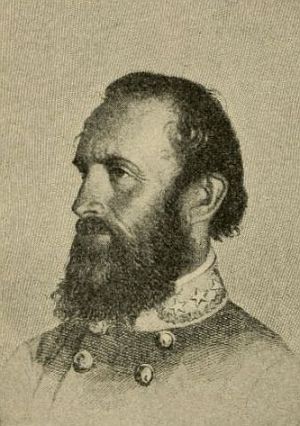
Stonewall Jackson.
493. Stonewall Jackson’s Movements.—The slowness of McClellan’s advance up the Peninsula not only relieved the Confederate government of any fear for the safety of its capital, Richmond, but also showed that General Thomas J. Jackson’s corps could safely be spared for operations against the Federals in the North. In order to defeat the larger forces of McDowell, Banks, and Frémont, Jackson[219] decided first to strike the central army of the Union troops, and then to destroy the two wings in turn before they could unite. Advancing with Napoleonic rapidity from Staunton, he fell upon Banks near Winchester, Virginia, and not only routed him, May 25, but drove him across the Potomac into Maryland. Then retracing his steps, he turned his face westward, and in a similar manner overwhelmed the army of Frémont at Cross Keys, June 8. Meanwhile, General Shields of McDowell’s army, who, with a force about the size of Jackson’s, had crossed the Blue Ridge in order to assist Frémont, found, on his arrival in the Valley, that Frémont’s army had been broken up and practically dispersed. Jackson had no difficulty in defeating Shields, at Port Republic, as he had defeated the others. Thus, in thirty-five days, Jackson’s army had marched two hundred and forty-five miles, had fought three important battles, besides two minor ones, winning them all, and had practically destroyed three Union armies. He had also kept forty thousand men under McDowell from joining McClellan. Leaving a portion of his troops to keep up an appearance of activity, he now turned swiftly to the south with the major part of his force, and within a week was ready to coöperate with Lee against McClellan. His movements had been so rapid and mysterious that his departure was not detected at Washington, and McDowell was needlessly kept in his place for the defense of the capital.
494. McClellan’s Slow Advance.—While Jackson was causing havoc near Washington, McClellan was slowly making his way toward Richmond. On the 11th of May, he learned that the Confederates had evacuated Norfolk and destroyed the ironclad Merrimac, thus leaving the James open for the Federal fleet. The Monitor, with its attending vessels, came up the James River, and advanced as far as Drury’s Bluff, almost within gunshot of Richmond. Had McClellan pushed rapidly on, with the help of the fleet he could, in the opinion of many military critics, have taken the city. Richmond was thrown into consternation. But McClellan’s movements continued to be so incredibly slow that all fear was soon dispelled. Instead of keeping along the James, as he should have done as soon as he learned of the movements of the Monitor, he divided his army, putting part of his forces north of the Chickahominy and part south of it. The bridges were greatly weakened by floods, and the two divisions of the army, thus separated, were in serious danger of not being able to coöperate in case they should be attacked.
495. Confederate Attacks.—McClellan’s headquarters were at Gaines’s Mill on the north side. Johnston, on May 31, decided to attack the corps that confronted him at Fair Oaks, or Seven Pines, on the south. The beginning of the battle was favorable to the Confederates, and the Federals were saved from complete rout only by the opportune arrival of Sumner’s corps, which came over “swaying and tossing bridges” from the north. But the serious wounding of Johnston and the arrival of Sumner turned the tide, and at night the Unionists had the advantage.[220] Johnston, on account of his wound, was obliged to retire from the command. In the morning, a new bridge constructed in the night enabled reënforcements to be transferred from the north side; but McClellan, who arrived on the field only late in the day, instead of ordering an immediate pursuit, expressed himself as satisfied and recalled his army to the ground it had occupied before the battle. A Federal corps at one time was within four miles of Richmond, and it is probable that, if a prompt advance had taken place, like that of Grant on the second day at Shiloh (§ 478), the city would have fallen, for the fortifications which later made Richmond impregnable from this direction had not yet been constructed.
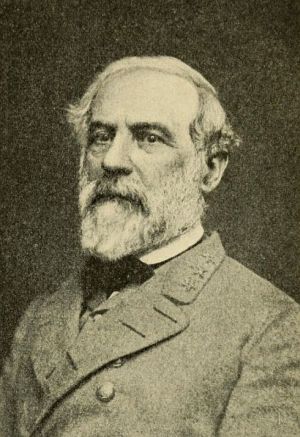
General R. E. Lee.
496. General Robert E. Lee.[221]—General Lee, who up to this time was Davis’s chief of staff, now succeeded Johnston as general in command. He immediately gathered the reins into his hands, and quickly showed that genius for organization and action for which he soon became so celebrated. Directing Longstreet to be prepared for an attack at any moment on his right, he devoted the major part of his energies to the construction of works which should make his lines impregnable. Though McClellan’s force was nearly twice that of Lee, the industrious Confederates were not interfered with. At length, near the last of June, Lee completed arrangements for an offensive movement. As Jackson had now finished his destructive work in the vicinity of Washington, Lee ordered him to move rapidly to the south, so as to be ready for an attack on McClellan’s flank and rear. The united forces of Lee and Jackson, amounting to fifty-five thousand, were now ready to fall upon the Federals north of the Chickahominy, just as McClellan, with the larger part of his force, was preparing to advance south of it.
497. The First of the Seven Days’ Battles.—The arrival of Jackson was half a day later than had been expected, and consequently the first Confederate attack was repulsed. But the next day, June 27, with Lee in command, the Confederates, fifty-five thousand strong, led by Jackson, Longstreet, D. H. Hill, and A. P. Hill, at Gaines’s Mill assaulted the Federals, thirty-one thousand strong, under the command of General Fitz John Porter. A stubborn and magnificent resistance was made, but it was only partially successful. Porter, however, with the help of reënforcements from Sumner, was able to withdraw in good order to the south side of the river. While the battle on the north side of the Chickahominy was going on, there were only about twenty-five thousand Confederates on the south side, under Magruder, between Richmond and the seventy thousand under McClellan. Again, however, no attempt was made to take the capital.
498. McClellan’s Change of Base.—McClellan believed that he was confronted by about one hundred and eighty thousand men, and for safety determined to change his base of supplies and transfer his army to the James River. In this move he completely deceived Lee, and, after destroying a large part of his stores, brought his army together in an orderly retreat. The Confederates pursued, and severe battles took place at Savage’s Station, Frayser’s Farm, and Glendale. The attacks of the Confederates were, however, repulsed. Finally, Lee, in opposition to the advice of his generals, determined on a desperate assault upon Malvern Hill, where McClellan was very strongly posted. The Confederates were defeated with great slaughter, July 1.[222] Then McClellan, who had won the majority of the battles, but had lost the campaign, withdrew his army to Harrison’s Landing on the James River.
499. Influence of McClellan’s Defeat.—McClellan’s defeat greatly depressed the North and cheered the South; but Lincoln showed his spirit by issuing a circular letter to the governors of the loyal states, in which he declared that his purpose was to fight the war through to the restoration of the Union, and expressed the belief that the cause would best be promoted if a call for new troops were first suggested by the governors. The governors accordingly, on July 2, in a circular letter, asked the President to call for “men enough to speedily crush the rebellion.” Lincoln called for three hundred thousand volunteers, and so hearty was the response, that the number furished was over four hundred and twenty-one thousand.
500. Attitude of Congress.—Congress, also, showed that there could be no thought of abandoning the contest, but, on the contrary, promptly authorized the President to take possession of all the railroads and telegraph lines whenever the public service should seem to require it. Faith in the future was furthermore proved by the enactment of many laws of a far-reaching nature. Besides other important measures, Congress provided for the construction of a railroad to the Pacific Ocean, established the Department of Agriculture, and voted the “Morrill Grant,” which gave to each state as many times thirty thousand acres of land as it had members of Congress, for the support of colleges in which agriculture and the mechanical arts should be especially taught. The Morrill Act was the foundation of most of the agricultural colleges and many of the state universities in the country, and thus was of great educational importance.
501. The Question of Slavery.—In the course of the summer there was a general demand on the part of radical Republicans that, either by act of Congress or by proclamation of the President, slavery should be abolished. Lincoln held the opinion that slavery could not be interfered with by Congress, but only by an amendment of the Constitution or as a war measure by the President, as commander in chief of the army. Frémont had, as we have seen (§ 470), declared the slaves free in Missouri, and Hunter had done the same in South Carolina, Georgia, and Florida; but the President had promptly annulled both these orders, with the declaration that he could not allow any general to free the slaves and throw the responsibility of the act upon the President. Lincoln’s course provoked much opposition on the part of radical opponents of slavery, and their dissatisfaction was strongly expressed, August 20, in an editorial of Horace Greeley’s in the Tribune, entitled “The Prayer of Twenty Millions.” Lincoln’s clear and pungent answer[223] served to satisfy public opinion, but there is now evidence that he was thinking seriously of the matter of emancipation. On the 13th of July, he had said to Seward and Welles that “something must be done in the line of a new policy,” that he had “about come to the conclusion that it was a military necessity, absolutely essential for the salvation of the nation, that we must free the slaves, or be . . . ourselves subdued.” Following this line of thought, on the 22d of August, he surprised all the members of his Cabinet, excepting Seward and Welles, by presenting a proclamation which he proposed to issue. The proposal met with general favor, but Seward questioned the expediency of issuing it at that juncture. In view of recent reverses, he thought it would be regarded as “our last shriek on the retreat.” Seward’s objection struck the President with force, and he put the proclamation aside to await a victory.
502. Dangers from Great Britain.—The ill feeling of Great Britain, which showed itself at the beginning of the war, and was intensified by the Trent affair, in November, 1861, was still further increased by the reverses of McClellan. It was apparent that a majority of the British upper and middle classes favored the South, that leading statesmen regarded the defeat of the Union cause as inevitable, and that the most delicate tact of diplomacy would be needed to prevent a formal recognition of the Confederacy. In March, 1862, the Florida, a vessel built and equipped for service with the Confederates, sailed from Liverpool. Though seized at Nassau, she was acquitted by what the British Chief Justice afterward called “a miscarriage of justice,” and set free. In June attention was called to a far more serious matter. The American Minister at London, Charles Francis Adams, and Mr. Dudley, the American Consul at Liverpool, became aware that another war steamer, far more powerful than the Florida, was being fitted out for the Confederate service. Adams at once called the attention of Lord Russell, the British Minister for Foreign Affairs, to the fact, and asked that the ship be detained, unless it should be found, on investigation, that its purpose was not hostile to the United States. The British government was bound by international usage either to arrest the vessel or make the investigation requested. They undertook the latter course, but the process was so slow, and the work on the ship was so rapid, that just before an arrest was to be made, the vessel escaped and put to sea. This was the famous Alabama, which, with the Florida and the Georgia, very nearly cleared the ocean of American commerce.
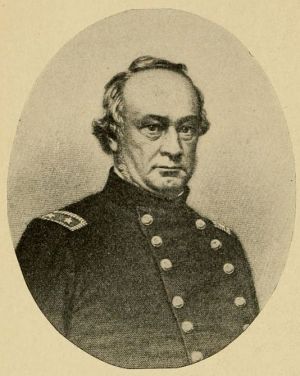
Major General H. W. Halleck.
[By courtesy of G. P. Putnam’s Sons.]
503. Pope and Halleck.—Nearly a month before the end of McClellan’s Peninsula campaign, the President summoned General John Pope from the West, where he had been successful as commander of the Army of the Mississippi. The remnants of the forces of McDowell, Banks, and Frémont were consolidated by Pope into a new organization, known as the Army of Virginia, and pushed forward to the Rapidan River. McClellan, on reaching Harrison’s Landing (§ 498), had written the President that his “army had been saved,” but that it was completely exhausted, and needed a reënforcement of one hundred thousand men. This surprising statement, prompted by McClellan’s standing belief that Lee’s forces greatly outnumbered the Federal army, induced Lincoln to visit the camp at once. After a long conference with McClellan, Lincoln decided, on July 11, to appoint Major General Henry W. Halleck[224] general in chief of all the armies of the United States. Halleck had commended himself to the country by successfully directing affairs in the West. Lee, anticipating the course of Halleck, whom he had formerly known well, immediately detached Jackson from his army before Richmond, and sent him to confront Pope. Halleck visited McClellan on July 24, and, immediately afterward, in order ultimately to reënforce Pope,[225] ordered that the Army of the Potomac be withdrawn, and be transferred by way of Fortress Monroe to the Potomac near Fredericksburg. The McClellan campaign was thus admitted to have been a failure. Lee, now freed from danger in the vicinity of Richmond, hastened to reënforce Jackson by sending to the Rapidan Longstreet’s corps, which arrived on the 15th of August. A little later, Lee followed and took command of the entire force.
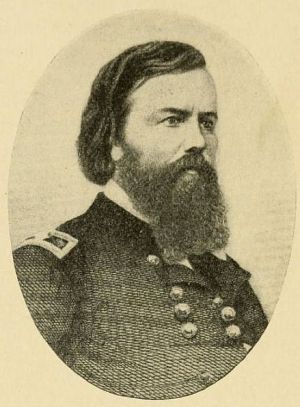
General John Pope.
[By courtesy of G. P. Putnam’s Sons.]
504. The Second Battle of Bull Run, or Manassas.—In the last week of August, Lee sent Jackson and Longstreet in succession around Pope’s right flank, interposing their forces between him and Washington. Before any of McClellan’s army, except Fitz John Porter’s corps, had arrived, the forces of Lee and Pope fought the second battle of Manassas, or Bull Run, on the 29th and 30th of August. In view of the position of the forces, it is not strange that the Union army, numbering about sixty thousand men, was overwhelmingly defeated by the Confederate force of about fifty thousand. The Union loss was more than fourteen thousand, while that of the Confederates was less than ten thousand. The issue of the battle was, at the time, largely attributed to the delay of McClellan’s force in returning from the James River, and especially to the failure of General Fitz John Porter’s corps[226] to render the proper assistance, after it had arrived.
505. Battle of Antietam, or Sharpsburg.—Lee, instead of making a direct attack on Washington, decided to cross the Potomac for an invasion of Maryland and the North. His chief purpose, as he announced in a proclamation, was to arouse the Confederate sentiment in Maryland and unite the state with the Confederacy. Crossing the river near Harper’s Ferry, he took Frederick City and pushed forward toward Pennsylvania. But no signs of a sympathetic rising of the people encouraged him. He was surprised to find that even farmers whom he supposed to be Southern sympathizers would not sell their produce for Confederate money. As soon as Lee saw that he was not to get supplies in Maryland, he sent Stonewall Jackson back to take Harper’s Ferry and thus open communications for supplies with the rich Shenandoah Valley. The heights above Harper’s Ferry had been neglected by the Federals, and Jackson easily took the place, with twelve thousand five hundred prisoners. McClellan, who on the 2d of September, had arrived in Georgetown with the major part of his army, after a long conference with the President in Washington, was directed to resume command, not only of his own forces, but also of the Army of Virginia. By spasmodic promptness of movement, and encouraged by an accidental discovery of Lee’s orders disclosing his whole plan of campaign, the Union commander was able to advance so rapidly as to throw his army in front of Lee. McClellan was jubilant, and had confident hope of destroying or capturing Lee’s army. But his later movements were so dilatory that Jackson returned from Harper’s Ferry before the battle. The two armies first came in contact in the vicinity of South Mountain. The preliminary conflict was decidedly in McClellan’s favor. Then occurred the desperate battle of Sharpsburg, or Antietam, on the 17th of September. The Union army was the larger of the two, but the number of the forces engaged cannot be confidently estimated. The tactics of McClellan on the field have been regarded by military critics as very faulty, while Lee is thought to have handled his troops with great skill. It was the most desperate and bloody single day’s battle of the war. The final advantage was with the Federals, though the victory was not by any means decisive. The losses of McClellan were more than thirteen thousand, and Lee’s more than eleven thousand.[227] McClellan had lost another great opportunity; but Lee’s advance was checked. He was so weakened that he was compelled to withdraw to Virginia, and his movement as a whole was a failure. At this time, when a rapid pursuit might have broken up Lee’s army, which, according to Longstreet, was so crippled that ten thousand fresh troops could have destroyed it, McClellan had about twenty thousand troops in reserve. The latter, mainly in consequence of his excessive caution and lack of promptitude, was soon superseded by General A. E. Burnside.[228]
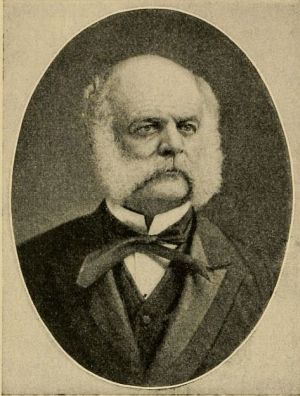
General A. E. Burnside.
506. Burnside’s Disastrous Campaign.—Burnside hastily brought together all the Union forces in north Virginia for the purpose of a direct advance on Richmond. With an army which, early in December, numbered about one hundred and thirteen thousand men, he crossed the Rappahannock at Fredericksburg; but Lee and Jackson had reached the southern bank before him, and had posted their forces advantageously on the high grounds back of the town. Burnside, having arranged his army in three divisions, under Franklin, Hooker, and Sumner, crossed the river on December 13, and had the temerity to attempt to carry the works by storm. The result was disastrous. The Union army was pushed back in confusion upon the river, and might have been annihilated if Lee had used his advantage. As it was, Burnside safely withdrew his shattered forces to the north side of the river. The Union loss was over twelve thousand, while the Confederates lost considerably less than six thousand.[229] General Joseph E. Hooker soon superseded Burnside, and the Union army went into winter quarters. Lincoln was especially depressed by the result, as he had hoped for a victory which would counteract the hostility of Great Britain. The contrary effect was indicated by the London Times, which referred to the battle as “a memorable day to the historian of the Decline and Fall of the American Republic.” Throughout the North, the following days were days of darkness and gloom. Stocks declined, and troops volunteered more slowly than ever before.
507. Military Results of the Year.—Thus the events of the year, notwithstanding great losses on both sides, had not essentially changed the situation. While no territory of importance had been lost, no considerable gain had been secured. McClellan, McDowell, Banks, Frémont, Pope, and Burnside had all proved unable to cope successfully with their opponents, and had all been relieved. Up to the end of 1862, the military successes of the Union troops had all been in the West and the great losses had all been in the East. The military history of the year had made it evident to President Lincoln and to Congress that every resource of the North must at once be brought to bear upon the conflict in order to insure success. The commander capable of holding his own against Lee had not yet appeared. It was to require another year to reveal him. Meanwhile, the necessities of the situation led to the emancipation of the slaves, the levy of new taxes, and the conscription of troops.
508. Emancipation of Slaves.—In March, 1862, slavery had been abolished in the territories by Act of Congress, and in April, emancipation had taken place in the District of Columbia. In the same year, Lincoln had urged the governors of the border states to adopt a proposition for compensation to such of the border states as might abolish slavery. The failure of the Peninsula campaign and the campaign in the Shenandoah Valley, and the defeat at Manassas, convinced the President that emancipation was justifiable as a war measure, and should be resorted to as soon as a victory could be secured. Accordingly, immediately after the battle of Antietam, he issued a proclamation, declaring that in such slaveholding states as should not have returned to their allegiance to the United States on January 1, 1863, all slaves would, on that day, be declared free. As none of the seceding states returned to its allegiance, the Proclamation of Emancipation was issued on the 1st of the following January, and thereafter, all negroes in these states were regarded by the Union army as free men.
509. Influence of Emancipation on the War.—The effect of the Emancipation Proclamation was not quite what was anticipated. Contrary to general expectation in the North, the negroes showed remarkable faithfulness in remaining with their old masters. They were very generally employed in the South in caring for the plantations, and sometimes were used for work on fortifications. It was only in recovered territory that their relations were much changed. Before the end of the war, about one hundred thousand of them were enlisted in the Union army, and they fought with great bravery. As the South refused to recognize them as soldiers, they could not be exchanged when taken prisoners. The embarrassment which followed had much to do with the entire cessation of exchanges in the latter part of the war. In consequence of this cessation, prisons were overcrowded and the sufferings of prisoners increased.
510. Effect of Emancipation upon Europe.—In Great Britain, public opinion was very slow to respond to the proclamation of freedom. The fact that their supply of cotton was cut off by the more complete blockade of the Southern ports caused great suffering on the part of the British manufacturing population. While the laboring classes were generally in sympathy with the North, the owners of the factories and the wealthy classes, led by Palmerston, the Prime Minister, and Russell, the Foreign Secretary, were in favor of the South. Many, not realizing that it was a war for national integrity, regarded it as a war for liberty on the part of the South, and for conquest on the part of the North.
511. Change of British Policy.—About the middle of October, 1862, the danger that Great Britain might recognize the Southern Confederacy was averted. On the 7th of October, at a banquet at Newcastle, Gladstone, then Chancellor of the Exchequer declared, “Jefferson Davis and other leaders of the South have made an army; they are making, it appears, a navy; and they have made, which is more important than either, a nation.” When the applause which followed this utterance had subsided, he continued, “We may anticipate, with certainty, the success of the Southern states so far as their separation from the North is concerned.” This speech, of which these sentences were the keynote, created a great sensation, and was immediately interpreted as a purpose on the part of the government to recognize the Confederacy. The American Minister, seeing clearly that the drift was unmistakably toward recognition, wrote to his government for instructions in such a dire contingency. Then President Lincoln sent a masterly letter which changed the whole situation. His instructions to Mr. Adams in case the British Ministry should approach him, directly or indirectly, on any matter of our internal affairs, were as follows: “You will answer that you are forbidden to debate, to hear, or in any way receive, entertain, or transmit any communication of the kind. If the British government, either alone, or in combination with any other government, should acknowledge the insurgents, you will immediately suspend the exercise of your functions, and give notice of that suspension to Earl Russell, and to this department.” The letter also contained these resolute words: “We meet and confront the danger of a war with Great Britain. We have approached the contemplation of that crisis with a caution which great reluctance has inspired. But I trust that you will also have perceived that the crisis has not appalled us.” Adams hesitated to present this letter to Earl Russell, but made its contents known to Russell’s friend, William E. Forster, and gave his consent that Forster should in turn make them known to Russell. It was probably at this juncture that the Queen, if the “credible report” is true, said to Russell, “My lord, no step must be taken which will involve us in war with the United States.” On October 23, Russell informed Adams that the policy of neutrality was not to be changed.
512. Suspension of Habeas Corpus.—In the summer of 1862, the Northern opponents of the war took every advantage of the military disasters to denounce the course of the government, to discourage enlistments, to demand a cessation of hostilities, and, in many ingenious ways, to thwart the success of the Union cause. After the disasters in the Peninsula and at Manassas, the clamors were so great and the difficulties of conviction for treason so many that, on the 24th of September, President Lincoln issued an order suspending the writ of habeas corpus throughout the country. This act was of doubtful constitutionality, and shows, better than any other one thing, the almost desperate straits into which the government was driven. The suspension of the writ enabled the military authorities to seize and imprison without trial any persons who might be accused of treasonable acts, or even of disloyal speech. Large numbers were arrested and thrown into prison.[230]
513. The Elections in 1862.—The disasters in the field and the suspension of the writ of habeas corpus had a marked effect on the fall elections. In every one of the Northern states the Republican majority was greatly reduced, and in six of them[231] that had cast their votes for Lincoln in 1860, the Democrats were victorious. The House of Representatives barely escaped being Democratic. It was almost a vote of “want of confidence” in the President. An analysis of the vote showed that many of the people regarded the Emancipation Proclamation as a surrender of Lincoln to the radical Republicans. It seems certain that more votes were lost than gained in consequence of the Proclamation. But the President, though disappointed, never for a moment swerved from his purpose, as his message to Congress in December, 1862, plainly showed.
References.—Grant, Memoirs, Vol. I., 242-284. Rhodes, History, Vol. III., 404-639, for the period from the appointment of Lee to the capture of New Orleans; the same, Vol. IV., from the beginning of McClellan’s campaign at Yorktown till Lincoln’s reëlection, is at all points full, painstaking, and valuable. Schouler’s History of the United States, Vol. VI., covers the whole period and is valuable on all points of the Civil War. Allan, Army of Northern Virginia; Battles and Leaders of the Civil War, Vol. I., 388-443, 611-692, Vol. II., 135, 189-319; Dodge, Bird’s-Eye View of Our Civil War, chaps. vi., x.–xiii.; Dabney, Life of Stonewall Jackson; Maclay, History of the United States Navy, Vol. II., 282-324, for Monitor and Merrimac, and 364-497, for the capture of New Orleans; Old South Leaflets, III. No. 3, for contest of Monitor and Merrimac. The biographies of Lincoln by Tarbell and by Nicolay and Hay may be constantly consulted with profit.
|
In twenty years there was hardly a wooden ship of war afloat. The Monitor, however, did not prove to be a good sea-going vessel, and sank in December, 1862. |
|
The losses of the Federals were 5031; those of the Confederates, 6134. See Battles and Leaders of the Civil War, Vol. II., p. 219. |
|
In the Seven Days’ Battles, McClellan’s loss was 15,849; Lee’s, 20,135. See Battles and Leaders of the Civil War, Vol. II., p. 315. |
514. Situation in the West.—At the opening of the year 1863, it was evident that in the West the most important military operations would center about Vicksburg, on the Mississippi River, and Chattanooga, in eastern Tennessee. Vicksburg was a strongly fortified city, and until it should be taken the Mississippi River could not be controlled by the Union forces. The importance of the place lay not only in the fact that it prevented the Federals from making use of the river, but also in the fact that it furnished the Confederates with easy passage for troops and supplies from Texas and Mexico. In strategic importance, it was scarcely inferior to Richmond itself; for it now held the only remaining railroad which extended from the far West into the Eastern states of the Confederacy. Chattanooga was also important, since it was so situated as to control, not only Eastern Tennessee, but also the most easy and natural passage from Virginia to the Southwest. Soon after Halleck was placed in command at Washington, in July, 1862, Grant was left in charge of the territory about Vicksburg, and Rosecrans about Chattanooga.
515. First Efforts against Vicksburg.—Vicksburg is situated on a high bluff on the eastern side of the Mississippi. Just above the town, the river turns sharply to the northeast, and then, winding into a loop on which Vicksburg is built, flows again toward the southwest. The regions west and south being so low as often to be flooded, and the territory being intersected by numerous streams, military movements were rendered extremely difficult. In November and December, 1862, and again in January, 1863, unsuccessful attempts were made against the city, by Grant and Sherman. As the spring of 1863 advanced, efforts were renewed. Grant cut a new channel for the river, across the neck, hoping to leave Vicksburg high and dry inland. In this endeavor he was not successful.
516. Johnston and Pemberton.—The Confederate forces in the West were commanded by General Joseph E. Johnston, who had now recovered from his wound (§ 495), General Pemberton being second in command. Johnston desired to meet Grant in the field, thinking that thus Vicksburg could best be held, and ordered Pemberton to conduct operations on this line; but Pemberton, encouraged by some recent successes, and not recognizing Johnston’s right to command him, chose to fight behind the fortifications of the city. This difference of policy divided their forces, so that, while Pemberton remained at Vicksburg, Johnston, with headquarters at Jackson, held himself in readiness to attack the lines of Grant as opportunity might offer.
517. Capture of Vicksburg.—Grant’s next strategic move was one of the most daringly planned and brilliantly executed of the whole war. It was to pass with his army through the Louisiana swamps west of the city, and, cutting himself free from his base of supplies, to obtain a foothold on the river below, while Admiral Porter should force a passage in the night with his gunboats loaded with supplies. The movement, in spite of determined resistance on the part of the Confederates, was completely successful. After several minor engagements, Grant took possession of the country as far as eighty miles south and west of Vicksburg. Without waiting to establish a base of supplies, and disregarding the earnest protest of Sherman, he advanced, May 7, from Grand Gulf northeast toward Jackson. Here, on May 14th, he defeated Johnston, and later joined with Sherman on the east side of Vicksburg, thus separating the Confederate armies. He then defeated Pemberton in the open field, and finally, by May 18, drove him behind his fortifications.[232] After weeks of fruitless effort, Pemberton was obliged, July 4, to surrender with over twenty-nine thousand prisoners of war.[233] This was by far the greatest Union victory yet achieved, and the number of prisoners was the largest ever surrendered in America. His success made Grant the foremost of the Federal generals. Four days later, Port Hudson also surrendered, and the Mississippi River throughout its course was opened to the Union army. The Confederacy was thus cut into two parts, and no reënforcements or supplies in any considerable amount could thereafter reach the Southern armies from the west side of the river.

The Vicksburg Campaign
518. Eastern Tennessee: Chickamauga.—While Grant was occupied about Vicksburg, important events were taking place in the eastern part of Tennessee. In June, Rosecrans, who had been much criticised for inactivity after the battle of Stone River, broke up his encampment in the vicinity of Murfreesborough. Bragg was a few miles to the south, at Shelbyville, but was soon forced to fall back on Chattanooga. Rosecrans then moved so far around Bragg’s army to the south that the Confederate commander deemed it prudent to evacuate Chattanooga and withdraw some twelve miles into Georgia. Rosecrans hastened to pursue; but Bragg, after receiving reënforcements under Longstreet from Virginia, turned upon his pursuers. Rosecrans drew back toward Chattanooga, and at Chickamauga was vigorously attacked by Bragg. The battle raged furiously for two days, September 19 and 20, and was one of the most sanguinary of the war. The Union forces were finally driven from the field.[234] General George H. Thomas,[235] who, like Admiral Farragut, was a Southern officer that took the Union side, greatly distinguished himself by withstanding the final assaults on the center, and so delayed the pursuit that the Union army was able to withdraw in fair condition into Chattanooga. For this service, Thomas was afterwards called “The Rock of Chickamauga.”
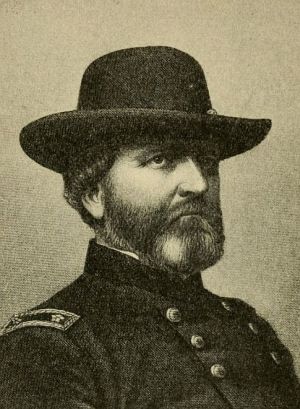
General George H. Thomas.
519. The Situation at Chattanooga.—East of Chattanooga, at a distance of about three miles, is situated a long, high hill, rising almost to the magnitude of a mountain, known as Missionary Ridge; while south of the city another elevation, known as Lookout Mountain, rises about seventeen hundred feet. On these two heights, overlooking Chattanooga, Bragg established his army. He was also in control of the Tennessee River. The force of Rosecrans, shut up in the city, had only a single road, known by the soldiers as the “cracker trail,” for supplies from the west. Every other approach was commanded by the Confederate guns. Bragg was so sure that the Union army would be forced to surrender, that he sent Longstreet to assist in the siege of Knoxville, which city was then held by General Burnside.
520. Grant at Chattanooga.—Soon after the battle of Chickamauga, Rosecrans was relieved, and Grant, who had been put at the head of all the armies west of the Alleghanies, assumed command in his place. To reënforce the Union forces, Hooker was sent with the Twelfth Corps from Virginia, and Sherman, with the Army of the Tennessee, was brought from Vicksburg by way of Memphis. Hooker took a position on the right, Sherman on the left, while Thomas, with the Army of the Cumberland, commanded the center.
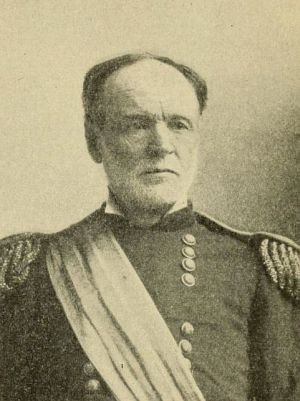
General William T. Sherman.
521. Battles of Chattanooga.—Grant’s plan, after opening a line of supplies, was to have the two wings of the army push back the opposing flanks of the enemy until the center would be obliged to retire from Missionary Ridge. Bragg’s left, on Lookout Mountain, was some five miles in front of his main line; and Hooker’s army, in order to dislodge the enemy, was obliged to pass over the shoulder of the mountain. The Twelfth Corps pushed up the mountain side with great gallantry, fought what is sometimes called “The Battle above the Clouds,” November 24, and soon succeeded in driving the enemy from the mountain and back beyond Missionary Ridge. Sherman,[236] on the left, advanced rapidly, but found a deep ravine in his way. Thomas was directed to engage the enemy in front, in order to keep the Confederate center from attacking Sherman, but not to advance to a general engagement. His troops, however, not to be outdone either by the Army of Virginia or by the Army of the Tennessee, charged up the sides of Missionary Ridge and drove all before them. Bragg’s forces, compelled to withdraw November 25, pushed rapidly south through the field of Chickamauga and took up their winter quarters at Dalton.[237]
522. Results of the Campaigns in the West.—The battles about Chattanooga closed the campaigns for the year. Kentucky and Tennessee had been secured by the Union forces, who, through the opening of the Mississippi River, were enabled to pass freely to the Gulf of Mexico. The successes of Grant at Vicksburg and Chattanooga raised him to such importance that in November he was called to Washington, and, in February, with the rank of lieutenant general, superseded Halleck as general in chief of all the armies.
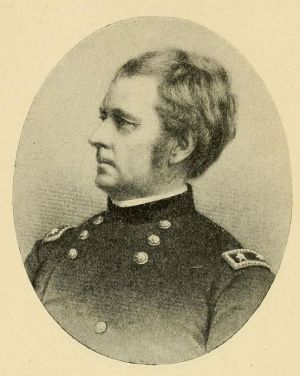
General Joseph Hooker.
523. Chancellorsville.—In the East, at the close of the Antietam campaign, McClellan, as we have seen, had been superseded by Burnside, and the latter, after Fredericksburg, by Hooker[238] (§§ 505-506). In April, 1863, the Union army of about ninety thousand advanced southward for the purpose of pushing its way by direct line to Richmond; but a few miles south of Fredericksburg, Hooker was confronted (at Chancellorsville) by a Confederate army of about forty-five thousand under Lee and Jackson. The battle which ensued, May 3, was most disastrous to the Union cause. By superior generalship, Lee and Jackson completely thwarted the strategy of Hooker, and not only repulsed the Federal army, but threw it into confusion and drove it back to the north side of the Rappahannock. The Union loss was about seventeen thousand; the Confederate, about twelve thousand. The loss of the Confederates, however, was not counted by numbers alone; for just before the main battle, General “Stonewall” Jackson, the most successful corps commander that the war produced on either side, was accidentally fired upon and killed by his own men.
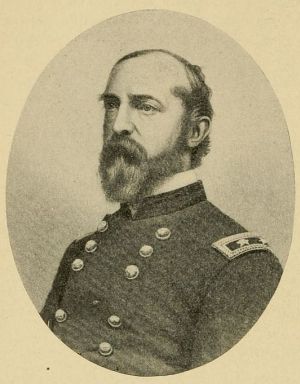
General George G. Meade.
524. Second Advance into the North.—Inspired by his remarkable success at Chancellorsville, Lee decided to attempt again a movement into the North. Crossing the Blue Ridge and marching down the Shenandoah Valley, he passed the Potomac at Harper’s Ferry, and, advancing across Maryland into Pennsylvania, threatened, not only the rear of Washington, but also the cities of Baltimore and Philadelphia. Hooker followed, keeping at the right of Lee, between Harper’s Ferry and Washington, and moving rapidly northward for the protection of the threatened cities. The Union army was reënforced from every quarter. On the 28th of June, Hooker was superseded by General George G. Meade,[239] of Pennsylvania, a soldierly officer who, though uniformly successful as a division and corps commander, had as yet occupied only a subordinate position. Meade pushed his force of about ninety-three thousand rapidly forward and concentrated it in the neighborhood of Gettysburg, taking up his position on a crest of hills in a circular line south and east of Gettysburg, on what is known as Cemetery Ridge. The Confederate line of about seventy thousand occupied the hills opposite, on Seminary Ridge.[240] At the Union right was Culp’s Hill, and at the left were two hills, known as Round Top and Little Round Top. Thus situated, both armies made ready for the most crucial battle of the war. If Meade should be overwhelmed, the cities of the North would be at Lee’s mercy, and the Confederacy would, in all probability be recognized in Europe; while if Lee should be defeated, he could hardly hope to do more than prolong an unsuccessful conflict.
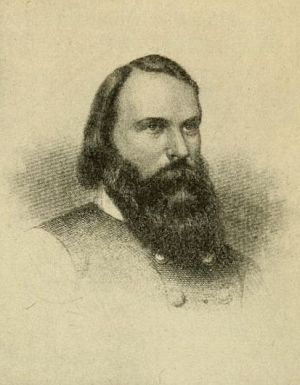
General James Longstreet.[241]
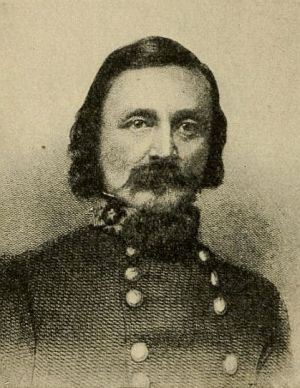
General George E. Pickett.[242]
525. Battle of Gettysburg.—During the first and second days’ engagements, July 1 and 2, the Confederates had the advantage. Culp’s Hill was taken, and the Union right was pushed back from its strong defensive line. On the left, however, the Unionists took and held Little Round Top. On the other parts of the field the repeated onsets of the Confederates were not successful. Early on the morning of the third day, the Federals assaulted Culp’s Hill, and, after most desperate fighting, succeeded in retaking it. Lee then made the mistake of deciding to stake everything on a mighty effort to break the Union center. General George E. Pickett’s division of Longstreet’s corps, consisting of about fifteen thousand veterans, was ordered forward for a charge. After a tremendous fire of one hundred and thirty cannon for two hours, for the purpose of throwing the Union line into confusion, this division, made up of the flower of the Confederate army, rushed forward to the assault. For about one mile they were within range of the Federal guns. No men ever fought more bravely, but success was impossible. The dead and the dying strewed the ground along the way. Only a few of the fifteen thousand reached the Union line, and most of these were obliged to give themselves up as prisoners. The effort failed, and the battle was lost. Lee magnanimously took the whole blame of the defeat upon himself, although he might, seemingly, have thrown part of it on subordinates. The Confederate loss was about twenty thousand, while that of Meade was about twenty-three thousand.[243] Lee conducted a most skillful retreat, and was slowly followed by the tired Unionists across Maryland into Virginia, until the two armies confronted each other on the Rapidan, a branch of the Rappahannock. There they remained more or less inactive until the following spring.
526. The Conscription of Troops in the North.—As the war dragged along, the novelty of it wore off, and enlistments in the North began to flag. The discouraging outcome of the Peninsula campaign and of the battles of Fredericksburg and Chancellorsville caused a rapid decrease in the number of volunteers. Draft, or conscription, was therefore resorted to by Act of Congress, March 3, 1863. This Act of Conscription, however, allowed exemption on payment of three hundred dollars, an amount deemed sufficient for securing a substitute. As only fifty thousand men were thus obtained, the three hundred dollar clause was repealed, July 4, 1864, and a new act declared that the conscript must serve or provide a substitute. To furnish the means of avoiding such an alternative, insurance companies were sometimes formed, and at times as much as one thousand dollars was paid for a substitute. By this system the service was much demoralized, for the large sums offered attracted great numbers who had little or no interest in the cause. Thousands of this class deserted, and to secure bounty, reënlisted, in some instances many times over. Thus “bounty jumper” became a term of deserved reproach. To the first of the Conscription Acts there was much resistance, especially in New York City. On July 13, 1863, a mob took possession of the streets and had entire control of the city for several days. The rioters burned about fifty buildings, and hanged negroes to lamp-posts. The colored orphan asylum was burned, and the inmates were with difficulty rescued from the flames. It was not until troops sent from Gettysburg had come to assist the police that order was restored. About twelve hundred of the rioters were killed. Though conscription did not of itself yield very many soldiers to the army, it greatly stimulated volunteering.
527. Conscription in the South.—As early as April, 1862, all able-bodied white men in the South between the ages of eighteen and forty-five were conscripted (§ 454); and in February, 1864, the age limit was extended, so as to include all from seventeen to fifty. Thus, from almost the very beginning of the war, not only agriculture, but all the other industries of the South were thrown into the hands of men beyond fifty, of women, of negroes, and of children. The suffering that ensued may be imagined, but can hardly be described.[244]
528. The Vallandigham Case.—In 1863 there was not a little excitement over the case of Clement L. Vallandigham, a member of Congress from Ohio, who was the most extreme of Northern sympathizers with the Confederacy. For utterances disloyal to the government he was arrested by General Burnside, and, after trial by a military commission, was imprisoned, and, a little later, banished. He went first within the limits of the Confederacy, and then to Canada. By the Democracy of his state his arrest was regarded as arbitrary and his sentence unlawful, and to show their displeasure, they nominated him for governor. Though he was defeated by about one hundred thousand majority, the size of the vote in his favor was a significant indication of public feeling. The legality of his arrest and banishment was tested by an appeal to the Supreme Court, which decided that under the Constitution it had no power to review the action of a general officer of the army.
529. Financial Conditions.—It was at this time that the enormous cost of the war required the new efforts for raising money which have already been described (§§ 456-458). In the North industries flourished and the bills of the government were promptly paid; but in the South a similar result was impossible. The blockade prevented an income from tariff and from the sale of cotton (§ 455). The bonds payable “six months after the ratification of peace with the United States” sank in value as the success of the South became more and more doubtful, until finally they almost ceased to have any value whatever. A similar fate befell the Confederate bank notes. As these notes were the only currency in circulation, the prices of all articles rose enormously. In 1864 a pair of shoes was worth one hundred and twenty-five dollars in Confederate currency; a barrel of flour, two hundred and twenty-five dollars; a pound of butter, fifteen dollars, and a bushel of potatoes, twenty-five dollars. In one instance, thirty cords of wood were sold for thirty teacupfuls of salt. Prices in general were about fifty times as high as they had been when currency was at par.
References.—Grant, Memoirs, Vol. I., 437-570; Battles and Leaders of the Civil War, Vol. III., 154-255, 493, 638; Dodge, View, 93-101, 172-183, 241-261; Johnston, Orations, Vol. III., 82-92; Sherman, Memoirs, Vol. II., 638. The Histories of Rhodes and Schouler are valuable on all points. Writings of the leading statesmen and generals are indicated in Channing and Hart’s Guide, §§ 32-33. See also De Leon, Four Years in Rebel Capitals; McCulloch, Men and Measures; Greeley, Recollections; Cable, Strange, True Stories of Louisiana; J. E. Cooke, Hilt to Hilt; Trowbridge, Drummer Boy, and Cudjo’s Cave.
|
The official figures are 20,451 and 23,003. See Battles and Leaders of the Civil War, Vol. III., pp. 437-439. |
530. Plan of Campaigns.—The spring of 1864 found Grant as general in chief of all the Union armies, with Meade at the head of the Army of the Potomac, Sherman at the head of all Federal troops in the West, and General B. F. Butler in immediate command of the Army of the James. Grant chose not to supersede Meade, but decided, while keeping him in the field, to superintend the Eastern campaign in person. The “grand strategy” was that all the Union armies should advance on the 4th of May, and that each should keep its opponents so occupied that no one Confederate army could reënforce any of the others. The Army of the Potomac was to move directly toward Richmond, attacking the enemy wherever they could be found. Sherman was to push south from Chattanooga with a similar purpose, toward Atlanta, while Butler was to advance up the James River from Fortress Monroe to Richmond. In this way, it was hoped to finish the war in the course of the summer.
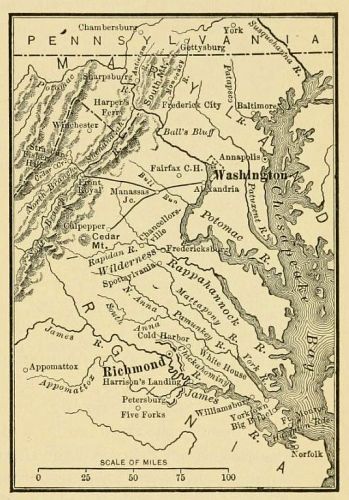
Operations in the East, 1864
531. Advance of Grant toward Richmond.—Grant, with a force of about one hundred and twenty thousand men, crossed the Rapidan and came upon Lee a little south of Chancellorsville. The reports do not reveal exactly the size of Lee’s army, but he probably had about sixty-five thousand men. The Confederates were strongly intrenched, and a hotly contested battle raged for two days, May 5 and 6. It is known as “The Battle of the Wilderness,” since it was fought in a country of tangled thickets. In some cases, so fierce was the fighting, small trees were severed by bullets. Lee could not be dislodged from his strong intrenchments, and Grant, after enormous losses, moved with the bulk of his force by the left flank, and thus forced the Confederates to leave their defenses and fall back to a new line. From the 8th to the 20th various desperate conflicts took place about Spottsylvania, with a similar result. These battles were among the most stubbornly fought of the whole war, the conflict at what is known as the “Bloody Angle” being memorable as an engagement at close quarters, in which large numbers were killed. On the 21st, Grant, undismayed by his failure to break the Confederate lines, again moved by the left flank, and Lee fell back still nearer to Richmond, intrenching himself very strongly on the North Anna River, and later at Cold Harbor. Here, on June 3, Grant made a desperate effort to crush the Confederates by assault, but Lee’s lines could not be broken, and the attempt was as unsuccessful as the Confederate assaults had been at Malvern Hill and at Gettysburg. At Cold Harbor, the Federal loss was over ten thousand, while that of the Confederates behind their intrenchments was only about two thousand. The entire campaign is rendered memorable by the unfailing skill of Lee’s resistance and his remarkable foresight in divining the movements of his enemy, as well as by the splendid energy of Grant’s attacks.
532. Crossing the James.—Skillfully concealing his main movement by continuous attacks along the front, Grant then accomplished the great feat of swinging his entire army across the James, with the purpose of approaching Richmond from the south. There, however, he was confronted with strong fortifications about Petersburg, a city some twenty miles south of Richmond, on the Appomattox River. During McClellan’s campaign and since that time, so carefully had the entire country been fortified under the direction of Lee that Grant found an immediate advance impossible. The defenses in front of Petersburg were at once mined by the Federal forces, and on the 30th of July four tons of gunpowder were exploded under the most powerful of the Confederate works. Guns and men were thrown high into the air; but, by a gross blunder, the troops who were to charge in through the breach were not ready, and before the assault was made, the pit was protected by Confederate cannon brought in from a distance on every side. The Union forces lost many more by this effort, known as the “Battle of the Crater,” than did the Confederates. The best that Grant could do during the rest of the year was to extend his lines to the south so far as to cut the railroad from the southeast, which furnished the Confederates a large part of their supplies, and to drill the new troops that came pouring in from the seemingly inexhaustible North.[245]
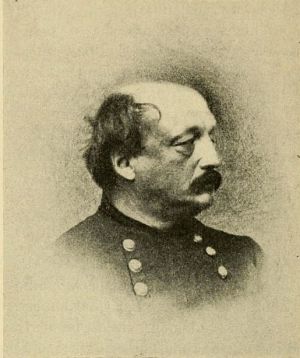
B. F. Butler
533. Subordinate Movements.—The subordinate movements in the East had rendered Grant very little assistance. In the spring General Butler[246] had been sent up the James River, with an army of thirty-six thousand men, to attack Richmond from the south, but the major part of his troops were forced by the Confederates into a bend of the river at Bermuda Hundred, and there, as Grant said, were “bottled up.” Sigel and Hunter also had been sent into the Shenandoah Valley for the purpose of taking Lynchburg and then advancing on Richmond from the southwest, but they were defeated by General Early and driven over the mountains into West Virginia. Thus the Confederates secured command of the entire Valley and threatened Washington. Passing over into Maryland early in July, they defeated General Lew Wallace at Monocacy, and then pushed on until Early with his force actually appeared before the defenses north of the capital. But finding these more formidable than he had anticipated, he withdrew without making an attack. Late in July, one of Early’s subordinates, McCausland, burned Chambersburg, Pennsylvania, in consequence of a refusal of the city to pay a ransom of five hundred thousand dollars in greenbacks. The vigor of this policy provoked immediate retaliation. In September Grant sent Sheridan against Early, and the tables were soon turned. Early was defeated in several engagements in September and October; and Sheridan, in accordance with Grant’s orders, desolated the Valley of Virginia so completely that no further supplies could be furnished the Confederate army before another summer.
534. Sherman’s Advance.—In the West, the movement of Sherman was in some respects similar to that of Grant. The Union force gathered at Chattanooga numbered about one hundred thousand men, while that of the Confederates numbered about ninety thousand.[247] Sherman’s policy was to attack Johnston’s defenses lightly in front, and by extending his line either to the right or to the left, attack the latter in the flank and oblige him to come out into open battle or to retreat. Johnston, though constantly fortified, instead of fighting vigorously, as Lee was doing, fell back without offering great resistance. This course was justified by the fact that Johnston knew that Sherman’s army must be fed by transportation over a single line of railroad, and by the belief that if Sherman could be drawn into the South, so much of the Union army would be required for guarding trains, and such reënforcements might be secured by the Confederates as they neared Atlanta, that the two armies might ultimately meet on equal terms. In other words, it seemed obvious to the Confederate commander that the farther south Sherman should be drawn, the weaker he would be. The mistake in this strategy lay in underestimating the resources of the North in furnishing new troops with which to aid in protecting the railroad and keeping up the numbers of the Union force.[248]
535. Removal of Johnston.—The campaign was in a mountainous country just south of Chattanooga, and great skill was shown by both generals. Johnston was rapidly pushed back until his forces were near Atlanta, and a decisive battle was at hand. But the people of the South, not understanding the merits of Johnston’s method of conducting the campaign, became impatient. President Davis,[249] who had no partiality for Johnston, yielded to the pressure of public opinion, and, accordingly, just as the Confederates were about to strike their blow, Johnston was removed, and General John B. Hood,[250] who had the reputation of being one of the most energetic generals in the Confederate army, was placed in command.
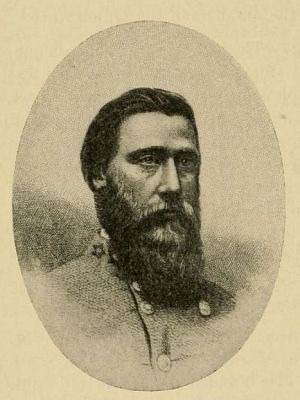
General J. B. Hood.
536. General Hood’s Methods.—Hood’s fighting qualities, however, in accordance with Sherman’s predictions, at once took the form of rashness. He seemed determined to fight, whether a favorable opportunity offered or not. In three important battles in July, on different sides of Atlanta,[251] Hood made desperate attempts to beat back the approaching forces, but was unsuccessful. On September 2 he was obliged to evacuate the city, and early in October he adopted the policy of moving around Sherman’s army and attacking the line of supplies. This was done in the hope that Sherman would follow; but the move was exactly what Sherman anticipated and desired. Following for a short distance, he sent on half of his army under General Thomas, while he returned with the other half to Atlanta. Hood pushed on vigorously toward Nashville. At Franklin, south of Nashville, a battle was fought, November 30, between Hood and a part of Thomas’s army under Schofield, in which the Confederates lost heavily.[252] Thomas made his stand at Nashville and fortified his line with great skill. Remaining long wholly on the defensive, he was much criticised for his delay in attacking; but his answer was that, while willing to turn over his command to another, he would not go out of his defenses to fight a decisive battle until he was ready. The outcome justified his course. On the 15th of December Hood advanced to the attack, and the battle raged for two days; but when the Confederates had spent their force, Thomas ordered his men forward and pushed on so vigorously that Hood’s army was completely broken up and dispersed.[253] It was the most decisive Union victory of the war. Thus Hood, after losing five battles, had now lost his army.
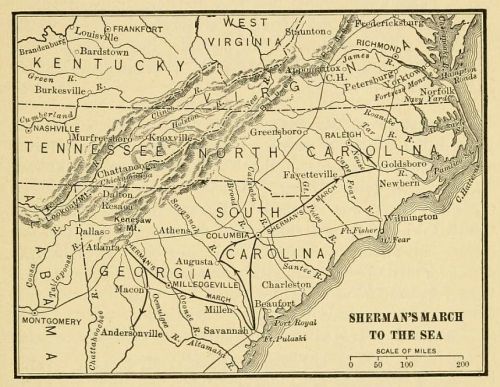
Sherman’s March to the Sea
537. Sherman’s March to the Sea.—As soon as Hood was clearly out of his way, Sherman began preparations for carrying out a plan which had for some time been maturing in his mind. In the spring a movement from Atlanta to Mobile had been contemplated; but Banks had failed to advance upon Mobile from the west, and the plan had been abandoned. Sherman now obtained the consent of Grant to destroy the public works at Atlanta, to break up the railroads so as to cut off Lee’s sources of supply, and then to take his army across Georgia to the sea. This project was undertaken for the purpose of closing in upon Lee from the south and in this manner bringing the war to an end. About the middle of November, Sherman, having burned such parts of Atlanta as might be useful to the enemy, cut all the telegraph wires extending to the north, tore up the railroads in every direction, and then with his army started for the sea. He had about sixty thousand men. These were divided into four divisions and were spread out so that they covered a territory about sixty miles in width. To make repair as difficult as possible, the railroads were destroyed by heating and twisting the rails, and the stations and bridges were burned.
538. Capture of Savannah.—The army reached the sea, December 13, after a march of nearly four weeks. During all this time the people of the North were ignorant of what Sherman was doing. Fort McAllister, at the mouth of the Ogeechee River, was stormed by Hazen’s division of the Fifteenth Corps, and in a single assault of a few minutes was taken. Savannah was besieged, and after eight days the city surrendered, December 21, with a hundred and fifty guns and twenty-five thousand bales of cotton. The army then went into winter quarters, where it remained until February, 1865. Thus Sherman had destroyed the most important Confederate army in the West, had everywhere dispersed opposing troops, and had made transportation of supplies for Lee from the south and west so difficult as to be practically impossible.
539. Work along the Coast: Fort Fisher.—In the course of the year 1864, much was done along the coast to lessen the number of ports held by the Confederates. The most important of the expeditions were those against Fort Fisher in North Carolina, and Mobile in Alabama. Fort Fisher, which commanded the entrance to Wilmington Bay, had successfully resisted an attack by General Butler and Admiral Porter, but now yielded to a force under General Terry, sent by Grant.
540. The Taking of Mobile.—Even more important was the taking of Mobile. The mouth of the harbor was defended by Fort Gaines and Fort Morgan, and the passage to the city was protected by torpedoes and mines. Within the harbor were four powerful Confederate gunboats, including the Tennessee, commanded by Commodore Buchanan, the former captain of the Merrimac. Outside, Admiral Farragut had a fleet of fourteen wooden vessels and four monitors. On the 5th of August Farragut determined to hazard a desperate attempt to run past the forts. The task was not less difficult than the one which had confronted him at New Orleans. In order to have a better means of observing and directing the battle, he had himself lashed to the topmast of the flagship Hartford. The battle that followed was desperate and brilliant. One of Farragut’s vessels was blown up and sunk by a torpedo, but the admiral pushed on past the forts and engaged the Tennessee, which was obliged to surrender. The capitulation of the forts soon followed. After the fall of Wilmington and Mobile, the only port still held by the Confederates was Charleston. Importation of supplies by the Confederates was therefore rendered almost impossible, and many of the Federal vessels engaged in preventing blockade running were released for other services.
541. Defeat of the Alabama: Loss of the Florida and Georgia.—In the course of the same year, the most powerful of the Confederate privateers was destroyed. The Alabama, which under Captain Raphael S. Semmes had taken many Union vessels in all parts of the world, was followed by the Kearsarge, under Captain Winslow, into the harbor of Cherbourg, in the north of France. The ships were about equal in weight and strength. Semmes dared Winslow to a naval duel and his challenge was instantly accepted. The fight occurred on June 19, 1864, and was witnessed by thousands of people on the banks. The firing of the Alabama was much more rapid than that of the Kearsarge, but much less accurate. Within about an hour after the engagement began, the Alabama was found to be in a sinking condition. She struck her flag and soon afterward sank. Captain Semmes was taken from the water by an English yacht and carried to England. Another famous Confederate cruiser, the Florida, was accidentally sunk near Fortress Monroe; and the Georgia was sold and became a merchant vessel under the English flag. All this, however, did not occur until the commerce of the United States had been practically destroyed.
542. Opposition to Lincoln’s Policy.—The suspension of habeas corpus in 1863, and the arrest of Vallandigham and many others, excited great feeling among the opponents of President Lincoln (§§ 512, 528). He was boldly accused of exceeding his constitutional rights, and many newspapers carried on a vigorous battle against him. The history of public sentiment was still more striking in 1864. Early in the year many of the leading Republicans, especially those of the more radical type, thought it would not do to renominate Lincoln. There was a widespread outcry for peace, and the impression became general that peace would be possible if the government would abandon its policy of emancipation. Grant’s Virginia campaign had resulted in great slaughter and had brought sorrow into thousands of households, without bringing him any nearer to Richmond than McClellan had been two years before. Greeley and other prominent Republicans desired a change of policy; but notwithstanding all warnings, Lincoln kept steadily on his course, although at one time he recognized the probability of his defeat for the Presidency.[254]
543. Effects of Victory.—But these dark hours were soon followed by light. First came Farragut’s exploit in taking Mobile; and then, on the 3d of September, followed the stirring news that Sherman had taken Atlanta. The effect was like magic. Seward, in a speech, September 14, said, “Farragut and Sherman have knocked the bottom out of the Chicago [Democratic] nominations.” Then, as a crowning and thrilling inspiration, came the descriptions of Sheridan’s ride (§ 533) and the complete routing of Early at Fisher’s Hill. A veritable wave of enthusiasm took possession of the North. Lincoln was unanimously renominated, with Andrew Johnson of Tennessee for Vice President; and the election gave them two hundred and twelve votes, as against twenty-one given McClellan, the Democratic candidate.[255]
544. Results of the Election.—The result of this election and the Federal victories put new vigor into the Union cause. Recruiting went on rapidly, so that the government in the spring of 1865 had more than a million men under arms. The Confederacy had no such reserve power. It had now lost much more than half of its territory; its sources of supplies were cut off, and its armies were confronted from the south, as well as from the north, by overwhelming forces.
545. Changes in the Cabinet.—Lincoln’s first Cabinet contained not only his rivals for the Republican nomination in 1860, but also a number of representative “War Democrats.” When Stanton, who had always been a Democrat, took the place of Cameron (§ 475), it was noticed that the Cabinet contained four Democrats and only three Republicans. When reminded of this fact, Lincoln intimated that he counted for something himself, and could perhaps manage to prevent the administration from becoming Democratic. As time went on, there were many complaints in regard to the supposed lack of harmony in the Cabinet; and the Presidential nominating convention of 1864 requested the President to make the body more homogeneous. This resolution was aimed especially at Montgomery Blair of Maryland, who was Postmaster-General, and Edward Bates of Missouri, the Attorney-General. They soon resigned and were succeeded respectively by William Dennison of Ohio, who had been president of the nominating convention, and James Speed, a prominent lawyer from Kentucky. Salmon P. Chase, who had often been much out of harmony with the President, resigned the Secretaryship of the Treasury, and was succeeded by William P. Fessenden of Maine. When Chief Justice Taney, after long and important service, died, on the 12th of October, there was much anxiety in regard to the appointment to the position thus made vacant—the most important in the gift of the President. Among others, Chase was a very prominent candidate, strongly urged by radical Republicans. The President gave no sign of his intentions until December 6, when, without having consulted any one, he sent to the Senate, in his own handwriting, the nomination of Chase to be Chief Justice. The nomination was immediately confirmed without reference to a committee. The changes in the Cabinet and the appointment of Chase gave great satisfaction.
546. The Thirteenth Amendment.—The last important work of Congress in 1864 was the passage of a joint resolution to submit to the states the Thirteenth Amendment to the Constitution, which should forever prohibit slavery throughout the United States. The Proclamation of Emancipation afforded no certainty that after the seceding states had been brought back into the Union, they might not legally reëstablish slavery. This could be prevented only by a Constitutional Amendment. Such an Amendment had been offered in April, and had passed the Senate, but had failed in the House to secure the required two-thirds vote. Now, however, it was recalled, and after a long and memorable debate was duly passed in the required manner (January 31, 1865), amid great enthusiasm on the part of Representatives and auditors. The Amendment, however, before it could be operative, had to receive the approval of three-fourths of the states. The President saw that it would probably fail by one vote, and, in order to secure that vote, he procured the admission of the territory of Nevada as a state.[256]
References.—Grant’s Memoirs, Vol. II., 177-343, contains the leader’s account of the entire Virginia campaign of 1864; from 344-386, Grant comments on Sherman’s campaign. Sherman’s Memoirs must be consulted for the campaign between Chattanooga and the sea. Rhodes’s History of the United States, Vol. IV., chap, xxiii., gives an admirable account of the political situation. See also various biographies of Lee, especially those by General A. L. Long and General Fitzhugh Lee, as well as the Southern Historical Society Papers and General Joseph E. Johnston’s Narrative of Military Operations. Individual battles are described with great particularity in Battles and Leaders of the Civil War, in Dodge’s View, in Old South Leaflets, Vol. III., No. 5, and in Longstreet’s Memoirs of the Civil War in America. See also, for an account of the battle of Mobile, Maclay’s History of the United States Navy, Vol. II., 553-573. For Lincoln’s reëlection, see Stanwood’s Elections, 236-252. See also Battles and Leaders of the Civil War, Vol. III., 97, Vol. IV., 247-663; Old South Leaflets, Vol. III., No. 5; Dodge’s View, 270-292, 302-309; J. C. Schwab, The Confederate States of America (1901).
|
Johnston was a very able general, but, like William III., he was more successful in defense than in offense. It is noteworthy that he and his great opponent, Sherman, were and remained fast friends. |
|
Atlanta was then very unimportant in size, but it was almost the only manufacturing town from which the Confederates could obtain military supplies; hence the significance of the capture. |
|
Hood’s loss at Franklin was 6252, while Schofield’s was only 2326. See Battles and Leaders of the Civil War, Vol. III., p. 257. |
|
At Nashville, Hood’s losses were roughly estimated at 15,000, no official returns in detail being made. Thomas’s losses were 3057. See Battles and Leaders of the Civil War, Vol. III., p. 258. |
547. Efforts to Secure Peace by Negotiation.—Throughout the year 1864 there had been attempts in the North, as well as in the South, to bring about negotiations for peace. These attempts culminated in February, 1865, when President Lincoln and Secretary Seward met Alexander H. Stephens[257] and two companions, on a steamer in Hampton Roads, for an amicable discussion of the situation. Lincoln refused to negotiate except on the basis of a disbanding of the Confederate forces and a restoration of the national authority. Stephens attempted to convince Lincoln that he would be justified in treating with “rebels,” and referred to the case of Charles I. in England. Lincoln replied that he was not strong in history but relied upon Seward for all such knowledge; what he specially remembered of that contest was that “Charles I. lost his head.” The negotiations came to nothing.
548. Sherman’s Advance.—There was enough activity of the Federal troops in the Southwest during the early spring of 1865 to prevent any important movements of the Confederates to reënforce Lee, and accordingly interest was concentrated in the campaigns of Sherman and Grant. Sherman broke camp in Savannah, February 1, and at once moved northward. In the course of his march, Sherman passed through Columbia, South Carolina, and while the army was there the city was burned. Each side has accused the other of the act; but the facts have never been determined beyond dispute.[258] In order to strengthen the army under Johnston, whom Davis had felt obliged to reinstate, the Confederates evacuated Charleston, thus giving their last port into the hands of the Federals. Johnston had collected about thirty thousand men, but he did not venture an engagement until Sherman had advanced nearly as far north as Goldsboro. The winter rains had not subsided, and Sherman’s forces encountered very great difficulties. Near Goldsboro, March 16, and again March 19, Johnston attacked with vigor, but the Confederates were driven back, and Sherman entered the town, March 23. Here he received reënforcements from Wilmington. Johnston was now in no condition to meet the augmented Union army, and Sherman seems to have wished not to push his advantage until he knew the results of the movements about Richmond.
549. Cavalry Movements of Wilson and Stoneman.—While Sherman was advancing in North Carolina, two cavalry expeditions were ordered by Grant to set out from Thomas’s army in Nashville,—one for Alabama, under General J. H. Wilson, and one under General Stoneman for East Tennessee and Virginia. The purpose of these expeditions was not only to clear the regions visited of Confederate stores and troops, but also to prevent Lee and Davis from escaping toward the west or south. Stoneman, having rapidly completed his work in East Tennessee, destroyed the important depot of Confederate supplies at Lynchburg, late in March, and on the 9th of April captured and destroyed the large military magazines at Salisbury, North Carolina. Wilson devastated much of Alabama; and on the 2d of April met and dispersed Forrest’s last available force near Selma, where he completely destroyed a great arsenal of arms and stores. The dwindling Confederate force in Richmond was now confronted in four directions.
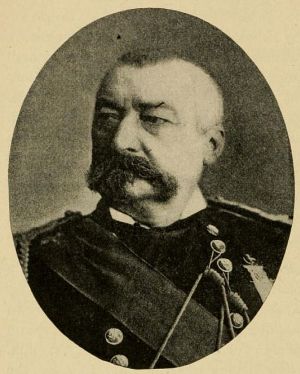
General Philip H. Sheridan.
550. Grant’s Advance.—Grant began his campaign by a further movement south of Petersburg, January 31, when he took possession of Hatcher’s Run. While attracting the attention of Lee at this point, he sent Sheridan,[259] with an army of ten thousand picked cavalry, up the Shenandoah Valley, for the purpose of cutting the Lynchburg and Richmond railroad, by which Lee was receiving the larger part of his supplies. Sheridan scattered the forces of Early and was completely successful. Returning by way of Charlottesville, Sheridan rejoined Grant, March 29, and was at once put in command of the extreme left of the Union army, with orders to push on around the Confederate left, to Five Forks. This movement obliged Lee to extend his line to that point, but, as he now had only about fifty thousand men with whom to contend against the one hundred and twenty thousand commanded by Grant, it was impossible to protect Richmond in the north and to guard his communications at the south. The Confederate lines were so long that Lee hardly had one thousand men to a mile. He therefore, after his lines had been broken at Five Forks, April 1, decided to abandon the city.
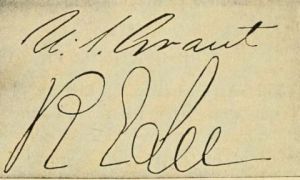
Signatures to the Agreement for the
Surrender.
551. Surrenders of Lee and Johnston.—With the attack of Sheridan on the extreme left, Grant ordered an assault, April 2, all along the line. Lee found that the only way to save his army was not only to abandon Richmond, but to withdraw rapidly to the west. He had wished to abandon the capital before, but had deferred to the wishes of Davis. On the morning of April 3, the Union troops entered Richmond without opposition. Lee and his army turned westward, but the advance of Sheridan was so rapid that escape was impossible. Great blunders were committed by the Confederate commissariat, and Lee’s forces were almost without food. At Appomattox Courthouse, further retreat was cut off, and on the 9th of April Lee surrendered his army to Grant at an interview between the two commanders which brought out the best qualities of each. Lee’s troops were required only to bear no more arms against the United States; and they were allowed to retain their horses for spring plowing. Never before at the end of a great war had such magnanimous terms been given. On the retreat from Richmond, many men had thrown away their arms and taken to the woods, so that the number finally surrendered was only twenty-eight thousand, three hundred and fifty-six. After a sharp dispute between Sherman and Stanton, as to the conditions that should be granted, Johnston capitulated to Sherman, on similar terms, April 26. All the other Confederate armies surrendered before the end of May.
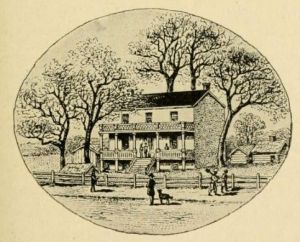
House at Appomattox in which Lee
and Grant arranged the Surrender.
552. Assassination of Lincoln.—While the people of the North were everywhere rejoicing over the termination of the war, they were suddenly cast into the deepest grief by an event of the utmost horror. A conspiracy to assassinate the President was successful. On the evening of April 14, President Lincoln was sitting in a private box at one end of the stage in Ford’s theater. Between two of the acts, John Wilkes Booth, an actor, stole into the box and, from the rear, shot the President through the head. Then leaping out from the front of the box upon the stage in full view of the audience, he shouted, “Sic semper tyrannis” (“Ever thus to tyrants,”—the motto of Virginia), and passing through a rear door of the stage, escaped. In the midst of the excitement that ensued, the President was tenderly carried to a neighboring house, where he received every possible surgical aid, but no effort could save his life. He expired the next morning. Booth in his leap to the stage injured one of his legs, but he succeeded in mounting a horse that was in waiting, and crossed one of the bridges into Virginia. For several days he evaded his pursuers; but the whole region was in arms, and he was finally brought to bay. Refusing to give himself up, he was shot by a Union soldier. On the evening that Lincoln was shot, one of the other conspirators entered the house of Secretary Seward and attacked him in bed with a huge bowie-knife. Though desperately wounded, Seward finally recovered. Of the conspirators arrested, four were hanged and four imprisoned. It is still a question whether, in the prevalent excitement, injustice was not done in some of these executions.
553. Funeral of Lincoln.—The grief of the people was unprecedented. The greatness of Lincoln’s life and the pathos of his death touched every heart. His body was taken for interment to Springfield, Illinois; and so universal was the love and sorrow, that the people insisted upon making the movement a national event. At New York and other important points along the route, his body lay in state and was viewed by millions of people. Three weeks were required for the funeral train to reach Springfield.
554. Lincoln’s Policy toward the South.—The people of the South showed something of the grief of the North, for many had already begun to see that in war Lincoln had not been a harsh enemy, and that in peace he was likely to be a real friend. They very naturally felt that the murder of the President would probably make the people of the North harsher toward the South, now that the victory had been secured. They did not at that time know what has since been revealed of Lincoln’s generous feeling toward them. At a Cabinet meeting on the very day of his assassination he had discussed the reconstruction of the South. “Enough lives have been sacrificed,” he said; “we must extinguish our resentment, if we expect harmony and union.”
555. The Army and the Navy.—The Union army had grown steadily in numbers, until at the close of the war the lists showed an enrollment of 1,000,516 men, of whom more than six hundred thousand were fit for active service.[260] The Union navy had grown until it consisted of about seven hundred vessels, of which sixty were ironclads. It was at that time the most powerful navy in the world.
556. Extent of the Losses.—The Union forces had 44,236 killed in battle, while 49,205 died from wounds. Those who died of disease numbered 186,216. In prison and from accidents and unknown causes, the deaths were 50,352, making a sum total of 330,009. There were buried in the national cemeteries the bodies of 318,870, but a considerable number of these were Confederate soldiers. The number of deaths in the Confederate service was less, but figures have not been so carefully preserved, and the exact truth can, probably, never be known. The number of actions in the course of the war of sufficient importance to receive names was no less than twenty-four hundred.
557. The Cost of the War.—The cost of the war was enormous; but it cannot be accurately told. In addition to about $780,000,000 that had been paid by taxation, while the contest was going on, the national debt had, from $65,000,000, in June, 1861, grown in 1865 to be $2,850,000,000. If to this vast sum we add the debts of states and cities, and the pensions that were paid before 1900, the total cost of the war to the country, exclusive of expenditures by the Confederates, can hardly have been less than ten billions of dollars.
558. Suffering.—In the South the suffering in consequence of the war was vastly greater than in the North. The freeing of four million slaves completely changed the organization of society. Wherever the Northern armies had gone, there had been great destruction of property and thousands of homes had been ruined. Throughout the later years of the war there had been much suffering of individual families, and the sources of income of many that had previously known independence or affluence, had been entirely taken away. When emancipation took place, the suffering was somewhat increased, although, as a rule, the negroes showed remarkable fidelity to their owners.
559. Final Review.—On the 23d and 24th of May such parts of the Armies of the East and of the West as were within reach, had the privilege of passing in review before their commanders and the representatives of the nation. For two whole days the armies filled the long stretch of Pennsylvania Avenue from the Capitol to Georgetown, and, in a compact mass, from curbstone to curbstone, passed in front of the reviewing stand at the White House. The spectacle was the mightiest the continent had ever seen; but it was much more than a spectacle. It was a vast army of citizens peaceably going home after the most bloody and terrible of modern wars. Of the more than a million Union soldiers under arms in the spring of 1865, before the next winter all but about fifty thousand had been quietly mustered out and become, in the main, orderly and industrious citizens.
560. The Military Lessons of the War.—As time has passed, students have learned that the military lessons taught by the war were numerous and important. Four of them are especially worthy of note.
(1) The battle between the Monitor and the Merrimac convinced every one that wooden vessels could no longer be of any service against ships of iron. In less than a generation, every navy of importance in the world was made up exclusively of iron ships.
(2) The habit of instantly throwing up protecting intrenchments, whenever either army came to a halt near the other, completely revolutionized military field practice.
(3) More important still was the lesson that military training of officers cannot be dispensed with in any nation. The successful commanders of the war in the North, as well as in the South, were, almost without exception, officers who had been trained in the military schools. In the early part of the contest, especially in the North, men with political influence were often put into responsible positions; but such appointments generally proved disastrous, and the authorities had to fill their places with men who had received a careful military training.
(4) But the greatest lesson of all was taught by the rapidity with which a great army could be put into the field in an emergency, and then quietly disbanded. Stanton, in his report as Secretary of War in 1865, called attention to several remarkable facts in this connection. After the disaster in the Peninsula more than eighty thousand troops were enlisted, organized, equipped, and sent into the field in less than thirty days. Sixty thousand new troops repeatedly went into the field within four weeks; and from Ohio, Indiana, Illinois, Iowa, and Wisconsin ninety thousand men were raised and sent into the armies within twenty days.[261] These facts showed that a large standing army is unnecessary in a self-governing nation.
561. The French in Mexico.—The immense military power and prestige of the United States were soon illustrated in a striking manner. Throughout the war the imperial government of France, under Napoleon III., was in active sympathy with the effort to destroy the Union. When Napoleon III. found that Great Britain would not, as he desired, acknowledge the independence of the Confederacy, he turned his attention in another direction, and stirred up a revolution in Mexico, which overthrew the Republican form of government and established an empire under Maximilian, an Archduke of Austria. While the United States government was at war, it was in no condition to do more than to issue a formal protest; but when the war was over, and there were a million men available, France perceived the advisability of withdrawing her troops from Mexico at the suggestion of the United States. With a courage worthy of a better cause, Maximilian refused to withdraw with them. The Mexicans soon revolted, and in 1867, the emperor was taken prisoner and shot. The United States government entreated for his life, but the request was formally refused.
References.—The end of the war is described from both points of view in Battles and Leaders of the Civil War, Vol. IV., p. 708, and in a briefer manner in Dodge’s View, pp. 310-319. For Lincoln’s attitude in regard to all questions, see Tarbell’s Lincoln, Vol. II., and Nicolay and Hay, Vols. IX.–X. The works already named may all be consulted with profit in regard to this period. For the Confederate side, see, especially, Davis, Rise and Fall; Stephens, War between the States; Johnston, Narrative; and Longstreet, Memoirs of the Civil War in America. See also Thomas Nelson Page’s stories, and especially his short story, Burying of the Guns, for graphic and instructive pictures of war-time.
|
In the course of the war, as many as 2,690,401 men entered the Union army, and probably about one-half as many were enrolled by the Confederacy. |
562. President Johnson.—Andrew Johnson,[262] a Democrat from Tennessee, was the only Southern senator who refused to resign his place when, in 1861, the other senators withdrew from Congress. Partly because he was such a stanch Unionist, and partly because the Republicans desired to develop a Union sentiment in the South, he was elected as Vice President on the ticket with Lincoln, in 1864, and in consequence became President on the death of the latter.
563. Lincoln’s Reconstruction Policy.—Lincoln, with his customary foresight, some time before the end of the war, had set forth his ideas on the policy of the reconstruction of the seceded states. He expressed the opinion, in an address, that the question whether the “seceded states,” so-called, were in the Union or out of it, was “a mere pernicious abstraction”; that “they were out of their proper practical relation with the Union,” and that “the sole object of those in authority should be again to get them into that proper practical relation.” With the exception of certain classes, he had previously by proclamation offered pardon to all persons who should take the oath to support the Constitution and the laws, and he had promised that as soon as one-tenth of the voters in any state (according to the registration of 1860) should take this oath and establish a government of republican form, the Federal authorities would recognize it as a legal state government. Arkansas and Louisiana had been reorganized on this basis, though the reorganization proved, in the end, unsuccessful, owing to the fact that Congress refused to recognize the governments thus set up.
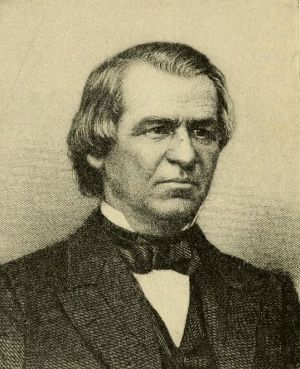
Andrew Johnson.
564. Johnson’s Policy of Reconstruction.—The accession of Johnson somewhat modified this policy, and this modification has generally been regarded as calamitous to the South. But it should be said that Johnson’s policy was not so different in essentials from that of Lincoln as it was in method and spirit. Johnson was utterly lacking in the tact that is always requisite to the successful leadership of men, and consequently he was soon at odds with Congress. It should also be noted that Congress fell under the influence of its radical members, especially Charles Sumner and Thaddeus Stevens, and became more extreme in its methods as soon as the staying and guiding hand of Lincoln was removed.
565. Difficult Questions.—Though the war was virtually over when Johnson came into authority as President, he found many difficult questions to consider and decide. One of the first was to determine what should be done with the political leaders of the Confederacy. In the mountainous region of Eastern Kentucky and Tennessee, where Johnson had lived, the Union sentiment was so strong that the conflict between the Unionists and Confederates was greatly embittered. Johnson now showed much of this spirit of bitterness. In striking contrast with Lincoln, he took the position that the leaders of the Confederacy should be put to death. Apparently with this purpose in view, he offered a reward of one hundred thousand dollars for the capture of Jefferson Davis, and smaller sums for the capture of other Confederate leaders. After a long and difficult pursuit, Davis was captured in Georgia by two troops of General Wilson’s cavalry, in May, 1865. He was sent to Fortress Monroe, where he was kept a prisoner for two years. As other members of the Confederate government were taken, they were sent to various forts to await the action of Congress. The influence of Seward in favor of a mild policy, and the doubtful issue of the complicated constitutional cases that would have come before the courts, finally brought it to pass that no Confederate leader was tried for his life. This treatment of the vanquished contrasts favorably with the methods pursued at the end of the Revolutionary War in dealing with the Tories.
566. Difficulties of Reconstruction.—A far more difficult question to be determined was that of the judicious reëstablishment of government in the seceded states. This difficulty was partly the inevitable consequence of a great civil war,[263] and partly the result of the peculiar circumstances in which the North and the South were now placed. The white men of the South had been at war against the Union, and the slaves had been set free. Should the former slave owners at once be allowed to vote? Should the negroes be given a vote? These were questions of the utmost importance, because the emancipation of slaves, adopted as a military measure, carried with it no authority to prevent the reënslaving of negroes after the war was over (§ 546). It was generally felt in the North that if the old master should be allowed to vote and the freedman should not be given that privilege, there would be no assurance that slavery in one form or another would not be reëstablished. The South, on the other hand, believed that to give the suffrage to unqualified masses of blacks would be unnecessary and intolerable. It seemed to be impossible to reconcile the two views on this question, and consequently the course to be taken was naturally determined by the party in power. Moreover, the leading minds of the Republican party believed that the negro could be thoroughly protected only by constitutional amendments which would make it impossible for the united Democrats of the North and the South to alter whatever measures in his behalf had been taken by Congress.
567. Differences between President and Congress.—While a majority of the people of the North were determined to prevent the possibility of any form of domination over the negroes, the President, as a Southern Democrat, cared less for the freedom of negroes than he did for the right of the white men in the individual Southern states to settle their own affairs. Johnson, therefore, was determined that the Confederate states should come back into the Union under the leadership of their white voters. This would mean, of course, the leadership of those who had recently been at war against the Union, and to such a result the Republican members of Congress were strongly opposed.
568. Provisional Governors.—The President began his policy by the appointment of a provisional governor for each of the seceded states. This governor called conventions whose members were to be elected by such of the former voters as should take the oath of loyalty contained in the Proclamation of Amnesty. The conventions showed their loyalty to the Union by repealing the Ordinances of Secession, by voting that no debt should ever be paid that had been incurred by the Confederacy, and by ratifying the Thirteenth Amendment to the Constitution, which prohibited slavery forever in the country (§ 546). But, on the other hand, some of them also passed laws to force the freedmen to work, under penalty of imprisonment as vagrants. To the people of the North this unfortunately looked like an attempt to set up slavery under another form. It was probably not so intended, but showed at least great indiscretion.
569. Refusal of Admission to Congress.—When Congress met in December, 1865, the members refused to admit the representatives that had been sent from the seceded states. They asserted, moreover, that the seceded states were not in the Union and must be readmitted before their acts could have authority, and before they could have representation in Congress. Tennessee was readmitted, and representatives from this state were received in Congress in 1866, but no other representatives from seceded states were received until nearly two years later. The President argued that Congress had no more right to keep a state out of Congress than a state had to secede, and in this position he was generally supported by the Northern Democrats.
570. The Elections of 1866.—The future of reconstruction seemed to turn on the result of the elections in the fall of 1866. The Republicans won a large majority of seats, and the Republican members of the outgoing Congress elected in 1864, who had a two-thirds majority, secured through representation of the border states and denial of representation to the seceded states, saw at once that for the next two years they would be able to control legislation by passing measures over the President’s veto. Emboldened by this fact, they now proceeded to adopt their own plan of reconstruction without waiting for the next Congress.
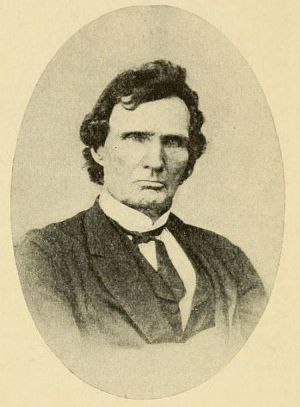
Thaddeus Stevens.
571. Congressional Plan of Reconstruction.—Many theories were held with regard to the status of the commonwealths that had seceded. Some persons held that they were conquered provinces; others that they had lost their statehood and become territories. Others held that the Southern states had committed suicide, as it were, and that the Federal Constitution and laws did not apply to them, and would not until Congress declared them once more in force. This theory prevailed in the Congressional plan of reconstruction, which was pushed forward by Thaddeus Stevens,[264] of Pennsylvania, chairman of the Reconstruction Committee and of the Committee on Ways and Means, and was adopted in the spring of 1867. It provided that the negroes should vote, and that the Confederate leaders should not vote. To insure the permanent effects of these results, the Fourteenth Amendment to the Constitution was adopted by Congress, and was ratified July 28, 1868, by the necessary majority of three-fourths of the states.
572. The Fourteenth Amendment.—While the Thirteenth Amendment to the Constitution forever prohibited slavery within the United States and its dependencies, the Fourteenth Amendment excluded from Congress and from all civil or military offices in the United States all persons who, after having taken the oath to support the Constitution of the United States, should “have engaged in insurrection or rebellion against the same, or given aid and comfort to the enemies thereof,” until Congress, by a two-thirds vote of each House, should remove such disability. The Fourteenth Amendment thus had the stupendous effect of disqualifying from holding office all the most prominent Southern leaders. It also guaranteed civil and political rights to the negroes, under national and state governments, and declared invalid all debts and obligations incurred by the states that had seceded.
573. Methods of Reconstruction.—On the basis of these general purposes the work of reconstruction was carried on in the years 1867 and 1868. Provision was made for civil governments in each of the states of the former Confederacy, and for the establishment of live military departments, whose special duty it was to see that the requirements of Congress in the reconstruction of the state governments were carried out.
574. Irritation in the South.—This plan of government was naturally very offensive to the South, for it made the negroes practically rulers over their former owners. In June, 1868, the representatives of Alabama, Arkansas, Florida, Louisiana, North Carolina, and South Carolina were elected under the new conditions and readmitted to Congress. Those of Georgia, Mississippi, Texas, and Virginia were not admitted before 1870. During the first period of reconstruction the freedmen in the South were generally in control; but the former slaves were ignorant of political affairs, and had always been in the habit of acting as they were directed. At first they were under the influence of the military governments and of the “Carpet Baggers,” and voted solidly against the whites; but gradually they yielded to the persuasions of the people who employed them.
575. “Carpet Baggers” and “Scalawags.”—The Northerners who moved into the South after the war for the purpose of securing office through negro votes were popularly known as “Carpet Baggers”; and the Southern whites who voted with the negroes were given the name of “Scalawags.” Between the “Carpet Baggers” and “Scalawags” on the one hand, and the old inhabitants on the other, there was bitter warfare, resulting in murders on both sides. The condition of the South during this administration and the one following showed how nearly impossible it is, even under military rule, to enforce any laws in a community where such laws are earnestly opposed by a majority or even by a large portion of the intelligent citizens. The whites were, for the most part, determined not to let the government fall into the hands of negroes; and when the blacks abstained from taking part in the government they were generally not interfered with. In many localities they were aided and encouraged in their efforts for improvement; but society in the Southern states found it hard to adapt itself to the new conditions. The determination that negroes should not rule was so deep-seated that the purposes of the government were frustrated in many ways.
576. The “Ku-Klux-Klan.”—A secret society, known as the “Ku-Klux-Klan,” was organized, the object of which was to counteract the influence of “Carpet Baggers,” and to make it impossible for Northern men to get control of local affairs. Many Northern men were secretly seized, and some even put to death, and, for a considerable time, in many parts of the South, something like a reign of terror prevailed. Gradually, however, a better feeling was developed; but this was not until both whites and blacks came to see that the welfare of the negroes would be better served by industrial and educational than by political methods. This belief was slow in coming; and it was not until the administration of President Hayes, about ten years later, that order and some measure of prosperity were established.
577. Strained Relations of President and Congress.—While these conditions greatly agitated society throughout the South, the relations of the President and Congress were becoming more and more strained. Many acts were passed over the executive veto.[265] The President kept up the irritation by freely and offensively accusing the members of keeping Southern representatives out of Congress in order that they might pass measures over his veto. His arguments were often powerful, but his lack of tact prevented him from winning men to his views. Matters were brought to a crisis by the passage of the “Tenure of Office Act” in the early part of 1867.
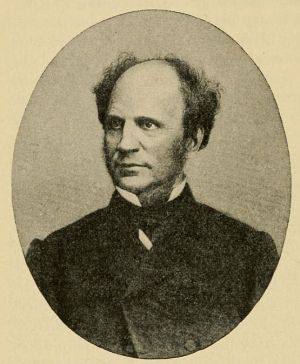
Horatio Seymour.
578. The Tenure of Office Act.—Under the Constitution the President makes appointments with the advice and consent of the Senate. The Constitution is silent in regard to the power of removals; but in 1789 it was decided that removals did not require the approval of the Senate, but could be made solely at the discretion of the President. This was the rule until March, 1867, when Congress passed over the President’s veto the “Tenure of Office Act,” which provided in substance that no person whose appointment required the approval of the Senate could be dismissed without the same approval. In August, 1867, Johnson requested the resignation of the Secretary of War, Edwin M. Stanton, who was in sympathy with Congress rather than with the President. Stanton refused to resign and was suspended, General Grant taking his place. When Congress met the suspension was not ratified, and Grant resigned and Stanton resumed the duties of Secretary. Johnson, who regarded the Tenure of Office Act as unconstitutional, then removed him. Stanton, when the Senate had pronounced the removal illegal, refused to give up his office and appealed to the House of Representatives.
579. Impeachment of the President.—The House, in which a similar attempt had already failed, at once resolved to impeach the President, by accusing him of having violated the laws and of being unfit to hold his office. According to the Constitution, when such a vote takes place, a trial must be held before the Senate as judges. The Chief Justice of the Supreme Court is to preside, and, in order to remove the President, two-thirds of the Senators present must vote that he is guilty of the crimes or misdemeanors charged against him. Johnson’s trial, which began on March 5, 1868, was conducted with great ability on both sides, by several of the ablest lawyers in the country. In the test vote, taken on May 16, thirty-five senators pronounced him guilty, and nineteen not guilty, five Republicans not voting with their party. As the number thirty-five was less than the requisite two-thirds, the vote was legally an acquittal of the President, and Secretary Stanton resigned.[266] While the trial was in progress, Johnson made his famous “Swinging round the Circle” tour in the Northwest and delivered extreme speeches against Congress.
580. Election of General Grant.—The Presidential election of 1868 turned upon the policy of the government in regard to reconstruction. The Republican party, generally supporting the policy of Congress, nominated with enthusiasm and unanimity, General Ulysses S. Grant and Schuyler Colfax of Indiana. The Democrats, opposing that policy, put in the field Horatio Seymour[267] of New York and Frank P. Blair of Missouri. The election resulted in two hundred and fourteen electoral votes for the Republican candidates, and eighty for the Democratic. Mississippi, Texas, and Virginia, not having been readmitted, could not vote.
References.—Wilson, Division and Reunion, 254-300; Dunning, Essays on the Civil War and Reconstruction; Johnson, American Politics, 207-279; Blaine, Twenty Years in Congress; Landon, Constitutional History; Gorham, Life of E. M. Stanton; Schouler, United States, Vol. VI.; McCall, Thaddeus Stevens; Storey, Charles Sumner; Hart, Salmon P. Chase (in “American Statesmen” series); J. W. Burgess, Reconstruction and the Constitution (1902). See also a series of articles in the Atlantic Monthly for 1901, and W. P. Trent, “A New South View of Reconstruction,” in the Sewanee Review, January, 1901; Channing and Hart, Guide, § 25.
On the condition of affairs in the South, from the Northern point of view, see Tourgee’s Fool’s Errand, and also his Bricks without Straw. For a discriminating Southern view, see Thomas Nelson Page’s Red Rock.
On this period and on those that follow, the histories are few and not conclusive. Reliance for sources must be placed on the current literature and on such books as McPherson’s Handbooks, Appleton’s Annual Cyclopædia, Mulhall’s Dictionary of Statistics, Shaler’s United States, and the writings of the leading statesmen as indicated in Channing and Hart’s Guide.
|
Note, as examples, the turbulent events that followed the English civil war of the seventeenth century and the great civil war known as the French Revolution. |
581. Pacific Railroads.—The policy of helping railroad building by Federal land grants began as early as 1850, when an important grant was given to aid the construction of the Illinois Central Railroad. In the course of the next six years several other grants were made for similar purposes. The construction of a railroad to the Pacific was recommended by the Republican platform of 1856; but the project was delayed by differences between the North and the South in regard to the location of the road. In 1862 the Union Pacific was projected to extend from Omaha to Ogden, where it was to connect with the Central Pacific for San Francisco. Though these roads were built by private corporations, the latter were largely aided by Congress.[268] Besides granting every other section of land along the routes for a space twenty miles in width, the government guaranteed the bonds of the corporations to the extent of over thirty thousand dollars a mile. The roads were completed in 1869, the first year of Grant’s administration.[269] Though the transcontinental lines have not generally proved profitable to stockholders, they have been of immense advantage to the country as a whole. Formerly from three to six weeks were required for the senators and representatives to reach Washington from California and Oregon; but the railroads reduced the time to a single week. Another advantage of far greater importance was the encouragement offered by the roads to the rapid settlement of the regions through which they passed. The new Western states increased in population with amazing rapidity, partly from foreign immigration, and partly from the migration of people from the Eastern states. By the census of 1870 it was found that more than a million inhabitants had already settled along the transcontinental lines. The Pacific states now for the first time seemed to be an integral part of the Union.
582. San Domingo Question.—In 1869 the people of the Republic of San Domingo expressed a desire to be annexed to the United States. Grant favored annexation, and a treaty was drawn up, but the project met with much popular opposition. A commission, consisting of Senator B. F. Wade of Ohio, Dr. Samuel G. Howe of Massachusetts, and President Andrew D. White of Cornell University, was sent to inspect the island and report upon its condition. The opposition to the treaty was based principally upon the fact that the people of San Domingo were chiefly ignorant negroes. Public opinion seemed not to favor an addition to the number of negroes giving trouble to the government, and the Senate rejected the treaty.
583. Fifteenth Amendment.—In order to improve the status of the negroes in the South the congressional plan of reconstruction was supplemented by the adoption, in 1870, of the Fifteenth Amendment to the Constitution. This provided that no person should thereafter be deprived of the privilege of voting “because of race, color, or previous condition of servitude.” During the same year, Mississippi, Texas, and Virginia were admitted to representation in Congress; and in 1871, for the first time in ten years, every state in the Union was duly represented.
584. Negro Legislation.—The negroes, although the most ignorant part of the population, were in control of the Southern legislatures, and their legislation was, as a rule, very crude and unwise. The white people of the South owned most of the property, but the blacks, through their control of the legislatures, to which they often elected unscrupulous white men, had the power to levy taxes. This fact kept up the violent opposition on the part of the white population which had begun under President Johnson. The negroes were sometimes bribed to keep away from the polls; sometimes threatened with discharge from employment if they voted; and sometimes were kept from voting by force. Congress retaliated by penal legislation against such interference with the negro’s right to suffrage. So-called “Force Bills” were passed in 1870 and 1871, which increased the bitter feeling in the South. To preserve order, the provisional governors were obliged to call on the President for Federal troops. This augmented the strife, and the Ku-Klux-Klan (§ 576) was increasingly active. Within a year, however, affairs quieted down, a general Amnesty Act and other milder legislation helped to placate the whites, and soon the Supreme Court, by important decisions, made it plain that the individual states, in spite of the new Constitutional Amendments, could control their own citizens in many important ways. Thus the fears of the whites that the blacks would secure permanent control of affairs were allayed.
585. The Treaty of Washington.—In 1871 a treaty between the United States and Great Britain was signed at Washington, by which both nations agreed to submit to arbitration what were known as the “Alabama Claims,” made by the United States against Great Britain on account of losses to American shipping, caused by Confederate privateers fitted out in British ports (§ 502). By the terms of the treaty, the questions involved were to be settled by a court of five arbitrators, one to be appointed by each of the governments of the United States, Great Britain, Italy, Switzerland, and Brazil. The Court sat at Geneva in 1872. Elaborate testimony was offered on both sides. The United States government was able to show that the British government had been repeatedly warned of the fitting out of the Alabama and other Confederate cruisers. The Court, after hearing the evidence and arguments, held that Great Britain had not been duly watchful, as required by international law, to prevent the use of her ports by the agents of the Confederacy, and accordingly decided that the British government should pay to the United States damages to the amount of fifteen million five hundred thousand dollars in gold.
586. Northwest Boundary: Canadian Fisheries.—The Treaty of Washington also provided for the settlement by arbitration of two other important questions that had been in dispute for a considerable time. These were the boundary between the Oregon region and Canada, not clearly defined by the Treaty of 1846, and the fishery claims on the northeastern Canadian coast. By the terms of the Treaty of Washington the boundary question was submitted to the German Emperor, who gave his decision, in 1872, in favor of the American claim. The arbitrators to whom the fisheries question was referred decided against the United States and that the government should pay five million five hundred thousand dollars for the use of the Canadian shores for drying and curing fish.
587. Chicago and Boston Fires.—The autumn of 1871 will long be memorable for one of the most disastrous conflagrations ever known. In the evening of October 8, a fire broke out in a stable in West Chicago, and soon spread so that it was beyond control. Every structure within a space of more than three square miles in the heart of the city was reduced to ruins. More than a hundred thousand people were deprived of their homes, and the loss of property was estimated at more than two hundred million dollars. In November of the following year, about seventy-five acres in the richest part of Boston were burned over, at a loss of about seventy-five million dollars.
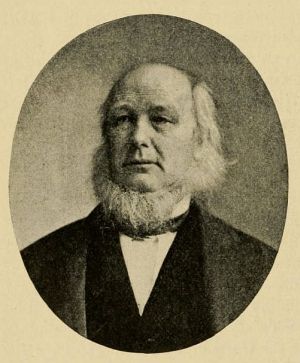
Horace Greeley.
588. Presidential Nominations.—As the end of Grant’s first term approached it became evident that he would be renominated, although there were many disaffected Republicans. The prevalence of political scandals and the continued unsatisfactory condition of the South were the most serious causes of complaint. The discontented Republicans clustered about Horace Greeley[270] of New York, and at a convention held at Cincinnati, in May, 1872, he was nominated for President, with B. Gratz Brown of Missouri for Vice President. The platform adopted charged the administration with unscrupulous and selfish use of power in the South, and demanded the immediate substitution of civil for military power in the Southern states. As the views promulgated by this platform were substantially those of the Democratic party, the Greeley platform and candidates were accepted as their own by the Democratic Convention. The union, however, was not an auspicious one. Greeley had been active and influential as a Whig and Republican and a lifelong opponent of the Democrats, and was therefore distrusted. Many Democrats regarded the nomination as a cowardly surrender. The opposition found expression in a call for a strictly Democratic convention to be held, September 3, at Louisville, Kentucky. The result was the nomination of Charles O’Connor of New York for President, and John Quincy Adams of Massachusetts for Vice President. As Greeley died a few days after the electors were chosen and before their vote was cast, the Democratic vote was scattering, and Grant received two hundred and eighty-six of the three hundred and forty-nine electoral votes.
589. Commercial Activity and the Crisis of 1873.—During Grant’s first administration there was remarkable commercial activity throughout the country. Money was very abundant, and prices were high; and, now that the war was over, capital was everywhere seeking investment in new enterprises. The war between France and Germany in 1870 and 1871, and the bad harvests of Europe generally, made a great market for all American products. An era of railroad construction and speculation naturally ensued. Everybody seemed to wish to invest in the new roads, many of which could not pay the expenses of operation. In the four years of Grant’s first administration, the mileage of railroads in the country was increased about fifty per cent; but it soon became apparent that the work had been enormously overdone. All at once, when nearly everybody wished to sell, nobody wished to buy. On September 19, 1873, Jay Cooke & Company, leading bankers in Philadelphia, failed, and Wall Street in New York was thrown into such a panic that the day has ever since been known as “Black Friday.” A financial stringency ensued which resulted in a universal fall of prices, many failures, and much distress. It was not until 1879 that prosperity was restored.
590. Political Scandals.—Grant’s second term was marked by still greater political scandals than his first. These were largely due to the spirit of speculation just described. Several of the new railroad projects were founded on land grants from Congress, and railroad projectors seemed everywhere desirous of securing aid from the government. A company, known as the “Crédit Mobilier,” had been formed to finance the Union Pacific, and this company distributed stock among men of influence in a scandalous manner. A Congressional Committee of Investigation, appointed in December, 1872, reported in February, 1873, and showed that some of the stock was given to congressmen, apparently for the purpose of securing their votes. Two members of the House of Representatives were formally censured. The spirit of corruption was thought to have entered the Cabinet, and one Cabinet officer, W. W. Belknap, Secretary of War, was impeached for receiving bribes, but escaped dismissal by resignation a few hours before the House passed the impeaching resolution. Enough senators held that he was not then impeachable to prevent conviction. A Whisky Ring was discovered in 1875, that had been organized by Federal officials and distillers for the purpose of defrauding the government of the taxes due on the manufacture of whisky. Numerous Indian uprisings were found to be largely the result of dishonest methods practiced by Indian commissioners and contractors in cheating Indians out of their just dues. While no scandal of any kind ever attached to Grant himself, it was widely felt that he was overindulgent to officials of questionable honesty. Mainly in consequence of these scandals, there was a general outcry from the public, and a demand for a different system of appointment to all the minor civil offices.
591. Extravagance of Congress.—The spirit of dissatisfaction that prevailed among the people at large was much intensified in 1873 by the action of Congress in raising the salaries of a large number of Federal officers. The salary of the President was advanced from twenty-five thousand to fifty thousand dollars a year; and the salary of congressmen was increased from five thousand dollars to seven thousand. In the case of congressmen, the increase was made to apply to the Congress then in session. The act raised a storm of indignation throughout the country. It was the back-pay clause, known as the “salary grab,” that was particularly obnoxious. Nearly all those members who voted for the increase were defeated at the next election; and so much of the measure as related to congressmen was repealed at the next session.
592. Civil Service Reform.—To give voice to the demands for improvement in the public service, a National Civil Service Reform Association was organized, which devoted itself to agitation favoring new methods of appointment. From the time of Jackson, the custom had been growing for a new President to turn out of office those who had actively opposed him, and to appoint those who had actively supported him. The numerous scandals in Grant’s administration were thought to result largely from this system, and a demand for reform became general. The first Civil Service Reform Law was passed March 3, 1871. This law authorized the President to frame and administer such rules as he deemed best for the regulation of appointments in the Civil Service. The measure received Grant’s approval, and he appointed the distinguished author and orator George William Curtis, an earnest advocate of reform, as the head of a Board of Commissioners, who were to examine candidates for the minor positions and report the results to the President. From those who passed the examinations most successfully, the President was to make the appointments. For three years this system of competitive examinations was followed; but, as congressmen were thus deprived of the privilege of recommending constituents for appointment, Congress in 1874 refused to vote money to maintain the commission, and the work was thus temporarily frustrated. This was also a period of local political corruption. The Tammany Society, under its “Boss,” William Marcy Tweed, governed New York City in a most scandalous and extravagant fashion. Finally, owing to exposures made in 1871, chiefly through the agency of the New York Times, Tweed was brought to trial and convicted.[271]
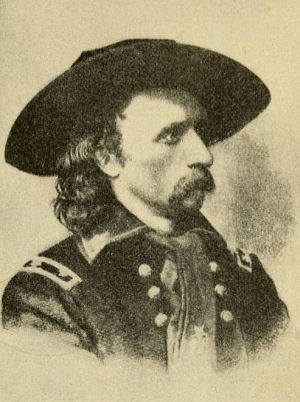
General George A. Custer.
593. Indian Troubles.—During both of Grant’s administrations Indian troubles were serious, partly in consequence of the political corruption of the period (§ 590). In the course of the Civil War, the Sioux in Minnesota, taking advantage of the absence of the United States troops, had risen in rebellion and massacred a considerable number of the inhabitants. With some difficulty the agitators were captured, and thirty-four of them were simultaneously hanged on a single gallows at Mankato. This striking exhibition of energy on the part of the government put an end to revolts for a time, but relief was only temporary. The Modocs, in southern Oregon, when ordered to another reservation in 1873, refused to go, and even put to death the peace commissioner sent to deal with them. They were finally subdued, after nearly a year of fighting. In 1875 the Sioux again arose, under the leadership of Sitting Bull; but they were gradually driven west as far as the Little Big Horn River in southern Montana. Here they were imprudently attacked by General George A. Custer,[272] who, with his regiment, was surrounded and every member of the force with one exception was killed (June 25, 1876). Fresh troops finally repulsed the Indians and they withdrew into British America.
594. The Virginius Affair.—Good sense on both sides averted hostilities in another quarter. In October, 1873, an American merchant vessel, the Virginius, was captured on the high seas, near Jamaica, by a Spanish man-of-war, on the ground that it intended to land men to assist in the Cuban insurrection then in progress. Several Cubans, with Captain Fry and a number of other persons found among the passengers, were seized and executed. The event caused not a little excitement in the United States. Spain made immediate and ample reparation; but the incident served to increase the filibustering spirit toward Cuba that had long been prevalent, especially in the South.
595. The Centennial. Exposition.—In the last year of Grant’s second administration,[273] the fact that “peace hath her victories no less renowned than war” was strikingly proved. The centennial of the adoption of the Declaration of Independence was celebrated by a great International Industrial Exposition at Philadelphia. It was also, as an undertaking of all the states, a sign of real national unity after years of strife. The exposition was opened in May, 1876, and was visited by millions of people, drawn from all parts of the country and from Europe. The superiority of the United States in various kinds of labor-saving machines and inventions, among them telephones and appliances for electric lighting, was a source of national pride; and the cause of popular education was served by the exhibition of the mechanical and artistic achievements of foreign nations.
596. The Greenback Party.—As early as 1863 the principal and interest of the national bonds had been made payable in coin. But as the price of gold rose,—or, more properly speaking, the price of paper notes fell,—it was possible to sell bonds and with the gold and silver thus received to purchase greenbacks, and thus apparently to double the rate of interest. As the bonds were largely held by rich men, an outcry rose that the law should be changed, and that all bonds should be made payable, principal and interest, in greenbacks. Public feeling culminated in a political convention at Indianapolis, November 25, 1874, in which a demand was made for a general substitution of a paper currency in place of coin. The Greenback Party, as it was called, nominated Peter Cooper of New York for President in 1876, and he received eighty-one thousand seven hundred and forty votes, mostly in the Central and Western states. During the same period organizations of farmers, known as Granges, demanded, and in some states secured, the moderation of railroad rates.
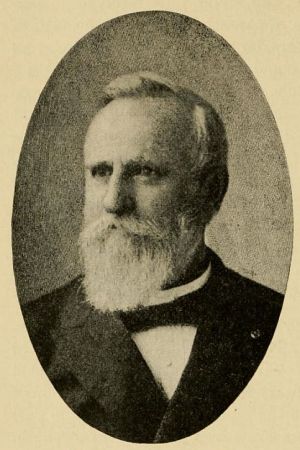
Rutherford B. Hayes.
597. The Campaign of 1876.—As the election of 1876 approached, it became evident that the people were growing more and more to distrust the policy of keeping the reconstructed governments in place by military force, and that the question of interfering in local affairs in the South would play a large part in the campaign. The Democrats were growing in strength, while the Republicans were weakening. At their party convention, the Democrats nominated Samuel J. Tilden of New York for President, and Thomas A. Hendricks of Indiana for V%ice President; while the Republicans placed in the field Rutherford B. Hayes[274] of Ohio, and William A. Wheeler of New York. It was evident from the first that the contest would be a very close one. The election revealed that the decision of the Electoral College, as the Presidential electors in their collective capacity are called, would turn upon the manner in which certain disputed returns in Florida, Louisiana, Oregon, and South Carolina were decided. If these states should all be represented in the College by Republican electors, Hayes would have a majority of one. If from a single one of those states a Democratic elector should obtain a vote, the election would go to Tilden.
598. The Question in Dispute.—From each of the states in dispute, two sets of returns were presented to Congress, one certifying that Republican, the other that Democratic, electors had been chosen. In each of the Southern states there was a returning board that was recognized by the government at Washington, to which the results of the elections from various precincts were to be reported, and whose duty it was to declare the result, which was to be certified, by the governor, to Congress. These boards, therefore, had almost unlimited authority. In making up the returns in Florida and Louisiana, they cast out the vote of certain precincts, declaring that the election had been tainted with fraud and violence. This the Democrats denied, and made out returns of their own, certifying that the Democratic electors had been chosen. In South Carolina there were two sets of returns emanating from two contending state governments. The Democrats claimed that Federal troops had interfered with the results of the election. In Oregon the question as to whether there should be three Republican electors or two Republican and one Democratic, hinged on the validity of a protest that a postmaster could not under the Constitution be an elector. As the Republicans had a majority in the Senate and the Democrats in the House, it was evident there could be no agreement on a count of the votes.
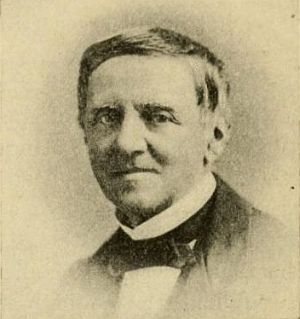
Samuel J. Tilden.[275]
599. Electoral Commission.—The importance of the question caused great anxiety from November until March. The result involved not only an entire change of national policy with regard to the South, but also the tenure of nearly one hundred thousand officials. There was talk of another civil war. For weeks the matter was debated in Congress, with no result. As the time for inauguration approached, the most temperate men on both sides agreed upon an Electoral Commission, to whom the whole matter should be submitted for decision. Such decision was to be final, unless both Senate and House agreed in rejecting it. The commission was to consist of five members of the House (three of them Democrats), five Senators (three of them Republicans), and five members of the Supreme Court (two Democrats, two Republicans, and one Independent). It turned out that the only Independent member of the Supreme Court, David Davis, resigned in order to accept a seat in the Senate. He therefore could not serve, and after some delay a Republican was put in his place. All the points in dispute were ably presented and argued. A bare majority of the Commission decided that they could not accept returns that were not regularly certified to and that they must accept those of the duly authorized returning boards. Accordingly, the questions in regard to each of the states involved were decided in favor of the Republicans, by a vote of eight to seven, all the Republicans voting one way and all the Democrats the other. As the Republican Senate would not vote to reject this result, it was conclusive, and Hayes was declared elected. The question was not settled, however, till March 2, two days before the inauguration. The feeling on the part of the Democrats throughout the country was naturally intense; but the decision was legal, and no formal objection to it could be made. Thus Hayes and Wheeler were chosen by an electoral vote of one hundred and eighty-five, while Tilden and Hendricks received one hundred and eighty-four. Nothing has ever occurred in the history of our government to subject the Constitution to so violent a strain; and nothing could be more creditable to the sense of loyalty on the part of the aggrieved portion of the people than their peaceful submission to the results of the legal decision. Recent opinion seems to be favorable to the technical merits of Tilden’s claims, yet it is generally conceded that the country, on the whole, profited from the actual course of events.
References.—Grant, Memoirs, Vol. II.; Stanwood, Elections, 273-344; Johnston, Orations, Vol. IV., 296-366, 367-420; Fiske, Civil Government, 261; G. W. Curtis, Orations (for reports in regard to the progress of Civil Service Reform, these addresses are unequaled); Andrews, The South since the War; Kelley, The Old South and the New; J. W. Burgess, Reconstruction and the Constitution (1902). Allen’s Governor Chamberlain’s Administration in South Carolina is valuable as a picture of methods during the reconstruction period. See also bibliographical note to Chapter XXXII.
600. General Character of the Administration of Hayes.—The administration of Hayes was one of adjustment to new conditions rather than one of great political innovations. During the first half of his term, the Democrats had a majority in the House, the Republicans in the Senate; during the second half, the Democrats controlled both branches of Congress. By reason of these facts, and of the more or less general feeling that the President’s title to his position was not perfect, radical legislation was impossible, and industrial questions occupied in the main the attention of the country. Hayes himself, although much harassed by difficulties with Congress, wielded his power, especially that of the veto,[276] in a most creditable manner, and surrounded himself with a Cabinet of good advisers.
601. Withdrawal of Troops from the South.—One of the first acts of President Hayes’s administration was to order the withdrawal of the United States troops from the South, where they had been stationed for the protection of the reconstructed governments. The way for this movement had been prepared during the last days of Grant’s administration; for it had come to be seen that good order could not be reëstablished by force. Democrats replaced Republicans in state offices, and everywhere the supremacy of the white people of the South was at once established. It was a practical confession that the methods of reconstruction adopted by Congress had not been successful. From this time forward the South was able to give attention to industrial recuperation.
602. Disorders and Riots.—During 1877, the first year of Hayes’s administration, railroad strikes were common. Freight charges were being reduced, and the roads, finding it impossible to maintain the old rate of wages, attempted to lower the price of labor. Thousands refused to work at the new rates, and some of the workmen would not allow trains to run. At Chicago, St. Louis, and Baltimore there were riots, in which several persons were killed; but the most serious outbreak occurred at Pittsburg, Pennsylvania, where nearly a hundred lives were lost and the destruction of property amounted to about three million dollars. Pennsylvania had several years before suffered from the outrages of a secret society of miners known as the “Molly McGuires,” which was not finally put down until 1875.
603. Chinese Immigration.—For the construction of the Pacific railroads, large numbers of Chinese laborers had been induced to come to the Pacific coast. These immigrants did not become citizens, and consequently did not vote. The fact that they could live more cheaply, and therefore work for less wages, than the white laborers, aroused great opposition to their presence, and riots became common. In response to this outcry, in 1880 a treaty was negotiated with China, by which it was agreed that Chinese immigration might be stopped by the United States government. This was followed, in 1882, by an Act of Congress forbidding such immigration for ten years. The law was imperfectly drawn, however, and its principal effect was to prevent the Chinese from coming in large masses. More stringent measures were enacted later (§ 624).
604. Relations of Gold and Silver.—Public opinion during Hayes’s term was seriously agitated in regard to the relations of silver and gold. In 1873, during Grant’s administration, a law had been passed, in consequence of a general advance in the price of silver, discontinuing the coinage of silver dollars, which had long been practically out of circulation. But by 1878 the price of the metal had fallen on account of the large output of the Western mines, and Congress decided to remonetize silver by providing that a certain amount should be purchased and coined each month. An act was passed, known as the “Bland-Allison Bill,” which provided for the purchase and coinage into dollars of not less than two million, nor more than four million, dollars’ worth of silver each month. The coining was to be at the rate of sixteen to one; that is to say, sixteen pounds of silver was to be coined into the same number of dollars as one pound of gold. As so much silver in circulation would prove inconvenient, Congress provided for depositing the silver thus coined in the Treasury and issuing silver certificates as currency in its place. This legislation, which was passed over the President’s veto and was regarded by economists as unsound, stimulated the production of silver and greatly encouraged the new mining industries in Colorado, Nevada, and the other states of the far West.
605. Resumption of Specie Payments.—Ever since the first year of the war, the paper money which has already been described (§ 596) had been the only currency in common use. Greenbacks and national bank notes had been made legal tender for most purposes; but the Supreme Court had at one time decided against, and at another time in favor of, the power of Congress to make a legal tender out of paper not redeemable in coin. In consequence there was a feeling of uncertainty with regard to the value of the currency in which business was transacted, and this was harmful to the commercial interests of the country. The paper had depreciated in value as compared with gold, and many people urged that the government should pay its debts in it. This hurt the national credit. Accordingly, in January, 1875, an act was passed providing for resumption of specie payments on the 1st of January, 1879. In other words, after the latter date, any person could get coin from the Treasury in exchange for the paper he offered. In the course of the four intervening years, the government accumulated a large amount of gold and silver in the Treasury and prepared itself to meet such demands as might be made. It happened, however, as it usually does under similar conditions with local banks, that so long as the people knew that the government was able and ready to pay, they had no desire for actual payment. They at once settled into the belief that paper was more convenient than coin. The chief credit for this financial legislation belongs to John Sherman, brother of the famous general, who long represented Ohio in the Senate, and at the time of resumption was Secretary of the Treasury.
606. Causes of Dissatisfaction.—Though President Hayes’s administration was free from scandals and was one of uniform excellence, it presented very few characteristics that appealed to the enthusiastic admiration of the people. Nor was the President popular with the political managers, who thought that greater energy on his part would have secured such popular favor as to overcome the Democratic majority in Congress. As the time for the next Republican nomination drew near, it became evident, therefore, that Hayes, who did not seek a second term, would not be renominated.
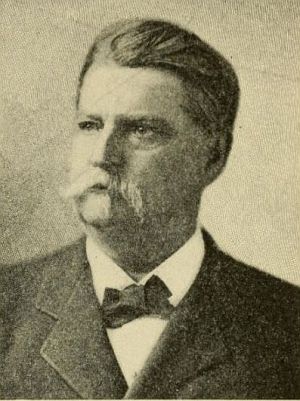
General Winfield S. Hancock.
607. Nomination and Election of Garfield and Arthur.—The Republican Convention, which met at Chicago in 1880, after a long struggle between the supporters of J. G. Blaine and of General Grant, nominated, as a compromise, James A. Garfield of Ohio for President, and Chester A. Arthur of New York for Vice President. Garfield, having distinguished himself in military service and in the House of Representatives, had recently been elected to the Senate. Arthur, without legislative experience, had been Collector of the Port of New York. The Democrats met at Cincinnati, and nominated General Winfield S. Hancock[277] of Pennsylvania for President, and William H. English of Indiana for Vice President. There was no such heated contest for the nominations as there had been among the Republicans, for the general prosperity of the country indicated that the party in power would not be turned out. This forecast proved to be correct, for at the election Garfield and Arthur received two hundred and fourteen electoral votes, while Hancock and English received one hundred and fifty-five. The defeated candidates received their main vote from what began to be called “the Solid South,”—that is to say, not only the states that had seceded, but all those in which slavery had existed at the time of the war. Until the election of 1896, this solid mass of electoral votes went to Democratic candidates.
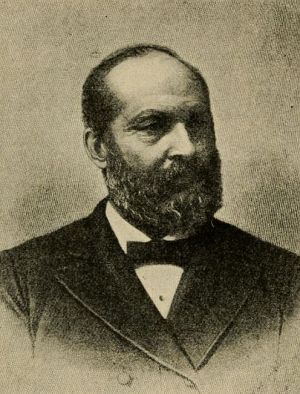
James A. Garfield.
608. Factions in the Republican Party.—Even before the nomination of Garfield[278] and Arthur, it was evident that the Republican party was inclined to divide into two factional sections. The questions at issue related partly to the method of appointing the minor government officers and partly to the attitude of the party toward the South. In general, those Republicans who were popularly known as “Stalwarts” advocated a more rigorous policy toward the South than Hayes had pursued; while the other division of the party, contemptuously called “Half-breeds” by their opponents, supported the administration of Hayes and approved of the withdrawal of troops. The “Half-breeds,” moreover, advocated a reform of the Civil Service, while the “Stalwarts” insisted that the offices should be given to those who had consistently supported the party. Garfield was supposed to represent the “Half-breeds,” while Arthur was nominated as a representative of the “Stalwarts.” The leader of the latter was Senator Roscoe Conkling of New York, a brilliant orator, notorious for the violence of his partisanship. Conkling had been a stanch supporter of General Grant for the nomination in 1880; but, although he helped Garfield in the canvass preceding the latter’s election, he was soon at odds with the new administration on the question of appointments. He did not like the selection of Blaine for Secretary of State, and was aggrieved by other selections of Cabinet advisers made by the new President. Garfield was amply justified in resisting dictation from Conkling and other leaders with regard to appointments, for the platform on which he was nominated had called for a “thorough, radical, and complete reform of the Civil Service.” Moreover, he had been nominated without having been announced as a candidate in advance of the nomination, and had made few, if any, promises to bestow offices on special men.
609. Strife for Offices: Assassination of Garfield.—Soon after the election, the strife for offices became unusually intense. Many of the senators, acting in accordance with former custom, continued to insist upon practically dictating who should be appointed within their own states; but the President continued to resist them. When he refused to appoint as Collector of the Port of New York the candidate whom Senators Conkling and Platt had urged for the place, these “Stalwarts” were intensely indignant and resigned their seats in the Senate. The New York legislature expressed its disapproval of their course, by refusing to reëlect them.[279] The result was not a little agitation and bitterness between the two factions, which perhaps was partly responsible for the assassination of the President by a fanatic named Charles J. Guiteau, to whom an office had been refused. Garfield was shot on the 2d of July, 1881, just as he was about to take a train at the Pennsylvania Railroad station in Washington. After lingering in great pain, but with heroic endurance, for nearly three months, he died, September 19, at Elberon, New Jersey. His death called forth sincere expressions of sympathy from all parts of the world. Arthur[280] was at once sworn in as President. Guiteau, after a long trial, was adjudged not insane, but responsible for his act, and was hanged.
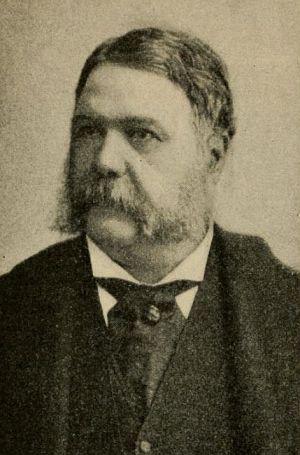
Chester A. Arthur.
610. Success of Arthur.—The effect of the assassination was everywhere deeply felt throughout the country, and the impression was almost universal that in the death of Garfield the nation had suffered an irreparable loss. President Arthur, however, at once showed that he was a man of firmness, intelligence, and good judgment, fully capable of filling satisfactorily his great office. He chose a good Cabinet, his Secretary of the Navy, William E. Chandler, being especially energetic in increasing the efficiency of that branch of the service. Arthur’s recommendations to Congress were judicious, and in the case of Civil Service legislation, the need for which had been emphasized by President Garfield’s assassination, particularly important (§ 616).
611. Feats of Engineering.—Arthur’s administration was marked by several great triumphs of engineering. In 1881 the completion of the Brooklyn Bridge was celebrated. This structure, the main avenue of traffic between New York and Brooklyn, and the longest and boldest suspension bridge in the world, was designed in 1869 by John A. Roebling, an engineer who had designed and constructed the first suspension bridge across Niagara River below the Falls. The Washington monument (dedicated in 1885), the highest stone structure in the world, was also completed during Arthur’s administration, after great delay and certain difficulties of construction which were finally obviated by engineering skill. The monument is an obelisk of white marble, five hundred and fifty-five feet high, and is impressive in its simple grandeur.[281]
612. Condition of the Lower Mississippi.—About this time the attention of the country was called to the difficulty of protecting the inhabitants of the lower Mississippi Valley against the dangers of inundation. The waters of the Mississippi and of the Missouri bring down enormous amounts of earth, which are deposited, partly in the bottom of the former river and partly in the Gulf of Mexico. This continuous deposit gradually raises the channel, so that, in places, the bed of the river is higher than the surrounding country. It also fills up the mouth of the stream and obstructs navigation. During the administration of Hayes a system of jetties, consisting of thousands of bundles of fagots, was devised for the purpose of narrowing the channel, and by so doing, increasing the current so that the silt or mud might be carried far out into the Gulf. This plan was due to Engineer James B. Eads, who had distinguished himself by the construction of ironclads during the war and of the great steel arch bridge across the river at St. Louis. The jetty system was temporarily successful, but it did not prevent the gradual rising of the river bed and consequent inundations. In the first year of Arthur’s administration, as many as a hundred thousand people were driven from their homes and vast amounts of property were destroyed.
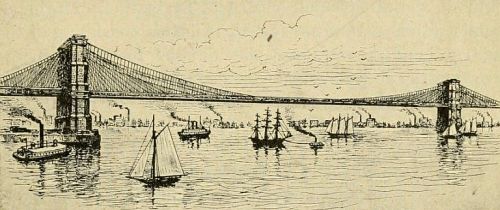
Brooklyn Bridge.
613. Notable Events.—In 1881 the nation celebrated with a great naval display the one hundredth anniversary of the surrender of the British at Yorktown. In recognition of the country’s friendship for Great Britain, President Arthur, with characteristic tact, ordered at the end of the ceremonies a national salute to the British flag. In 1884 a World’s Industrial and Cotton Centennial Exposition was held at New Orleans, which revealed the increasing prosperity of the country at large and of the South in particular. The years 1881–1884 were also notable for brave Arctic explorations conducted by Lieutenant A. W. Greely.
614. Anti-Polygamy Law.—For many years polygamy among the Mormons had given offense to a vast majority of the people of the country. The practice had been supposed to be so essentially a part of the Mormon religious system that Congress had hesitated to interfere with it. In 1882, however, Senator George F. Edmunds of Vermont succeeded in carrying through Congress a law which repealed the charter of the Mormon church, made polygamy criminal in any territory of the United States, and deprived of the elective franchise any persons who should refuse to take the oath to obey the stringent provisions of the act.
615. Tariff Commission.—The tariff and internal revenue laws, enacted in 1862, for the purpose of raising a war income (§§ 456, 457), produced so large an income that the national debt was greatly reduced and a large surplus accumulated in the Treasury. This surplus could not be used to pay the debt, because the latter had been refunded,—that is, loosely speaking, readjusted on subsequent borrowing at a lower rate of interest than was paid when the debt was first incurred,—and the new obligations had not yet fallen due. It was therefore deemed desirable to reduce the income by a modification of the tariff. As questions of protection and free trade were not the chief motives of the change, it was decided to appoint a Tariff commission of business men to study the matter and report a suitable bill to Congress. On the basis of the recommendations of the Commission, a law was framed and passed in 1883; but it failed to diminish the income, and the accumulations in the Treasury went on as rapidly as before. It was thought, however, that the Commission had been influenced too much by the urgent recommendations of the protectionists. The final action was regarded by Democrats and by advocates of free trade as amounting to excessive taxation, and so an active agitation was begun in favor of a more liberal tariff law (§ 627).
616. Condition of the Civil Service.—The murder of Garfield called attention anew to the bad condition of the Civil Service. It was evident that the number of appointments to be made had become so great that the President was obliged to give too much of his time to the subject, and even then thousands of offices had to be bestowed on the demand of politicians who showed little sense of responsibility in making their recommendations. Congress, therefore, in 1883, revived the Civil Service question that had been dropped in the time of President Grant, and the so-called “Pendleton Bill,” supported by Senator George H. Pendleton of Ohio, was enacted. According to this law, a large number of subordinate appointments were to be made by the President from those candidates who had been most successful in competitive examinations. These examinations were to be held by a Board of Commissioners, duly provided by Congress for the purpose. This method had been very successful in other countries and had been approved and encouraged by Grant, Hayes, and Garfield. Under the act a Commission was appointed, which has been continued and has rendered great service to the country.
617. Prosperity during Arthur’s Administration.[282]—The country during Arthur’s administration passed through a period of prosperity, which, up to that time, was unexampled. Agriculture, trade, and manufactures everywhere flourished. Laborers found abundant employment. The South had, for the first time since the war, become somewhat prosperous. Free labor was proving more profitable than slave labor, and new industries of various kinds began to spring up in all parts of the Southern states. Manufactories of cotton goods, which, up to the time of the war, had flourished only in the North, now made a beginning in the South. Industrial expositions showed that a New South had come into existence. But in some Southern states, notably Virginia, where there was great agitation for the adjustment of the state debt, politics were still in a bad condition. On the Pacific coast, agitation on the part of more or less shiftless citizens, not only against Chinese immigration but also against the moneyed classes,—known from its leader, Dennis Kearney, as Kearneyism,—was quieting down, and the lawlessness of the Middle West, represented by the crimes of Jesse James and his fellow train robbers, was finally suppressed. Toward the end of Arthur’s administration much attention was called to the growth of corporations. In 1884 an “Anti-Monopoly” party was organized, and General Benjamin F. Butler was nominated for President.
618. Demands for Reform.—As the time for the election of 1884 approached, it was evident that demands for further Civil Service improvement and for tariff reform were to play a very prominent part in the campaign. Many Republicans insisted upon the selection of candidates who would support measures of reform, and threatened, in case such nominations should not be made, to vote for the Democratic candidates. Such advocates of reform called themselves “Independents”; but they were stigmatized by their enemies as “Mugwumps.”[283] These Independent voters proved to be sufficiently numerous to decide the coming election.
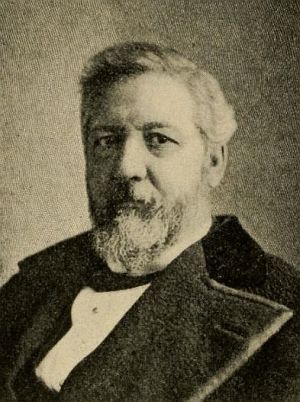
James G. Blaine.
619. Election of Cleveland.—The Republican Convention met at Chicago and nominated James Gillespie Blaine[284] of Maine for President, and General John A. Logan of Illinois for Vice President. Blaine had long been one of the most prominent men in the Republican party. Possessed of much personal charm, he enjoyed great popularity with those with whom he came into personal contact. For six years he was Speaker of the House of Representatives, and when the Democrats secured a majority in the House, he became the brilliant leader of the Republicans on the floor. While he occupied this position, however, it began to be whispered that his career was not free from acts involving corrupt motives. An investigation followed in regard to his connection with the Little Rock and Fort Smith Railroad and the Union Pacific Railroad Company. The evidence had a serious effect upon his political prospects. Many Republicans, believing him not free from the taint of corruption, were ready from the time of his nomination to vote against him. The Democrats, who also convened at Chicago, nominated, for President, Grover Cleveland,[285] who had recently shown great strength as governor of New York, and Thomas A. Hendricks of Indiana for Vice President. The campaign was an unusually spirited one, full of unseemly personalities. Some of the Reform Republicans finally made up their minds to support Blaine; but others, like George William Curtis, advocated Cleveland’s election. Blaine’s cause was greatly injured by the extravagant attacks made upon the Democrats by some of his supporters. Cleveland and Hendricks were finally elected by an electoral vote of two hundred and nineteen against one hundred and eighty-two. The election was decided by the thirty-five electoral votes of New York, secured by a majority of less than twelve hundred. The vote showed that Blaine was defeated by those Independent Republicans who distrusted his political integrity.
References.—Comparatively few books have been devoted specifically to the history of the period covered by this chapter, and general works give such recent events scanty space. Andrews’s Last Quarter Century, and Channing and Hart’s Guide, § 25, may be consulted with profit. See, also, E. Cary, George William Curtis (“American Men of Letters”); A. R. Conkling, The Life and Letters of Roscoe Conkling; S. S. Cox, Union, Disunion, Reunion; J. A. Garfield, Works (2 vols.); John Sherman, Recollections of Forty Years; J. G. Blaine, Twenty Years of Congress (2 vols.); G. W. Curtis, Orations and Addresses (3 vols.); J. Bigelow, Samuel J. Tilden, his Writings and Speeches (2 vols.); Stanwood’s History of Presidential Elections, 303-344; and the periodical literature of the time.
|
Conkling had previously attacked Garfield in scathing speeches. He did not reënter public life. He died from exposure to the great “blizzard” of 1888. Platt later returned to the Senate. |
|
Congress had voted to erect a suitable memorial to Washington the very year of his death; but no appropriation was available, and even the corner stone was not laid until 1848. |
|
Arthur’s administration was not marked by foreign complications of importance, although during the period efforts continued to be made to secure from Great Britain some modification of the Clayton-Bulwer Treaty (§ 401), since trade with South America was becoming more and more valuable and the construction of an Isthmian Canal controlled by the United States was considered essential. In domestic affairs it may be noted that President Arthur showed firmness in vetoing a bill restricting Chinese immigration, after which a less stringent one was passed. |
620. Character of the Administration.—Ever since Grant’s administrations the strength of the two great political parties had been tending more and more to an equality. When Cleveland entered upon his duties as President, the Democrats had a small majority in the House of Representatives, the Republicans still had a majority in the Senate. Legislation, therefore, was for the most part confined to non-partisan measures. Cleveland surrounded himself with a good group of Cabinet advisers, in which the South was allowed proportionate representation.[286] The latter fact, together with his policy of vetoing private pension bills, rendered the President unpopular with many Union veterans; but his general firmness and honesty as an executive were admitted by impartial observers. He was placed, however, in the unfortunate situation of having to offend either the Democrats, who demanded that all offices should be taken away from Republican incumbents and given to Democrats, or the Independents, who thought that removals from office should be made only in the case of unworthy incumbents. Cleveland extended Civil Service reform, but at the same time made some removals from office apparently on partisan grounds. Thus he offended both Democratic politicians and Independent reformers; and his administration, while on the whole successful, was not characterized by thorough harmony.
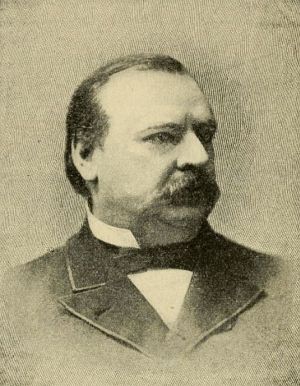
Grover Cleveland.
621. The Australian Ballot.—Cleveland’s first administration was not only marked by the improvement in the Civil Service consequent upon the President’s extending the number of offices to be filled by persons who had passed competitive examinations, but was also distinguished by a reform which helped greatly to purify elections. In order to secure the secret voting necessary to lessen intimidation and bribery of voters, the Australian ballot was adopted in several of the states. The essential principle of this ballot is that all the candidates’ names shall be printed upon a single sheet of paper, and that the voter, taking this official paper from the supervisor of the election, shall, in a booth by himself, secretly mark the name of the person or persons for whom he votes, and then, after folding the ballot, return it to the officer to be inserted in the ballot box. The method met with popular approval and was adopted, in the course of a few years, in nearly all the states.
622. The Presidential Succession Act, and the Electoral Count Act.—Two measures intended to obviate possible complications in Presidential elections were adopted during this administration. Before 1886 there was no law to determine how the Presidency should be filled in case of the death or disability of the President, the Vice President, and the Acting President of the Senate.[287] It was now determined by statute that the succession should pass from the Vice President to the members of the Cabinet, eligible in the order in which the several departments were created, beginning with the Secretary of State. The following year (1887) the Electoral Count Act determined that disputes relating to the validity of electoral votes should be settled by state tribunals.
623. Interstate Commerce Act.—The rapid growth of individual and corporate wealth in the country led to an impression on the part of very many people that the profits of industry were not fairly distributed. This feeling was greatly increased by the multiplication of corporations and trusts. Railways were everywhere tending to combine into great lines and to enter into agreements that were supposed to endanger competition and sometimes even to prevent it. It was also in their power to make such discriminating rates for freight between different manufacturing corporations and between different towns and cities as to favor some and injure others. This condition led to strikes and riots at various points, and it became evident to the leaders of both parties that remedial legislation was called for. The result was the passing of an act for the better regulation of Interstate Commerce. Railroads exclusively within an individual state could not, under the Constitution of the United States, be interfered with; but the act forbade discriminating rates and the pooling of earnings and rates on roads running partly in one state and partly in another. It also created an Interstate Commerce Commission of five members, with authority to decide such questions under the act as might arise between the railroads and their patrons, and to make an annual report on actual conditions. The Commission, however, was not given power to enforce its decisions, and, consequently, it failed to accomplish all the good that had been anticipated; but many abuses were corrected. Individual states, also, in many cases enacted laws limiting the rates for carrying freight and passengers.
624. Anti-Chinese Laws.—The strikes and other disorders prevalent during this period in many parts of the country were generally attributed to ignorant foreigners, who had not yet become accustomed to American laws. Immigration brought in a large number of discontented, disheartened, and reckless people from Europe. Efforts were now made to reduce the number of such persons; but little was done except to take still harsher measures against a more or less inoffensive people from Asia (§ 603). In 1885 twenty-seven Chinamen were murdered by miners in Wyoming because they refused to join in a strike. As the Chinese could not vote, nobody seemed afraid to favor a measure for their exclusion. In 1888, therefore, a more stringent law was passed prohibiting their immigration into the country. It was not very perfectly drawn, however, and was easily evaded by immigration through Canada and in other ways.[288]
625. The Chicago Anarchists.—Unmistakable evidences of discontent among the laboring classes continued to alarm the country. Various organizations of workmen were formed, the most conspicuous of which was the “Knights of Labor,” with upwards of a million members. A great strike took place in St. Louis in the Spring of 1886, but the most violent outbreak occurred in Chicago, May 4, 1886. A riot of anarchists, mostly foreigners, resulted in the killing of a number of policemen by bombs thrown in Haymarket Square. Four leading rioters were executed. Others were imprisoned, but were pardoned in 1893 by Governor Altgeld of Illinois. Though a reaction immediately took place against violence of an anarchistic kind, discontent throughout the country went on increasing. Perhaps the lessons taught by the Chicago tragedy were best taken to heart by those philanthropists who began establishing “settlements” among the poor of the great cities and in other ways labored to improve their condition.
626. Pension Vetoes.—Both political parties had been inclined to pursue a liberal policy in regard to military pensions. The debt of gratitude to the old soldiers and sailors was so generally felt that whenever a proposition to extend the pension list was made, very few politicians seemed willing to oppose it. The consequence was, that the liberality of Congress seemed to many persons, including the President, to be running into folly and extravagance. The pension list was costing the Treasury about one hundred million dollars a year, and Cleveland determined to resist its increase. He vetoed so large a number of pension bills, including a specially liberal one known as the Dependent Pension Bill (1887), that efforts to extend the lists were discouraged.
627. Accumulation in the Treasury.—In the course of Cleveland’s administration the silver coined under the Bland-Allison law (§ 604) was but slightly circulated, and the income of the government from tariff and internal revenue largely exceeded the expenses. All the bonds that were due had been paid, and the interest on the national debt had been greatly reduced. In consequence there was an accumulation of a very large sum of money in the Treasury. The President was strongly of the opinion that financial distress would result from continuance of a tariff producing a surplus that kept so much money from circulation and tempted congressmen to make large appropriations for pensions and for less worthy objects. Accordingly, in a special message of December, 1887, he recommended a policy of tariff reform in the interests of freer trade. As the Senate was still Republican, he could not have hoped that Congress would at once pass such a measure as he recommended and as the House agreed to when it passed a reduced tariff act, known as the “Mills Bill,” from its chief framer, Roger Q. Mills of Texas. Cleveland’s message was designed to place the matter before the country in such a way that it would become the main issue at the next Presidential election. In this purpose he was successful, although the “Mills Bill” failed in the Senate.
628. Election of Harrison and Morton.—The Republicans at their convention held at Chicago in 1888, nominated, for President, Benjamin Harrison[289] of Indiana, a grandson of President William Henry Harrison, and for Vice President, Levi P. Morton of New York. The Democrats met at St. Louis and renominated Cleveland, who was strong with the masses of the party, although unpopular with the politicians. Allen G. Thurman, formerly senator from Ohio, was nominated for Vice President. At the end of a vigorous campaign, conducted almost exclusively on the tariff issue, but marked by the circulation of misleading statements and the corrupt use of money,[290] Harrison had two hundred and thirty-three electoral votes, and Cleveland one hundred and sixty-eight. As in 1884, the election was decided by the thirty-five electoral votes of the state of New York.
References.—See bibliographical note to Chapter XXXIV. Add: Appleton’s Annual Cyclopædia for the years under consideration.
|
President Arthur had urged the necessity of such a law, and the death of Vice President Hendricks in 1885 made the need of it still more impressive. |
|
There was a large amount of money raised and used by the Republicans for campaign purposes, and it was charged by the Democrats that much of this fund was employed in purchasing votes, especially in Indiana. Counter charges of a similar nature were brought against the Democrats; and it is clear that the people at large believed the election to have been a discreditable one to both parties, since the adoption of better ballot laws by the states was accelerated (§ 621). |
629. Character of Harrison’s Administration.—President Harrison was an able lawyer and a good judge of men, as he proved by important judicial appointments and by the choice of a strong Cabinet. His Secretary of State was J. G. Blaine. Since the latter had favored a rather aggressive foreign policy, it is not strange that Harrison’s administration should be important on account of international relations. Since Congress was Republican in both branches when the administration began, it was possible to carry through important domestic legislation, including a new tariff and a lavish pension bill. One measure on which many Republicans had set their hearts,—a Federal Election Bill, introduced by Congressman (later Senator) Henry Cabot Lodge of Massachusetts, the object of which was to enable the general government to prevent fraud at elections in the larger cities and in the South,—was finally defeated in the Senate by a combination of Democrats and Republicans favoring more liberal laws with regard to silver. The defeat of this so-called “Force Bill” was probably good for the country and not harmful to the Republicans; but the party was hurt by its tariff legislation and was badly defeated in the congressional election of 1890. Thus the second half of Harrison’s administration was not so productive of important legislation as the first. The Union was enlarged during this period by the addition of six of the far Western states. North and South Dakota, Montana, and Washington were admitted in 1889, and Idaho and Wyoming in 1890. In the more than twenty years that had elapsed since the admission of Nebraska in 1867, only one state had been admitted—Colorado, in 1876. At the end of Harrison’s administration, the question of securing for the Union territory outside its bounds—to wit, the Hawaiian Islands—became important (§ 650).
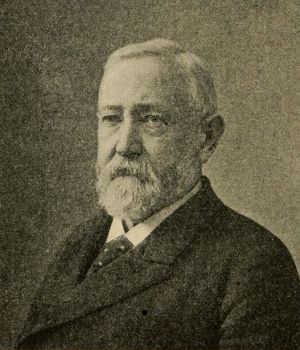
Benjamin Harrison.
[Copyright by Pach Brothers, 1896.]
630. The McKinley Tariff.—The election of Harrison had turned chiefly on the tariff issue raised by the special message of Cleveland; and as the nation had decided against the Cleveland doctrine, the framing of a new tariff bill was early undertaken. It was, as usual, intrusted to the House Committee of Ways and Means, of which William McKinley of Ohio was chairman. While it was generally felt that a large part of the surplus in the Treasury ought to be put into circulation, the Republicans were unwilling to reduce the duties on protected goods. Therefore they adopted the policy of imposing a higher duty on all articles produced in the United States, and reducing the duty on all other articles. It was believed that in this way the excess of revenue could be checked without endangering the protective system. As a matter of fact, the so-called “McKinley Tariff” of 1890, although it admitted sugar free, and was supplemented in the Senate by a “reciprocity clause,” which authorized the President to modify the tariff rates upon goods from other nations according to the liberality of those nations toward goods from the United States, created great popular disturbance, and converted many voters to Cleveland’s theories of freer trade. It was followed by a marked rise of prices in certain articles, and this fact probably contributed largely to the crushing defeat of the Republicans in the election of 1890.
631. Oklahoma Territory.—The new tariff, although it attracted so much attention, was but one of several important features of Harrison’s administration. Not long after the inauguration, the territory of Oklahoma was thrown open for settlement. It had formed a part of Indian Territory, but the right of the Indians had been purchased by the United States. In order to prevent speculation, Harrison made it known that no entrance into the territory before noon of April 22, 1889, would entitle any one to preëmpt land. As the soil and climate were considered particularly desirable, a vast crowd, numbering, it was said, as many as fifty thousand people, gathered on the border to be among the first settlers. At the bugle blast announcing the hour, the waiting settlers rushed over the border and the scramble of selecting lands began. Within a few months Guthrie, the capital, had several thousand inhabitants, with banks, schools, churches, and electric lights. The same year that witnessed this notable evidence of national enterprise also saw the great flood of Johnstown, Pennsylvania, which destroyed many lives and much property.
632. The Pan-American Congress.—In October, 1889, as a result of the work of a commission appointed in 1884, a congress of representatives of eighteen of the leading governments of North, Central, and South America, met at Washington, in what was known as the Pan-American Congress. The meeting, which had been advocated by Blaine, was designed to promote facilities for commercial intercourse. After visiting various parts of the United States, the delegates, sixty-six in number, returned to Washington and devoted several months to the discussion of better methods of making the resources of their respective countries known, and to other subjects of mutual interest. The conference was not wholly harmonious, nor were the results very definite, although the fact was brought out that Blaine and other Republicans were modifying their views in the direction of more liberal opinions with regard to the value to the country of less restricted foreign trade.
633. New Rules in the House of Representatives.—In December, 1889, important action was taken in the House of Representatives to prevent the obstruction of business. Before that time, the question as to whether a quorum was present was determined by the number of members who responded to their names at roll call, and any member felt at liberty to remain silent when his name was called. This custom afforded many opportunities for the minority to prevent legislation by simply remaining silent, and thus reducing the number apparently present to less than a quorum. It was also possible to obstruct legislation indefinitely by a succession of motions requiring a call of the roll. The Republican majority, under the leadership of Speaker Thomas B. Reed of Maine, now changed the rules so that a quorum would be determined by the number of those actually present. The new rules also empowered the Speaker to ignore motions which he regarded as purely dilatory. Mr. Reed’s innovations were denounced at the time as tyrannical, and he became popularly known as “Czar Reed”; but the general wisdom of his course of action was acknowledged later, especially when the Democrats, on obtaining control of the House in 1891, did not revert to the old rules.
634. Silver Legislation.—The continued decline in the price of silver had led to an active agitation in favor of a law to require the government to coin all the silver that might be brought to its mints at the rate of 371¼ grains of pure silver to the dollar (§ 604). Such a law, it was argued, would not only provide a market for the product of all the silver mines, but would also raise the price of silver as compared with gold to its old standard. A majority of the economists and financiers of the country argued, however, that such an extension of the currency would be sure to bring on a financial crisis.
635. The Sherman Law.—In order to prevent the passage of the suggested law, Congress agreed, in 1890, upon a compromise measure, proposed by Senator Sherman of Ohio. This “Sherman Bill” provided that the government should buy each month four and a half million ounces of silver, and that, for the silver so purchased, the United States should issue Treasury notes. These notes, known as silver certificates, were to be legal tender in payment of debt. This compromise increased the amount of currency in circulation by about fifty-four million dollars a year, and proved to be a severe drain upon the Treasury and a cause of financial uneasiness. It did not, however, raise the price of silver, as many had anticipated (§ 647).
636. New Pensions.—The vast sum accumulated in the Treasury and the rapid increase of the currency stimulated large expenditures on the part of the government. The President recommended greater liberality in the granting of pensions, and the “Dependent Pension Bill” was finally passed in 1890 (§ 626). Under this law the amount annually expended for pensions rapidly rose until, in the course of a few years, it reached more than one hundred and fifty million dollars a year.
637. Internal Improvements.—Congress also made large appropriations for internal improvements; increased the appropriations for the navy; and voted to refund to the individual states the amount of taxes they had levied in support of the war for the Union. In these ways, the expenditures of the Fifty-first Congress exceeded those of the Fiftieth by about one hundred and seventy million dollars, and in consequence the former body came to be popularly known as the “Billion Dollar Congress.” This fact gave the Democrats a good opportunity to charge the Republicans with gross extravagance, and contributed to the defeat of the latter in the elections of 1890.
638. Labor Riots.—Harrison’s administration, like those of his immediate predecessors, was marked by industrial disturbances. In the summer of 1892, a great strike occurred at Homestead, near Pittsburg, among the employees of the Carnegie Steel Company. In order to protect the works and the non-union workmen, a considerable number of Pinkerton detectives were employed by the owners. A collision occurred between the detectives and the strikers, in which the former were forced to surrender, seven detectives and eleven strikers being killed. The district was placed under martial law, and the militia of the state had to be called out before order could be restored. About the same time, disturbances also occurred at Buffalo, New York, as well as in Tennessee, where the custom of hiring out convict laborers caused considerable rioting, which had to be put down by the troops.
639. Difficulty with Italy.—During Harrison’s administration, the foreign relations of the government required, as has already been indicated, very careful treatment. In March, 1891, a serious riot occurred in New Orleans, in which several persons of Italian birth were forcibly taken from jail by a mob and shot or hanged. The disturbance was due to the murder of a popular chief of police and to the unexpected acquittal of six of the Italians accused of the crime and the failure of the jury to agree on a verdict in the case of three. Believing that the jury was bribed or intimidated by the criminal secret society known as the “Mafia,” to which the accused men belonged, the citizens became infuriated and broke into the jail, under the leadership of the district attorney. Most of the men lynched were naturalized citizens, but some of them still owed allegiance to Italy. While the United States government expressed its earnest regret at the incident, it disavowed all responsibility for it, since it was a matter entirely under the control of the State of Louisiana. The Italian government demanded a national apology, the payment of an indemnity, and the punishment of the perpetrators of the outrage. The United States government refused to comply; whereupon the Italian minister withdrew from Washington. The matter assumed a warlike aspect; but as an evidence of national good will the government finally agreed to pay the sum of twenty-five thousand dollars for the families of those who had been killed. Blaine managed the negotiations in a most creditable manner, in view of the difficulty of making the Italian government understand that even in affairs involving international relations the government of the United States sometimes has not full control of the actions of its own citizens.
640. Difficulty with Chile.—In October, 1891, a number of sailors in uniform, belonging to the United States cruiser Baltimore, were assaulted in the streets of Valparaiso, in consequence of bad feeling aroused by previous acts of the American Minister, who had not been neutral in a civil war going on in Chile. The Chilean populace was also incensed against the Americans on account of the illegal chase of a Chilean vessel, the Itata, by the United States cruiser Charleston. The requests of our government for an apology and for reparation were ignored, until, in January, 1892, a peremptory demand, accompanied by ships of war, was presented to the Chilean government. An indemnity of seventy-five thousand dollars was promptly offered and accepted. Blaine seems to have handled with his usual skill this not altogether creditable affair.
641. Seal Fisheries.—Blaine displayed equal vigor, but probably less discretion, in his efforts to secure the settlement of another serious question. For some years a dispute had existed between Great Britain and the United States, in regard to the rights of vessels engaged in the seal fisheries off Alaska.[291] The dispute involved the question as to whether Alaska seals, in going to and from the outer islands, passed out of the United States jurisdiction, so as to be subject to capture by foreign fishermen. This difficult question, which had never been clearly settled by international law, was finally submitted, in 1892, to arbitration, the seven arbitrators meeting at Paris, in the spring of 1893. The contention of the United States was not allowed, and it was declared that no exclusive property in seals could exist outside the three-mile limit. It was decided, however, that both nations might join in protecting the seals in the open waters.
642. The People’s Party.—For many years before 1890 the farmers of the country had shown unmistakable signs of dissatisfaction (§ 596). Many organizations, known as Farmers’ Leagues, Granges, Patrons of Industry, and Farmers’ Alliances, had been organized for various purposes, and for the spread of knowledge in regard to matters of mutual interest. In 1889 these organizations were united into what was known as the “Farmers’ Alliance and Industrial Union.” They met in St. Louis, and in the following year called a convention, which gave to the organization the title of the “People’s [or Populist] Party.” They demanded the unlimited coinage of silver, at a ratio of sixteen to one (§ 604), a graduated income tax, government ownership of railroads and telegraphs, and a national currency to be loaned to the people, at two per cent, on the security of land or produce. On this platform, in 1890, two senators and five representatives in Congress were elected. In 1892 the new party was ready to put a Presidential ticket in the field.
643. Pending Political Questions.—In the election of 1892 several very important questions were involved. While there had been general prosperity in the country, there was a widespread feeling that the tariff was not accomplishing what had been claimed for it. The government was accused of great extravagance (§ 637), and some of its creditable achievements, such as the passage of a long needed International Copyright Law and of an Anti-Lottery Bill which helped to put down the great Louisiana Lottery, were hardly remembered. The relations of capital and labor were not satisfactory, and it was widely felt that labor was not receiving its share in the profits of industry. The accumulations of silver in the Treasury now amounted to a vast sum, which many people desired to see put in circulation. In the midst of this prevailing discontent, Harrison, who had been a good executive, was renominated for the Presidency, with Whitelaw Reid of New York for Vice President, in a convention held at Minneapolis. The Democrats met at Chicago, and once more nominated Cleveland, who had spent the interim practicing law in New York City, with Adlai E. Stevenson of Illinois for Vice President. The People’s Party nominated James B. Weaver of Iowa for President, and James G. Field of Virginia for Vice President. The result was an overwhelming victory for the Democrats. Cleveland and Stevenson received two hundred and seventy-seven electoral votes, while Harrison and Reid received only one hundred and forty-five, and the People’s Party candidates, twenty-two.
References.—See bibliographical notes to Chapters XXXIV. and XXXV.
644. Character of the Administration.—Although Cleveland began his second administration with a Democratic majority in both houses of Congress,—something that had not been known since the outbreak of the war,—he was not able, for two reasons, to make as successful a record as he had made during his first term. The pension, tariff, and monetary legislation of Harrison’s administration brought about great financial disturbances, which lost the Democrats the control of the House of Representatives and hampered Cleveland; while the latter’s own party, the Democrats, broke away from his leadership and adopted many of the extreme, more or less socialistic views of the People’s Party. Cleveland himself, although he increased the number of offices subject to Civil Service rules and made good appointments, failed to maintain tactful relations with the Democratic leaders and even lost some of his hold upon the people at large. Nevertheless, he administered his duties with such firmness and honesty that it would be unjust to describe his second administration as a failure.
645. Industrial Causes of the Panic of 1893.—On taking up his duties, the new President found himself confronted with a serious financial crisis. The prospect of change in the tariff and in the currency had unsettled financial and commercial activity. The manufacturers of the country relied on the aid of high protective duties, but the Democratic victory had been so sweeping that they feared the tariff would be either greatly modified or swept away. They argued that in this case the country would be flooded with foreign articles, and that prices would be so reduced as to bring disaster to all who had domestic goods on hand. As soon, therefore, as it seemed probable that the Democrats would carry the election, manufacturers very generally suspended operations in their shops, and thousands of workmen were thrown out of employment. From this cause there was an immediate stagnation of business, which helped to bring on financial distress.
646. Financial Causes of the Panic.—There was another cause of business depression, which is more difficult to explain, but which had a still more disastrous influence. The greenbacks not redeemed in 1879 (§ 605), but still subject to redemption, amounted to more than $346,000,000. The Silver Purchase Act of 1890, as we have already seen (§ 635), directed the Treasurer to buy silver bullion at the rate of $4,500,000 a month and pay for it with new notes that were “exchangeable for coin.” Now the government interpreted “coin” to mean gold. In this way the notes in circulation redeemable in gold increased, till, in 1893, they amounted to nearly $500,000,000. As the number was constantly increasing at the rate of $4,500,000 a month, the people began to distrust the ability of the government to redeem the notes. This distrust of itself would have made a financial crash inevitable, but the condition was made worse by the decline in the price of silver, to which reference has several times been made (§ 634).
647. Decline in the Price of Silver.—In twenty years the value of silver had fallen from one dollar and thirty cents an ounce, till in 1893 it was worth only about eighty cents. People in Europe, as well as in America, naturally feared that our government might interpret the word “coin” to mean silver as well as gold, and might choose to redeem its notes in the cheaper metal. This fear led business men everywhere to desire the redemption of their bonds and notes before the government should begin to pay silver. Foreign investors sent back their bonds for redemption, while the people at home in many cases even drew their money from banks through fear that the latter would soon not be able to meet the demands for gold made upon them. These various influences caused a financial crash about two months after Cleveland’s inauguration. More than three hundred banks either failed outright or suspended payment; business men found it impossible to borrow money on any terms, and thousands of failures in business followed.
648. Repeal of the Sherman Act.—As the Treasury was still obliged by the Sherman Act to continue purchasing silver, the President called a special session of Congress to modify or repeal the law. The clause of the bill authorizing the purchase of silver was quickly repealed by the House, when Congress met in August, but the measure was strenuously opposed in the Senate by numerous advocates of the unrestricted use of silver currency. The repealing act was finally carried and became a law, November 1, 1893. Its remedial effects, however, were not speedily visible. At the beginning of winter it was estimated that as many as two hundred and sixty thousand laboring men were unoccupied in Chicago, New York, and Philadelphia. Moreover, the repeal of the Sherman Act and the persistent decline in the price of silver caused nearly all the silver mines in the West to be closed. In Colorado alone, from fifteen to twenty thousand miners not only lost their employment, but became dependent on charity for food and shelter. The demand for free coinage of silver at the rate of sixteen to one consequently became emphatic in the far West and was supported by the Populists and many Democrats in the East.
649. The Wilson Tariff Law.—As the Democrats were pledged to modify the tariff law, this subject was taken up at the beginning of the first regular session of Congress in December, 1893. William L. Wilson of West Virginia, Chairman of the House Committee on Ways and Means, brought in a bill which greatly reduced the tariff on many articles. This measure, after being much altered on account of opposition in the Senate, was finally passed. The President, however, since the bill in its ultimate form reduced duties only about one quarter on an average, regarded it as a modification of a protective tariff, rather than as a measure in the interests of freer trade, and therefore allowed it to become a law without his approval or signature. It was anticipated that the law would fail to produce the necessary revenue, and, largely on this account, a clause was added which provided for an income tax of two per cent on all incomes of more than four thousand dollars. It was expected that the income tax would yield not less than forty million dollars a year. The Supreme Court, however, declared this portion of the act unconstitutional and therefore null and void. The natural consequences followed. The income of the government was insufficient to meet the current expenses; gold continued to be exported for the payment of bonds offered for redemption. To meet these demands new bonds had to be issued; and consequently, before the end of the administration, the public debt had been increased by about two hundred and fifty million dollars. It is no wonder, in view of the unsatisfactory character of the Democratic legislation in 1893–1894, that in the congressional elections of 1894 the Republicans should have swept the country.
650. Revolution in Hawaii.—Early in his administration, President Cleveland was obliged to consider the condition of affairs in Hawaii. While Harrison was in office, discontented resident Americans and Sandwich Islanders had overthrown the government of Queen Liliuokalani and established a republican form of government. The leaders hoped that they could secure the annexation of the Islands to the United States. American seamen were landed for the avowed purpose of protecting American citizens, but it was charged, with probable truthfulness, that they actively supported the revolutionary movement. The insurgents sent commissioners to Washington, who were influential enough to secure the draft of a treaty of annexation, which was sent by Harrison to the Senate for confirmation. Before the Senate was ready to act on the treaty, however, Harrison’s administration came to an end; and one of Cleveland’s first acts was to withdraw the treaty and send a commissioner to the Islands to investigate and report on the condition of affairs. On his arrival the commissioner declared the previously established American protectorate at an end and took down the American flag. In his final report to the President, he asserted that the success of the revolution had resulted chiefly from the efforts of the American Minister and the support of the American troops. The President thereupon withdrew all such support and wrote a letter of regret and sympathy to the queen. He also sent a minister to help her to regain her authority,—an act for which he was much criticised by the many persons who disapproved of his Hawaiian policy. The movement on the Islands, however, had been so successful that the queen was unable to regain her throne and finally sold her rights. The annexationists were completely successful four years later (§ 672).
651. The Venezuelan Dispute.—Two years later, President Cleveland proved to the critics of his Hawaiian policy that he had a firmer grasp on foreign affairs than they thought. For nearly half a century a difference of opinion had existed between Great Britain and Venezuela as to the boundary line between their possessions in South America. Great Britain had received by treaty, nearly a hundred years before, the territory in South America which belonged to Holland; while the rights of Venezuela had been derived from Spain. The boundary line had never been clearly defined, and, as time progressed, disputes with regard to it became more and more serious. Venezuela finally appealed to the United States for assistance. President Cleveland’s Secretary of State, Richard Olney of Massachusetts, entered into correspondence with the British government for the purpose of securing a settlement of the dispute by arbitration. Great Britain took the ground that the question was one not appropriate for arbitration, inasmuch as it involved the possible surrender of territory which had long been believed to be British and had been occupied by British subjects, whose rights should not be put in jeopardy. The correspondence became animated, and finally, in December, 1895, President Cleveland submitted the papers to Congress with a special message. He took the ground that the United States, following out the Monroe Doctrine, would be bound to resist in every possible way any encroachment by Great Britain upon any territory belonging to Venezuela. He asked for an appropriation by Congress to provide for a commission to investigate the whole subject of the boundary dispute. Congress at once appropriated one hundred thousand dollars for that purpose. The message of the President startled every one and made a profound sensation, not only in the United States, but also in Great Britain and in other parts of Europe. The possibility, even the probability, of war was freely talked of,[292] although the people of neither country desired it. The commission entered promptly upon its work, but before it was ready to report, the British government agreed to submit to arbitration all questions pertaining to lands other than those that could be shown, before a joint commission, to have been occupied by British subjects for at least fifty years. In this way the contentions of both governments were satisfied. The joint commission of arbitration met in Paris in the summer of 1899, and in due form rendered a final judgment, which was on the whole favorable to Great Britain. Cleveland’s action in the matter, while harshly criticised in some quarters, especially on account of the direct language employed in his message, was on the whole supported with great enthusiasm by the people at large, regardless of party. The policy he advocated with respect to the relations of the United States toward the weaker republics to the south may be regarded as an extension of the Monroe Doctrine, to which Congress and the people have given their consent.
652. The World’s Columbian Exposition.—One of the most conspicuous events of Cleveland’s second administration was the Columbian Exposition, commemorative of the four hundredth anniversary of the discovery of America by Columbus. There was active competition among the great cities for the privilege of holding the exhibition. Congress decided upon Chicago. The exposition was projected for the year 1892, but the preparations to be made were so vast that postponement till 1893 was necessary. A large appropriation was made by Congress, and the state of Illinois also rendered important assistance; but the remarkable success of the undertaking was chiefly due to the enterprise of the people of Chicago. No other exhibition ever presented so magnificent an appearance. Jackson Park, on the shore of Lake Michigan, was chosen as a site, and the preparation of grounds and buildings was intrusted to a board of the most eminent landscape gardeners and architects in the country. Machinery and manufactured products were brought together from all lands, and an important impulse was given to every form of American and European industry. But while the exhibits were most satisfactory, the beauty of the grounds and buildings was more important, since it encouraged the belief that America could become in time as notable for her artistic as for her industrial achievements. The exposition was visited by more than twenty-seven millions of people—nearly three times as many as visited the Centennial at Philadelphia in 1876 (§ 595).
653. Strikes and Riots.—The Columbian Exposition represented the benefits of industrial peace; but while it was being held, the panic already described (§§ 645-649) was in progress, and the country’s industries were thrown into great confusion. As had so often happened in the twenty years preceding, discontent among the working classes caused much agitation and rioting. An “army” of unemployed men and tramps, under the leadership of a person named Coxey, actually marched to Washington to demand redress for their grievances. They were easily dispersed; but a great strike, which took place at Chicago in the summer of 1894, was put down only with the use of considerable force. General inactivity in business had led the Pullman Car Company to make a reduction in the price of labor in their shops. The strike just mentioned followed; and, after some weeks of turbulence, the American Railway Union ordered the employees of all those railroads in Chicago that did not refuse to use the Pullman cars to cease work. The consequence was a practical cessation of traffic for some days. When an attempt was made to move the trains, the trainmen were assaulted. Cars were wrecked and set on fire, and many men were killed or wounded. President Cleveland, though having no precedent for the act, with characteristic energy and decision sent United States troops to protect United States property, to secure the unhindered transmission of the mails, and to prevent interference with interstate commerce. His firmness restored order in Chicago and prevented outbreaks of lawlessness in other places.
654. The Political Condition of New York City.—The city of New York had long been disgracefully ruled by corrupt politicians affiliated with Tammany Hall. In 1894, an investigating committee exposed the system of blackmail and plunder by which the politicians maintained themselves in power. In consequence of these revelations, a reform ticket was victorious in the fall of 1894 and the government of the city was improved.
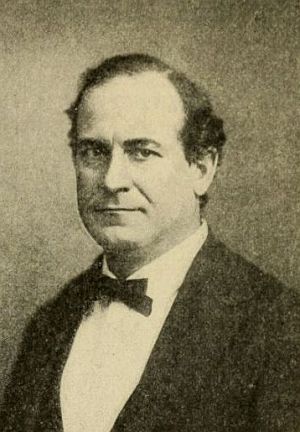
William J. Bryan.
655. The Campaign of 1896.—Political conditions at the time of the campaign of 1896 were strangely confused. The President and his supporters were out of sympathy with the chief leaders and the masses of the Democratic party. Many Democrats had become Populists. Many Republicans who favored silver had broken more or less with those of their party who considered the protective tariff the main political issue. The number of Independent voters had increased. In the midst of this confusion, the Republican convention met at St. Louis and adopted a platform favoring protection and, less explicitly, the maintenance of a gold standard. They also declared their willingness to coöperate with European nations in an effort to restore a policy of bimetalism. The Democrats, on the other hand, meeting at Chicago, declared that the United States should adopt the free coinage of silver at a ratio of sixteen to one, even without the coöperation of Europe. Other planks, especially one attacking the Supreme Court, which had given offense by its decision with regard to the income tax (§ 649), showed that the party had adopted many of the principles of the Populists. The administration of Cleveland was expressly condemned. The Republicans, rejecting the candidacy of Speaker Reed, nominated, for President, William McKinley,[293] who had left Congress to become governor of Ohio, and had secured the shrewd support of Marcus A. Hanna of that state. Garret A. Hobart of New Jersey was nominated for Vice President. The Democrats, carried away by a remarkable speech of William J. Bryan,[294] a young ex-congressman from Nebraska, nominated him for President, and Arthur Sewall of Maine for Vice President. Bryan’s nomination was accepted by the “People’s” Party, but Thomas E. Watson of Georgia was put in place of Sewall for Vice President. Those Democrats that could not advocate a free coinage policy, after much hesitation, met in separate convention at Indianapolis and nominated General John M. Palmer of Illinois for President, and General Simon B. Buckner of Kentucky for Vice President, on a platform advocating a gold basis. The campaign was an exciting one and caused much anxiety in financial circles; but it was conducted with unusual freedom from personal accusations. Bryan made a remarkable tour of the country, stirring large crowds by his eloquence; but his efforts were vain, since the silver policy he supported drove thousands of Democrats and Independents into the Republican ranks. McKinley and Hobart were elected by two hundred and seventy-one electoral votes, while Bryan and Sewall received one hundred and seventy-six. So great was the disaffection within the Democratic party, that the “Solid South” was broken for the first time since the war.
References.—See bibliographical note to Chapter XXXIV. See also Cleveland’s articles on the Venezuelan boundary dispute, in the Century for June and July, 1902.
|
In consequence of the war rumors, American securities fell and the drain on the Treasury’s supply of gold compelled the President to ask Congress to authorize a fresh issue of bonds. |
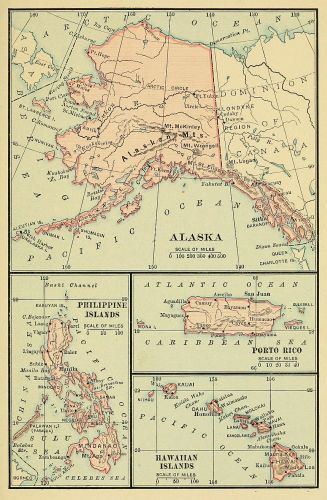
Colonial Possessions, 1909
656. Character of the Administration.—McKinley soon proved himself to possess great tact as an executive. Some of his Cabinet appointments were not good, and he showed weakness in his attitude toward Civil Service reform; but as time went on his courtesy and amiability won him many friends, even among his political opponents. His administration was strong through the presence of a Republican majority in both houses of Congress, and important tariff and other legislation was made possible. But before long domestic affairs were overshadowed by issues growing out of the war with Spain and the acquisition of outlying territories.
657. Modification of the Tariff.—Two days after McKinley’s inauguration he summoned an extra session of Congress, and in his message called attention to the fact that for some years the expenditures of the government had exceeded the income, and that the tariff should be so modified as to remedy this deficiency. A tariff bill was soon presented by Representative Dingley, Chairman of the Ways and Means Committee of the House, and was duly passed. It increased duties markedly, but to a less extent than the McKinley Bill. For many months the Dingley Bill failed to furnish the needed additional revenue, and to supply the deficiency, the bill was supplemented by an additional tax on beer and a few other articles. The questions with regard to the currency and to banking which the party platform had promised to settle were reserved for later Congressional action.
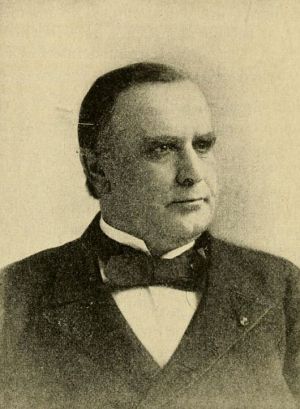
William McKinley.
658. Early Spanish Difficulties in Cuba.—Spanish rule in the West Indies had, ever since the discovery of America, been characterized by rapacity and cruelty. Revolts were never uncommon; but outbreaks were particularly frequent during the latter part of the nineteenth century. As many as eight organized efforts to throw off the Spanish yoke occurred between 1823 and the “Ten Years’ War,” which desolated Cuba from 1868 to 1878. Instead of taking a lesson from experience, and improving the condition of affairs, the Spanish authorities doubled the discontent by the imposition of taxes designed to reimburse the mother country for the cost of the long war. The result was a rapid reorganization of the Cuban forces and a fresh outbreak of revolt in 1895.
659. Later Policy of Spain.—The Spanish government now adopted a harsher policy than ever. Captain-General Campos was thought to be too lenient, and he was replaced by General Weyler, who had gained notoriety for harshness as Governor-General of the Philippines. The new governor took hold of his work in Cuba with brutal energy. His policy was simply to starve the people into submission. With a large army he overran the island, burning houses and crops and driving the women and children into villages and pens, called “trochas,” where their numbers were rapidly reduced by starvation. President Cleveland attempted to intercede in behalf of the Cubans, but his approaches were repelled by the government at Madrid as an unwarranted interference, and nothing was accomplished.
660. Sympathies of Americans.—As the Cuban situation came to be more thoroughly understood in the United States, public opinion was outraged and finally raised to a high pitch of indignation. Money and supplies were privately sent to assist the insurgents, and the United States government was obliged to police its ports in order to preserve the international obligations of neutrality. The temper of the country and the representations of our government soon convinced Spain that concessions must be made or immediate war was inevitable. Weyler was removed and a promise of some measure of self-government was given. Notwithstanding these assurances, however, there was little public faith in Spanish promises, and no plain evidence of improvement followed.
661. Destruction of the “Maine.”—Such being the state of affairs, war was rendered almost inevitable by a disastrous event that took place on the 15th of February, 1898. The United States battleship Maine was anchored in the harbor of Havana. Late in the evening, after most of the crew had gone to their hammocks, a terrific explosion occurred, which destroyed not only the ship, but also the lives of two hundred and sixty-six of the officers and crew. The horror of the disaster thrilled the civilized world. A court consisting of naval officers was appointed by the President to investigate the matter and report. They employed divers, as well as other experts, and reported that all the evidence tended to show that a mine beneath the keel had exploded first and that the concussion had an instant later exploded two of the magazines of the vessel. A Spanish court denied the correctness of the American report. There was no evidence whatever that any mine had been exploded with the knowledge of the Spanish authorities, and the captain-general and other officials disavowed all knowledge of the cause of the disaster. The government at Madrid, moreover, made haste to express its regrets and sympathy.
662. Outburst of Public Sentiment.—When the report of the investigation was made public, the people of the United States, stimulated by the pulpit and the press, seemed to take the matter into their own hands. Flags suddenly flew out from public buildings and schoolhouses in all parts of the land. In theaters and cafés audiences cheered and sprang to their feet whenever the flag was displayed or the “Star Spangled Banner” was sung. The nation throbbed with an indignant enthusiasm. “Remember the Maine” was printed and shouted everywhere. No such outburst of public feeling had been seen since 1861; nor was it confined to any one section of the country. The South was not behind the North and West in demanding prompt action.
663. Action of Congress and of the President.—Members of Congress, especially of the House of Representatives, were the first to feel the significance of the public demand, and they proceeded at once to urge decisive action upon the President. President McKinley used the resources of diplomacy to induce the Spanish government to withdraw from the island. They made promises not fully credited or published,[295] and on the 8th of March, 1898, the President requested from Congress an appropriation of fifty million dollars for national defense. The appropriation was made without a dissenting vote. With this sum coast fortifications were strengthened, vessels and naval supplies were purchased in various parts of the world, and a number of fast vessels were leased to form an auxiliary fleet. On the 11th of April the President sent a special message to Congress, in which he recited the practices of the Spanish government in Cuba, and referred to the destruction of the Maine as evidence of Spanish inability to restrain lawlessness and misrule. His conclusion was, that forcible interference would now be justified. Congress immediately responded, and on the 19th of April, the anniversary of the battles of Lexington and Concord, adopted resolutions declaring that Cuba ought to be independent. This was practically a declaration of war.[296]
664. Delay in the Opening of the War.—The opening of the war on land was delayed by the fact that the regular army was small, and the fighting force had to be made up largely of volunteers. During April and May the President called for two hundred thousand men. The regular army was also increased from twenty-seven thousand to sixty-two thousand. Besides these, there were enlisted ten thousand immunes, or men who had already had yellow fever, thirty-five hundred engineers, and three thousand special cavalrymen, known as “Rough Riders,” consisting largely of “cow-boys” and such others as had had experience in daring horsemanship.
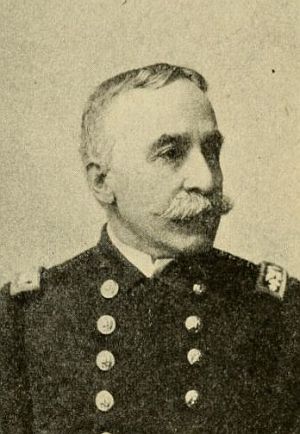
Admiral George Dewey.
665. General Character of the War.—The war was a short one. In advance it was popularly supposed that the Spanish navy was somewhat stronger than the American. Accordingly, there was not a little fear on the part of the cities along the Northern coast. But as soon as hostilities began it was found that the Spanish service was honeycombed with inefficiency and corruption. On their war vessels nothing seemed to be in good fighting order. Beyond the fact that the army was equipped with Mauser rifles and smokeless powder, nothing in the Spanish service seemed what it should be for the vigorous prosecution of war. The consequence was, that on land and on sea the American forces found victory comparatively easy.
666. The First Great Victory.—At the outbreak of the war the American Asiatic fleet, in command of Commodore George Dewey,[297] was stationed at Hong Kong. Under international rules Dewey was obliged to withdraw from that neutral port within eight days. He received orders from the President to proceed to the Spanish archipelago of the Philippines and capture or destroy the Spanish fleet. Dewey found the fleet in Manila Bay, at daybreak of May 1, 1898, and opened fire at once. The result was a victory almost unique in naval warfare. The Americans’ fire was terribly effective. It is said that a single shot which exploded in the Spanish flag-ship, struck down the captain and sixty men. The Spaniards fought with great bravery, but finally lost ten war vessels and a transport. On the American side not a man was killed and only eight were slightly wounded.
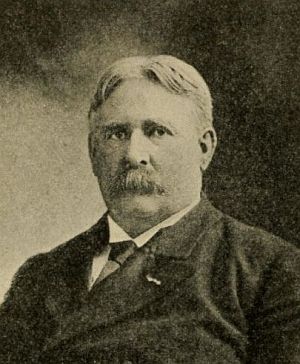
General W. R. Shafter.
667. The Investment of Santiago.—On the day after the declaration of war, the President ordered the fleet at Key West to sail at once to blockade the coast of Cuba. Preparations for invasion were made with all possible rapidity; but it was not until the 22d of June that the advance, under Major General William R. Shafter,[298] landed for an attack upon Santiago, the principal city in the eastern part of the island. On the 23d, a forward movement was made by the First and Tenth Cavalry, and by the First United States Volunteer Cavalry, commonly known as the “Rough Riders,” under Colonel Leonard Wood and Lieutenant Colonel Theodore Roosevelt. The lines were rapidly extended toward the north and west. On July 1, a severe battle took place and the outworks of the city were reached. El Caney and San Juan Hill were taken by storm, after desperate charges and heavy losses. The investment of the city was then practically complete.
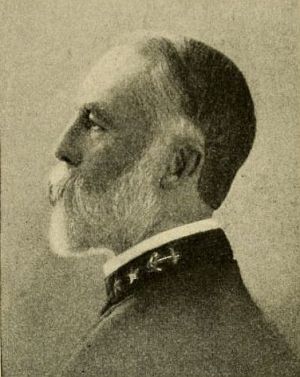
Admiral W. T. Sampson.
[Copyright by E. Chickering, 1900.]
668. Admiral Cervera’s Movement.—Before the outbreak of the war, a Spanish squadron under Admiral Cervera assembled at the Cape Verde Islands, and in April sailed for the Caribbean Sea. Its destination was for some days in doubt, and an attack on the New England coast was feared; but on the 19th of May it secretly entered the harbor of Santiago de Cuba. The North Atlantic Squadron, under Commodore William T. Sampson,[299] was searching for the enemy, and soon discovered his hiding place.[300] In order to prevent the Spanish army and navy from concentrating their forces at Santiago, attacks had been made on several cities on the coast of Cuba; but these had produced no important results. To prevent Cervera’s escape, Lieutenant R. P. Hobson, with seven volunteers, attempted, early in the morning of the 3d of June, by sinking the coaling ship Merrimac under the guns of the forts, to block the narrow passage in the mouth of Santiago harbor. Though this exploit did not accomplish what was hoped for, owing to the fact that the rudder of the Merrimac was shot away, it was perhaps the most gallant and daring single exploit of the war. The members of the party were showered with shot, but received no serious wounds, and all were picked up by the Spaniards, Hobson being helped into the launch by Admiral Cervera himself.
669. The Decisive Engagement of the War.—The Spanish government saw clearly that Cervera must either escape from the harbor of Santiago, or be taken prisoner with all his ships. Accordingly, the admiral was ordered to leave the harbor on the first practicable opportunity. He chose the morning of Sunday, July 3. The resulting battle was as remarkable as the battle of Manila.[301] In less than three hours all the Spanish ships, besides the torpedo boats, were either destroyed or run ashore. The Spanish admiral and thirteen hundred of his men were taken prisoners, while about six hundred were either killed or drowned. On the American side but one man was killed and one man wounded. The capitulation of Santiago and the entire eastern end of Cuba followed, the Spaniards surrendering twenty-three thousand men,—a force considerably larger than that of the besieging army. The work of the navy was generally conceded to have been admirable; but the conduct of the campaign on land was harshly criticised in many quarters.
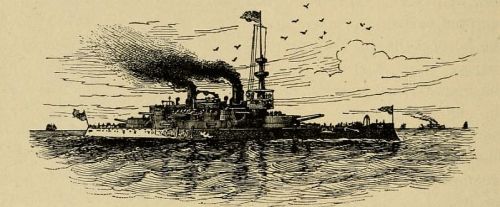
The “Oregon.”
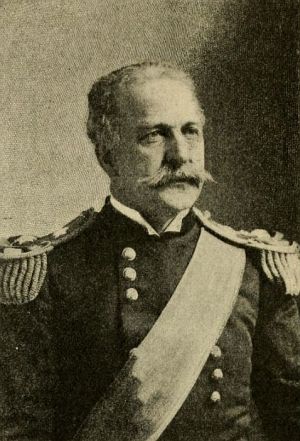
General Nelson A. Miles.
670. Concluding Scenes of the War.—General Nelson A. Miles,[302] with a force of about seventeen thousand men, landed on the island of Porto Rico (July 28), as soon as it became known that his troops would not be needed at Santiago. The Porto Ricans offered very slight resistance, and before the middle of August the island was in the possession of the Americans. Manila, the capital city of the Philippine Islands, was also assaulted by the land and naval forces, and after a brief resistance surrendered unconditionally, on the 13th of August. In every engagement of the war, the American soldiers and sailors behaved with great gallantry. But the management of affairs by the War Department was, to say the least, unfortunate in many respects. There was great confusion in the matter of furnishing the troops with supplies, and the quality of the food provided was in some instances so bad that influential officers had to remonstrate against a condition of affairs that demoralized the soldiers and exposed them to disease. Even in camps situated within the United States, sickness and disorder were common; and so loud an outcry was raised against official mismanagement that the President appointed a commission to investigate the matter. The commission, in its report, was unexpectedly, and many thought unduly, favorable to the War Department.
671. The Treaty of Peace.—On the 26th of July, the Spanish government made overtures for peace. After various delays, a preliminary agreement, or protocol, was signed, August 12. President McKinley at once issued a proclamation, suspending hostilities. It was agreed: (1) that Spain should withdraw its troops from Cuba and renounce its authority over that island; (2) that it should cede the island of Porto Rico to the United States; (3) that it should transfer to the United States one of the Caroline Islands; and (4) that the future of the Philippine Islands should be determined by a joint commission of the two powers appointed to arrange the details of the treaty. According to the provisions of this protocol, the joint commission met in Paris, on the 1st of October, 1898, and, after long discussion of different points, signed the final treaty on the 10th of December, 1898. This was ratified by the United States on the 6th of February, and by Spain on the 17th of March, 1899. By the terms of the treaty, the United States assumed a protectorate over Cuba; came into complete possession of Porto Rico; received all right and title to the Philippine Islands, in consideration of twenty million dollars; and received the island of Guam in the Ladrones Islands.
672. The Annexation of Hawaii.—In the summer of 1898 it became apparent to the government that certain naval advantages would be derived from the annexation of Hawaii. The long passage from San Francisco to the Philippine Islands called for an intermediate station for coal and other naval stores. Accordingly, on the recommendation of the President and as a military measure, Congress acceded to the wishes of the Hawaiian government, and annexed the islands by means of a resolution, as had been done in the case of Texas.
673. Revolt in the Philippines.—Before the outbreak of the Spanish War, the inhabitants of the Philippines, like those of Cuba, had been in a chaotic state of discontent. Uprisings against the Spanish government had been frequent, but these had generally been put down with great severity. A struggle for independence had been going on just before the Spanish-American war broke out; but the leader, Aguinaldo, had given up the task, in consideration of a large sum of money, and had gone to Hong Kong. Imagining that American success would result in the freedom of the Philippines, he returned to Manila on the American fleet and coöperated, with his followers, in the operations against Manila. Soon after peace was assured between the United States and Spain, he raised the standard of independence, in consequence of disappointment at the transfer of the Philippines to the United States and of the terms used by President McKinley in a proclamation issued to the inhabitants of the islands. As might have been expected from the fact that the opposing lines of forces were stationed close to one another, hostilities were not long avoided. Aguinaldo’s extemporized government and authority were in the main limited to the island of Luzon, and his chief reliance was upon the single tribe of the Tagals. The natives were never able to resist successfully the advances of the American troops, but they had possession of a large number of towns and villages, and these had to be taken, often at the point of the bayonet. Hostilities were protracted by the rainy season, and by the fact that the Filipinos were divided into many inaccessible bands. No battle of any great importance was fought; but it was not until the spring of 1900 that the revolt dwindled into guerrilla warfare. A year later (March, 1901), Aguinaldo was captured through stratagems devised by General Frederick Funston. The Filipino chieftain then issued a manifesto, urging submission to American authority.
674. Pacification of the Philippines.—His advice was largely followed, and the Philippine Commission, under the presidency of Judge William H. Taft of Ohio, was soon able to report great progress in pacification. Many hundreds of American school teachers were sent to the islands, and American energy was at once shown in improving sanitary conditions and in exploiting natural resources. But spasmodic fighting has not ceased, and it is believed by many persons that the Filipinos are far from really pacified. This is probably more true of outlying islands like Samar, where a small detachment of troops was almost exterminated, than of Luzon, the center of administration. The authorities at Washington have expressed their determination to put an end to every form of barbarism existing in the Philippines, and, owing to charges of cruel conduct that have been brought against American officers and troops, have instituted courts-martial for the purpose of trying officers and soldiers charged with countenancing or inflicting unusual punishments, such as the mode of torture known as the “water cure.” It seems clear that although there has been among the American troops some of that demoralization which always shows itself when war is conducted in tropical countries and against weaker races, the great mass of the American forces in the Philippines have performed their duties satisfactorily. The exact status of the islands with regard to the United States is still unsettled, and it is not certain that permanent possession of them is desired by a majority of the American people.
675. Opposition to the War.—It should not be supposed that the course of the government in the Spanish War met with the approval of the entire people. There were not a few who more or less vigorously opposed the declaration of war in behalf of the Cuban sufferers, and the number was increased when it was seen that victory involved territorial enlargement and an increase of political responsibilities. The most active opposition had its center in Boston. The claim was made that the acquisition of new territory showed a tendency to imperialism that was not justified either by the United States Constitution or by the political principles or customs of the country. Attention was repeatedly called to the clause in the Declaration of Independence which declares that the basis of just government is the “consent of the governed.” It was further asserted that the new possessions would increase the tendencies to political corruption, and would exert an unwholesome influence on the government at home. In opposition to these views, the President, and apparently a large majority of the people, held that there was no more constitutional objection to the acquisition of insular territory than there had been to the acquisition of Louisiana, California, or Alaska. The advocates of the so-called “expansion policy,” furthermore, would not admit that added political responsibilities would increase a tendency to corrupt government, and they claimed that, in view of international tendencies, the country needed the newly acquired territory, in order to protect its interests in the far East.
676. Government of Newly Acquired Territories.—On the recommendation of the President, Congress provided territorial governments not only for Hawaii, Guam, and Porto Rico, but also for Alaska. These governments were framed with the intention of developing free institutions as rapidly as the intelligence and character of the inhabitants would admit. Cuba was temporarily put under the control of a military government, which was instituted in order to set the wheels of a competent local government in motion. The President proclaimed his purpose to turn over the government of the island to the Cubans as soon as order and a prospect of peace had been established.
677. Financial Reform.—The second Congress of McKinley’s first administration early took into consideration the vexed question of the currency, and also discussed banking laws and refunding the national debt. The legislation finally adopted, which went into effect March 14, 1900, placed the entire currency of the country on a gold basis, provided for the establishment of national banks in the smaller towns and villages, and authorized the Secretary of the Treasury to issue long-time two per cent bonds, with the income of which the shorter-time three, four, and five per cent bonds were to be called in and paid. The success of the refunding measure was a remarkable evidence of the firm basis on which the credit of the country was now established. Though the new bonds sold at par, within two months of the passage of the bill more than two hundred and sixty millions of the old bonds had been refunded at the lower rate. The significance of this success is shown by the fact that, while this process of refunding with a two per cent bond was going on, the lowest Russian bonds were bearing four per cent; the lowest French bonds, three and a half per cent; the lowest bonds of the German Empire, three per cent; and the lowest bonds of Great Britain, two and three-fourths per cent. For the first time in its history, it might fairly be claimed that the credit of the United States was the best in the world.
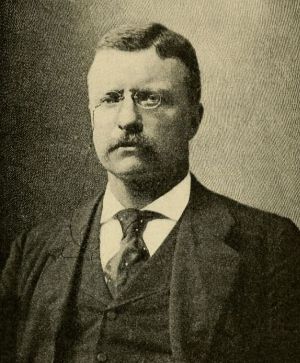
Theodore Roosevelt.
[Copyright by Pach Brothers, New York.]
678. Presidential Candidates in 1900.—As the end of McKinley’s term approached, it became evident that there would be no opposition in the Republican party to his renomination. The Convention met in Philadelphia, June 19, and adopted a platform which indorsed McKinley’s policy of government in Porto Rico, in Cuba, and in Hawaii, and also advocated the retention of the Philippine Islands under conditions that would secure for them local self-government as rapidly as the condition and spirit of the people would permit. Interest was chiefly centered in the nomination of a candidate for the Vice Presidency. There were three prominent candidates, each with strong local support, in different parts of the country. But as soon as the delegates assembled, it became apparent that there was a great popular sentiment in favor of the nomination of Governor Theodore Roosevelt,[303] of New York. He was not only not a candidate, but with great earnestness besought the delegations from the different states not to put forward his name. But he had distinguished himself by his work on the Civil Service Commission, as a police commissioner of New York City, as a brave and picturesque commander of the Rough Riders in the Spanish war, and as an honest and intelligent governor of New York, and his energetic opposition to being put forward as a candidate was of no avail. McKinley received every vote in the convention, on the first ballot; and Roosevelt, who sat in the convention, received every vote excepting his own. On the 5th of July the Democratic Convention, at Kansas City, nominated, with equal unanimity, William J. Bryan for President, and ex-Vice President Adlai Stevenson of Illinois, for Vice President. The Democratic platform was vigorous in its expressions of opposition to McKinley’s policy of expansion, promised legislation against trusts, and declared anew its advocacy of free coinage of silver at a ratio of sixteen to one. The impossibility of uniting all interests in these two candidates for the Presidency was shown by the fact that ten other candidates were, in the course of the summer, put in the field by various small parties.
679. Reëlection of McKinley.—After an interesting but not exciting campaign, in which the maintenance of the financial standing of the country, rather than the approval or disapproval of the so-called “imperial” system, became the paramount question, McKinley and Roosevelt were elected over Bryan and Stevenson by the large majority of two hundred and ninety-two electoral votes to one hundred and fifty-five. McKinley’s popular majority was even greater than that received by him in 1896.
680. Foreign Affairs.—During the summer of 1900, public attention was distracted from the Philippines to China, where the Boxer uprising put foreign residents, especially missionaries, in great jeopardy. The United States joined the chief nations of Europe in sending forces to China. These troops behaved well; and in the subsequent diplomatic negotiations, President McKinley and his Secretary of State, John Hay, won much praise for their moderate and statesmanlike course of action. The latter gained great credit also for his efforts to secure an agreement between Great Britain and the United States with regard to the control of any interoceanic canal that might be undertaken in Central America. The treaty, as modified by the Senate, was rejected by Great Britain; but after concessions on both sides, a new Hay-Pauncefote treaty was finally ratified (December 16, 1901), which secured to America complete control of any such canal.
681. Domestic Affairs.—Among the most important domestic events of the close of McKinley’s first term were the exclusion from Congress of the polygamist Representative Roberts of Utah; the unfortunate contest for the governorship of Kentucky, which resulted in the assassination of the Democratic contestant, Mr. Goebel; and the terrible storm which devastated the city of Galveston, Texas. The completion of the twelfth census in 1900 showed a total population of 76,303,387, and an increase of wealth and industrial power so marvelous as to promise almost incredible achievements in the near future. On February 28, 1901, an act was passed reducing the taxes that had been levied to defray the expenses of the Spanish War.
682. Second Inauguration of McKinley.—President McKinley entered upon his second term of office on March 4, 1901, and retained the Cabinet as it stood at the close of his first term. His inaugural address emphasized the material prosperity of the country and the need of securing foreign markets by wise treaties of reciprocity. This liberal policy was consistently advocated by him in speeches delivered during a summer tour of the country, and especially in one made at the Pan-American Exposition at Buffalo, New York.
683. The Assassination of President McKinley.—Immediately after this noteworthy speech, President McKinley was taken from the nation whose affairs he was guiding with an ever steadier hand. On September 6, 1901, while he was holding a reception in the Temple of Music at the Buffalo Exposition, he was shot by an anarchist who had concealed a revolver under a handkerchief that apparently covered a wounded hand. The President bore himself with remarkable dignity and courage, both at the time of the shooting and during the eight days of suffering that followed. At first it seemed as if he would recover; but on September 14 he died, and Vice President Roosevelt at once took the oath of office as President. The whole world was profoundly shocked by the tragedy, and the manifestations of popular grief, as the body was conveyed to Washington and from there to Canton, Ohio, were extraordinary. On September 19, while the interment was taking place at Canton, all labor was suspended throughout the country. Popular indignation was naturally directed against anarchists and political agitators of all sorts; but, in the main, the people restrained themselves in a most praiseworthy manner. The trial and execution of the assassin were conducted with great promptitude and decorum.
684. The New President and His Policies.—Upon taking office, President Roosevelt announced that he would continue the policies and retain the Cabinet of his predecessor. It was not to be expected that such a pledge would be kept to the letter, since the new Executive differed greatly from President McKinley in temperament and in training, and was soon confronted with a new combination, if not precisely a new set of problems. He was more direct and vigorous in his methods of conducting the nation’s business, more impetuous and less politic in his relations with men and in his appeals to the people for support of his measures. His honest, fearless, aggressive personality soon made him the most popular of modern Presidents and enabled him to secure a considerable amount of good legislation and to put his own stamp, not only upon the national administration, but upon the general course of politics throughout the country. He stood for an efficient civil service, clean if somewhat partisan politics, and a resolute enforcement of such laws as affected the methods of business employed by monopolies and great corporations. He soon seemed to be the representative of the interests of the many as opposed to those of the few, and, as a result, he was praised by radicals and censured by conservatives. In consequence, party lines began to be broken, and it may be that Mr. Roosevelt’s greatest service to the country will be found to lie in the personal influence he has brought to bear upon the task of wresting his own party from the control of capital, and of awakening the masses of the people to the importance of preventing the chief agencies of production and transportation from falling into the hands of monopolists. Perhaps the criticism most often urged against his administration is his failure to use his great power in support of the protests made throughout the country against the excessive protective tariff, which has fostered unfair monopolies and a corrupt use of money in politics.
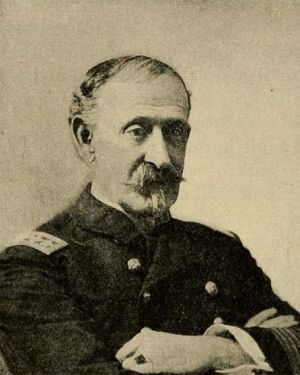
Admiral W. S. Schley.
[Copyright by Pach Brothers, New York.]
685. The President’s Chief Advisers.—During his term as successor to President McKinley and throughout his term as elected President, Mr. Roosevelt’s Cabinet underwent many changes, most of which it is needless to specify. The secretaries of the various departments, to whom was added in 1903 a Secretary of Labor and Commerce, formed a competent body of advisers and administrators, but, on the whole, only three strongly impressed themselves upon the country. These were John Hay, who took charge of the Department of State under McKinley and retained it until his own death in July, 1905; Elihu Root, who continued to act as Secretary of War until February, 1904, and then, after a short interval, succeeded Mr. Hay in the Department of State; and William H. Taft, who relinquished the post of first civil governor of the Philippine Islands under American rule to become Secretary of War in place of Mr. Root. Under both secretaries of state the consular service was improved and the influence of America in international affairs was greatly strengthened, especially by Mr. Root’s visit to many of the South American states in 1906. Mr. Taft brought to his post a unique knowledge of the problems of colonial administration, and he was soon recognized by the country as a skillful administrator and a sound and sympathetic adviser of the President in all the phases of the latter’s activity.
686. The Schley Court of Inquiry.—Controversies growing out of the claims of Rear Admirals Sampson and Schley,[304] relative to the battle of Santiago (see § 669, note), led the latter to request a Court of Inquiry, which convened at Washington in September, 1901. After lengthy proceedings, the Court, of which Admiral Dewey was president, brought in a report that partly vindicated and partly condemned Admiral Schley. The latter, whose cause had won great popular favor, appealed to President Roosevelt, but without avail.
687. Political Events of 1902.—Shortly after the accession of the new President the attention of the country was directed to the municipal campaign in Greater New York, which resulted in the victory of a reform ticket supported by Republicans and Independents over the Tammany Hall Democrats. The reform government took office on January 1, 1902, and gave the city, under Seth Low as Mayor, an effective and honest administration; but, unfortunately, it did not prove popular, and Tammany came into power again in 1904.[305] People had been shown, however, that municipal and State reforms could be secured if voters would abandon party lines and act together for the public good, and, as a result, the past few years have witnessed much improvement in local legislation and administration throughout the country. Meanwhile, the Fifty-seventh Congress, which began its first session in December, 1901, accomplished less than was to be expected in view of the large majority possessed by the Republicans. Its comparative inactivity was mainly due to the fact that on the evacuation of Cuba by the American troops (May, 1902) and the setting up of a republican government in the island, it seemed desirable for the United States to aid the weak young country by reducing the tariff duties on Cuban sugar and tobacco. The President’s efforts to secure the needed legislation were blocked for a considerable period by the opposition of the extreme advocates of protection. It proved difficult, also, to obtain adequate legislation for the Philippines, but finally an act was passed providing for their temporary government, and the insurrection in the islands was proclaimed to be at an end. Another subject which occupied Congress was the choice of a route for the proposed interoceanic canal. The Nicaraguan route seemed to be favored, until the Panama Company offered to sell its property and rights for $40,000,000. This offer was finally accepted, and the construction of the Panama Canal authorized, provided a proper title to the route were secured (June, 1902). The Congressional elections in the autumn of 1902 left the Republicans still in control, but with a reduced majority.
688. The Anthracite Coal Strike.—Popular efforts to oppose, through the action of legislatures and courts, oppressive and illegal accumulations of capital in so-called trusts and combinations, and struggles between organized labor and capital, greatly occupied public attention throughout the year 1902. The most conspicuous event in this connection was the strike of the anthracite coal miners in Pennsylvania, which lasted from May to October and caused considerable suffering. The miners, who were led with much intelligence by Mr. John Mitchell, President of the United Mine Workers of America, were willing to submit their claims to arbitration, a fact which secured them much popular sympathy. The mine owners, whose chief spokesman was Mr. George F. Baer, President of the Philadelphia and Reading Railway Company, refused to arbitrate, and attempted to work their property with non-union miners. Rioting followed, and the militia had to be called out; but it was the rise in the price of fuel and the dread of a coal famine during the approaching winter that most alarmed the public and that finally led to a compromise. The situation seemed so threatening that President Roosevelt, acting as chief citizen but not as Executive, called a conference of representatives of the owners and the miners, and urged them for the sake of the country to arbitrate their differences. The owners at first stood out upon their rights,—which were regarded by many persons as doubtful,—but they finally yielded, and a commission of seven arbitrators was appointed by the President. The commission made its report in March, 1903, decreeing certain advances in wages, but forbidding discrimination against non-union men.[306]
689. Events and Legislation of 1903.—During this year a treaty was concluded with Great Britain for the settlement of the dispute between Canada and the United States as to the boundary of Alaska, and a mixed commission was appointed under it, which met in London and rendered a decision almost entirely favorable to the United States. A reciprocity treaty with Newfoundland was also concluded, and, in general, the high reputation won for American diplomacy by Secretary Hay was sustained. A reciprocity treaty with Cuba designed to benefit the planters of the island was, however, defeated, and it was only after an extra session of the Senate and one of the Fifty-eighth Congress that the resistance of the protectionists was overcome, and tardy concessions were made to Cuba.[307] Meanwhile, the Fifty-seventh Congress, before it closed, accomplished more in the way of legislation than might have been expected, in view of the bickerings to which the administration’s Cuban policy had given rise. Bills were passed, among others, which looked to the regulation of trusts, to the creation of a general staff for the army, to the increase of the navy, and to the checking of undesirable immigration. Even more important to the welfare of the country was the firm stand taken by the President in ordering the fullest investigation of gross scandals in the administration of the post office, and in other departments of governmental activity. The year was marked also by numerous important strikes,[308] by many race riots, which were not confined to the South, and by convictions of persons accused of holding negroes in “peonage.”[309]
690. Panama and the Canal.—In June, 1903, the Congress of the republic of Colombia rejected the treaty negotiated between the Colombian commissioner and Secretary Hay, and proposals were made to the United States, looking to Colombian sovereignty over the zone of the contemplated canal. These proposals were rejected, and in their anger at the situation thus created, the inhabitants of Panama revolted from Colombia and set up an independent republic. This was at once recognized by President Roosevelt, and a new treaty was concluded with it. Though these steps were regarded by the Colombians, and even by some Americans, as high-handed and contrary to precedent, they were extenuated by the importance of the political and commercial interests involved and by the necessity of safeguarding the United States from intrigues designed to secure a heavy payment for all concessions. Fortunately the revolution at Panama led to no serious disturbances either in its inception or in its consequences. The presence of American battleships prevented Colombia from landing troops to recover the seceded state, and the efforts made by the Colombian special envoy to induce the government at Washington to abandon Panama to its fate were fruitless. In February, 1904, the new treaty with Panama was ratified by the United States Senate. Shortly afterward a decision in a French court entirely cleared the title of the Panama Canal Company to dispose of its property and rights to the United States, and about the same time the commissioners for the construction of the canal were appointed, and preliminary work was begun.[310]
691. Campaign of 1904.—Although the first session of the Fifty-eighth Congress was not devoid of interest or unproductive of important legislation, public attention was mainly centered throughout 1904, so far as concerned politics, upon the selection of Presidential candidates and upon the subsequent campaign. Although President Roosevelt had alienated some of the important Republican politicians and had caused himself to be dreaded by many financiers, capitalists, and business men, opposition to his nomination could not be concentrated, and the death of Senator Hanna, of Ohio, left him without a possible rival. His personal popularity throughout the entire country, the general prosperity of the people, and the inability of the Democrats to find any large, striking issue upon which to appeal to the voters, rendered the candidacy of the President very strong. On June 23 he was therefore nominated unanimously by the Republican Convention, which met at Chicago, and Senator Charles W. Fairbanks of Indiana was unanimously nominated for Vice President. The Democratic Convention met at St. Louis, and on July 9 nominated for President, on the first ballot, Judge Alton B. Parker of New York. Ex-Senator Henry G. Davis, an octogenarian of West Virginia, was nominated for Vice President. The nomination of Judge Parker,[311] whose only serious competitor was Mr. William R. Hearst, the millionaire proprietor of several newspapers, meant that Mr. Bryan and the more radical members of the party had retired into the background in order to give the more conservative Democrats of the East and South a chance to show what they could do toward reorganizing the party and leading it to victory. The latter made it clear that they accepted the gold standard, but in the campaign that followed they received but lukewarm support from the more radical elements of the party, and Mr. Roosevelt was elected in November by the largest popular majority in our history. In the Electoral College he had three hundred and thirty-nine votes, including those of West Virginia and Missouri, against Judge Parker’s one hundred and forty; in other words, the Democrats had lost every section save the South, and had not entirely maintained themselves there. Fewer ballots, however, had been cast than was the case in 1900, a proof of apathy on the part of many citizens. In fact, the campaign of 1904 was a remarkably dull one, the only excitement occurring toward the close when charges were made regarding the raising of campaign funds. Immediately after his election, Mr. Roosevelt announced that he would not accept a renomination for President. As might have been expected from the general satisfaction of the country with Mr. Roosevelt’s administration, both houses of Congress remained strongly Republican.
692. Events of 1905: The Treaty of Portsmouth.—Early in the year the administration endeavored to effect a treaty with the disorganized republic of San Domingo by which the United States should take charge of the Dominican custom-houses and apply a considerable portion of the revenues thereof to the payment of the debts of the small republic. Much opposition was manifested in the Senate, and the calling of an extra session of that body did not secure the passage of the treaty.[312] About the same time there was friction with Venezuela, owing to the sequestration of the lands of the American Asphalt Company. In Congress, the main subject of discussion was the regulation of railroad rates, but nothing was accomplished in the matter. In the sphere of State legislation and administration, interest was chiefly centered in the investigation into the affairs of some of the larger life insurance companies and in the attacks made upon monopolies. In the course of the inquiries conducted by the New York investigating commission it was shown, not only that there was gross waste in the management of the business of the chief insurance companies, but that they spent money to influence legislation, and made large contributions to the national parties for campaign purposes.[313] In the war against the trusts, the special objects of attack were the Standard Oil Company and the so-called Beef Trust. In municipal politics the most interesting situation was created by the fight between Mayor Weaver of Philadelphia and the ring of Republican politicians in that city over what was generally regarded as a corrupt lease of the city gas plant. The lease was defeated, and some rather spasmodic victories were won for the cause of reform. In New York City Mayor McClellan was reëlected by a small plurality over W. R. Hearst, the Municipal Ownership candidate, who claimed that extensive frauds by Tammany deprived him of victory. On the whole, however, the most striking event of the year was the signing of the Treaty of Peace between Russia and Japan, which took place on September 5, at the Navy Yard at Portsmouth, New Hampshire. President Roosevelt, believing that the time had come for the bloody war between the two powers to cease, and feeling assured of the support of other governments, sent notes to the respective heads of the two warring powers, urging that they should open negotiations with each other. His suggestions bore fruit at once; the envoys were introduced to one another by the President, whose interest in the success of the negotiations undoubtedly contributed to the final accommodation; the treaty was signed and ratified; and the world was at peace. No other event connected with his administrations has reflected more credit upon the President or has given clearer proof of the growth of American prestige throughout the world.[314]
693. Legislation of 1906.—The first session of the Fifty-ninth Congress was marked by great opposition to the President and his policies from members of his own party. This opposition was specially bitter over the railroad rate act, which finally, however, became a law. Questions of personal veracity were raised, and Congress failed to pass such excellent bills as that designed to relieve the inhabitants of the Philippines from heavy tariff duties on articles imported into the United States. But the President retained the confidence of the people, and secured some important legislation—in particular, the meat inspection law, which was passed in consequence of disclosures made in a popular novel concerning the bad conditions prevailing in the Chicago meat-packing establishments. A “Pure Food Law,” looking to the protection of the consumers of foods, drugs, and liquors, was also passed, as well as a bill providing for the admission of Oklahoma and Indian Territory as one state under the former name, and for the joint admission of Arizona and New Mexico on the condition that each territory should vote separately in favor of such joint admission.[315] Other meritorious legislation was also enacted—for example, a stricter naturalization law.
694. The San Francisco Earthquake.—The most terrible catastrophe of recent years, save the Sicilian and Calabrian earthquake of 1908, took place on April 18, 1906, when a destructive earthquake occurred in California, which inflicted great damage to property and cost hundreds of lives. The chief loss fell upon San Francisco, where the earthquake was followed by a fire which could not be put out for several days. About 200,000 persons were left homeless. The magnitude of the disaster deeply impressed the rest of the country and the world, with the result that assistance was conveyed to the stricken region with great promptness and on a large scale. This sympathy was succeeded by widespread admiration for the courage and energy with which the citizens of San Francisco at once set to work to construct upon the ruins of the old a new city which in solidity and beauty should measurably realize their ideals. Unfortunately, their efforts were soon impeded by labor troubles, and the city was disgraced by grave municipal scandals.
695. Intervention in Cuba.—In August, 1906, a revolution broke out in Cuba against the Palma government, and in September President Palma requested the United States to intervene. Sincerely wishing the little republic to preserve its autonomy, President Roosevelt hesitated to send forces, but after an investigation conducted by Secretary Taft and acting Secretary of State Bacon, and after the resignation of the Cuban President and Vice President, it became clear that there was such friction between the political factions of the island that peace could be secured only through the exercise of force by the United States. Late in September, Secretary Taft issued a proclamation which placed Cuba temporarily under American control and an adequate force was landed. The action was favorably received by Cubans of all shades of opinion, and the island has since remained quiet under the provisional governorship of Charles E. Magoon. Many of the richer planters, and not a few citizens of this country, favor the annexation of Cuba to the United States; but the movement in this direction can scarcely as yet be said to be strong, and it is clear that hitherto the policy of the greater toward the weaker republic has been generous and unselfish, save in the matter of tariff reductions. (See §§ 687, 689.)
696. Race Troubles: Atlanta and Brownsville Riots.—During recent years, friction between whites and blacks seems to have been growing more intense, not only in the South, but in the North and West, and lynchings and riots have been disgracefully frequent, the latest instance of lawlessness on a large scale having occurred at Springfield, Illinois, in August, 1908. There has also been much race friction between Americans and Japanese on the Pacific Coast. In Georgia and in Texas, two particularly regrettable outbursts occurred in 1906. In September, the usual occasion of such riots, combined with the bad effects of a violent political campaign, lashed many of the inhabitants of Atlanta into a fury, which spent itself on the negroes wherever they could be found, regardless of their innocence or criminality. Several persons were killed, and the militia had to be called out. Later, the better elements of the city, white and black, endeavored to develop kinder feelings between the races and greater respect for the law. The month before there had been a shooting affray at Brownsville, Texas, between negro soldiers stationed at the fort there and the inhabitants of the town. In answer to protests made to him, and on the failure of all his efforts to discover the guilty soldiers, President Roosevelt, in November, ordered that the entire body of negro troops involved in suspicion should be dismissed from the service in disgrace. This action was both applauded and condemned. It led to inconclusive investigations and to much discontent among the negroes and their friends.
697. Elections of 1906.—The election in November resulted in a victory for the Republicans, but their majority in Congress was materially reduced. Several State elections attracted attention, but public interest was mainly centered upon the contest for the governorship of New York between the Republican candidate, Mr. Charles E. Hughes, who had won a national reputation by his skillful conduct of the investigation of the great insurance companies (see § 692), and the Democratic candidate, Mr. W. R. Hearst, who had been a competitor of Judge Parker’s for the Presidential nomination (see § 691), and had so nearly defeated Mr. McClellan for the mayoralty of New York City (see § 692). Mr. Hearst was also the candidate of the Independence League, which was generally understood to be a party mainly controlled by him. His securing the Democratic nomination alienated many Democrats, and led to his defeat, but that the election was a personal triumph for Mr. Hughes was shown by the election of the Democratic State ticket to all the offices except the governorship. Mr. Hearst subsequently withdrew from the Democratic party and carried the Independence League into national politics.
698. The Panic of 1907.—Although numerous matters, foreign and domestic,[316] made the twelvemonth that followed the elections of 1906 interesting to the contemporary observer of public affairs, it seems clear that to the future student one event of the year will overshadow all others—the financial crisis of the autumn. It began in October with the failure of a New York trust company, and for some weeks the stringency of the money market was acute, particularly in the business centers of the East. Many private fortunes, especially of those engaged in any form of speculation, were impaired, and industry was greatly checked, with the result that thousands of men were thrown out of employment and that immigration from Europe showed a decided falling off. In some quarters there was a disposition to attribute the panic to the President’s policy of subjecting the methods of the railroads and trusts to strict examination, and of insisting that they should comply in every respect with the statutes which had been enacted to control their activities; but more impartial students regarded the catastrophe as the natural consequence of the strain to which capital had been subjected for some years during a period of speculation and industrial inflation. Credit had been strained in America and abroad, and defects in the system of currency had created among business men a feeling of insecurity and uncertainty which was probably more accentuated by the talk than by the actions of the Executive. His speeches, perhaps, had something to do with occasioning the crisis, but it was an inevitable event and, on the whole, a salutary one. It taught the public that no country, however rich and energetic, can defy with impunity the principles of honest and conservative financiering, that all sections and nations are so closely bound that one cannot suffer without affecting the rest, and that the part an administration can take, whether in precipitating or in alleviating such a crisis, is unimportant in comparison with the actions of financiers, investors, and business men in the aggregate.
699. Events and Legislation of 1908.—One of the most spectacular events of the year was the cruise of the Atlantic fleet in the Pacific Ocean. The voyage was made via Cape Horn, and the fleet was received with great enthusiasm, not only by the people of the Pacific Coast, but also in New Zealand, Australia, and Japan. As a display of naval power and efficiency, the cruise was a success, and its political effects seem to have justified its inception, especially as the welcome given our sailors in Japan did much to show that there was no immediate cause for friction with that country. Less spectacular, but not less important, was the ratification of numerous arbitration treaties, including one with Japan, and of eleven Hague conventions relating to the conduct of war. A conference of the governors of the States met at Washington in May, on the call of President Roosevelt, and discussed the best methods of conserving the natural resources, the forests and waterways of the country. It was generally regarded as a forward step, and it led to the appointment of a national commission charged with this important matter. There was a remarkable wave of activity among the advocates of legislation against the sale of intoxicating liquors, leading, especially in the South, to the adoption of prohibition and local option laws. The first session of the Sixtieth Congress passed laws in the interest of government employees injured in the performance of duty, and similar measures, and, finally, after much debate and filibustering, a compromise Currency Bill, known as the Vreeland-Aldrich Bill. One of the provisions of this was the establishment of a commission of senators and representatives to consider the monetary system and the banking laws of the country. The Ways and Means Committee of the House was authorized to hold recess sittings and to hear testimony with regard to the need of revising the tariff. Late in the year, Mr. Andrew Carnegie, the famous millionaire steel manufacturer, created a sensation by declaring before the committee his belief that the industry in which he was an expert needed no protection whatsoever.
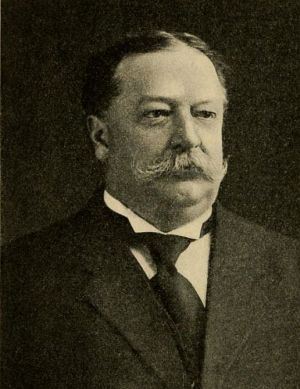
William H. Taft.
700. The Election of 1908.—The Republican Convention met in Chicago in June, and on the first ballot nominated for President, Secretary William H. Taft,[317] of Ohio, for whose candidacy the administration had exerted all its influence. Representative James S. Sherman, of New York, was nominated for Vice President. The Convention in its plank with regard to the issuing of writs of injunction[318] by the Federal Courts in cases involving labor disputes failed to satisfy some of the labor leaders, who subsequently supported the Democratic party. The convention of the latter party met in Denver in July and nominated Mr. W. J. Bryan on the first ballot. John W. Kern of Indiana was nominated for Vice President. The Democratic platform was more specific than the Republican on tariff reduction, railway regulation, and anti-monopoly legislation; but it did not secure enthusiastic support, especially from convinced tariff reformers, and its proposal of the creation of a fund for securing depositors in insolvent national banks was not regarded with favor in conservative circles. The minor parties also made nominations, and expected to play a larger part in the election than they succeeded in doing. On the whole, the campaign was spiritless, despite the regrettable sensation caused by the production of letters associating the names of several public men with the Standard Oil Company. It was soon apparent that Mr. Taft would receive the solid support of the Eastern States, and that, while Mr. Bryan would probably reduce the Republican vote in the West, he would not be strong enough to carry many States. In the election on November 3, 1908, Mr. Taft secured three hundred and twenty-one electoral votes, including those of Missouri and West Virginia; Mr. Bryan one hundred and sixty-two, including those of Nebraska, Colorado, and Nevada, and six of the eight votes of Maryland. Judge Taft defeated Mr. Bryan by about 1,250,000 votes, but the Democratic candidate himself surpassed by even more than this the vote received by Judge Parker in 1904. The chief parties made gains, and that there was considerable independent voting was proved by the election of Democratic governors in Ohio, Minnesota, and Indiana. The Republicans were still left with a comfortable majority in Congress.
701. The Country at the Close of 1908.—Some revival of business has been noted since the election, and the country has settled down to await quietly the beginning of the new administration, with little expectation that Congress, which has shown itself to be greatly exasperated with the President, will accomplish much besides routine business. An entente arranged by our Department of State with the Japanese authorities has dissipated much of the popular alarm with respect to the sinister intentions of Japan toward American interests in the Pacific. Many fourth-class postmasters in the North and West have been brought by President Roosevelt under civil service rules—an action which cannot fail to lessen the power of the political bosses. The government has maintained a very calm attitude toward Holland and Venezuela, the relations of which have been strained, and measures have been taken to secure the quiet and prompt withdrawal of American troops from Cuba. The chances of a real revision of the tariff seem to have increased. An important decision against prominent labor leaders, who had flouted an injunction of a court, has rendered it likely that the law with regard to boycotts will be more clearly enunciated and understood in the future, and that the respective rights of capital, labor, and the general public will be more thoroughly safeguarded. Perhaps no better illustration of the strength and essential soundness of the country can be pointed to than the generosity and promptitude with which America has responded to the appeals in behalf of the sufferers in the Calabrian earthquake of December, 1908.
References.—Wheeler, The Santiago Campaign (1898); Roosevelt, The Rough Riders (1899); H. T. Peck, Twenty Years of the Republic, 1885–1905 (1906); year-books and other manuals of information, and magazines of the period, particularly The Political Science Quarterly in its “Record of Political Events.”
|
The American squadron, with Commodore Sampson in command, had long been watching the mouth of the harbor, day and night. On the morning of July 3, Sampson started for a consultation with Shafter, who was some miles east of the mouth of the bay. Before going he had left specific directions as to methods of action in case of Cervera’s appearance. Sampson was some miles away when the approach of the Spanish fleet was detected. Though he returned at once, he reached his fleet only at the close of the engagement, in which Commodore Schley (§ 685) was the highest officer taking active part. |
|
The bill for putting the reciprocity convention into effect was finally passed in December, 1903; that is, at the beginning of the first session of the Fifty-eighth Congress. A treaty concluded by Secretary Hay and the Commissioner of the republic of Colombia for the purpose of securing concessions necessary to the inception of the Isthmian Canal was ratified by the Senate only after an extra session of that body had been called in March, 1903. (See § 690.) |
|
There were also many strikes in 1904, the chief of which was that of the Colorado coal mines. Much disorder was created, and the Cripple Creek region had to be placed under martial law. |
|
Representatives of the United States sat, without voting, in the international conference on Moroccan affairs held in January, 1906, at Algeciras, Spain. |
|
An injunction is “a judicial process or order requiring the person to whom it is directed to do or to refrain from doing a particular thing.”—Century Dictionary. |
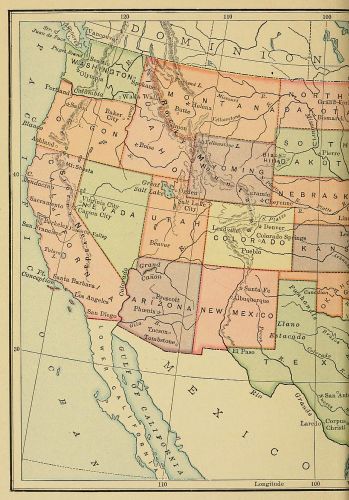
United States, 1909
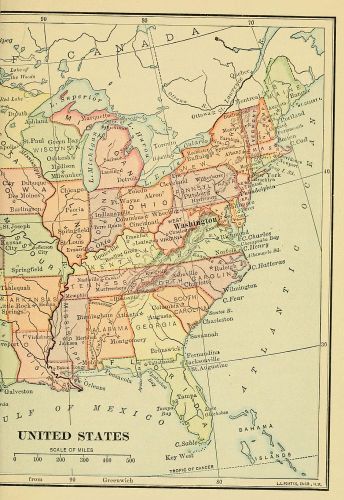
United States, 1909
702. The Industrial Period.—While it is always difficult for people to understand thoroughly the characteristics of their own age, it seems almost certain that the epoch of American history which begins with the readmission of the Southern states to the Union in 1870, and ends with the Spanish and Philippine wars in 1898–1901, will be known by some such name as the “Industrial Age.” As we have just seen, many interesting events occurred and many prominent men figured in it; but these are overshadowed by the enormous development of manufactures, trade, commerce, and farming,—that is to say, by the stupendous results that have followed the application of the nation’s mind and energy to almost every department of human industry.
703. Growth of Population.—The census of 1870 was inaccurate with regard to the population of the South. The corrected figures give a total of nearly forty million inhabitants (39,800,000) to the entire country. During the decade 1860–1870, no less than seven new territories were organized, showing a great gain of population in the far West. There was also a very considerable development of urban populations, New York City standing just below the million mark, Philadelphia nearing seven hundred thousand, and Chicago and St. Louis struggling for commercial supremacy in the West, the former city approaching three hundred thousand inhabitants. Ten years later, the population of the Union was 50,155,178. Colorado was the only new state admitted during the decade, but Florida, Texas, and the far West were being rapidly settled. The growth of the cities was not relatively very great, but New York showed, in 1880, upward of one million two hundred thousand inhabitants. By 1890 the population of the country had reached 62,622,250, six new states, all Western,—Idaho, Montana, North Dakota, South Dakota, Washington, and Wyoming,—having been admitted. The organization of Oklahoma as a territory and the admission of Utah as a state (1896) made the Union proper in 1900 consist of forty-five states, four territories, and one District,—the total population in 1900 being slightly over seventy-six millions. In 1890 New York state and city still led in population, as also by the census of 1900; but Pennsylvania and Illinois proved formidable rivals. The annexation of various suburbs made Greater New York (3,437,202 in 1900) next to London the largest city on the globe. Other cities throughout the Union, especially in the north and central West have also, as a rule, grown remarkably. In 1900 there were seventy cities each containing a population of over fifty-three thousand.
704. Immigration.—The tendency of foreigners to seek our shores, which was very marked during the period 1830–1860, has increased, rather than diminished, since that time. Even in the distracted decade of the Civil War, over two million three hundred thousand immigrants were received; the next decade saw two million eight hundred thousand; while that ending in 1890 saw nearly five million two hundred and fifty thousand. A falling off took place in the ten years ending in 1900, owing to special legislation against pauper immigrants and to other causes; but the total for the decade was still enormous,—3,687,564. The character of the immigrants has somewhat changed,—a fact which is due to the increased influx from Austria, Hungary, Russia and Poland, and Italy, the last-named country leading all others during the decade. Many of the foreigners that have settled among us have made excellent citizens, who have contributed to the national wealth and industry in a way that can hardly be praised too highly. These immigrants have been mainly attracted to the northern half of the country. Many of them have settled in New England, in the great cities, especially New York and Chicago, and in the Northwest. In the South, with the exception of Texas, they form but a very slight part of the population, for the presence of the negroes as competitive laborers has kept them out of what would otherwise be an attractive region.
705. The Negroes.—On the whole, the negroes of the South have progressed since they were freed from slavery. Many of them are taking advantage of the school facilities afforded them, and some remarkable men, like Booker T. Washington, principal of the Tuskegee (Alabama) Institute, prove that the race is capable of great development, especially under the guidance of its own leaders. They appear to be successful as small farmers, and it seems likely that they will do well in certain industrial occupations. Meanwhile, they are being rapidly disfranchised, and it is hoped that the friction between them and the whites is subsiding. This friction is still kept up, however, by crimes and consequent lynchings which shock the better elements of the population everywhere.
706. Industrial Greatness.—The industrial greatness of the United States cannot easily be described. A few statistics may be cited, however, to give a faint idea of what wonderful progress has been made. In the year ending June, 1901, we exported merchandise valued at the enormous sum of nearly $1,500,000,000—the largest figures in our history. After deducting imports and allowing for the export and import of gold and silver, the trade balance for the year was $670,000,000. Other statistics relating to banking, insurance, agriculture, shipbuilding, etc., help us to realize the power of the nation. The number of ships of all sorts built in 1901 was fifteen hundred and eighty, nearly double the number built in 1897. The tonnage increase of 1901 over 1900 was nearly ninety thousand. It is estimated that in 1901 there were forty-four shipyards, of $68,000,000 capital, employing forty-six thousand men. Railroad statistics are much more striking, while those compiled in connection with the great Steel Trust, and those covering the money spent upon our public schools and universities, would alone suffice to prove that we stand practically foremost in wealth and energy among the nations of the world. The total revenue of the general government for the year ending June 30, 1901, was $587,685,338; the total expenditures were $509,967,353. In 1900 no less than 2,105,103,000 bushels of corn and 552,230,000 bushels of wheat were gathered by American farmers. These stupendous figures strain even the most capable imagination. The late eminent statistician, M. G. Mulhall, wrote not long since that he knew nothing to compare with the United States “as regards the physical, mechanical, and intellectual force of nations.” This force is not equally distributed throughout the country, the census of 1900 showing that the Northwest is in many respects the predominant section of the Union. But the Middle states and New England still retain their lead in matters of culture, and are very progressive, while the Pacific states have developed wonderfully, as also the South, whose future is full of promise.
707. Social Characteristics.—As a matter of course, this great growth of wealth has affected in a marked way the character of the people of the United States. Never before has the American been so enterprising and so anxious to prosper in life. His interest in his private affairs is so great that he often neglects to work for good government, and so allows corrupt men to make fortunes out of the public treasury. A rich leisure class has been developed, whose manners and morals are not those of the well-to-do Americans of a hundred, or even fifty, years ago. Extremes of wealth and poverty are found confronting one another in the great cities, and the wealthy corporations are often accused of controlling legislation in their own interests. Nevertheless, it seems clear that the masses of the people live wholesome lives, and that the public conscience of America will not tolerate abuses when once these are made plain. The churches are very active, and no other people have ever had better school and library facilities or made fuller use of them. No other nation has ever shown such interest in organized charities or in reforms of various sorts, such as those directed against the evils of easy divorce and of intemperance. In morals, as well as in wealth and industry, the century just closed marks a great advance for America.
708. Education and Literature.—In general culture, also, a distinct advance has been made. There has been an educational renaissance. The great modern university has grown up out of the old-fashioned college; yet the college, whether in town or country, still continues to do a useful work. Public schools have increased in greater proportion than population, and are equipped and conducted on improved plans. There are also new agencies for reaching people who cannot go to school or college. Chautauqua and its kindred summer schools, university extension courses, lecture lyceums, and literary clubs are doing very valuable educational work. Many of the leading newspapers devote a portion of their increased space to the same purpose. The popular magazines have steadily improved and have been important agencies in making the American people the best educated and most wideawake in the world. There has also been a great increase in the number of books produced and in the cheapness with which classic literature can be secured. In recent years, no American author seems to have equaled in influence or general merit such great writers as Cooper, Hawthorne, Emerson, Poe, and Longfellow; but the average of literary talent has risen, and the mass of good poetry, fiction, and especially history and biography, has grown remarkably. Good historical romances have been widely sold; short stories have been made a distinct branch of art; the life of every section and almost every state has been described in one or more good novels. In criticism and scholarship, also, improvement has been shown. Finally, in such authors as “Mark Twain” (Samuel L. Clemens, born in 1835), William Dean Howells (born in 1837), Sidney Lanier (1842–1881), and Charles Dudley Warner (1829–1900), the great writers of the last generation have had worthy successors.
709. Inventions and Science.—An industrial period naturally puts a premium upon everything that ministers to its necessities. The last thirty years have seen many parts of the country knit by a wonderful system of electric street railways and of telephones. Various forms of electric lighting have also been introduced, and it seems impossible to set any limit to the discoveries of science in connection with this mysterious force. Capital has been accumulated by great corporations, known as “trusts,” which occupy gigantic buildings and use larger and more costly machinery than was ever before known. Even private life is affected in manifold ways by recent inventions. Not merely has the cost of manufactured articles been decreased and their numbers vastly increased, but correspondence, modes of locomotion, and other activities have been markedly affected. The typewriter is supplanting the pen, and the bicycle and automobile have made a triumphal entry into the remotest neighborhoods. Better still, there has been an enormous advance in medical science, particularly in surgery; while in engineering and photography, Americans have been notably successful. They have also fairly held their own in pure science, in astronomy and physics, in meteorology and geology. On the other hand, they have cultivated the beautiful as well as the useful arts, and have produced architects and painters and sculptors of whom the civilized world has taken much notice. If, therefore, industrial achievement and territorial expansion seemed to be the most salient features of American history at the close of the nineteenth century, it may nevertheless be believed that an epoch of great literary and artistic achievements awaits the country in the century that has just begun.[319]
In Congress, July 4, 1776.
When, in the course of human events, it becomes necessary for one people to dissolve the political bands which have connected them with another, and to assume, among the powers of the earth, the separate and equal station to which the laws of nature and of nature’s God entitle them, a decent respect to the opinions of mankind requires that they should declare the causes which impel them to the separation.
We hold these truths to be self-evident:—That all men are created equal; that they are endowed by their Creator with certain unalienable rights; that among these are life, liberty, and the pursuit of happiness. That, to secure these rights, governments are instituted among men, deriving their just powers from the consent of the governed; that, whenever any form of government becomes destructive of these ends, it is the right of the people to alter or to abolish it, and to institute a new government, laying its foundation on such principles, and organizing its powers in such form, as to them shall seem most likely to effect their safety and happiness. Prudence, indeed, will dictate, that governments long established should not be changed for light and transient causes; and accordingly all experience hath shown that mankind are more disposed to suffer while evils are sufferable, than to right themselves by abolishing the forms to which they are accustomed. But when a long train of abuses and usurpations, pursuing invariably the same object, evinces a design to reduce them under absolute despotism, it is their right, it is their duty, to throw off such government, and to provide new guards for their future security. Such has been the patient sufferance of these colonies; and such is now the necessity which constrains them to alter their former systems of government. The history of the present King of Great Britain is a history of repeated injuries and usurpations, all having in direct object the establishment of an absolute tyranny over these states. To prove this, let facts be submitted to a candid world.
He has refused his assent to laws the most wholesome and necessary for the public good.
He has forbidden his governors to pass laws of immediate and pressing importance, unless suspended in their operation till his assent should be obtained; and when so suspended, he has utterly neglected to attend to them.
He has refused to pass other laws for the accommodation of large districts of people, unless those people would relinquish the right of representation in the legislature—a right inestimable to them, and formidable to tyrants only.
He has called together legislative bodies at places unusual, uncomfortable, and distant from the depository of their public records, for the sole purpose of fatiguing them into compliance with his measures.
He has dissolved representative houses repeatedly, for opposing, with manly firmness, his invasions on the rights of the people.
He has refused, for a long time after such dissolutions, to cause others to be elected, whereby the legislative powers, incapable of annihilation, have returned to the people at large for their exercise; the State remaining, in the meantime, exposed to all the dangers of invasions from without, and convulsions within.
He has endeavored to prevent the population of these States; for that purpose obstructing the laws for the naturalization of foreigners; refusing to pass others to encourage their migration hither, and raising the conditions of new appropriations of lands.
He has obstructed the administration of justice, by refusing his assent to laws for establishing judiciary powers.
He has made judges dependent on his will alone for the tenure of their offices, and the amount and payment of their salaries.
He has erected a multitude of new offices, and sent hither swarms of officers to harass our people and eat out their substance.
He has kept among us in times of peace, standing armies, without the consent of our Legislatures.
He has affected to render the military independent of, and superior to, the civil power.
He has combined with others to subject us to a jurisdiction foreign to our constitutions, and unacknowledged by our laws; giving his assent to their acts of pretended legislation:
For quartering large bodies of armed troops among us;
For protecting them, by a mock trial, from punishment for any murders which they should commit on the inhabitants of these States;
For cutting off our trade with all parts of the world;
For imposing taxes on us without our consent;
For depriving us, in many cases, of the benefits of trial by jury;
For transporting us beyond seas, to be tried for pretended offenses;
For abolishing the free system of English laws in a neighboring province, establishing therein an arbitrary government, and enlarging its boundaries, so as to render it at once an example and fit instrument for introducing the same absolute rule into these colonies;
For taking away our charters, abolishing our most valuable laws, and altering, fundamentally, the forms of our governments;
For suspending our own Legislatures, and declaring themselves invested with power to legislate for us in all cases whatsoever.
He has abdicated government here, by declaring us out of his protection, and waging war against us.
He has plundered our seas, ravaged our coasts, burned our towns, and destroyed the lives of our people.
He is at this time transporting large armies of foreign mercenaries to complete the works of death, desolation and tyranny, already begun with circumstances of cruelty and perfidy scarcely paralleled in the most barbarous ages, and totally unworthy the head of a civilized nation.
He has constrained our fellow-citizens, taken captive on the high seas, to bear arms against their country, to become the executioners of their friends and brethren, or to fall themselves by their hands.
He has excited domestic insurrection among us, and has endeavored to bring on the inhabitants of our frontiers the merciless Indian savages, whose known rule of warfare is an undistinguished destruction of all ages, sexes, and conditions.
In every stage of these oppressions we have petitioned for redress in the most humble terms; our repeated petitions have been answered only by repeated injury. A prince whose character is thus marked by every act which may define a tyrant, is unfit to be the ruler of a free people.
Nor have we been wanting in our attentions to our British brethren. We have warned them, from time to time, of attempts by their legislature to extend an unwarrantable jurisdiction over us. We have reminded them of the circumstances of our emigration and settlement here. We have appealed to their native justice and magnanimity; and we have conjured them, by the ties of our common kindred, to disavow these usurpations, which would inevitably interrupt our connections and correspondence. They, too, have been deaf to the voice of justice and of consanguinity. We must, therefore, acquiesce in the necessity which denounces our separation, and hold them, as we hold the rest of mankind, enemies in war, in peace friends.
We, therefore, the Representatives of the United States of America, in General Congress assembled, appealing to the Supreme Judge of the world for the rectitude of our intentions, do, in the name and by the authority of the good people of these colonies, solemnly publish and declare, That these united colonies are, and of right ought to be, free and independent states; that they are absolved from all allegiance to the British crown, and that all political connection between them and the state of Great Britain is, and ought to be, totally dissolved; and that, as free and independent states, they have full power to levy war, conclude peace, contract alliances, establish commerce, and to do all other acts and things which independent states may of right do. And, for the support of this declaration, with a firm reliance on the protection of Divine Providence, we mutually pledge to each other our lives, our fortunes, and our sacred honor.
The foregoing Declaration was, by order of Congress, engrossed, and signed by the following members:—
JOHN HANCOCK.
| NEW HAMPSHIRE. | NEW JERSEY. | Charles Carroll, |
| Josiah Bartlett, | Richard Stockton, | of Carrollton. |
| William Whipple, | John Witherspoon, | |
| Matthew Thornton. | Francis Hopkinson, | VIRGINIA. |
| John Hart, | George Wythe, | |
| MASSACHUSETTS BAY. | Abraham Clark. | Richard Henry Lee, |
| Samuel Adams, | Thomas Jefferson, | |
| John Adams, | PENNSYLVANIA. | Benjamin Harrison, |
| Robert Treat Paine, | Robert Morris, | Thomas Nelson, Jr., |
| Elbridge Gerry. | Benjamin Rush, | Francis Lightfoot Lee, |
| Benjamin Franklin, | Carter Braxton. | |
| RHODE ISLAND. | John Morton, | |
| Stephen Hopkins, | George Clymer, | NORTH CAROLINA. |
| William Ellery. | James Smith, | William Hooper, |
| George Taylor, | Joseph Hewes, | |
| CONNECTICUT. | James Wilson, | John Penn. |
| Roger Sherman, | George Ross. | |
| Samuel Huntington, | SOUTH CAROLINA. | |
| William Williams, | DELAWARE. | Edward Rutledge, |
| Oliver Wolcott. | Cæsar Rodney, | Thomas Heyward, Jr., |
| George Read, | Thomas Lynch, Jr., | |
| NEW YORK. | Thomas M’Kean. | Arthur Middleton. |
| William Floyd, | ||
| Philip Livingston, | MARYLAND. | GEORGIA. |
| Francis Lewis, | Samuel Chase, | Button Gwinnett, |
| Lewis Morris. | William Paca, | Lyman Hall, |
| Thomas Stone, | George Walton. |
Resolved, That copies of the Declaration be sent to the several assemblies, conventions, and committees, or councils of safety, and to the several commanding officers of the continental troops; that it be proclaimed in each of the United States, and at the head of the army.
We, the people of the United States, in order to form a more perfect union, establish justice, insure domestic tranquillity, provide for the common defense, promote the general welfare, and secure the blessings of liberty to ourselves and our posterity, do ordain and establish this Constitution for the United States of America.
All legislative powers herein granted shall be vested in a Congress of the United States, which shall consist of a Senate and a House of Representatives.
1. The House of Representatives shall be composed of members chosen every second year by the people of the several States; and the electors in each State shall have the qualifications requisite for electors of the most numerous branch of the State Legislature.
2. No person shall be a representative who shall not have attained to the age of twenty-five years, and been seven years a citizen of the United States, and who shall not, when elected, be an inhabitant of that State in which he shall be chosen.
3. Representatives and direct taxes shall be apportioned among the several States which may be included within this Union, according to their respective numbers, which shall be determined by adding to the whole number of free persons, including those bound to service for a term of years, and excluding Indians not taxed, three-fifths of all other persons. The actual enumeration shall be made within three years after the first meeting of the Congress of the United States, and within every subsequent term of ten years, in such manner as they shall by law direct. The number of representatives shall not exceed one for every thirty thousand, but each State shall have at least one representative; and until such enumeration shall be made, the State of New Hampshire shall be entitled to choose three, Massachusetts eight, Rhode Island and Providence Plantations one, Connecticut five, New York six, New Jersey four, Pennsylvania eight, Delaware one, Maryland six, Virginia ten, North Carolina five, South Carolina five, and Georgia three.
4. When vacancies happen in the representations from any State, the executive authority thereof shall issue writs of election to fill such vacancies.
5. The House of Representatives shall choose their speaker and other officers, and shall have the sole power of impeachment.
1. The Senate of the United States shall be composed of two senators from each State, chosen by the Legislature thereof for six years, and each Senator shall have one vote.
2. Immediately after they shall be assembled in consequence of the first election, they shall be divided, as equally as may be, into three classes. The seats of the senators of the first class shall be vacated at the expiration of the second year, of the second class at the expiration of the fourth year, and of the third class at the expiration of the sixth year, so that one-third may be chosen every second year; and if vacancies happen, by resignation or otherwise, during the recess of the Legislature of any State, the executive thereof may make temporary appointments until the next meeting of the Legislature, which shall then fill such vacancies.
3. No person shall be a senator who shall not have attained to the age of thirty years, and been nine years a citizen of the United States, and who shall not, when elected, be an inhabitant of that State for which he shall be chosen.
4. The Vice-President of the United States shall be President of the Senate, but shall have no vote, unless they be equally divided.
5. The Senate shall choose their officers, and also a president pro tempore, in the absence of the Vice-President, or when he shall exercise the office of President of the United States.
6. The Senate shall have the sole power to try all impeachments. When sitting for that purpose, they shall be on oath or affirmation. When the President of the United States is tried, the chief justice shall preside; and no person shall be convicted without the concurrence of two-thirds of the members present.
7. Judgment in case of impeachment shall not extend farther than to removal from office, and disqualification to hold and enjoy any office of honor, trust, or profit under the United States; but the party convicted shall, nevertheless, be liable and subject to indictment, trial, judgment, and punishment according to law.
1. The times, places, and manner of holding elections for senators and representatives shall be prescribed in each State by the Legislature thereof; but the Congress may at any time, by law, make or alter such regulations, except as to the place of choosing senators.
2. The Congress shall assemble at least once in every year, and such meeting shall be on the first Monday in December, unless they shall by law appoint a different day.
1. Each house shall be the judge of the elections, returns, and qualifications of its own members, and a majority of each shall constitute a quorum to do business; but a smaller number may adjourn from day to day, and may be authorized to compel the attendance of absent members, in such manner and under such penalties as each house may provide.
2. Each house may determine the rules of its proceedings, punish its members for disorderly behavior, and, with the concurrence of two-thirds, expel a member.
3. Each house shall keep a journal of its proceedings, and from time to time publish the same, excepting such parts as may in their judgment require secrecy; and the yeas and nays of the members of either house, on any question, shall, at the desire of one-fifth of those present, be entered on the journal.
4. Neither house during the session of Congress shall, without the consent of the other, adjourn for more than three days, nor to any other place than that in which the two houses shall be sitting.
1. The senators and representatives shall receive a compensation for their services, to be ascertained by law, and paid out of the treasury of the United States. They shall in all cases, except treason, felony, breach of the peace, be privileged from arrest during their attendance at the session of their respective houses, and in going to or returning from the same; and for any speech or debate in either house, they shall not be questioned in any other place.
2. No senator or representative shall, during the time for which he was elected, be appointed to any civil office under the authority of the United States, which shall have been created, or the emoluments whereof shall have been increased, during such time; and no person holding any office under the United States shall be a member of either house during his continuance in office.
1. All bills for raising revenue shall originate in the House of Representatives; but the Senate may propose or concur with amendments, as on other bills.
2. Every bill which shall have passed the House of Representatives and the Senate shall, before it become a law, be presented to the President of the United States; if he approve, he shall sign it; but if not, he shall return it, with his objections, to that house in which it shall have originated, who shall enter the objections at large on their journal, and proceed to reconsider it. If, after such reconsideration, two-thirds of that house shall agree to pass the bill, it shall be sent, together with the objections, to the other house, by which it shall likewise be reconsidered, and if approved by two-thirds of that house, it shall become a law. But in all such cases the votes of both houses shall be determined by yeas and nays, and the names of the persons voting for and against the bill shall be entered on the journal of each house respectively. If any bill shall not be returned by the President within ten days (Sundays excepted) after it shall have been presented to him, the same shall be a law in like manner as if he had signed it, unless the Congress by their adjournment prevent its return, in which case it shall not be a law.
3. Every order, resolution, or vote to which the concurrence of the Senate and House of Representatives may be necessary (except on a question of adjournment) shall be presented to the President of the United States; and before the same shall take effect, shall be approved by him, or, being disapproved by him, shall be repassed by two-thirds of the Senate and House of Representatives, according to the rules and limitations prescribed in the case of a bill.
The Congress shall have power:
1. To lay and collect taxes, duties, imposts, and excises, to pay the debts and provide for the common defense and general welfare of the United States; but all duties, imposts, and excises shall be uniform throughout the United States;
2. To borrow money on the credit of the United States;
3. To regulate commerce with foreign nations, and among the several States, and with the Indian tribes;
4. To establish a uniform rule of naturalization, and uniform laws on the subject of bankruptcies throughout the United States;
5. To coin money, regulate the value thereof and of foreign coin, and fix the standard of weights and measures;
6. To provide for the punishment of counterfeiting the securities and current coin of the United States;
7. To establish post-offices and post-roads;
8. To promote the progress of science and useful arts, by securing for limited times to authors and inventors the exclusive right to their respective writings and discoveries;
9. To constitute tribunals inferior to the Supreme Court;
10. To define and punish felonies committed on the high seas, and offenses against the law of nations;
11. To declare war, grant letters of marque and reprisal, and make rules concerning captures on land and water;
12. To raise and support armies; but no appropriation of money to that use shall be for a longer term than two years;
13. To provide and maintain a navy;
14. To make rules for the government and regulation of land and naval forces;
15. To provide for calling forth the militia to execute the laws of the Union, suppress insurrections, and repel invasions;
16. To provide for organizing, arming, and disciplining the militia, and for governing such part of them as may be employed in the service of the United States, reserving to the States respectively the appointment of the officers, and the authority of training the militia according to the discipline prescribed by Congress;
17. To exercise exclusive legislation, in all cases whatsoever, over such district (not exceeding ten miles square) as may, by cession of particular states and the acceptance of Congress, become the seat of government of the United States, and to exercise like authority over all places purchased, by the consent of the Legislature of the State in which the same shall be, for the erection of forts, magazines, arsenals, dock-yards, and other needful buildings; and,
18. To make all laws which shall be necessary and proper for carrying into execution the foregoing powers, and all other powers vested by this Constitution in the government of the United States, or in any department or office thereof.
1. The migration or importation of such persons as any of the States now existing shall think proper to admit shall not be prohibited by the Congress prior to the year one thousand eight hundred and eight; but a tax or duty may be imposed on such importation, not exceeding ten dollars for each person.
2. The privilege of the writ of habeas corpus shall not be suspended unless when, in case of rebellion or invasion, the public safety may require it.
3. No bill of attainder, or ex-post-facto law, shall be passed.
4. No capitation or other direct tax shall be laid, unless in proportion to the census or enumeration hereinbefore directed to be taken.
5. No tax or duty shall be laid on articles exported from any State.
6. No preference shall be given by any regulation of commerce or revenue to the ports of one State over those of another; nor shall vessels bound to or from one State be obliged to enter, clear, or pay duties in another.
7. No money shall be drawn from the treasury but in consequence of appropriations made by law; and a regular statement and account of the receipts and expenditures of all public money shall be published from time to time.
8. No title of nobility shall be granted by the United States; and no person holding any office of profit or trust under them shall, without the consent of the Congress, accept of any present, emolument, office, or title of any kind whatever, from any king, prince, or foreign state.
1. No State shall enter into any treaty, alliance, or confederation; grant letters of marque and reprisal; coin money; emit bills of credit; make any thing but gold and silver coin a tender in payment of debts; pass any bill of attainder, ex-post-facto law, or law impairing the obligation of contracts; or grant any title of nobility.
2. No State shall, without the consent of the Congress, lay any imposts or duties on imports or exports, except what may be absolutely necessary for executing its inspection laws; and the net produce of all duties and imposts laid by any State on imports or exports shall be for the use of the treasury of the United States, and all such laws shall be subject to the revision and control of the Congress.
3. No State shall, without the consent of Congress, lay any duty of tonnage, keep troops or ships of war in times of peace, enter into any agreement or compact with another State or with a foreign power, or engage in war unless actually invaded, or in such imminent danger as will not admit of delays.
1. The executive power shall be vested in a President of the United States of America. He shall hold his office during the term of four years, and, together with the Vice-President, chosen for the same term, be elected as follows:
2. Each State shall appoint, in such manner as the Legislature thereof may direct, a number of electors, equal to the whole number of senators and representatives to which the State may be entitled in the Congress; but no senator or representative, or person holding an office of trust or profit under the United States, shall be appointed an elector.
3. [The electors shall meet in their respective States, and vote by ballot for two persons, of whom one at least shall not be an inhabitant of the same State with themselves. And they shall make a list of all the persons voted for, and of the number of votes for each; which list they shall sign and certify, and transmit, sealed, to the seat of the government of the United States, directed to the President of the Senate. The President of the Senate shall, in the presence of the Senate and House of Representatives, open all the certificates, and the votes shall then be counted. The person having the greatest number of votes shall be the President, if such number be a majority of the whole number of electors appointed; and if there be more than one who have such majority, and have an equal number of votes, then the House of Representatives shall immediately choose by ballot one of them for President; and if no person have a majority, then, from the five highest on the list, the said House shall in like manner choose the President. But in choosing the President, the votes shall be taken by States, the representation from each State having one vote; a quorum for this purpose shall consist of a member or members from two-thirds of the States, and a majority of all the States shall be necessary to a choice. In every case, after the choice of the President, the person having the greatest number of votes of the electors shall be the Vice-President. But if there should remain two or more who have equal votes, the Senate shall choose from them by ballot the Vice-President.][320]
4. The Congress may determine the time of choosing the electors, and the day on which they will give their votes, which day shall be the same throughout the United States.
5. No person except a natural-born citizen, or a citizen of the United States at the time of the adoption of this Constitution, shall be eligible to the office of President; neither shall any person be eligible to that office who shall not have attained to the age of thirty-five years, and been fourteen years a resident within the United States.
6. In case of the removal of the President from office, or of his death, resignation, or inability to discharge the powers and duties of the said office, the same shall devolve on the Vice-President; and the Congress may by law provide for the case of removal, death, resignation, or inability, both of the President and Vice-President, declaring what officer shall then act as President; and such officer shall act accordingly, until the disability be removed or a President shall be elected.
7. The President shall, at stated times, receive for his services a compensation, which shall neither be increased nor diminished during the period for which he shall have been elected, and he shall not receive within that period any other emolument from the United States, or any of them.
8. Before he enter on the execution of his office, he shall take the following oath or affirmation:
“I do solemnly swear (or affirm) that I will faithfully execute the office of President of the United States, and will, to the best of my ability, preserve, protect, and defend the Constitution of the United States.”
1. The President shall be commander-in-chief of the army and navy of the United States, and of the militia of the several States when called into the actual service of the United States; he may require the opinion in writing of the principal officer in each of the executive departments upon any subject relating to the duties of their respective offices; and he shall have power to grant reprieves and pardons for offenses against the United States, except in cases of impeachment.
2. He shall have power, by and with the advice and consent of the Senate, to make treaties, provided two-thirds of the senators present concur; and he shall nominate, and by and with the advice and consent of the Senate, shall appoint ambassadors, other public ministers and consuls, judges of the Supreme Court, and all other officers of the United States, whose appointments are not herein otherwise provided for and which shall be established by law; but the Congress may by law vest the appointment of such inferior officers as they think proper in the President alone, in the courts of law, or in the heads of departments.
3. The President shall have power to fill up all vacancies that may happen during the recess of the Senate, by granting commissions, which shall expire at the end of their next session.
He shall, from time to time, give to the Congress information of the state of the Union, and recommend to their consideration such measures as he shall judge necessary and expedient; he may, on extraordinary occasions, convene both houses, or either of them; and in case of disagreement between them, with respect to the time of adjournment, he may adjourn them to such time as he shall think proper; he shall receive ambassadors and other public ministers; he shall take care that the laws be faithfully executed, and shall commission all the officers of the United States.
The President, Vice-President, and all civil officers of the United States shall be removed from office on impeachment for and conviction of treason, bribery, or other high crimes and misdemeanors.
The judicial power of the United States shall be vested in one Supreme Court, and in such inferior courts as Congress may from time to time ordain and establish. The judges, both of the supreme and inferior courts, shall hold their offices during good behavior; and shall, at stated times, receive for their services a compensation, which shall not be diminished during their continuance in office.
1. The judicial power shall extend to all cases in law and equity arising under this Constitution, the laws of the United States, and treaties made or which shall be made, under their authority; to all cases affecting ambassadors, other public ministers, and consuls; to all cases of admiralty and maritime jurisdiction; to controversies to which the United States shall be a party; to controversies between two or more States; between a State and citizens of another State; between citizens of different States; between citizens of the same State claiming lands under grants of different States; and between a State, or the citizens thereof, and foreign states, citizens, or subjects.[321]
2. In all cases affecting ambassadors, other public ministers, and consuls, and those in which a State shall be a party, the Supreme Court shall have original jurisdiction. In all the other cases before mentioned, the Supreme Court shall have appellate jurisdiction, both as to law and fact, with such exceptions and under such regulations as the Congress shall make.
3. The trial of all crimes, except in cases of impeachment, shall be by jury; and such trial shall be held in the State where the said crimes shall have been committed; but when not committed within any State, the trial shall be at such place or places as the Congress may by law have directed.
1. Treason against the United States shall consist only in levying war against them, or in adhering to their enemies, giving them aid and comfort. No person shall be convicted of treason unless on the testimony of two witnesses to the same overt act, or on confession in open court.
2. The Congress shall have power to declare the punishment of treason; but no attainder of treason shall work corruption of blood, or forfeiture, except during the life of the person attainted.
Full faith and credit shall be given in each State to the public acts, records, and judicial proceedings of every other State. And the Congress may, by general laws, prescribe the manner in which such acts, records, and proceedings shall be proved, and the effect thereof.
1. The citizens of each State shall be entitled to all privileges and immunities of citizens in the several States.
2. A person charged in any State with treason, felony, or other crime, who shall flee from justice and be found in another State, shall, on demand of the executive authority of the State from which he fled, be delivered up, to be removed to the State having jurisdiction of the crime.
3. No person held to service or labor in one State under the laws thereof, escaping into another, shall, in consequence of any law or regulation therein, be discharged from such service or labor, but shall be delivered up on claim of the party to whom such service or labor may be due.
1. New States may be admitted by the Congress into this Union; but no new State shall be formed or erected within the jurisdiction of any other State; nor any State be formed by the junction of two or more States, or parts of States, without the consent of the Legislatures of the States concerned, as well as of the Congress.
2. The Congress shall have power to dispose of, and make all needful rules and regulations respecting, the territory or other property belonging to the United States; and nothing in this Constitution shall be so construed as to prejudice any claims of the United States or of any particular State.
The United States shall guarantee to every State in this Union a republican form of government, and shall protect each of them against invasion; and, on application of the Legislature, or of the executive (when the Legislature cannot be convened), against domestic violence.
The Congress, whenever two-thirds of both Houses shall deem it necessary, shall propose amendments to this Constitution, or, on the application of the Legislatures of two-thirds of the several States, shall call a convention for proposing amendments, which, in either case, shall be valid to all intents and purposes as part of this Constitution, when ratified by the Legislatures of three-fourths of the several States, or by conventions in three-fourths thereof, as the one or the other mode of ratification may be proposed by Congress; provided that no amendment which may be made prior to the year one thousand eight hundred and eight shall in any manner affect the first and fourth clauses in the ninth section of the first Article; and that no State, without its consent, shall be deprived of its equal suffrage in the Senate.
1. All debts contracted and engagements entered into before the adoption of this Constitution shall be as valid against the United States under this Constitution as under the Confederation.
2. This Constitution, and the laws of the United States which shall be made in pursuance thereof, and all treaties made, or which shall be made under the authority of the United States, shall be the supreme law of the land; and the judges in every State shall be bound thereby, anything in the Constitution or laws of any State to the contrary notwithstanding.
3. The senators and representatives before mentioned, and the members of the several State Legislatures, and all executive and judicial officers, both of the United States and of the several States, shall be bound by oath or affirmation to support this Constitution; but no religious test shall ever be required as a qualification to any office or public trust under the United States.
The ratifications of the Conventions of nine States shall be sufficient for the establishment of this Constitution between the States so ratifying the same.
Done in Convention, by the unanimous consent of the States present, the seventeenth day of September, in the year of our Lord one thousand seven hundred and eighty-seven, and of the Independence of the United States of America the twelfth.
Congress shall make no law respecting an establishment of religion, or prohibiting the free exercise thereof; or abridging the freedom of speech, or of the press; or the right of the people peaceably to assemble, and to petition the government for a redress of grievances.
A well-regulated militia being necessary to the security of a free state, the right of the people to keep and bear arms shall not be infringed.
No soldier shall, in time of peace, be quartered in any house, without the consent of the owner, nor in time of war, but in a manner to be prescribed by law.
The right of the people to be secure in their persons, houses, papers, and effects, against unreasonable searches and seizures shall not be violated, and no warrants shall issue but upon probable cause, supported by oath or affirmation, and particularly describing the place to be searched, and the persons or things to be seized.
No person shall be held to answer for a capital, or otherwise infamous crime, unless on a presentment or indictment of a grand jury, except in cases arising in the land or naval forces, or in the militia when in active service in time of war or public danger; nor shall any person be subject for the same offense to be twice put in jeopardy of life or limb; nor shall be compelled, in any criminal case, to be a witness against himself; nor be deprived of life, liberty, or property, without due process of law; nor shall private property be taken for public use without just compensation.
In all criminal prosecutions the accused shall enjoy the right to a speedy and public trial, by an impartial jury of the State and district wherein the crime shall have been committed, which district shall have been previously ascertained by law, and to be informed of the nature and cause of the accusation; to be confronted with the witnesses against him; to have compulsory process for obtaining witnesses in his favor; and to have the assistance of counsel for his defense.
In suits at common law, where the value in controversy shall exceed twenty dollars, the right of trial by jury shall be preserved; and no fact tried by a jury shall be otherwise re-examined in any court of the United States than according to the rules of the common law.
Excessive bail shall not be required, nor excessive fines imposed, nor cruel and unusual punishment inflicted.
The enumeration in the Constitution of certain rights shall not be construed to deny or disparage others retained by the people.
The powers not granted to the United States by the Constitution, nor prohibited by it to the States, are reserved to the States respectively or to the people.
The judicial power of the United States shall not be construed to extend to any suit in law or equity, commenced or prosecuted against one of the United States by citizens of another State, or by citizens or subjects of any foreign State.
1. The electors shall meet in their respective States, and vote by ballot for President and Vice-President, one of whom, at least, shall not be an inhabitant of the same State with themselves; they shall name in their ballots the person voted for as President, and in distinct ballots the person voted for as Vice-President, and they shall make distinct lists of all persons voted for as President, and of all persons voted for as Vice-President, and of the number of votes for each, which lists they shall sign and certify, and transmit sealed to the seat of government of the United States, directed to the President of the Senate; the President of the Senate shall, in the presence of the Senate and House of Representatives, open all the certificates, and the votes shall then be counted; the person having the greatest number of votes for President shall be the President, if such number be a majority of the whole number of electors appointed; and if no person have such majority, then from the persons having the highest numbers, not exceeding three, on the list of those voted for as President, the House of Representatives shall choose immediately by ballot the President. But in choosing the President, the votes shall be taken by States, the representation from each State having one vote; a quorum for this purpose shall consist of a member or members from two-thirds of the States, and a majority of all the States shall be necessary to a choice. And if the House of Representatives shall not choose a President, whenever the right of choice shall devolve upon them, before the fourth day of March next following, then the Vice-President shall act as President, as in the case of death or other constitutional disability of the President.
2. The person having the greatest number of votes as Vice-President shall be the Vice-President, if such number be a majority of the whole number of electors appointed, and if no person have a majority, then from the two highest numbers on the list the Senate shall choose the Vice-President; a quorum for the purpose shall consist of two-thirds of the whole number of senators, and a majority of the whole number shall be necessary to a choice.
3. But no person constitutionally ineligible to the office of President shall be eligible to that of Vice-President of the United States.
1. Neither slavery nor involuntary servitude, except as a punishment for crime whereof the party shall have been duly convicted, shall exist within the United States, or any place subject to their jurisdiction.
2. Congress shall have power to enforce this article by appropriate legislation.
1. All persons born or naturalized in the United States, and subject to the jurisdiction thereof, are citizens of the United States and of the State wherein they reside. No States shall make or enforce any law which shall abridge the privileges or immunities of citizens of the United States; nor shall any State deprive any person of life, liberty, or property, without due process of law, nor deny to any person within its jurisdiction the equal protection of the laws.
2. Representatives shall be apportioned among the several States according to their respective numbers, counting the whole number of persons in each State, excluding Indians not taxed. But when the right to vote at any election for the choice of electors for President and Vice-President of the United States, representatives in Congress, the executive and judicial officers of a State, or the members of the Legislature thereof, is denied to any of the male members of such State, being twenty-one years of age, and citizens of the United States, or in any way abridged, except for participation in rebellion or other crime, the basis of representation therein shall be reduced in the proportion which the number of such male citizens shall bear to the whole number of male citizens twenty-one years of age in such State.
3. No person shall be a senator or representative in Congress, or elector of President and Vice-President, or holding any office, civil or military, under the United States, or under any State, who, having previously taken an oath, as a member of Congress, or as an officer of the United States, or as a member of any State Legislature, or as an executive or judicial officer of any State, to support the Constitution of the United States, shall have engaged in insurrection or rebellion against the same, or given aid and comfort to the enemies thereof. But Congress may, by a vote of two-thirds of each House, remove such disability.
4. The validity of the public debt of the United States, authorized by law, including debts incurred for payment of pensions and bounties for services in suppressing insurrection or rebellion, shall not be questioned. But neither the United States nor any State shall assume or pay any debt or obligation incurred in aid of insurrection or rebellion against the United States, or any claim for the loss or emancipation of any slave; but all such debts, obligations, and claims shall be held illegal and void.
5. The Congress shall have power to enforce by appropriate legislation the provisions of this article.
1. The right of the citizens of the United States to vote shall not be denied or abridged by the United States or any State on account of race, color, or previous condition of servitude.
2. The Congress shall have power to enforce by appropriate legislation the provisions of this article.
| 1789–1793 | George Washington. |
| John Adams. | |
| 1793–1797 | George Washington. |
| John Adams. | |
| 1797–1801 | John Adams. |
| Thomas Jefferson. | |
| 1801–1805 | Thomas Jefferson. |
| Aaron Burr. | |
| 1805–1809 | Thomas Jefferson. |
| George Clinton. | |
| 1809–1813 | James Madison. |
| George Clinton. | |
| 1813–1817 | James Madison. |
| Elbridge Gerry. | |
| 1817–1821 | James Monroe. |
| D. D. Tompkins. | |
| 1821–1825 | James Monroe. |
| D. D. Tompkins. | |
| 1825–1829 | John Quincy Adams. |
| John C. Calhoun. | |
| 1829–1833 | Andrew Jackson. |
| John C. Calhoun. | |
| 1833–1837 | Andrew Jackson. |
| Martin Van Buren. | |
| 1837–1841 | Martin Van Buren. |
| R. M. Johnson. | |
| 1841–1845 | Wm. Henry Harrison. |
| John Tyler (became President, 1841). | |
| 1845–1849 | James K. Polk. |
| George M. Dallas. | |
| 1849–1853 | Zachary Taylor. |
| Millard Fillmore (became President, 1850). | |
| 1853–1857 | Franklin Pierce. |
| William R. King. | |
| 1857–1861 | James Buchanan. |
| J. C. Breckinridge. | |
| 1861–1865 | Abraham Lincoln. |
| Hannibal Hamlin. | |
| 1865–1869 | Abraham Lincoln. |
| Andrew Johnson (became President, 1865). | |
| 1869–1873 | U. S. Grant. |
| Schuyler Colfax. | |
| 1873–1877 | U. S. Grant. |
| Henry Wilson. | |
| 1877–1881 | R. B. Hayes. |
| Wm. A. Wheeler. | |
| 1881–1885 | Jas. A. Garfield. |
| Chester A. Arthur (became President, 1881). | |
| 1885–1889 | Grover Cleveland. |
| T. A. Hendricks. | |
| 1889–1893 | Benjamin Harrison. |
| L. P. Morton. | |
| 1893–1897 | Grover Cleveland. |
| Adlai E. Stevenson. | |
| 1897–1901 | Wm. McKinley. |
| G. A. Hobart. | |
| 1901–1905 | Wm. McKinley. |
| Theodore Roosevelt (became President, 1901). | |
| 1905–1909 | Theodore Roosevelt. |
| Charles W. Fairbanks. | |
| 1909–1913 | William H. Taft. |
| James S. Sherman. |
The References are to Sections, unless otherwise stated.
| p. = page. | (C.) = Confederate. |
| n. = footnote. | (U.) = Union. |
Abolitionists, in the North, 359-360;
refused right of petition, 360;
publications prohibited in the South, 360, 391;
form Liberty Party, 375.
Aborigines, 1.
Acadia, joined to Massachusetts, 60;
inhabitants dispersed, 112.
Adams, Charles Francis, minister at London, 502, 511.
Adams, John, portrait p. 205, 275;
biographical note, p. 205 n.;
opposes Washington’s policy, 192;
Vice President, 255;
in first Congress, 266;
elected President, 275;
defeated by Jefferson, 281.
Adams, John Quincy, portrait p. 255, 333;
biographical note, p. 255 n.;
minister to Russia, 308;
commissioner at Ghent, 312;
Secretary of State, 320;
negotiates treaty with Spain, 324;
and the Monroe Doctrine, 326;
elected President, 334;
character of administration, 335;
in Congress, 360.
Adams, Samuel, portrait p. 94, 127;
biographical note, p. 93 n.;
opposes Stamp Act, 127;
demands removal of British soldiers, 132;
organizes committees of correspondence, 138;
opposes Washington’s policy, 192;
opposes Constitutional Convention, 246.
Agriculture, chief occupation in 1789, 261;
Department of, established, 500.
Aguinaldo, Philippine leader, 673, 674.
Alabama, admitted, 329;
secedes, 440;
readmitted, 574.
Alabama, Confederate cruiser, construction of, 502;
defeat of, 541.
Alabama Claims, 585.
Alaska, purchase of, p. 502 n.;
seal fisheries of, 641;
territorial government established, 676.
Albany Congress, in 1690, 66;
in 1754, 110.
Albany Regency, 342.
Albemarle, N.C., founded by Virginia Dissenters, 72.
See Carolinas.
Alien and Sedition laws, 277.
Allen, Ethan, takes Fort Ticonderoga, 145.
Amendments to the Constitution, ten, adopted, p. 198 n. 2;
twelfth, 281;
thirteenth, 546, p. 435 n., 568;
fourteenth, 571;
fifteenth, 583.
America, discovered by the Northmen, 4;
origin of name, 10.
American flag. See Flag.
American party. See Know-Nothing.
American Policy, 332.
Amnesty Act, 584.
Anarchists, 625.
Anderson, Major Robert, (U.), at Fort Sumter, 441, 442, 452.
André, John, meeting with Arnold, 217;
arrest, 218;
execution, 220.
Andrew, John A., war governor of Massachusetts, 462.
Andros, Sir Edmund, portrait p. 50, 59;
biographical note, p. 50 n.;
royal governor of New England, 59;
governor of New York, 65;
in New Jersey, 68.
Annexation, of Texas, 375;
of Hawaii, 672.
Antietam (or Sharpsburg), battle of, 505;
official returns, p. 401 n. 1.
Anti-Masons, formation of party, 361, p. 284 n. 2.
Anti-Monopoly Party, in campaign of 1884, 617.
Anti-slavery movement, in colonial times, 327;
development of, 359, 360, 390-392;
Liberty Party formed, 375;
See Abolitionists, Slavery, and Fugitive Slave Law.
Appomattox Courthouse, Lee’s surrender at, 551.
Arbitration, of the fisheries question, 641;
of the Venezuelan dispute, 651.
Archdale, John, governor and proprietor of North Carolina, 76.
Arkansas, organized as a territory, 328;
secedes, 453;
readmitted, 574.
Arlington, Lord, received grant of Virginia, 43.
Armstrong, General, Secretary of War in War of 1812, 305, 306, 310;
succeeded by Monroe, 311.
Army, Continental, established, 143, 144;
reorganized, 176;
mutiny in, 222.
Army, United States, in War of 1812, 300;
in Mexican War, 386;
in 1865, 555;
Arnold, Benedict, portrait p. 113, 151;
biographical note, p. 113 n.;
leads expedition into Canada, 151;
at Valcour’s Island, 161;
at Saratoga, 181;
at Fort Stanwix, 182;
aids Cornwallis in the South, 229.
Arthur, Chester A., portrait p. 480, 609;
biographical note, p. 480 n.;
elected Vice President, 607;
becomes President, 609;
events of his administration, 610-617.
Articles of Confederation, framed, 239-241;
weaknesses of, 242;
abandoned, 248.
Ashburton Treaty, 372.
Assistance, Writs of, 129.
Assumption of state debts, 266.
Atlanta, capture of, 536, p. 428 n. 1.
Atlantic cable, laying of, 447.
Australian ballot system, introduced, 621.
Bacon’s rebellion, 44.
Balboa, Vasco Nuñez de, portrait p. 14, 11;
biographical note, p. 14 n.;
discovers the “South Sea” (Pacific Ocean), 11.
Ball’s Bluff, battle of, 468.
Baltimore, Lord. See Calvert.
Baltimore, Md., founded, p. 39 n.;
population in 1800, 262;
riot in, 462.
Bancroft, George, 449.
Bank, United States, established, 266;
fails of re-charter, 317;
reëstablished, 317;
later history, 364;
See Banks.
Banks, Nathaniel P., in Congress, 416;
“pet,” 364;
“wild cat,” 365;
national, established in 1863, 457;
banking legislation in 1900, 677.
Barbary States, war with, 285.
Barn-burners, 389.
Battle above the Clouds (Lookout Mountain), 521.
Battle of the Crater (Petersburg), 532.
Bayard, James A., supports Jefferson, 281;
at St. Petersburg, 308;
at Ghent, 312.
Beauregard, General, (C.), portrait p. 366, 467;
biographical note, p. 366 n.;
fires on Sumter, 452;
at Bull Run, 467;
succeeds A. S. Johnston, 478;
succeeded by Bragg, 481.
Belknap, W. W., impeachment of, 590.
Bell, John, nominated for the Presidency, 435.
Bellomont, Earl of, royal governor of New York, 66.
Bemis Heights, battle of, 181.
Bennington, battle of, 179.
Benton, Thomas H., portrait p. 275, 355;
biographical note, p. 275 n. 2;
opposes Foote’s Resolutions, 355;
on Polk’s administration, 378;
proposed as commander in the Mexican War, 379.
Bering, Vitus, Russian explorer, 9.
Bering Sea fisheries, 641.
Berkeley, Lord, received grant of New Jersey, 67;
sells to Quakers, 68.
Berkeley, Sir William, royal governor of Virginia, 42-45;
receives grant of the Carolinas, 73.
Berlin Decree, Napoleon’s, 292.
Bienville, Sieur de. See Le Moyne.
Black, Jeremiah S., 441.
Black Hawk War, p. 289 n. 1.
Blaine, James G., portrait p. 486, 619;
biographical note, p. 486 n.;
Secretary of State for Garfield, 608;
candidate for the Presidency, 619;
Secretary of State for Harrison, 629, 632, 639-641.
Blair, Rev. James, founder of College of William and Mary, 45.
Bland-Allison Silver Bill, 604, 627.
Blockade, of the port of Boston, 136;
of Southern ports, 455, 465, 474, 529, 540.
Bonds, government, 456, 457, 596, 627, 677;
Bonne Homme Richard and Serapis, battle of, 211.
Boone, Daniel, portrait p. 154, 201;
biographical note, p. 153 n.
Booth, John Wilkes, 552.
Border States in the Civil War, 453, 463, 474.
Boston, Mass., founded, 38;
siege of, 150;
in 1800, 262;
great fire, 587.
Boston Massacre, 132.
Boston Port Bill, 136;
effect on the colonies, 138.
Boston “Tea Party,” 135.
Boundary Disputes, 93, 258, 272, 372, 377, 378, 586.
Braddock’s defeat, 111.
Bradford, William, second governor of Plymouth, 34;
writings of, 84.
Bradstreet, Mrs. Anne, 84.
Bragg, Gen. Braxton, (C.), portrait p. 379, 480;
biographical note, p. 379 n.;
succeeds Beauregard, 481;
his raid into Kentucky, 481;
at Stone River, 482;
in the Chattanooga campaign, 518-521.
Brandywine, battle of the, 186.
Brant, Joseph, Mohawk chief, at Oriskany, 182;
education and travels, 204.
Breckinridge, John C., elected Vice President, 417;
candidate for the Presidency, 435.
Brewster, William, Pilgrim elder, 32.
Brock, Gen. Isaac, Canadian leader, 302;
falls at Queenstown, 303.
Brooks, Preston S., his assault on Sumner, 415.
Brown, Gen. Jacob, at battle of Ogdensburg, 303;
given command in Canada, 309.
Brown, John, portrait p. 337, 432;
biographical note, p. 336 n.;
in Kansas, 413;
raid on Harper’s Ferry, 432.
Brownists, 32.
Bryan, William J., portrait p. 513, 655;
biographical note, p. 512 n. 2;
candidate of Democratic and Populist parties, 655, 678.
Bryant, William Cullen, 350.
Buchanan, James, portrait p. 330, 424;
biographical note, p. 325 n.;
candidate for Presidential nomination in 1852, 404;
and the Ostend Manifesto, 408;
elected President, 417;
character of his administration, 423;
attitude toward Kansas, 424;
and the Mormons, 426;
Buckner, Gen. Simon B., 655.
Buell, Gen. D. C., commands Department of Ohio, 476;
at Shiloh, 478;
drives Bragg from Kentucky, 481.
Buena Vista, battle of, 383.
Bull Run (or Manassas), first battle of, 467;
official returns, p. 367 n.;
second battle of, 504.
Bunker Hill, battle of, 147.
Burgesses, Virginia House of, 27, 28, 43, 45, 95.
Burgoyne, Gen. John, portrait p. 138, 180;
biographical note, p. 135 n.;
joins British army in America, 146;
checked by Schuyler, 178;
surrenders at Saratoga, 181.
Burke, Edmund, opposes taxing the colonies, 126;
opposes “Five Acts,” 137.
Burns, Anthony, fugitive slave, p. 311 n.
Burnside, Gen. A. E., portrait p. 402, 506;
biographical note, p. 401 n. 2;
captures Roanoke Island, 487;
supersedes McClellan, 505;
defeated at Fredericksburg, 506;
superseded by Hooker, 506;
at Knoxville, 519.
Burr, Aaron, intrigues for the Presidency, 281;
in election of 1804, 288;
his conspiracy and trial, 289, 290;
kills Hamilton in a duel, 289.
Butler, Gen. Benjamin F., portrait p. 425, 533;
biographical note, p. 425 n.;
at New Orleans, 488;
commands Army of the James, 530;
at Bermuda Hundred, 533;
nominated for the Presidency, 617.
Cabinet, President’s, organization of, 266, p. 197 n.
Cable. See Atlantic Cable.
Cabot, John, licensed by Henry VII. of England, 8;
accounts of voyages unsatisfactory, 8.
Cabot, Sebastian, portrait p. 12, 9;
biographical note, p. 11 n. 1.
Calhoun, John C., portrait p. 227, 300;
biographical note, p. 226 n.;
member of “War-Hawk” party, 299;
attitude toward internal improvements, 318, 338;
Secretary of War, 320;
Vice President, 333;
attitude toward protective tariff, 316, 340;
his “Exposition,” 341;
alienation from Jackson, 352;
and nullification, 358;
Secretary of State for Tyler, 374;
supports annexation of Texas, 374;
advocates right of secession, 395;
death of, 400.
California, question of acquisition, 378;
influence on slavery question, 393;
gold discovered, 394.
Calvert, Cecilius, second Lord Baltimore, portrait p.38, 40;
founds Maryland, 39.
Calvert, Charles, Governor of Maryland, 40;
becomes third Lord Baltimore, 40.
Calvert, George, first Lord Baltimore, portrait p. 37, 39;
biographical note, p. 37 n.;
secures charter for Maryland, 39.
Calvert, Leonard, his difficulties in Maryland, 40.
Camden, battle of, 214.
Cameron, Simon, Secretary of War, 451;
succeeded by Stanton, 475;
Minister to Russia, 475.
Canada, secured by Great Britain, 115;
Arnold’s expedition into, 151;
in the War of 1812, 300-302, 309;
revolution in, 370;
fishery troubles with, 586.
Canals. See Internal Improvements and Erie Canal.
Canning, George, British Minister, and the Monroe Doctrine, 325.
Carleton, Sir Guy, expedition, 161.
Carolinas, the, Albemarle founded, 72;
granted to Clarendon and Berkeley, 73;
Clarendon settled, 73;
Charleston founded, 75;
surrender charters, 92.
See North Carolina and South Carolina.
Carpet Baggers, 575.
Carteret, Philip, first governor of New Jersey, 67.
Carteret, Sir George, receives grant of New Jersey, 67.
Cartier, Jacques, French explorer, portrait p. 18, 14;
biographical note, p. 18 n. 1;
discovers St. Lawrence, 14.
Carver, John, first governor of Plymouth, 34.
Cass, Lewis, candidate for the Presidency in 1848, 389;
in Buchanan’s Cabinet, 423.
Catholics, in Maryland, 39-41;
in Canada, 136.
Caucus, nomination by, 332, 345.
Centennial Exposition, 595.
Cerro Gordo, battle of, 384.
Cervera, Admiral, at Santiago de Cuba, 668, 669.
Chambersburg, Pa., burning of, 533.
Champlain, Samuel de, French explorer, portrait p. 19, 15;
biographical note, p. 20 n.;
establishes permanent colony at Quebec, 16.
Chancellorsville, battle of, 523.
Channing, William Ellery, 350.
Charles I., defied by Virginia Burgesses, 28;
grants patent for Maryland, 39.
Charles II., grants Virginia to Arlington and Culpepper, 43;
recalls Berkeley, 44;
conquers New Amsterdam, 56;
interferes in Massachusetts, 56, 58;
makes grant to Penn, 69;
and the Carolinas, 73.
Charleston, S.C., settled, 75, 76;
population in 1800, 262.
Charlestown, Mass., founded, 38.
Charter Oak, 59.
Charters, of the Virginia Company, 21, 22, 26;
of the Dutch Company, 30;
of Plymouth, 35;
of Massachusetts, 37, 38, 47, 58, 60;
of Connecticut, 56, 59, 60, 92;
of Rhode Island, 49, 59, 60, 92;
of the Carolinas, 92.
Chase, Salmon P., portrait p. 340, 436;
biographical note, p. 340 n.;
anti-slavery leader, 400;
candidate for Presidential nomination, 436;
in Lincoln’s Cabinet, 451, 545;
appointed Chief Justice, 545.
Chase, Samuel, impeachment of, 291.
Chatham, Earl of. See Pitt.
Chattanooga, battles of, 518-522;
estimated forces, p. 414 n. 1.
Cherokee Indians, in Tennessee, 203;
in Georgia, 339.
Cherry Valley Massacre, 205.
Chesapeake and Leopard, battle of, 293.
Chesapeake and Shannon, battle of, 304 (p. 233).
Chicago, the great fire, 587;
World’s Fair at, 652.
Chickamauga, battle of, 518;
official returns, p. 411 n.
Chile, difficulty with, 640.
China, Boxer uprising in, 680.
Chinese immigration. See Immigration.
Chippewa, battle of, 309.
Churubusco, battle of, 384.
Cities, in 1800, 262;
in 1860–1870, 703.
Civil Rights Bill, p. 454 n.
Civil Service Reform, Jefferson’s attitude toward, 284;
association formed, 592;
attitude of Hayes, p. 473 n.;
the Republicans and, 608;
Pendleton Bill, 616;
extended by Cleveland, 620;
McKinley’s attitude toward, 656.
Civil War, beginnings of, 450-474;
first war proclamation, 453;
foreign difficulties, 464, 472, 473, 502, 511;
opposition to, in the North, 512, 513, 526, 542, 543, 547;
efforts for peace, 547;
lessons of, 560.
Claiborne, William, opposes Lord Baltimore in Maryland, 40;
commissioner in Virginia, 42.
Clarendon, Earl of, receives grant of the Carolinas, 73.
Clark, George Rogers, portrait p. 158, 208;
biographical note, p. 158 n.;
his conquest of the Northwest, 209.
Clark, William, explores Louisiana territory, 287.
Clay, Henry, portrait, early portrait (1847), 330, 395;
biographical note, p. 252 n.;
advocates war with England in 1812, 299;
commissioner at Ghent, 312;
frames second Missouri Compromise, 330;
candidate for the Presidency, 333;
frames compromise tariff in 1833, 358;
supports the Bank, 361;
and the surplus, 363;
Whig candidate for the Presidency in 1844, 375;
and the Texas question, 374;
frames Compromise of 1850, 395;
and the Panama canal, 401;
death of, 404.
Clayton, John M., Secretary of State for Taylor, 401;
negotiates treaty with England, 401.
Clayton-Bulwer Treaty, 401.
Clemens, Samuel L., 708.
Cleveland, Grover, portrait p. 489, 621;
biographical note, p. 487 n.;
elected President, 619;
character of his administration, 620;
extends Civil Service regulations, 620;
defeated by Harrison, 628;
second election, 643;
character of second administration, 644;
intercedes for the Cubans, 659.
Cliff-dwellers, 2;
illustration of dwellings, p. 4.
Clinton, George, 288.
Clinton, Sir Henry, joins British army in America, 146;
failure of first Southern expedition, 162;
in New York, 185;
in command of British, 195;
evacuates Philadelphia, 195;
at Monmouth, 196;
second campaign in the South, 197, 213, 214.
Coinage. See Currency.
Cold Harbor, battle of, 531;
official returns, p. 424 n. 1.
Colleges, William and Mary founded, 45;
Harvard founded, 46.
Colonial Congress. See Congress.
Colonial Spirit in the states, 263.
Colonies, American, at end of the 17th century, 77-90;
Colonization, theory of, 19, 20;
American Society of, 327.
Columbia, S.C., burning of, 548, p. 437 n.
Columbia River, discovery of, 323.
Columbian Exposition, 652.
Columbus, Christopher, portrait p. 7, 5;
biographical note, p. 7 n. 1;
his theories, 5;
his motives and difficulties, 6;
voyages, 7;
results of his discoveries, 7.
Commerce, in the colonies, 81, 87, 117;
during the Napoleonic régime, 292;
of the United States, 336;
during the Civil War, 455;
interstate, 623.
Committee of Safety, 138.
Committees of Correspondence, 138.
Compromises, in the Constitution, 252;
first and second Missouri, 329-331;
tariff, 358;
Crittenden’s, 443.
Concord, battle of, 143.
Confederacy, New England. See New England.
Confederacy, Southern, established, 444;
constitution of, 444;
recognized by Great Britain, 464.
Confederation, articles of, government under, 238-243.
Congress, Colonial, 66, 110, 127;
provincial, 140;
First Continental, 139;
Second Continental, 144.
See Congress of the United States.
Congress of the United States, established under the Constitution, 253;
proceedings of first, 266;
in the Civil War, 500;
and Andrew Johnson, 567, 577-580;
reconstruction policy of, 571.
Conkling, Roscoe, 609.
Connecticut, settlements in, 50, 51;
adopts a written constitution, 51;
joins New England Confederacy, 53;
in 1700, 77.
Conscription, in the North, 526;
in the South, 527.
Constitution, conventions called, 244, 245;
compromises in, 252;
characteristics of, 255;
ratification of, 254;
amendments to, p. 198 n. 2, 281, 546, 508, 571, 572, 583;
“compact” theory of, 279, 356;
text of, Appendix B, pp. 548-562.
Constitution of the Confederate States, 444.
Constitution and Guerrière, battle of, 304.
Continental Congress. See Congress.
Conventions, constitutional, 244-252;
Hartford, 315;
Conway Cabal, 193.
Coode, John, leads revolt in Maryland, 41.
Cooper, James Fenimore, 350.
Cooper, Peter, 596.
Copyright law, international, 643.
Corinth, taking of, 479.
Cornwallis, Lord, portrait p. 163, 214;
biographical note, p. 163 n.;
in New Jersey, 168;
at the Brandywine, 186;
moves to the South, 213;
at Guilford Courthouse, 227;
retreats to Yorktown, 229;
surrenders, 233.
Coronado, Francisco Vasquez, Spanish explorer, 13.
Corporations and trusts, 617, 623, 707, 709.
Correspondence, Committees of, 138.
Cortereal, Gaspar, Portuguese explorer, 9.
Cortez, Hernando, Spanish explorer, conquers Mexico, 2, 13.
Cotton gin, invented, p. 224 n.;
makes slavery profitable, 327.
Cowpens, battle of, 225.
Crawford, William H., Secretary of the Treasury, 320;
nominated for the Presidency, 333;
framer of Tenure of Office Act in 1820, 351.
Crédit Mobilier, 590.
Creek Indians, 3;
defeated by Jackson, 307;
in Alabama, 307;
in Georgia, 339.
Crittenden, Senator, proposes compromise on slavery, 443.
Cromwell, Oliver, and Maryland, 40;
attitude of Massachusetts, 54;
menaces New Netherlands, 64.
Crown Point, taken by English, 112.
Cuba, and the South, 402, 407;
and the Ostend Manifesto, 408;
Virginius affair, 594;
Culpepper, Lord, receives grant of Virginia, 43.
Currency, paper, 174, 221, 364, 456, 458, 529, 596, 605;
gold and silver, 366, 456, 604, 605, 634, 635, 643, 646-648, 655, 677.
Curtis, B. R., and Dred Scott decision, 418, 419.
Curtis, Gen. S. R., (U.), at battle of Pea Ridge, 480.
Curtis, George William, abolitionist, 421;
head of Civil Service Commission, 592;
supports Cleveland, 619.
Cushing, Caleb, portrait p. 317, 405;
biographical note, p. 317 n.;
in Pierce’s Cabinet, 405.
Custer, Gen. George A., portrait p. 467, 594;
biographical note, p. 467 n.
Dale, Sir Thomas, royal governor, 27.
Dana, Charles A., at Grant’s headquarters, 477.
Dare, Virginia, first white child born in America, p. 22 n.
Davenport, John, founder of New Haven, 51.
Davis, Jefferson, portrait p. 345, 444;
biographical note, p. 345 n.;
in the Mexican War, 383;
pro-slavery leader, 400;
in Pierce’s Cabinet, 405;
frames resolutions on slavery, 433;
opposes Crittenden’s compromise, 443;
elected President of the Confederacy, 444;
interference in military affairs, 535, p. 427 n. 2;
capture and imprisonment, 565.
Debt, national, 266, 364, 627.
Debts, state, assumption of, 266.
Decatur, Lieut. Stephen, portrait p. 215, 285;
biographical note, p. 215 n. 1;
defeats Barbary pirates, 285;
in War of 1812, 304.
Declaration of Colonial Rights, 139.
Declaration of Independence, R. H. Lee’s resolutions, 164;
framed by Jefferson, 164;
signed, 164; purport of, 165;
text of, Appendix A, pp. 543-547.
De Kalb, offers services to Americans, 175.
Delaware, Lord, royal governor of Virginia, 27.
Delaware, settled by Swedes, 63;
becomes a separate province, 71.
Democratic party, rise of, 344, p. 284 n. 1;
discredited by Van Buren, 370;
supports annexation of Texas, 375;
divides on slavery question, 389;
favors Compromise of 1850, 404;
in election of 1856, 417;
divides on “Squatter sovereignty,” 435;
in election of 1860, 435, 436;
in the Civil War, 439, 513, 543;
in election of 1872, 588;
in 1876, 597;
in 1896, 655.
Democratic-Republican party, led by Jefferson, 268;
favors war with France, 271;
in election of 1796, 275;
in election of 1800, 281, 283;
theories compared with Jackson’s, 344.
D’Estaing, Count, in charge of French fleet, 197;
at Newport, 197;
retires to West Indies, 197.
Dewey, Admiral George, portrait p. 519, 666;
biographical note, p. 519 n.;
his victory at Manila Bay, 666;
created admiral, p. 519 n.
Dickinson, John, portrait p. 97, 131;
biographical note, p. 97 n. 1;
author of “Farmer’s Letters,” 131, p. 97 n. 2;
in the Constitutional Convention, 246.
Dingley Tariff, 657.
Dinwiddie, royal governor of Virginia, 106, 108;
sends Washington to the West, 106.
Dix, John A., 441.
Donelson, Fort, construction of, 461, 476;
capture of, 477.
Dorchester Heights, taking of, 149.
Dorr’s Rebellion, 373.
Douglas, Stephen A., portrait p. 333, 428;
biographical note, p. 333 n. 1;
pro-slavery sympathies, 400;
proposes Kansas-Nebraska Bill, 411;
advocates “Popular sovereignty,” 411;
opposes Lecompton Constitution, 425;
debates with Lincoln, 428-431;
his “Freeport Doctrine,” 430, 433;
nominated for the Presidency, 435;
Draft riots, 526.
Drake, Francis, English explorer, portrait p. 20, 17;
biographical note, p. 21 n. 1;
his voyage round the world, 17.
Dunmore’s War, Lord, 202.
Duquesne, Fort (now Pittsburg), founded, 108;
taken by Washington, 113.
Dutch in America, send out Hudson, 29;
found New Amsterdam (New York City), 30;
lose New Netherlands, 64.
Duties. See Tariff.
Eads, James B., 612.
Early, Gen. J. A., (C.), menaces Washington, D.C., 533;
defeated by Sheridan, 533, 550.
Eaton, Theophilus, founder of New Haven, 51.
Edmunds, George F., 614.
Education, in the colonies, 82, 87;
and the Ordinance of 1787, 256;
during the nineteenth century, 708.
See Colleges.
Edwards, Jonathan, portrait p. 77, 103;
biographical note, p. 77 n.;
writings, 263.
El Caney, battle of, 667.
Elections, Presidential. See Presidential Elections.
Electoral College, 597.
Electoral Commission, chooses Hayes, 599.
Electoral Count Act, 622.
Eliot, John, apostle to the Indians, 57.
Emancipation, advocated in Virginia in 1829–1830, 359;
desired by radical Republicans, 501;
proclamation, 508.
Emerson, Ralph Waldo, 350.
Endicott, John, leads colonists to Salem, portrait p. 34, 37.
English, William H., 607.
English discoveries and explorers, 8, 9, 17, 18.
Era of good feeling, 321.
Ericson, Leif. See Leif.
Ericcson, John, portrait p. 384, 486;
biographical note, p. 383 n.;
invents the Monitor, 486.
Erie Canal, construction of, 319.
Eutaw Springs, battle of, 228.
Evarts, William M., 436.
Expansion policy. See Imperialism.
Exports, of the Middle Colonies, 85;
in 1901, 706.
Fabian policy, 192.
Fair Oaks (or Seven Pines), battle of, 495;
official returns, p. 392 n. 1.
Faneuil Hall, Boston, 138.
“Farmer’s Letters,” 131, p. 97 n. 2.
Farragut, Admiral D. G., portrait p. 385, 488;
biographical note, p. 385 n.;
at Mobile, 540.
Federal Election Bill, defeated, 629.
Federalist, The, 254.
Federalist Party, led by Hamilton, 267;
in election of 1796, 275;
passes Alien and Sedition Laws, 277;
in election of 1800, 281;
in election of 1804, 288;
opposes the War of 1812, 300, 313-315;
decline of, 315.
Fendall, Josias, leads revolt in Maryland, 41.
Ferdinand and Isabella, 6.
Field, Cyrus W., portrait p. 348, 447;
biographical note, p. 348 n.;
and the Atlantic cable, 447, p. 348 n.
Fifteenth Amendment, 583.
“Fifty-four Forty,” 376.
Filibustering, 402, p. 313 n., 407, 409.
Fillmore, Millard, portrait p. 310, 396;
biographical note, p. 310 n.;
elected Vice President, 389;
succeeds Taylor, 396.
Finances, in 1789, 261;
reformed by Hamilton, 266, 267;
under Jefferson, 285;
at beginning of War of 1812, 300;
during Civil War, 456-458, 529;
during Grant’s administration, 589;
reform of, 677.
First Continental Congress. See Congress.
Fisher, Fort, fall of, 539.
Fisheries, importance in New England, 46, 81;
Five Acts of 1774, 136.
Five Forks, battle of, 550.
Five Nations, 3.
Flag, American, first raised, p. 140 n. 2.
Fletcher, Benjamin, royal governor of New York, 66.
Florida, discovery of, 13;
taken by the English, 115;
Jackson in, 324;
acquired by the United States, 324;
Seminole War in, p. 289 n.;
secedes, 440;
readmitted, 574.
Floyd, John B., 450.
Foote, Senator, resolutions on sale of public lands, 355.
Foote, Rear Admiral A. H., takes Fort Henry, 477.
Force Bill, of 1832, 358;
of 1870–1871, 584;
name given the Federal Election Bill, 629.
Fourteenth Amendment, 571, 572, p. 454 n.
Franchise. See Suffrage.
Franklin, Benjamin, portrait p.125, 165;
biographical note, p. 124 n.;
his efforts for union, 110;
signs Declaration of Independence, 164;
commissioner at Paris, 175;
in the Constitutional Convention, 246;
his writings, 263.
Franklin, battle of, 536;
official returns, p. 428 n. 2.
Frayser’s Farm, battle of, 498.
Fredericksburg, battle of, 506;
official returns, p. 402 n.
Freedmen’s Bureau, p. 454 n.
Freeman’s Farm, battle of, 181.
Free Soil Party, in election of 1848, 389.
Frémont, John C., portrait p. 325, 417;
biographical note, p. 324 n.;
first Republican nominee for the Presidency, 417;
in command in Missouri, 470;
succeeded by Halleck, 471;
in West Virginia, 491;
defeated by Stonewall Jackson, 493.
French and Indian War, 110-115.
French, discoveries and claims, 9, p. 11 n. 2, 14-16, 19, 20, 98-100;
in the Revolutionary War, 175, 194, 197, 230-232, 235;
in Mexico, 561.
Friends. See Quakers.
Frobisher, Martin, English explorer, 17.
Frontenac, Count, terrorizes the English colonies, 101.
Fugitive Slave Law, first enacted, 327;
not carried out, 391;
in the Compromise of 1850, 398;
Fulton, Robert, portrait p. 223, 296;
biographical note, p. 223 n.;
invents the steamboat, p. 223 n.
Gadsden Purchase, p. 307 n.
Gage, Gen. Thomas, royal governor of Massachusetts, 140;
sends troops to Concord, 141;
recalled, 147.
Gaines’s Mill, battle of, 497.
Gallatin, Robert, portrait p. 212, 283;
biographical note, p. 213 n. 2;
in Jefferson’s cabinet, 284;
ambassador to Russia, 308;
commissioner at Ghent, 312.
Gama, Vasco da, Portuguese explorer, 9.
Garfield, James A., portrait p. 478, 608;
biographical note, p. 478 n.;
elected President, 607;
assassinated, 609.
Garrison, William Lloyd, portrait p. 269, 350;
biographical note, p. 269 n. 1;
leader of the abolitionists, 350;
establishes The Liberator, 359.
Gates, Gen. Horatio, portrait p. 148, 193;
biographical note, p. 147 n.;
with Washington in New Jersey, 169;
loses Ticonderoga, 178;
intrigues against Washington, 169, 192, 193;
supersedes Schuyler, 180;
at Saratoga, 181;
in the South, 214.
Geary Act, p. 491 n.
Genet, Edmond Charles, French minister, 271;
seeks to involve the United States in war, 271.
Georgia, colonization of, 97;
secedes, 440;
readmitted, 574.
George I., and Governor Spotswood, 96.
George II., Georgia named for, 97.
George III., portrait, p. 88;
biographical note, p. 89 n. 2;
character of, 119;
abandons American struggle, 234.
Germantown, battle of, 187.
Gerry, Elbridge, and the X. Y. Z. affair, 276.
Gettysburg, battle of, 525;
official returns, p. 418 n. 2.
Ghent, treaty of, 312.
Giddings, Joshua R., anti-slavery champion, 374.
Gilbert, Sir Humphrey, English explorer, 17.
Gladstone, William E., speech on the Civil War, 511.
Gold, discovered in California, 394.
See Currency.
Goldsboro, N.C., battle of, 548.
Gourges, Dominic de, French explorer, 15.
Granges, 596.
Grant, Ulysses S., portrait, p. 375;
biographical note, p. 373 n.;
takes Cairo, 476;
takes Fort Donelson, 477;
complaints against, 477;
at Shiloh, 478, p. 378 n. 2;
general in chief, 522;
his strategy, 530;
receives surrender of Lee, 551;
elected President, 580;
re-elected, 588;
political difficulties, 590;
later life, p. 468 n.
Grasse, Commodore de, aids in the Yorktown campaign, 231.
Gray, Robert, discovers the Columbia River, 323.
Great Britain, makes peace with America, 234, 235;
and the Monroe Doctrine, 326;
and the Oregon question, 376, 586;
attitude of, in the Civil War, 464, 472, 473, 502, 510, 511;
and the Venezuelan dispute, 651.
Greeley, Horace, portrait p. 462, 588;
biographical note, p. 462 n.;
editorial on emancipation, 501;
opposes Lincoln’s policy, 501, 542;
nominated for the Presidency, 588.
Greenback party, 596.
Greene, Gen. Nathanael, portrait p. 115, 154;
biographical note, p. 115 n. 1;
at the Brandywine, 186;
at Germantown, 187;
recommended by Washington for command in the South, 214;
given command in the South, 223;
recovers the South, 228.
Greenland, discovered by the Scandinavians, 4.
Grenville, Lord, his scheme of taxation, 125.
Guam, Caroline Islands, ceded by Spain to the United States, 671;
territorial government established, 676.
Guilford Court House, battle of, 227.
Habeas Corpus, Writ of, suspended by Andros, 59;
in Virginia, 95;
secured by Ordinance of 1787, 256;
suspended by Lincoln, 512.
Halleck, Gen. Henry W., portrait p. 398, 503;
biographical note, p. 398 n. 1;
supersedes Frémont in Missouri, 471;
in command in the West, 476;
complains of Grant, 477;
general in chief, 503;
superseded by Grant, 522.
Hamilton, Alexander, portrait p. 182, 246;
biographical note, p. 182 n.;
at Yorktown, 233;
in the Constitutional Convention, 246;
leader of the Federalists, 267;
opposed to Jefferson, 268;
intrigues for Pinckney, 275;
supports Jefferson for the Presidency, 281;
duel with Burr, and death, 289.
Hamilton, Colonel, British commander at Detroit, 208;
surrenders to George Rogers Clark, 209.
Hancock, John, portrait p. 104, 141;
biographical note, p. 103 n.;
first president of the Continental Congress, 192.
Hancock, Gen. W. S., portrait p. 477, 607;
biographical note, p. 477 n.;
nominated for the Presidency, 607.
Harper’s Ferry, scene of John Brown’s raid, 432;
taken by Stonewall Jackson, 505.
Harrison, Benjamin, portrait p. 496, 630;
biographical note, p. 493 n. 1;
elected President, 628;
character of his administration, 629;
defeated by Cleveland, 643.
Harrison, Gen. William Henry, portrait p. 290, 371;
biographical note, p. 290 n.;
at Tippecanoe, 299;
wins battle of the Thames, 305;
candidate for the Presidency in 1836, 368;
elected President in 1840, 371;
death of, 372.
Hartford Convention, 315.
Harvard, John, founds university at Cambridge, 46.
Harvey, Sir John, royal governor of Virginia, 28, p. 29 n. 1.
Haverhill, Mass., sacked by French and Indians, 101.
Hawaii, revolution in, 650;
annexation of, 672;
territorial government established, 676.
Hawthorne, Nathaniel, 350.
Hayes, Rutherford B., portrait p. 470, 598;
biographical note, p. 469 n.;
nominated for the Presidency, 597;
dispute over election, 598;
character and events of his administration, 600-605;
supports Civil Service reform, p. 473 n.
Hayne, Robert Y., portrait p. 276, 355;
biographical note, p. 276 n.;
debate with Webster, 355.
Hay-Pauncefote Treaty, 680.
Helper, H. R., author of The Impending Crisis of the South, 422.
Hendricks, Thomas A., 597, 619, p. 490 n.
Henry, Fort, building of, 461, 476;
fall of, 477.
Henry, Patrick, portrait p. 96, 129;
biographical note, p. 94 n. 2;
opposes Stamp Act, 127;
opposes the Constitutional Convention, 246, 254.
Herkimer, Gen. Nicholas, at Oriskany, 182, p. 140 n. 1.
Hobart, Garret A., 655 (p. 513).
Hobson, Lieut. R. P., at Santiago, 668.
Holy Alliance, 325.
Hood, Gen. J. B., (C.), portrait p. 428, 536;
biographical note, p. 427 n. 3;
supersedes Johnston, 535;
at Nashville, 536.
Hooker, Gen. Joseph, (U.), portrait p. 415, 523;
biographical note, p. 414 n. 2;
at Williamsburg, 492;
at Fredericksburg, 506;
succeeds Burnside, 506;
at Chancellorsville, 523;
superseded by Meade, 524.
Hooker, Rev. Thomas, framer of the Connecticut Constitution, 51;
his writings, 84.
Horseshoe, battle of the, 307.
Houston, Gen. Samuel, portrait p. 293, 374;
biographical note, p. 293 n.;
Texan leader, 374.
Howe, Admiral Lord, reënforces General Howe, 153;
at Newport, 197.
Howe, Elias, 449.
Howe, Gen. William, portrait p. 110, 147;
biographical note, p. 110 n.;
at Bunker Hill, 147;
in command of British forces, 147;
evacuates Boston, 150;
in New York, 154;
fails to support Burgoyne, 183;
moves on Philadelphia, 185-187;
succeeded by Clinton, 195.
Hudson, Henry, portrait p. 30, 29;
biographical note, p. 29 n. 2;
discovers Hudson River, 29.
Huguenots, persecuted in France, 15;
found colony in Florida, 15;
their colony destroyed, 15;
in New Netherlands, 62;
in North Carolina, 76.
Hull, Captain Isaac, portrait p. 231, 304;
biographical note, p. 230 n. 2;
his victory over the Guerrière, 304.
Hull, Gen. William, surrenders Detroit, 302.
Hutchinson, Mrs. Anne, 48.
Hutchinson, Governor, portrait p. 98, 132;
biographical note, p. 98 n.;
withdraws troops from Boston, 132.
Iberville. See Le Moyne.
Illinois, admitted, 329.
Immigration, to West, 346;
1830–1900, 704.
Impeachment, of Justice Chase, 291;
of President Johnson, 579;
of Belknap, 590.
Imperialism, opposition to, 675.
Impressment, of American sailors, 272, 292, 312.
Income tax, exacted in Civil War, 457;
defeated, 649.
Independent Treasury system, established, 369.
in New York, 98;
reservations of, 116, p. 274 n., p. 289 n.;
during the Revolution, 182, 202-207;
defeated by Wayne, 270;
Indian Territory, transfer of tribes to, p. 274 n.
Industrial disturbances. See Strikes.
Industries, growth of, during War of 1812, 316;
in the South, 617;
suspended during panic of 1803, 645;
magnitude of, in the United States, 702.
Internal improvements, by the States, 317, 318, 364;
Calhoun’s attitude toward, 318, 338;
Madison’s attitude toward, 318;
favored by John Quincy Adams, 338;
liberality of the Fifty-first Congress toward, 637.
Internal revenue. See Revenue.
International Copyright Law, passed, 643.
Interstate Commerce Act, 623.
Iroquois Indians, 3.
Irving, Washington, 350.
Italy, difficulty with, 639.
Jackson, Andrew, portrait p. 238, 311;
biographical note, p. 238 n.;
at battle of the Horseshoe, 307;
at New Orleans, 311;
invades Florida, 324, p. 248 n. 2;
candidate for the Presidency in 1824, 333;
elected President in 1828, 342;
character of his epoch, 343-350;
his character, 353;
and the nullification episode, 358;
issues “Specie Circular,” 366;
his policy toward France, 367.
Jackson, Gen. Thomas J. (“Stonewall”), portrait p. 390, 493;
biographical note, p. 390 n.;
exploits in Virginia, 493;
killed at Chancellorsville, 523.
James I., encourages colonization, 21;
charters Virginia Company, 26.
Jamestown, Va., settled and named, 23;
saved by Capt. John Smith, 24.
Japan, opened to commerce, 410.
Jay, John, portrait p. 202, 272;
biographical note, p. 201 n.;
negotiates treaty with England, 272.
Jefferson, Thomas, portrait p. 123, 164;
biographical note, p. 123 n.;
drafts Declaration of Independence, 164;
his views on the Constitution, 253;
leader of Democratic-Republicans, 268;
Vice President, 275;
author of “Kentucky Resolutions,” 279;
elected President, 281;
first inaugural address, 284, p. 213 n. 1;
his character and policy, 268, 282, 296, 297;
compared with Jackson, 344.
Johnson, Andrew, portrait p. 447, 564;
biographical note, p. 446 n.;
military governor of Tennessee, 477;
elected Vice President, 543;
becomes President, 562;
his policy of reconstruction, 564, 566, 567;
impeachment of, 579.
Johnston, Gen. A. S., (C.), portrait p. 377, 478;
biographical note, p. 377 n.;
in Utah, 427;
in Kentucky, 476;
killed at Shiloh, 478.
Johnston, Gen. J. E., (C.), portrait p. 389, 492;
biographical note, p. 388 n.;
evacuates Yorktown, 492;
at Vicksburg, 517;
and Sherman, 534;
superseded by Hood, 535;
reinstated, 548;
surrender of, 551.
Joliet, Louis, French explorer, 98.
Jones, John Paul, portrait p. 160, 211;
biographical note, p. 159 n.;
defeats the Serapis, 211;
effects of the victory, 212.
Kansas, struggle in, 413, 414, 424, 425;
admission of, 425.
Kansas-Nebraska Bill, 411.
Kaskaskia, taken by George Rogers Clark, 209.
Kearsarge and Alabama, battle of, 541.
Kentucky, settled, 200;
admitted, p. 192 n.;
Kentucky Resolutions, 279.
Kieft, governor of New Netherlands, 61.
King, Rufus, 288.
King George’s War, 105.
King Philip’s War, 57.
King’s Mountain, battle of, 224.
King William’s War, 101.
Kitchen Cabinet, 352.
Know-Nothing (or American) party, 406.
Kossuth, Louis, Hungarian patriot, 403.
Lafayette, Marquis de, portrait p. 132, 175;
biographical note, p. 133 n.;
joins American army, 175;
makes tour of the United States, p. 256 n.
La Salle, Robert de, portrait p. 74, 99;
biographical note, p. 74 n.;
explores the Mississippi, 99.
Laud, Archbishop, persecutes the Puritans, 38;
passes laws against Massachusetts, 47.
Laudonnière, René de, French explorer, founds colony in Florida, 15.
Lawrence, Capt. James, portrait p. 233, 305;
biographical note, p. 233 n. 1;
defeated by the Shannon, 304.
Lecompton Constitution, 424, 425.
Lee, Fort, capture of, 158.
Lee, Gen. Charles, his disobedience and capture, 167;
at Monmouth, 196;
dismissed, 196.
Lee, Gen. Robert E., (C.), portrait p. 393, 496;
biographical note, p. 392 n. 2;
in western Virginia, 466;
given command of Confederate forces, 496;
in the Seven Days’ Battles, 497, 498;
at Antietam, 505;
at Gettysburg, 525;
and Grant in Virginia, 530-533;
surrender of, 551.
Lee, Richard Henry, portrait p. 122, 164;
biographical note, p. 122 n.;
offers resolutions of independence, 164.
Leif, son of Eric the Red, discovers America, 4;
in Iceland and Greenland, 4.
Leisler’s Insurrection, 66.
Le Moyne, Jean Baptiste (Sieur de Bienville), portrait p. 79, 106;
biographical note, p. 79 n.;
founder of New Orleans, 104.
Le Moyne, Pierre (Sieur d’Iberville), establishes French settlement in Mississippi, 104.
Leon, Ponce de, Spanish discoverer, portrait p. 16, 13;
biographical note, p. 16 n.;
discovers Florida, 13.
Lewis and Clark, explore the Northwest, 287, 323.
Lewis, William B., 352.
Lexington, battle of, 143.
Liberal Republicans, 588.
Liberty party, in campaign of 1844, 375;
in election of 1848, 389.
Lincoln, Abraham, portrait, p. 352;
biographical note, p. 333 n. 2;
in Congress, 379;
debates with Douglas, 428-431;
candidate for the Presidency, 436;
elected, 439;
his views on slavery, 445, 501;
first call for troops, 453;
strategic plans, 469;
circular letter, 499;
reply to Greeley, p. 396 n.;
his firmness toward Great Britain, 511;
opposition to, 542;
reëlected, 544;
changes in Cabinet, 545;
his efforts for peace, 547;
policy toward the South, 554, 563;
assassination of, 552.
Literature, American, in the 17th century, 84;
in the 19th century, 350, 708.
Livingston, R. R., negotiates purchase of Louisiana, 286.
Locke’s Constitutions, 75.
Lodge, Henry Cabot, 629.
Logan, Gen. John A., 619.
London Company, formed, 22;
founds Jamestown, 23.
Longfellow, Henry W., 350.
Long Island, battle of, 155.
Longstreet, Gen. James, (C.), portrait p. 417, 525;
biographical note, p. 417 n.;
in the Peninsula campaign, 496, 497;
at Bull Run, 504;
at Chickamauga, 518;
at Gettysburg, 525.
Lookout Mountain, battle of, 521.
Lopez, Narciso, filibuster, 402, p. 313 n.
Louisburg, erected, 104;
captured and restored, 105;
surrender of, 118.
Louisiana, early history of, 286;
map of purchase, 287;
western boundary fixed, 324;
secedes, 440;
readmitted, 574.
Lovejoy, E. P., abolitionist martyr, 360.
Low, Seth, 687.
Lowell, James Russell, 350.
Lundy’s Lane, battle of, 309.
Lyon, Gen. Nathaniel, portrait p. 368, 470;
biographical note, p. 368 n.;
in Missouri, 470.
Macdonough, Commodore Thos., portrait p. 236, 309;
his victory on Lake Champlain, 309.
Macon’s Bill, No. 2, 298.
Madison, James, portrait p. 183, 247;
biographical note, p. 183 n.;
in the Constitutional Convention, 247;
in first United States Congress, 266;
author of Virginia Resolutions, 279;
in Jefferson’s Cabinet, 284;
becomes President, 298;
declares war against Great Britain, 299;
vetoes internal improvements bill, 318, 319;
and West Florida, 324.
Magellan (da Magalhaens), Fernando, Portuguese explorer,
portrait p. 15, 12;biographical note, p. 15 n.;
voyage of, 12.
Maine, battleship, destruction of, 661.
Maine, failure of first settlement, 23;
joined to Massachusetts, 52, 58, 60;
in 1700, 77;
admitted, 329;
prohibition law, p. 314 n.
Malvern Hill, battle of, 498.
Manassas (or Bull Run), first battle of, 467;
second battle of, 504.
Manila Bay, battle of, 666.
Manufacturing, in the colonies, 81;
after War of 1812, 316;
from 1870 to 1900, 706.
Marcy, William L., 408.
Marion, Gen. Francis, 214, 223.
Marquette, Père, French missionary, 98.
Marshall, James W., discovers gold in California, 394.
Marshall, John, portrait p. 213, 284;
biographical note, p. 214 n. 1;
envoy to France, 276;
Secretary of State, 280;
Chief Justice, 284;
conducts Burr trial, 290;
delivers celebrated opinions, 327;
opposed by Jackson, 353.
Maryland, settlement of, 39, 40;
charter granted to First Lord Baltimore, 39;
becomes a royal province, 41;
in 1700, 77;
Mason, Capt. John, defeats Indians in Connecticut, 50;
plants colonies in New Hampshire, 52.
Mason, James M., Confederate commissioner, 472.
Mason and Dixon Line, 93.
Massachusetts, settled by Puritans, 37, 38;
charters of, 37, 47, 58, 60, 136;
legislature formed, 46;
troubles with the Crown, 47;
internal troubles, 48;
and the New England Confederacy, 53-56;
under Andros, 59;
in 1700, 77;
in 1800, 260;
in the War of 1812, 300, 313-315;
in Civil War, 462.
Massachusetts Bill, 136.
Massasoit, 57.
Mather, Cotton, portrait p. 63, 83;
biographical note, p. 63 n.;
and the witchcraft delusion, 83;
his writings, 84.
Mather, Increase, 84.
Maximilian, in Mexico, 561.
McAllister, Fort, taken, 538.
McClellan, Gen. George B., (U.), portrait p. 387, 490;
biographical note, p. 387 n.;
early successes, 466;
general in chief, 467, 477, 490;
authority limited, 490;
restored to command, 505;
superseded by Burnside, 505;
candidate for the Presidency, 543.
McDowell, Gen. Irvin, at Bull Run, 467;
protects city of Washington, 492, 493.
McKinley, William, portrait p. 515, 658;
biographical note, p. 512 n. 1;
frames tariff, 630;
elected President, 655;
character of administration, 656;
efforts in behalf of Cuba, 663;
proclaims war with Spain, 663;
reëlected, 679;
assassination of, 683.
McKinley Tariff, 630.
Meade, Gen. George G., (U.), portrait p. 416, 524;
biographical note, p. 416 n. 1;
succeeds Hooker, 524;
at Gettysburg, 525;
commands Army of the Potomac, 530.
Memphis, taking of, 479.
Menendez, Spanish explorer, founds St. Augustine, Fla., 15.
Merrimac, Confederate ironclad, 485, 486.
political results, 379.
Mexico, her claims on Texas, 377;
relinquishes claim to Mexico and California, 387;
the French in, 561.
Mexico, city of, captured, 385.
Miles, Gen. Nelson A., portrait p. 523, 670;
biographical note, p. 523 n.;
in Porto Rico, 670.
Mills Bill, 627.
Mims, Fort, massacre, 307.
Minnesota, admitted, p. 332 n.
Minuit, Peter, governor of New Netherlands, 30;
founds settlement for Swedes, 63.
Minutemen, 140;
at Lexington and Concord, 143.
Missionary Ridge, battle of, 521.
Mississippi, settlement of, 104, 259;
secedes, 440;
readmitted, 574.
Mississippi River, discovery of, 13;
explored by La Salle, 99;
Missouri, admission of, 328-331;
Missouri Compromise, first, 329;
second, 330;
results of, 331;
and California, 393;
and the Dred Scott Decision, 418.
Mobile, taking of, 540.
Modoc Indians, 593.
Molino del Rey, battle of, 385.
Money. See Currency.
Monitor and Merrimac, battle of, 486.
Monmouth, battle of, 196.
Monocacy, battle of, 533.
Monroe, James, portrait p. 246, 321;
biographical note, p. 245 n.;
envoy to France, 286;
Secretary of War, 311;
President, 319;
character of his administration, 321;
his famous “Doctrine,” 325, 326.
Monroe Doctrine, promulgated, 326;
extended by Cleveland, 651.
Montcalm, Marquis de, portrait p. 83, 113;
biographical note, p. 82 n. 2;
defeated at Quebec, 114.
Monterey, Mexico, taken by Taylor, 381.
Montgomery, General, takes Montreal, 151.
Morgan, Gen. Daniel, portrait p. 171, 226;
biographical note, p. 169 n.;
defeated at Montreal, 151;
in the South, 223;
at battle of Cowpens, 225;
his race with Cornwallis, 226.
Morrill Grant, 500.
Morse, Samuel F. B., perfects the telegraph, 449.
Morton, Levi P., 628.
Morton, Thomas, of Merrymount, 35.
Moultrie, Gen. William, portrait p. 120, 162;
biographical note, p. 120 n.;
defeats Clinton at Charleston, S.C., 162.
“Mugwumps,” 618.
Murfreesborough (or Stone River), battle of, 482.
Napoleon I., agrees to sell Louisiana, 286, 287;
Berlin Decree, 292;
Milan Decree, 292;
accepts Macon’s Bill, 298.
Narvaez, Panfilo de, Spanish explorer, 13.
Nashville, battle of, 536;
official returns, p. 429 n.
National debt. See Debt.
Navigation Acts, in Virginia, 43;
extended, 117.
Navy, in Revolutionary War, 210;
reduced by Jefferson, 285;
weakness of, in 1812, 304, p. 230 n. 1;
substitution of ironclads, 484-486;
increase of, under Arthur, 610;
work in Spanish War, 666, 668, 669.
Negroes, first brought to America, 27;
legislation for, 584;
Nevada, admitted, 546.
New Amsterdam (New York City), founded, 30;
taken by English, 64.
New England, confederation of, 53-56;
and the tariff of 1828, 340;
and the anti-slavery movement, 350, 398;
opposes sale of Western lands, 355.
Newfoundland, early settlement in, 9, 14, 17.
New France, 98, p. 73 n. 2.
New Hampshire, colonies in, 52;
incorporated with Massachusetts, 52, p. 45 n.;
becomes a royal province, 58;
separated from Massachusetts, 60;
in 1700, 77.
New Jersey, settlement of, 67;
sold to Quakers, 68;
disturbances in, 68;
becomes a royal colony, 68;
in 1700, 77.
New Mexico, ceded by Mexico, 387;
and the Gadsden purchase, p. 307 n.
New Netherland, settled by Dutch, 29, 30;
Council established, 62;
taken by English, 64;
named New York, 64.
See New York.
New Orleans, battle of, 311;
capture of, 488;
Butler in, 489.
Newport, R.I., archæological remains at, p. 6 n. 1;
founded, 49;
attack on, 197.
New York, settlement of, 29, 30;
naming of, 64;
early English government, 65;
in 1700, 77.
New York City, population of, 262, 347, 447, 690;
capital of the United States, p. 196 n.;
draft riots in, 526;
corruption in, 406, 592, 654, 687.
Nicolls, Colonel, royal governor of New York, 64.
Nominating conventions. See Conventions.
Non-intercourse Act, 293.
North, Lord, English Prime Minister, 137.
North Carolina, colonized by Raleigh, 18;
troubles with governors, 76;
in 1700, 77;
surrenders charter, 92;
secedes, 453;
readmitted, 574.
Northmen, first discoverers of America, 4.
Northwest Territory, ordinance for governing, 256.
Nova Scotia, early settlements in, 16;
in French wars, 104.
Nullification, in the Kentucky Resolutions, 279;
theory expounded by Calhoun, 341;
doctrine advanced by Hayne, 355;
opposed by Jackson, 357;
ordinance passed by South Carolina, 358;
repealed, 358.
Oglethorpe, James, portrait p. 72, 97;
biographical note, p. 72 n. 2;
settles Georgia, 97.
Ohio, the French in, 106;
admitted, p. 192 n.
Oklahoma Territory, opened to settlement, 631.
Olney, Richard, 651.
Orders in Council, 293;
revoked, 301.
Oregon, controversy over, 323, 376;
admitted, p. 332 n.
Oregon, battleship, p. 521 n. 2.
Orinoco River, discovered by Columbus, 7.
Oriskany, battle of, 182.
Ostend Manifesto, 408.
Otis, James, portrait p. 95, 128;
biographical note, p. 94 n. 1;
on disunion in the colonies, 120;
opposes the Stamp Act, 127.
Pacific Ocean, discovery of, 11;
named 11.
Palma, Thomas Estrada, first President of Cuba, 695.
Palmer, Gen. John M., 655.
Palo Alto, battle of, 380.
Panama Congress, 337.
Pan-American Congress, 632;
exposition, 682.
Panics, financial, of 1817, p. 243 n.;
of 1837, 369;
of 1873, 589;
of 1893, 645.
Parker, Theodore, portrait, p. 270;
biographical note, p. 269 n. 2;
abolition orator, 421.
Parliament, interferes in Maryland, 40;
in Virginia, 42;
Parties, political, beginnings of, 345.
See under the names of the parties.
Patroons, estates of, 30;
difficulties with, 62;
Pea Ridge, battle of, 480.
Pemberton, Gen. J. C., (C.), at Vicksburg, 517.
Pendleton Bill, 616.
Penn, William, portrait p. 55, 68;
biographical note, p. 55 n.;
acquires lands in New Jersey, 68;
secures grant from Charles II., 69;
founds Philadelphia, 69.
Pensions, Cleveland’s attitude toward, 626;
Dependent Pension Bill, 626, 636.
People’s Party. See Populist.
Pequot War, 50.
Persecution, in Massachusetts, 48, 56;
of witches, 83.
Perry, Commodore M. C., secures treaty with Japan, 410.
Perry, Captain Oliver H., portrait p. 234, 305;
biographical note, p. 233 n. 2;
his victory on Lake Erie, 305.
Petersburg, attack on, 532.
Philadelphia, founded, 69;
taken by the British, 185;
population in 1800, 262;
temporary capital of the United States, p. 196 n. 1.
Philippine Islands, purchased by the United States, 671;
Phillips, Wendell, portrait p. 282, 360;
biographical note, p. 282 n.;
Phips, Sir William, 101.
Pickering, Timothy, 280.
Pickett, Gen. George E., portrait p. 418, 525;
biographical note, p. 418 n. 1;
at Gettysburg, 525.
Pierce, Franklin, portrait p. 316, 404;
biographical note, p. 315 n.;
elected President, 404;
favors the South, 405.
Pilgrims, persecuted in England, 32;
flee to Holland, 32;
Pinckney, Charles C., portrait p. 207, 276;
biographical note, p. 206 n.;
envoy to France, 276;
candidate for Vice Presidency, 281;
candidate for the Presidency, 288.
Pinckney, Thomas, 275.
Pinkney, William, 292.
Pitt, William, Earl of Chatham, portrait p. 84, 114;
biographical note, p. 83 n.;
his policy during French and Indian War, 110, 113, 114;
opposes taxing the colonies, 137.
Pitt, William, the Younger, portrait p. 220, 292;
and the “Rule of 1756,” 292.
Pittsburg Landing (or Shiloh), battle of, 478;
official returns, p. 378 n. 1.
Pizarro, Francesco, Spanish explorer, 2, 13.
Plattsburg, battle of, 309.
Plymouth, founded by Pilgrims, 34;
incorporated with Massachusetts, 60.
Plymouth Company, formed, 22;
failure of Maine Colony, 23;
issues patent to Pilgrims, 35;
issues patent to Puritans, 37;
breaking up of, 47.
Pocahontas, portrait p. 27, 25;
biographical note, p. 27 n.
Poe, Edgar Allan, 350 (p. 270), 449.
Political Parties. See Parties.
Polk, James K., portrait p. 297, 378;
biographical note, p. 294 n.;
elected President, 375;
declares war on Mexico, 377;
character of his administration, 378.
Pontiac, conspiracy of, 116.
Pope, Gen. John, portrait p. 399, 504;
biographical note, p. 398 n. 2;
commands army of Virginia, 503;
at second battle of Bull Run, 504.
Popular Sovereignty. See Squatter Sovereignty.
Population, in 1700, 77;
rapid increase of, 91;
in 1789 and 1800, 257;
in 1830, 346;
of the West in 1870, 581;
from 1870 to 1900, 703.
Populist (or People’s) party, rise of, 642;
platform of, 642;
in election of 1896, 655 (p. 513).
Porter, Admiral, at Vicksburg, 517.
Porter, Gen. Fitz John, at Gaines’s Mill, 497;
at second battle of Bull Run, 504, p. 399 n.
Port Hudson, fall of, 517.
Porto Rico, taken by the United States, 670;
ceded by Spain, 671.
Port Republic, battle of, 493.
Port Royal, taken by the English, 101.
Portuguese, explorations and discoveries, 6, 9.
Powhatan, 25.
President of the United States, powers of, 252;
Presidential election, of 1789, 255;
of 1796, 275;
of 1800, 281;
of 1804, 288;
of 1824, 333;
of 1828, 342;
of 1840, 371;
of 1844, 375;
of 1848, 389;
of 1852, 404;
of 1856, 417;
of 1868, 580;
of 1872, 588;
of 1876, 597;
of 1880, 607;
of 1888, 628;
of 1896, 655;
of 1900, 678.
Presidential Succession Act, 622.
Presidents and Vice Presidents, list of, Appendix C.
Press, freedom of, 278.
Princeton, battle of, 172.
Privateers, fitted out by Genet, 271.
Proctor, Colonel H. A., 305.
Providence, R.I., founded, 49.
Provincial Congress. See Congress.
Public lands, ceded by the states, 241;
Foote’s resolutions on sales of, 355;
sale affected by “Specie Circular,” 366.
Putnam, Gen. Israel, biographical note, p. 115 n. 2;
at battle of Long Island, 154, 155;
at Saratoga, 181.
Quakers, in Maryland, 40;
in Massachusetts, 55;
acquire New Jersey, 68;
settle Pennsylvania, 69.
Quebec, founded, 16;
expeditions against, 102;
fall of, 114.
Quebec Act, 136.
Queen Anne’s War, 102.
Queenstown Heights, battle of, 303.
Quincy, Josiah, 313.
Quo warranto, writs of, 68.
Railroads, 402, 448, 581, 589, 623, 653, 693.
Raisin River, battle of, p. 234 n.
Raleigh, Sir Walter, portrait p. 21, 18;
biographical note, p. 21 n. 2;
his expeditions and colonies, 18.
Randolph, John, portrait p. 253, 331;
biographical note, p. 253 n.;
in Chase trial, 291;
opposes Tariff of 1816, 316;
attacks Jackson and Clay, p. 257 n.
Ratification, of the Articles of Confederation, 241;
of the Constitution, 254.
Reciprocity, McKinley’s attitude toward, 683;
with Cuba, 687.
Reconstruction, various policies of, 563-573;
policy of Congress discredited, 597, 601.
Reed, Thomas B., modifies rules of the House, 633.
Reid, Whitelaw, 643.
Religion, in the colonies, 32-34, 38, 39, 40, 48, 49, 51, 54;
and the Ordinance of 1787, 256.
Representation, demanded by the colonies, 123;
of slaves, 249.
Representative government, first in America, 27;
Republican party, formation of, 416;
platform of, 416;
in campaign of 1856, 417;
in the Civil War, 501, 513, 542;
controls reconstruction, 570-573;
elects Grant, 580;
division of, in 1872, 588;
factions in, 608;
elects Harrison, 628;
in campaign of 1896, 655.
Republicans, National, p. 284 n. 1.
Resaca de la Palma, battle of, 380.
Resumption of specie payments, 605.
Revenue, system established in colonies, 117;
internal revenue, 266, 273, 285, 627;
Revere, Paul, 142.
Revolution, American, causes of, 117-139;
“Revolution of 1801,” 283.
Rhode Island, founded, 49;
in 1700, 77;
opposes the Constitution, 245, 254.
Ribaut, Jean, French explorer, founds Huguenot colony in Florida, 15.
Richmond, Va., Confederate capital, 453.
Right of Search, 292, 312, 472.
Riots, draft, 526. See Strikes.
Robertson, James, Tennessee pioneer, 200.
Robinson, John, pastor of the Pilgrims, 32.
Rockingham, Lord, protests against “Five Acts,” 137;
conducts peace negotiations, 234.
Roosevelt, Theodore, portrait p. 529, 678;
biographical note, p. 529 n.;
at Santiago, 667;
his public services, 678;
elected Vice President, 679;
becomes President, 683;
administration of, 684.
Rosecrans, Gen. W. S., (U.), portrait p. 380, 482;
biographical note, p. 380 n.;
at Stone River, 482;
in Chattanooga campaign, 518, 519;
superseded by Grant, 520.
Rush, Richard, and the Monroe Doctrine, 325.
Russell, Lord John, 502, 510, 511.
Russia, in the Northwest, 325;
sells Alaska, p. 502 n.
St. Augustine, Fla., founded, 15.
St. Clair, Gen. Arthur, defeated by the Indians, 269.
St. John’s River, Fla., settlements on, 15.
St. Leger, Colonel, plan of expedition, 177;
his defeat, 182.
“Salary Grab,” 591.
Salem, Mass., founded, 37;
the witchcraft delusion, 83.
Salmon Falls, N.H., burned by Indians, 101.
Sampson, Admiral William T., portrait p. 521, 668;
biographical note, p. 521 n. 1;
controversy with Schley, 686.
San Antonio, battle of, 384.
San Domingo question, 582.
San Juan Hill, battle of, 667.
Santa Anna, Mexican general, defeated by Houston, 374;
outwits Polk, 378;
at Buena Vista, 383;
at Cerro Gordo, 384.
Santiago de Cuba, investment and battle of, 667-669.
Savage’s Station, battle of, 498.
Savannah, Ga., founded, 97;
capture of, 538.
Schenectady, massacre of, 101.
Schley, Admiral W. S., portrait p. 534, 685;
biographical note, p. 534 n.;
at Santiago, p. 522 n.;
court of inquiry, 686.
Schofield, General, (U.), at battle of Franklin, 536.
Schuyler, Gen. Philip, portrait p. 136, 178;
biographical note, p. 136 n. 1;
checks Burgoyne, 178;
superseded, 180.
Scotch-Irish, in the West, 259.
Scott, Dred. See Dred Scott Decision.
Scott, Gen. Winfield S., portrait p. 302, 385;
biographical note, p. 300 n.;
in War of 1812, 303;
Presidential aspirations, 379, 384;
candidate for the Presidency, 404;
general in chief, 462;
succeeded by McClellan, 467.
Search, Right of, 292, 312, 472.
Secession, threats of, 289, 313-315;
advocated in Southern conventions, 434;
Ordinance passed by South Carolina and other states, 440.
Sedition Law. See Alien and Sedition Laws.
Selma, Ala., destruction of, 549.
Seminoles, meaning of name, p. 4 n.;
in Florida, 324;
Semmes, R. S., (C.), captain of the Alabama, 541.
Senate, United States, established, 253.
Separatists, 32.
Serapis, Paul Jones defeats, 211.
“Seven Days’ Battles,” 497, 498;
official returns, p. 394 n.
Seven Pines (or Fair Oaks), battle of, 495;
official returns, p. 392 n. 1.
Sevier, John, Tennessee pioneer, 200, 203.
Seward, William H., portrait p. 309, 396;
biographical note, p. 309 n.;
opposes compromise of 1850, 396;
his doctrine of the “higher law,” 420;
candidate for Presidential nomination, 436;
optimism on the war, 446;
in Lincoln’s Cabinet, 451, 501;
on election of 1864, 543;
attack on, 552;
mildness toward Confederate leaders, 565;
purchases Alaska, p. 502 n.
Seymour, Horatio, portrait p. 456, 580;
biographical note, p. 456 n.;
candidate for the Presidency, 580.
Shafter, Gen. William R., portrait p. 520, 667;
biographical note, p. 520 n.
Shannon and Chesapeake, battle of, 304, p. 233 n. 1.
Sharpsburg (or Antietam), battle of, 505;
official returns, p. 401 n. 1.
Shays’ Rebellion,243.
Shenandoah, Valley of, discovered by Spotswood, 96;
importance of, p. 72 n. 1;
in the Civil War, 460, 491, 493, 533, 550.
Sheridan, Gen. P. H., portrait p. 438, 550;
biographical note, p. 438 n.;
defeats Early in Virginia, 533, 550.
Sherman, Gen. W. T., portrait p. 413, 521;
biographical note, p. 413 n.;
at Shiloh, 478;
at Vicksburg, 517;
at Chattanooga, 521;
given command in the West, 530;
Atlanta campaign and march to the sea, 534-538;
march northward, 548;
receives surrender of Johnston, 551.
Sherman Law, 635;
repealed, 648.
Shiloh (or Pittsburg Landing), battle of, 478;
official returns, p. 378 n. 1.
Shirley, William, governor of Massachusetts, 105.
Sigel, Gen. Franz, (U.), biographical note, p. 369 n. 1;
at Wilson’s Creek, 470;
at Pea Ridge, 480;
defeated by Early, 533.
Silver. See Currency.
Sioux (or Dakota) Indians, 3;
trouble with, 593.
Six Nations, p. 3 n. 2;
aid the Tories, 204;
destroyed by Sullivan, 206, 207.
Slavery, introduced in America, 27;
a check to industry, 77;
in the colonies, 88;
prohibited by the Ordinance of 1787, 256;
political importance of, 327, 331, 374, 407, 411-414, 418-421;
work of abolitionists, 359, 360;
influence on territorial extension, 374;
Wilmot Proviso, 388;
Lincoln’s attitude toward, 445, 501;
Slaves, representation of, 249;
number in 1800, 257;
in Civil War, 454, 470, 501, 508, 509.
Slidell, John, Confederate agent, 472.
Smith, Capt. John, English adventurer, portrait p. 26, 24;
biographical note, p. 25 n.;
Smith, Joseph, Mormon leader, 426.
Social life, in the colonies, 78, 85, 86, 88.
Soto, Hernando de, Spanish explorer, portrait p. 17, 13;
discovers Tennessee and Mississippi rivers, 13.
Soulé, Pierre, 408.
South, the, and the Missouri Controversy, 328-331, 348;
desires the annexation of Texas, 374;
bitterness against the North, 391;
encourages attempts to secure Cuba, 402;
and the Kansas Bill, 411;
growth of secession ideas, 434;
misunderstanding between North and South, 446;
population in 1860, 447;
wealth of, 448;
industries of, 455;
preparation for war, 465;
withdrawal of troops from, 601;
industries in, 617;
South Carolina, settled, 72;
in 1700, 77;
surrenders charter, 92;
advocates state sovereignty, 341;
nullification in, 358;
secedes, 440;
readmitted, 574.
South Mountain, battle of, 505.
Spain, secures Louisiana, 115;
cedes Florida to Great Britain, 115;
restores Louisiana to France, 286;
results of the war with, 671-676.
Spanish discoveries, in America, 5-13, 19, 20.
Spanish War. See Spain.
Speaker of the House, importance of, p. 197 n.
Specie. See Currency.
Specie Circular, 366.
Specie payments, resumption of, 605.
Spoils system, introduced, 351;
accredited to Van Buren, 370.
Spotswood, Governor Alexander, 95;
crosses the Blue Ridge, 96.
Spottsylvania, battles about, 531;
official returns, p. 424 n.
“Squatter Sovereignty,” advocated by Cass, 389;
by Douglas, 411;
and the Dred Scott Decision, 420;
Douglas’s “Freeport Doctrine,” 430;
opposed by Southern Democrats, 435.
Stamp Act, 125;
resisted by colonies, 127;
repealed, 128.
Standish, Capt. Miles, portrait p. 33, 35;
at Plymouth, 35.
Stanton, Edwin M., portrait p. 373, 476;
biographical note, p. 372 n.;
in Buchanan’s Cabinet, 441, 475;
becomes Secretary of War, 475;
opposed by Johnson, 578;
resigns, 579.
Stanwix, Fort, siege of, 182.
Stark, Gen. John, portrait p. 137, 179;
biographical note, p. 137 n.;
at Bennington, 179.
Star of the West episode, 442, 452.
State debts. See Debts.
States’ Rights Doctrine. See State Sovereignty.
State Sovereignty, theory of, in the Virginia and Kentucky Resolutions, 279;
advocated by the Hartford Convention, 315;
in Georgia, 339;
Steamship lines, in 1852, 402.
Stephens, Alexander H., portrait p. 346, 445;
biographical note, p. 346 n.;
pro-slavery leader, 400;
opposes secession, 434;
explains Southern standpoint, 445;
negotiates for peace, 547.
Steuben, Baron von, portrait p. 146, 190;
biographical note, p. 146 n.;
joins American army, 190.
Stevens, Thaddeus, portrait p. 451, 571;
biographical note, p. 451 n.;
his policy of reconstruction, 571.
Stevenson, Vice President Adlai E., 643, 678.
Stirling, General, at battle of Long Island, 154, 155.
Stone River (or Murfreesborough), battle of, 482.
Stony Point, taken by Wayne, 198.
Stowe, Harriet Beecher, portrait p. 329, 423;
biographical note, p. 329 n.;
author of Uncle Tom’s Cabin, 422.
Strikes, 602, 625, 638, 653, 688.
Stuyvesant, Peter, governor of New Netherlands, portrait p. 52, 63;
biographical note, p. 51 n.;
surrenders to the English, 64.
Sub-Treasury system, established, 369.
Suffrage, creates disturbance in Maryland, 39;
extension of, 332.
Sullivan, Gen. John, portrait p. 157, 207;
biographical note, p. 156 n.;
at battle of Long Island, 154, 155;
in command of Northern forces, 167;
at the Brandywine, 186;
at Germantown, 187;
at Newport, 197;
leads expedition against the Six Nations, 206, 207.
Sumner, Charles, portrait p. 322, 415;
biographical note, p. 322 n.;
anti-slavery orator, 400;
and the Kansas question, 415;
assault on, 415;
bitterly opposes Grant, p. 322 n.
Sumner, Gen. Edwin V., (U.), at Fair Oaks, 495;
at Fredericksburg, 506.
Sumter, Fort, fall of, 452.
Sumter, Gen. Thomas, harasses British in the South, 214, 223.
Supreme Court, powers of, 253;
decision on the Ordinance of 1787, 256;
in Dred Scott Decision, 418-420;
in Reconstruction cases, 584;
on income tax, 649.
Surplus, distribution of, 364.
Swedish settlements, in Delaware, 63.
Taft, William H., portrait p. 548
Tallmadge, James, proposes amendment to the Missouri Compromise, 328.
Tammany Society, beginning of, 332;
governs New York City, 592.
Taney, Roger B., portrait p. 327, 419;
biographical note, p. 326 n.;
removes deposits from the Bank, 362;
renders Dred Scott Decision, 418;
death of, 545.
Tariff, first protective, 266;
of 1816, 316;
of 1824, 322;
of 1828, 340;
of 1830 and 1832, 357;
of 1833, 358;
of 1862, 455;
of 1883, 615;
McKinley Tariff, 630;
Wilson Bill, 649;
Dingley Bill, 657.
Tariff of Abominations. See Tariff, of 1828.
Tarleton, Col. Banastre, portrait p. 169, 224;
biographical note, p. 168 n.;
at battle of the Cowpens, 225.
Taxation, in early colonial times, 59, 87, 94, 95;
English principle of, 122;
colonial views on, 123;
Grenville’s scheme, 125;
resisted by the colonists, 127-132;
under the Confederation, 242;
on banks, 457;
income tax, 649.
Taylor, Gen. Zachary, portrait p. 299, 380;
biographical note, p. 298 n.;
in the Mexican War, 377, 379-383;
nominated for the Presidency, 389;
attitude toward California, 388, 396;
elected, 389;
death of, 396.
Telegraph, spread of, 402;
perfected by Morse, 449.
Temperance, 403, p. 314 n., 707.
Tennessee, settled, 200;
war in, 202;
admitted, p. 192 n.;
secedes, 453;
readmitted, 569.
Tenure of Office Act, of 1820, 351;
of 1867, 578;
repealed, p. 455 n.
Territorial expansion, desired by slave states, 374, 411.
See Imperialism.
Territories, slavery in, 411, 416, 417-420, 430.
Texas, annexation of, 374, 375;
boundary dispute with Mexico, 377;
and the war with Mexico, 377-387;
secedes, 440;
readmitted, 574.
Thames River, battle of, 305.
Thirteenth Amendment, 546, p. 435 n.;
accepted by Southern states, 568.
Thomas, Gen. George H., (U.), portrait p. 411, 518;
biographical note, p. 412 n.;
at Chickamauga, 518;
at Nashville, 536.
Ticonderoga, Fort, taken by the English, 115;
captured by Ethan Allen, 145;
retaken by the British, 178.
Tilden, Samuel J., portrait p. 471, 599;
biographical note, p. 471 n.;
nominated for the Presidency, 597.
Tippecanoe, battle of, 299.
Tobacco, in Virginia, 27;
in Maryland, 40.
Tories, in the Revolutionary War, 160;
treatment of, after the Revolution, 236.
Toscanelli’s map, 5.
Town meetings, 82.
Townshend Acts, 129;
partially repealed, 133.
Transportation Bill, 136.
Treasury, Independent, established, 369.
Treaty, of Greenville, with the Indians, 270;
of Utrecht, 102;
of Ghent, 312;
Ashburton, 372;
of annexation (Texas), 375;
of Guadalupe Hidalgo, 387;
Clayton-Bulwer, 401;
with Japan, 410;
of Washington, 585;
Hay-Pauncefote, 680.
Trent Affair, 472.
Trenton, battle of, 170.
Trist, N. P., 385.
Tryon, Tory governor of New York, 160.
Turner, Nat, leads rebellion in Virginia, 359.
Tweed, William Marcy, Tammany leader, 592, p. 466 n.
Twelfth Amendment, 281.
Tyler, John, portrait p. 292, 373;
biographical note, p. 291 n. 2;
elected Vice President, 371;
becomes President, 372;
incidents of his administration, 372-376.
Underground Railway, 399.
Underhill, Capt. John, in the Pequot War, 50.
Union Pacific Railroad. See Railroads.
United States Bank. See Bank.
Upshur, A. P., p. 291 n. 1.
Utah, settled by Mormons, 426;
Vaca, Cabeza de, Spanish explorer, 13.
Valcour’s Island, battle of, 161.
Vallandigham, Clement L., arrested for treason, 528.
Valley Forge, Washington’s winter at, 188-193.
Van Buren, Martin, portrait p. 272, 352;
biographical note, p. 271 n.;
leader of “Albany Regency,” 342;
Secretary of State, 352;
elected President, 367;
introduces Independent Treasury system, 369;
candidate of Liberty and Free Soil parties, 389.
Vane, Sir Henry, the Younger, portrait p. 42, 46;
biographical note, p. 42 n.
Van Rensselaer, General, defeated at Queenstown Heights, 303.
Venezuelan dispute, 651.
Vera Cruz, battle of, 382.
Vermont, becomes a separate state, 93, 260.
Verrazano, Giovanni da, Italian explorer, 14.
Vespucci, Amerigo (Latin form, Americus Vespucius), Italian explorer,
portrait p. 13, 10;biographical note, p. 13 n.;
publishes account of his voyages, 10;
his name given to the “New World,” 10.
Veto power, 253.
official returns, p. 410 n. 2.
Vincennes, Ind., taken by Clark, 209.
Vinland, 6.
Virginia, named by Raleigh, 18;
settled, 23;
slavery introduced, 27;
becomes a royal province, 28;
in 1700, 77;
under Governor Spotswood, 95, 96;
in 1800, 260;
secedes, 453;
readmitted, 574;
state debt agitation in, 617.
Virginia Company, chartered, 21;
the sub-companies, 22;
charters annulled, 26;
records preserved, 26, p. 28 n.
Virginia Resolutions, 279.
Virginius Affair, 594.
Voting, by ballot, introduced in Massachusetts, 46;
Australian ballot introduced, 621.
Waldseemüller, Martin, gives America its name, 10.
Walker, Robert J., governor of Kansas, 424.
Walker, William, filibuster, 409.
Wallace, Gen. Lew, (U.), at Monocacy, 533.
Warner, Gen. Seth, at Ticonderoga, 145;
at Bennington, 179.
War of 1812, beginnings of, 299, 300;
declared, 301;
developed national spirit, 347.
Warren, Gen. Joseph, portrait p. 109, 147;
biographical note, p. 109 n.;
killed at Bunker Hill, 147.
Washington, D.C., capital of the United States, p. 196 n., 266;
capture and burning of, 310;
defence of, in the Civil War, 462.
Washington, Fort, capture of, 158.
Washington, George, portrait p. 134, frontispiece;
biographical note, p. 107 n.;
carries message to the French, 106, 107;
at Fort Necessity, 109;
aide to General Braddock, 111;
appointed commander in chief, 144;
takes command of American army, 148;
his difficulties, 148;
besieges Boston, 149;
at the Brandywine, 186;
at Germantown, 187;
sends expedition to the Northwest, 204;
his plans against Cornwallis, 230, 231;
elected first President, 255;
as a statesman, 265;
his Cabinet, 266;
leans to Federalism, 267;
retirement, 274.
Washington monument, 611.
Watling’s Island, probable landing place of Columbus, p. 9 n.
Wayne, Gen. Anthony, portrait p. 152, 199;
biographical note, p. 152 n.;
takes Stony Point, 198;
subdues the Indians in the Northwest, 270.
Webster, Daniel, portrait p. 274, 354;
biographical note, p. 275 n. 1;
opposes tariff of 1816, 316;
sustains Adams, 339;
his theory of the Constitution, 356;
leader of Whig party, 368;
in Tyler’s Cabinet, 372;
secures Ashburton treaty, 372;
opposes Mexican War, 379;
supports Compromise of 1850, 395;
his “Seventh of March speech,” 395;
Secretary of State for Fillmore, 396;
seeks nomination for Presidency, 404;
death, 404.
West, settlement of, 104, 106, 200, 259, 346;
development, 343, 344, 346-349;
transportation facilities increase settlement, 346, 581.
Western lands, 241.
See Public Lands.
West Indies, discovered by Columbus, 7;
trade with, lost by J. Q. Adams, 336;
recovered by Jackson, 367.
West Virginia, admitted, 463.
Weyler, Captain-General, 659.
Wheeler, Vice President William A., 597.
Whig Party, rise of, p. 283 n., p. 284 n. 1;
led by Clay and Webster, 368;
principles of, 368;
in 1840, 371;
in 1844, 375;
elects Taylor, 389;
divides on the slavery question, 404;
decline of, 406.
Whiskey Rebellion, 273.
Whitefield, George, 103.
White Plains, battle of, 157.
Whitney, Eli, portrait p. 224, 297;
biographical note, p. 224 n.
Whittier, John G., 350.
official returns, p. 424 n.
Wilkinson, Gen. James, 289, 306.
Williams, Roger, driven from Salem, 48;
founds Providence Plantation, 48;
his writings, 84.
Wilmot Proviso, 388.
Wilson, William L., 649.
Wilson’s Creek, battle of, 470.
Wilson Tariff Law, 649.
Winslow, Capt. John A., (U.), defeats the Alabama, 541.
Winthrop, John, portrait p. 35, 38;
biographical note, p. 36 n.;
first governor of Massachusetts, 38;
writings, 84.
Wirt, William, Attorney-general, 320.
Witchcraft delusion, 83.
Wolfe, Gen. James, portrait p. 85, 114;
biographical note, p. 84 n. 2;
captures Quebec, 114.
Writs of Assistance, 129.
Writs of quo warranto, 68, p. 56 n. 1, 92.
Wyatt, Sir Francis, royal governor of Virginia, 27, 42.
Wyoming, admitted, 629.
Wyoming Valley massacre, 205.
X. Y. Z. affair, 276.
Yancey, William L., pro-slavery leader, 400;
opposes Douglas, 435;
leads Southern Democrats, 435.
Yorktown, surrender of Cornwallis at, 233.
Yorktown campaign, 231;
in the Civil War, 492.
Young, Brigham, Mormon leader, 426.
HISTORY
The Ancient World
By Professor Willis Mason West, of the University of Minnesota. Forty-one Maps, numerous Illustrations. 12mo, half leather, 650 pages. Price, $1.50. Also in two volumes:
Greece and the East. 12mo, cloth, 288 pages. Price, $1.00.
Rome and the West. 12mo, cloth, 384 pages. Price, $1.00.
THE Ancient World is intended for young students in high schools and academies and will be found well within the scope of their abilities.
In general, the author has aimed to emphasize the unity in historical development; to show that national life, like individual life, has continuous growth and development, and that a knowledge of the past explains the present. Every experiment in government in ancient times has its lesson; and in the hands of Professor West history becomes an instrument for teaching the duties of modern citizenship.
Most stress is laid on those periods of history which were most important to the development of civilization. In following this plan two general features are noteworthy:—
1. Wars receive little attention. Space is given rather to the causes and conditions preceding a war and the results that follow it.
2. Little weight is given to the legendary periods of Greek and Roman history, and the space thus gained is devoted to the wide-reaching Hellenic world after Alexander, and to the Roman Empire which had so deep an influence on later history.
In every paragraph the leading idea is brought out by italics, and illuminating quotations introduce each chapter.
The book teaches the use of a library by giving specific references to topics for reports.
The table of contents covers thirty-four pages and gives a minute analysis of the book down to the subject of each paragraph.
There are forty-one maps and plans, which are made the basis of study, suggested by questions given in the text. There are also ninety-nine illustrations taken from authentic sources.
Modern History: From Charlemagne to the Present Time
By Professor Willis M. West. With thirty-nine Maps and numerous Illustrations. 12mo, half leather, 673 pages. Price, $1.50.
THIS volume, beginning where the author’s Ancient World ends, shows the development of the various forces which the ancient world had brought together and which had been partially welded in the empire of Charlemagne. In time it covers eleven centuries; but as much space is given to the last hundred years as to the preceding thousand.
Beginning with the outbreak of the momentous French Revolution, the book is remarkably full; for the author believes it wise to treat with comparative briefness the ephemeral phases of the Middle Ages in order to gain adequate space for a full treatment of the marvellous nineteenth century, and so for an intelligent introduction to the twentieth.
Moreover, the book is noteworthy in the large share of attention given to the most recent history. To stop the history of Europe at 1871 is to leave the pupil in the rear of the world of to-day much farther than is ordinarily represented by a human lifetime. Since that date a new Germany, a new Italy, a new and stable French Republic have been created, through the principles of democracy and nationality. The growth of these principles, their struggle with the divine right monarchies, and final victory, are described in vivid language. To put the student in touch with the recent movements in politics and in society is the business of the high school course in history.
The present revision has been brought down to September, 1907.
The book contains thirty-nine maps, mostly colored, and seventy-eight illustrations. There are copious references for further reading, topics for special reports, and review exercises. The footnotes supply a running comment on the text—short quotations from eminent authorities or interesting facts called up by the narrative. There is also a useful classified bibliography.
History of England
By Professor Charles M. Andrews, of Johns Hopkins University. With seventeen Maps, chronological and genealogical Tables, and numerous Illustrations. 12mo, half leather, 608 pages. Price, $1.50.
AN important feature of this history is the definite method of presentation. At the beginning of each period the author briefly outlines the character and the tendencies of the time. He then elaborates this outline, and before leaving the subject summarizes it in a few brief sentences.
The book teaches that the achievements of the English people have been solid and enduring, not dramatic and sensational, and concern the more peaceful aspects of human existence—government, legislation, agriculture, industry, commerce, and finance—quite as much as the stirring scenes of land battles and sea fights. To quote the author: “History to-day has got rid of much of the stage thunder that passed current in the older narratives. It points to the industry that underlies wealth, and to the wealth that makes military success possible. It lays stress upon the national or social conditions that render the great statute or legislative act necessary, and upon the pressure of food or population and the spurring of religious conviction that urge men to brave the sea and undertake colonization. It calls attention to the deep significance of peasants’ rebellions, religious revivals, and industrial revolutions in preparing the way for the rise of democracy and the transformation of the social life of a nation.”
The book contains seventeen maps; a large number of genealogical tables; seventy-four well-executed illustrations taken from authentic sources; a facsimile of a section of the Magna Carta; and reproductions of drawings on early manuscripts.
A carefully selected list of books that will be useful in any school library, a detailed chronological table, and bibliographies covering the best and most recent works, add to the usefulness of the history.
The book has numerous footnotes which refer definitely to original sources by volume and page number.
Hamilton’s Metaphysics
Collected, arranged, and abridged by Francis Bowen, late of Harvard University. 12mo, cloth, 571 pages. Price, $1.50.
A Treatise on Logic
Comprising both the Aristotelian and Hamiltonian Analyses of Logical Forms, and some chapters of Applied Logic. By Francis Bowen. 12mo, cloth, 465 pages. Price, $1.25.
Institutional Ethics
By Marietta Kies, Butler University, Irvington, Ind. 12mo, cloth, 296 pages. Price, $1.25.
American Institutions
By Alexis De Tocqueville. Translated by Henry Reeve. Revised and edited, with Notes, by Francis Bowen. 12mo, cloth, 582 pages. Price, $1.20.
The Geopad
Prepared by O. W. Anthony, Ph.D., of De Witt Clinton High School, New York City. Price, per pad of 40, 18 cents.
THE Geopad is a ruled form for filling in demonstrations in geometry.
The Academy Class Register
Price, delivered in any part of the United States, $1.50 per dozen.
THIS is the cheapest Class Register published. It is ruled for five recitations a week for twenty weeks, with space for summary each week, and for average each month. It will hold the names of eleven classes of twenty-seven pupils each. Names need be written only once during a term of twenty weeks. The paper is so finished that either ink or pencil may be used.
The Academy Series of English Classics
THE works selected for this series are such as have gained a conspicuous and enduring place in literature; nothing is admitted either trivial in character or ephemeral in interest. Each volume is edited by a teacher of reputation, whose name is a guaranty of sound and judicious annotation. It is the aim of the notes to furnish assistance only where it is absolutely needed, and, in general, to permit the author to be his own interpreter.
All the essays and speeches in the series (excepting Webster’s Reply to Hayne) are printed without abridgment. The plays of Shakespeare are expurgated only where necessary for school use.
The series is handsomely bound in blue cloth, the page is open and clear, and the paper of the best quality.
ADDISON. De Coverley Papers.
Edited by Samuel Thurber. Cloth, 35 cents.
This volume contains thirty-seven papers of which twenty have
Sir Roger as the main theme, and seventeen mention him in
such a way as to throw further light on his character.
ARNOLD. Essays in Criticism.
Edited by Susan S. Sheridan. Cloth, 25 cents.
The essays are those on The Study of Poetry, on Keats, and on
Wordsworth.
Rugby Chapel.
Edited by L. D. Syle. (In Four English Poems. Cloth, 25 cents.)
Sohrab and Rustum.
Edited by G. A. Watrous. (In Three Narrative Poems. Cloth, 30 cents.)
BURKE. Conciliation with the Colonies.
Edited by C. B. Bradley. Cloth, 30 cents.
This book contains the complete speech, and a sketch of the
English Constitution and Government.
BURNS. Selections.
Edited by Lois G. Hufford. Cloth, 35 cents.
The selections are forty-five in number and include The
Cotter’s Saturday Night, Tam O’Shanter, The Vision, The
Brigs of Ayr, and all the more familiar short poems and
songs.
BYRON. The Prisoner of Chillon.
Edited by L. D. Syle. (In Four English Poems. Cloth, 25 cents.)
CARLYLE. Essay on Burns.
Edited by H. W. Boynton. Cloth, 25 cents.
Essay on Boswell’s Johnson.
Edited by H. W. Boynton. Boards, 20 cents.
COLERIDGE. The Ancient Mariner.
Edited by G. A. Watrous. (In Three Narrative Poems. Cloth, 30 cents.)
COWPER. John Gilpin’s Ride.
Edited by L. D. Syle. (In Four English Poems. Cloth, 25 cents.)
GEORGE ELIOT. Silas Marner.
Edited by W. Patterson Atkinson. Cloth, 30 cents.
The introduction contains a brief life of George Eliot, an
account of the writing of Silas Marner, and a short list of
works on the author.
EMERSON. Select Essays and Poems.
Edited by Eva March Tappan. Cloth, 30 cents.
The Essays are those on Compensation, Self-reliance, and
Manners. There are also nine of the best-known poems. A
feature of the book is the suggestive questions at the bottom
of each page which keep the pupil’s attention on the alert and
at the same time aid in the interpretation of the text.
GOLDSMITH. The Vicar of Wakefield.
Edited by R. Adelaide Witham. Cloth, 40 cents.
The introduction to the work contains a Bibliography of the
Life of Goldsmith, a Bibliography of Criticism, a Life of
Goldsmith arranged by topics, a Table of Masterpieces
published during his life, and an appreciation of
Goldsmith’s style.
The Traveller and The Deserted Village.
Edited by George A. Watrous. (In Selected Poems. Cloth, 30 cents.)
GRAY. Elegy Written in a Country Churchyard and The Progress of Poesy.
Edited by G. A. Watrous. (In Selected Poems. Cloth, 30 cents.)
IRVING. Life of Goldsmith.
Edited by R. Adelaide Witham. Cloth, 40 cents.
The editor has furnished a life of Irving arranged by topics,
with references to Pierre Irving’s life of his uncle. There is
also an arrangement of the text by topics, for convenience in
assigning the reading. The book has a useful list of the works
of Irving side by side with Contemporary American Literature.
Selections from the Sketch-Book.
Edited by Elmer E. Wentworth. Cloth, 35 cents.
This book contains The Voyage, The Wife, Rip Van Winkle,
Sunday in London, The Art of Bookmaking, The Mutability of
Literature, Christmas, The Stage Coach, Christmas Eve,
Christmas Day, Stratford-on-Avon, To My Books, The Legend of
Sleepy Hollow.
LOWELL. Selections. The Vision of Sir Launfal and Other Poems.
Edited by Dr. F. R. Lane. Cloth, 25 cents.
There are fourteen poems in all, including such passages from
the Fable for Critics as refer to prominent American men of
letters.
MACAULAY. Edited by Samuel Thurber.
Essay on Addison.
Essay on Lord Clive.
Essay on Warren Hastings.
Essay on Milton.
Cloth, each, 25 cents.
There is a map of India in the essays on Clive and Hastings.
Essay on Chatham.
Essay on Johnson.
Boards, each, 20 cents.
Essays on Milton and Addison.
One volume, cloth, 35 cents.
MACAULAY. Essay on Warren Hastings.
Edited by Joseph V. Denney. Cloth, 40 cents.
This edition will be found especially useful to pupils in
composition who are studying Macaulay for structure. The
essay affords conspicuously excellent illustrations of all
four forms of discourse—narration, description, exposition,
and argumentation. The book has a map of India, a sketch of
Macaulay’s life, and a bibliography.
MILTON. Minor Poems.
Edited by Samuel Thurber. Cloth, 30 cents.
L’Allegro; Il Penseroso; Comus; Lycidas; Arcades; On the
Nativity; On Shakespeare; At a Solemn Music; Sonnets.
Paradise Lost, Books I and II.
Edited by Henry W. Boynton. Cloth, 30 cents.
This edition has the first two books of Paradise Lost complete
and a résumé of the rest of the epic, with quotations of
notable passages. The introduction has two plans and a
description of the Miltonic universe.
POPE. The Rape of the Lock.
Edited by L. D. Syle. (In Four English Poems. Cloth, 25 cents.)
An Essay on Criticism.
Edited by George A. Watrous. (In Selected Poems. Cloth, 30 cents.)
SCOTT. The Lady of the Lake.
Edited by G. B. Alton. Cloth, 30 cents.
Marmion.
Edited by Mary E. Adams. Cloth, 30 cents.
SHAKESPEARE. Edited by Samuel Thurber.
As You Like It.
Julius Cæsar.
Macbeth.
Merchant of Venice.
Cloth, each, 30 cents.
The Tempest. Boards, 20 cents; cloth, 30 cents.
Hamlet (with Pearson’s Questions on Hamlet). Cloth, 35 cents.
TENNYSON. Enoch Arden.
Edited by G. A. Watrous. (In Three Narrative Poems. Cloth, 30 cents.)
Idylls of the King: Selections.
Edited by H. W. Boynton. Cloth, 30 cents.
WEBSTER. Reply to Hayne.
Edited by C. B. Bradley. Cloth, 25 cents.
Four English Poems.
Edited by L. D. Syle. Cloth, 25 cents.
The Rape of the Lock, John Gilpin’s Ride, The Prisoner of
Chillon, and Rugby Chapel.
Selected Poems from Pope, Gray, and Goldsmith.
Edited by George A. Watrous. Cloth, 30 cents.
The poems included are Pope’s Essay on Criticism, Gray’s Elegy
and Progress of Poesy, and Goldsmith’s Traveller and Deserted
Village.
Three Narrative Poems.
Edited by G. A. Watrous. Cloth, 30 cents.
The Ancient Mariner, Sohrab and Rustum, and Enoch Arden.
A feature of this book is a map, which makes plain the
geography of Sohrab and Rustum.
The Literature Note-Book
By Professor F. N. Scott, of the University of Michigan, and F. E. Bryant, of the University of Kansas. Price, each, 6 cents; per dozen, 60 cents; per hundred, $5.00.
THIS is a blank-book for book reviews and reports on home reading. On the front cover are seventeen numbered questions, each suggesting a possible treatment for the book review. The purpose of these is to enable the teacher with the least labor to prescribe the scope of the essay he wishes the pupil to write. The teacher indicates a question, or series of questions, by number, and the pupil understands that his review is to answer these questions. There are directions for both teacher and pupil. On the back cover is a list of books for home reading.
Journeys in Fiction
By Alfred M. Hitchcock, High School, Hartford, Conn. Paper, 42 pages. Price, 10 cents.
Thirty Sterling Songs
Edited by Henry T. Finck, of the New York Evening Post, and Alys E. Bentley, Director of Music in the Public Schools of Washington, D.C. 8vo, cloth, 125 pages. Price, $1.00.
THE thirty songs in this collection (intended to be sung in unison by the whole class) introduce the students to eleven of the greatest song-writers. The songs are:—
| Schubert: | Liszt: |
| 1. The Wild Rose. | 16. The King of Thule. |
| 2. Hark! Hark! The Lark! | 17. A Flower Thou Resemblest. |
| 3. Who is Sylvia? | 18. The Loreley. |
| 4. The Linden Tree. | |
| 5. Faith in Spring. | Schumann: |
| 6. The Erlking. | 19. Loreley in the Forest. |
| 7. The Almighty. | 20. The Lotus Flower. |
| 21. O Sunshine. | |
| Mendelssohn: | 22. Moonlight. |
| 8. Alone. | |
| Jensen: | |
| Chopin: | 23. My Heart’s in the Highlands. |
| 9. The Maiden’s Wish. | |
| Brahms: | |
| Franz: | 24. Cradle Song. |
| 10. Request. | 25. Love Song. |
| 11. The Rose Complained. | |
| 12. Marie. | Grieg: |
| 13. Dedication. | 26. The Primrose. |
| 27. On the Way Home. | |
| Rubinstein: | 28. A Summer Evening in Norway. |
| 14. The Asra. | 29. Oh, Beware. |
| 15. The Dewdrops Glitter. | |
| MacDowell: | |
| 30. The Swan Bent Low to the Lily. |
Besides the words and music, there are sixteen pages of comments on the songs and their makers. These supply a few biographic touches that will give the student an interest in the composers as actual persons and will make him eager to learn more about them and their works.
TRANSCRIBER NOTES
Misspelled words and printer errors have been corrected. Where multiple spellings occur, majority use has been employed.
Punctuation has been maintained except where obvious printer errors occur.
Some illustrations were moved to facilitate page layout.
A cover was created for this eBook and is placed in the public domain.
[The end of A History of the United States, by Charles Kendal Adams and William Peterfield Trent.]
End of the Project Gutenberg EBook of A History of the United States, by
Charles Kendall Adams and William P. Trent
*** END OF THIS PROJECT GUTENBERG EBOOK A HISTORY OF THE UNITED STATES ***
***** This file should be named 52766-h.htm or 52766-h.zip *****
This and all associated files of various formats will be found in:
http://www.gutenberg.org/5/2/7/6/52766/
Produced by Larry Harrison, Cindy Beyer and the online
distributed Proofreaders Canada team at
http://www.pgdpcanada.net with images provided by The
Internet Archives-US
Updated editions will replace the previous one--the old editions will
be renamed.
Creating the works from print editions not protected by U.S. copyright
law means that no one owns a United States copyright in these works,
so the Foundation (and you!) can copy and distribute it in the United
States without permission and without paying copyright
royalties. Special rules, set forth in the General Terms of Use part
of this license, apply to copying and distributing Project
Gutenberg-tm electronic works to protect the PROJECT GUTENBERG-tm
concept and trademark. Project Gutenberg is a registered trademark,
and may not be used if you charge for the eBooks, unless you receive
specific permission. If you do not charge anything for copies of this
eBook, complying with the rules is very easy. You may use this eBook
for nearly any purpose such as creation of derivative works, reports,
performances and research. They may be modified and printed and given
away--you may do practically ANYTHING in the United States with eBooks
not protected by U.S. copyright law. Redistribution is subject to the
trademark license, especially commercial redistribution.
START: FULL LICENSE
THE FULL PROJECT GUTENBERG LICENSE
PLEASE READ THIS BEFORE YOU DISTRIBUTE OR USE THIS WORK
To protect the Project Gutenberg-tm mission of promoting the free
distribution of electronic works, by using or distributing this work
(or any other work associated in any way with the phrase "Project
Gutenberg"), you agree to comply with all the terms of the Full
Project Gutenberg-tm License available with this file or online at
www.gutenberg.org/license.
Section 1. General Terms of Use and Redistributing Project
Gutenberg-tm electronic works
1.A. By reading or using any part of this Project Gutenberg-tm
electronic work, you indicate that you have read, understand, agree to
and accept all the terms of this license and intellectual property
(trademark/copyright) agreement. If you do not agree to abide by all
the terms of this agreement, you must cease using and return or
destroy all copies of Project Gutenberg-tm electronic works in your
possession. If you paid a fee for obtaining a copy of or access to a
Project Gutenberg-tm electronic work and you do not agree to be bound
by the terms of this agreement, you may obtain a refund from the
person or entity to whom you paid the fee as set forth in paragraph
1.E.8.
1.B. "Project Gutenberg" is a registered trademark. It may only be
used on or associated in any way with an electronic work by people who
agree to be bound by the terms of this agreement. There are a few
things that you can do with most Project Gutenberg-tm electronic works
even without complying with the full terms of this agreement. See
paragraph 1.C below. There are a lot of things you can do with Project
Gutenberg-tm electronic works if you follow the terms of this
agreement and help preserve free future access to Project Gutenberg-tm
electronic works. See paragraph 1.E below.
1.C. The Project Gutenberg Literary Archive Foundation ("the
Foundation" or PGLAF), owns a compilation copyright in the collection
of Project Gutenberg-tm electronic works. Nearly all the individual
works in the collection are in the public domain in the United
States. If an individual work is unprotected by copyright law in the
United States and you are located in the United States, we do not
claim a right to prevent you from copying, distributing, performing,
displaying or creating derivative works based on the work as long as
all references to Project Gutenberg are removed. Of course, we hope
that you will support the Project Gutenberg-tm mission of promoting
free access to electronic works by freely sharing Project Gutenberg-tm
works in compliance with the terms of this agreement for keeping the
Project Gutenberg-tm name associated with the work. You can easily
comply with the terms of this agreement by keeping this work in the
same format with its attached full Project Gutenberg-tm License when
you share it without charge with others.
1.D. The copyright laws of the place where you are located also govern
what you can do with this work. Copyright laws in most countries are
in a constant state of change. If you are outside the United States,
check the laws of your country in addition to the terms of this
agreement before downloading, copying, displaying, performing,
distributing or creating derivative works based on this work or any
other Project Gutenberg-tm work. The Foundation makes no
representations concerning the copyright status of any work in any
country outside the United States.
1.E. Unless you have removed all references to Project Gutenberg:
1.E.1. The following sentence, with active links to, or other
immediate access to, the full Project Gutenberg-tm License must appear
prominently whenever any copy of a Project Gutenberg-tm work (any work
on which the phrase "Project Gutenberg" appears, or with which the
phrase "Project Gutenberg" is associated) is accessed, displayed,
performed, viewed, copied or distributed:
This eBook is for the use of anyone anywhere in the United States and
most other parts of the world at no cost and with almost no
restrictions whatsoever. You may copy it, give it away or re-use it
under the terms of the Project Gutenberg License included with this
eBook or online at www.gutenberg.org. If you are not located in the
United States, you'll have to check the laws of the country where you
are located before using this ebook.
1.E.2. If an individual Project Gutenberg-tm electronic work is
derived from texts not protected by U.S. copyright law (does not
contain a notice indicating that it is posted with permission of the
copyright holder), the work can be copied and distributed to anyone in
the United States without paying any fees or charges. If you are
redistributing or providing access to a work with the phrase "Project
Gutenberg" associated with or appearing on the work, you must comply
either with the requirements of paragraphs 1.E.1 through 1.E.7 or
obtain permission for the use of the work and the Project Gutenberg-tm
trademark as set forth in paragraphs 1.E.8 or 1.E.9.
1.E.3. If an individual Project Gutenberg-tm electronic work is posted
with the permission of the copyright holder, your use and distribution
must comply with both paragraphs 1.E.1 through 1.E.7 and any
additional terms imposed by the copyright holder. Additional terms
will be linked to the Project Gutenberg-tm License for all works
posted with the permission of the copyright holder found at the
beginning of this work.
1.E.4. Do not unlink or detach or remove the full Project Gutenberg-tm
License terms from this work, or any files containing a part of this
work or any other work associated with Project Gutenberg-tm.
1.E.5. Do not copy, display, perform, distribute or redistribute this
electronic work, or any part of this electronic work, without
prominently displaying the sentence set forth in paragraph 1.E.1 with
active links or immediate access to the full terms of the Project
Gutenberg-tm License.
1.E.6. You may convert to and distribute this work in any binary,
compressed, marked up, nonproprietary or proprietary form, including
any word processing or hypertext form. However, if you provide access
to or distribute copies of a Project Gutenberg-tm work in a format
other than "Plain Vanilla ASCII" or other format used in the official
version posted on the official Project Gutenberg-tm web site
(www.gutenberg.org), you must, at no additional cost, fee or expense
to the user, provide a copy, a means of exporting a copy, or a means
of obtaining a copy upon request, of the work in its original "Plain
Vanilla ASCII" or other form. Any alternate format must include the
full Project Gutenberg-tm License as specified in paragraph 1.E.1.
1.E.7. Do not charge a fee for access to, viewing, displaying,
performing, copying or distributing any Project Gutenberg-tm works
unless you comply with paragraph 1.E.8 or 1.E.9.
1.E.8. You may charge a reasonable fee for copies of or providing
access to or distributing Project Gutenberg-tm electronic works
provided that
* You pay a royalty fee of 20% of the gross profits you derive from
the use of Project Gutenberg-tm works calculated using the method
you already use to calculate your applicable taxes. The fee is owed
to the owner of the Project Gutenberg-tm trademark, but he has
agreed to donate royalties under this paragraph to the Project
Gutenberg Literary Archive Foundation. Royalty payments must be paid
within 60 days following each date on which you prepare (or are
legally required to prepare) your periodic tax returns. Royalty
payments should be clearly marked as such and sent to the Project
Gutenberg Literary Archive Foundation at the address specified in
Section 4, "Information about donations to the Project Gutenberg
Literary Archive Foundation."
* You provide a full refund of any money paid by a user who notifies
you in writing (or by e-mail) within 30 days of receipt that s/he
does not agree to the terms of the full Project Gutenberg-tm
License. You must require such a user to return or destroy all
copies of the works possessed in a physical medium and discontinue
all use of and all access to other copies of Project Gutenberg-tm
works.
* You provide, in accordance with paragraph 1.F.3, a full refund of
any money paid for a work or a replacement copy, if a defect in the
electronic work is discovered and reported to you within 90 days of
receipt of the work.
* You comply with all other terms of this agreement for free
distribution of Project Gutenberg-tm works.
1.E.9. If you wish to charge a fee or distribute a Project
Gutenberg-tm electronic work or group of works on different terms than
are set forth in this agreement, you must obtain permission in writing
from both the Project Gutenberg Literary Archive Foundation and The
Project Gutenberg Trademark LLC, the owner of the Project Gutenberg-tm
trademark. Contact the Foundation as set forth in Section 3 below.
1.F.
1.F.1. Project Gutenberg volunteers and employees expend considerable
effort to identify, do copyright research on, transcribe and proofread
works not protected by U.S. copyright law in creating the Project
Gutenberg-tm collection. Despite these efforts, Project Gutenberg-tm
electronic works, and the medium on which they may be stored, may
contain "Defects," such as, but not limited to, incomplete, inaccurate
or corrupt data, transcription errors, a copyright or other
intellectual property infringement, a defective or damaged disk or
other medium, a computer virus, or computer codes that damage or
cannot be read by your equipment.
1.F.2. LIMITED WARRANTY, DISCLAIMER OF DAMAGES - Except for the "Right
of Replacement or Refund" described in paragraph 1.F.3, the Project
Gutenberg Literary Archive Foundation, the owner of the Project
Gutenberg-tm trademark, and any other party distributing a Project
Gutenberg-tm electronic work under this agreement, disclaim all
liability to you for damages, costs and expenses, including legal
fees. YOU AGREE THAT YOU HAVE NO REMEDIES FOR NEGLIGENCE, STRICT
LIABILITY, BREACH OF WARRANTY OR BREACH OF CONTRACT EXCEPT THOSE
PROVIDED IN PARAGRAPH 1.F.3. YOU AGREE THAT THE FOUNDATION, THE
TRADEMARK OWNER, AND ANY DISTRIBUTOR UNDER THIS AGREEMENT WILL NOT BE
LIABLE TO YOU FOR ACTUAL, DIRECT, INDIRECT, CONSEQUENTIAL, PUNITIVE OR
INCIDENTAL DAMAGES EVEN IF YOU GIVE NOTICE OF THE POSSIBILITY OF SUCH
DAMAGE.
1.F.3. LIMITED RIGHT OF REPLACEMENT OR REFUND - If you discover a
defect in this electronic work within 90 days of receiving it, you can
receive a refund of the money (if any) you paid for it by sending a
written explanation to the person you received the work from. If you
received the work on a physical medium, you must return the medium
with your written explanation. The person or entity that provided you
with the defective work may elect to provide a replacement copy in
lieu of a refund. If you received the work electronically, the person
or entity providing it to you may choose to give you a second
opportunity to receive the work electronically in lieu of a refund. If
the second copy is also defective, you may demand a refund in writing
without further opportunities to fix the problem.
1.F.4. Except for the limited right of replacement or refund set forth
in paragraph 1.F.3, this work is provided to you 'AS-IS', WITH NO
OTHER WARRANTIES OF ANY KIND, EXPRESS OR IMPLIED, INCLUDING BUT NOT
LIMITED TO WARRANTIES OF MERCHANTABILITY OR FITNESS FOR ANY PURPOSE.
1.F.5. Some states do not allow disclaimers of certain implied
warranties or the exclusion or limitation of certain types of
damages. If any disclaimer or limitation set forth in this agreement
violates the law of the state applicable to this agreement, the
agreement shall be interpreted to make the maximum disclaimer or
limitation permitted by the applicable state law. The invalidity or
unenforceability of any provision of this agreement shall not void the
remaining provisions.
1.F.6. INDEMNITY - You agree to indemnify and hold the Foundation, the
trademark owner, any agent or employee of the Foundation, anyone
providing copies of Project Gutenberg-tm electronic works in
accordance with this agreement, and any volunteers associated with the
production, promotion and distribution of Project Gutenberg-tm
electronic works, harmless from all liability, costs and expenses,
including legal fees, that arise directly or indirectly from any of
the following which you do or cause to occur: (a) distribution of this
or any Project Gutenberg-tm work, (b) alteration, modification, or
additions or deletions to any Project Gutenberg-tm work, and (c) any
Defect you cause.
Section 2. Information about the Mission of Project Gutenberg-tm
Project Gutenberg-tm is synonymous with the free distribution of
electronic works in formats readable by the widest variety of
computers including obsolete, old, middle-aged and new computers. It
exists because of the efforts of hundreds of volunteers and donations
from people in all walks of life.
Volunteers and financial support to provide volunteers with the
assistance they need are critical to reaching Project Gutenberg-tm's
goals and ensuring that the Project Gutenberg-tm collection will
remain freely available for generations to come. In 2001, the Project
Gutenberg Literary Archive Foundation was created to provide a secure
and permanent future for Project Gutenberg-tm and future
generations. To learn more about the Project Gutenberg Literary
Archive Foundation and how your efforts and donations can help, see
Sections 3 and 4 and the Foundation information page at
www.gutenberg.org
Section 3. Information about the Project Gutenberg Literary Archive Foundation
The Project Gutenberg Literary Archive Foundation is a non profit
501(c)(3) educational corporation organized under the laws of the
state of Mississippi and granted tax exempt status by the Internal
Revenue Service. The Foundation's EIN or federal tax identification
number is 64-6221541. Contributions to the Project Gutenberg Literary
Archive Foundation are tax deductible to the full extent permitted by
U.S. federal laws and your state's laws.
The Foundation's principal office is in Fairbanks, Alaska, with the
mailing address: PO Box 750175, Fairbanks, AK 99775, but its
volunteers and employees are scattered throughout numerous
locations. Its business office is located at 809 North 1500 West, Salt
Lake City, UT 84116, (801) 596-1887. Email contact links and up to
date contact information can be found at the Foundation's web site and
official page at www.gutenberg.org/contact
For additional contact information:
Dr. Gregory B. Newby
Chief Executive and Director
[email protected]
Section 4. Information about Donations to the Project Gutenberg
Literary Archive Foundation
Project Gutenberg-tm depends upon and cannot survive without wide
spread public support and donations to carry out its mission of
increasing the number of public domain and licensed works that can be
freely distributed in machine readable form accessible by the widest
array of equipment including outdated equipment. Many small donations
($1 to $5,000) are particularly important to maintaining tax exempt
status with the IRS.
The Foundation is committed to complying with the laws regulating
charities and charitable donations in all 50 states of the United
States. Compliance requirements are not uniform and it takes a
considerable effort, much paperwork and many fees to meet and keep up
with these requirements. We do not solicit donations in locations
where we have not received written confirmation of compliance. To SEND
DONATIONS or determine the status of compliance for any particular
state visit www.gutenberg.org/donate
While we cannot and do not solicit contributions from states where we
have not met the solicitation requirements, we know of no prohibition
against accepting unsolicited donations from donors in such states who
approach us with offers to donate.
International donations are gratefully accepted, but we cannot make
any statements concerning tax treatment of donations received from
outside the United States. U.S. laws alone swamp our small staff.
Please check the Project Gutenberg Web pages for current donation
methods and addresses. Donations are accepted in a number of other
ways including checks, online payments and credit card donations. To
donate, please visit: www.gutenberg.org/donate
Section 5. General Information About Project Gutenberg-tm electronic works.
Professor Michael S. Hart was the originator of the Project
Gutenberg-tm concept of a library of electronic works that could be
freely shared with anyone. For forty years, he produced and
distributed Project Gutenberg-tm eBooks with only a loose network of
volunteer support.
Project Gutenberg-tm eBooks are often created from several printed
editions, all of which are confirmed as not protected by copyright in
the U.S. unless a copyright notice is included. Thus, we do not
necessarily keep eBooks in compliance with any particular paper
edition.
Most people start at our Web site which has the main PG search
facility: www.gutenberg.org
This Web site includes information about Project Gutenberg-tm,
including how to make donations to the Project Gutenberg Literary
Archive Foundation, how to help produce our new eBooks, and how to
subscribe to our email newsletter to hear about new eBooks.